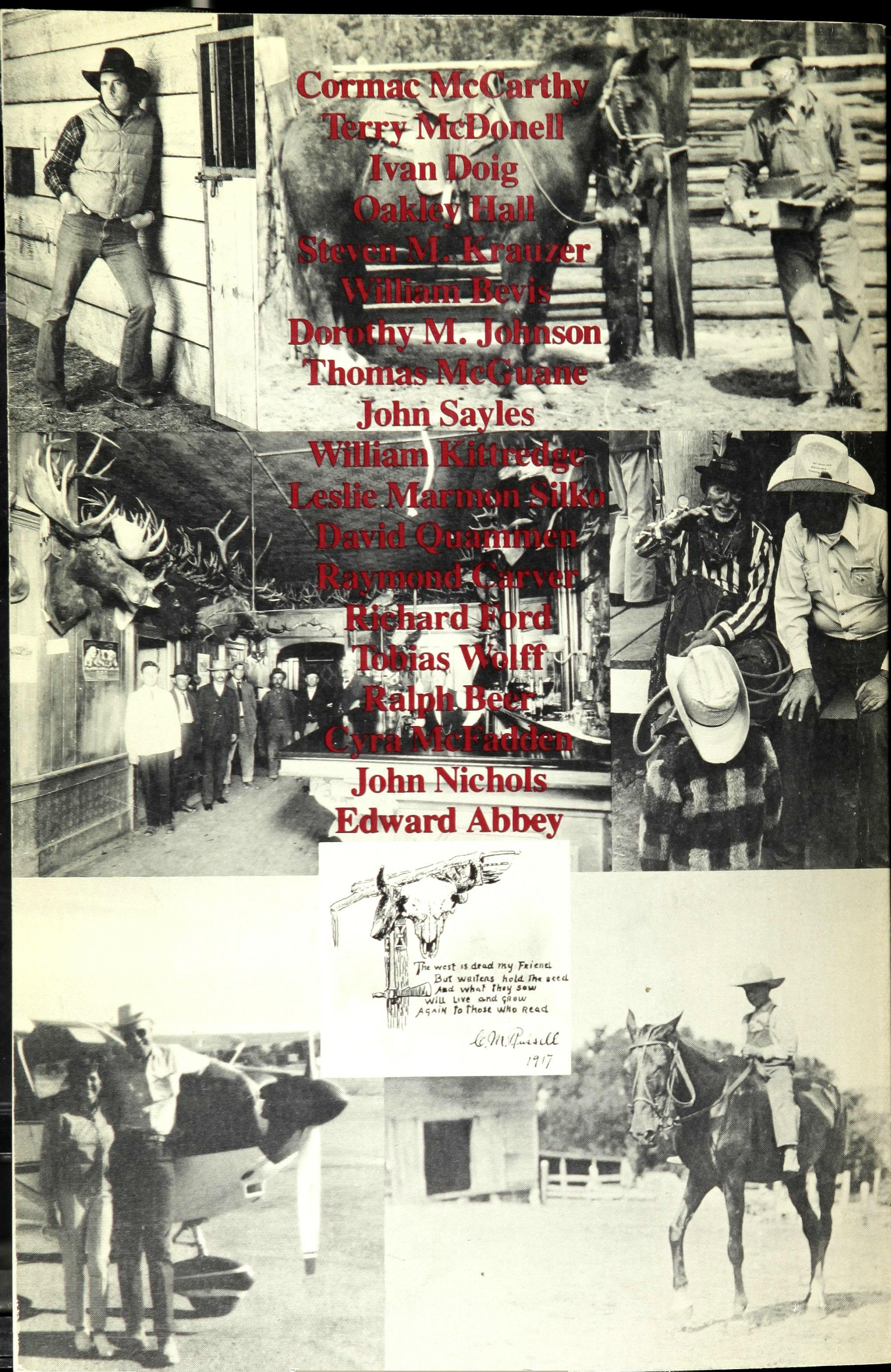

Editors:




Editors:

Elliott Anderson, Robert Onopa
Executive Editor:
Jonathan Brent
ArtDirector:
Cynthia Anderson
Managing Editor: Michael McDonnell
Associate Editor:
Anne-Marie Zwierzyna
Assistant Editors:
DemetraBowles, LisaJohnson, Kay Kersch Kirkpatrick, Mary Elinore Smith
Advisory Editors: Lawrence Levy, Charles Newman
Fulfillment: Judy Marrs
Contributing
Editors:
Robert Alter, Michael Anania, Gerald Graff, John Hawkes, David Hayman, Bill Henderson, Ian MacMillan, Joseph McElroy, Peter Michelson, Robert Ray, Tony Tanner, Nathaniel Tarn
TriQuarterly is an international journal of art and writing published in the fall, winter, and spring at Northwestern University, Evanston, Illinois 60201.
Subscription rates: One year $12.00; two years $20.00; three years $30.00 Foreign subscriptions $1.00 per year additional. Single copies usually $5.95. Back issue prices on request. Contributions, correspondence, and subscriptions should be addressed to TriQuarterly, 1735 Benson Avenue, Northwestern University, Evanston, Illinois 60201. The editors invite submissions, but queries are strongly suggested. No manuscripts will be returned unless accompanied by a stamped, self-addressed envelope. All manuscripts accepted for publication become the property of TriQuarterly, unless otherwise indicated. Copyright © 1980 by TriQuarterly. All rights reserved. The views expressed in this magazine are to be attributed to the writers, not the editors or sponsors. Printed in the United States of America. Claims for missing numbers will be honored only within the four-month period after month of issue.
NATIONAL DISTRIBUTOR TO RETAIL TRADE: B. DEBOER, 113 E. CENTRE STREET-REAR, NUTLEY, NEW JERSEY 07110. DISTRIBUTOR FOR WEST COAST TRADE: BOOK PEOPLE, 2940 7TH STREET, BERKELEY, CALIFORNIA 94710. MIDWEST: BOOKSLINGER, P.O. BOX 16251, 2163 FORD PKWY, ST. PAUL, MINNESOTA 55116.
REPRINTS OF BACK ISSUES OF TriQuarterly ARE NOW AVAILABLE IN FULL FORMAT FROM KRAUS REPRINT COMPANY, ROUTE 100, MILLWOOD, NEW YORK 10546, AND IN MlCROFlLM FROM UMI, A XEROX COMPANY, ANN ARBOR, MICHIGAN 48106.

Writers ofthe new west 5
William Kittredge & Steven M. Krauzer
The scalphunters 15
Cormac McCarthy
Gringos 29
Terry McDonell
Swell 40
Ivan Doig
Casus belli 50
Oakley Hall
Streets ofgold 65
Steven M. Krauzer
The price ofgold 80
William Bevis
Tom Fitch and the sparrow bride 98
Dorothy M. Johnson
Nobody's angel 115
Thomas McGuane
Dillinger in Hollywood 131
John Sayles
Performing arts 144
William Kittredge
Coyote holds afull house in his hand 166
Leslie Marmon Silko
Walking out 175
David Quammen
Where is everyone? 203
Raymond Carver
Snowman 214
Richard Ford
Hunters in the snow 225
Tobias Wolff
Riders 241
Ralph Beer
The basement 257
Cyra McFadden
No rhyme, no reason 265
John Nichols
Good news 273
Edward Abbey
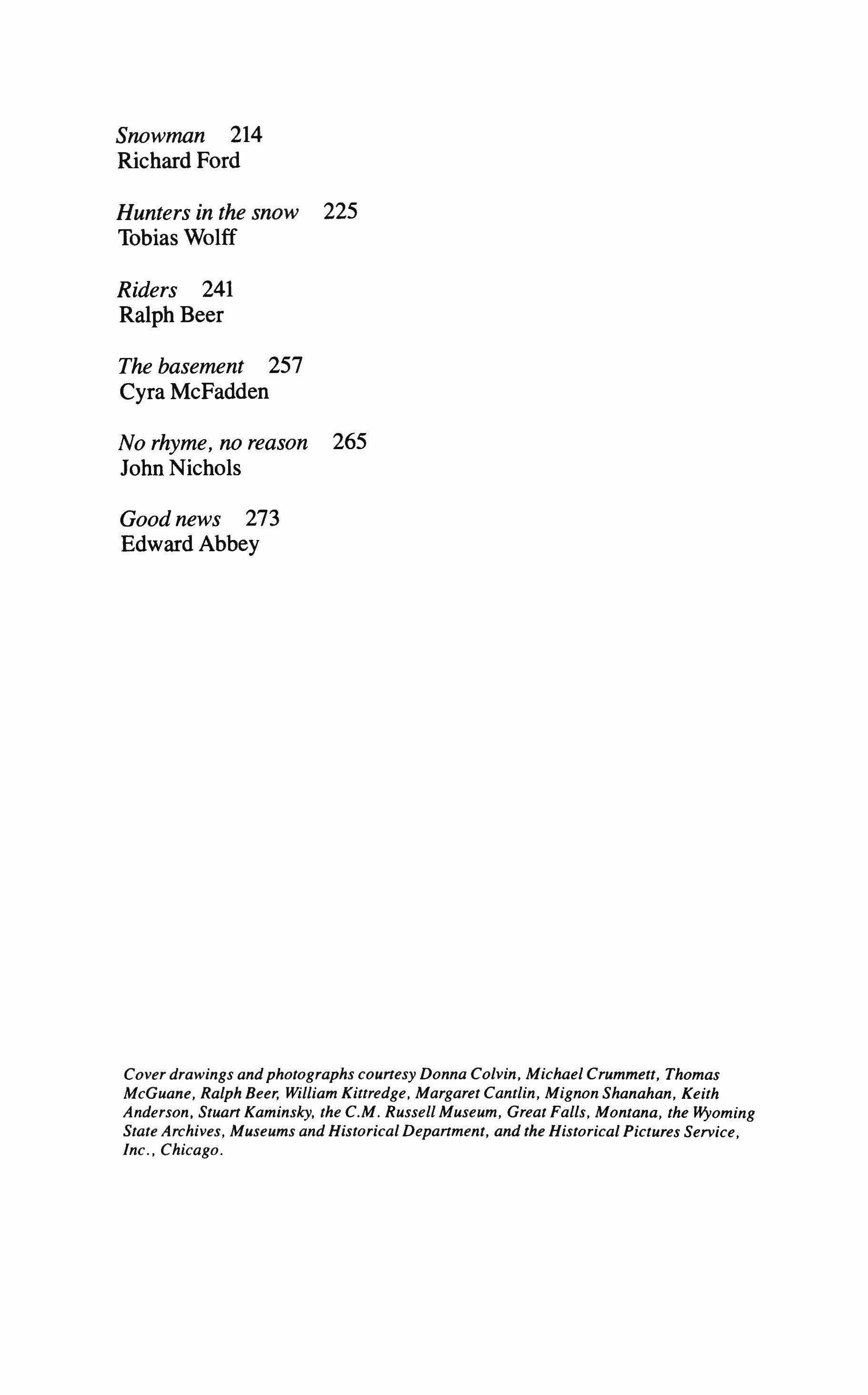
Cover drawings andphotographs courtesy Donna Colvin. Michael Crummett. Thomas McGuane. Ralph Beer, William Kittredge. Margaret Cantlin. Mignon Shanahan. Keith Anderson. Stuart Kaminsky. the C.M. Russell Museum. Great Falls. Montana. the Wyoming State Arrhives. Museums and Historical Department, and the Historical Pictures Service. Inc Chicago.

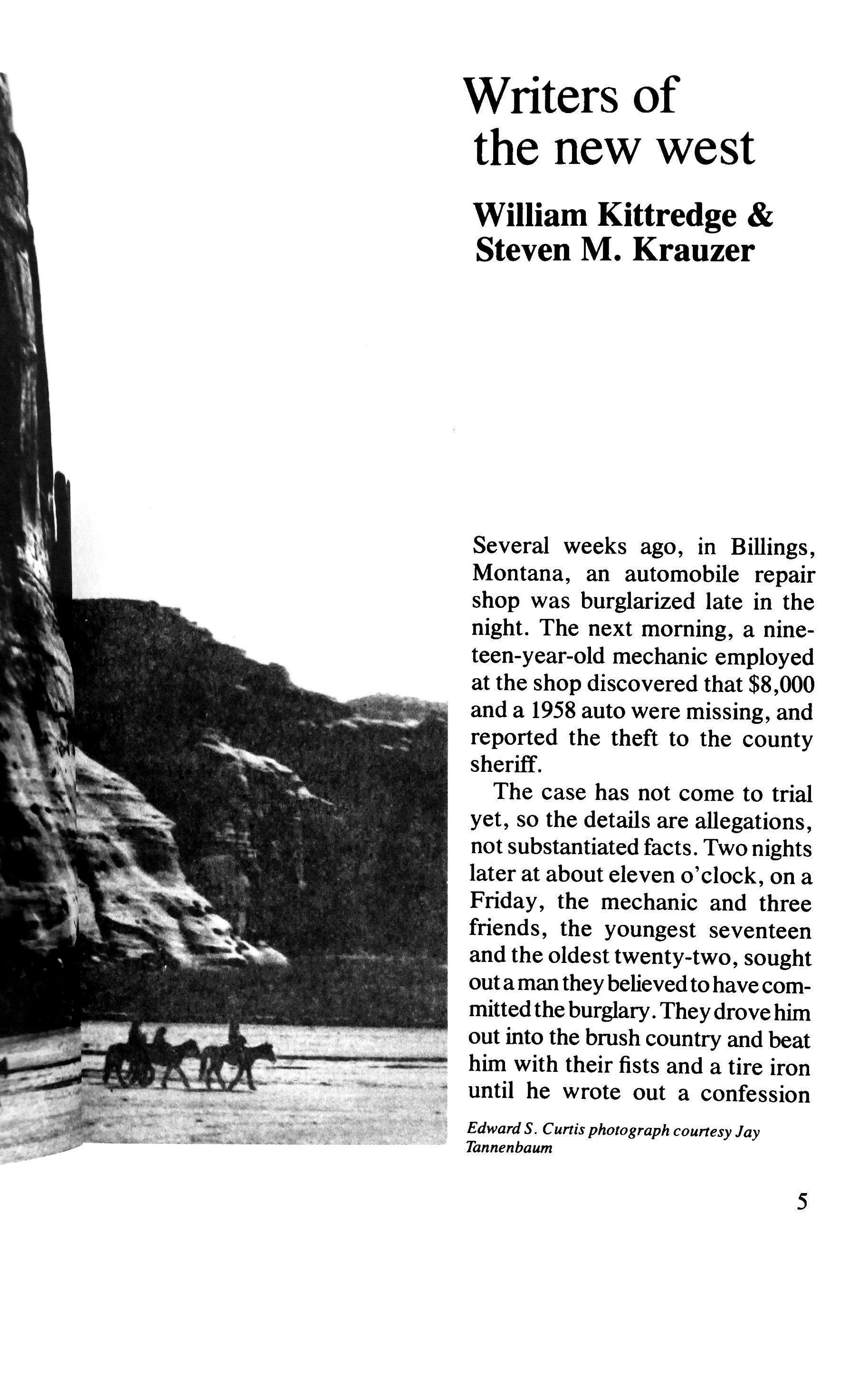
Several weeks ago, in Billings, Montana, an automobile repair shop was burglarized late in the night. The next morning, a nineteen-year-old mechanic employed at the shop discovered that $8,000 and a 1958 auto were missing, and reported the theft to the county sheriff.
The case has not come to trial yet, so the details are allegations, not substantiated facts. Two nights later at about eleven o'clock, on a Friday, the mechanic and three friends, the youngest seventeen and the oldest twenty-two, sought out a man theybelieved to have committedtheburglary.Theydrove him out into the brush country and beat him with their fists and a tire iron until he wrote out a confession
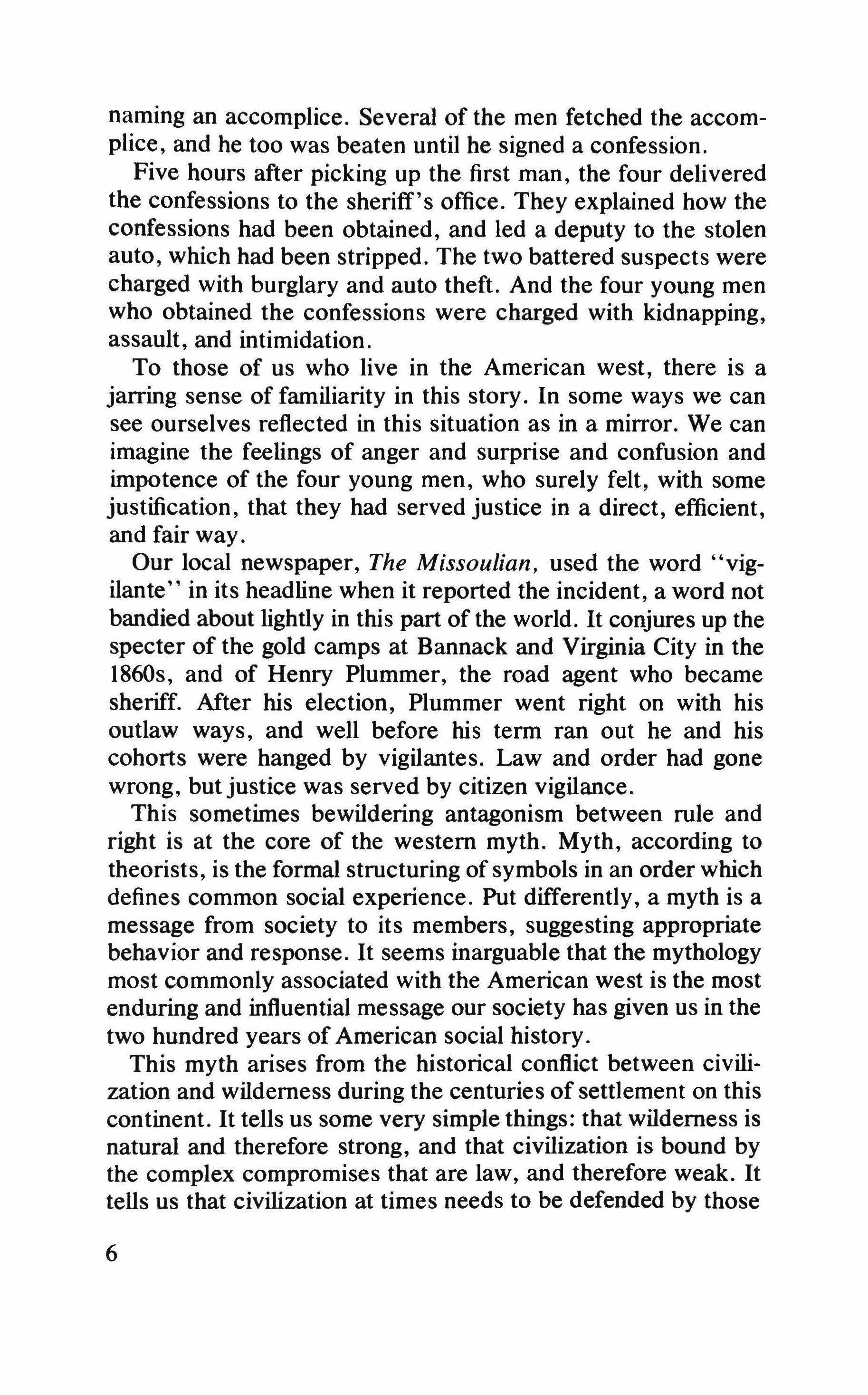
naming an accomplice. Several of the men fetched the accomplice, and he too was beaten until he signed a confession.
Five hours after picking up the first man, the four delivered the confessions to the sheriff's office. They explained how the confessions had been obtained, and led a deputy to the stolen auto, which had been stripped. The two battered suspects were charged with burglary and auto theft. And the four young men who obtained the confessions were charged with kidnapping, assault, and intimidation.
To those of us who live in the American west, there is a jarring sense of familiarity in this story. In some ways we can see ourselves reflected in this situation as in a mirror. We can imagine the feelings of anger and surprise and confusion and impotence of the four young men, who surely felt, with some justification, that they had served justice in a direct, efficient, and fair way.
Our local newspaper, The Missoulian, used the word "vigilante" in its headline when it reported the incident, a word not bandied about lightly in this part of the world. It conjures up the specter of the gold camps at Bannack and Virginia City in the 1860s, and of Henry Plummer, the road agent who became sheriff. After his election, Plummer went right on with his outlaw ways, and well before his term ran out he and his cohorts were hanged by vigilantes. Law and order had gone wrong, but justice was served by citizen vigilance.
This sometimes bewildering antagonism between rule and right is at the core of the western myth. Myth, according to theorists, is the formal structuring of symbols in an order which defines common social experience. Put differently, a myth is a message from society to its members, suggesting appropriate behavior and response. It seems inarguable that the mythology most commonly associated with the American west is the most enduring and influential message our society has given us in the two hundred years of American social history.
This myth arises from the historical conflict between civilization and wilderness during the centuries of settlement on this continent. It tells us some very simple things: that wilderness is natural and therefore strong, and that civilization is bound by the complex compromises that are law, and therefore weak. It tells us that civilization at times needs to be defended by those

who possess wilderness strengths, and it defines the role of that defender.
Think of the film Shane, where the myth takes classical form. A society of pastoral homesteaders is coming together under the leadership of one of their number, played by Van Heflin. Because of their belief in law and their commitment to family, their civilized weakness, the settlers are unable to answer the violence, essentially warfare, directed toward them by the male society of ranchers who want their land, led by a man named Ryker.
From out of the west, the wilderness, comes a lone rider, a gunfighter named Shane, played by Alan Ladd. The homesteaders include Shane in their lives and their farmer's work, and he considers hanging up his guns to embrace civilization and a settled life. It is a way out of his isolation, his role as a wanderer on the warrior outskirts of society. But in the end he cannot avoid his fate: Shane must join the battle and defend the homesteaders with his terrible skills, defeating the hired gunfighter representative of the mercantilist ranching interests. Then, wounded and alone, forever outside society because his presence is a destructive force, Shane rides away into the wilderness from which he came, into the great shadowy Tetons to the west. The warrior is trapped inside his role. Society needs him in time of peril, and then he must leave because his skills represent lawlessness.
This is the classical form of the myth-and its paradox. The defender of the good society, founded on law, must be one who is himself from the wilderness, who partakes of the savagery necessary to survive in the wild. He is the only one who possesses the skills, the magic quickness of hand, and the willingness to kill. But he must be a good man, acting out of altruism in some form. In Shane, the hired gunfighter also has the skills. But he is acting out of self-interest and posturing arrogance, and as a force of these antisocietal stances, he is defeated.
Those boys back in Billings: they were only being Shane. They had the best interests of society in mind, and they were using direct action to cut through the crap. They were acting out the myth.
What has always been so unique about western mythology is
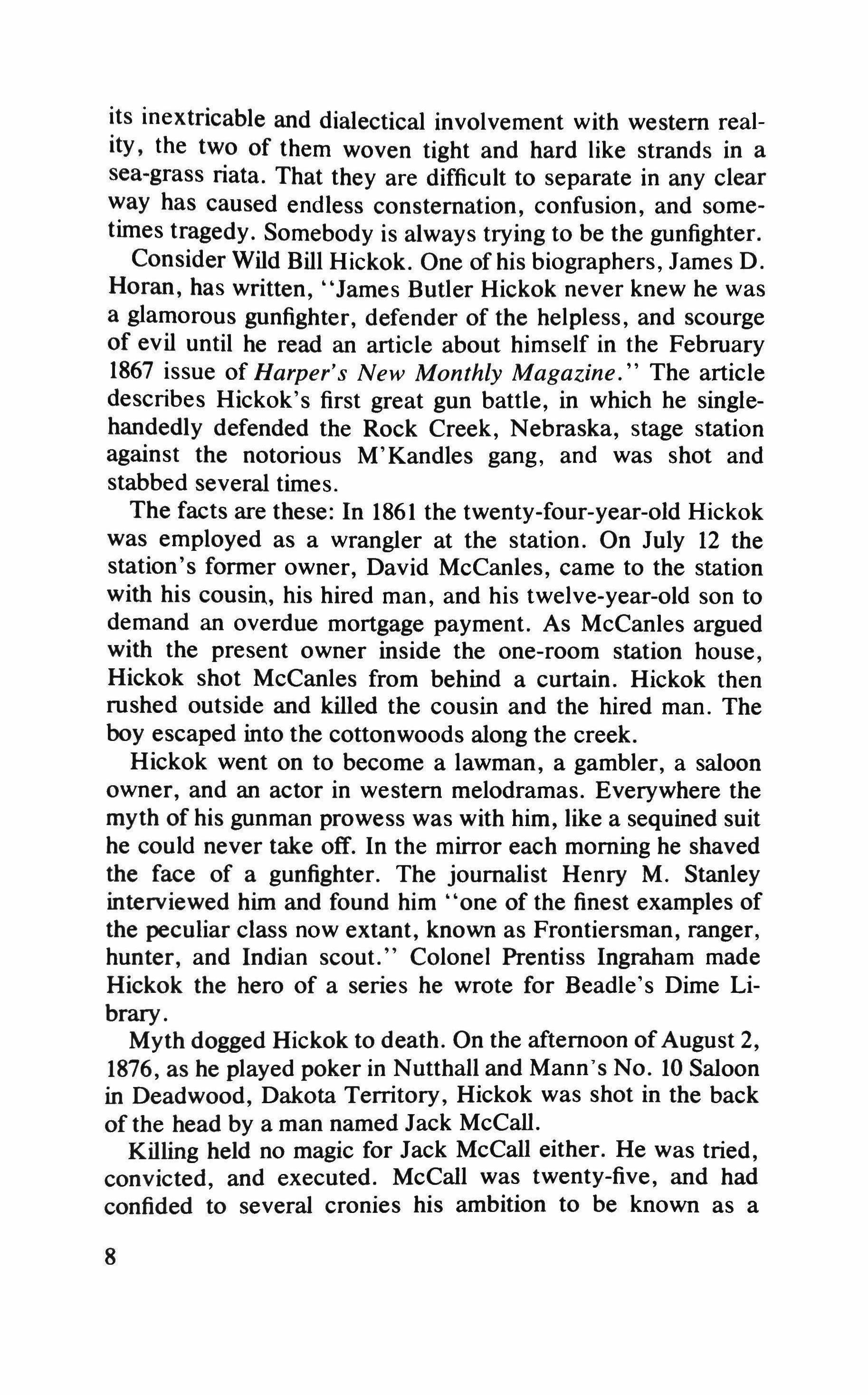
its inextricable and dialectical involvement with western reality, the two of them woven tight and hard like strands in a sea-grass riata. That they are difficult to separate in any clear way has caused endless consternation, confusion, and sometimes tragedy. Somebody is always trying to be the gunfighter.
Consider Wild Bill Hickok. One of his biographers, James D. Horan, has written, "James Butler Hickok never knew he was a glamorous gunfighter, defender of the helpless, and scourge of evil until he read an article about himself in the February 1867 issue of Harper's New Monthly Magazine." The article describes Hickok's first great gun battle, in which he singlehandedly defended the Rock Creek, Nebraska, stage station against the notorious M'Kandles gang, and was shot and stabbed several times.
The facts are these: In 1861 the twenty-four-year-old Hickok was employed as a wrangler at the station. On July 12 the station's former owner, David McCanles, came to the station with his cousin, his hired man, and his twelve-year-old son to demand an overdue mortgage payment. As McCanles argued with the present owner inside the one-room station house, Hickok shot McCanles from behind a curtain. Hickok then rushed outside and killed the cousin and the hired man. The boy escaped into the cottonwoods along the creek.
Hickok went on to become a lawman, a gambler, a saloon owner, and an actor in western melodramas. Everywhere the myth of his gunman prowess was with him, like a sequined suit he could never take off. In the mirror each morning he shaved the face of a gunfighter. The journalist Henry M. Stanley interviewed him and found him "one of the finest examples of the peculiar class now extant, known as Frontiersman, ranger, hunter, and Indian scout." Colonel Prentiss Ingraham made Hickok the hero of a series he wrote for Beadle's Dime Library.
Myth dogged Hickok to death. On the afternoon ofAugust 2, 1876, as he played poker in Nutthall and Mann's No. 10 Saloon in Deadwood, Dakota Territory, Hickok was shot in the back of the head by a man named Jack McCall.
Killing held no magic for Jack McCall either. He was tried, convicted, and executed. McCall was twenty-five, and had confided to several cronies his ambition to be known as a
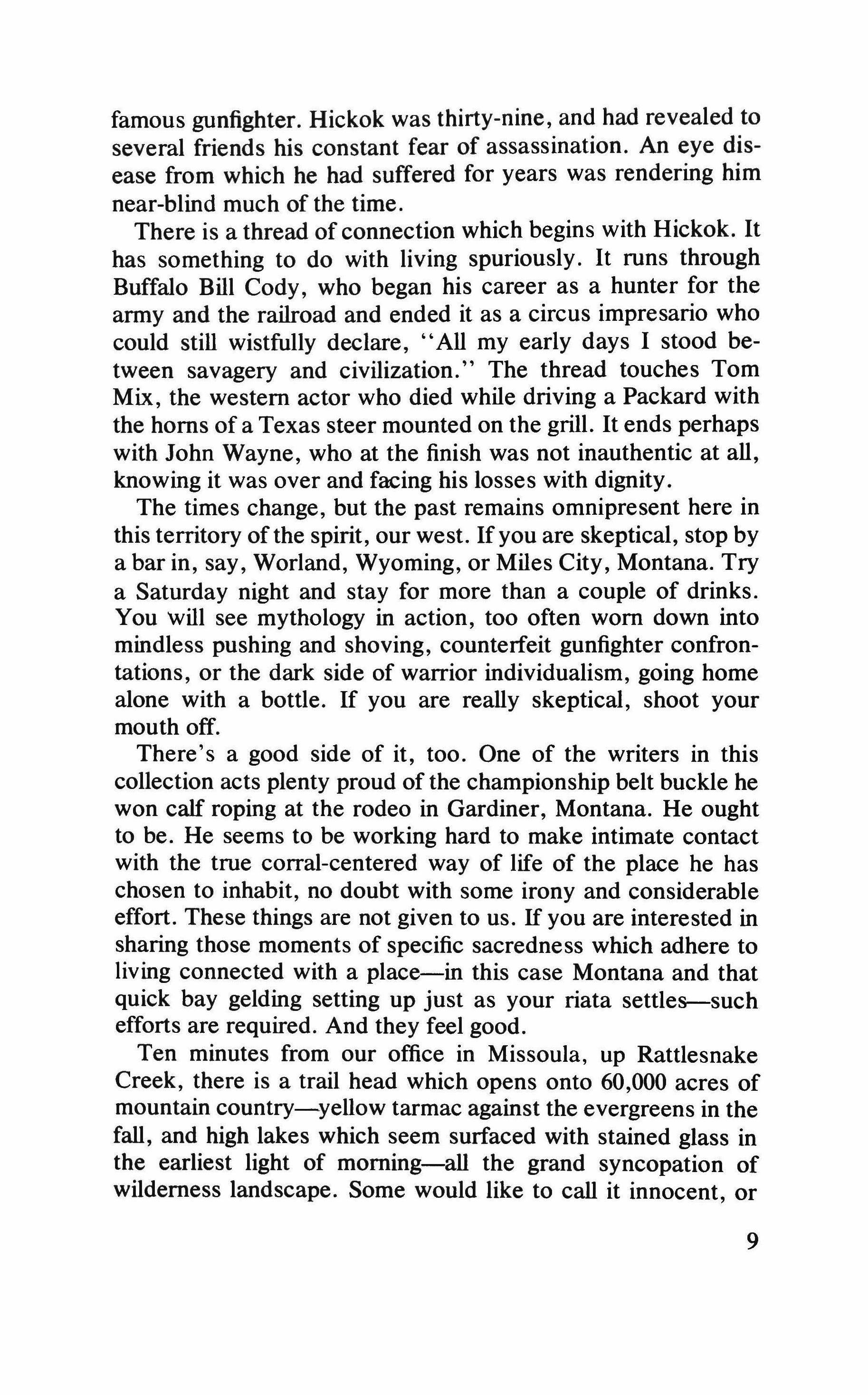
famous gunfighter. Hickok was thirty-nine, and had revealed to several friends his constant fear of assassination. An eye disease from which he had suffered for years was rendering him near-blind much of the time.
There is a thread of connection which begins with Hickok. It has something to do with living spuriously. It runs through Buffalo Bill Cody, who began his career as a hunter for the army and the railroad and ended it as a circus impresario who could still wistfully declare, "All my early days I stood between savagery and civilization." The thread touches Tom Mix, the western actor who died while driving a Packard with the horns of a Texas steer mounted on the grill. It ends perhaps with John Wayne, who at the finish was not inauthentic at all, knowing it was over and facing his losses with dignity.
The times change, but the past remains omnipresent here in this territory ofthe spirit, our west. If you are skeptical, stop by a bar in, say, Worland, Wyoming, or Miles City, Montana. Try a Saturday night and stay for more than a couple of drinks. You will see mythology in action, too often worn down into mindless pushing and shoving, counterfeit gunfighter confrontations, or the dark side of warrior individualism, going home alone with a bottle. If you are really skeptical, shoot your mouth off.
There's a good side of it, too. One of the writers in this collection acts plenty proud of the championship belt buckle he won calf roping at the rodeo in Gardiner, Montana. He ought to be. He seems to be working hard to make intimate contact with the true corral-centered way of life of the place he has chosen to inhabit, no doubt with some irony and considerable effort. These things are not given to us. If you are interested in sharing those moments of specific sacredness which adhere to living connected with a place-in this case Montana and that quick bay gelding setting up just as your riata settles--such efforts are required. And they feel good.
Ten minutes from our office in Missoula, up Rattlesnake Creek, there is a trail head which opens onto 60,000 acres of mountain country-yellow tarmac against the evergreens in the fall, and high lakes which seem surfaced with stained glass in the earliest light of morning-all the grand syncopation of wilderness landscape. Some would like to call it innocent, or

use some other loaded term to convert it into a weapon aimed at our supposed latter-day decadence. It's none of those things. Our myth tells us it is to be cherished. Our myth tells us it is from wilderness that we derive our essential strengths.
The myth has also been an insidious trap for those who would write about the west; it can become a box for our imaginations. For a long time it was as if there were only one legitimate story to tell about the west, and that was the mythological story. It was told over and over, first by James Fenimore Cooper and then repeated endlessly in Beadle Nickel-Dime Library thrillers, and Gene Autry B-westerns, and The Virginian, and everywhere else. It was the essential story of America, and it was a great story, and we loved it. But for writers it grew as confining as a celluloid collar.
William Eastlake once told us never to let a publisher put a picture of a horse on the dust jacket of any novel we might happen to publish. "The people who buy it will think it's some goddamned shoot-up," Eastlake said. "And they'll hate it when it isn't."
What Eastlake was talking about were the private stories that all of us who grew up in the west, or came there to live, have to tell about our own experiences, and the difficulty of telling those stories when expected to write from inside the myth. It is a trouble all western writers share to some degree, or at least used to share. It's not so bad any more. Mostly because of the hard labor of a whole group of widely disparate writers, we draw together under the ungainly notion of being antimythological.
The first of such writers worth much mention is Andy Adams. In 1903 he published Log of a Cowboy, detailing a late nineteenth-century cattle drive from northern Mexico, just across the Rio Grande from Brownsville, Texas, to the Blackfeet reservation in northern Montana. It is reasonably accurate and well told, and talks of days in the saddle without drinking water, and dust and cold wind, and putting your saddle in a gunnysack at the drive's end and riding the train home to Texas. It was a life with no room for the lacy-sleeved six-gun exhibitions of Main Street gamblers.
Then, in developing cadence, came Willa Cather, Mari San-

doz, H. L. Davis, John Steinbeck, Wallace Stegner, A. B. Guthrie, Jr., Dorothy M. Johnson; Death Comes for the Archbishop, Old Jules, Honey in the Horn, The Grapes of Wrath, Angle of Repose, The Big Sky, Indian Country. The complete list would fill a book, and all of it, in one way or another, is antimythological. Walter Van Tilburg Clark showed us the dark side of vigilante justice in The Ox-Bow Incident. In The Surrounded, D'Arcy McNickle showed us real Indians from his home country around St. Ignatius on the Flathead Reservation in Montana, suffering the loss of their traditional life in complex and human ways. As writers were cut loose from the mythology, subregional literatures developed: the Pacific Northwest poetry of Theodore Roethke, William Stafford, Richard Hugo; the Texas novels of Larry McMurtry, James Crumley, Max Crawford; the native American voices of N. Scott Momaday, James Welch, Simon Ortiz, Roberta Hill, Ray Young Bear, Leslie Silko. Wallace Stegner continues to be a central figure in this movement. Listen to his voice, this from The Big Rock Candy Mountain:
Things greened beautifully that June. Rains came up out of the southeast, piling up solidly, moving toward them as slowly and surely as the sun moved, and it was fun to watch them come, the three of them standing in the doorway. When they saw the land to the east of them darken under the rain Bo would say, "Well, doesn't look as ifit's going to miss us," and they wouldjump to shut the windows and bring things infrom the yard or clothesline. Then they could stand quietly in the door and watch the good rain come, the front of it like a wall and the wind ahead ofit stirring up dust, until it reached them and drenched the bare packed earth of the yard, and the ground smoked under its feet, and darkened, and ran with little streams, and they heard the swish ofrain on roofand ground and in the air.
Or this, from the story "Carrion Spring," in Wolf Willow:
Three days of chinook had uncovered everything that had been under the snow since November. The yard lay discolored and ugly, grey ash pile, rusted cans, spilled lignite, bones. The clinkers that had given them winter footing for the privy and stable lay in raised grey wafers across the mud; the strung lariats they had usedfor lifelines in blizzard weather had dried out and sagged to the ground. Much was knee-deep down in the corrals by the sod-roofed stable, the whitewashed Logs were yellowed at the corners from dogs lifting their legs against them. Sunken drifts around the hay yard were a reminder ofhow many times

the boys had had to shovel out there to keep the calves from walking into the stacks across the top of the snow. Across the wan and disheveled yard the willows were bare. and beyond them thefloodplain hill was brown. The sky was roiled with grey cloud.
Two experiences, both involving the enormous west and weather-one sacred, one demonic, neither mythological. Both seem to come out of Stegner's childhood, the years from ages six to twelve which he spent growing up around the Cypress Hills of southern Saskatchewan, just over the border from the high plains country of Montana. Those years are detailed in Wolf Willow: the life considered, a personal, and possessed, past.
Lois Hudson, writing in the Spring 1971 issue of the South Dakota Review, says of Stegner that he, like so many of the western writers of his literary generation, was "charged with the double burden of dispelling myth and then building fiction on the fact they must first insist upon." She is saying that western writers have somehow had to prove that the real emotionally possessed life they had grown up inside of, or found when they came to the country-as opposed to the stylized morality play that was supposed to be western experience-was worth writing about. It was a tough battle. Near the end ofOld Jules, just before the old man's death, Mari Sandoz includes this anecdote about herself and her father:
The next day he looked through the papers and found a small item announcing a prize for a short story awarded to Marie. He tore the paper across. ordered pencil and paper brought. wrote her one Line in the old. firm. up-and-down strokes: "You know I consider artists and writers the maggots ofsociety."
Why wouldn't he? Hadn't they told nothing but lies about the strenuous facts of life where he had lived, the endless tum of horizon and the turkey-packed earth where the wash water was flung outside the back door of the ranch house, season after season as the generations passed? That image is suggested by Willa Cather's "The Wagner Matinee"; this is from Old Jules, after the old man's death:
Outside the latefall wind swept over the hard-land country ofthe upper Running Water. tearing at the low sandy knolls that were the knees of the hills. shifting, but not changing, the unalterable sameness of the somnolent land spreading away toward the east.

The east-the direction culture looked, from where culture came. Mark Twain wrote the silliness of Roughing It for an eastern audience, and then migrated as quickly as he could to New York to celebrate his literary triumph. Buffalo Bill's Wild West Show performed before sell-out crowds in Europe, but surely told little of truth or importance. But even early on, some were nettled by the bald artifice. In Wild Bill Hickok's first stage venture, the script called for him to sit beside a crepe camp fire, sip whiskey, and spin yams. On opening night, Hickok took a big swig of what proved to be cold tea, spat it onto the boards, and bellowed, "I ain't telling no lies until I get some real whiskey." Old Jules would have liked that.
Jules could not know that his daughter Mari, like Stegner and the others, was getting ready to write books which would attempt to convey the emotional truth of the various western lives they had come to possess while inhabiting the country. Jules died in 1928, and Old Jules was published in 1935; Honey in the Horn in 1936; The Grapes ofWrath in 1939; The Big Rock Candy Mountain in 1943. A new thing was developing. A whole generation of writers was proving that the west had more stories than gunplay, that the private lives they had lived in the west were worth writing about=just as any life is worth literature if, in seeing it transformed through the eyes of the artist, we come to see our own existence freshly, with renewed sight of what is possible.
We, the writers in this collection, along with others who are for one reason or another missing, are in a real sense their children. Nobody doubts any longer that the west, however it might be defined, is rich material for stories that are honest and faithful and true.
The current status of western writing is similar to that of southern American writing in the early 1930s when a major regional voice, in the persons of such authors as William Faulkner, Robert Penn Warren, Eudora Welty, Andrew Lytle, and Katherine Anne Porter, was beginning to be heard. Just as the old south was gone, the old west is gone. Free ofthe need to write either out ofthe mythology or against it, the writers ofthe new west, responding to the variety and quickness of life in their territory, are experiencing a period of enormous vitality.
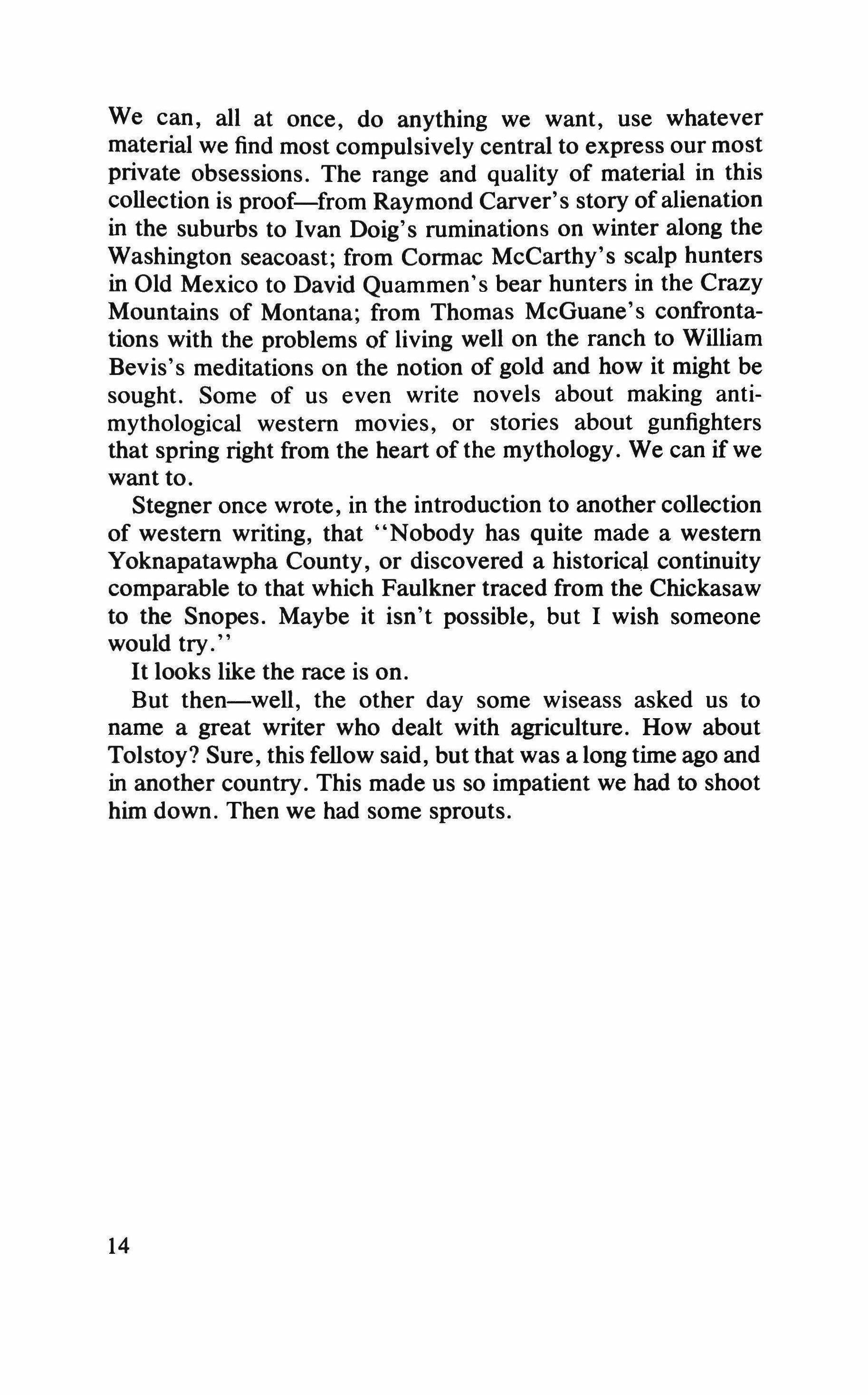
We can, all at once, do anything we want, use whatever material we find most compulsively central to express our most private obsessions. The range and quality of material in this collection is proof.-from Raymond Carver's story of alienation in the suburbs to Ivan Doig's ruminations on winter along the Washington seacoast; from Cormac McCarthy's scalp hunters in Old Mexico to David Quammen' s bear hunters in the Crazy Mountains of Montana; from Thomas McGuane's confrontations with the problems of living well on the ranch to William Bevis's meditations on the notion of gold and how it might be sought. Some of us even write novels about making antimythological western movies, or stories about gunfighters that spring right from the heart of the mythology. We can if we want to.
Stegner once wrote, in the introduction to another collection of western writing, that "Nobody has quite made a western yoknapatawpha County, or discovered a historical continuity comparable to that which Faulkner traced from the Chickasaw to the Snopes. Maybe it isn't possible, but I wish someone would try."
It looks like the race is on.
But then-well, the other day some wiseass asked us to name a great writer who dealt with agriculture. How about Tolstoy? Sure, this fellow said, but that was a long time ago and in another country. This made us so impatient we had to shoot him down. Then we had some sprouts.

For the next two weeks they would ride by night, they would make no fire. They had struck the shoes from their horses and filled the nailholes in with clay and those who still had tobacco used their pouches to spit in and they slept in caves and on bare stone. They rode their horses through the tracks of their dismounting and they buried their stool like cats and they hardly spoke at all. Crossing those barren gravel reefs in the night among such unknown coordinates they seemed remote and without substance, like a patrol condemned to ride out some ancient curse. A thing surmised from the blackness by the creak of leather and the chink of metal. Something passing that may have been the wind. They cut the throats of the pack animals and jerked and divided the meat and they traveled under the cape of the wild mountains upon a broad soda plain with dry thunder to the south and rumors of light. Under the gibbous moon horse and rider spanceled to their lean and flickering shadows on the snowblue ground. In the intervals their lunar castings kept
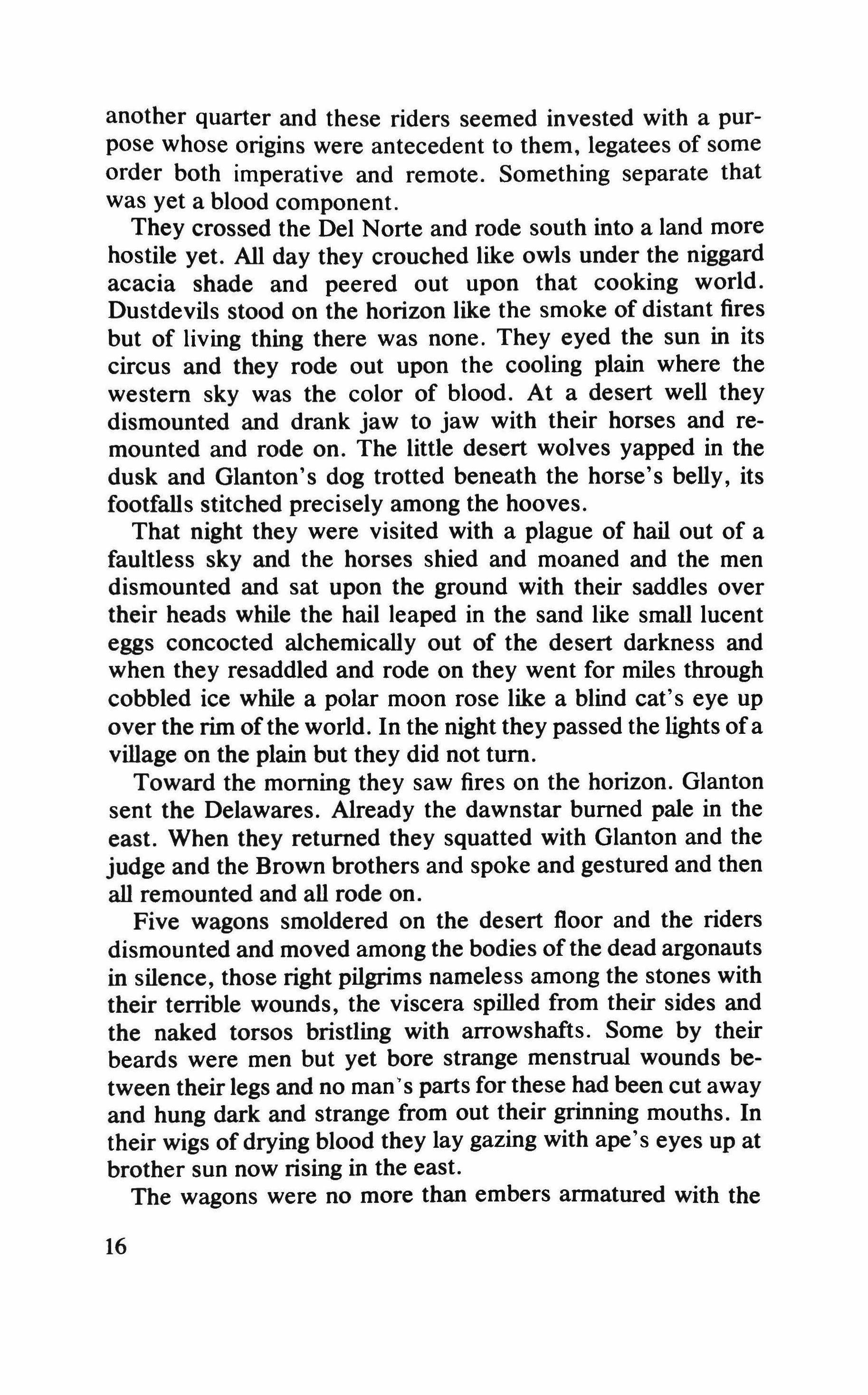
another quarter and these riders seemed invested with a purpose whose origins were antecedent to them, legatees of some order both imperative and remote. Something separate that was yet a blood component.
They crossed the Del Norte and rode south into a land more hostile yet. All day they crouched like owls under the niggard acacia shade and peered out upon that cooking world. Dustdevils stood on the horizon like the smoke of distant fires but of living thing there was none. They eyed the sun in its circus and they rode out upon the cooling plain where the western sky was the color of blood. At a desert well they dismounted and drank jaw to jaw with their horses and remounted and rode on. The little desert wolves yapped in the dusk and Glanton's dog trotted beneath the horse's belly, its footfalls stitched precisely among the hooves.
That night they were visited with a plague of hail out of a faultless sky and the horses shied and moaned and the men dismounted and sat upon the ground with their saddles over their heads while the hail leaped in the sand like small lucent eggs concocted alchemically out of the desert darkness and when they resaddled and rode on they went for miles through cobbled ice while a polar moon rose like a blind eat's eye up over the rim ofthe world. In the night they passed the lights ofa village on the plain but they did not tum.
Toward the morning they saw fires on the horizon. Glanton sent the Delawares. Already the dawnstar burned pale in the east. When they returned they squatted with Glanton and the judge and the Brown brothers and spoke and gestured and then all remounted and all rode on.
Five wagons smoldered on the desert floor and the riders dismounted and moved among the bodies ofthe dead argonauts in silence, those right pilgrims nameless among the stones with their terrible wounds, the viscera spilled from their sides and the naked torsos bristling with arrowshafts. Some by their beards were men but yet bore strange menstrual wounds between their legs and no man's parts for these had been cut away and hung dark and strange from out their grinning mouths. In their wigs of drying blood they lay gazing with ape's eyes up at brother sun now rising in the east.
The wagons were no more than embers armatured with the
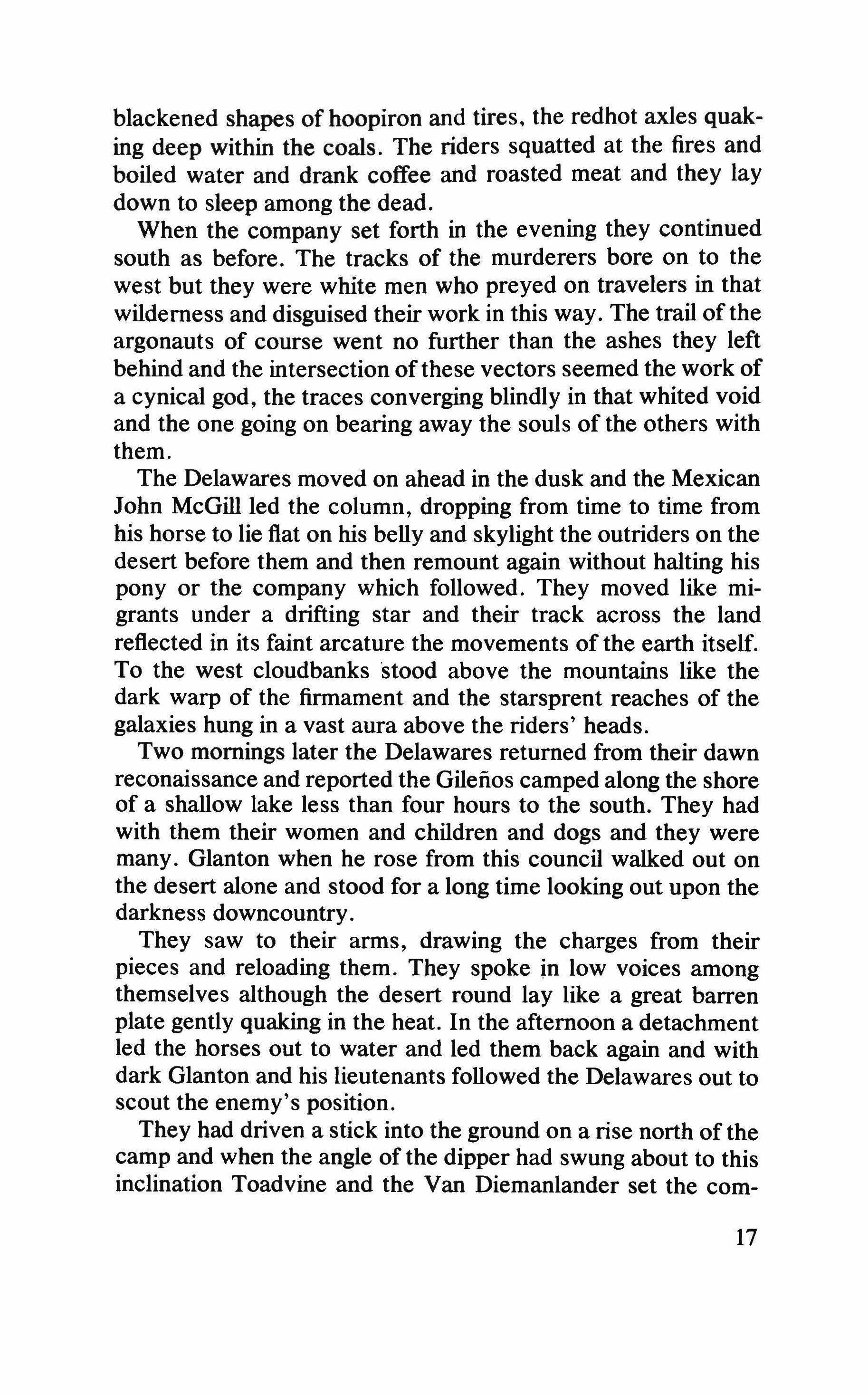
blackened shapes of hoopiron and tires, the redhot axles quaking deep within the coals. The riders squatted at the fires and boiled water and drank coffee and roasted meat and they lay down to sleep among the dead.
When the company set forth in the evening they continued south as before. The tracks of the murderers bore on to the west but they were white men who preyed on travelers in that wilderness and disguised their work in this way. The trail ofthe argonauts of course went no further than the ashes they left behind and the intersection ofthese vectors seemed the work of a cynical god, the traces converging blindly in that whited void and the one going on bearing away the souls of the others with them.
The Delawares moved on ahead in the dusk and the Mexican John McGill led the column, dropping from time to time from his horse to lie flat on his belly and skylight the outriders on the desert before them and then remount again without halting his pony or the company which followed. They moved like migrants under a drifting star and their track across the land reflected in its faint arcature the movements of the earth itself. To the west cloudbanks stood above the mountains like the dark warp of the firmament and the starsprent reaches of the galaxies hung in a vast aura above the riders' heads.
Two mornings later the Delawares returned from their dawn reconaissance and reported the Gilefios camped along the shore of a shallow lake less than four hours to the south. They had with them their women and children and dogs and they were many. Glanton when he rose from this council walked out on the desert alone and stood for a long time looking out upon the darkness downcountry.
They saw to their arms, drawing the charges from their pieces and reloading them. They spoke in low voices among themselves although the desert round lay like a great barren plate gently quaking in the heat. In the afternoon a detachment led the horses out to water and led them back again and with dark Glanton and his lieutenants followed the Delawares out to scout the enemy's position.
They had driven a stick into the ground on a rise north of the camp and when the angle of the dipper had swung about to this inclination Toadvine and the Van Diemanlander set the com-

pany in motion and they rode forth south after the others trammeled to chords of rawest destiny, like migratory birds that beat their way by night among the pale or copper stars. They reached the north end of the lake in the cool hours before dawn and turned along the shore. The water was very black and along the beach there lay a wrack of soapy foam and they could hear ducks talking far out on the lake. The embers of the encampment's fires lay below them in a gentle curve like the lights of a distant port. Before them on that lonely strand a solitary rider sat his horse. It was one of the Delawares and he turned his horse without speaking and they followed him up through the brush into the desert.
The party was crouched in a stand of willow a half mile from the fires ofthe enemy. They had muffled the heads ofthe horses and the hooded beasts stood rigid and ceremonial behind them. The new riders dismounted and bound their own horses and they sat upon the ground while Glanton addressed them.
We got a hour, maybe more. When we ride in it's ever man to his own. Dont leave a dog alive if you can help it.
How many is there, John?
Did you learn to whisper in a sawmill? They's enough to go round, said the judge. Dont waste powder and ball on anything that caint shoot back. If we dont kill ever nigger here we need to be whipped and sent home.
This was the extent of their council. The hour that followed was a long hour. They lead the blindfold horses down and stood looking out upon the encampment but they were watching the horizon to the east for the first pale reaches of light. A bird called. Glanton turned to his horse and unhooded it like a falconer at morning. A wind had risen and the horse lifted its head and sniffed the air. The other men followed. The blankets lay where they had fallen. They mounted, pistols in hand, saps of rawhide and riverrock looped about their wrists like the implements of some primitive equestrian game. Glanton looked back at them and then nudged forth his horse.
As they trotted out onto the white salt shore an old man rose from the bushes where he'd been squatting and turned to face them. The dogs that had been waiting on to contest his stool

bolted howling. Ducks began to rise by ones and pairs out on the lake. Someone clubbed the old man down and the riders put rowels to their mounts and lined out for the camp behind the dogs with their clubs whirling and the dogs yapping in terror in a tableau of some hellish hunt, the partisans nineteen in number bearing down upon that encampment where there lay sleeping upward of a thousand souls.
Glanton rode his horse completely through the first wickiup trampling the occupants underfoot. Figures were scrambling out of the low doorways. The raiders went through the village at full gallop and turned and came back. A warrior stepped into their path and leveled a lance at them and Glanton shot him dead. Three others ran and he shot the first two with shots so closely executed that they fell together and the third one seemed to be coming apart as he ran, hit by half a dozen pistol balls.
Within that first minute the slaughter had become general. Women were screaming and naked children and one old man tottered forth waving a pair of white pantaloons. The horsemen moved among them and slew them with clubs or knives. Already a number of the huts were afire and a whole enfilade of refugees had begun streaming along the shore wailing crazily, the riders herding them on and clubbing down the laggards.
When Glanton and his chiefs swung back through the village people were running out under the horses' hooves and the horses were plunging and some of the men were moving among the huts with torches and dragging victims out, slathered and dripping with blood, hacking at the dying and decapitating those who knelt for mercy. There were in the camp a number of Mexican slaves and these ran forth calling out in spanish and were brained or shot and someone swung an infant aloft by its feet and bashed it against a stone metate so that the brains burst forth through the fontanel in a bloody spew and humans on fire came shrieking forth like berserkers and the riders hacked them down with their enormous knives and a woman ran up and embraced the bloodied forefeet of Glanton's warhorse.
By now a small band of warriors had mounted themselves out of the scattered remuda and they advanced upon the village and rattled a drove of arrows among the burning huts. Glanton
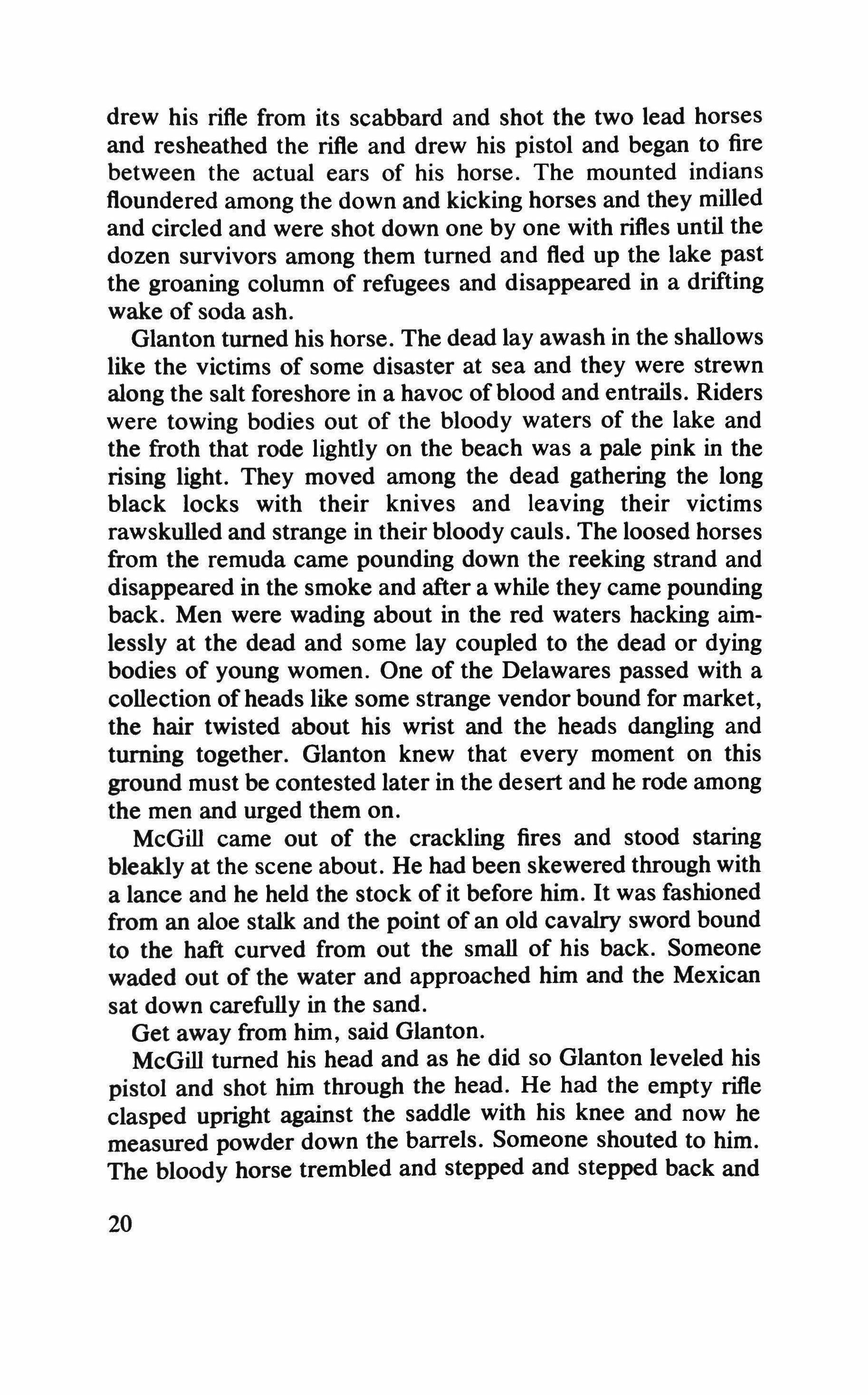
drew his rifle from its scabbard and shot the two lead horses and resheathed the rifle and drew his pistol and began to fire between the actual ears of his horse. The mounted indians floundered among the down and kicking horses and they milled and circled and were shot down one by one with rifles until the dozen survivors among them turned and fled up the lake past the groaning column of refugees and disappeared in a drifting wake of soda ash.
Glanton turned his horse. The dead lay awash in the shallows like the victims of some disaster at sea and they were strewn along the salt foreshore in a havoc of blood and entrails. Riders were towing bodies out of the bloody waters of the lake and the froth that rode lightly on the beach was a pale pink in the rising light. They moved among the dead gathering the long black locks with their knives and leaving their victims rawskulled and strange in their bloody cauls. The loosed horses from the remuda came pounding down the reeking strand and disappeared in the smoke and after a while they came pounding back. Men were wading about in the red waters hacking aimlessly at the dead and some lay coupled to the dead or dying bodies of young women. One of the Delawares passed with a collection ofheads like some strange vendor bound for market, the hair twisted about his wrist and the heads dangling and turning together. Glanton knew that every moment on this ground must be contested later in the desert and he rode among the men and urged them on.
McGill came out of the crackling fires and stood staring bleakly at the scene about. He had been skewered through with a lance and he held the stock of it before him. It was fashioned from an aloe stalk and the point of an old cavalry sword bound to the haft curved from out the small of his back. Someone waded out of the water and approached him and the Mexican sat down carefully in the sand.
Get away from him, said Glanton.
McGill turned his head and as he did so Glanton leveled his pistol and shot him through the head. He had the empty rifle clasped upright against the saddle with his knee and now he measured powder down the barrels. Someone shouted to him. The bloody horse trembled and stepped and stepped back and

Glanton spoke to it softly and patched two balls and drove them home. He was watching a rise to the north where a band of mounted Apaches were grouped against the sky. They were perhaps a quarter mile distant, five, six of them, their cries thin and lost. Glanton brought the rifle to the crook of his arm and capped one lock and rotated the barrels and capped the other. He did not take his eyes from the Apaches. Long Webster stepped from his horse and drew his rifle and slid the ramrod from the thimbles and went to one knee, the ramrod upright in the sand, resting the rifle's forestock upon the fist with which he held it. The rifle had set triggers and he cocked the rear one and laid his face against the cheekpiece. He reckoned the drift of the wind and he reckoned against the sun on the side of the silver foresight and he held high and touched off the piece. Glanton sat immobile. The shot was flat and lost in the emptiness and the gray smoke drifted away. The leader of the group on the rise sat his horse. Then he slowly went sideways and pitched to the ground.
Glanton gave a whoop and surged forward. Four men followed. The warriors on the rise had dismounted and were lifting up the fallen man. Glanton turned in the saddle without taking his eyes from the Indians and held out his rifle to the nearest man. This man was Sam Tate and he took the rifle and reined his horse so short he nearly threw it to the ground. Glanton and three rode on and Tate drew the ramrod for a rest and crouched and fired. The horse that carried the wounded chief faltered, ran on. He swiveled the barrels and fired the second charge and it ploughed to the ground. The Apaches reined with shrill cries. Glanton leaned forward and spoke into his horse's ear. The indians raised up their leader to a new mount and riding double they flailed at their horses and set out again. Glanton had drawn his pistol and he gestured with it to the men behind and one pulled up his horse and leaped to the ground and went flat on his belly and drew and cocked his own pistol and pulled down the loading lever and stuck it in the sand and holding it in both hands with his chin buried in the ground he sighted along the barrel. The horses were two hundred yards out and moving fast. With the second shot the pony that bore the leader bucked and a rider alongside reached and took the 21
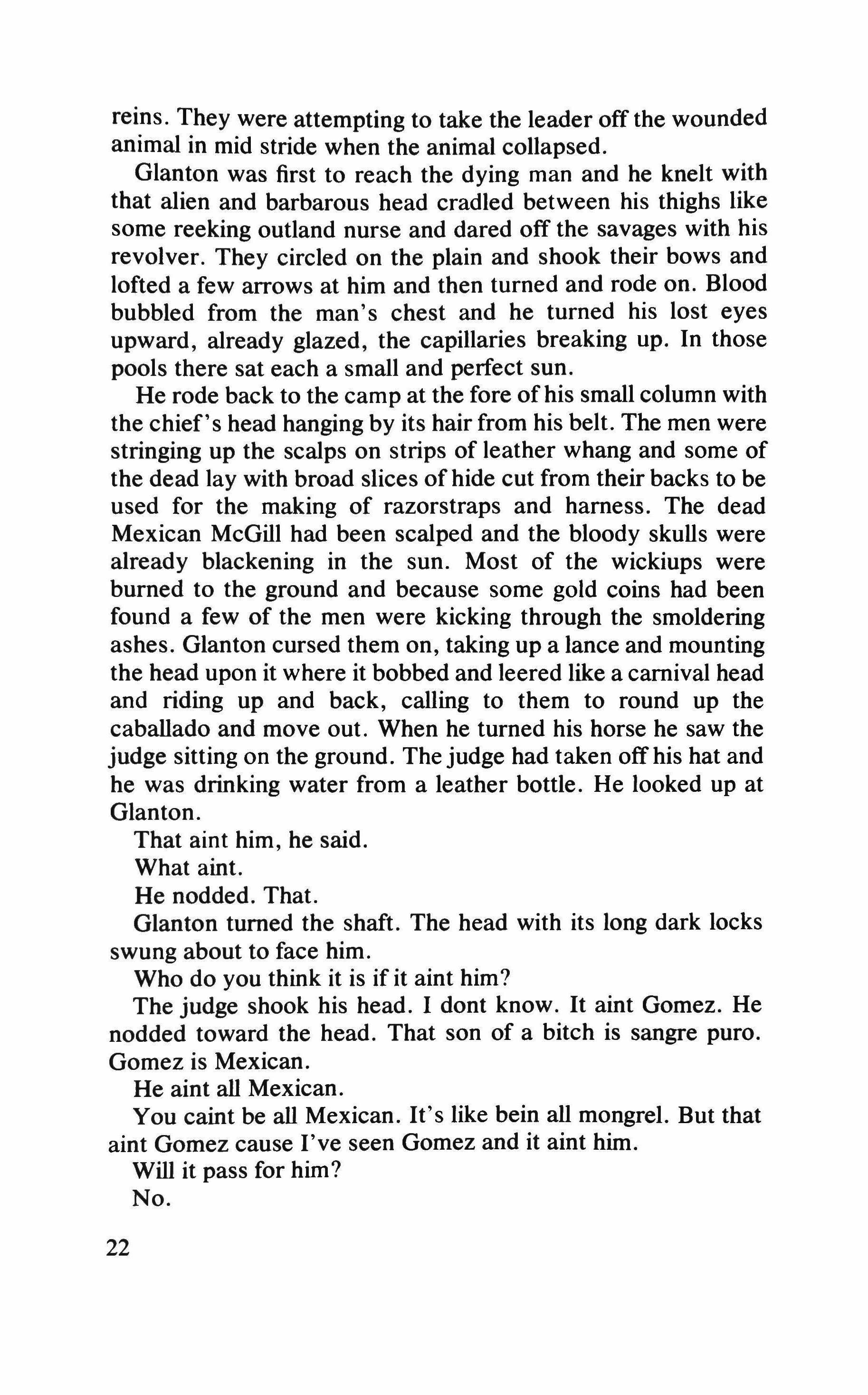
reins. They were attempting to take the leader off the wounded animal in mid stride when the animal collapsed.
Glanton was first to reach the dying man and he knelt with that alien and barbarous head cradled between his thighs like some reeking outland nurse and dared off the savages with his revolver. They circled on the plain and shook their bows and lofted a few arrows at him and then turned and rode on. Blood bubbled from the man's chest and he turned his lost eyes upward, already glazed, the capillaries breaking up. In those pools there sat each a small and perfect sun.
He rode back to the camp at the fore ofhis small column with the chief's head hanging by its hair from his belt. The men were stringing up the scalps on strips of leather whang and some of the dead lay with broad slices of hide cut from their backs to be used for the making of razorstraps and harness. The dead Mexican McGill had been scalped and the bloody skulls were already blackening in the sun. Most of the wickiups were burned to the ground and because some gold coins had been found a few of the men were kicking through the smoldering ashes. Glanton cursed them on, taking up a lance and mounting the head upon it where it bobbed and leered like a carnival head and riding up and back, calling to them to round up the caballado and move out. When he turned his horse he saw the judge sitting on the ground. The judge had taken off his hat and he was drinking water from a leather bottle. He looked up at Glanton.
That aint him, he said.
What aint.
He nodded. That.
Glanton turned the shaft. The head with its long dark locks swung about to face him.
Who do you think it is if it aint him?
The judge shook his head. I dont know. It aint Gomez. He nodded toward the head. That son of a bitch is sangre puro. Gomez is Mexican.
He aint all Mexican.
You caint be all Mexican. It's like bein all mongrel. But that aint Gomez cause I've seen Gomez and it aint him.
Will it pass for him?
No.

Glanton looked toward the north. He looked down at the judge. You aint seen my dog have ye? he said.
The judge shook his head. You aim to drive that stock? I do. Until I'm made to quit. That might be soon.
That might be.
How long do you think it will take those niggers to regroup?
Glanton spat. It wasnt a question and he didnt answer it. Where's your horse? he said.
Gone.
Well if you aim to ride with us you better be for gettin you one. He looked at the head on the pole. You was some kind ofa goddamned chief, he said.
Within the hour they were mounted and riding south, leaving behind on the scourged shore of the lake a shambles of blood and salt and ashes and driving before them half a thousand horses and mules. The judge rode at the head of the column bearing on the saddle before him a strange dark child covered with ashes. Part of its hair was burned away and it rode mute and stoic watching the land advance before it with huge black eyes like some changeling. The men of that company as they rode turned black in the sun from the blood on their clothes and their faces, paling slowly again in the rising dust until they had assumed once more the color of the land through which they passed.
They rode all day with Glanton bringing up the rear of the column. Toward noon the dog caught them up. His chest was stiff with dried blood and Glanton carried him on the pommel of the saddle until he could recruit himself. In the long afternoon he trotted in the shadow of the horse and in the twilight he trotted far out on the plain where the tall shape of the horse skating over the chaparral eluded him on spider legs.
By now there was a thin line of dust to the north and they rode on into dark and the Delawares dismounted and lay with their ears to the ground and then they mounted up and all rode on again.
When they halted Glanton ordered fires built and the wounded seen to. One ofthe mares had foaled in the desert and this frail form soon hung skewered on a paloverde pole over the raked coals. From a slight rise to the west of the camp the fires
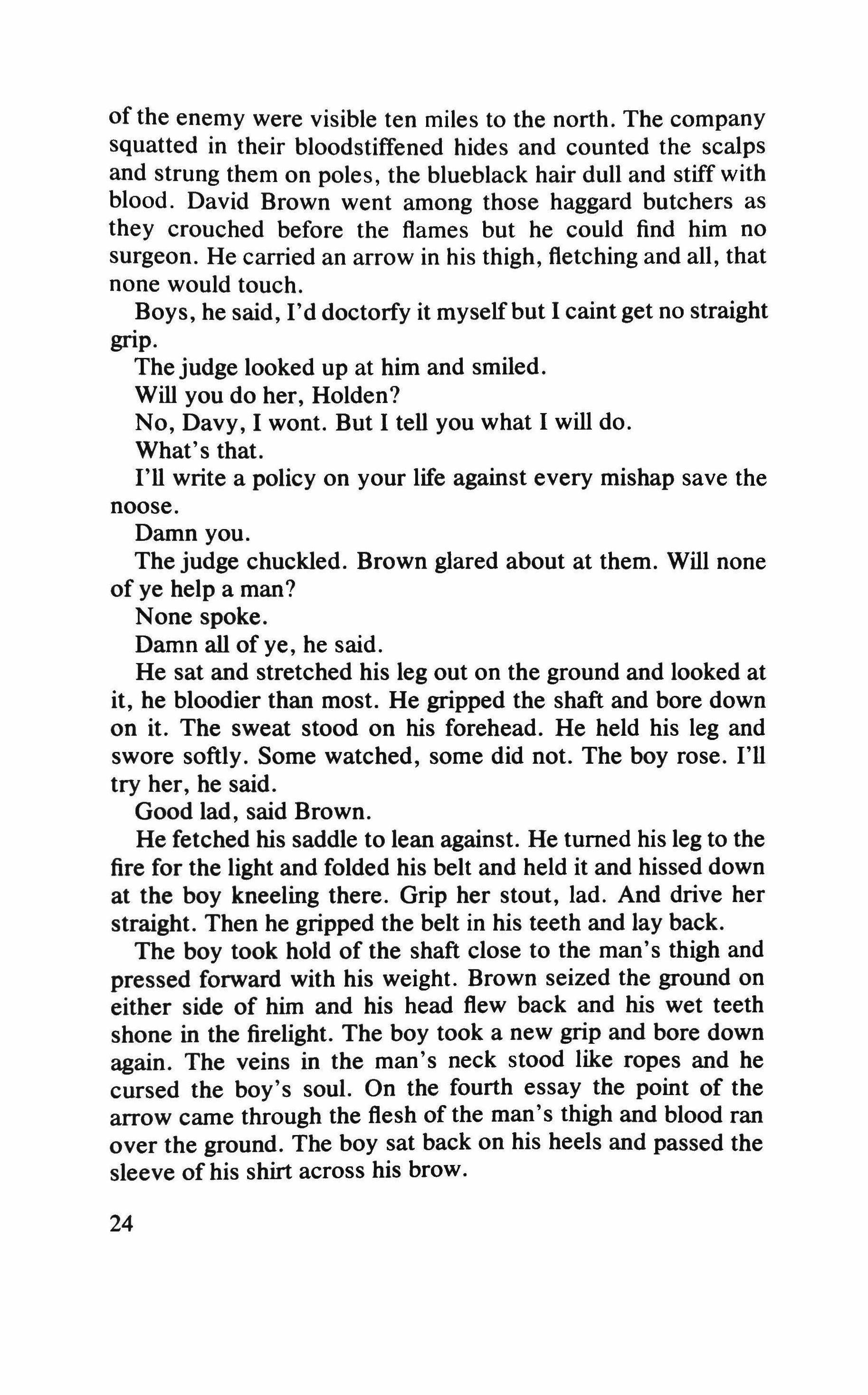
of the enemy were visible ten miles to the north. The company squatted in their bloodstiffened hides and counted the scalps and strung them on poles, the blueblack hair dull and stiff with blood. David Brown went among those haggard butchers as they crouched before the flames but he could find him no surgeon. He carried an arrow in his thigh, fletching and all, that none would touch.
Boys, he said, I'd doctorfy it myself but I caint get no straight grip.
The judge looked up at him and smiled. Will you do her, Holden?
No, Davy, I wont. But I tell you what I will do. What's that.
I'll write a policy on your life against every mishap save the noose.
Damn you.
The judge chuckled. Brown glared about at them. Will none of ye help a man?
None spoke.
Damn all of ye, he said.
He sat and stretched his leg out on the ground and looked at it, he bloodier than most. He gripped the shaft and bore down on it. The sweat stood on his forehead. He held his leg and swore softly. Some watched, some did not. The boy rose. I'll try her, he said.
Good lad, said Brown.
He fetched his saddle to lean against. He turned his leg to the fire for the light and folded his belt and held it and hissed down at the boy kneeling there. Grip her stout, lad. And drive her straight. Then he gripped the belt in his teeth and lay back.
The boy took hold of the shaft close to the man's thigh and pressed forward with his weight. Brown seized the ground on either side of him and his head flew back and his wet teeth shone in the firelight. The boy took a new grip and bore down again. The veins in the man's neck stood like ropes and he cursed the boy's soul. On the fourth essay the point of the arrow came through the flesh of the man's thigh and blood ran over the ground. The boy sat back on his heels and passed the sleeve of his shirt across his brow.
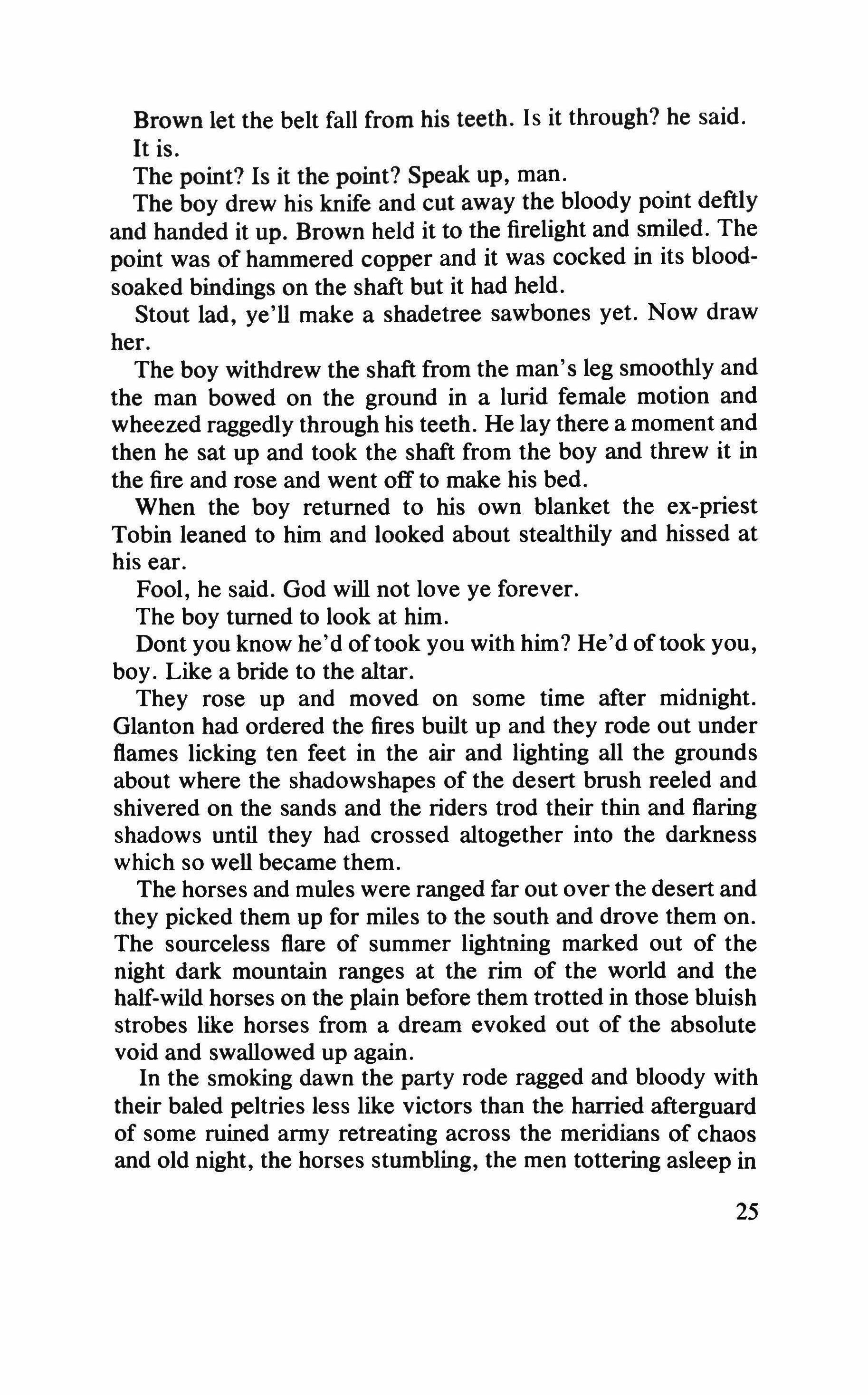
Brown let the belt fall from his teeth. Is it through? he said. It is.
The point? Is it the point? Speak up, man.
The boy drew his knife and cut away the bloody point deftly and handed it up. Brown held it to the firelight and smiled. The point was of hammered copper and it was cocked in its bloodsoaked bindings on the shaft but it had held.
Stout lad, ye'll make a shadetree sawbones yet. Now draw her.
The boy withdrew the shaft from the man's leg smoothly and the man bowed on the ground in a lurid female motion and wheezed raggedly through his teeth. He lay there a moment and then he sat up and took the shaft from the boy and threw it in the fire and rose and went off to make his bed.
When the boy returned to his own blanket the ex-priest Tobin leaned to him and looked about stealthily and hissed at his ear.
Fool, he said. God will not love ye forever.
The boy turned to look at him.
Dont you know he'd oftook you with him? He'd oftook you, boy. Like a bride to the altar.
They rose up and moved on some time after midnight. Glanton had ordered the fires built up and they rode out under flames licking ten feet in the air and lighting all the grounds about where the shadowshapes of the desert brush reeled and shivered on the sands and the riders trod their thin and flaring shadows until they had crossed altogether into the darkness which so well became them.
The horses and mules were ranged far out over the desert and they picked them up for miles to the south and drove them on. The sourceless flare of summer lightning marked out of the night dark mountain ranges at the rim of the world and the half-wild horses on the plain before them trotted in those bluish strobes like horses from a dream evoked out of the absolute void and swallowed up again.
In the smoking dawn the party rode ragged and bloody with their baled peltries less like victors than the harried afterguard of some ruined army retreating across the meridians of chaos and old night, the horses stumbling, the men tottering asleep in 25

the saddles. The broached day discovered the same barren countryside about and the smoke from their fires of the night before stood thin and windless to the north. The pale dust ofthe enemy who were to hound them to the gates of the city seemed no nearer and they shambled on through the rising heat driving the crazed horses before them.
Midmorning they watered at a stagnant pothole that had already been walked through by three hundred animals, the riders hazing them out of the water and dismounting to drink from their hats and then riding on again down the dry bed of the stream and clattering over the stony ground, dry rocks and boulders and then the desert soil again red and sandy and the constant mountains about them thinly grassed and grown with ocotillo and sotol and the secular aloes blooming like phantasmagoria in a fever land. At dusk they sent riders west to build fires on the prairie and the company lay down in the dark and slept while bats crossed silently overhead among the stars. When they rode on in the morning it was still dark and the horses all but fainting. Day found the heathen much advanced upon them. They fought their first stand the dawn following and they fought them running for eight days and nights on the plain and among the rocks in the mountains and from the walls and azoteas of abandoned haciendas and they lost not a man.
On that third night they crouched in the keep of old walls of melted mud with the fires of the enemy not a mile distant on the desert. The judge sat with the Apache boy before the fire and it watched everything with dark berry eyes and some of the men played with it and made it laugh and they gave itjerky and it sat chewing and watching gravely the figures that passed above it. The judge covered it with a blanket and in the morning he was dandling it on one knee while the men saddled their horses.
Toadvine saw him with the child as he passed with his saddle but when he came back ten minutes later the child was dead and the judge had scalped it. Toadvine put the muzzle of his pistol against the great dome of the judge's head.
Goddamn you, Holden.
You either shoot or take that away. Do it now.
Toadvine put the pistol in his belt. The judge smiled and wiped the child's scalp on the leg of his trousers and rose and
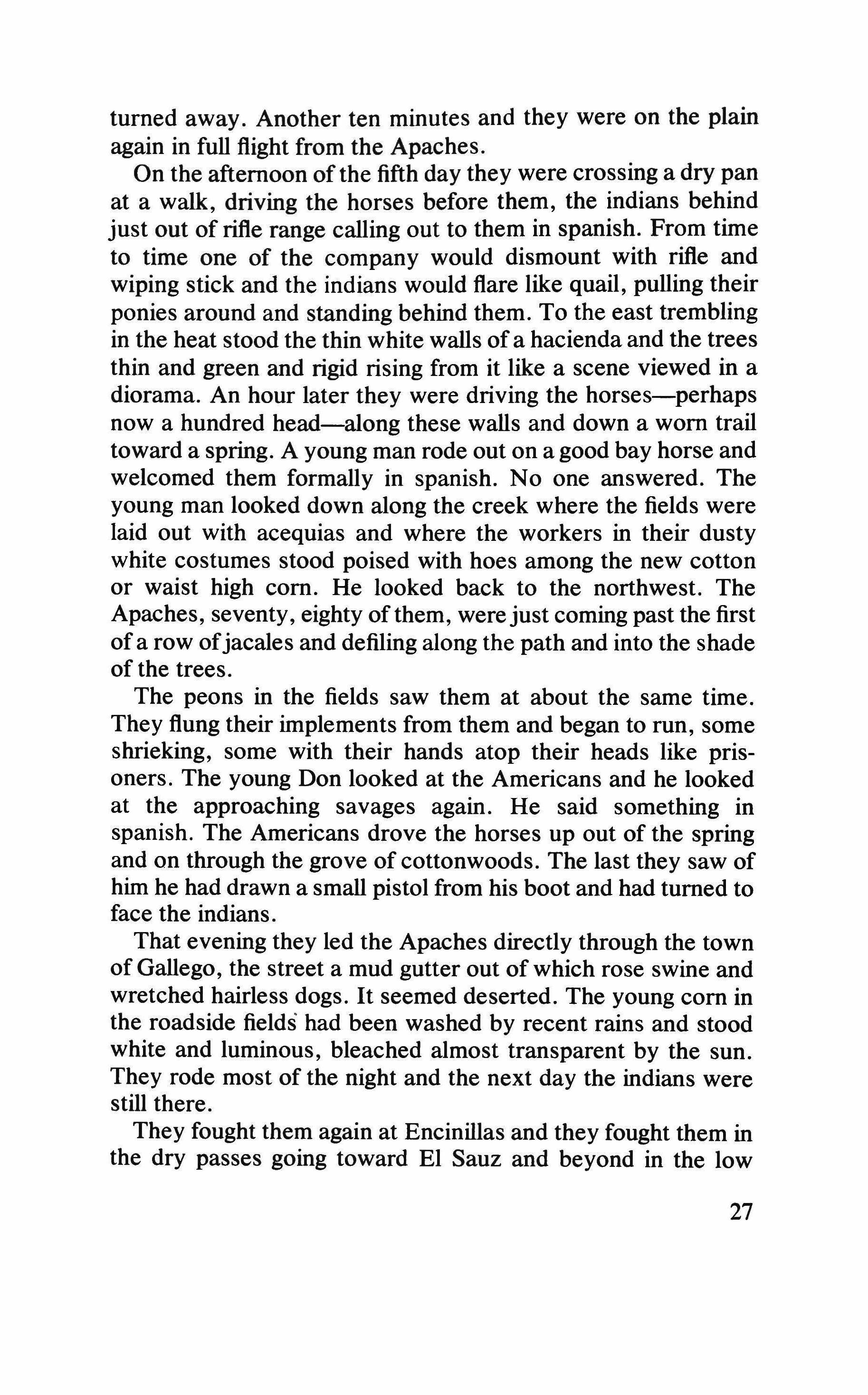
turned away. Another ten minutes and they were on the plain again in full flight from the Apaches.
On the afternoon ofthe fifth day they were crossing a dry pan at a walk, driving the horses before them, the indians behind just out of rifle range calling out to them in spanish. From time to time one of the company would dismount with rifle and wiping stick and the indians would flare like quail, pulling their ponies around and standing behind them. To the east trembling in the heat stood the thin white walls of a hacienda and the trees thin and green and rigid rising from it like a scene viewed in a diorama. An hour later they were driving the horses-perhaps now a hundred head-along these walls and down a worn trail toward a spring. A young man rode out on a good bay horse and welcomed them formally in spanish. Noone answered. The young man looked down along the creek where the fields were laid out with acequias and where the workers in their dusty white costumes stood poised with hoes among the new cotton or waist high com. He looked back to the northwest. The Apaches, seventy, eighty ofthem, were just coming past the first of a row ofjacales and defiling along the path and into the shade of the trees.
The peons in the fields saw them at about the same time. They flung their implements from them and began to run, some shrieking, some with their hands atop their heads like prisoners. The young Don looked at the Americans and he looked at the approaching savages again. He said something in spanish. The Americans drove the horses up out of the spring and on through the grove of cottonwoods. The last they saw of him he had drawn a small pistol from his boot and had turned to face the indians.
That evening they led the Apaches directly through the town of Gallego, the street a mud gutter out of which rose swine and wretched hairless dogs. It seemed deserted. The young com in the roadside fields had been washed by recent rains and stood white and luminous, bleached almost transparent by the sun. They rode most of the night and the next day the indians were still there.
They fought them again at Encinillas and they fought them in the dry passes going toward EI Sauz and beyond in the low
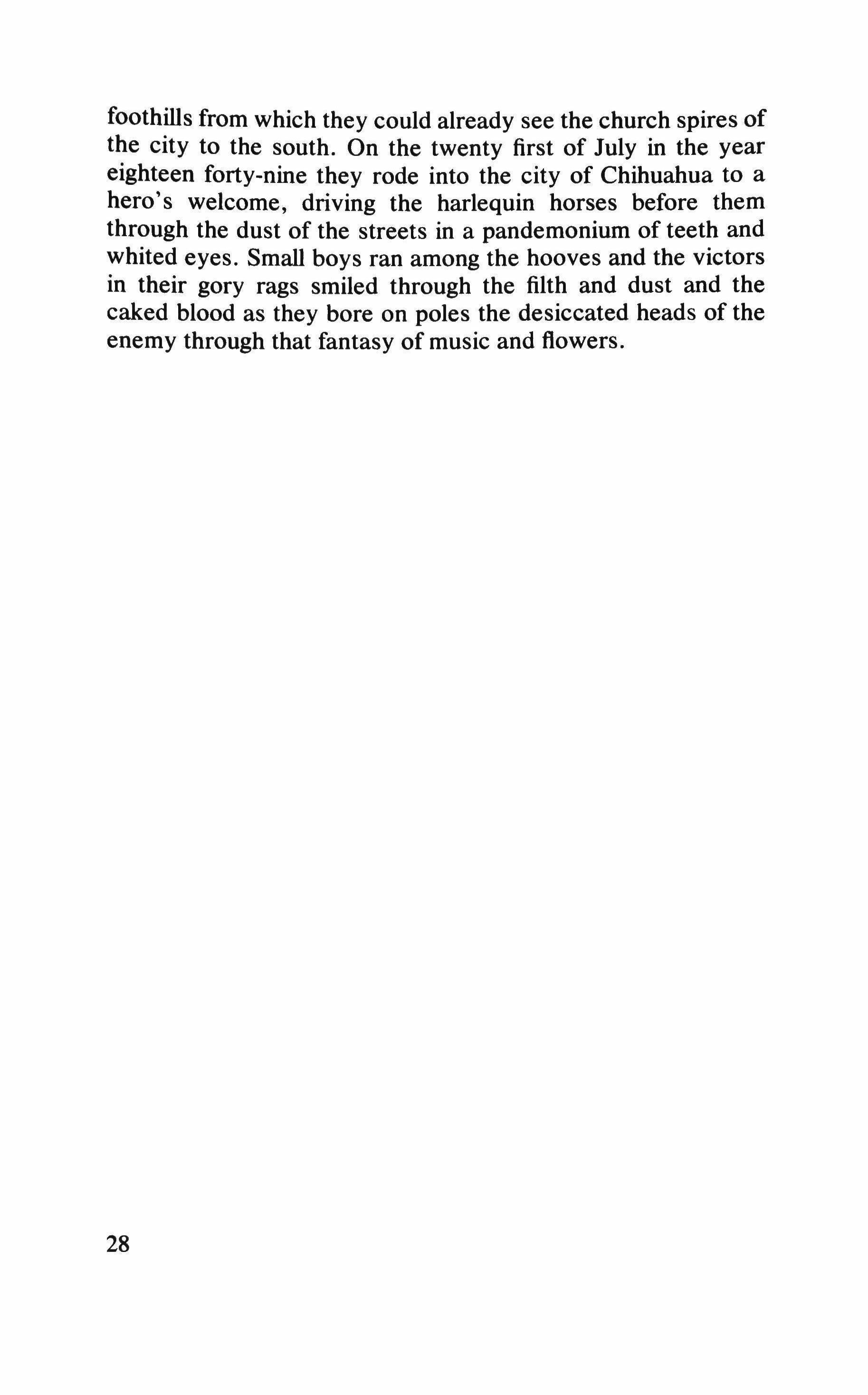
foothills from which they could already see the church spires of the city to the south. On the twenty first of July in the year eighteen forty-nine they rode into the city of Chihuahua to a hero's welcome, driving the harlequin horses before them through the dust of the streets in a pandemonium of teeth and whited eyes. Small boys ran among the hooves and the victors in their gory rags smiled through the filth and dust and the caked blood as they bore on poles the desiccated heads of the enemy through that fantasy of music and flowers.
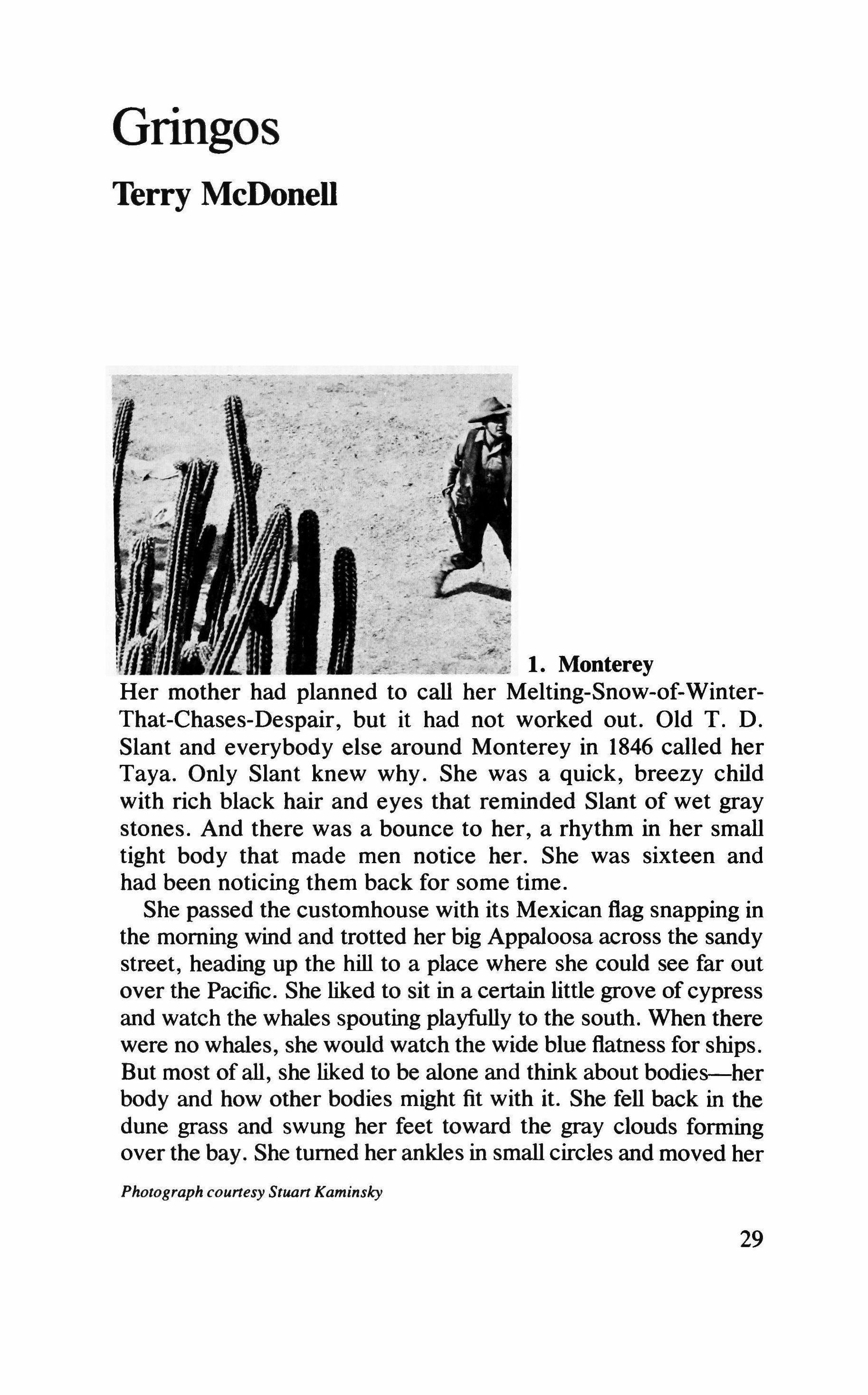
Her mother had planned to call her Melting-Snow-of-Winter
That-Chases-Despair, but it had not worked out. Old T. D. Slant and everybody else around Monterey in 1846 called her Taya. Only Slant knew why. She was a quick, breezy child with rich black hair and eyes that reminded Slant of wet gray stones. And there was a bounce to her, a rhythm in her small tight body that made men notice her. She was sixteen and had been noticing them back for some time.
She passed the customhouse with its Mexican flag snapping in the morning wind and trotted her big Appaloosa across the sandy street, heading up the hill to a place where she could see far out over the Pacific. She liked to sit in a certain little grove of cypress and watch the whales spouting playfully to the south. When there were no whales, she would watch the wide blue flatness for ships. But most of all, she liked to be alone and think about bodies-her body and how other bodies might fit with it. She fell back in the dune grass and swung her feet toward the gray clouds forming over the bay. She turned her ankles in small circles and moved her
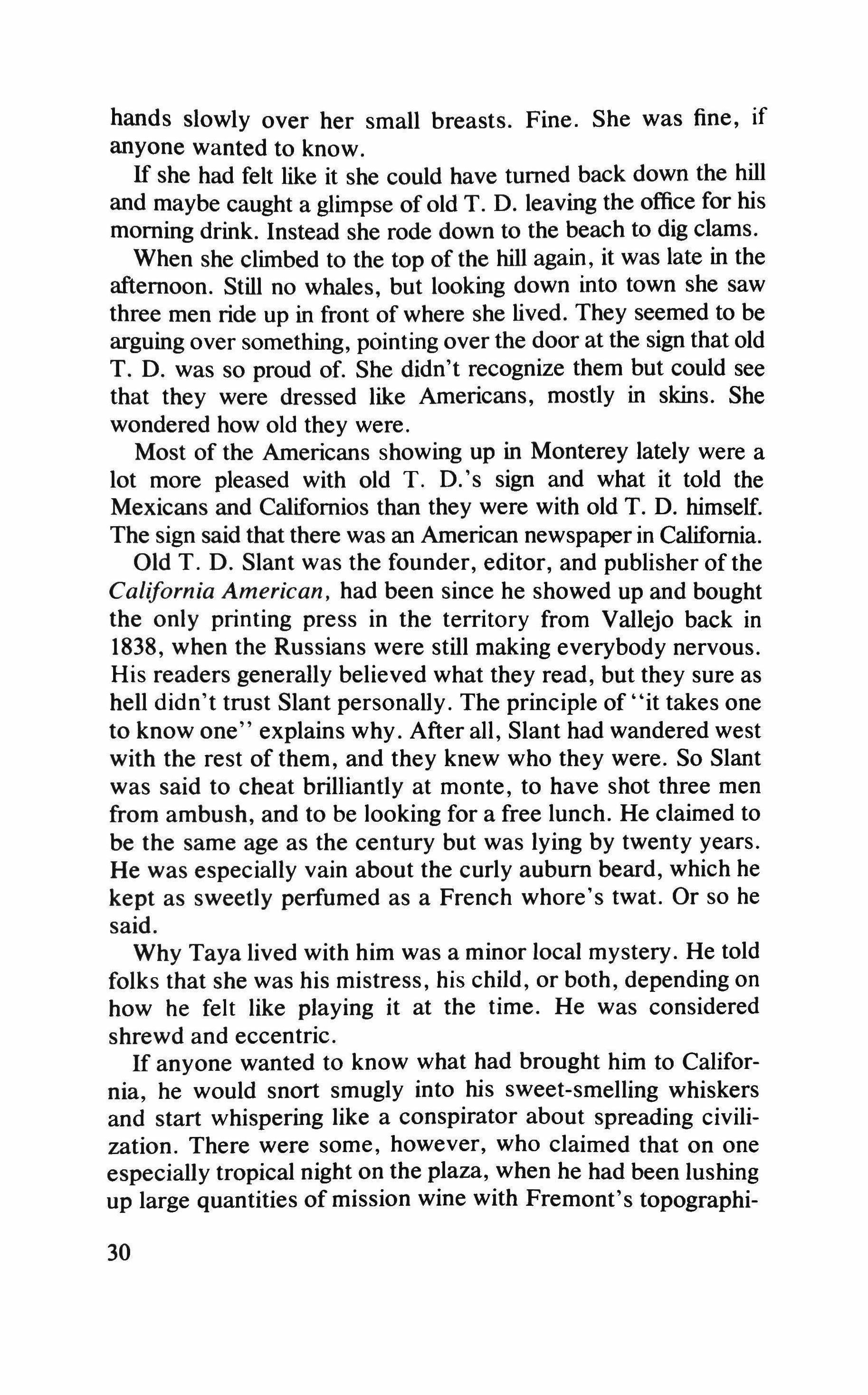
hands slowly over her small breasts. Fine. She was fine, if anyone wanted to know.
If she had felt like it she could have turned back down the hill and maybe caught a glimpse of old T. D. leaving the office for his morning drink. Instead she rode down to the beach to dig clams. When she climbed to the top of the hill again, it was late in the afternoon. Still no whales, but looking down into town she saw three men ride up in front of where she lived. They seemed to be arguing over something, pointing over the door at the sign that old T. D. was so proud of. She didn't recognize them but could see that they were dressed like Americans, mostly in skins. She wondered how old they were.
Most of the Americans showing up in Monterey lately were a lot more pleased with old T. D.'s sign and what it told the Mexicans and Californios than they were with old T. D. himself. The sign said that there was an American newspaper in California.
Old T. D. Slant was the founder, editor, and publisher of the California American, had been since he showed up and bought the only printing press in the territory from Vallejo back in 1838, when the Russians were still making everybody nervous. His readers generally believed what they read, but they sure as hell didn't trust Slant personally. The principle of''it takes one to know one" explains why. After all, Slant had wandered west with the rest of them, and they knew who they were. So Slant was said to cheat brilliantly at monte, to have shot three men from ambush, and to be looking for a free lunch. He claimed to be the same age as the century but was lying by twenty years. He was especially vain about the curly auburn beard, which he kept as sweetly perfumed as a French whore's twat. Or so he said.
Why Taya lived with him was a minor local mystery. He told folks that she was his mistress, his child, or both, depending on how he felt like playing it at the time. He was considered shrewd and eccentric.
If anyone wanted to know what had brought him to California, he would snort smugly into his sweet-smelling whiskers and start whispering like a conspirator about spreading civilization. There were some, however, who claimed that on one especially tropical night on the plaza, when he had been lushing up large quantities of mission wine with Fremont's topographi-
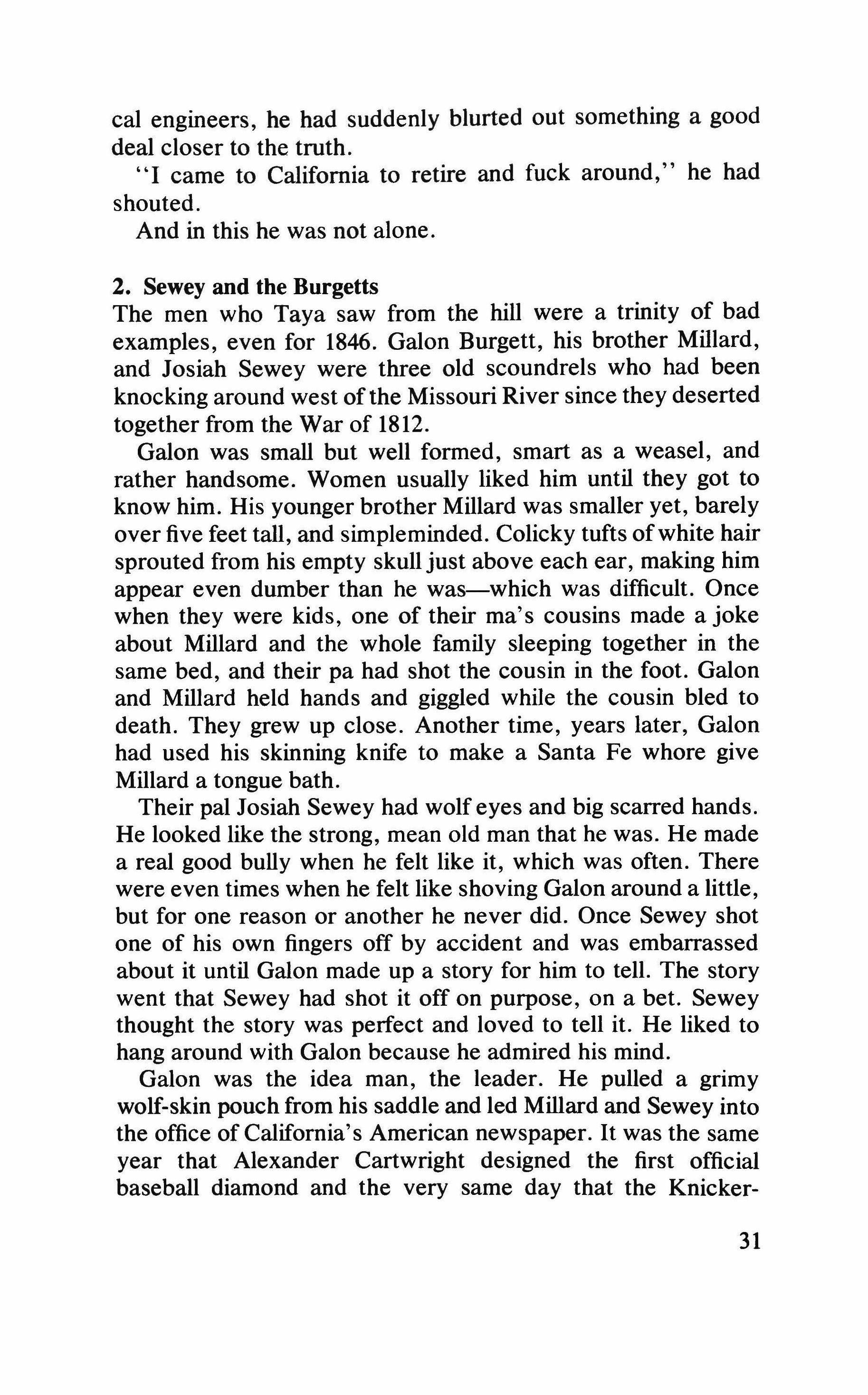
cal engineers, he had suddenly blurted out something a good deal closer to the truth.
"I came to California to retire and fuck around," he had shouted.
And in this he was not alone.
The men who Taya saw from the hill were a trinity of bad examples, even for 1846. Galon Burgett, his brother Millard, and Josiah Sewey were three old scoundrels who had been knocking around west ofthe Missouri River since they deserted together from the War of 1812.
Galon was small but well formed, smart as a weasel, and rather handsome. Women usually liked him until they got to know him. His younger brother Millard was smaller yet, barely over five feet tall, and simpleminded. Colicky tufts ofwhite hair sprouted from his empty skull just above each ear, making him appear even dumber than he was-which was difficult. Once when they were kids, one of their rna's cousins made a joke about Millard and the whole family sleeping together in the same bed, and their pa had shot the cousin in the foot. Galon and Millard held hands and giggled while the cousin bled to death. They grew up close. Another time, years later, Galon had used his skinning knife to make a Santa Fe whore give Millard a tongue bath.
Their pal Josiah Sewey had wolf eyes and big scarred hands. He looked like the strong, mean old man that he was. He made a real good bully when he felt like it, which was often. There were even times when he felt like shoving Galon around a little, but for one reason or another he never did. Once Sewey shot one of his own fingers off by accident and was embarrassed about it until Galon made up a story for him to tell. The story went that Sewey had shot it off on purpose, on a bet. Sewey thought the story was perfect and loved to tell it. He liked to hang around with Galon because he admired his mind.
Galon was the idea man, the leader. He pulled a grimy wolf-skin pouch from his saddle and led Millard and Sewey into the office of California's American newspaper. It was the same year that Alexander Cartwright designed the first official baseball diamond and the very same day that the Knicker-
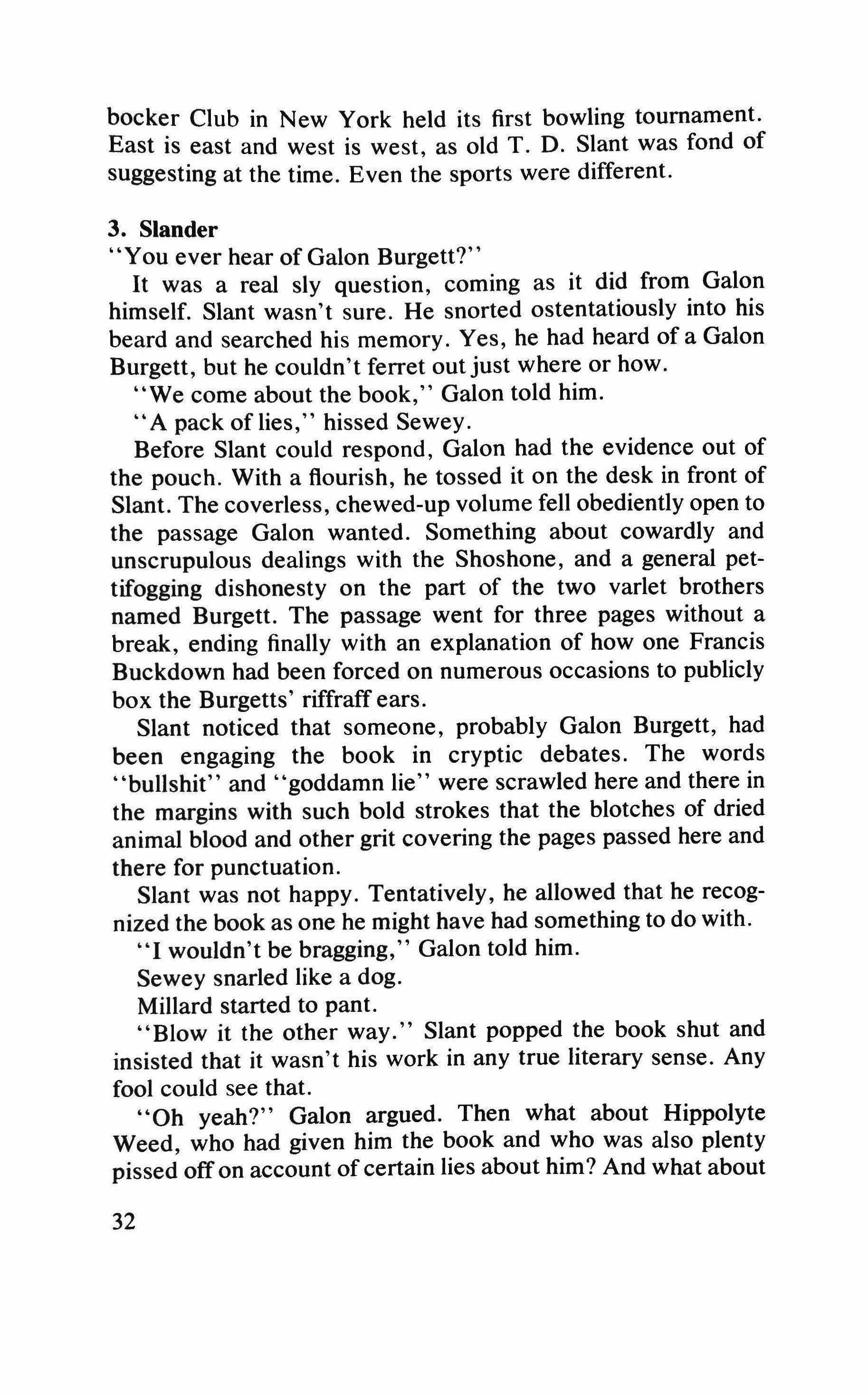
bocker Club in New York held its first bowling tournament. East is east and west is west, as old T. D. Slant was fond of suggesting at the time. Even the sports were different.
"You ever hear of Galon Burgett?"
It was a real sly question, coming as it did from Galon himself. Slant wasn't sure. He snorted ostentatiously into his beard and searched his memory. Yes, he had heard of a Galon Burgett, but he couldn't ferret out just where or how.
"We come about the book," Galon told him.
"A pack of lies," hissed Sewey.
Before Slant could respond, Galon had the evidence out of the pouch. With a flourish, he tossed it on the desk in front of Slant. The coverless, chewed-up volume fell obediently open to the passage Galon wanted. Something about cowardly and unscrupulous dealings with the Shoshone, and a general pettifogging dishonesty on the part of the two varlet brothers named Burgett. The passage went for three pages without a break, ending finally with an explanation of how one Francis Buckdown had been forced on numerous occasions to publicly box the Burgetts' riffraff ears.
Slant noticed that someone, probably Galon Burgett, had been engaging the book in cryptic debates. The words "bullshit" and "goddamn lie" were scrawled here and there in the margins with such bold strokes that the blotches of dried animal blood and other grit covering the pages passed here and there for punctuation.
Slant was not happy. Tentatively, he allowed that he recognized the book as one he might have had something to do with.
"I wouldn't be bragging," Galon told him.
Sewey snarled like a dog.
Millard started to pant.
"Blow it the other way." Slant popped the book shut and insisted that it wasn't his work in any true literary sense. Any fool could see that.
"Oh yeah?" Galon argued. Then what about Hippolyte Weed, who had given him the book and who was also plenty pissed off on account of certain lies about him? And what about
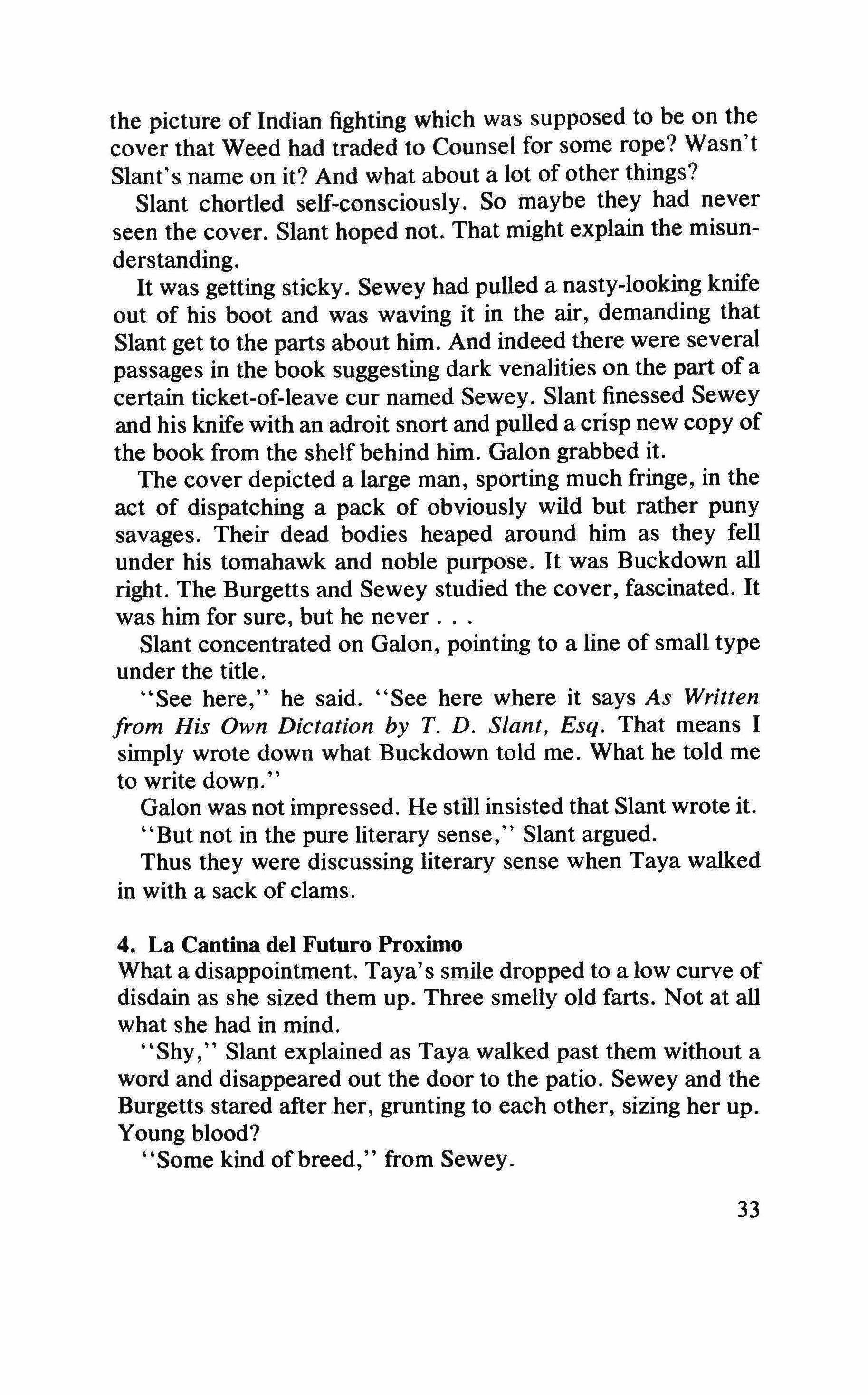
the picture of Indian fighting which was supposed to be on the cover that Weed had traded to Counsel for some rope? Wasn't Slant's name on it? And what about a lot of other things?
Slant chortled self-consciously. So maybe they had never seen the cover. Slant hoped not. That might explain the misunderstanding.
It was getting sticky. Sewey had pulled a nasty-looking knife out of his boot and was waving it in the air, demanding that Slant get to the parts about him. And indeed there were several passages in the book suggesting dark venalities on the part of a certain ticket-of-leave cur named Sewey. Slant finessed Sewey and his knife with an adroit snort and pulled a crisp new copy of the book from the shelf behind him. Galon grabbed it.
The cover depicted a large man, sporting much fringe, in the act of dispatching a pack of obviously wild but rather puny savages. Their dead bodies heaped around him as they fell under his tomahawk and noble purpose. It was Buckdown all right. The Burgetts and Sewey studied the cover, fascinated. It was him for sure, but he never Slant concentrated on Galon, pointing to a line of small type under the title.
"See here," he said. "See here where it says As Written from His Own Dictation by T. D. Slant, Esq. That means I simply wrote down what Buckdown told me. What he told me to write down."
Galon was not impressed. He still insisted that Slant wrote it.
"But not in the pure literary sense," Slant argued.
Thus they were discussing literary sense when Taya walked in with a sack of clams.
4. La Cantina del Futuro Proximo
What a disappointment. Taya's smile dropped to a low curve of disdain as she sized them up. Three smelly old farts. Not at all what she had in mind
Shy," Slant explained as Taya walked past them without a word and disappeared out the door to the patio. Sewey and the Burgetts stared after her, grunting to each other, sizing her up. Young blood?
"Some kind of breed," from Sewey.
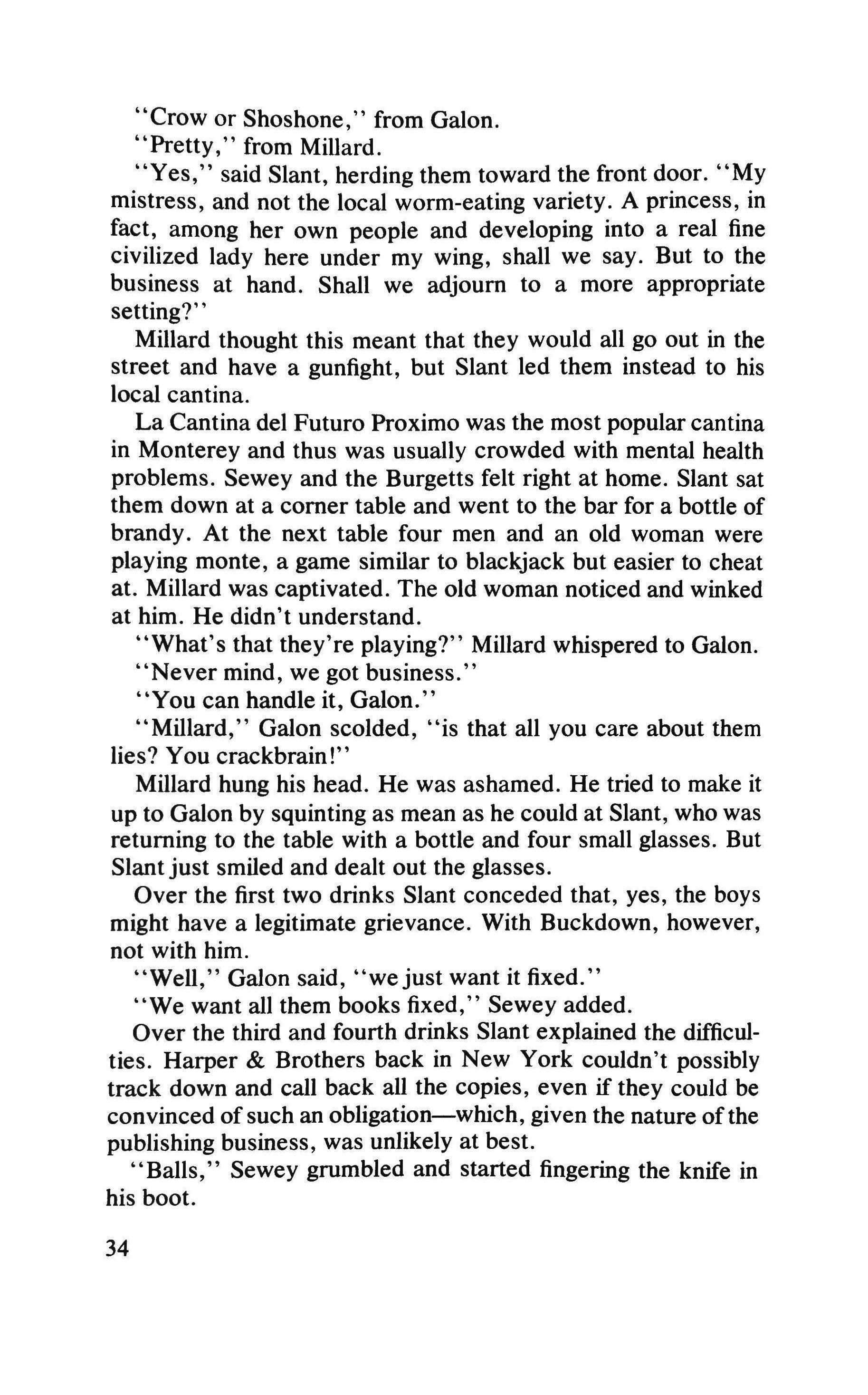
"Crow or Shoshone," from Galon. "Pretty," from Millard.
"Yes," said Slant, herding them toward the front door. "My mistress, and not the local worm-eating variety. A princess, in fact, among her own people and developing into a real fine civilized lady here under my wing, shall we say. But to the business at hand. Shall we adjourn to a more appropriate setting?"
Millard thought this meant that they would all go out in the street and have a gunfight, but Slant led them instead to his local cantina.
La Cantina del Futuro Proximo was the most popular cantina in Monterey and thus was usually crowded with mental health problems. Sewey and the Burgetts felt right at home. Slant sat them down at a comer table and went to the bar for a bottle of brandy. At the next table four men and an old woman were playing monte, a game similar to blackjack but easier to cheat at. Millard was captivated. The old woman noticed and winked at him. He didn't understand.
"What's that they're playing?" Millard whispered to Galon.
"Never mind, we got business."
"You can handle it, Galon."
"Millard," Galon scolded, "is that all you care about them lies? You crackbrain!"
Millard hung his head. He was ashamed. He tried to make it up to Galon by squinting as mean as he could at Slant, who was returning to the table with a bottle and four small glasses. But Slant just smiled and dealt out the glasses.
Over the first two drinks Slant conceded that, yes, the boys might have a legitimate grievance. With Buckdown, however, not with him.
"Well," Galon said, "we just want it fixed.
"We want all them books fixed," Sewey added.
Over the third and fourth drinks Slant explained the difficulties. Harper & Brothers back in New York couldn't possibly track down and call back all the copies, even if they could be convinced of such an obligation-which, given the nature ofthe publishing business, was unlikely at best.
"Balls," Sewey grumbled and started fingering the knife in his boot.
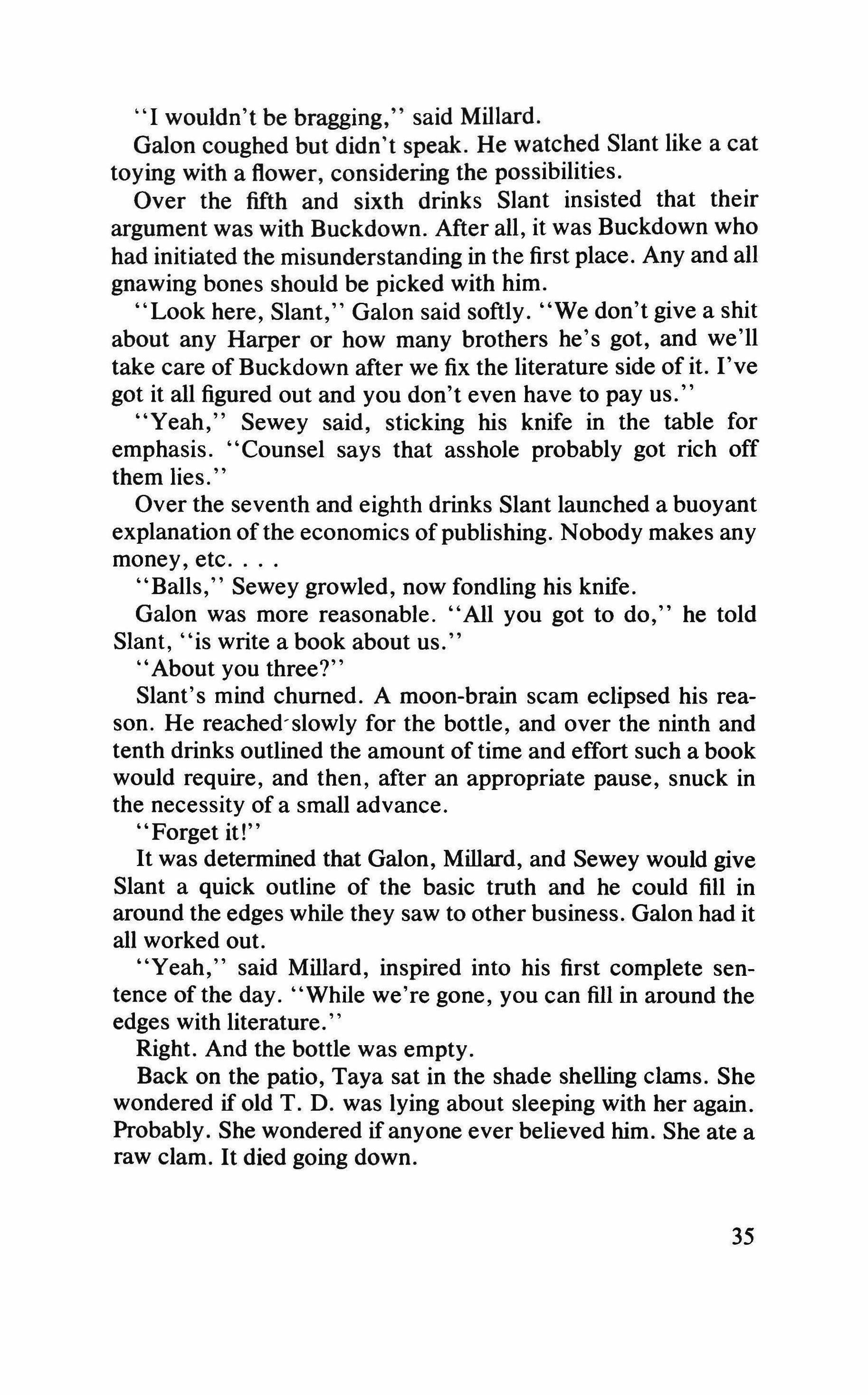
"I wouldn't be bragging," said Millard. Galon coughed but didn't speak. He watched Slant like a cat toying with a flower, considering the possibilities.
Over the fifth and sixth drinks Slant insisted that their argument was with Buckdown. After all, it was Buckdown who had initiated the misunderstanding in the first place. Any and all gnawing bones should be picked with him.
"Look here, Slant," Galon said softly. "We don't give a shit about any Harper or how many brothers he's got, and we'll take care of Buckdown after we fix the literature side of it. I've got it all figured out and you don't even have to pay us."
"Yeah," Sewey said, sticking his knife in the table for emphasis. "Counsel says that asshole probably got rich off them lies."
Over the seventh and eighth drinks Slant launched a buoyant explanation of the economics of publishing. Nobody makes any money, etc
"Balls," Sewey growled, now fondling his knife.
Galon was more reasonable. "All you got to do," he told Slant, "is write a book about us."
"About you three?"
Slant's mind churned. A moon-brain scam eclipsed his reason. He reached-slowly for the bottle, and over the ninth and tenth drinks outlined the amount of time and effort such a book would require, and then, after an appropriate pause, snuck in the necessity of a small advance.
"Forget it!"
It was determined that Galon, Millard, and Sewey would give Slant a quick outline of the basic truth and he could fill in around the edges while they saw to other business. Galon had it all worked out.
"Yeah," said Millard, inspired into his first complete sentence of the day. "While we're gone, you can fill in around the edges with literature."
Right. And the bottle was empty.
Back on the patio, Taya sat in the shade shelling clams. She wondered if old T. D. was lying about sleeping with her again. Probably. She wondered if anyone ever believed him. She ate a raw clam. It died going down.
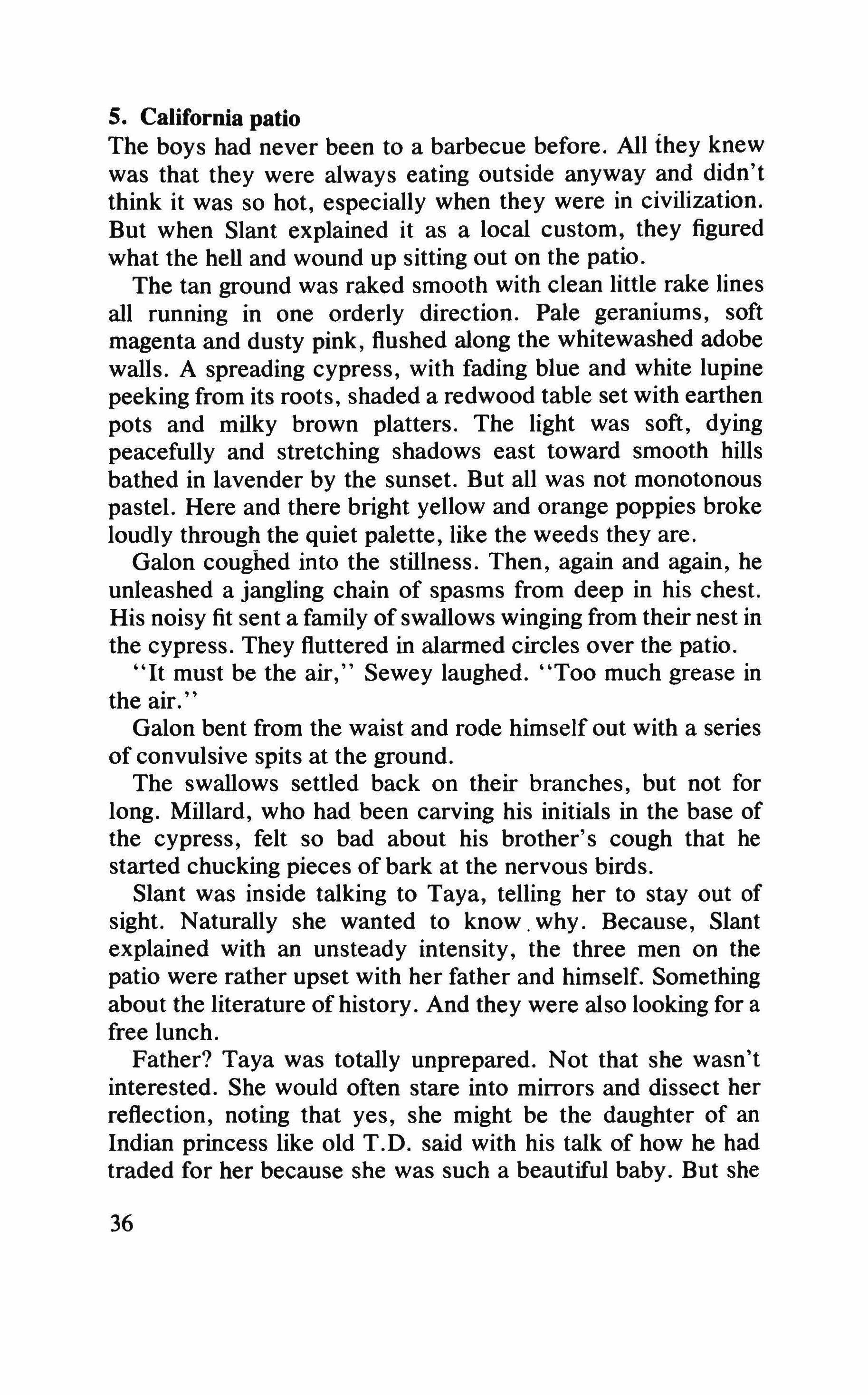
The boys had never been to a barbecue before. All they knew was that they were always eating outside anyway and didn't think it was so hot, especially when they were in civilization. But when Slant explained it as a local custom, they figured what the hell and wound up sitting out on the patio.
The tan ground was raked smooth with clean little rake lines all running in one orderly direction. Pale geraniums, soft magenta and dusty pink, flushed along the whitewashed adobe walls. A spreading cypress, with fading blue and white lupine peeking from its roots, shaded a redwood table set with earthen pots and milky brown platters. The light was soft, dying peacefully and stretching shadows east toward smooth hills bathed in lavender by the sunset. But all was not monotonous pastel. Here and there bright yellow and orange poppies broke loudly through the quiet palette, like the weeds they are.
Galon coughed into the stillness. Then, again and again, he unleashed a jangling chain of spasms from deep in his chest. His noisy fit sent a family of swallows winging from their nest in the cypress. They fluttered in alarmed circles over the patio. "It must be the air," Sewey laughed. "Too much grease in the air."
Galon bent from the waist and rode himself out with a series of convulsive spits at the ground.
The swallows settled back on their branches, but not for long. Millard, who had been carving his initials in the base of the cypress, felt so bad about his brother's cough that he started chucking pieces of bark at the nervous birds.
Slant was inside talking to Taya, telling her to stay out of sight. Naturally she wanted to know. why. Because, Slant explained with an unsteady intensity, the three men on the patio were rather upset with her father and himself. Something about the literature of history. And they were also looking for a free lunch.
Father? Taya was totally unprepared. Not that she wasn't interested. She would often stare into mirrors and dissect her reflection, noting that yes, she might be the daughter of an Indian princess like old T.D. said with his talk of how he had traded for her because she was such a beautiful baby. But she
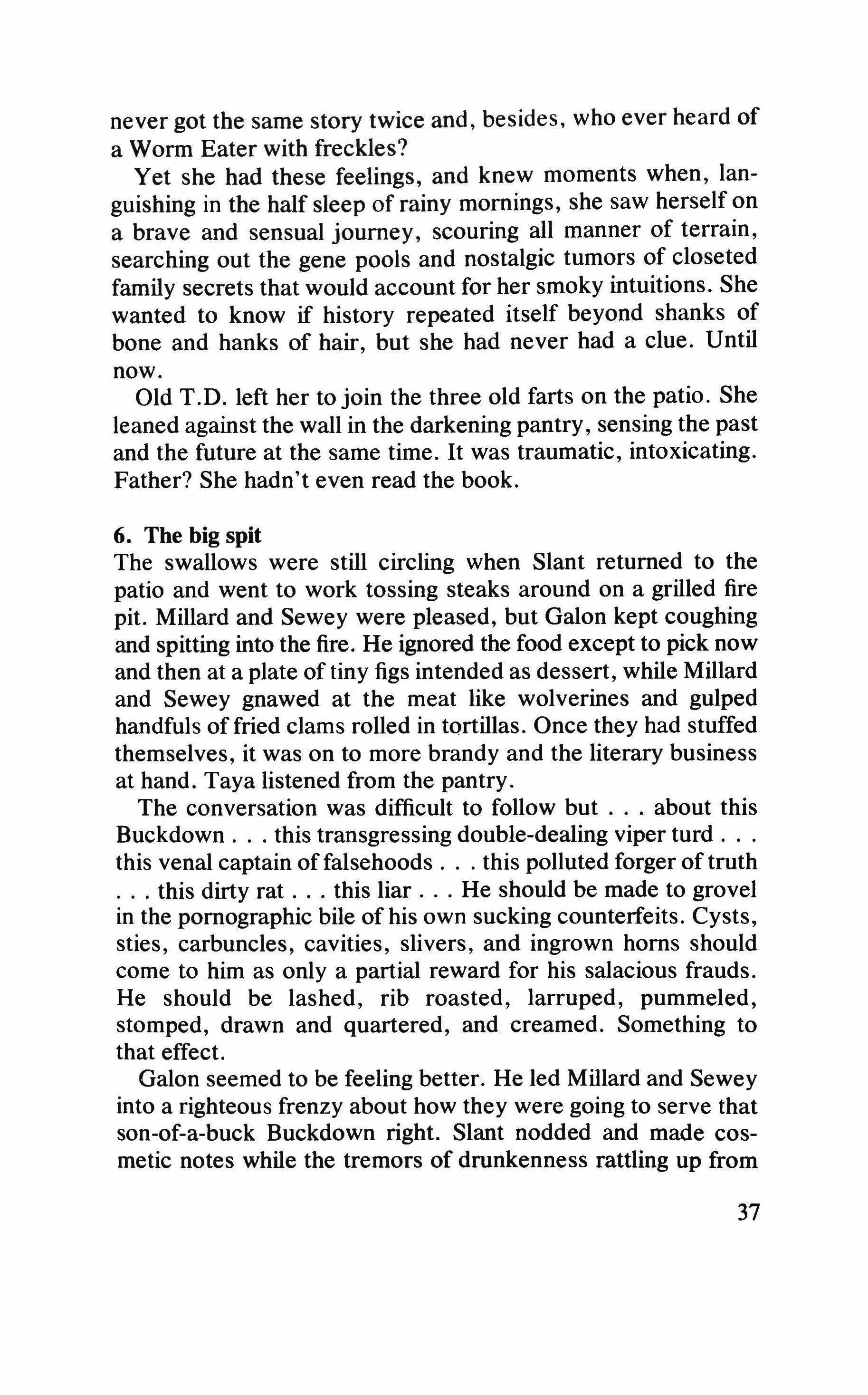
never got the same story twice and, besides, who ever heard of a Worm Eater with freckles?
Yet she had these feelings, and knew moments when, languishing in the half sleep of rainy mornings, she saw herself on a brave and sensual journey, scouring all manner of terrain, searching out the gene pools and nostalgic tumors of closeted family secrets that would account for her smoky intuitions. She wanted to know if history repeated itself beyond shanks of bone and hanks of hair, but she had never had a clue. Until now.
Old T.D. left her to join the three old farts on the patio. She leaned against the wall in the darkening pantry, sensing the past and the future at the same time. It was traumatic, intoxicating. Father? She hadn't even read the book.
The swallows were still circling when Slant returned to the patio and went to work tossing steaks around on a grilled fire pit. Millard and Sewey were pleased, but Galon kept coughing and spitting into the fire. He ignored the food except to pick now and then at a plate of tiny figs intended as dessert, while Millard and Sewey gnawed at the meat like wolverines and gulped handfuls of fried clams rolled in tortillas. Once they had stuffed themselves, it was on to more brandy and the literary business at hand. Taya listened from the pantry.
The conversation was difficult to follow but about this Buckdown this transgressing double-dealing viper turd this venal captain of falsehoods this polluted forger of truth this dirty rat this liar He should be made to grovel in the pornographic bile of his own sucking counterfeits. Cysts, sties, carbuncles, cavities, slivers, and ingrown horns should come to him as only a partial reward for his salacious frauds. He should be lashed, rib roasted, larruped, pummeled, stomped, drawn and quartered, and creamed. Something to that effect.
Galon seemed to be feeling better. He led Millard and Sewey into a righteous frenzy about how they were going to serve that son-of-a-buck Buckdown right. Slant nodded and made cosmetic notes while the tremors of drunkenness rattling up from
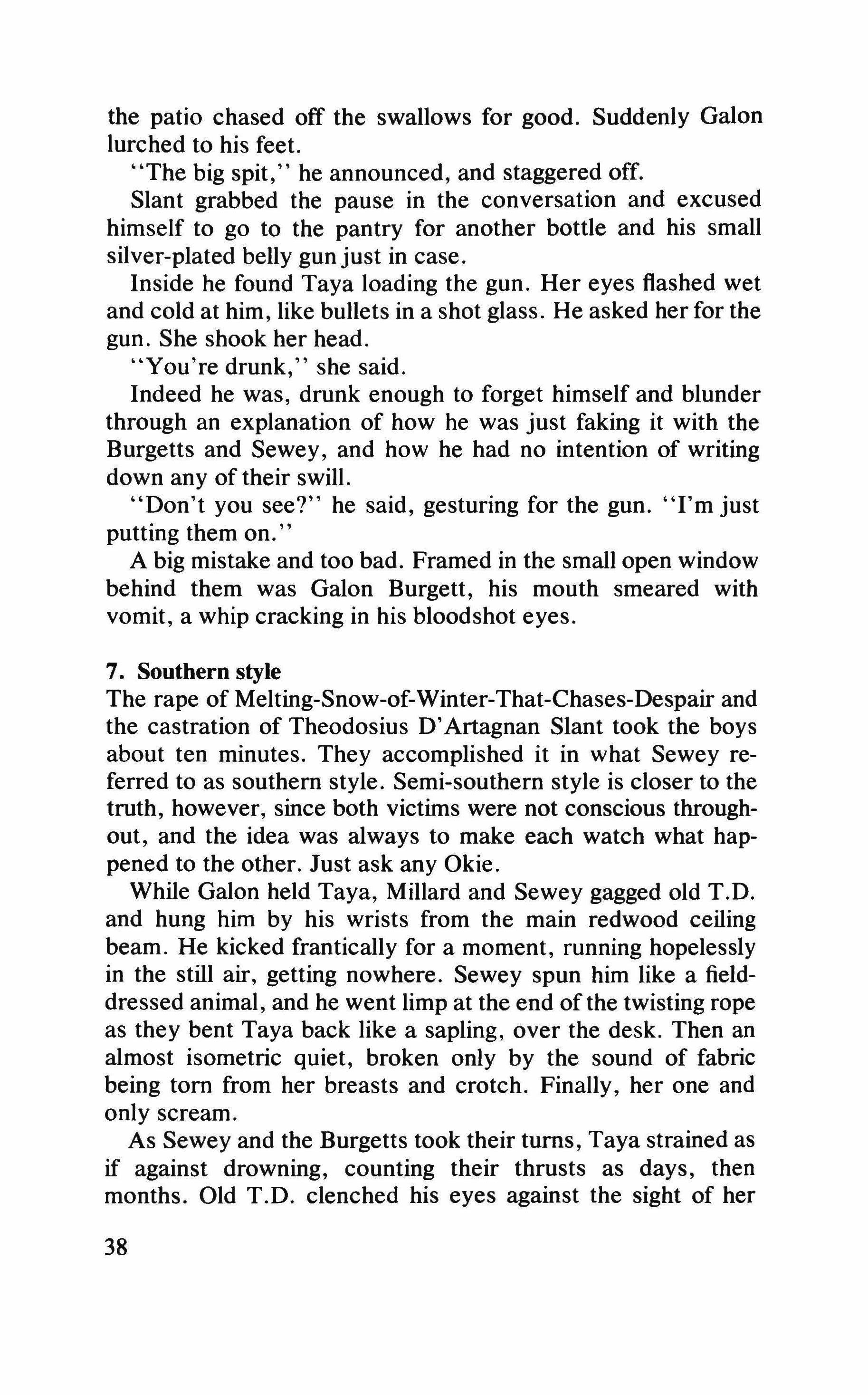
the patio chased off the swallows for good. Suddenly Galon lurched to his feet.
"The big spit," he announced, and staggered off.
Slant grabbed the pause in the conversation and excused himself to go to the pantry for another bottle and his small silver-plated belly gun just in case.
Inside he found Taya loading the gun. Her eyes flashed wet and cold at him, like bullets in a shot glass. He asked her for the gun. She shook her head.
"You're drunk," she said.
Indeed he was, drunk enough to forget himself and blunder through an explanation of how he was just faking it with the Burgetts and Sewey, and how he had no intention of writing down any of their swill.
"Don't you see?" he said, gesturing for the gun. ''I'm just putting them on.
A big mistake and too bad. Framed in the small open window behind them was Galon Burgett, his mouth smeared with vomit, a whip cracking in his bloodshot eyes.
The rape of Melting-Snow-of-Winter-That-Chases-Despair and the castration of Theodosius D'Artagnan Slant took the boys about ten minutes. They accomplished it in what Sewey referred to as southern style. Semi-southern style is closer to the truth, however, since both victims were not conscious throughout, and the idea was always to make each watch what happened to the other. Just ask any Okie.
While Galon held Taya, Millard and Sewey gagged old T.D. and hung him by his wrists from the main redwood ceiling beam. He kicked frantically for a moment, running hopelessly in the still air, getting nowhere. Sewey spun him like a fielddressed animal, and he went limp at the end of the twisting rope as they bent Taya back like a sapling, over the desk. Then an almost isometric quiet, broken only by the sound of fabric being tom from her breasts and crotch. Finally, her one and only scream.
As Sewey and the Burgetts took their turns, Taya strained as if against drowning, counting their thrusts as days, then months. Old T.D. clenched his eyes against the sight of her
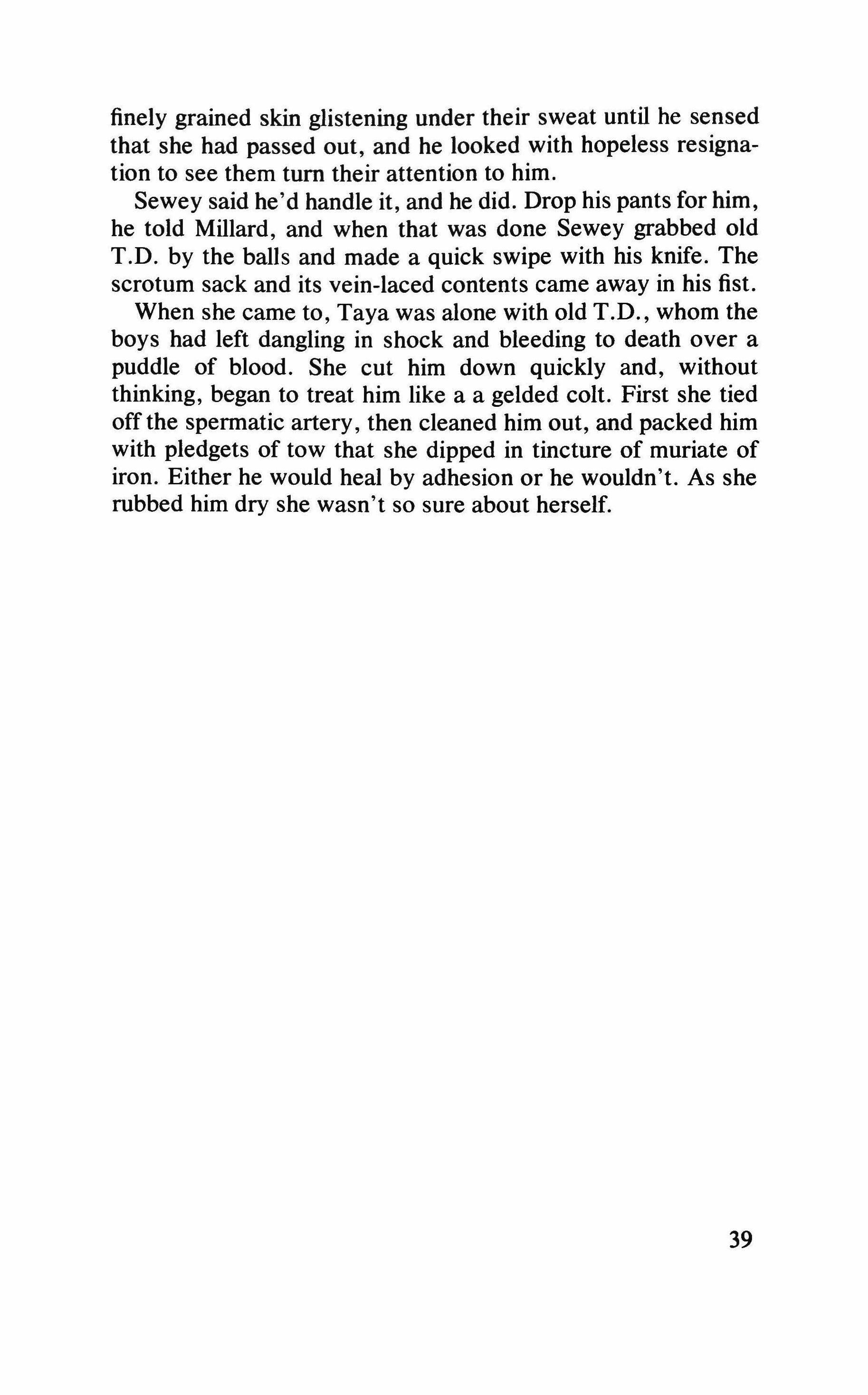
finely grained skin glistening under their sweat until he sensed that she had passed out, and he looked with hopeless resignation to see them turn their attention to him.
Sewey said he'd handle it, and he did. Drop his pants for him, he told Millard, and when that was done Sewey grabbed old T.D. by the balls and made a quick swipe with his knife. The scrotum sack and its vein-laced contents came away in his fist.
When she came to, Taya was alone with old T.D., whom the boys had left dangling in shock and bleeding to death over a puddle of blood. She cut him down quickly and, without thinking, began to treat him like a a gelded colt. First she tied off the spermatic artery, then cleaned him out, and packed him with pledgets of tow that she dipped in tincture of muriate of iron. Either he would heal by adhesion or he wouldn't. As she rubbed him dry she wasn't so sure about herself.
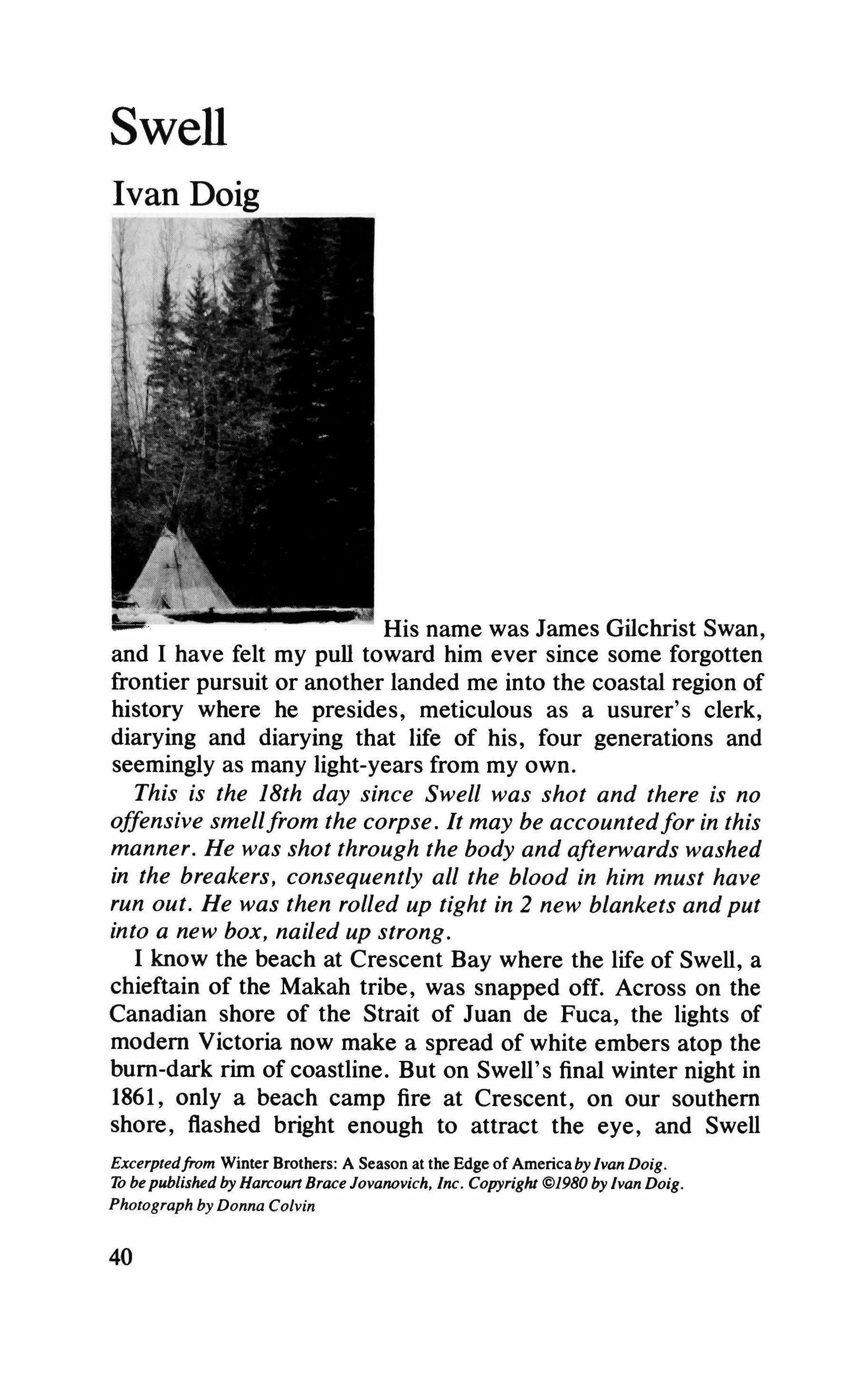
His name was James Gilchrist Swan, and I have felt my pull toward him ever since some forgotten frontier pursuit or another landed me into the coastal region of history where he presides, meticulous as a usurer's clerk, diarying and diarying that life of his, four generations and seemingly as many light-years from my own.
This is the 18th day since Swell was shot and there is no offensive smellfrom the corpse. It may be accountedfor in this manner. He was shot through the body and afterwards washed in the breakers, consequently all the blood in him must have run out. He was then rolled up tight in 2 new blankets and put into a new box, nailed up strong.
I know the beach at Crescent Bay where the life of Swell, a chieftain of the Makah tribe, was snapped off. Across on the Canadian shore of the Strait of Juan de Fuca, the lights of modern Victoria now make a spread of white embers atop the burn-dark rim of coastline. But on Swell's final winter night in 1861, only a beach camp fire at Crescent, on our southern shore, flashed bright enough to attract the eye, and Swell
Excerptedfrom Winter Brothers: A Season at the Edge of America by Ivan Doig.
To be published by Harcourt Brace Jovanovich, Inc. Copyright ©1980 by Ivan Doig. Photograph by Donna Colvin
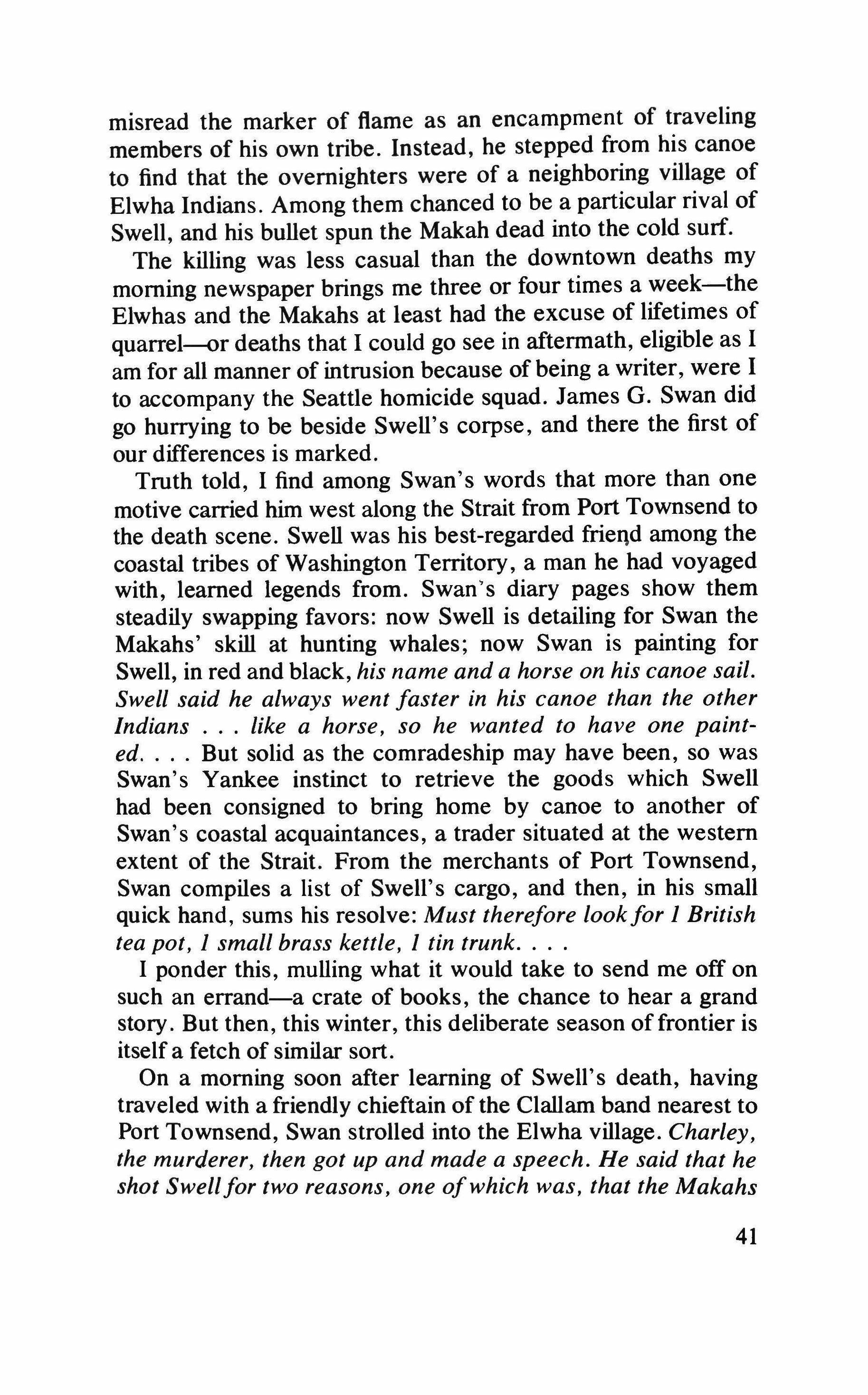
misread the marker of flame as an encampment of traveling members of his own tribe. Instead, he stepped from his canoe to find that the overnighters were of a neighboring village of Elwha Indians. Among them chanced to be a particular rival of Swell, and his bullet spun the Makah dead into the cold surf.
The killing was less casual than the downtown deaths my morning newspaper brings me three or four times a week-the Elwhas and the Makahs at least had the excuse of lifetimes of quarrel--or deaths that I could go see in aftermath, eligible as I am for all manner of intrusion because of being a writer, were I to accompany the Seattle homicide squad. James G. Swan did go hurrying to be beside Swell's corpse, and there the first of our differences is marked.
Truth told, I find among Swan's words that more than one motive carried him west along the Strait from Port Townsend to the death scene. Swell was his best-regarded friend among the coastal tribes of Washington Territory, a man he had voyaged with, learned legends from. Swan's diary pages show them steadily swapping favors: now Swell is detailing for Swan the Makahs' skill at hunting whales; now Swan is painting for Swell, in red and black, his name and a horse on his canoe sail. Swell said he always went faster in his canoe than the other Indians like a horse, so he wanted to have one painted But solid as the comradeship may have been, so was Swan's Yankee instinct to retrieve the goods which Swell had been consigned to bring home by canoe to another of Swan's coastal acquaintances, a trader situated at the western extent of the Strait. From the merchants of Port Townsend, Swan compiles a list of Swell's cargo, and then, in his small quick hand, sums his resolve: Must therefore lookfor 1 British tea pot, 1 small brass kettle, 1 tin trunk
I ponder this, mulling what it would take to send me off on such an errand-a crate of books, the chance to hear a grand story. But then, this winter, this deliberate season of frontier is itself a fetch of similar sort.
On a morning soon after learning of Swell's death, having traveled with a friendly chieftain of the Clallam band nearest to Port Townsend, Swan strolled into the Elwha village. Charley, the murderer, then got up and made a speech. He said that he shot Swellfor two reasons, one ofwhich was, that the Makahs
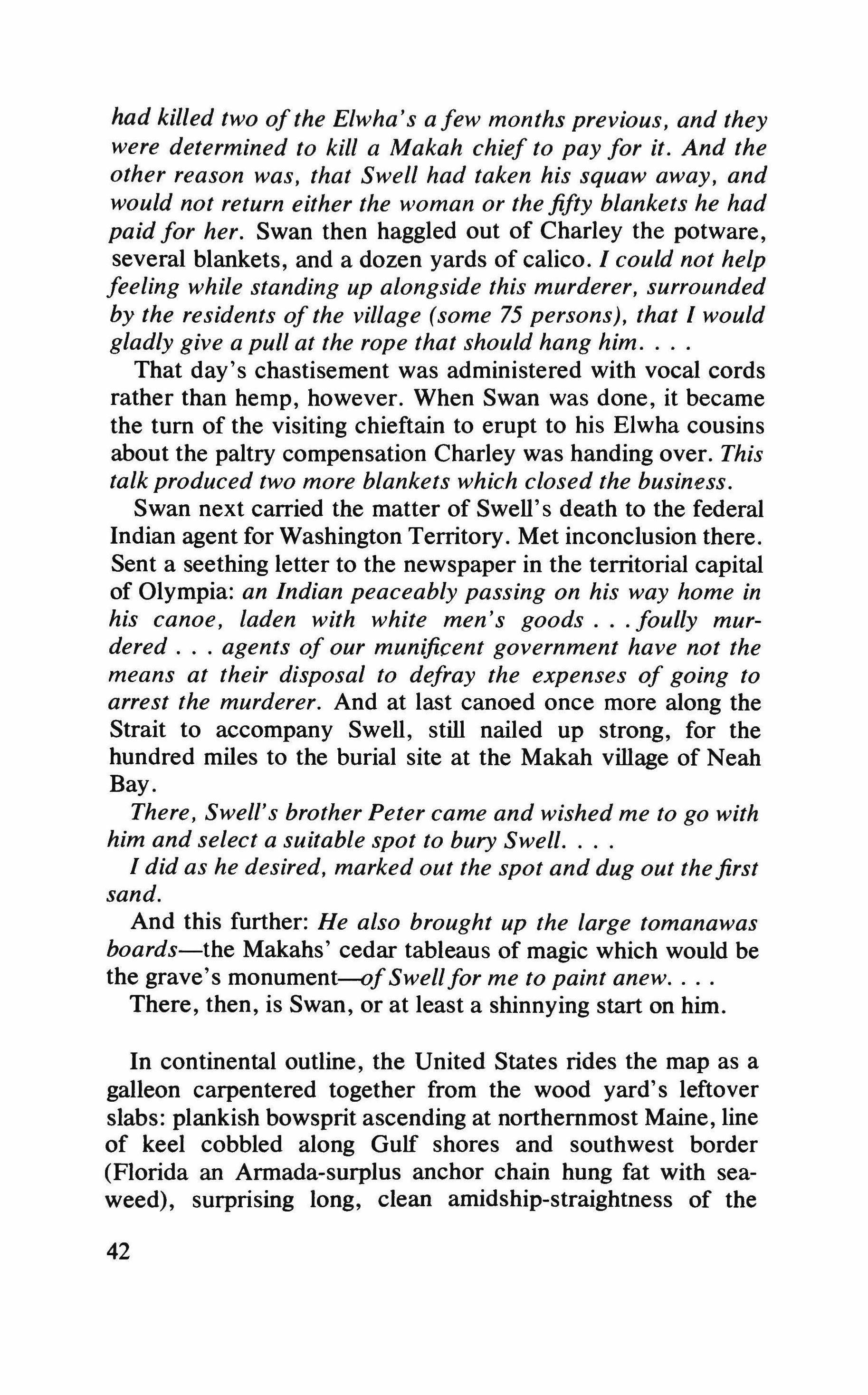
had killed two ofthe Elwha's a few months previous, and they were determined to kill a Makah chief to pay for it. And the other reason was, that Swell had taken his squaw away, and would not return either the woman or the fifty blankets he had paidfor her. Swan then haggled out of Charley the potware, several blankets, and a dozen yards of calico. I could not help feeling while standing up alongside this murderer, surrounded by the residents of the village (some 75 persons), that I would gladly give a pull at the rope that should hang him
That day's chastisement was administered with vocal cords rather than hemp, however. When Swan was done, it became the tum of the visiting chieftain to erupt to his Elwha cousins about the paltry compensation Charley was handing over. This talk produced two more blankets which closed the business.
Swan next carried the matter of Swell's death to the federal Indian agent for Washington Territory. Met inconclusion there. Sent a seething letter to the newspaper in the territorial capital of Olympia: an Indian peaceably passing on his way home in his canoe, laden with white men's goods foully murdered agents of our munificent government have not the means at their disposal to defray the expenses of going to arrest the murderer. And at last canoed once more along the Strait to accompany Swell, still nailed up strong, for the hundred miles to the burial site at the Makah village of Neah Bay.
There, Swell's brother Peter came and wished me to go with him and select a suitable spot to bury Swell I did as he desired, marked out the spot and dug out thefirst sand.
And this further: He also brought up the large tomanawas boards-the Makahs' cedar tableaus of magic which would be the grave's monument-ofSwellfor me to paint anew
There, then, is Swan, or at least a shinnying start on him.
In continental outline, the United States rides the map as a galleon carpentered together from the wood yard's leftover slabs: plankish bowsprit ascending at northernmost Maine, line of keel cobbled along Gulf shores and southwest border (Florida an Armada-surplus anchor chain hung fat with seaweed), surprising long, clean amidship-straightness of the

49th parallel across the upper Midwest and West. This patchwork ship of states is, by chance, prowing eastward. Or as I prefer to think of it, forecastle and bow are a-wallow in the Atlantic while great lifting tides gather beneath our Pacific portion of the craft.
But trace to the last of this land vessel at the westernmost reach of the state of Washington, to the final briefest tacked-on deckline of peninsula. There is Cape Flattery, where the Makahs of James G. Swan's years lived and where I am traveling today.
Towns thin down abruptly along this farthest-west promontory. In the sixty-five-mile stretch beyond Port Angeles there are only three-Clallam Bay; within sight of it, Sekiu; then, after fifteen final miles of dodgy road, Neah Bay-and each one tightly hugs some cove on the northern shoreline of the Olympic Peninsula, as if grateful to have been rolled ashore out of the cold, wallowing waters of the Strait.
The tiny communities exist on logging and on seasonal salmon fishing; and, as such places do, they produce ample vacant time for their citizens to eye one another. The man beside me this morning at the Sekiu cafe counter was working his way through hash browns, sunny-side eggs, toast, sausage, coffee, and vehemence.
"That kid," he grumped across the room to the waitress, "that kid never did make much of a showing for himselfaround here. Glad to see him gone." An instant later, of someone else: "Never liked that lamebrained SOB anyway." Fork and tongue flashed in a close contest: whether his meal or the local population would be chomped through first.
At Neah Bay, now at mid-morning, I am the one looked at, for my red beard and black watch cap. The Makahs of Neah Bay have been studying odd white faces in their streets for the past two hundred years. One story is that an early Russian sailing vessel had smashed ashore at Cape Flattery, and Swan believed that those survivors, and probably other voyagers, had left their genetic calling cards. (Of the Makahs, he noted, some have black hair; very dark brown eyes, almost black; high cheek-bones, and dark copper-colored skin; others have reddish hair, and a few, particularly among the children, light flaxen locks.) It is definite that Spanish mariners arrived in
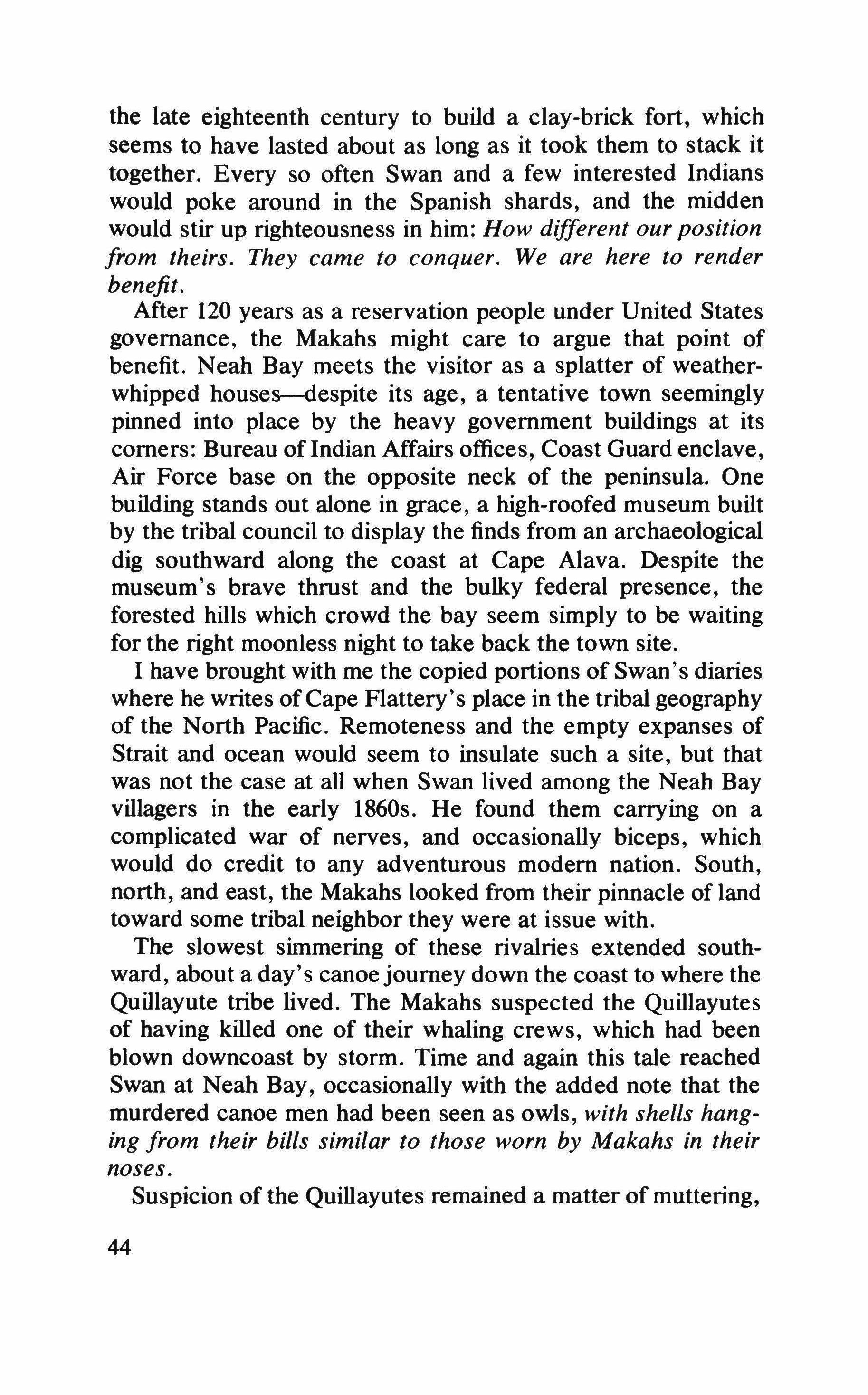
the late eighteenth century to build a clay-brick fort, which seems to have lasted about as long as it took them to stack it together. Every so often Swan and a few interested Indians would poke around in the Spanish shards, and the midden would stir up righteousness in him: How different our position from theirs. They came to conquer. We are here to render benefit.
After 120 years as a reservation people under United States governance, the Makahs might care to argue that point of benefit. Neah Bay meets the visitor as a splatter of weatherwhipped houses--despite its age, a tentative town seemingly pinned into place by the heavy government buildings at its comers: Bureau of Indian Affairs offices, Coast Guard enclave, Air Force base on the opposite neck of the peninsula. One building stands out alone in grace, a high-roofed museum built by the tribal council to display the finds from an archaeological dig southward along the coast at Cape Alava. Despite the museum's brave thrust and the bulky federal presence, the forested hills which crowd the bay seem simply to be waiting for the right moonless night to take back the town site.
I have brought with me the copied portions of Swan's diaries where he writes ofCape Flattery's place in the tribal geography of the North Pacific. Remoteness and the empty expanses of Strait and ocean would seem to insulate such a site, but that was not the case at all when Swan lived among the Neah Bay villagers in the early 1860s. He found them carrying on a complicated war of nerves, and occasionally biceps, which would do credit to any adventurous modem nation. South, north, and east, the Makahs looked from their pinnacle of land toward some tribal neighbor they were at issue with.
The slowest simmering of these rivalries extended southward, about a day's canoe journey down the coast to where the Quillayute tribe lived. The Makahs suspected the Quillayutes of having killed one of their whaling crews, which had been blown downcoast by storm. Time and again this tale reached Swan at Neah Bay, occasionally with the added note that the murdered canoe men had been seen as owls, with shells hanging from their bills similar to those worn by Makahs in their noses.
Suspicion of the Quillayutes remained a matter of muttering,

however. With the Elwha tribe, east along the Strait, the galling issue was their killing of Swell, and it rankled hard and often. In Swan's diary pages, Neah Bay jousts repeatedly with Elwha over the dead young chieftain. Early on, Swan and a Makah canoe crew returning from Port Townsend brought back with them an Elwha chief who wanted to talk peace. The Elwha breakfasted with Swell's brother Peter, everyone seemed to be pleasant andfriendly, but the point was sledged home to the Elwhas. It is generally understood that ifthey will kill Charley, entire peace will be restored.
Weeks later, Elwhas came to parley some more, to no further result. Months later, a Makah elder suddenly announced that he would set fire to Swell's monument because the white men had not arranged vengeance for his murder.
In evident inspiration, the Makahs now scored a move: Today Peter stole a squawfrom Capt. Jack, one ofthe Clallam Indians who was here on a visit. The squaw was part Elwha, and Peter took her as a hostage to enforce payfrom the Elwhas for robbing and killing Swell a year and a halfago.
The ransom fell through-one of the Makah tribal elders allowed the woman to escape. Peter came to me today with a very heavy heart in consequence of the squaw having absconded.
Just then, the attention of the Makahs pivoted abruptly northward, across the Strait. Word came that one of their number had killed a chief of the Arhosett tribe on the west coast of Vancouver Island Sah tay hub, getting angry because the Arhosett Indian would not agree to his terms, stabbed him with his knife.
Here was a bladed version of Swell's death, this time with the Makahs on the delivering end, and Swan records Neah Bay's jitters about the Arhosetts voyaging down on them in revenge: a whooping andyelling all night occasionallyfiring off guns to show their bravery. No enemy however appeared.
Tension now on two fronts, and during a potlatch at Neah Bay a number of tribesmen from the outlying Makah villages said they wanted peace at least with the Elwhas. But Peter said that he would never be satisfied until he received pay in some shapefor the murder ofhis brother
Next, however, intelligence reached the Makahs-and, of

course, Swan's pen-that the Arhosetts were having their own problems of pride. Thisforenoon Frank told me that he hadjust received news from his father, old Cedakanim of Clyoquot. It appears that the Arhosett Indians have been trying to induce the Clyoquots to join them in an attack on the Makahs They offered 100 blankets and 20 Makah women as slaves provided they could catch them. Cedakanim and the other Clyoquot chiefrejected this offer and demanded a steamboat, a sawmill, and a barrell of gold. This difference of opinion came near resulting in a fight but at length old Cedakanim told them he would not fight the Makahs nor did he want any pay from the Arhosetts as he was much richer than they and to prove this he ordered 100 pieces of blubber to be given them This, said Frank, made the Arhosetts so ashamed that the sweat ran out oftheirfaces.
Perhaps deciding that it would be easier to negotiate with enemies than allies of Cedakanim's sort, the Arhosetts held back to see what might be forthcoming from Neah Bay. Agent Webster suggested to the Makahs that they offer the Arhosetts a peace settlement of, say, twenty blankets; the U.S. government would provide half the total.
Given the prospect of getting out of a possible war at the cost of only ten blankets of their own, the Makahs yawned and decided to act the diffident victors. They nominated Swan as plenipotentiary: the Indians wish me to go over to the Arhosetts andfind out ifthey are willing to settle the affair by a payment to them ofblankets, and ifso the Arhosetts were to be invited to come over and get them, but we were not to carry anything atfirst to them but merely to find out the state oftheir feelings.
As it turned out, the Arhosetts did not even have the satisfaction of receiving an envoy from the Makahs. Swan peremptorily sent word to them through Cedakanim, the Clyoquot chief who had faced them down with his wealth of blubber, and eventually two abashed Arhosetts arrived at Neah Bay to say they would settle for the blankets.
Peace ensued for two weeks, until the Elwhas protested that a cousin of Peter's had wounded with a knife the brother of Swell's killer, Charley. Peter responded that he was sorry-
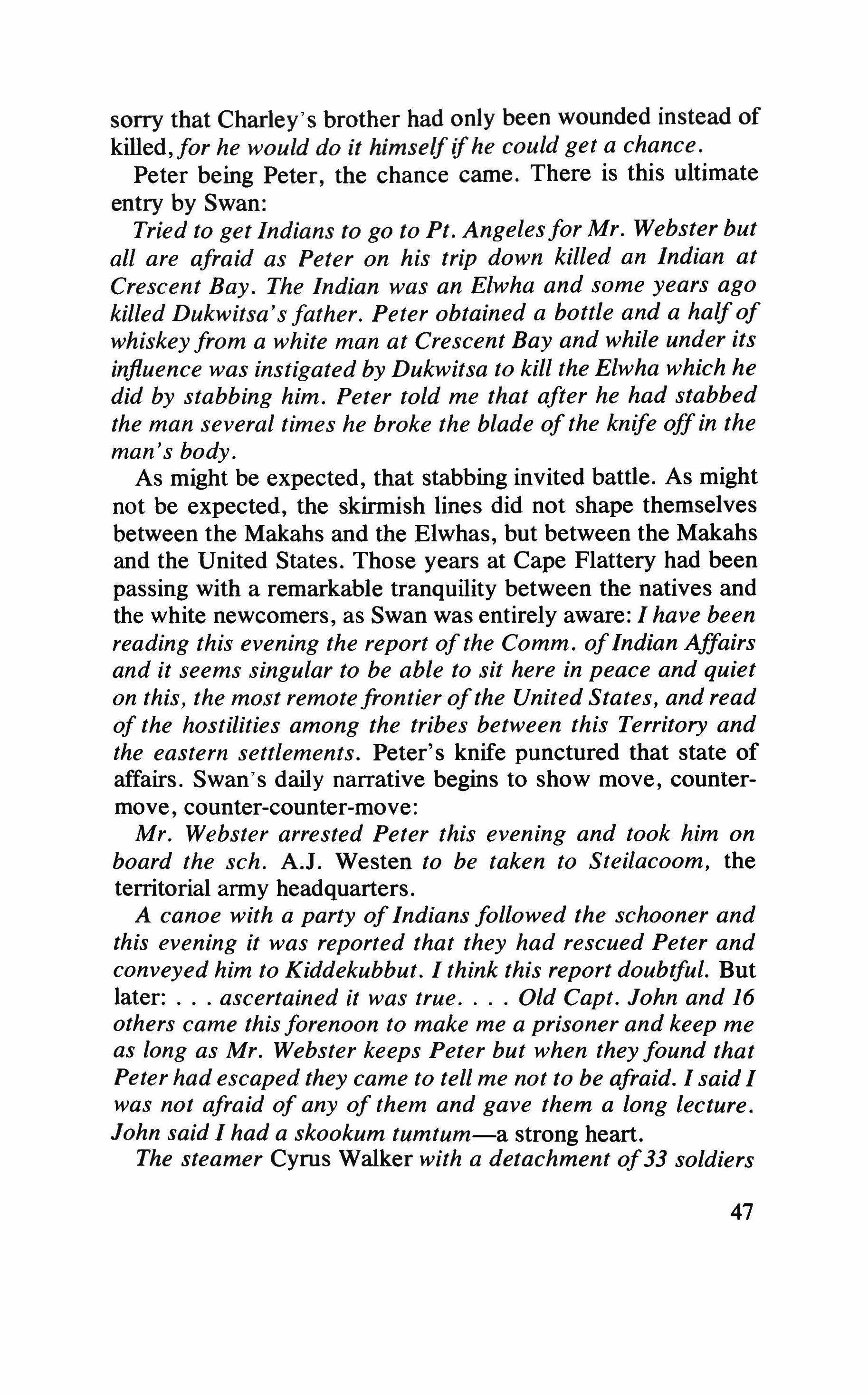
sorry that Charley's brother had only been wounded instead of killed,for he would do it himselfifhe could get a chance.
Peter being Peter, the chance came. There is this ultimate entry by Swan:
Tried to get Indians to go to Pt. Angelesfor Mr. Webster but all are afraid as Peter on his trip down killed an Indian at Crescent Bay. The Indian was an Elwha and some years ago killed Dukwitsa's father. Peter obtained a bottle and a halfof whiskey from a white man at Crescent Bay and while under its influence was instigated by Dukwitsa to kill the Elwha which he did by stabbing him. Peter told me that after he had stabbed the man several times he broke the blade ofthe knife offin the man's body.
As might be expected, that stabbing invited battle. As might not be expected, the skirmish lines did not shape themselves between the Makahs and the Elwhas, but between the Makahs and the United States. Those years at Cape Flattery had been passing with a remarkable tranquility between the natives and the white newcomers, as Swan was entirely aware: I have been reading this evening the report of the Comm. ofIndian Affairs and it seems singular to be able to sit here in peace and quiet on this, the most remotefrontier ofthe United States, and read of the hostilities among the tribes between this Territory and the eastern settlements. Peter's knife punctured that state of affairs. Swan's daily narrative begins to show move, countermove, counter-counter-move:
Mr. Webster arrested Peter this evening and took him on board the sch. A.J. Westen to be taken to Steilacoom, the territorial army headquarters.
A canoe with a party of Indians followed the schooner and this evening it was reported that they had rescued Peter and conveyed him to Kiddekubbut. I think this report doubtful. But later: ascertained it was true Old Capt. John and 16 others came this forenoon to make me a prisoner and keep me as long as Mr. Webster keeps Peter but when theyfound that Peter had escaped they came to tell me not to be afraid. I said I was not afraid of any of them and gave them a long lecture. John said I had a skookum tumtum-a strong heart.
The steamer Cyrus Walker with a detachment of33 soldiers
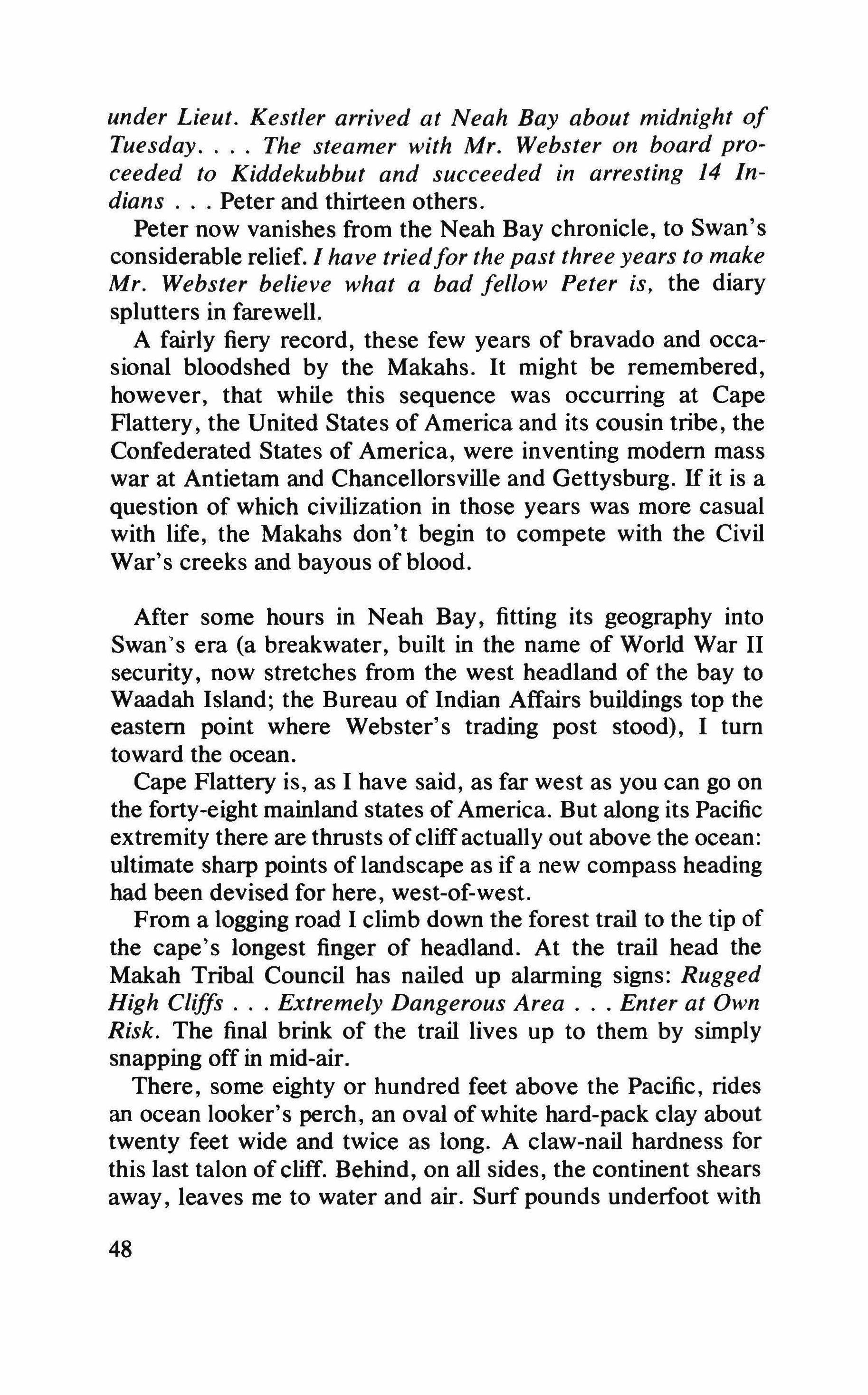
under Lieut. Kestler arrived at Neah Bay about midnight of Tuesday The steamer with Mr. Webster on board proceeded to Kiddekubbut and succeeded in arresting 14 Indians Peter and thirteen others.
Peter now vanishes from the Neah Bay chronicle, to Swan's considerable relief. I have triedfor the past three years to make Mr. Webster believe what a bad fellow Peter is, the diary splutters in farewell.
A fairly fiery record, these few years of bravado and occasional bloodshed by the Makahs. It might be remembered, however, that while this sequence was occurring at Cape Flattery, the United States of America and its cousin tribe, the Confederated States of America, were inventing modern mass war at Antietam and Chancellorsville and Gettysburg. If it is a question of which civilization in those years was more casual with life, the Makahs don't begin to compete with the Civil War's creeks and bayous of blood.
After some hours in Neah Bay, fitting its geography into Swan's era (a breakwater, built in the name of World War II security, now stretches from the west headland of the bay to Waadah Island; the Bureau of Indian Affairs buildings top the eastern point where Webster's trading post stood), I turn toward the ocean.
Cape Flattery is, as I have said, as far west as you can go on the forty-eight mainland states of America. But along its Pacific extremity there are thrusts ofcliff actually out above the ocean: ultimate sharp points of landscape as if a new compass heading had been devised for here, west-of-west.
From a logging road I climb down the forest trail to the tip of the cape's longest finger of headland. At the trail head the Makah Tribal Council has nailed up alarming signs: Rugged High Cliffs Extremely Dangerous Area Enter at Own Risk. The final brink of the trail lives up to them by simply snapping off in mid-air.
There, some eighty or hundred feet above the Pacific, rides an ocean looker's perch, an oval of white hard-pack clay about twenty feet wide and twice as long. A claw-nail hardness for this last talon of cliff. Behind, on all sides, the continent shears away, leaves me to water and air. Surf pounds underfoot with

surprisingly little noise, but the wind makes up for it. I crouch carefully, not to be puffed off the continent, and peer out the half mile or so to Tatoosh, the lighthouse island here at the entrance to the Strait of Juan de Fuca. While at Tatooche, Swan entered in his diary on July 18, 1864, I counted 18 vessels in sight.
Now machines instead of humans operate the Tatoosh light, visitors are none, and the tiny white cluster of lighthouse, residential quarters, water tower, and a collapsing shed are visual echoes of emptiness. Tatoosh simply rests out there like a fat stepping-stone off the end of the continent, and the next foothold beyond it is Asia.
In the 1860s, the Makah tribesmen told Swan that below these cliffs, in hours of calm water, they sometimes hunted seals. Caves drill back in very far at the base of the cliffs, and so a Makah would approach by canoe, swim or wade in with a lighted torch and a knife, and stalk back along the tunneled floor until he came upon drowsing seals. The blaze of the torch confused the animals, and the hunter took advantage of their confusion to stab them.
There was risk, Swan noted. Occasionally the torch will go out, and leave the cavern in profoundest darkness.
Profoundest darkness, and naked, knife-bearing men who would wade into it. Even if you do not know that story, to stand atop this last rough end of the continent is to have it come to mind: what the dwellers of this coast could do before they found other, easier routes.
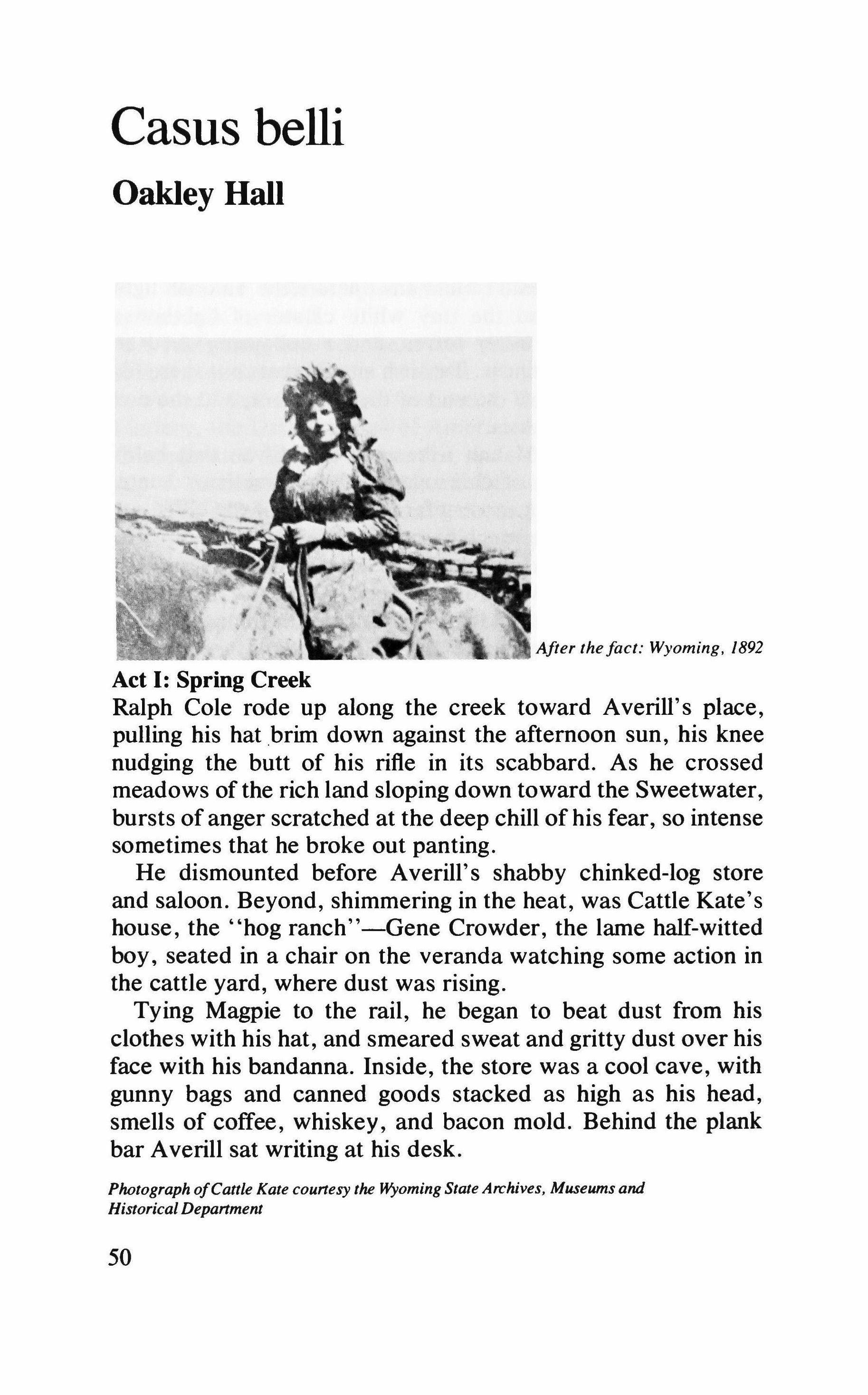
Act I: Spring Creek
Ralph Cole rode up along the creek toward Averill's place, pulling his hat brim down against the afternoon sun, his knee nudging the butt of his rifle in its scabbard. As he crossed meadows of the rich land sloping down toward the Sweetwater, bursts of anger scratched at the deep chill of his fear, so intense sometimes that he broke out panting.
He dismounted before Averill's shabby chinked-log store and saloon. Beyond, shimmering in the heat, was Cattle Kate's house, the "hog ranch"-Gene Crowder, the lame half-witted boy, seated in a chair on the veranda watching some action in the cattle yard, where dust was rising.
Tying Magpie to the rail, he began to beat dust from his clothes with his hat, and smeared sweat and gritty dust over his face with his bandanna. Inside, the store was a cool cave, with gunny bags and canned goods stacked as high as his head, smells of coffee, whiskey, and bacon mold. Behind the plank bar Averill sat writing at his desk.
Photograph ofCattle Kate courtesy the Wyoming State Archives, Museums and HistoricalDepartment
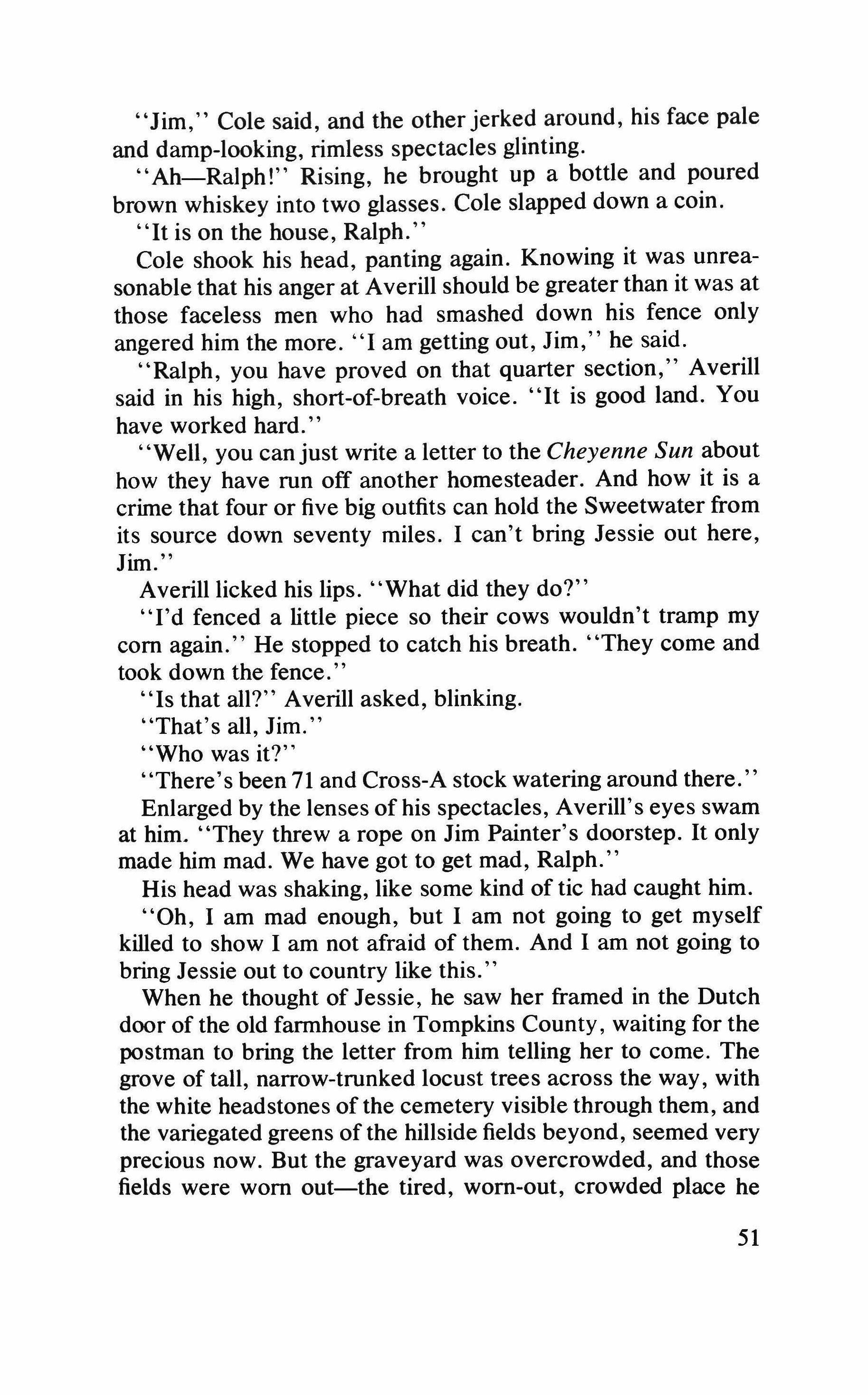
"Jim," Cole said, and the other jerked around, his face pale and damp-looking, rimless spectacles glinting.
"Ah=-Ralph!" Rising, he brought up a bottle and poured brown whiskey into two glasses. Cole slapped down a coin.
"It is on the house, Ralph."
Cole shook his head, panting again. Knowing it was unreasonable that his anger at Averill should be greater than it was at those faceless men who had smashed down his fence only angered him the more. "I am getting out, Jim," he said.
"Ralph, you have proved on that quarter section, Averill said in his high, short-of-breath voice. "It is good land. You have worked hard.
"Well, you can just write a letter to the Cheyenne Sun about how they have run off another homesteader. And how it is a crime that four or five big outfits can hold the Sweetwater from its source down seventy miles. I can't bring Jessie out here, Jim.
Averilllicked his lips. "What did they do?"
''I'd fenced a little piece so their cows wouldn't tramp my com again." He stopped to catch his breath. "They come and took down the fence."
"Is that all?" Averill asked, blinking.
"That's all, Jim."
"Who was it?"
"There's been 71 and Cross-A stock watering around there."
Enlarged by the lenses of his spectacles, Averill's eyes swam at him. "They threw a rope on Jim Painter's doorstep. It only made him mad. We have got to get mad, Ralph."
His head was shaking, like some kind of tic had caught him.
"Oh, I am mad enough, but I am not going to get myself killed to show I am not afraid of them. And I am not going to bring Jessie out to country like this."
When he thought of Jessie, he saw her framed in the Dutch door of the old farmhouse in Tompkins County, waiting for the postman to bring the letter from him telling her to come. The grove of tall, narrow-trunked locust trees across the way, with the white headstones of the cemetery visible through them, and the variegated greens of the hillside fields beyond, seemed very precious now. But the graveyard was overcrowded, and those fields were worn out-the tired, worn-out, crowded place he

had left to come here. He drank, and wiped his mouth with the back of his hand.
"And I thank you for the whiskey I have had on the house when you thought I was going to stick it.
Averill took up the bottle to pour more whiskey. "They can't go on holding what is not theirs, Ralph. There is coming a day when the people along the Sweetwater will belong to the Homesteaders' Association, not the Stock Growers'-and soon, if men will fight for what they know is right."
"Tell that to Bothwell and Hesse."
"I have told them."
At last he managed to stop his head shaking, and to grin, though his lips felt stuck to his teeth. Averill had written just that, time and again, in letters printed in the Cheyenne, Casper, and Buffalo papers. He was a brave man who always looked close to fainting with fright-as clever, educated, and righteous a man as Cole knew. But Averill was crazy, and he was not.
Heel cracks sounded outside, and a man appeared, ducking under the lintel as he stepped inside: a Cross-A cowboy named Buchanan, a regular for Kate's favors.
"Hello, Frank," Averill said in the suck-up tone that Cole detested.
"I see Kate over there watching Bob DeCory brand some stufffor her," Buchanan said. He scowled at Cole as though he might have a prior call in for Kate. "How about getting her over here?" he said to Averill. "Looks like it's the pimper'sjob calling in the whores for company.
"She'll be along in a bit, Frank," Averill said, producing a glass for the cowboy. Cole stared back as though it was an act of cowardice to break his eyes away, until Buchanan turned to indicate with a thumbnail to where Averill was to fill the glass.
"Owes me two yet," he said. "She better damn well remember it, too, or I'm going to start keeping maverick ears for chits." He laughed. "Beef for beef. Say, I heard in town the other day you and her was married, and that half-wit kid's yours. Got down in Nebraska.
Averill shook his head. "She just took him in when his parents died down there."
"There is no worse gossips than a bunch of hands sitting

around. I tell them Bob DeCory runs Cattle Kate's stock end and Jim Averill runs her other end." He laughed.
"Every man has his way of making a living, Frank," Averill said with dignity.
"What's yours?" Cole said to Buchanan suddenly. "Knocking down a man's fences?"
Holstered revolver thumping against the bar, Buchanan turned to study his face for a long moment. "I've done it, fellow," he said. "I didn't yours."
Cole could feel the cold sweat lacing his forehead. "Who did?"
Buchanan shrugged elaborately. "Why don't you ask Henderson?" Henderson was foreman of Hesse's 71 spread. "Cowmen just don't like bob-wire on their range. You ever see a steer that's got tangled with the damned stuff? Or a nighthawk either?"
"You ever see a stand of com that steers got to tramping ?"m.
Buchanan shrugged again.
'It is public land," Averill said shrilly. "And Ralph has filed on his, and proved it."
"Like that less than bob-wire, even," Buchanan said. "And let me tell you," he said, poking a finger at Averill. "Do you think Hesse and Bothwell and Tom Sun and them's not going to do something one of these days about all the mavericks that end up with Cattle Kate's brand on them? You think they don't know she is trading tricks for tally? And you think they don't know who that fellow is, writing the papers calling them land-grabbers and such?"
Cole watched Averill standing stiffly erect, face gleaming like phosphorus in the dim store, and wondered if some men might not live on fear as others lived on whiskey, until they died of it.
"They know who is writing those letters!" Averill said.
"They surely do," Buchanan said, grinning.
Cole heard voices outside, and Buchanan swung another quarter turn to lean back with both elbows propped on the bar behind him. Kate came in, plump in dusty blue gingham, bonnet shading her round face, smiling with brown lips while china-blue eyes glanced from face to face. On her feet were
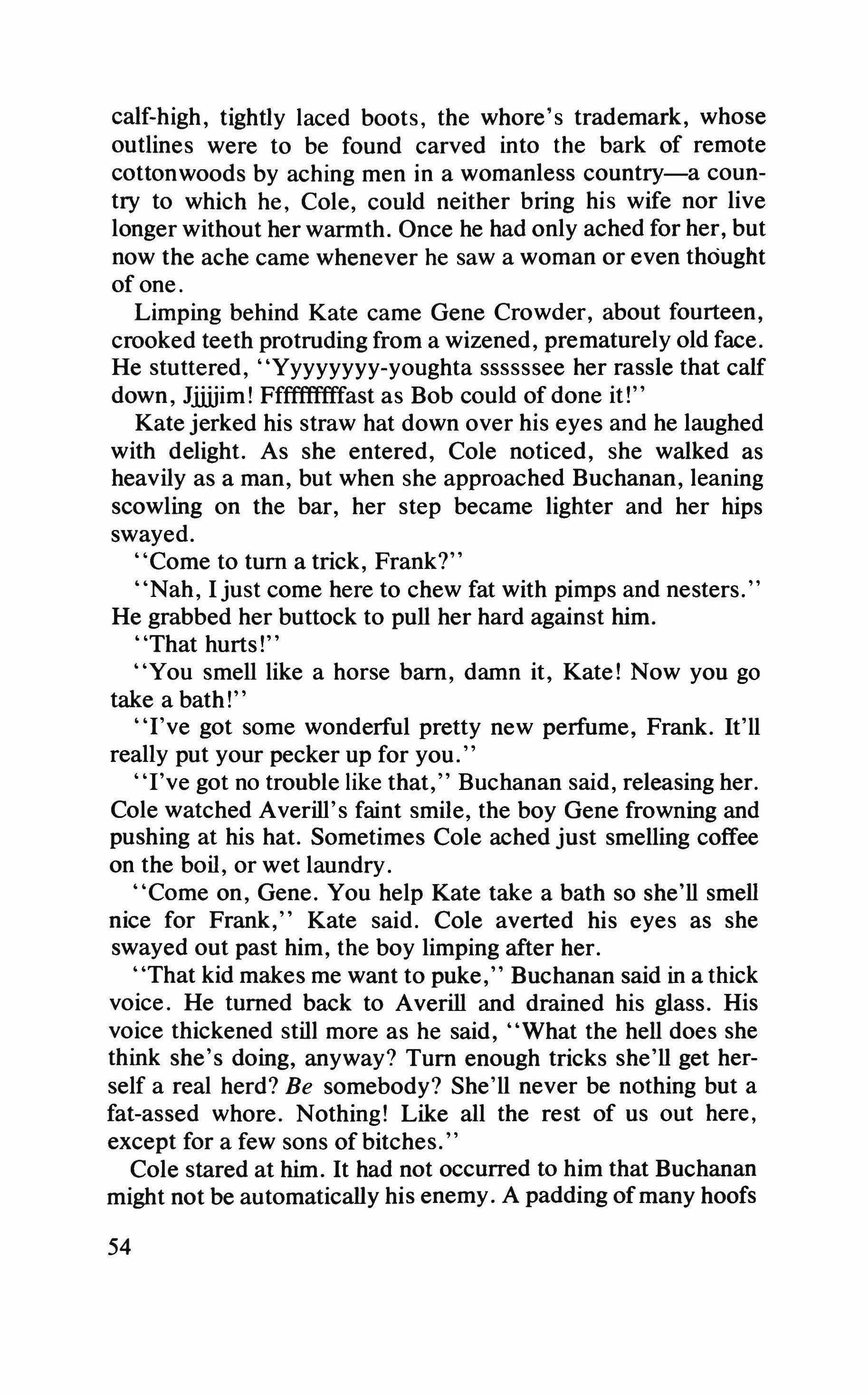
calf-high, tightly laced boots, the whore's trademark, whose outlines were to be found carved into the bark of remote cottonwoods by aching men in a womanless country-a country to which he, Cole, could neither bring his wife nor live longer without her warmth. Once he had only ached for her, but now the ache came whenever he saw a woman or even thought of one.
Limping behind Kate came Gene Crowder, about fourteen, crooked teeth protruding from a wizened, prematurely old face. He stuttered, "Yyyyyyyy-youghta ssssssee her rassle that calf down, Jjjjjiml Ffffftffffast as Bob could of done it!"
Kate jerked his straw hat down over his eyes and he laughed with delight. As she entered, Cole noticed, she walked as heavily as a man, but when she approached Buchanan, leaning scowling on the bar, her step became lighter and her hips swayed.
"Come to tum a trick, Frank?"
"Nah, Ijust come here to chew fat with pimps and nesters." He grabbed her buttock to pull her hard against him.
"That hurts!"
"You smell like a horse bam, damn it, Kate! Now you go take a bath!"
''I've got some wonderful pretty new perfume, Frank. It'll really put your peeker up for you."
"I've got no trouble like that," Buchanan said, releasing her. Cole watched Averill's faint smile, the boy Gene frowning and pushing at his hat. Sometimes Cole ached just smelling coffee on the boil, or wet laundry.
"Come on, Gene. You help Kate take a bath so she'll smell nice for Frank," Kate said. Cole averted his eyes as she swayed out past him, the boy limping after her.
"That kid makes me want to puke," Buchanan said in a thick voice. He turned back to Averill and drained his glass. His voice thickened still more as he said, "What the hell does she think she's doing, anyway? Tum enough tricks she'll get herself a real herd? Be somebody? She'll never be nothing but a fat-assed whore. Nothing! Like all the rest of us out here, except for a few sons of bitches."
Cole stared at him. It had not occurred to him that Buchanan might not be automatically his enemy. A padding of many hoofs
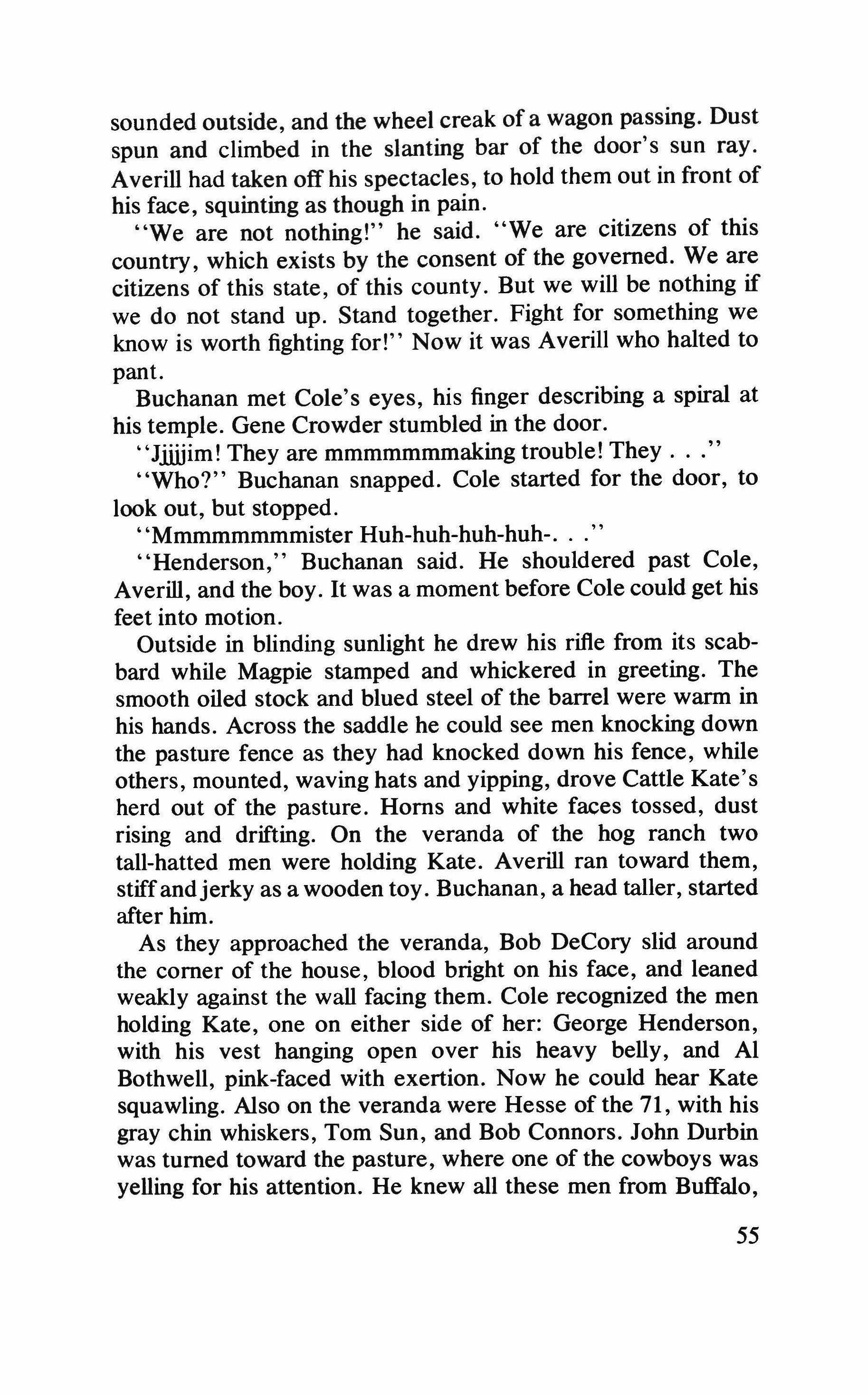
sounded outside, and the wheel creak of a wagon passing. Dust spun and climbed in the slanting bar of the door's sun ray. Averill had taken off his spectacles, to hold them out in front of his face, squinting as though in pain.
"We are not nothing!" he said. "We are citizens of this country, which exists by the consent of the governed. We are citizens of this state, of this county. But we will be nothing if we do not stand up. Stand together. Fight for something we know is worth fighting for!" Now it was Averill who halted to pant.
Buchanan met Cole's eyes, his finger describing a spiral at his temple. Gene Crowder stumbled in the door.
"Jjjjjim! They are mmmmmmmaking trouble! They "Who?" Buchanan snapped. Cole started for the door, to look out, but stopped.
"Mmmmmmmmister Huh-huh-huh-huh"Henderson," Buchanan said. He shouldered past Cole, Averill, and the boy. It was a moment before Cole could get his feet into motion.
Outside in blinding sunlight he drew his rifle from its scabbard while Magpie stamped and whickered in greeting. The smooth oiled stock and blued steel of the barrel were warm in his hands. Across the saddle he could see men knocking down the pasture fence as they had knocked down his fence, while others, mounted, waving hats and yipping, drove Cattle Kate's herd out of the pasture. Horns and white faces tossed, dust rising and drifting. On the veranda of the hog ranch two tall-hatted men were holding Kate. Averill ran toward them, stiffandjerky as a wooden toy. Buchanan, a head taller, started after him.
As they approached the veranda, Bob DeCory slid around the comer of the house, blood bright on his face, and leaned weakly against the wall facing them. Cole recognized the men holding Kate, one on either side of her: George Henderson, with his vest hanging open over his heavy belly, and Al Bothwell, pink-faced with exertion. Now he could hear Kate squawling. Also on the veranda were Hesse of the 71, with his gray chin whiskers, Tom Sun, and Bob Connors. John Durbin was turned toward the pasture, where one of the cowboys was yelling for his attention. He knew all these men from Buffalo, 55

where homesteaders pointed them out to one another as the enemy.
When Averill ran up the steps he immediately disappeared among the men there as though he had dropped into a hole. Kate's screeching changed to shouted curses, vile as a mule skinner's. He could see her kicking and twisting. Henderson was laughing.
Buchanan had halted at the foot of the steps, standing stiffly with hands concealed before his belly, Connors's rifle slanting down at him from the veranda railing.
The cattle lumbered out of the yard, and through veils ofdust he could see a cowboy standing the spring wagon, flapping the reins as the team forged obliquely through Kate's cattle toward her house.
Henderson and Bothwell carried her down the steps past Buchanan and boosted her into the wagon. Averill staggered down the steps, followed by Durbin with his revolver drawn, and climbed in with her. The cowmen began mounting. The yipping of the cowboys had ceased, Kate had stopped her noise, and in the heavy silence there was only the creak of wheels. Cole noticed that the shadows were long, the sun low. His face felt like a soaked sponge, and his hands ached from holding the rifle before him.
The wagon and the horsemen surrounding it came past him in a fog of dust. He managed to look straight into the eyes of the men and the muzzles of their guns. Averill sat in the wagon bed with his features hidden by his hands. Kate's brown face was set around the 0 ofher open mouth. Bob DeCory still crouched against the log side of the house, and Buchanan had turned to watch the wagon creaking away down the Spring Creek trail. Then Buchanan was striding toward him.
"Give me that goddamned piece!" Buchanan said. Cole surrendered the rifle; shed of it, he felt a relief that shamed him. Buchanan levered a shell into the chamber, mounted his gray gelding, and headed after the wagon, spurring the gray into a twinkling, white-footed trot.
Facing him from the house, a hundred feet away, DeCory said, "They would not hang a woman."
His head had begun shaking on its own again.
"I'm getting out of here," DeCory said, but did not move,
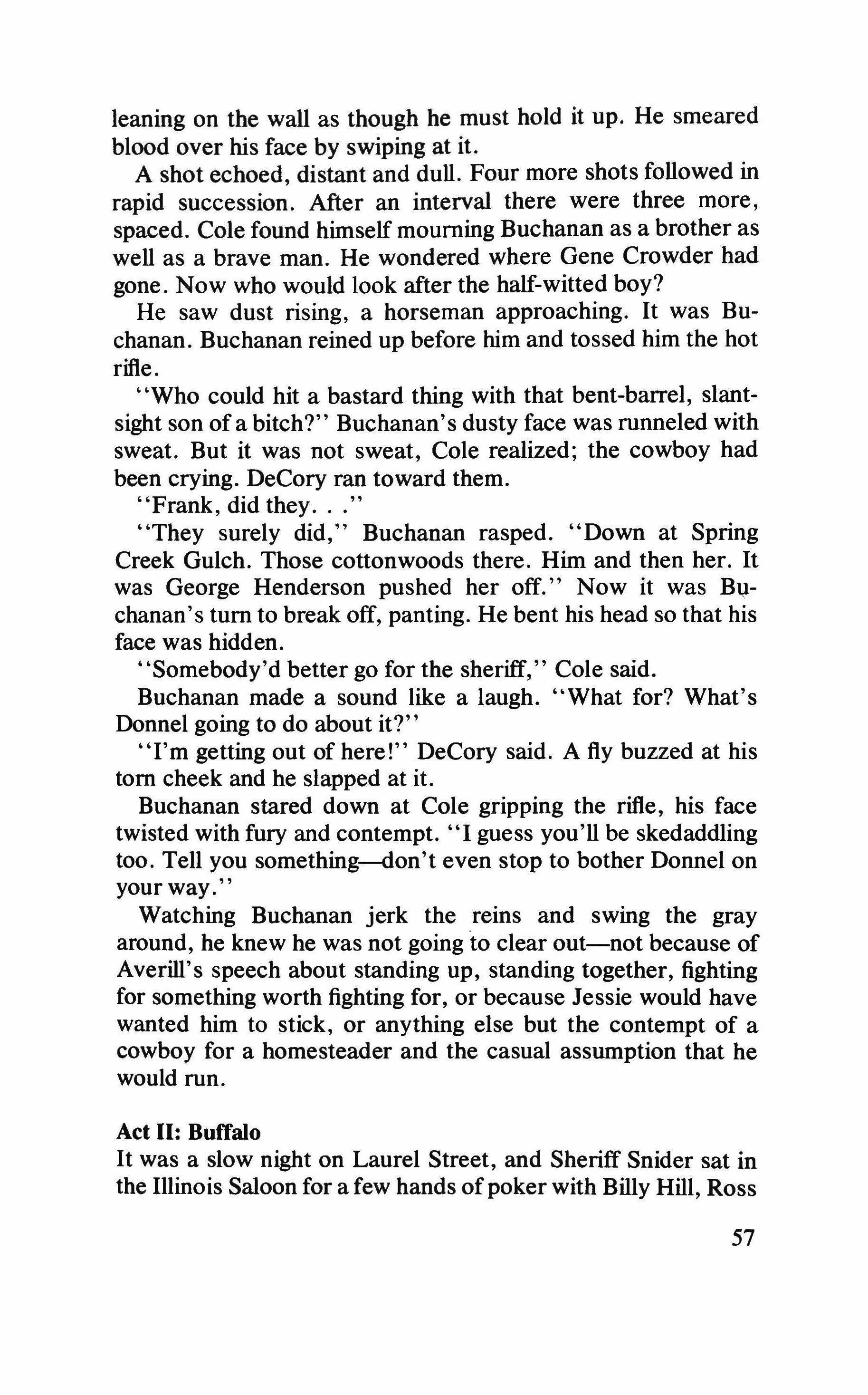
leaning on the wall as though he must hold it up. He smeared blood over his face by swiping at it.
A shot echoed, distant and dull. Four more shots followed in rapid succession. After an interval there were three more, spaced. Cole found himself mourning Buchanan as a brother as well as a brave man. He wondered where Gene Crowder had gone. Now who would look after the half-witted boy?
He saw dust rising, a horseman approaching. It was Buchanan. Buchanan reined up before him and tossed him the hot rifle.
"Who could hit a bastard thing with that bent-barrel, slantsight son ofa bitch?" Buchanan's dusty face was runneled with sweat. But it was not sweat, Cole realized; the cowboy had been crying. DeCory ran toward them.
"Frank, did they. ."
"They surely did," Buchanan rasped. "Down at Spring Creek Gulch. Those cottonwoods there. Him and then her. It was George Henderson pushed her off." Now it was B1,lchanan's tum to break off, panting. He bent his head so that his face was hidden.
"Somebody'd better go for the sheriff," Cole said.
Buchanan made a sound like a laugh. "What for? What's Donnel going to do about it?"
"I'm getting out of here!" DeCory said. A fly buzzed at his tom cheek and he slapped at it.
Buchanan stared down at Cole gripping the rifle, his face twisted with fury and contempt. "I guess you'll be skedaddling too. Tell you something-don't even stop to bother Donnel on your way."
Watching Buchanan jerk the reins and swing the gray around, he knew he was not going to clear out-not because of Averill's speech about standing up, standing together, fighting for something worth fighting for, or because Jessie would have wanted him to stick, or anything else but the contempt of a cowboy for a homesteader and the casual assumption that he would run.
It was a slow night on Laurel Street, and Sheriff Snider sat in the Illinois Saloon for a few hands ofpoker with Billy Hill, Ross
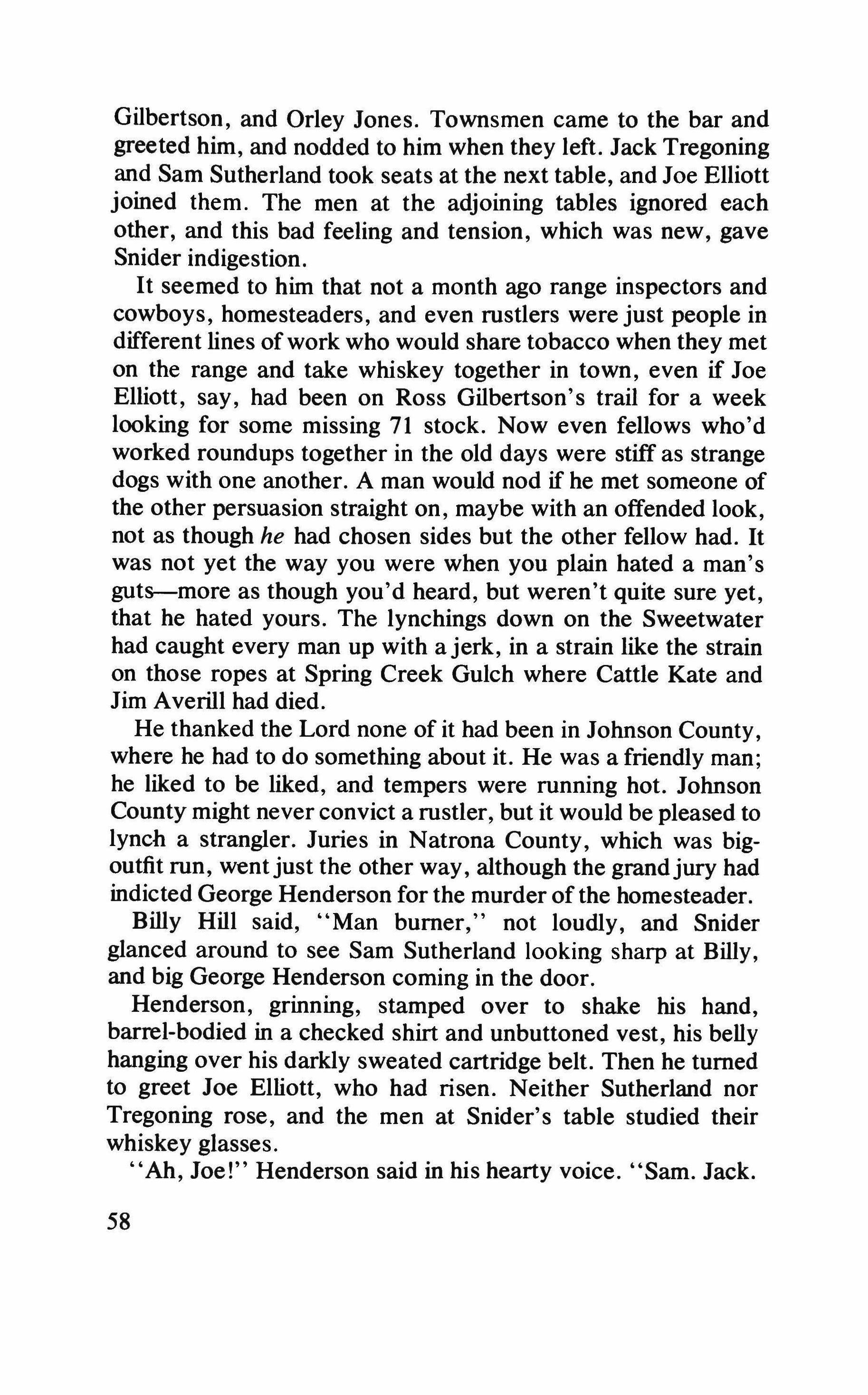
Gilbertson, and Orley Jones. Townsmen came to the bar and greeted him, and nodded to him when they left. Jack Tregoning and Sam Sutherland took seats at the next table, and Joe Elliott joined them. The men at the adjoining tables ignored each other, and this bad feeling and tension, which was new, gave Snider indigestion.
It seemed to him that not a month ago range inspectors and cowboys, homesteaders, and even rustlers were just people in different lines ofwork who would share tobacco when they met on the range and take whiskey together in town, even if Joe Elliott, say, had been on Ross Gilbertson's trail for a week looking for some missing 71 stock. Now even fellows who'd worked roundups together in the old days were stiff as strange dogs with one another. A man would nod if he met someone of the other persuasion straight on, maybe with an offended look, not as though he had chosen sides but the other fellow had. It was not yet the way you were when you plain hated a man's guts--more as though you'd heard, but weren't quite sure yet, that he hated yours. The lynchings down on the Sweetwater had caught every man up with a jerk, in a strain like the strain on those ropes at Spring Creek Gulch where Cattle Kate and Jim Averill had died.
He thanked the Lord none of it had been in Johnson County, where he had to do something about it. He was a friendly man; he liked to be liked, and tempers were running hot. Johnson County might never convict a rustler, but it would be pleased to lynch a strangler. Juries in Natrona County, which was bigoutfit run, went just the other way, although the grandjury had indicted George Henderson for the murder of the homesteader.
Billy Hill said, "Man burner," not loudly, and Snider glanced around to see Sam Sutherland looking sharp at Billy, and big George Henderson coming in the door.
Henderson, grinning, stamped over to shake his hand, barrel-bodied in a checked shirt and unbuttoned vest, his belly hanging over his darkly sweated cartridge belt. Then he turned to greet Joe Elliott, who had risen. Neither Sutherland nor Tregoning rose, and the men at Snider's table studied their whiskey glasses.
"Ah, Joe!" Henderson said in his hearty voice. "Sam. Jack.
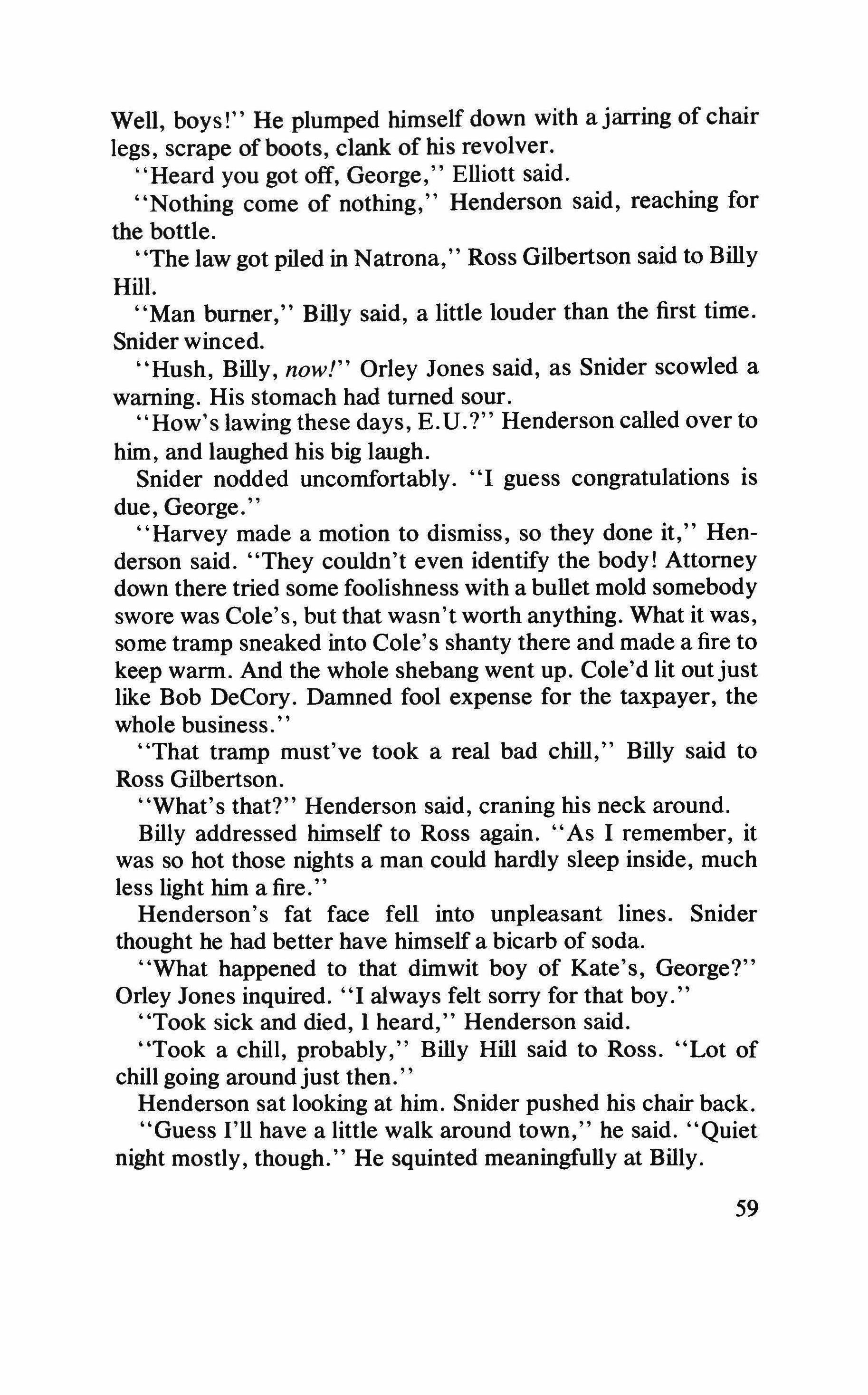
Well, boys!" He plumped himself down with a jarring of chair legs, scrape of boots, clank of his revolver.
"Heard you got off, George," Elliott said.
"Nothing come of nothing," Henderson said, reaching for the bottle.
"The law got piled in Natrona," Ross Gilbertson said to Billy Hill.
"Man burner," Billy said, a little louder than the first time. Snider winced.
"Hush, Billy, now!" Orley Jones said, as Snider scowled a warning. His stomach had turned sour.
"How's lawing these days, E.U.?" Henderson called over to him, and laughed his big laugh.
Snider nodded uncomfortably. "I guess congratulations is due, George."
"Harvey made a motion to dismiss, so they done it," Henderson said. "They couldn't even identify the body! Attorney down there tried some foolishness with a bullet mold somebody swore was Cole's, but that wasn't worth anything. What it was, some tramp sneaked into Cole's shanty there and made a fire to keep warm. And the whole shebang went up. Cole'd lit out just like Bob DeCory. Damned fool expense for the taxpayer, the whole business."
"That tramp must've took a real bad chill," Billy said to Ross Gilbertson.
"What's that?" Henderson said, craning his neck around. Billy addressed himself to Ross again. "As I remember, it was so hot those nights a man could hardly sleep inside, much less light him a fire."
Henderson's fat face fell into unpleasant lines. Snider thought he had better have himself a bicarb of soda.
"What happened to that dimwit boy of Kate's, George?" Orley Jones inquired. "I always felt sorry for that boy."
"Took sick and died, I heard," Henderson said.
"Took a chill, probably," Billy Hill said to Ross. "Lot of chill going around just then."
Henderson sat looking at him. Snider pushed his chair back.
"Guess I'll have a little walk around town," he said. "Quiet night mostly, though." He squinted meaningfully at Billy.
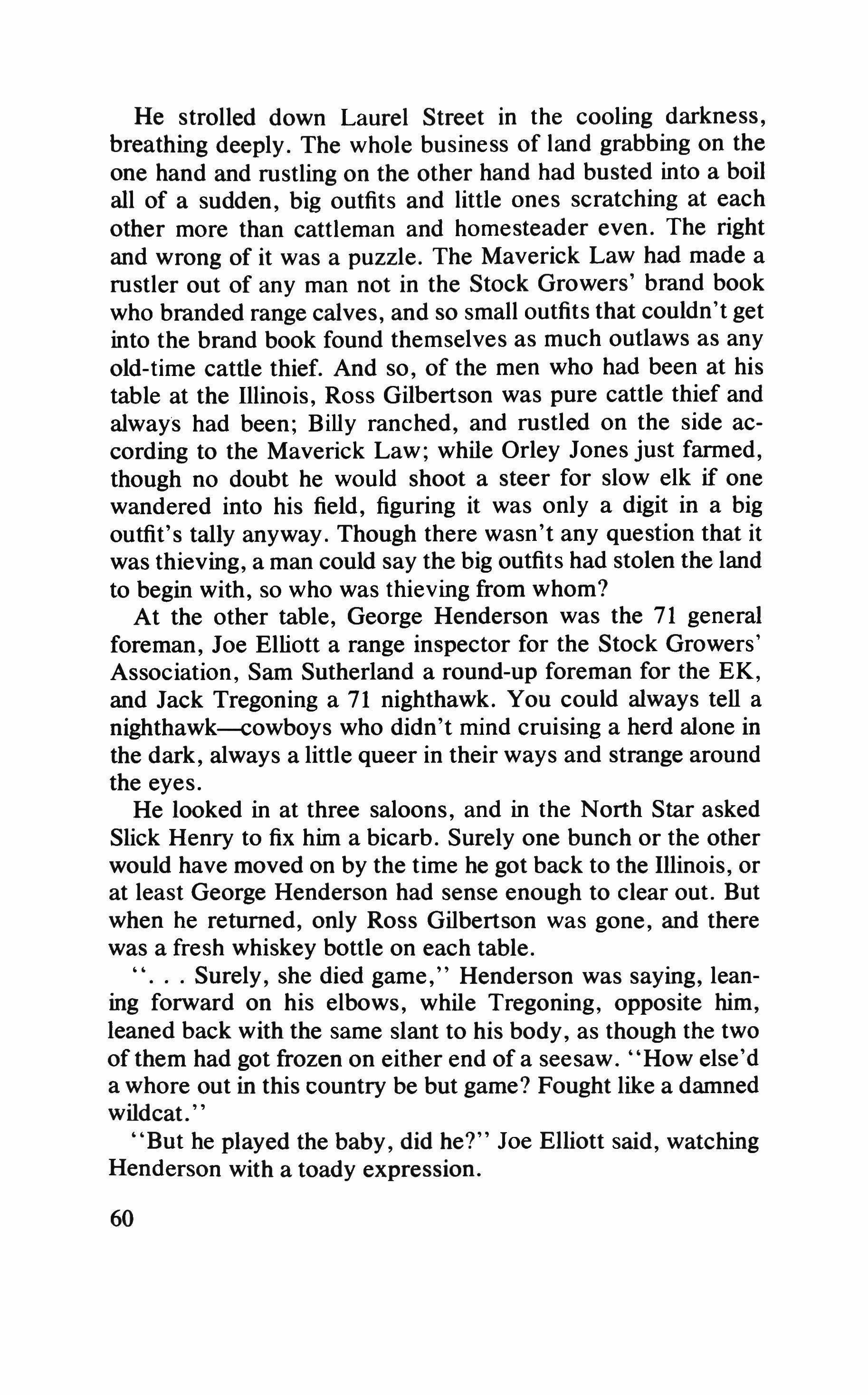
He strolled down Laurel Street in the cooling darkness, breathing deeply. The whole business of land grabbing on the one hand and rustling on the other hand had busted into a boil all of a sudden, big outfits and little ones scratching at each other more than cattleman and homesteader even. The right and wrong of it was a puzzle. The Maverick Law had made a rustler out of any man not in the Stock Growers' brand book who branded range calves, and so small outfits that couldn't get into the brand book found themselves as much outlaws as any old-time cattle thief. And so, of the men who had been at his table at the Illinois, Ross Gilbertson was pure cattle thief and always had been; Billy ranched, and rustled on the side according to the Maverick Law; while Orley Jones just farmed, though no doubt he would shoot a steer for slow elk if one wandered into his field, figuring it was only a digit in a big outfit's tally anyway. Though there wasn't any question that it was thieving, a man could say the big outfits had stolen the land to begin with, so who was thieving from whom?
At the other table, George Henderson was the 71 general foreman, Joe Elliott a range inspector for the Stock Growers' Association, Sam Sutherland a round-up foreman for the EK, and Jack Tregoning a 71 nighthawk. You could always tell a nighthawk=-cowboys who didn't mind cruising a herd alone in the dark, always a little queer in their ways and strange around the eyes.
He looked in at three saloons, and in the North Star asked Slick Henry to fix him a bicarb. Surely one bunch or the other would have moved on by the time he got back to the Illinois, or at least George Henderson had sense enough to clear out. But when he returned, only Ross Gilbertson was gone, and there was a fresh whiskey bottle on each table.
" Surely, she died game," Henderson was saying, leaning forward on his elbows, while Tregoning, opposite him, leaned back with the same slant to his body, as though the two of them had got frozen on either end of a seesaw. "How else'd a whore out in this country be but game? Fought like a damned wildcat.
"But he played the baby, did he?" Joe Elliott said, watching Henderson with a toady expression.
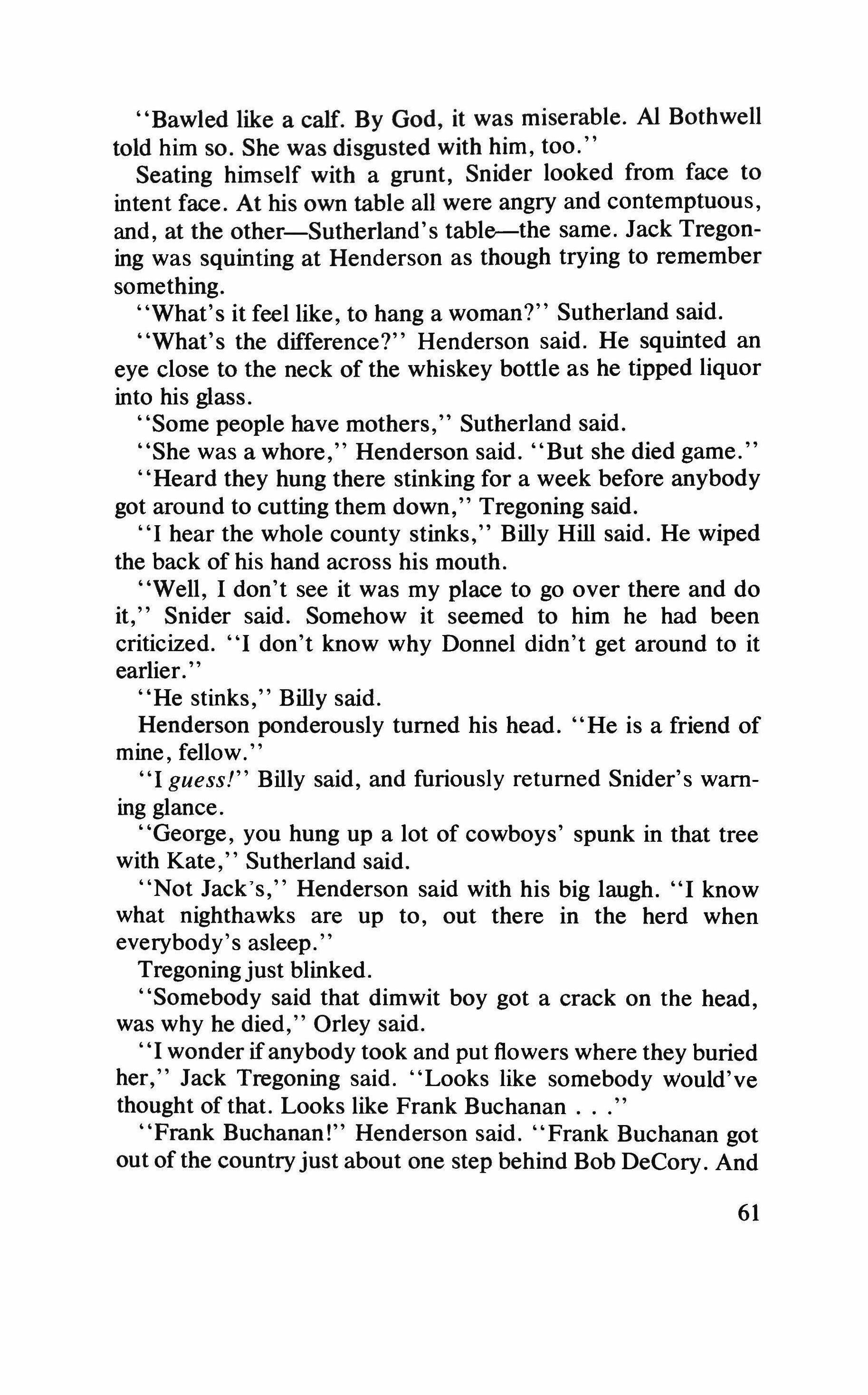
"Bawled like a calf. By God, it was miserable. AI Bothwell told him so. She was disgusted with him, too."
Seating himself with a grunt, Snider looked from face to intent face. At his own table all were angry and contemptuous, and, at the other-Sutherland's table-the same. Jack Tregoning was squinting at Henderson as though trying to remember something.
"What's it feel like, to hang a woman?" Sutherland said.
"What's the difference?" Henderson said. He squinted an eye close to the neck of the whiskey bottle as he tipped liquor into his glass.
"Some people have mothers," Sutherland said.
"She was a whore," Henderson said. "But she died game."
"Heard they hung there stinking for a week before anybody got around to cutting them down," Tregoning said.
"I hear the whole county stinks," Billy Hill said. He wiped the back of his hand across his mouth.
"Well, I don't see it was my place to go over there and do it," Snider said. Somehow it seemed to him he had been criticized. "I don't know why Donnel didn't get around to it earlier. "
"He stinks," Billy said. Henderson ponderously turned his head. "He is a friend of mine, fellow."
"I guess!" Billy said, and furiously returned Snider's warning glance.
"George, you hung up a lot of cowboys' spunk in that tree with Kate," Sutherland said.
"Not Jack's," Henderson said with his big laugh. "I know what nighthawks are up to, out there in the herd when everybody's asleep."
Tregoningjust blinked.
"Somebody said that dimwit boy got a crack on the head, was why he died," Orley said.
"I wonder ifanybody took and put flowers where they buried her," Jack Tregoning said. "Looks like somebody would've thought of that. Looks like Frank Buchanan
"Frank Buchanan!" Henderson said. "Frank Buchanan got out of the countryjust about one step behind Bob DeCory. And
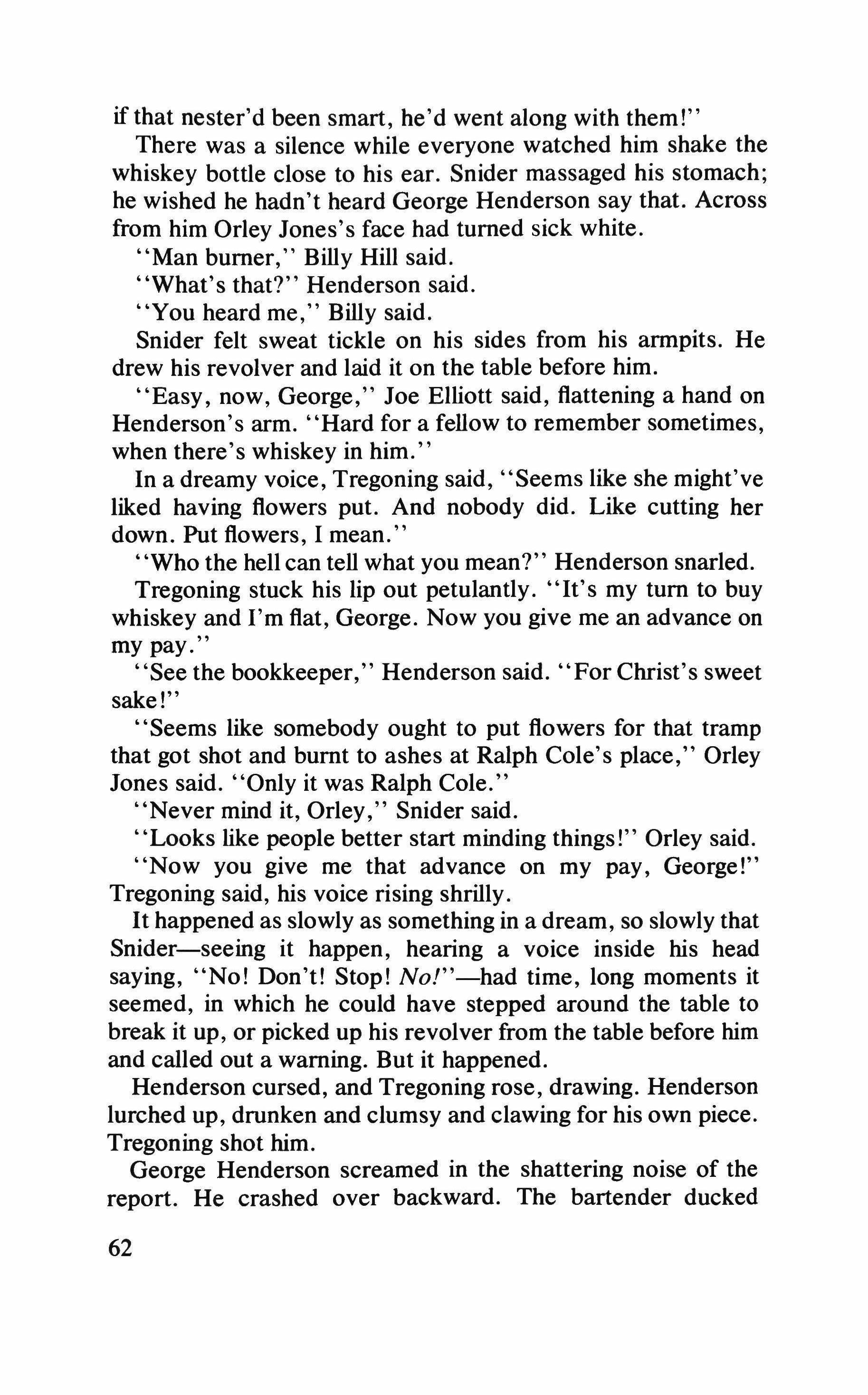
if that nester'd been smart, he'd went along with them!"
There was a silence while everyone watched him shake the whiskey bottle close to his ear. Snider massaged his stomach; he wished he hadn't heard George Henderson say that. Across from him Orley Jones's face had turned sick white.
"Man burner," Billy Hill said.
"What's that?" Henderson said.
"You heard me," Billy said.
Snider felt sweat tickle on his sides from his armpits. He drew his revolver and laid it on the table before him.
"Easy, now, George," Joe Elliott said, flattening a hand on Henderson's arm. "Hard for a fellow to remember sometimes, when there's whiskey in him."
In a dreamy voice, Tregoning said, "Seems like she might've liked having flowers put. And nobody did. Like cutting her down. Put flowers, I mean."
"Who the hell can tell what you mean?" Henderson snarled. Tregoning stuck his lip out petulantly. "It's my turn to buy whiskey and I'm flat, George. Now you give me an advance on my pay."
"See the bookkeeper," Henderson said. "For Christ's sweet sake!"
"Seems like somebody ought to put flowers for that tramp that got shot and burnt to ashes at Ralph Cole's place," Orley Jones said. "Only it was Ralph Cole."
"Never mind it, Orley," Snider said.
"Looks like people better start minding things!" Orley said.
"Now you give me that advance on my pay, George!" Tregoning said, his voice rising shrilly.
It happened as slowly as something in a dream, so slowly that Snider-seeing it happen, hearing a voice inside his head saying, "No! Don't! Stop! No!"-had time, long moments it seemed, in which he could have stepped around the table to break it up, or picked up his revolver from the table before him and called out a warning. But it happened. Henderson cursed, and Tregoning rose, drawing. Henderson lurched up, drunken and clumsy and clawing for his own piece. Tregoning shot him.
George Henderson screamed in the shattering noise of the report. He crashed over backward. The bartender ducked
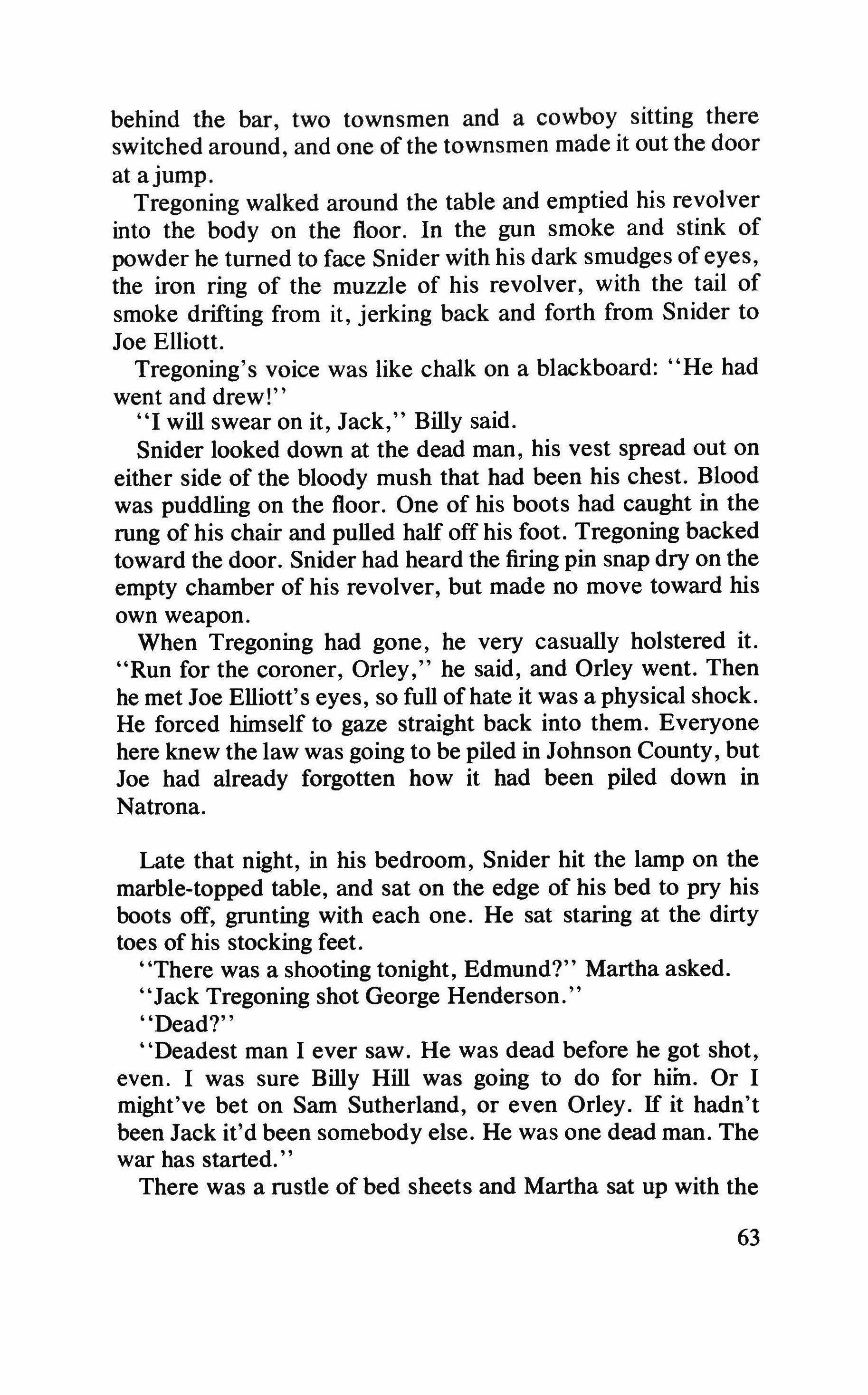
behind the bar, two townsmen and a cowboy sitting there switched around, and one of the townsmen made it out the door at ajump.
Tregoning walked around the table and emptied his revolver into the body on the floor. In the gun smoke and stink of powder he turned to face Snider with his dark smudges of eyes, the iron ring of the muzzle of his revolver, with the tail of smoke drifting from it, jerking back and forth from Snider to Joe Elliott.
Tregoning's voice was like chalk on a blackboard: "He had went and drew!"
"I will swear on it, Jack," Billy said.
Snider looked down at the dead man, his vest spread out on either side of the bloody mush that had been his chest. Blood was puddling on the floor. One of his boots had caught in the rung of his chair and pulled half off his foot. Tregoning backed toward the door. Snider had heard the firing pin snap dry on the empty chamber of his revolver, but made no move toward his own weapon.
When Tregoning had gone, he very casually holstered it. "Run for the coroner, Orley," he said, and Orley went. Then he met Joe Elliott's eyes, so full of hate it was a physical shock. He forced himself to gaze straight back into them. Everyone here knew the law was going to be piled in Johnson County, but Joe had already forgotten how it had been piled down in Natrona.
Late that night, in his bedroom, Snider hit the lamp on the marble-topped table, and sat on the edge of his bed to pry his boots off, grunting with each one. He sat staring at the dirty toes of his stocking feet.
"There was a shooting tonight, Edmund?" Martha asked. "Jack Tregoning shot George Henderson." "Dead?"
"Deadest man I ever saw. He was dead before he got shot, even. I was sure Billy Hill was going to do for hiin. Or I might've bet on Sam Sutherland, or even Orley. If it hadn't been Jack it'd been somebody else. He was one dead man. The war has started."
There was a rustle of bed sheets and Martha sat up with the

quilt held to her chin. Her thin, once-pretty face was lined around the mouth.
"What war, Edmund?"
What war. Cattlemen against rustlers? Against homesteaders? A minority against a growing majority? Cowmen against cowboys? Natrona County against Johnson? Big against little? Rich against poor? Early comers against late? Right against wrong? It seemed to him that wars were always right against right. When you were sure of your right, the fellow who disagreed with you was wrong, and treading on you. Then you'd die before you'd run, and kill the fellow treading on you before he killed you, who he was certain was treading on him. So the storekeeper Averill and the nester Cole stood and died in the bravery of their rightness, and maybe George Henderson did the same in his own surety. What war? Martha wanted to know.
"Just the war men decide they are going to fight," he said. "Over land or water or cows-though I sure to hate to think men would go to killing each other over cows.
"Well, they are all money," his wife said tartly.
''Then I'd as soon this war went and started over a poor whore down on Spring Creek," Snider said.

It was toward two o'clock on a Saturday afternoon when he walked into the Dollar Saloon, a tall man in black tooled-leather boots. Spanish spurs were buckled across the boots, and his dark corduroy pants were tucked into their tops. He wore a white linen shirt and a black leather vest, and his hat was black too: flat topped, wide brimmed, almost a sombrero, hiding. his face down to the shaggy mustache that drooped on either side of his mouth. He wore his gun low on his left hip, the black leather holster tied down with a rawhide thong that circled his legjust above the knee. His gun was a .45 Colt Peacemaker with an ivory grip the color of buttermilk.
Percy Deegan put down the glass he was polishing and offered the stranger a grin. He wiped his hands on his apron, put them flat on the bar, and asked, "What'Il it be, friend?"
"A glass of water, if I could trouble you," the stranger said. His voice was rich and deep, and though he spoke quietly his words carried to where we sat at the comer table.
"Water it is," Percy said. He brought up the big pewter pitcher of well water, poured a glass, and left the pitcher on the Remington drawing courtesy the Historical Pictures Service. Inc Chicago

bar. The stranger downed half the water in one draught, then held the glass up in front of him like he was savoring the flavor.
The cowhands from the ranches around Indian Wells wouldn't start drifting in for their Saturday night fun for another couple of hours, and the Dollar was almost empty. Two old-timers were holding up the far end of the bar and gumming away in low voices. Billy Larson and Johnny Duncan and I were the only other customers. Billy was dawdling on his way back to work at the Mercantile, and Johnny was getting a head start on his Saturday night. He had been up half the night pulling a heifer's calf at his Pa's spread, and the old man had let him off at noon so he could get some shut-eye before the hurrahing started. But Johnny was too skittish for afternoon naps and had come straight into town. The combination of no sleep and four shots of rye whiskey was already beginning to tell.
Billy was nursing a mug of beer, and I was sipping a tall glass of the lemonade that Percy's wife Maude made at the Dollar Cafe next door. That was about the one thing wrong with being the deputy town marshal: you had to keep sober the night everyone else got drunk. Aside from that, it wasn't a bad job. Indian Wells was getting civilized, and I chased lots more stray dogs than road agents.
"This is the damnedest place, all right," Johnny said all ofa sudden, as if he had read my thoughts.
"Huh?" Billy said, wiping off a mustache of beer foam with the back of his sleeve.
"The only thing duller than this town," Johnny said, "is a cemetery. Fact is, sometimes I get the two confused." Johnny picked up his glass and knocked back the whiskey in it. "If this town was a horse," Johnny said, "you'd have to shoot it for lame."
"What's eating you?" I asked.
"Nothing," Johnny said, a little louder. From out of the comer of my eye I saw the stranger tum and glance at us. "Nothing is exactly what's eating me. Look at the two of you. He waved a hand at me and Billy. "You do right well at being a storekeeper, Billy, adding up all those items and all. Fastest pencil in the West. And what about you, Tom?" Johnny's eyes bored into me, and some of the sarcasm went out of his voice.
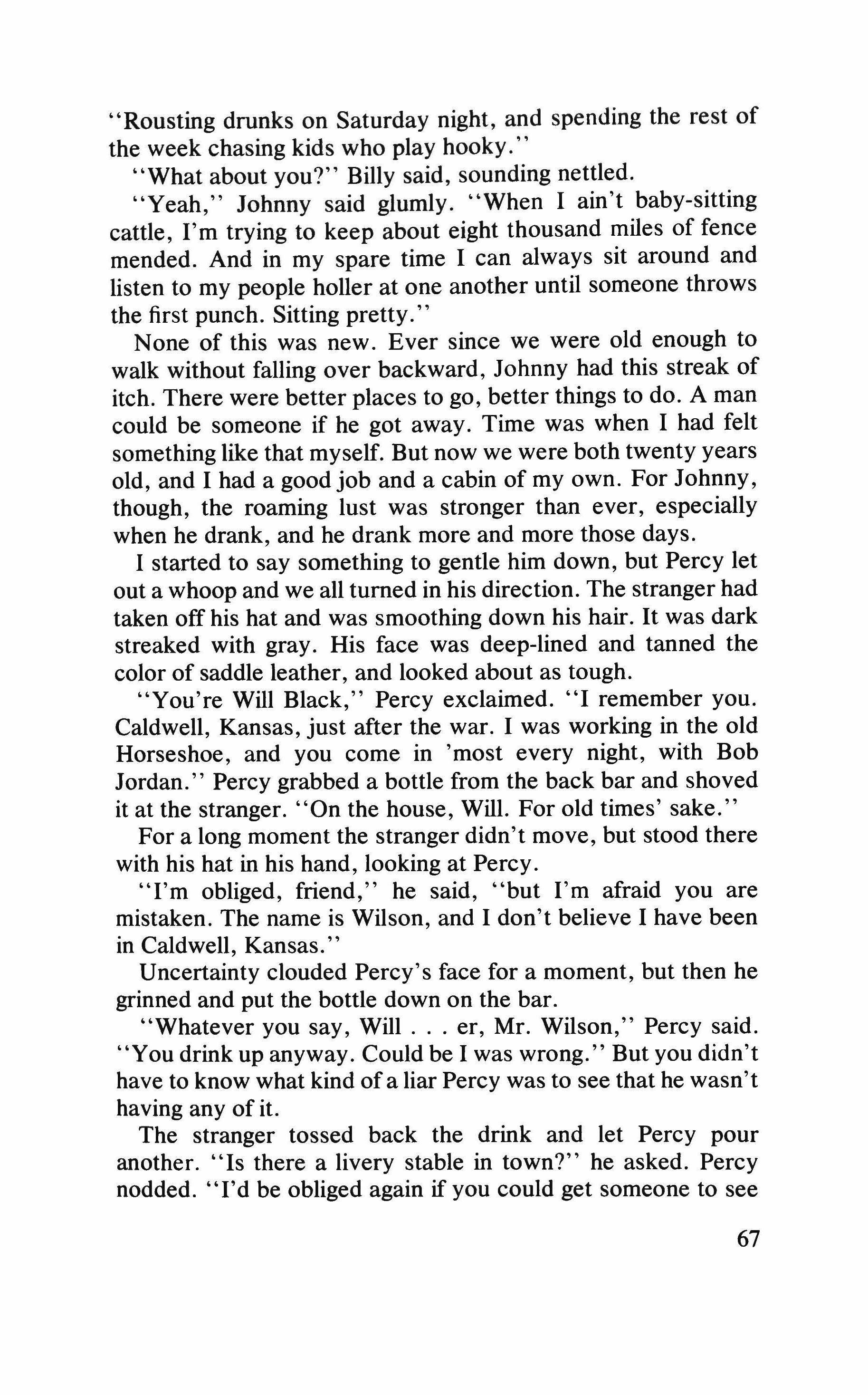
"Rousting drunks on Saturday night, and spending the rest of the week chasing kids who play hooky.
"What about you?" Billy said, sounding nettled.
"Yeah," Johnny said glumly. "When I ain't baby-sitting cattle, I'm trying to keep about eight thousand miles of fence mended. And in my spare time I can always sit around and listen to my people holler at one another until someone throws the first punch. Sitting pretty.
None of this was new. Ever since we were old enough to walk without falling over backward, Johnny had this streak of itch. There were better places to go, better things to do. A man could be someone if he got away. Time was when I had felt something like that myself. But now we were both twenty years old, and I had a good job and a cabin of my own. For Johnny, though, the roaming lust was stronger than ever, especially when he drank, and he drank more and more those days.
I started to say something to gentle him down, but Percy let out a whoop and we all turned in his direction. The stranger had taken off his hat and was smoothing down his hair. It was dark streaked with gray. His face was deep-lined and tanned the color of saddle leather, and looked about as tough.
"You're Will Black," Percy exclaimed. "I remember you. Caldwell, Kansas, just after the war. I was working in the old Horseshoe, and you come in 'most every night, with Bob Jordan." Percy grabbed a bottle from the back bar and shoved it at the stranger. "On the house, Will. For old times' sake."
For a long moment the stranger didn't move, but stood there with his hat in his hand, looking at Percy.
"J'rn obliged, friend," he said, "but I'm afraid you are mistaken. The name is Wilson, and I don't believe I have been in Caldwell, Kansas."
Uncertainty clouded Percy's face for a moment, but then he grinned and put the bottle down on the bar.
"Whatever you say, Will er, Mr. Wilson," Percy said. "You drink up anyway. Could be I was wrong." But you didn't have to know what kind of a liar Percy was to see that he wasn't having any of it.
The stranger tossed back the drink and let Percy pour another. "Is there a livery stable in town?" he asked. Percy nodded. "I'd be obliged again if you could get someone to see
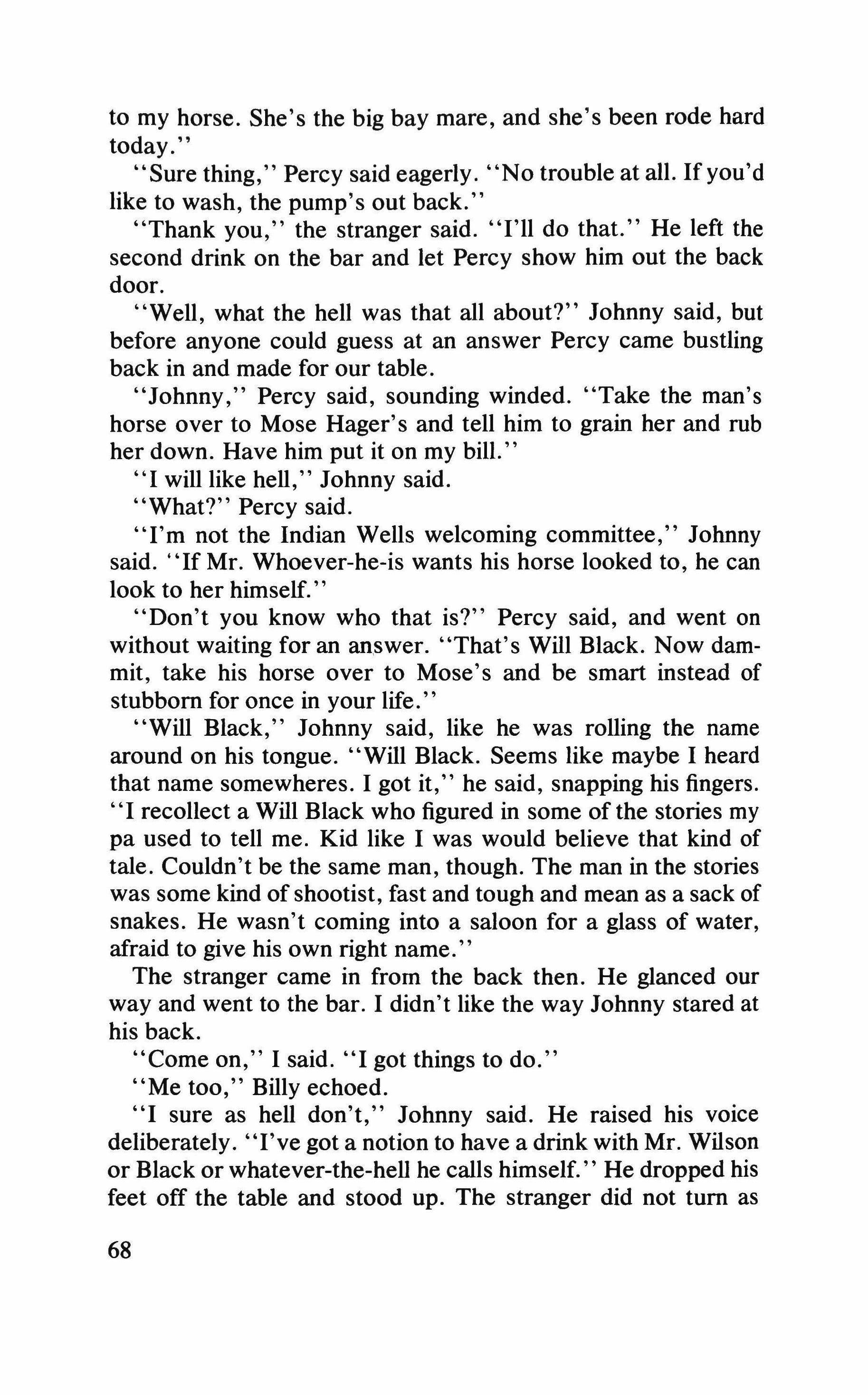
to my horse. She's the big bay mare, and she's been rode hard today. "
"Sure thing," Percy said eagerly. "No trouble at all. If you'd like to wash, the pump's out back."
"Thank you," the stranger said. "I'll do that." He left the second drink on the bar and let Percy show him out the back door.
"Well, what the hell was that all about?" Johnny said, but before anyone could guess at an answer Percy came bustling back in and made for our table.
"Johnny," Percy said, sounding winded. "Take the man's horse over to Mose Hager's and tell him to grain her and rub her down. Have him put it on my bill.
"I will like hell," Johnny said.
"What?" Percy said.
"I'm not the Indian Wells welcoming committee," Johnny said. "If Mr. Whoever-he-is wants his horse looked to, he can look to her himself.
"Don't you know who that is?" Percy said, and went on without waiting for an answer, "That's Will Black. Now dammit, take his horse over to Mose' s and be smart instead of stubborn for once in your life."
"Will Black," Johnny said, like he was rolling the name around on his tongue. "Will Black. Seems like maybe I heard that name somewheres. I got it," he said, snapping his fingers. "I recollect a Will Black who figured in some of the stories my pa used to tell me. Kid like I was would believe that kind of tale. Couldn't be the same man, though. The man in the stories was some kind of shootist, fast and tough and mean as a sack of snakes. He wasn't coming into a saloon for a glass of water, afraid to give his own right name."
The stranger came in from the back then. He glanced our way and went to the bar. I didn't like the way Johnny stared at his back.
"Come on," I said. "I got things to do.
"Me too," Billy echoed.
"I sure as hell don't," Johnny said. He raised his voice deliberately. "I've got a notion to have a drink with Mr. Wilson or Black or whatever-the-hell he calls himself. He dropped his feet off the table and stood up. The stranger did not tum as

Johnny swaggered across the room. "How about it?" Johnny demanded when he reached the bar. "It ain't mannerly to drink by yourself."
The stranger turned and gave Johnny a long, slow look, and for one moment Johnny looked uncertain. "I will buy the drinks," the stranger said mildly, "ifthat will calm you down."
Johnny knew he was being joshed, but he didn't know what to do about it. "I can buy my own drinks," he spat, and slapped his palm down on the bar. "But maybe you had better ease offyourself. More than two drinks can be dangerous for an old man."
"Johnny," Percy said in a low voice. At the end of the bar, the two geezers put down their beers and slipped out the side door.
'Course, maybe you're the kind that likes to live dangerous," Johnny went on. "Maybe you think you can come into a town and walk into a place and tell people to take care of your horse, like you were the Lord High Muckitymuck himself. Maybe you figure everyone is just going to kiss your ass, instead of kicking it, like I'm going to."
The stranger's hand moved as fast as the tip of a bullwhip. One minute it was resting easy on the bar, and the next it had whipped across Johnny's face backhanded, and Johnny was staggering back and holding on to the bar to keep from falling.
Johnny rubbed at his cheek, shook his head once, and his right hand went for his gun. Before it could clear, the stranger's left hand clamped over it. At the same time, his right came around and slammed Johnny under the chin. The punch lifted Johnny off his feet, and he came down hard on the card table. It splintered under his weight, and wooden chips chattered across the floor.
"I didn't ask for this," the stranger said. "When I come peacefully into a town, I will be treated peacefully in return. I won't be abused by gutter trash such as you." His Colt was in his hand, though I had not seen him draw.
Johnny spit blood onto the rough wood floor.
"You better keep that pretty gun of yours handy," Johnny said. "You'll be needing it." He climbed to his feet and rubbed the back of one hand against the place where he had been hit. "This isn't over," he said.
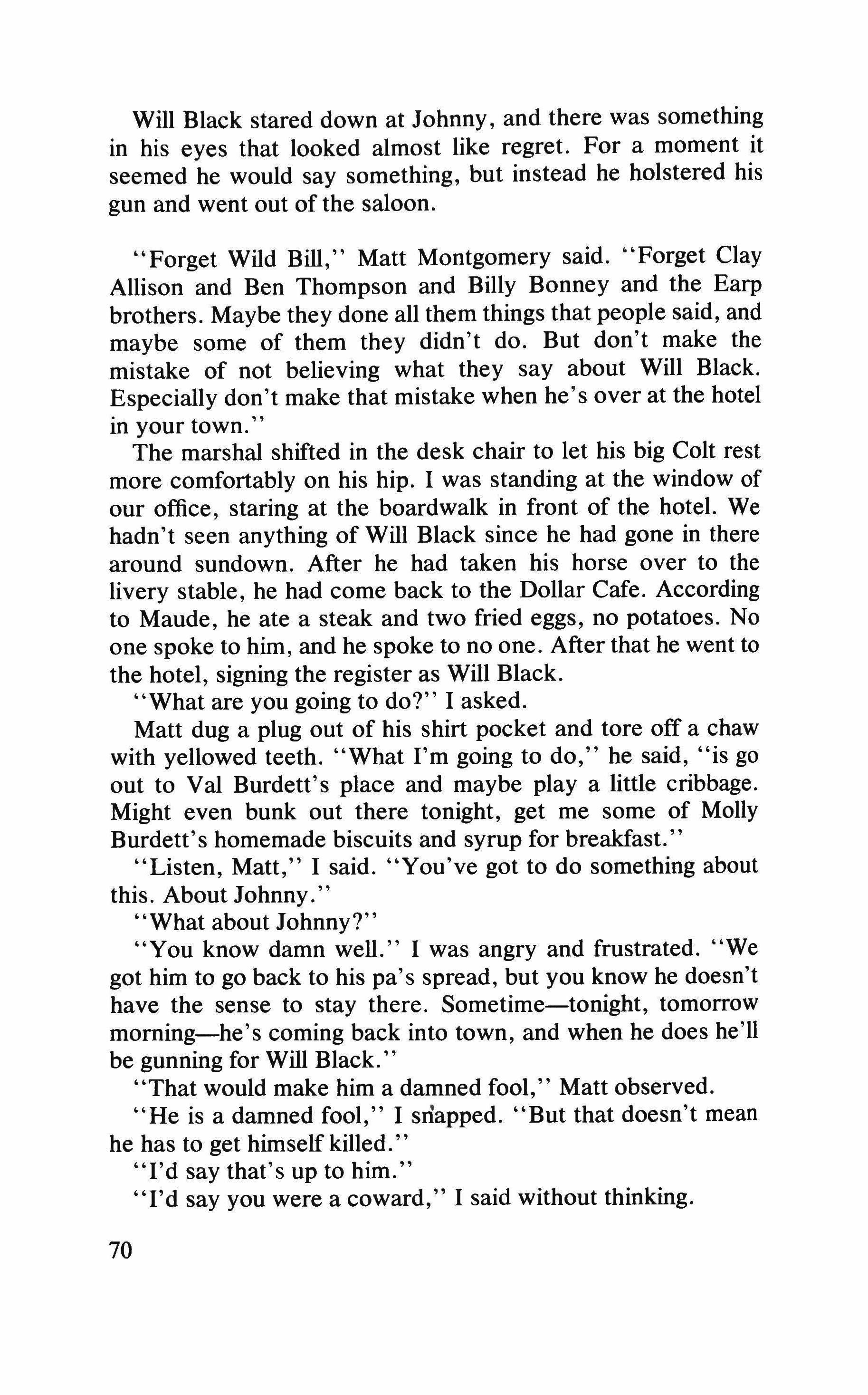
Will Black stared down at Johnny, and there was something in his eyes that looked almost like regret. For a moment it seemed he would say something, but instead he holstered his gun and went out of the saloon.
"Forget Wild Bill," Matt Montgomery said. "Forget Clay Allison and Ben Thompson and Billy Bonney and the Earp brothers. Maybe they done all them things that people said, and maybe some of them they didn't do. But don't make the mistake of not believing what they say about Will Black. Especially don't make that mistake when he's over at the hotel in your town.
The marshal shifted in the desk chair to let his big Colt rest more comfortably on his hip. I was standing at the window of our office, staring at the boardwalk in front of the hotel. We hadn't seen anything of Will Black since he had gone in there around sundown. After he had taken his horse over to the livery stable, he had come back to the Dollar Cafe. According to Maude, he ate a steak and two fried eggs, no potatoes. No one spoke to him, and he spoke to no one. After that he went to the hotel, signing the register as Will Black.
"What are you going to do?" I asked.
Matt dug a plug out of his shirt pocket and tore off a chaw with yellowed teeth. "What I'm going to do," he said, "is go out to Val Burdett's place and maybe playa little cribbage. Might even bunk out there tonight, get me some of Molly Burdett's homemade biscuits and syrup for breakfast."
"Listen, Matt," I said. "You've got to do something about this. About Johnny."
"What about Johnny?"
"You know damn well." I was angry and frustrated. "We got him to go back to his pa's spread, but you know he doesn't have the sense to stay there. Sometime-tonight, tomorrow morning-he's coming back into town, and when he does he'll be gunning for Will Black.
"That would make him a damned fool," Matt observed.
"He is a damned fool," I srlapped. "But that doesn't mean he has to get himself killed."
"I'd say that's up to him."
"I'd say you were a coward," I said without thinking.

Matt looked at me mildly. "I'd say you were about on the right track," he allowed, "if you mean I'm not going to risk my hide trying to tell Will Black what he can do and what he can't.
"What he's going to do is gun down Johnny," I said. "Johnny thinks this is his chance, that all he has to do is take Will Black. He's so wrapped up in it that he can't see that all he's going to be is dead."
"You stop him.
How? By tying him to his bunk and sitting over him with the barrel of my Colt in his ear until Will Black leaves Indian Wells?"
"Johnny ain't likely to take to that," Matt admitted. "Got any other notions?"
I took a deep breath. Someone could talk to Will Black. "
"That's a thought," Matt said. "Go right ahead."
"Maybe I will."
"Good for you," Matt said, and hoisted his bulk out of the chair. "Meanwhile, if you want me for anything, I'll be at Val Burdett's.
The Saturday night hurrahing had not moved into a full gallop yet, but it was off to a fast canter. Most of the boys were already in from the ranches, and all three saloons were doing a pretty good business when I took my first prowl. At O'Keefe's the player piano was pumping out a polka, and Jillie Mason and Sara Daniels, O'Keefe's two girls, were getting twirled around the room by two cowpokes, while other men cheered them on. A couple ofthe older hands who had found religion the last time the tent preacher came through were sitting on the stoop out front, whittling and talking in quiet voices. They hailed me when I came out, so I stood and passed the fat with them for a while before moving on to the Silver Nugget.
The Nugget was the place for the boys who were serious about their poker and faro, and it was quieter than O'Keefe's. Most of its patrons put a good card game above a good drunk, so the Nugget was the least likely spot for trouble on any Saturday night. I looked around long enough to make sure that no sharpers had drifted into town, returned greetings from some of the cowboys and a few of the townsfolk who occasion-
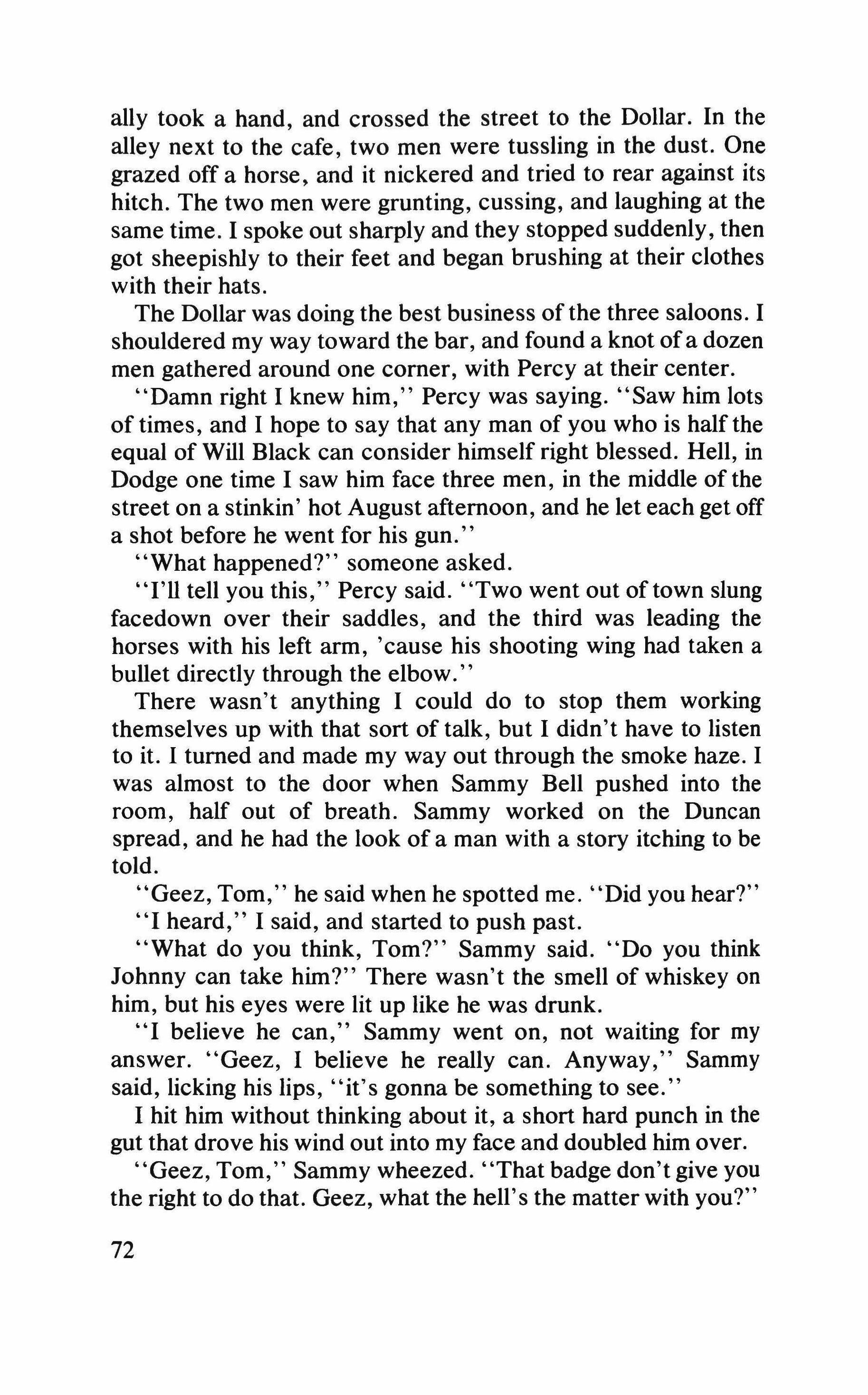
ally took a hand, and crossed the street to the Dollar. In the alley next to the cafe, two men were tussling in the dust. One grazed off a horse, and it nickered and tried to rear against its hitch. The two men were grunting, cussing, and laughing at the same time. I spoke out sharply and they stopped suddenly, then got sheepishly to their feet and began brushing at their clothes with their hats.
The Dollar was doing the best business of the three saloons. I shouldered my way toward the bar, and found a knot of a dozen men gathered around one comer, with Percy at their center.
"Damn right I knew him," Percy was saying. "Saw him lots of times, and I hope to say that any man of you who is half the equal of Will Black can consider himself right blessed. Hell, in Dodge one time I saw him face three men, in the middle of the street on a stinkin' hot August afternoon, and he let each get off a shot before he went for his gun."
"What happened?" someone asked.
"I'll tell you this," Percy said. "Two went out of town slung facedown over their saddles, and the third was leading the horses with his left arm, 'cause his shooting wing had taken a bullet directly through the elbow.
There wasn't anything I could do to stop them working themselves up with that sort of talk, but I didn't have to listen to it. I turned and made my way out through the smoke haze. I was almost to the door when Sammy Bell pushed into the room, half out of breath. Sammy worked on the Duncan spread, and he had the look of a man with a story itching to be told.
"Geez, Tom," he said when he spotted me. "Did you hear?"
"I heard," I said, and started to push past.
"What do you think, Tom?" Sammy said. "Do you think Johnny can take him?" There wasn't the smell of whiskey on him, but his eyes were lit up like he was drunk.
"I believe he can," Sammy went on, not waiting for my answer. "Geez, I believe he really can. Anyway," Sammy said, licking his lips, "it's gonna be something to see."
I hit him without thinking about it, a short hard punch in the gut that drove his wind out into my face and doubled him over.
"Geez, Tom," Sammy wheezed. "That badge don't give you the right to do that. Geez, what the hell's the matter with you?"
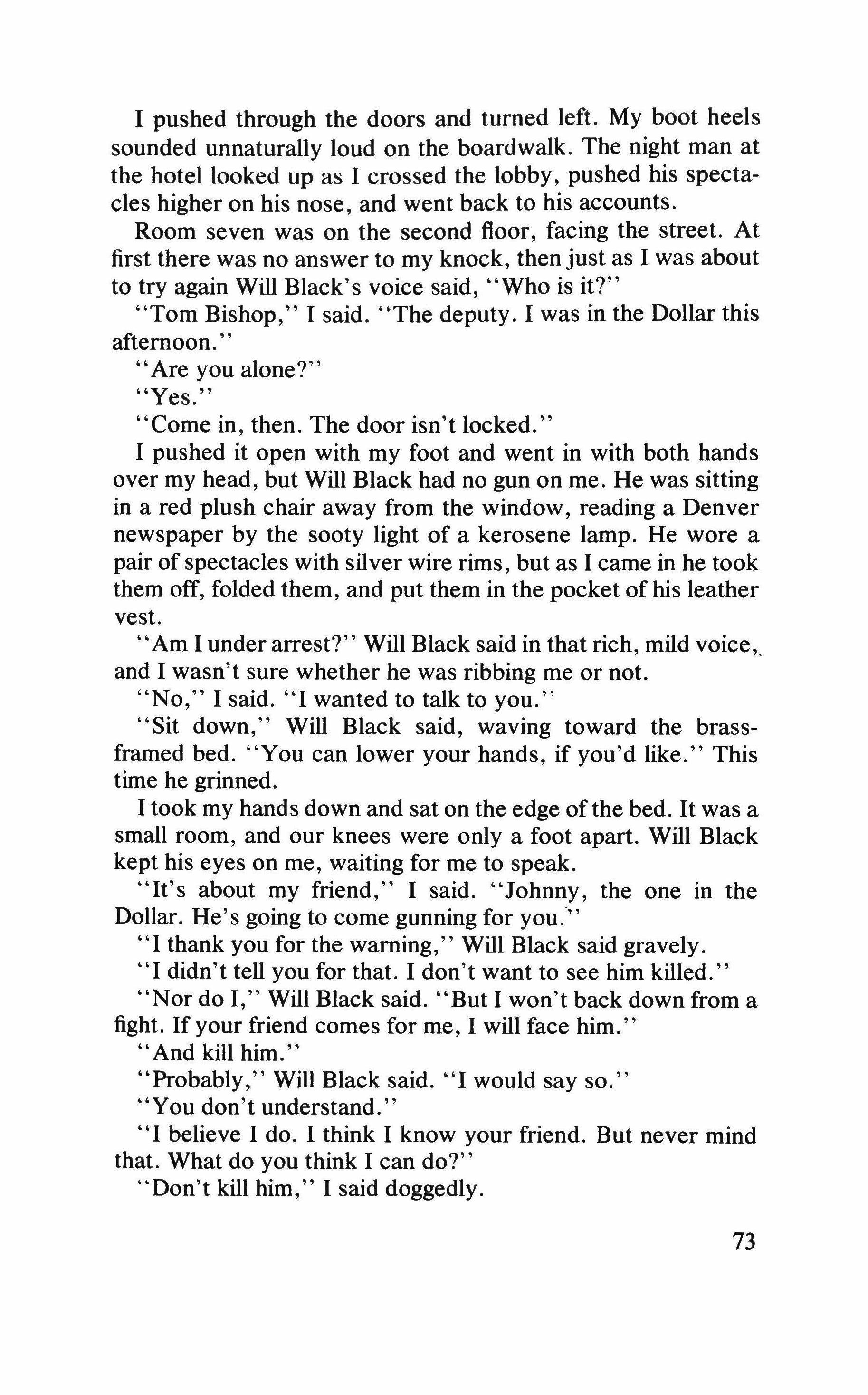
I pushed through the doors and turned left. My boot heels sounded unnaturally loud on the boardwalk. The night man at the hotel looked up as I crossed the lobby, pushed his spectacles higher on his nose, and went back to his accounts.
Room seven was on the second floor, facing the street. At first there was no answer to my knock, then just as I was about to try again Will Black's voice said, "Who is it?"
"Tom Bishop," I said. "The deputy. I was in the Dollar this afternoon.
"Are you alone?"
"Yes."
"Come in, then. The door isn't locked."
I pushed it open with my foot and went in with both hands over my head, but Will Black had no gun on me. He was sitting in a red plush chair away from the window, reading a Denver newspaper by the sooty light of a kerosene lamp. He wore a pair of spectacles with silver wire rims, but as I came in he took them off, folded them, and put them in the pocket of his leather vest.
"Am I under arrest?" Will Black said in that rich, mild voice; and I wasn't sure whether he was ribbing me or not.
"No," I said. "I wanted to talk to you."
"Sit down," Will Black said, waving toward the brassframed bed. "You can lower your hands, if you'd like." This time he grinned.
I took my hands down and sat on the edge ofthe bed. It was a small room, and our knees were only a foot apart. Will Black kept his eyes on me, waiting for me to speak.
"It's about my friend," I said. "Johnny, the one in the Dollar. He's going to come gunning for you."
"I thank you for the warning," Will Black said gravely.
"I didn't tell you for that. I don't want to see him killed."
"Nor do I," Will Black said. "But I won't back down from a fight. If your friend comes for me, I will face him."
"And kill him."
"Probably," Will Black said. "I would say so."
"You don't understand."
"I believe I do. I think I know your friend. But never mind that. What do you think I can do?"
"Don't kill him," I said doggedly.
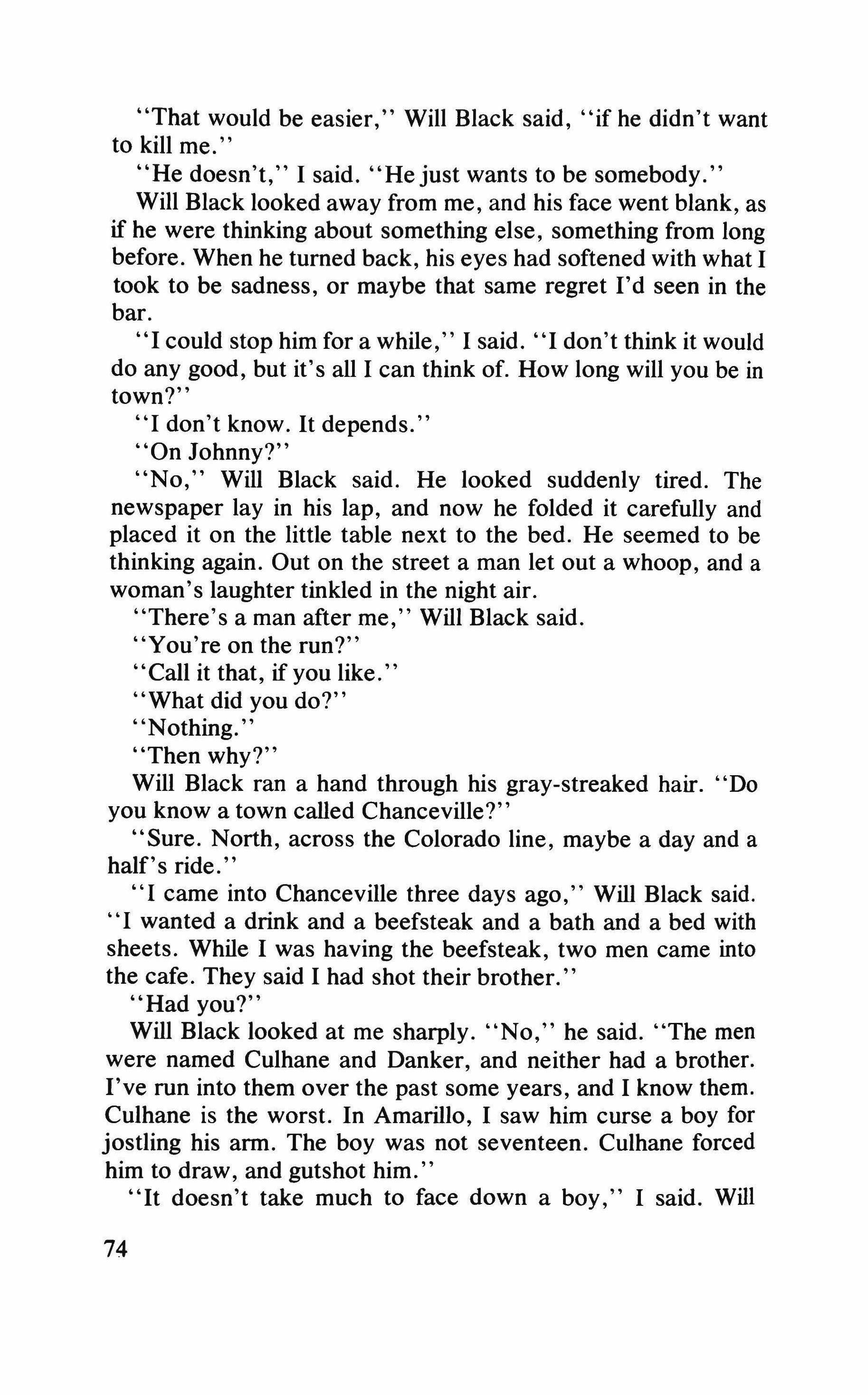
"That would be easier," Will Black said, "if he didn't want to kill me."
"He doesn't," I said. "Hejust wants to be somebody."
Will Black looked away from me, and his face went blank, as if he were thinking about something else, something from long before. When he turned back, his eyes had softened with what I took to be sadness, or maybe that same regret I'd seen in the bar.
"I could stop him for a while," I said. "I don't think it would do any good, but it's all I can think of. How long will you be in town?"
"I don't know. It depends."
"On Johnny?"
"No," Will Black said. He looked suddenly tired. The newspaper lay in his lap, and now he folded it carefully and placed it on the little table next to the bed. He seemed to be thinking again. Out on the street a man let out a whoop, and a woman's laughter tinkled in the night air.
"There's a man after me," Will Black said.
"You're on the run?"
"Call it that, if you like."
"What did you do?"
"Nothing.
"Then why?"
Will Black ran a hand through his gray-streaked hair. "Do you know a town called Chanceville?"
"Sure. North, across the Colorado line, maybe a day and a half's ride."
"I came into Chanceville three days ago," Will Black said. "I wanted a drink and a beefsteak and a bath and a bed with sheets. While I was having the beefsteak, two men came into the cafe. They said I had shot their brother."
"Had you?"
Will Black looked at me sharply. "No," he said. "The men were named Culhane and Danker, and neither had a brother. I've run into them over the past some years, and I know them. Culhane is the worst. In Amarillo, I saw him curse a boy for jostling his arm. The boy was not seventeen. Culhane forced him to draw, and gutshot him."
"It doesn't take much to face down a boy," I said. Will

Black's gaze held me like a lance. "Where would men like these get the sand to bother you?" I got out.
"There were two of them, and they'd been drinking."
"But why? Why come at you like that for no reason?"
"Because I am Will Black." I thought there should have been anger in his tone, but there was just the flat way he told his story.
"I'm fifty-one years old," Will Black said. "The days of my gun are behind me, but still they won't leave me be.
"I wouldn't fight in the cafe or anywhere," Will Black said. "I left Chanceville the next morning, with the hope that Culhane and Danker would not follow. Often men such as those don't. This time they did. They bushwacked me in a rock defile fourteen miles out of town. I killed Danker and left Culhane in the desert without horse or gun. I gave him his boots. I won't kill a man in cold blood."
"So he might still be after you.
"Yes," Will Black said. "The next town south from here is a day's ride. I'll wait for a few days, or until Culhane arrives. If he is still after me, I'll meet him in a town, where I stand a chance in a fair fight, not in the desert where he'll cut me down from ambush."
"In the meantime," I said, "you'll face Johnny."
"I don't wish to kill your friend, any more than I wish to kill Culhane.
"But you will. If he calls you out, you will."
"I can't think of any way around it," Will Black said.
Indian Wells that Sunday morning was an eerie place. The quiet that had settled over the town wasn't the usual Sunday serenity, but a tense, pulled-in quiet, like a battlefield just before dawn. The saloons were doing a brisk business, but even there the atmosphere was dense with expectation. The men drank and talked in low voices, and the bartenders seemed to move on tiptoes.
From where I stood in front of the marshal's office, the street appeared nearly deserted. An old hound came out of the alley, lifted his leg against a hitching post, and looked around uncertainly before skulking under the boardwalk. At the end of the street, the churchbell rang out the start of ten 0'clock worship, 75

but no townspeople in their Sunday best appeared to stroll down the street toward the sound. It was hot and windless, the sky slate gray, the sun an indistinct yellow blur.
I had been up nearly four hours already, but I wasn't tired. I had ridden out in the false dawn, reaching the Duncan spread by seven. Johnny was already up. I followed the faint sound of gunfire and found him in a draw a half mile from the big house. He went on pulling and firing and reloading as we talked. We kept our voices low, as if we too had agreed that only gunfire should disturb the quiet of that Sunday morning.
"I won't back off, Tom," Johnny said finally. He held the gun loosely, the barrel pointed at the ground. "I've thought it out too much already, and I won't think any longer. I'll do what I guess I have to.
He bent and picked up a rock the size of a fist, and tossed it off about twenty-five feet, and before it stopped rolling he brought up the gun and pinged a chip off it. I had never seen him move so fast nor shoot so well, and I said so.
"Yeah," Johnny said thoughtfully. "I guess I didn't tell you I've been practicing." He looked at me and pulled his hat down against the morning glare. "I reckon today 1 find out the difference between a rock and a man.
Now, back in town, 1 stood waiting, not knowing what else to do. True to his word, Matt had left the night before. He had not come back yet, nor did 1 expect him before the shooting was over. Matt Montgomery was fifty-eight years old, and he had been town marshal for twenty-two of those years, and he had not reached either mark by standing in the way of guns.
The churchbell rang out its last note, and the quiet settled back on the town like a shroud on a corpse. Across the street, a cowhand I didn't know stuck his head out of O'Keefe's and looked up and down the street, then dashed back into the saloon.
A minute later Johnny came into view off to the west of town, walking his mount. There was something cold and determined in the set of his body.
Behind me, the noise of voices suddenly flared, and when I turned 1 saw that men were coming out of the three saloons. They lined the boardwalks on both sides of the street, talking in low voices among themselves, their gazes alternating between

Johnny's approaching figure and the doorway of the hotel. Mostly they were cowhands in from the ranches. There were few townsfolk among them.
Then they fell silent, and there on the walk in front of the hotel stood Will Black, tall and lean and straight, and dressed as he had been when he rode in, all dark except the white linen shirt and the Peacemaker riding low on his left hip.
Will Black looked up and down the street, taking in the silent cowboys, and then Johnny Duncan, moving slowly toward town. But just as Johnny passed the church and started up the street, Will Black's eyes shifted to me, and he raised his hand, and I raised mine back. Then Will Black stepped down to the dust of the street, and turned to face Johnny Duncan.
Johnny reined up directly in front of me, though he didn't look my way. He dismounted and slapped his gelding on the rump, and the horse trotted off to one side, where one of the men grabbed his reins. Moving very slowly, Johnny adjusted his holster on his hip, then moved his hand away from his side.
"I reckon you know why I've come," Johnny said.
"I do," Will Black said. He spoke quietly, but his voice carried to all our ears. "I don't think you are acting rightly, but that is your concern. I understand that you want a fight, and I'm not a man to back down from that."
Johnny Duncan took a step forward, and the men stiffened. Will Black didn't move. Both hands were braced on his hips.
Johnny took another step, and another, and still Will Black stood motionless. Less than twenty-five feet separated them now.
"Draw, damn you," Johnny said in a tight voice.
"All right," Will Black said, and did.
Someone hollered "No!" and a shot cracked out at the same time. I didn't know until long after that it was me who called out. Nor could I have said that I saw Will Black's left hand move, but now he stood there with his gun extended, black powder smoke drifting around him, and watched Johnny crumple to his knees in the dust, falling like he expected he was killed.
For a long moment no one moved, and then Percy Deegan stepped gingerly into the street and went to where Johnny knelt.

"[ don't believe it," Percy said. "I saw it, but [don't believe it." He bent and picked up Johnny's gun. "Look," he said to us, and held it up.
I learned right then that some men can do magic as easy as life. The trigger guard was parted in two, and the strands of steel were twisted out of shape where the bullet had cut them. Johnny looked up and shook his right hand, as if it were numb.
Percy grabbed the hand and stared at it.
"There ain't a mark on him," Percy announced, "not a damn scratch.
"Back off, " Will Black said coldly, and every head turned to him. The ivory-handled Peacemaker was still in his hand. Percy dropped Johnny's gun and stepped quickly away. For a moment, no one moved. Then Will Black turned his head toward me, gave me the slightest nod, and moved forward.
Johnny looked nervously at his gun, lying in the dirt three feet from his hand. Will Black stood over him.
"You need not worry," Will Black said. He holstered his Colt. "I wouldn't waste another slug on the likes of you."
Will Black reached down and grabbed a handful of Johnny's shirtfront, and dragged him forward. As Johnny came up, Will Black hit him with the open palm of his left hand. He slapped him three times, his hand a moving blur, then tossed him back into the dust.
"Go home, boy," Will Black said in a flat voice. "You aren't cut out for this work." He turned abruptly and started up the street.
Then, before anyone could stop him, Johnny scrambled on hands and knees to his gun, and raised it with both hands. If Will Black heard Johnny, he showed no sign of it.
Johnny shot him three times in the back.
There was neither sound nor movement. Then Johnny slowly lowered the gun and slumped to the ground. Several of the men rushed to Will Black, and I went to Johnny. He looked up at me, and the fire had gone out of his eyes. When I dragged him to his feet, his chin dropped to his chest and he would not look at me again.
"Right in the heart, all three shots," Percy said. "He was dead before he hit the ground." Percy straightened and spat into the dust. "I guess you did what you set out to, Johnny," he
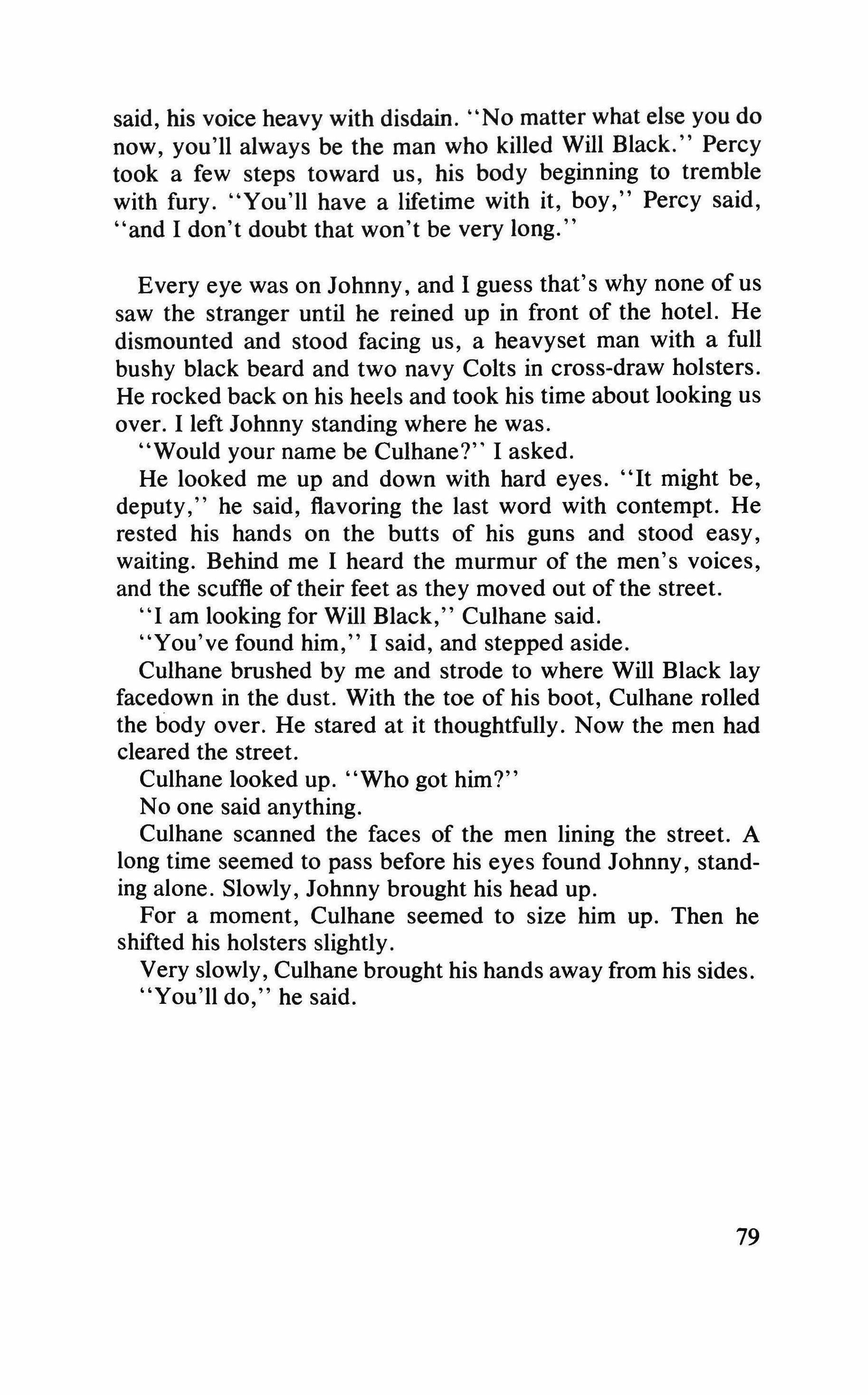
said, his voice heavy with disdain. "No matter what else you do now, you'll always be the man who killed Will Black." Percy took a few steps toward us, his body beginning to tremble with fury. "You'll have a lifetime with it, boy," Percy said, "and I don't doubt that won't be very long."
Every eye was on Johnny, and I guess that's why none of us saw the stranger until he reined up in front of the hotel. He dismounted and stood facing us, a heavyset man with a full bushy black beard and two navy Colts in cross-draw holsters. He rocked back on his heels and took his time about looking us over. I left Johnny standing where he was.
"Would your name be Culhane?" I asked.
He looked me up and down with hard eyes. "It might be, deputy," he said, flavoring the last word with contempt. He rested his hands on the butts of his guns and stood easy, waiting. Behind me I heard the murmur of the men's voices, and the scuffle of their feet as they moved out of the street.
"I am looking for Will Black," Culhane said.
"You've found him," I said, and stepped aside.
Culhane brushed by me and strode to where Will Black lay facedown in the dust. With the toe of his boot, Culhane rolled the body over. He stared at it thoughtfully. Now the men had cleared the street.
Culhane looked up. "Who got him?"
Noone said anything.
Culhane scanned the faces of the men lining the street. A long time seemed to pass before his eyes found Johnny, standing alone. Slowly, Johnny brought his head up.
For a moment, Culhane seemed to size him up. Then he shifted his holsters slightly.
Very slowly, Culhane brought his hands away from his sides.
"You'll do," he said.

Shorty Harris was a gold prospector around the turn of the century. His tombstone in Death Valley reads:
Bury me beside Jim Dayton in the valley we loved. Above me write, "Here lies Shorty Harris, a single-blanketjackass prospector."
How he came to that end is the subject of a novel by Bill Bevis.
Early in the novel, his father dead, the young Shorty leaves his wife and child and his assayingjob in a desert mining camp to lookfor gold in the northern Rockies. Thefollowing chapters are about gold, the center ofShorty's life, and hisfirst strike.
I have before me on the table a small vial of gold. Perhaps fifty little flakes and nuggets, dull orange and yellow; they would all fit on Illy thumbnail. One pan's worth-ten minutes' work once the deposit is found-about a dollar in Shorty's day, and today worth more and more as the earth that birthed it dies. I panned it in April Creek last year, not two miles from where Shorty's search began. This is secondary, "placer" gold.
O'Sullivanphotograpbofa Virginia Citygold minercourtesy the Historical Pictures Service, Inc; Chicago
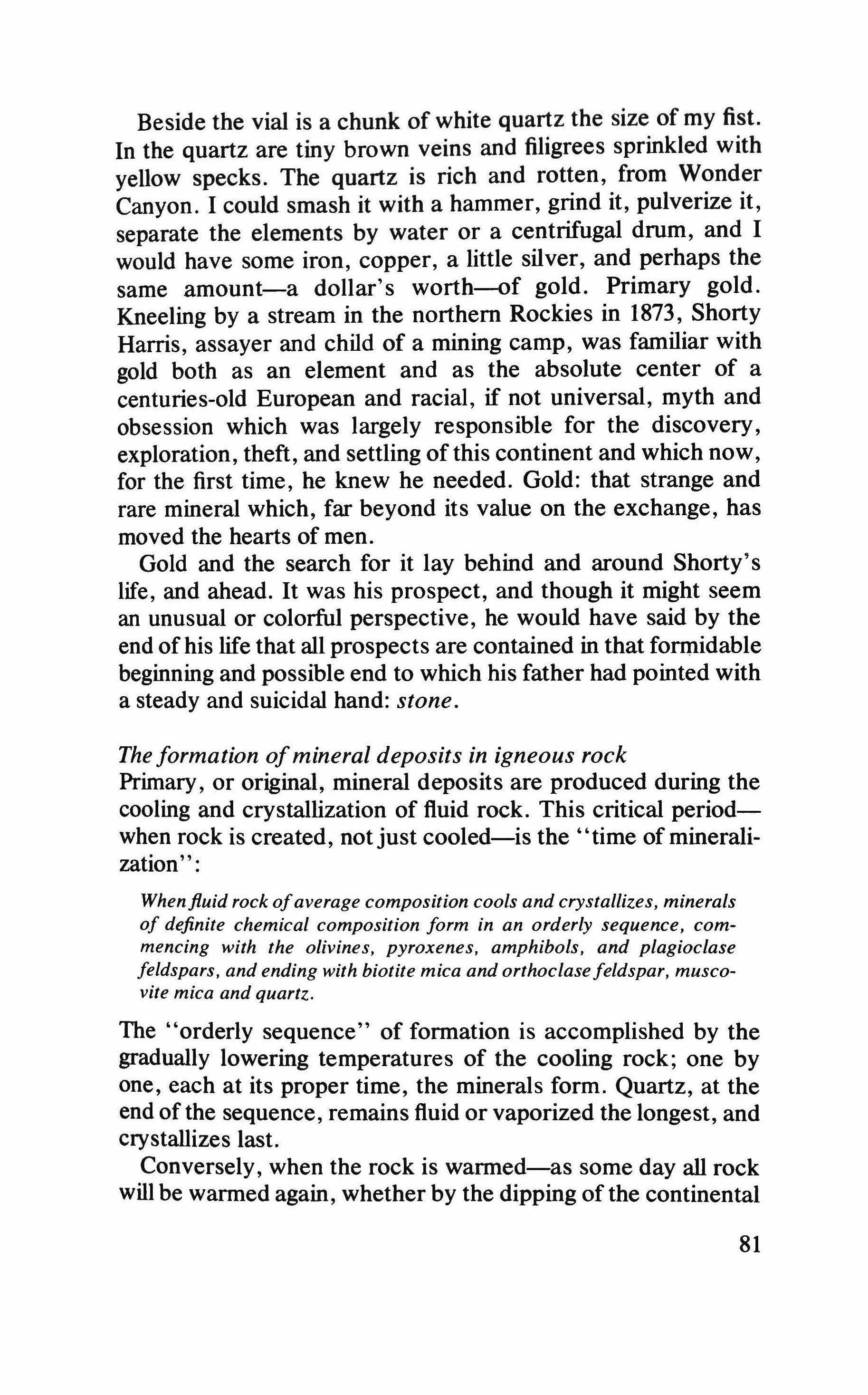
Beside the vial is a chunk of white quartz the size of my fist. In the quartz are tiny brown veins and filigrees sprinkled with yellow specks. The quartz is rich and rotten, from Wonder Canyon. I could smash it with a hammer, grind it, pulverize it, separate the elements by water or a centrifugal drum, and I would have some iron, copper, a little silver, and perhaps the same amount-a dollar's worth-of gold. Primary gold.
Kneeling by a stream in the northern Rockies in 1873, Shorty Harris, assayer and child of a mining camp, was familiar with gold both as an element and as the absolute center of a centuries-old European and racial, if not universal, myth and obsession which was largely responsible for the discovery, exploration, theft, and settling of this continent and which now, for the first time, he knew he needed. Gold: that strange and rare mineral which, far beyond its value on the exchange, has moved the hearts of men.
Gold and the search for it lay behind and around Shorty's life, and ahead. It was his prospect, and though it might seem an unusual or colorful perspective, he would have said by the end of his life that all prospects are contained in that formidable beginning and possible end to which his father had pointed with a steady and suicidal hand: stone.
The formation ofmineral deposits in igneous rock
Primary, or original, mineral deposits are produced during the cooling and crystallization of fluid rock. This critical periodwhen rock is created, not just cooled-is the "time of mineralization":
Whenfluid rock ofaverage composition cools and crystallizes, minerals of definite chemical composition form in an orderly sequence, commencing with the olivines, pyroxenes, amphibols, and plagioclase feldspars, and ending with biotite mica and orthoclasefeldspar, muscovite mica and quartz.
The "orderly sequence" of formation is accomplished by the gradually lowering temperatures of the cooling rock; one by one, each at its proper time, the minerals form. Quartz, at the end of the sequence, remains fluid or vaporized the longest, and crystallizes last.
Conversely, when the rock is warmed-as some day all rock will be warmed again, whether by the dipping of the continental
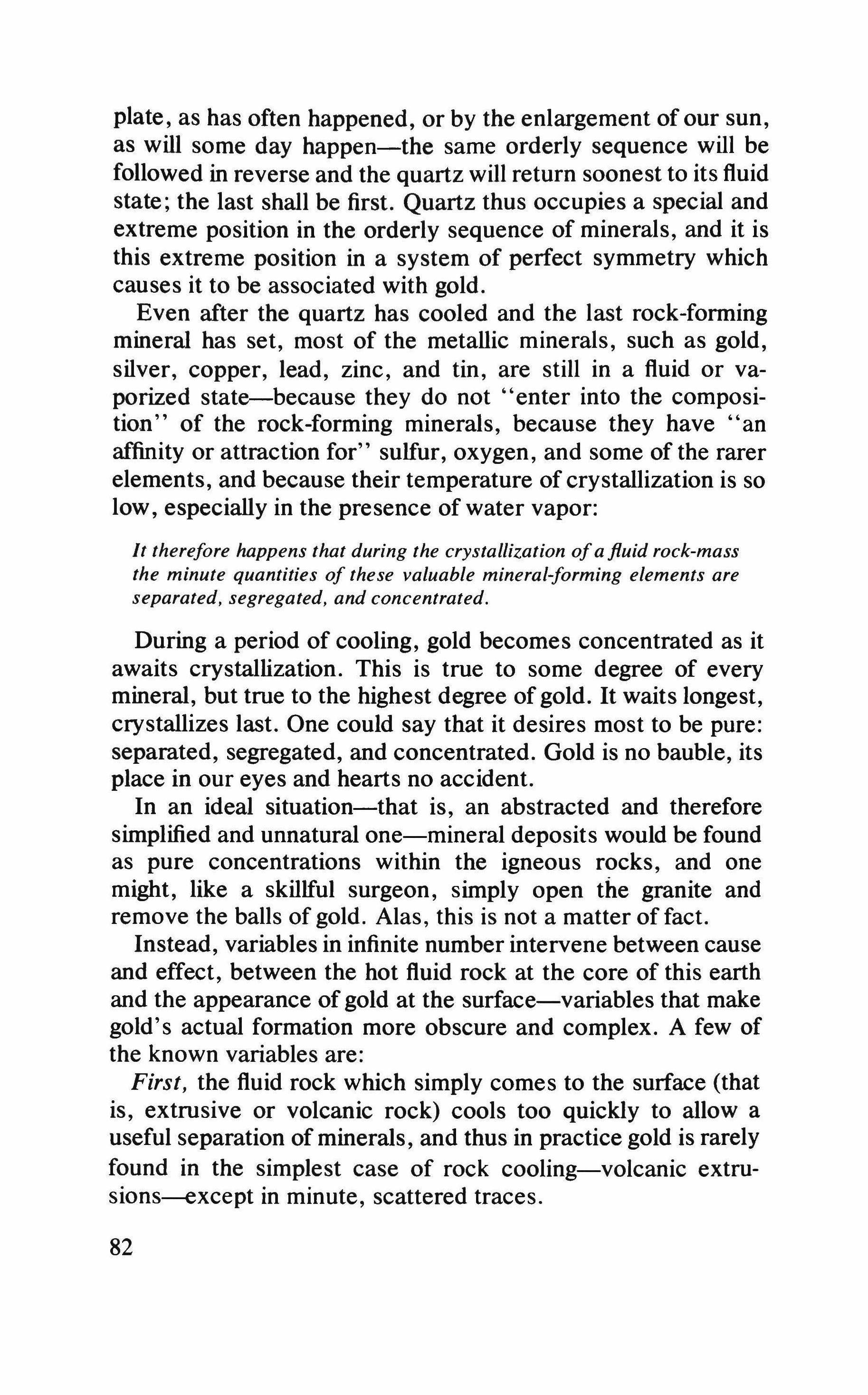
plate, as has often happened, or by the enlargement of our sun, as will some day happen-the same orderly sequence will be followed in reverse and the quartz will return soonest to its fluid state; the last shall be first. Quartz thus occupies a special and extreme position in the orderly sequence of minerals, and it is this extreme position in a system of perfect symmetry which causes it to be associated with gold.
Even after the quartz has cooled and the last rock-forming mineral has set, most of the metallic minerals, such as gold, silver, copper, lead, zinc, and tin, are still in a fluid or vaporized state-because they do not "enter into the composition" of the rock-forming minerals, because they have "an affinity or attraction for" sulfur, oxygen, and some of the rarer elements, and because their temperature of crystallization is so low, especially in the presence of water vapor:
It therefore happens that during the crystallization of a fluid rock-mass the minute quantities of these valuable mineral-forming elements are separated, segregated, and concentrated.
During a period of cooling, gold becomes concentrated as it awaits crystallization. This is true to some degree of every mineral, but true to the highest degree of gold. It waits longest, crystallizes last. One could say that it desires most to be pure: separated, segregated, and concentrated. Gold is no bauble, its place in our eyes and hearts no accident.
In an ideal situation-that is, an abstracted and therefore simplified and unnatural one-mineral deposits would be found as pure concentrations within the igneous rocks, and one might, like a skillful surgeon, simply open the granite and remove the balls of gold. Alas, this is not a matter of fact.
Instead, variables in infinite number intervene between cause and effect, between the hot fluid rock at the core of this earth and the appearance of gold at the surface-variables that make gold's actual formation more obscure and complex. A few of the known variables are:
First, the fluid rock which simply comes to the surface (that is, extrusive or volcanic rock) cools too quickly to allow a useful separation of minerals, and thus in practice gold is rarely found in the simplest case of rock cooling-volcanic extrusions-except in minute, scattered traces.
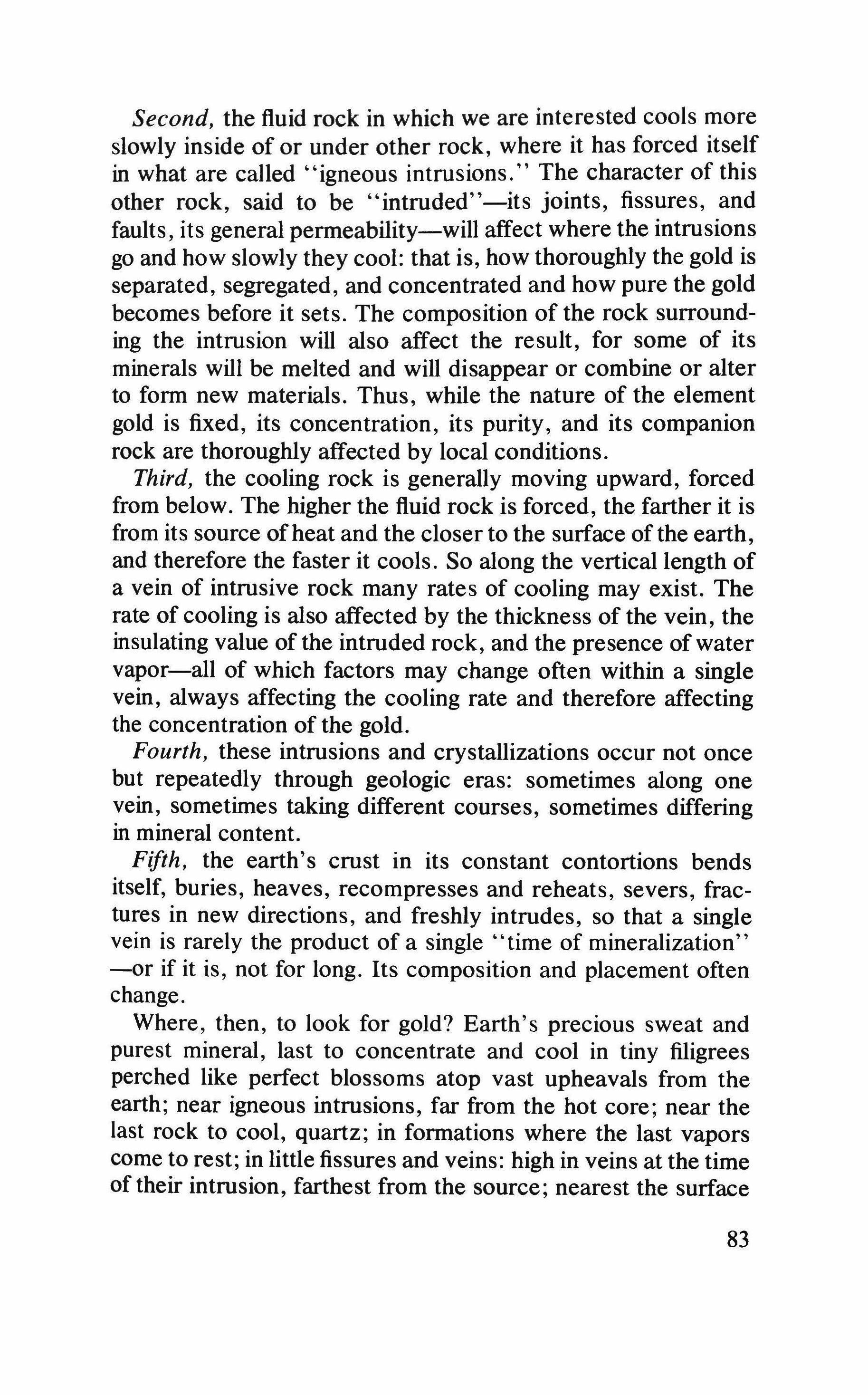
Second, the fluid rock in which we are interested cools more slowly inside of or under other rock, where it has forced itself in what are called "igneous intrusions." The character of this other rock, said to be "intruded"-its joints, fissures, and faults, its general permeability-will affect where the intrusions go and how slowly they cool: that is, how thoroughly the gold is separated, segregated, and concentrated and how pure the gold becomes before it sets. The composition of the rock surrounding the intrusion will also affect the result, for some of its minerals will be melted and will disappear or combine or alter to form new materials. Thus, while the nature of the element gold is fixed, its concentration, its purity, and its companion rock are thoroughly affected by local conditions.
Third, the cooling rock is generally moving upward, forced from below. The higher the fluid rock is forced, the farther it is from its source ofheat and the closer to the surface of the earth, and therefore the faster it cools. So along the vertical length of a vein of intrusive rock many rates of cooling may exist. The rate of cooling is also affected by the thickness of the vein, the insulating value of the intruded rock, and the presence of water vapor-all of which factors may change often within a single vein, always affecting the cooling rate and therefore affecting the concentration of the gold.
Fourth, these intrusions and crystallizations occur not once but repeatedly through geologic eras: sometimes along one vein, sometimes taking different courses, sometimes differing in mineral content.
Fifth, the earth's crust in its constant contortions bends itself, buries, heaves, recompresses and reheats, severs, fractures in new directions, and freshly intrudes, so that a single vein is rarely the product of a single "time of mineralization" -or if it is, not for long. Its composition and placement often change.
Where, then, to look for gold? Earth's precious sweat and purest mineral, last to concentrate and cool in tiny filigrees perched like perfect blossoms atop vast upheavals from the earth; near igneous intrusions, far from the hot core; near the last rock to cool, quartz; in formations where the last vapors come to rest; in little fissures and veins: high in veins at the time of their intrusion, farthest from the source; nearest the surface

in veins drawn out long and fine, veins of quartz that experienced one delicate temperature change out of millions and now lie momentarily exposed, blossoming veins breaking through the crust--earth to air, one element meeting another, naked to the eye-but the bloom no sooner opens than it begins to weather, fade, fall, and wash away.
So then it is a thin slice of time and space, the top of a vertical line, a point really, a vanishing point-a moment only and the delicate flower is gone--where and when one finds primary gold.
To find primary gold one must, like an apprentice, move through the lower stages of knowledge and desire, approach through traces that wash away. Those lower traces are secondary gold.
A mineral six to nine times the weight of water, such as copper, is considered heavy; silver, eleven times the weight of water, very heavy. Gold, depending on its purity, has a specific gravity of 15.6 to 19.3. Even in highly impure fields, when gold is sometimes alloyed with silver, the prospector knows that the gold in a stream will be at least eleven times heavier than water. One of the heaviest elements, gold is the heaviest mineral or rock likely to be found in its environment. Magnetite, for instance, is 72.4 percent iron and has a specific gravity of 5. Agitate a pan of water and gravel: below the magnetite will be copper, below the copper will be silver, below the silver will be gold-gold which has been removed from its primary deposit. Whereas the placement of primary gold depends upon temperature, the placement of secondary gold always depends, in one way or another, upon weight. This is reasonable, for the secondary gold is sinking back toward the center of the earth, and gravity, not rising heat, is now its law. Appropriately, aU weight is measured by the standard of water; for water is the greatest agent of downward movement on the surface of the earth.
It is a fine paradox that the lightest particles reach the sea first, while the heaviest particles remain high up nearest their source, at every moment sinking so effectively that the stream can hardly carry them along. Gold has such extraordinary

weight that water carries off everything else first, leaving the gold further "separated, segregated, and concentrated" into little pockets, or "placers," ofwaterworn nuggets close to their source.
In a primary deposit, fused by heat and pressure, fresh from the core and then cooled, the elements are imperfectly separated, unevenly distributed, and sometimes complexly alloyed; a primary deposit is in its origin, nature, and general situation somewhat rough. Hence the saying, "The more hackly, the closer to the source."
A secondary deposit is more refined, being the result not of creation but of something more like dispassionate analysis; in a secondary deposit, waterjudges size and weight, separates and sorts, makes clear distinctions. When all the world is sand, the gold will be pure at the bottom. But even so, the secondary is not primary-for without heat, what would water sort? One shudders-all clarity and no matter, the mind without passion, a bottomless sea. No, there must be deposits of both kinds: hot rock and cold water. Though the search for it has driven men to madness, the contemplation of gold, which tends toward all extremes, brings one to a halt and therefore, in some cases, to rest.
Secondary mineral deposits are formed by the weathering of primary deposits, followed by the transportation and concentration of freed minerals. The prospector must know how this weathering works. The following are agents that can weather rock, turning back the upthrust of the earth until it falls of its own weight upon itself:
Air. Chemical weathering: oxygen and other gases interact with chemicals in the rock. "Ore deposits are sometimes greatly changed in the zone of oxidation, certain or all minerals being removed, some entirely, some only to be re-deposited a little deeper to form zones of enrichment.
Because of this enriching drainage, in the Southwest there is another saying: 'The deeper the richer." Mechanical weathering occurs when temperature changes cause the rock to expand and contract and when wind-borne particles abrade.
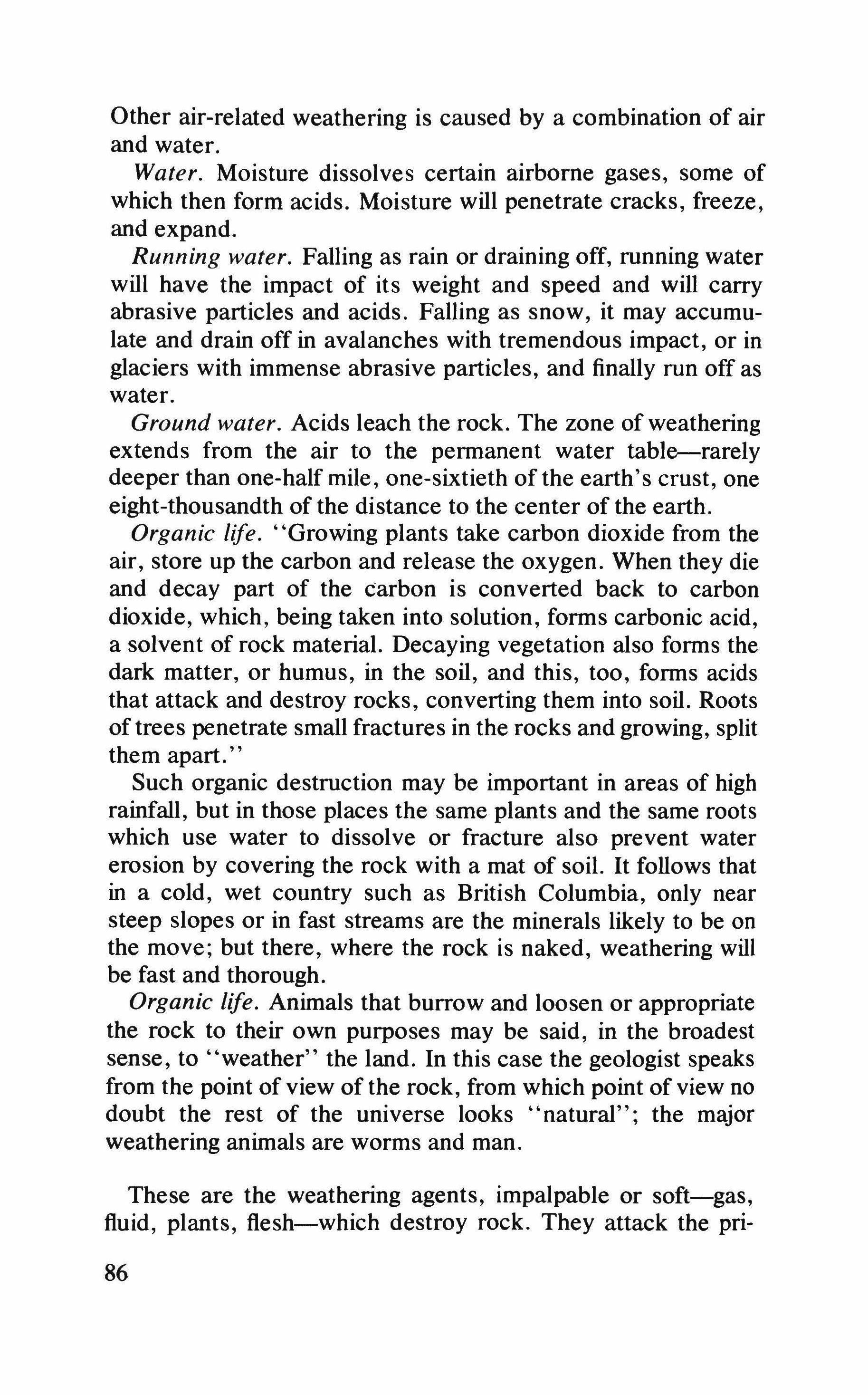
Other air-related weathering is caused by a combination of air and water.
Water. Moisture dissolves certain airborne gases, some of which then form acids. Moisture will penetrate cracks, freeze, and expand.
Running water. Falling as rain or draining off, running water will have the impact of its weight and speed and will carry abrasive particles and acids. Falling as snow, it may accumulate and drain off in avalanches with tremendous impact, or in glaciers with immense abrasive particles, and finally run off as water.
Ground water. Acids leach the rock. The zone of weathering extends from the air to the permanent water table----rarely deeper than one-half mile, one-sixtieth of the earth's crust, one eight-thousandth of the distance to the center of the earth.
Organic life. "Growing plants take carbon dioxide from the air, store up the carbon and release the oxygen. When they die and decay part of the carbon is converted back to carbon dioxide, which, being taken into solution, forms carbonic acid, a solvent of rock material. Decaying vegetation also forms the dark matter, or humus, in the soil, and this, too, forms acids that attack and destroy rocks, converting them into soil. Roots of trees penetrate small fractures in the rocks and growing, split them apart."
Such organic destruction may be important in areas of high rainfall, but in those places the same plants and the same roots which use water to dissolve or fracture also prevent water erosion by covering the rock with a mat of soil. It follows that in a cold, wet country such as British Columbia, only near steep slopes or in fast streams are the minerals likely to be on the move; but there, where the rock is naked, weathering will be fast and thorough.
Organic life. Animals that burrow and loosen or appropriate the rock to their own purposes may be said, in the broadest sense, to "weather" the land. In this case the geologist speaks from the point of view of the rock, from which point of view no doubt the rest of the universe looks "natural"; the major weathering animals are worms and man.
These are the weathering agents, impalpable or soft-gas, fluid, plants, flesh-which destroy rock. They attack the pri-
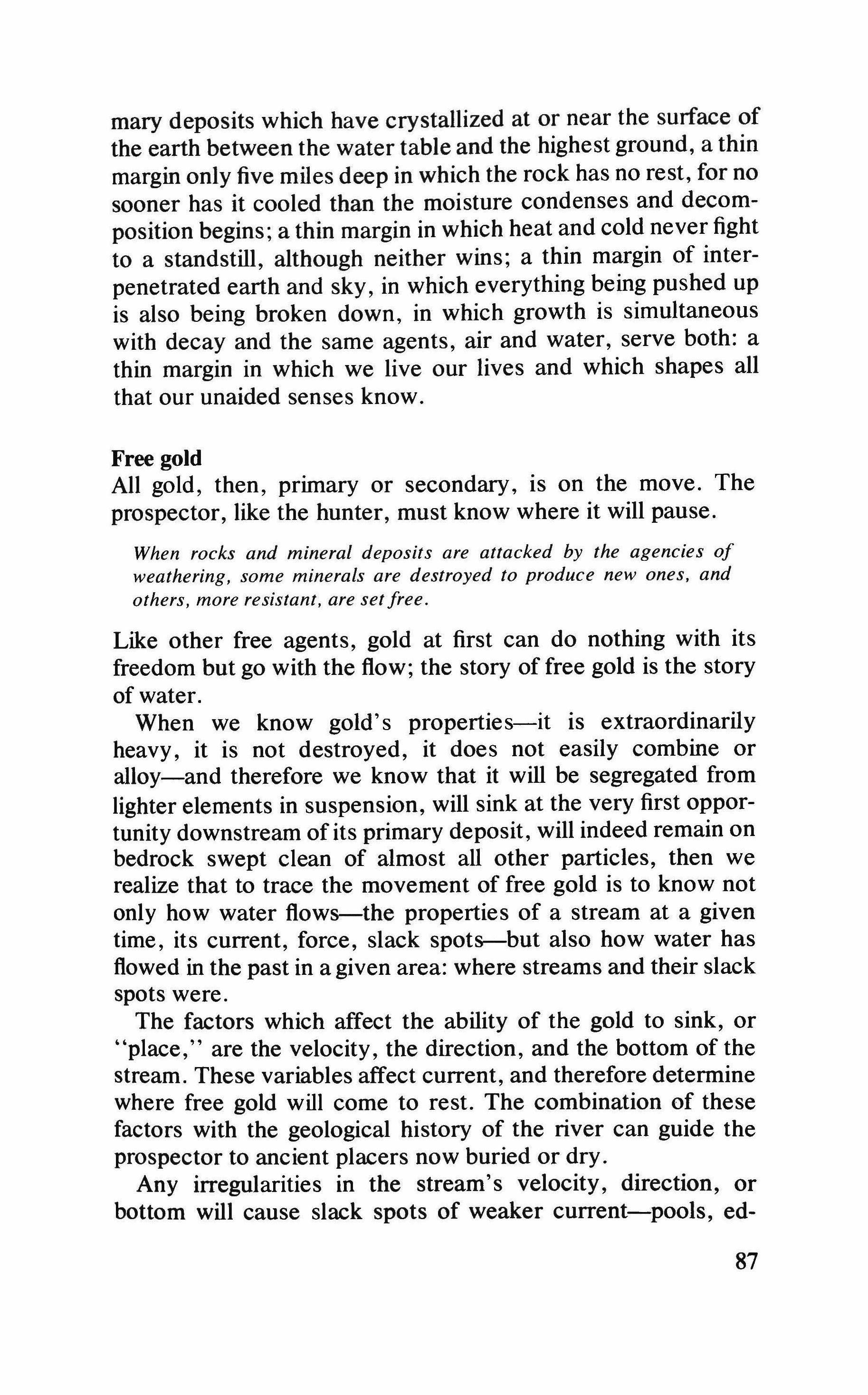
mary deposits which have crystallized at or near the surface of the earth between the water table and the highest ground, a thin margin only five miles deep in which the rock has no rest, for no sooner has it cooled than the moisture condenses and decomposition begins; a thin margin in which heat and cold never fight to a standstill, although neither wins; a thin margin of interpenetrated earth and sky, in which everything being pushed up is also being broken down, in which growth is simultaneous with decay and the same agents, air and water, serve both: a thin margin in which we live our lives and which shapes all that our unaided senses know.
All gold, then, primary or secondary, is on the move. The prospector, like the hunter, must know where it will pause.
When rocks and mineral deposits are attacked by the agencies of weathering, some minerals are destroyed to produce new ones, and others, more resistant, are set free.
Like other free agents, gold at first can do nothing with its freedom but go with the flow; the story of free gold is the story of water.
When we know gold's properties-it is extraordinarily heavy, it is not destroyed, it does not easily combine or alloy-and therefore we know that it will be segregated from lighter elements in suspension, will sink at the very first opportunity downstream of its primary deposit, will indeed remain on bedrock swept clean of almost all other particles, then we realize that to trace the movement of free gold is to know not only how water flows-the properties of a stream at a given time, its current, force, slack spots-but also how water has flowed in the past in a given area: where streams and their slack spots were.
The factors which affect the ability of the gold to sink, or "place," are the velocity, the direction, and the bottom of the stream. These variables affect current, and therefore determine where free gold will come to rest. The combination of these factors with the geological history of the river can guide the prospector to ancient placers now buried or dry.
Any irregularities in the stream's velocity, direction, or bottom will cause slack spots of weaker current-pools, ed-
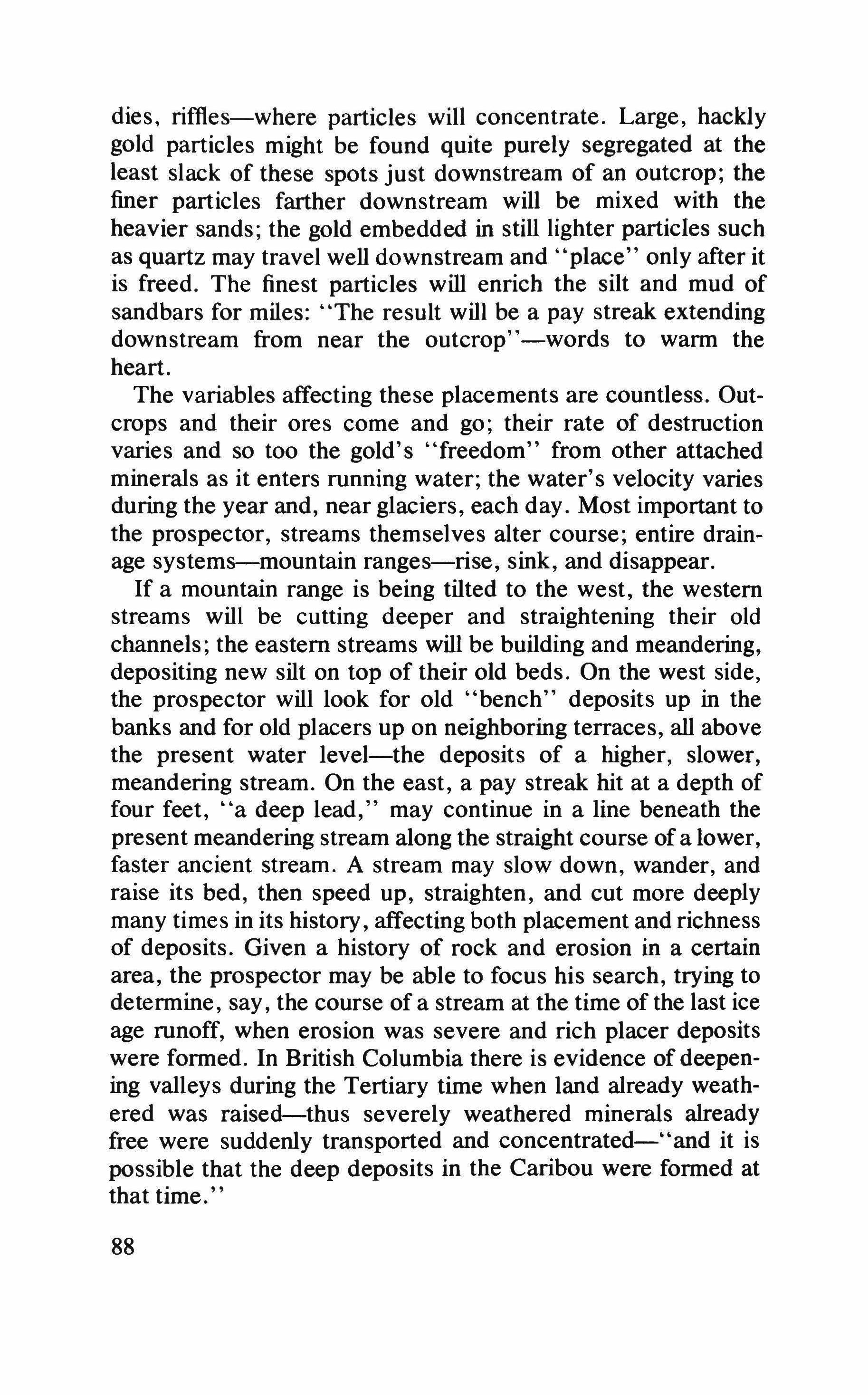
dies, riffles-where particles will concentrate. Large, hackly gold particles might be found quite purely segregated at the least slack of these spots just downstream of an outcrop; the finer particles farther downstream will be mixed with the heavier sands; the gold embedded in still lighter particles such as quartz may travel well downstream and "place" only after it is freed. The finest particles will enrich the silt and mud of sandbars for miles: "The result will be a pay streak extending downstream from near the outcrop"-words to warm the heart.
The variables affecting these placements are countless. Outcrops and their ores come and go; their rate of destruction varies and so too the gold's "freedom" from other attached minerals as it enters running water; the water's velocity varies during the year and, near glaciers, each day. Most important to the prospector, streams themselves alter course; entire drainage systems-mountain ranges-rise, sink, and disappear.
If a mountain range is being tilted to the west, the western streams will be cutting deeper and straightening their old channels; the eastern streams will be building and meandering, depositing new silt on top of their old beds. On the west side, the prospector will look for old "bench" deposits up in the banks and for old placers up on neighboring terraces, all above the present water level-the deposits of a higher, slower, meandering stream. On the east, a pay streak hit at a depth of four feet, "a deep lead," may continue in a line beneath the present meandering stream along the straight course of a lower, faster ancient stream. A stream may slow down, wander, and raise its bed, then speed up, straighten, and cut more deeply many times in its history, affecting both placement and richness of deposits. Given a history of rock and erosion in a certain area, the prospector may be able to focus his search, trying to determine, say, the course of a stream at the time of the last ice age runoff, when erosion was severe and rich placer deposits were formed. In British Columbia there is evidence of deepening valleys during the Tertiary time when land already weathered was raised-thus severely weathered minerals already free were suddenly transported and concentrated-"and it is possible that the deep deposits in the Caribou were formed at that time."
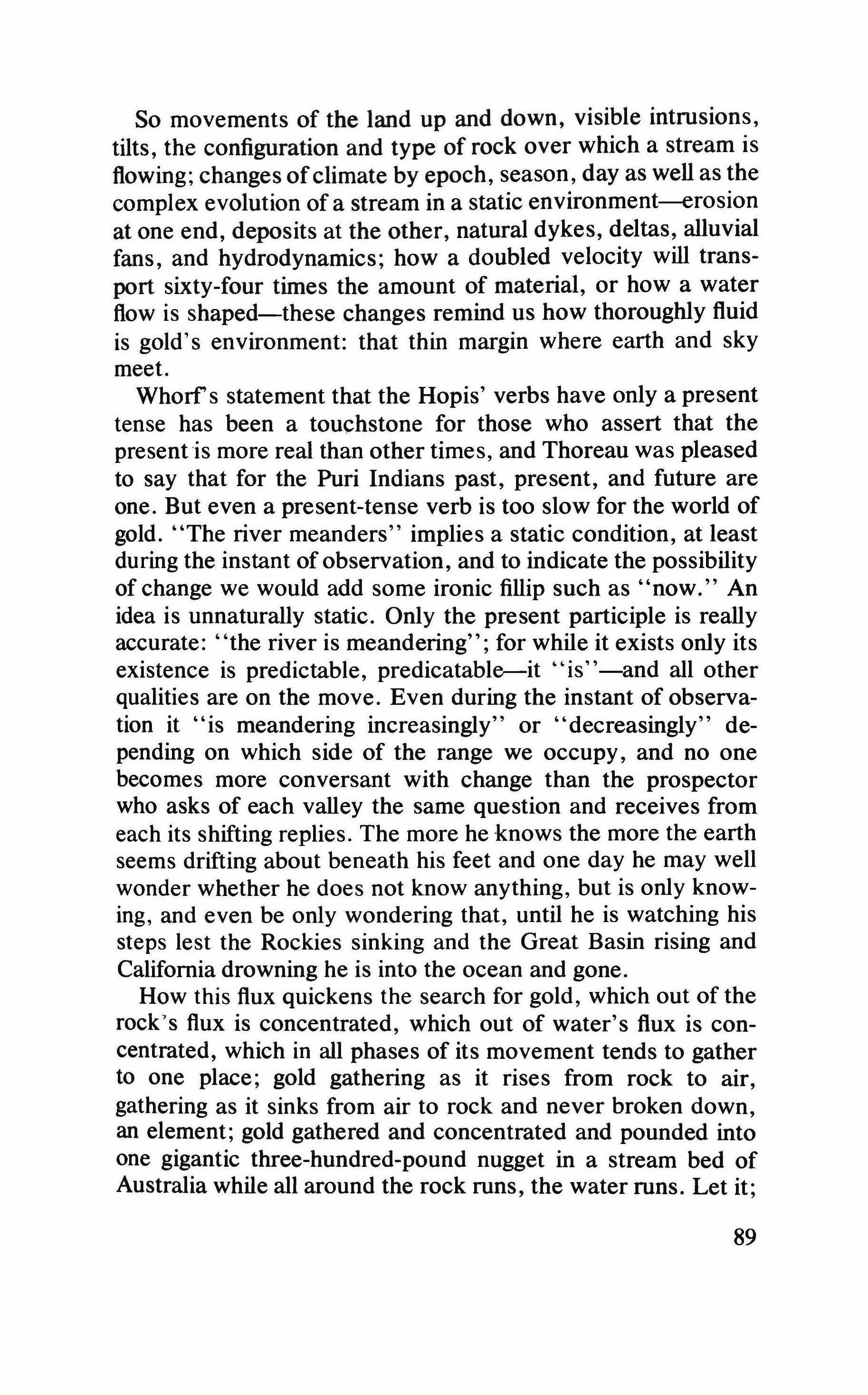
So movements of the land up and down, visible intrusions, tilts, the configuration and type of rock over which a stream is flowing; changes ofclimate by epoch, season, day as well as the complex evolution of a stream in a static environment-erosion at one end, deposits at the other, natural dykes, deltas, alluvial fans, and hydrodynamics; how a doubled velocity will transport sixty-four times the amount of material, or how a water flow is shaped-these changes remind us how thoroughly fluid is gold's environment: that thin margin where earth and sky meet.
Whorfs statement that the Hopis' verbs have only a present tense has been a touchstone for those who assert that the present is more real than other times, and Thoreau was pleased to say that for the Puri Indians past, present, and future are one. But even a present-tense verb is too slow for the world of gold. "The river meanders" implies a static condition, at least during the instant ofobservation, and to indicate the possibility of change we would add some ironic fillip such as "now." An idea is unnaturally static. Only the present participle is really accurate: "the river is meandering"; for while it exists only its existence is predictable, predicatable-it "is"-and all other qualities are on the move. Even during the instant of observation it "is meandering increasingly" or "decreasingly" depending on which side of the range we occupy, and no one becomes more conversant with change than the prospector who asks of each valley the same question and receives from each its shifting replies. The more he knows the more the earth seems drifting about beneath his feet and one day he may well wonder whether he does not know anything, but is only knowing, and even be only wondering that, until he is watching his steps lest the Rockies sinking and the Great Basin rising and California drowning he is into the ocean and gone.
How this flux quickens the search for gold, which out of the rock's flux is concentrated, which out of water's flux is concentrated, which in all phases of its movement tends to gather to one place; gold gathering as it rises from rock to air, gathering as it sinks from air to rock and never broken down, an element; gold gathered and concentrated and pounded into one gigantic three-hundred-pound nugget in a stream bed of Australia while all around the rock runs, the water runs. Let it;
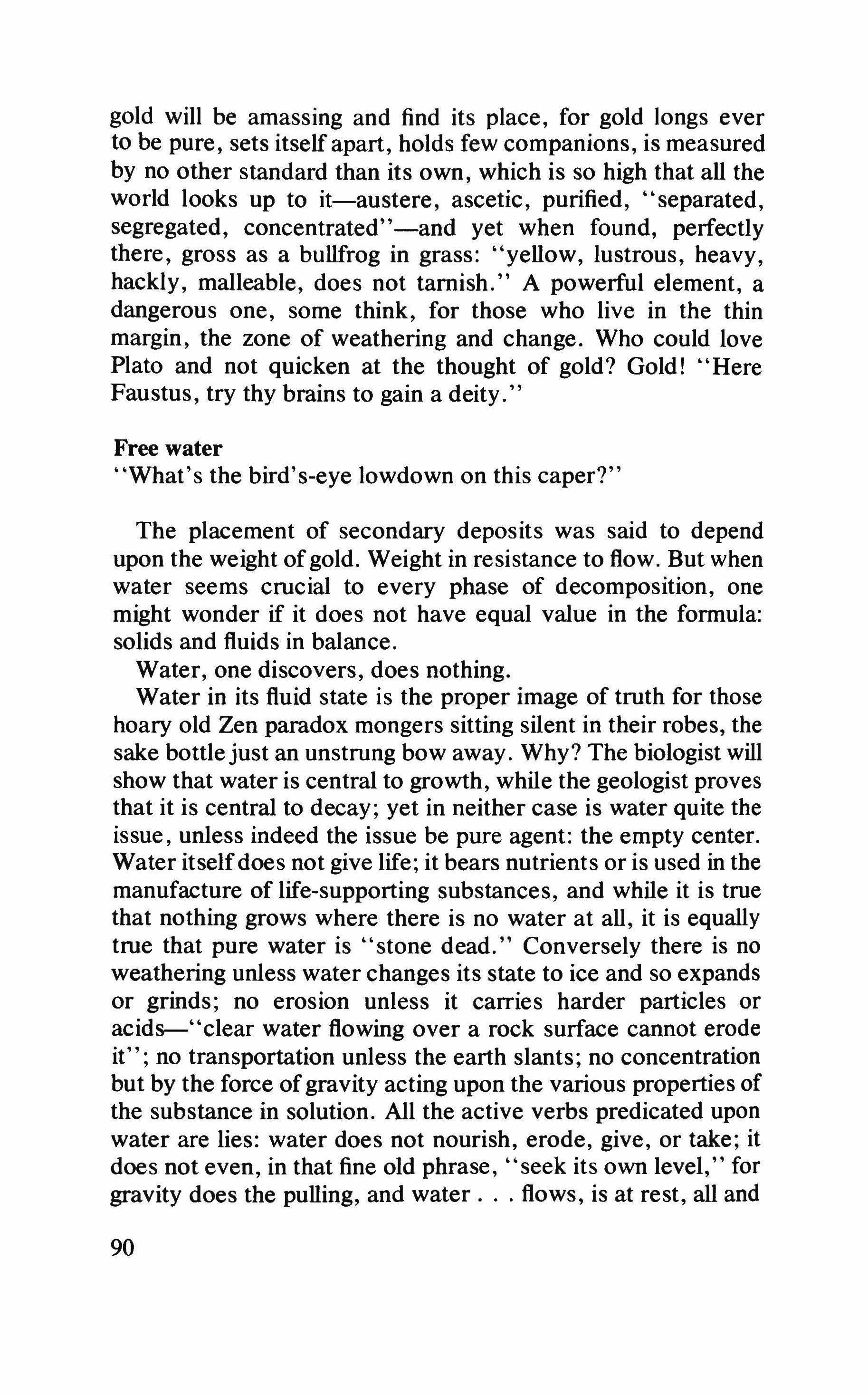
gold will be amassing and find its place, for gold longs ever to be pure, sets itself apart, holds few companions, is measured by no other standard than its own, which is so high that all the world looks up to it-austere, ascetic, purified, "separated, segregated, concentrated"-and yet when found, perfectly there, gross as a bullfrog in grass: "yellow, lustrous, heavy, hackly, malleable, does not tarnish." A powerful element, a dangerous one, some think, for those who live in the thin margin, the zone of weathering and change. Who could love Plato and not quicken at the thought of gold? Gold! "Here Faustus, try thy brains to gain a deity."
Free water
"What's the bird's-eye lowdown on this caper?"
The placement of secondary deposits was said to depend upon the weight ofgold. Weight in resistance to flow. But when water seems crucial to every phase of decomposition, one might wonder if it does not have equal value in the formula: solids and fluids in balance.
Water, one discovers, does nothing.
Water in its fluid state is the proper image of truth for those hoary old Zen paradox mongers sitting silent in their robes, the sake bottlejust an unstrung bow away. Why? The biologist will show that water is central to growth, while the geologist proves that it is central to decay; yet in neither case is water quite the issue, unless indeed the issue be pure agent: the empty center. Water itselfdoes not give life; it bears nutrients or is used in the manufacture of life-supporting substances, and while it is true that nothing grows where there is no water at all, it is equally true that pure water is "stone dead." Conversely there is no weathering unless water changes its state to ice and so expands or grinds; no erosion unless it carries harder particles or acids-"clear water flowing over a rock surface cannot erode it"; no transportation unless the earth slants; no concentration but by the force ofgravity acting upon the various properties of the substance in solution. All the active verbs predicated upon water are lies: water does not nourish, erode, give, or take; it does not even, in that fine old phrase, "seek its own level," for gravity does the pulling, and water flows, is at rest, all and

nothing. Water waters. So much for language. Beyond is all peace and the bottle. It has often been noticed that prospectors, cowboys, Indians, and Zen masters are extraordinarily selfcontained and thirsty men.
As an assayer, Shorty already knew fire. Now in the other elements--earth, water, air-he looked for his place.
The leisure passed. No stopping now. He approached the peak again; he would stay on its right to watch for the second vein. He placed a foot and tested; then a hand; he began to move up to the right on steep blocks of rock away from the ridge. In a few minutes he was in shadow on the west face, surprised at the cold. Snow was frozen on the ledges; the drip water had formed slick, dark ice. The rock was steep. He couldn't ascend. There seemed to be a crack or gully farther around, so he edged sideways until he reached the gap. It was a snow gully in the rock. He couldn't see how far it went, up to the right. He climbed around the outside comer of rock and reached a foot out to the snow. It was firm. He kicked a toehold, moved into it, placed his palms on the snow and started up.
He found a slab of sharp slate-greenish, weathered, nothing. He looked up quickly, then down; it made him dizzy. He picked up the slate and used it to dig footsteps. When the snow became so steep that he had to push his fingers in, he looked around. The sight of a basin far below made his stomach tum. He ascended a few more steps, then stopped again. His fingers were cold. His left foot seemed to be slipping out. Perhaps his footholds were melting. He suddenly felt off balance and looked for an exit from the gully. How could he move sideways? Couldn't reach far enough down and away to cut a footstep to the side. He'd have to lean out. Cut a handhold. His fingers were numb. He slowly withdrew his right foot from its toe hole and allowed all his weight to settle on the left. It wasn't a nice feeling; the slope seemed vertical. He kicked his toe at the snow as far to the right as he could reach, gently at first, then harder. When his boot was buried to the laces he tried to put weight on it, but he couldn't bring himself to move over. Cut a handhold. He leaned his ear against the snow and, breathing hard, above his head he slowly transferred
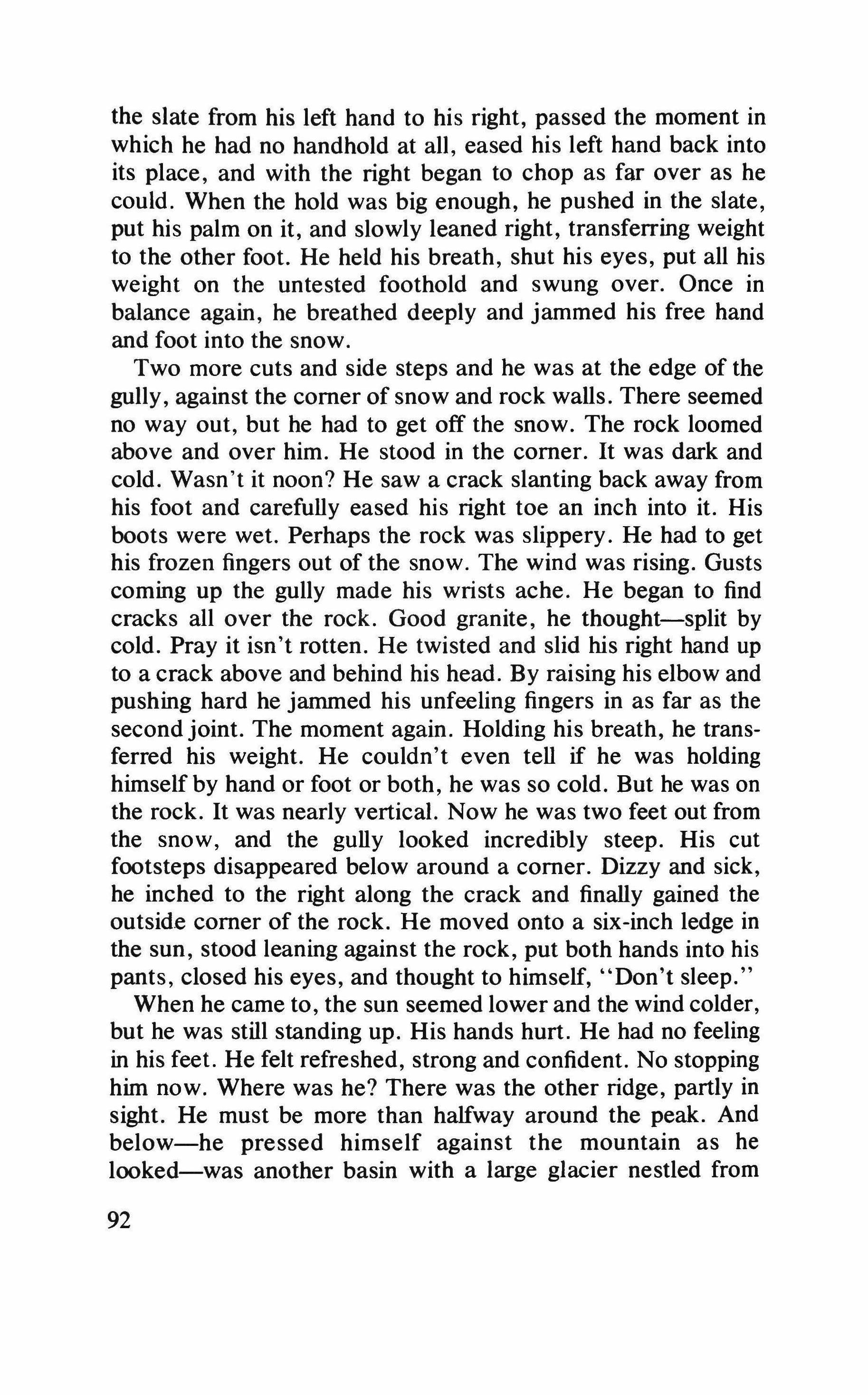
the slate from his left hand to his right, passed the moment in which he had no handhold at all, eased his left hand back into its place, and with the right began to chop as far over as he could. When the hold was big enough, he pushed in the slate, put his palm on it, and slowly leaned right, transferring weight to the other foot. He held his breath, shut his eyes, put all his weight on the untested foothold and swung over. Once in balance again, he breathed deeply and jammed his free hand and foot into the snow.
Two more cuts and side steps and he was at the edge of the gully, against the comer of snow and rock walls. There seemed no way out, but he had to get off the snow. The rock loomed above and over him. He stood in the comer. It was dark and cold. Wasn't it noon? He saw a crack slanting back away from his foot and carefully eased his right toe an inch into it. His boots were wet. Perhaps the rock was slippery. He had to get his frozen fingers out of the snow. The wind was rising. Gusts coming up the gully made his wrists ache. He began to find cracks all over the rock. Good granite, he thought-split by cold. Pray it isn't rotten. He twisted and slid his right hand up to a crack above and behind his head. By raising his elbow and pushing hard he jammed his unfeeling fingers in as far as the second joint. The moment again. Holding his breath, he transferred his weight. He couldn't even tell if he was holding himself by hand or foot or both, he was so cold. But he was on the rock. It was nearly vertical. Now he was two feet out from the snow, and the gully looked incredibly steep. His cut footsteps disappeared below around a comer. Dizzy and sick, he inched to the right along the crack and finally gained the outside comer of the rock. He moved onto a six-inch ledge in the sun, stood leaning against the rock, put both hands into his pants, closed his eyes, and thought to himself, "Don't sleep."
When he came to, the sun seemed lower and the wind colder, but he was still standing up. His hands hurt. He had no feeling in his feet. He felt refreshed, strong and confident. No stopping him now. Where was he? There was the other ridge, partly in sight. He must be more than halfway around the peak. And below-he pressed himself against the mountain as he looked-was another basin with a large glacier nestled from
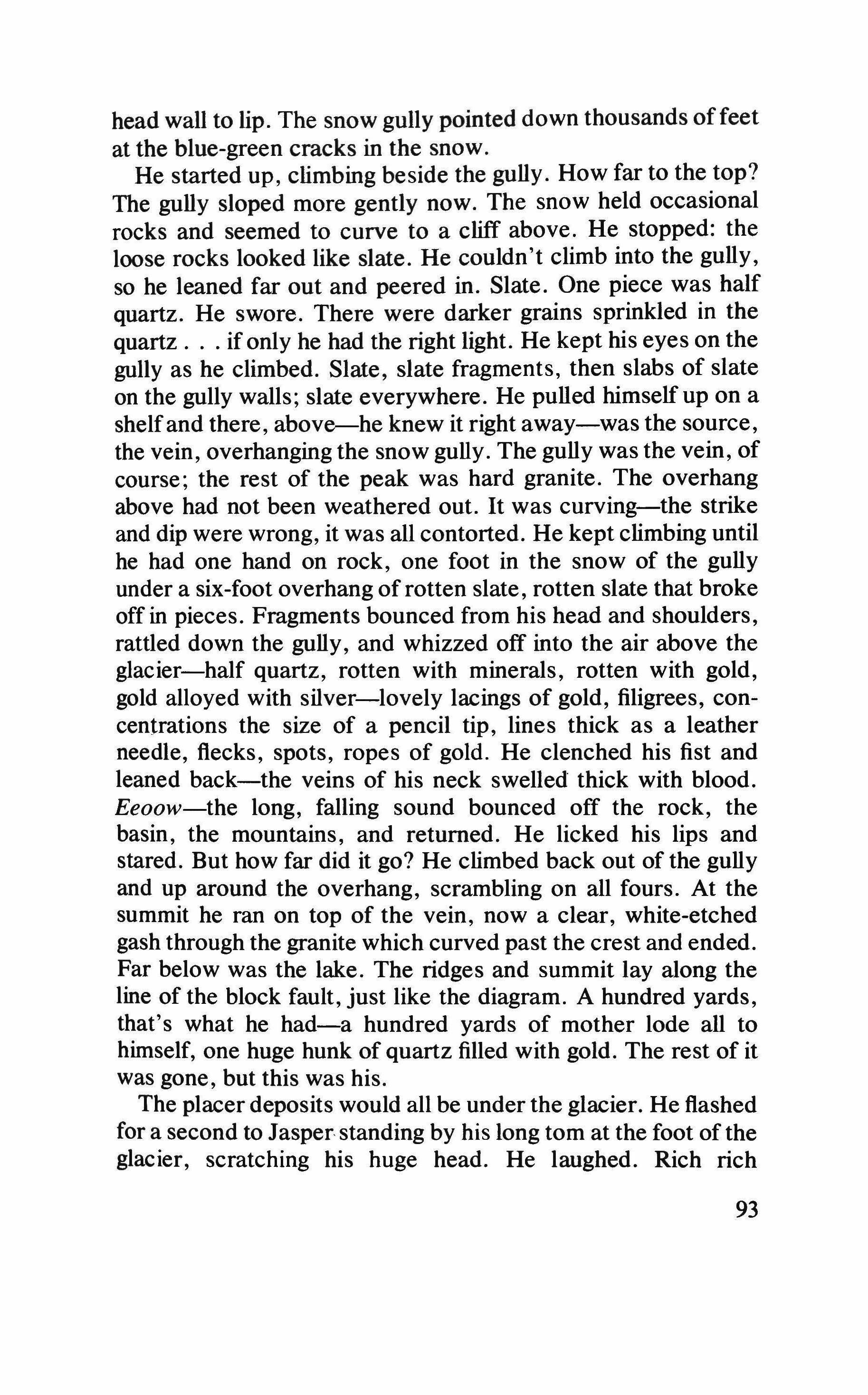
head wall to lip. The snow gully pointed down thousands offeet at the blue-green cracks in the snow. He started up, climbing beside the gully. How far to the top? The gully sloped more gently now. The snow held occasional rocks and seemed to curve to a cliff above. He stopped: the loose rocks looked like slate. He couldn't climb into the gully, so he leaned far out and peered in. Slate. One piece was half quartz. He swore. There were darker grains sprinkled in the quartz. if only he had the right light. He kept his eyes on the gully as he climbed. Slate, slate fragments, then slabs of slate on the gully walls; slate everywhere. He pulled himself up on a shelfand there, above-he knew it right away-was the source, the vein, overhanging the snow gully. The gully was the vein, of course; the rest of the peak was hard granite. The overhang above had not been weathered out. It was curving-the strike and dip were wrong, it was all contorted. He kept climbing until he had one hand on rock, one foot in the snow of the gully under a six-foot overhang of rotten slate, rotten slate that broke off in pieces. Fragments bounced from his head and shoulders, rattled down the gully, and whizzed off into the air above the glacier-half quartz, rotten with minerals, rotten with gold, gold alloyed with silver-lovely lacings of gold, filigrees, concentrations the size of a pencil tip, lines thick as a leather needle, flecks, spots, ropes of gold. He clenched his fist and leaned back-the veins of his neck swelled thick with blood. Eeoow-the long, falling sound bounced off the rock, the basin, the mountains, and returned. He licked his lips and stared. But how far did it go? He climbed back out of the gully and up around the overhang, scrambling on all fours. At the summit he ran on top of the vein, now a clear, white-etched gash through the granite which curved past the crest and ended. Far below was the lake. The ridges and summit lay along the line of the block fault, just like the diagram. A hundred yards, that's what he had-a hundred yards of mother lode all to himself, one huge hunk of quartz filled with gold. The rest of it was gone, but this was his.
The placerdeposits would all be under the glacier. He flashed for a second to Jasper,standing by his long tom at the foot ofthe glacier, scratching his huge head. He laughed. Rich rich

rich-in the center, at the top, the basins he had named, the rivers he had traced, the veins he had followed for three years knelt beneath him, offering their gifts, vassals of his mind and will. Subdue, and have dominion He stretched again and yelled. His voice bounced back from every direction. He cocked his head as if. he yelled again and listened to the hollow return. Not a reply, really; more like the stone could not absorb the sound and so gave it back. He looked about. Good Lord, it was late. A gust of wind. Gone. He turned all around, studying the still, silent peaks. North, east, south, west. The sun was going down. Well he'd found it, he'd found the son of a bitch. What he had needed to do he had done. It was cold. Not quite all he needed; not yet. Shorty mined the lode. Burrowed in and blew it out. Even the few who have seen the small, splintered timbers a hundred yards from the summit find it hard to believe.
He found an easier approach from the Slate Peak ridge and brought up his tools. He picked and shoveled for two days, hacking away at the rotted top of the vein, then blasted in. He shored the tunnel with tiny alpine fir he cut at tree line and carried, shoved, rope-hauled up the granite to the mouth of the tiny mine. Pound, quarter tum, pound, quarter tum. Split the fuse. "Fire in the hole!" he would shout to no one and scramble for cover. Drill, blast, clean. Drill, blast, clean.
He crammed the richest rubble into saddlebags, dragged it up to the summit, sorted it, stuffed the bag with high grade, and flung it off the peak. It came to rest in the talus near the lake. The bag always came apart. Every other day, when he climbed down to the lake for supplies, he stomped across the talus looking for the sack and the gold. At camp, he piled ore high as the tent. Then back up for more.
When he had driven a tiny adit in about six feet, he forgot to notch the cap beam holding the fourth set of posts apart; a week later, as he crawled out of the tunnel toward a driving rain, he had a vivid image of the unnotched cap; he crawled back. The roof was dripping. The posts seemed to be inching inward. He got in behind them to use the feeble sky light, and began to drill a peg hole in the beam overhead. Water fell on his hand. The fir shoring sagged. He stopped. Had the post just slipped another half inch?
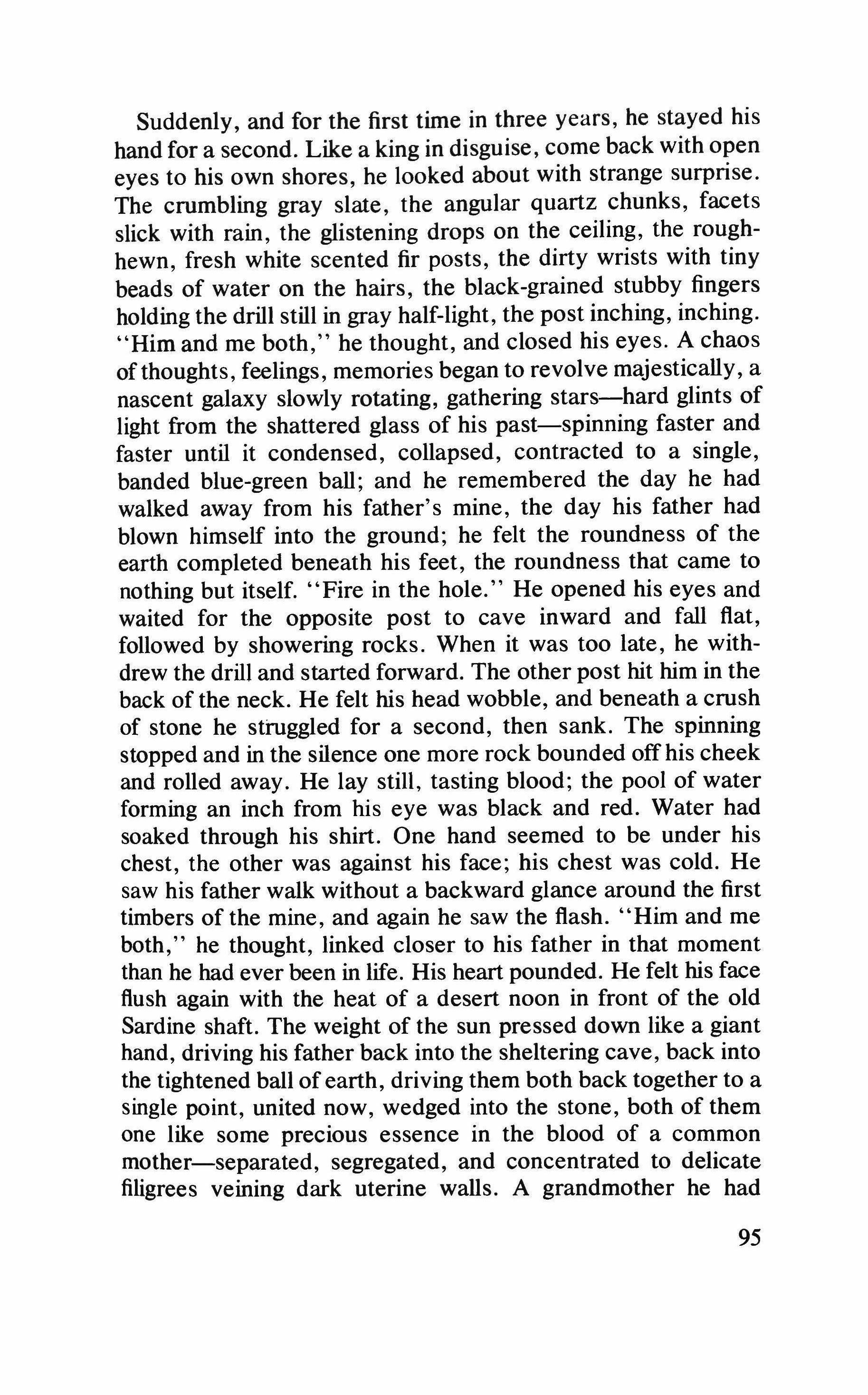
Suddenly, and for the first time in three years, he stayed his hand for a second. Like a king in disguise, come back with open eyes to his own shores, he looked about with strange surprise. The crumbling gray slate, the angular quartz chunks, facets slick with rain, the glistening drops on the ceiling, the roughhewn, fresh white scented fir posts, the dirty wrists with tiny beads of water on the hairs, the black-grained stubby fingers holding the drill still in gray half-light, the post inching, inching. "Him and me both," he thought, and closed his eyes. A chaos ofthoughts, feelings, memories began to revolve majestically, a nascent galaxy slowly rotating, gathering stars-hard glints of light from the shattered glass of his past-spinning faster and faster until it condensed, collapsed, contracted to a single, banded blue-green ball; and he remembered the day he had walked away from his father's mine, the day his father had blown himself into the ground; he felt the roundness of the earth completed beneath his feet, the roundness that came to nothing but itself. "Fire in the hole." He opened his eyes and waited for the opposite post to cave inward and fall flat, followed by showering rocks. When it was too late, he withdrew the drill and started forward. The other post hit him in the back of the neck. He felt his head wobble, and beneath a crush of stone he struggled for a second, then sank. The spinning stopped and in the silence one more rock bounded off his cheek and rolled away. He lay still, tasting blood; the pool of water forming an inch from his eye was black and red. Water had soaked through his shirt. One hand seemed to be under his chest, the other was against his face; his chest was cold. He saw his father walk without a backward glance around the first timbers of the mine, and again he saw the flash. "Him and me both," he thought, linked closer to his father in that moment than he had ever been in life. His heart pounded. He felt his face flush again with the heat of a desert noon in front of the old Sardine shaft. The weight of the sun pressed down like a giant hand, driving his father back into the sheltering cave, back into the tightened ball of earth, driving them both back together to a single point, united now, wedged into the stone, both of them one like some precious essence in the blood of a common mother-separated, segregated, and concentrated to delicate filigrees veining dark uterine walls. A grandmother he had

never known, connections as strange as double veins, sources as rich or barren and hopelessly distant-"stone." He had finally done what he had set out to do; and now he knew what that was, and he could be still. Now he would either be as dead as his father or, if he ever lived again, by blind luck delivered from the tomb of his own making-round, round, everything was round-he would for the first time be no better and no worse.
Consciousness: wiggled fingers, opened eyes. The cave-in had barely reached from head to toe-crushed ribs; crawling, falling, a broken leg; snow; horse; past hunger day after night after day. He slid off Bonanza near the boarding house in Eureka. They carried him in. Meek and dazed, he lay in bed through the long winter, mumbling, nursed by a woman who had lost her only son in the Civil War.
In the spring when he got up he knew something had gone, as if a yell had been absorbed by stone. Gone. Quietly he sold the directions to both sites-he'd never even staked a claim-for seven hundred dollars, on the basis of a placer sample tied to his saddle and a rock fragment found in his trouser pocket. He gave most of the money to the woman-his horse, Bonanza, too. He bought a jackass and started south, slowly, deliberately, on weak legs and tender feet, picking up work now and then and moving softly on. In a sawmill at the head of the Salmon he dreamed for a few weeks by the clanking green chain, bathed in the odors of spruce and Douglas fir and the inviolable innocence of the red cedar, which smelled, when fresh cut, like the virgin tree still standing-and yet impossibly too like the suddenly opened door of an old clothes closet in Providence, a closet which he had always opened thinking only of mother and her secret places but which, when entering, he had always found full of the freshness of youth, the scent of something still growing or still to grow, though old; driven back into the dark corner, curled into a ball, wrapped in curtains of long wool coats he would press his wet cheek to the cedar boards and smell green fields with lambs, ripe fruit that never falls, sweet high-breasted Mary bending young above her child, crying, crying, crying against the cedar slats of his crib. One

day he looked up from the sliced trees, thinking that the scent of cedar was the scent of Paradise, and he quit, wandering south out of Idaho into upper Nevada, back toward home. A boom camp high in the Ruby Mountains was his last stop. He shoveled dung from the streets and slept in the livery stable. Then one evening in August, after work, without drawing pay, he walked out slowly, tugging and talking to a lame mule, headed for Death Valley. Behind him the bars roared, the picks rang, the cabins mushroomed beneath yellowing trees-aspen, then willow, then cottonwood and, late in October, golden larch-until the first wind of winter came like the last trumpet, calling dry leaves from branches that no longer held and laying them on the ground.
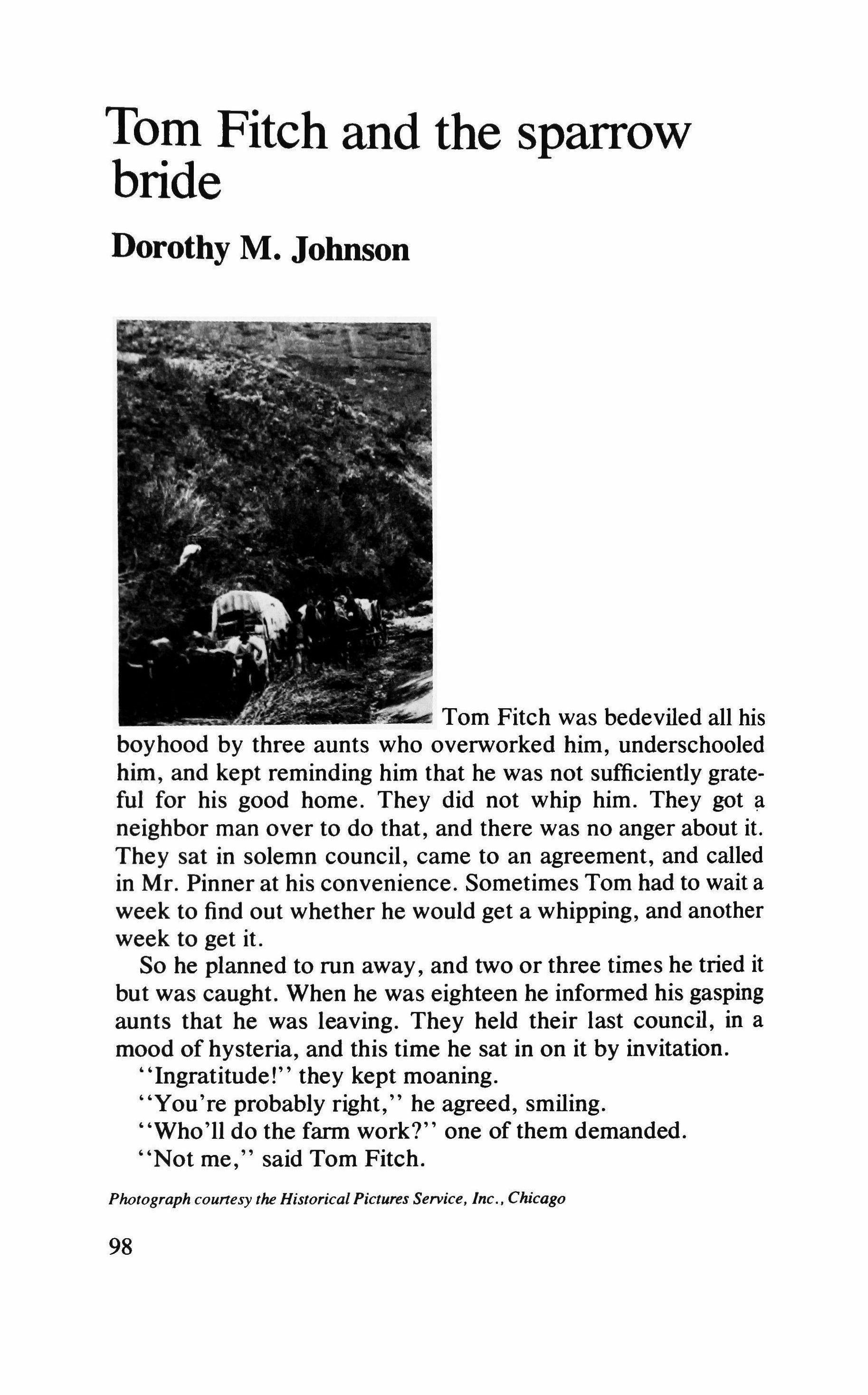
� Tom Fitch was bedeviled all his boyhood by three aunts who overworked him, underschooled him, and kept reminding him that he was not sufficiently grateful for his good home. They did not whip him. They got a neighbor man over to do that, and there was no anger about it. They sat in solemn council, came to an agreement, and called in Mr. Pinner at his convenience. Sometimes Tom had to wait a week to find out whether he would get a whipping, and another week to get it.
So he planned to run away, and two or three times he tried it but was caught. When he was eighteen he informed his gasping aunts that he was leaving. They held their last council, in a mood of hysteria, and this time he sat in on it by invitation.
"Ingratitude!" they kept moaning.
"You're probably right," he agreed, smiling.
"Who'll do the farm work?" one of them demanded.
"Not me," said Tom Fitch. Photograph courtesy the Historical Pictures Service, Inc., Chicago
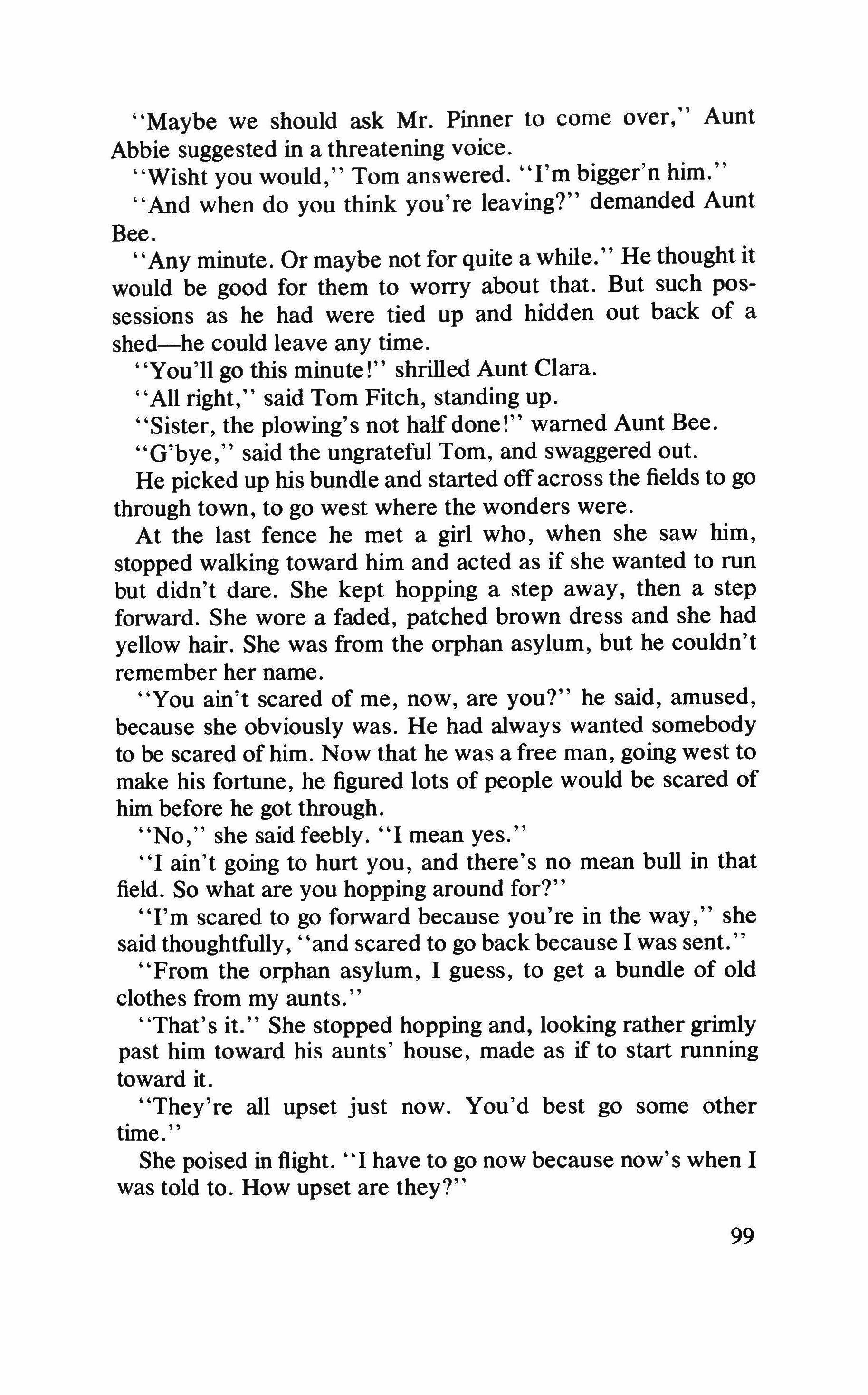
"Maybe we should ask Mr. Pinner to come over," Aunt Abbie suggested in a threatening voice.
"Wisht you would," Tom answered. ''I'm bigger'n him."
"And when do you think you're leaving?" demanded Aunt Bee.
"Any minute. Or maybe not for quite a while." He thought it would be good for them to worry about that. But such possessions as he had were tied up and hidden out back of a shed-he could leave any time.
"You'll go this minute!" shrilled Aunt Clara.
"All right," said Tom Fitch, standing up.
"Sister, the plowing's not half done!" warned Aunt Bee.
"G'bye," said the ungrateful Tom, and swaggered out.
He picked up his bundle and started off across the fields to go through town, to go west where the wonders were.
At the last fence he met a girl who, when she saw him, stopped walking toward him and acted as if she wanted to run but didn't dare. She kept hopping a step away, then a step forward. She wore a faded, patched brown dress and she had yellow hair. She was from the orphan asylum, but he couldn't remember her name.
"You ain't scared of me, now, are you?" he said, amused, because she obviously was. He had always wanted somebody to be scared of him. Now that he was a free man, going west to make his fortune, he figured lots of people would be scared of him before he got through.
"No," she said feebly. "I mean yes."
"I ain't going to hurt you, and there's no mean bull in that field. So what are you hopping around for?"
"I'm scared to go forward because you're in the way," she said thoughtfully, "and scared to go back because I was sent."
"From the orphan asylum, I guess, to get a bundle of old clothes from my aunts."
That's it. She stopped hopping and, looking rather grimly past him toward his aunts' house, made as if to start running toward it.
"They're all upset just now. You'd best go some other time."
She poised in flight. "I have to go now because now's when I was told to. How upset are they?"

"Like three women would be when their unpaid hired man just told 'em he was going west to make his fortune. They're mad and crying."
"Oh, dear. But I have to go because I was sent." She stopped thinking about herself and turned the full stare of her blue eyes on him. "West? You're going west? Oh, how I wisht 1 could!"
"You sure could except lain't made my fortune yet. How old are you?"
"Sixteen. They'll find me some place to work steady when I'm eighteen. That's how long us orphans stay there."
"I sure wisht I had some of that fortune now," Tom told her sympathetically, "but you can see how it is. And I'll bet you wouldn't go anyway."
"Maybe I would," she said, and blushed. "Well, good-bye."
"Good-bye to you. Good luck.
"Yes, good luck to you. Well, I was sent."
She ran past him, and he felt sorry for her. He suddenly remembered her name-Agatha.
He did his best. He kept going west, working at this or that. But it took him five whole years to make his fortune. (Of course some men never did at all.) Tom Fitch didn't regret the wasted years of being poor. The fortune eluded him and then came with a rush.
In the early spring of '63 he was in Salt Lake City, and he had a stake saved up. He got a job driving a bull team, freighting supplies northward along the mountains and then over the continental divide to a gold camp called the Grasshopper Diggings, at Bannack in Idaho Territory. There were five other teams in the train, and it was very rough going. They fought off Indians once, and almost lost one wagon another time but got it righted again.
"I'll take my pay now," he said to the wagon master, after he had delivered his wagon to the store that had ordered the supplies. "Going to find me some gold and get rich," Tom Fitch said.
"So'rn I," the wagon master said, "just as soon as I collect for the freight and payoff the men. How'd you like to buy some of the oxen? I'm selling cheap."
100
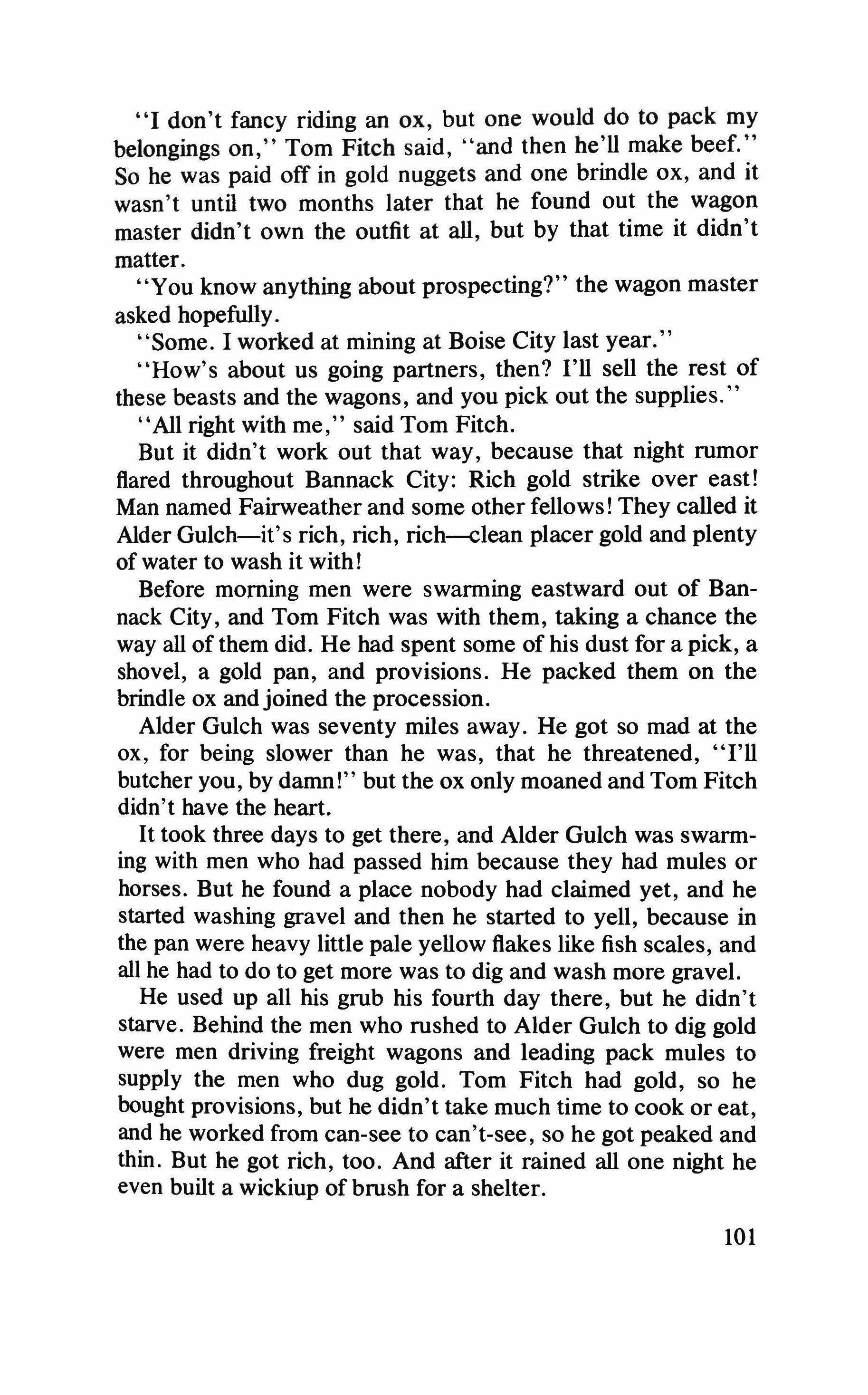
"I don't fancy riding an ox, but one would do to pack my belongings on," Tom Fitch said, "and then he'll make beef." So he was paid off in gold nuggets and one brindle ox, and it wasn't until two months later that he found out the wagon master didn't own the outfit at all, but by that time it didn't matter.
"You know anything about prospecting?" the wagon master asked hopefully.
"Some. 1 worked at mining at Boise City last year."
"How's about us going partners, then? I'll sell the rest of these beasts and the wagons, and you pick out the supplies."
"All right with me," said Tom Fitch.
But it didn't work out that way, because that night rumor flared throughout Bannack City: Rich gold strike over east! Man named Fairweather and some other fellows! They called it Alder Gulch-it's rich, rich, rich-clean placer gold and plenty of water to wash it with!
Before morning men were swarming eastward out of Bannack City, and Tom Fitch was with them, taking a chance the way all of them did. He had spent some of his dust for a pick, a shovel, a gold pan, and provisions. He packed them on the brindle ox and joined the procession.
Alder Gulch was seventy miles away. He got so mad at the ox, for being slower than he was, that he threatened, "I'll butcher you, by damn!" but the ox only moaned and Tom Fitch didn't have the heart.
H took three days to get there, and Alder Gulch was swarming with men who had passed him because they had mules or horses. But he found a place nobody had claimed yet, and he started washing gravel and then he started to yell, because in the pan were heavy little pale yellow flakes like fish scales, and all he had to do to get more was to dig and wash more gravel. He used up all his grub his fourth day there, but he didn't starve. Behind the men who rushed to Alder Gulch to dig gold were men driving freight wagons and leading pack mules to supply the men who dug gold. Tom Fitch had gold, so he bought provisions, but he didn't take much time to cook or eat, and he worked from can-see to can't-see, so he got peaked and thin. But he got rich, too. And after it rained all one night he even built a wickiup of brush for a shelter.

So he was a settler, as permanent as any of them at Alder Gulch, and while his back was turned because he was bent over a shovel, camps grew up-Virginia City and Nevada City and some others.
Stores sprang up in those little, booming camps, and saloons and dance halls and fights and shootings and all kinds of interesting things.
One day Tom Fitch straightened his aching back and took a sniffand realized he was filthy and stinking and in rags. Also he was hungry and hadn't had enough sleep all summer. He had a bushy black beard, and his boots were falling off his feet, which were too big for them anyway. His brindle ox, fat and sleek at the livery yard, looked better than he did.
"Now what's the use of being rich if a man don't dress the part?" he asked himself. So he threw down his pick and shouted at a bummer who was looking at him sadly from across the creek.
"You want ajob?" he yelled.
The bummer nodded. "Then get to work on this. I'm going to town," said Tom Fitch.
He hardly recognized himself when the barber got through. When he got into a suit of new clothes at Dance and Stuart's, he didn't know himself at all, but the change was all in the line of improvement.
"Leaving the gulch?" Mr. Stuart asked in a neighborly fashion.
"Maybe," said Tom Fitch. "On the other hand, where's there to go?"
"Most of them go back to the States," said Mr. Stuart.
"I ain't going to," said Tom Fitch. "Guess I'll see about a house to live in.
So he walked up Wallace Street and saw two men building a cabin. They had the side logs in place about halfway up. One of them yelled something, climbed down, and walked off, looking mad. The other one stayed up where he was, looking madder.
Tom Fitch said, "Are you the bamboo chief on this here job?" and the man answered, scowling, ''I'd as soon throw this ax at you as look at you."
"I'd as soon shoot you with this pistol as talk to you," Tom Fitch answered. "In fact, I'd some rather. Now answer my question.
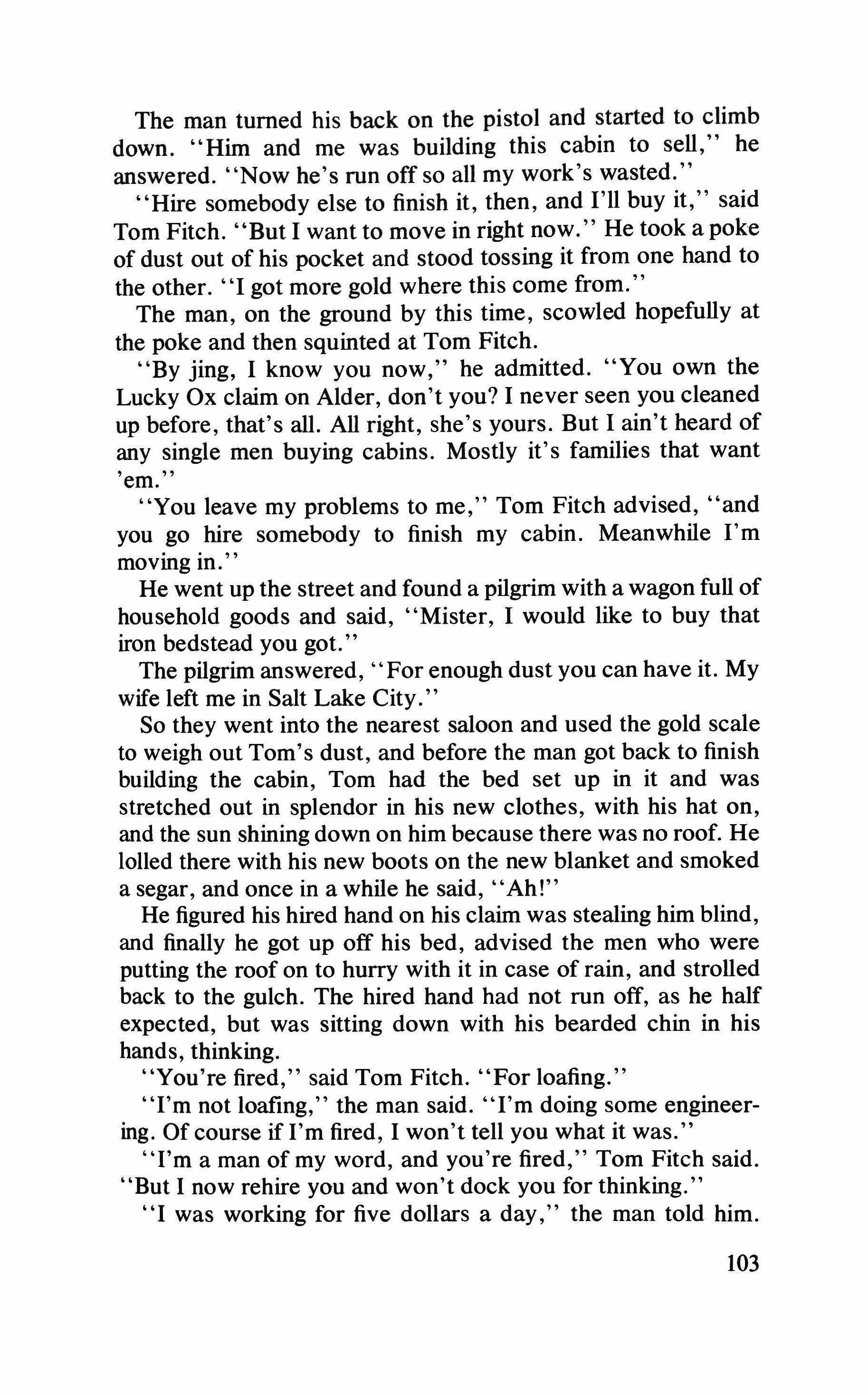
The man turned his back on the pistol and started to climb down. "Him and me was building this cabin to sell," he answered. "Now he's run off so all my work's wasted."
"Hire somebody else to finish it, then, and I'll buy it," said Tom Fitch. "But I want to move in right now." He took a poke of dust out of his pocket and stood tossing it from one hand to the other. "I got more gold where this come from."
The man, on the ground by this time, scowled hopefully at the poke and then squinted at Tom Fitch.
"By jing, I know you now," he admitted. "You own the Lucky Ox claim on Alder, don't you? I never seen you cleaned up before, that's all. All right, she's yours. But I ain't heard of any single men buying cabins. Mostly it's families that want 'em."
"You leave my problems to me," Tom Fitch advised, "and you go hire somebody to finish my cabin. Meanwhile I'm moving in."
He went up the street and found a pilgrim with a wagon full of household goods and said, "Mister, I would like to buy that iron bedstead you got.
The pilgrim answered, "For enough dust you can have it. My wife left me in Salt Lake City.
So they went into the nearest saloon and used the gold scale to weigh out Tom's dust, and before the man got back to finish building the cabin, Tom had the bed set up in it and was stretched out in splendor in his new clothes, with his hat on, and the sun shining down on him because there was no roof. He lolled there with his new boots on the new blanket and smoked a segar, and once in a while he said, "Ah!"
He figured his hired hand on his claim was stealing him blind, and finally he got up off his bed, advised the men who were putting the roof on to hurry with it in case of rain, and strolled back to the gulch. The hired hand had not run off, as he half expected, but was sitting down with his bearded chin in his hands, thinking.
"You're fired," said Tom Fitch. "For loafing."
"I'm not loafing," the man said. "J'rn doing some engineering. Of course if I'm fired, I won't tell you what it was."
"I'rn a man of my word, and you're fired," Tom Fitch said. "But I now rehire you and won't dock you for thinking."
'I was working for five dollars a day," the man told him.
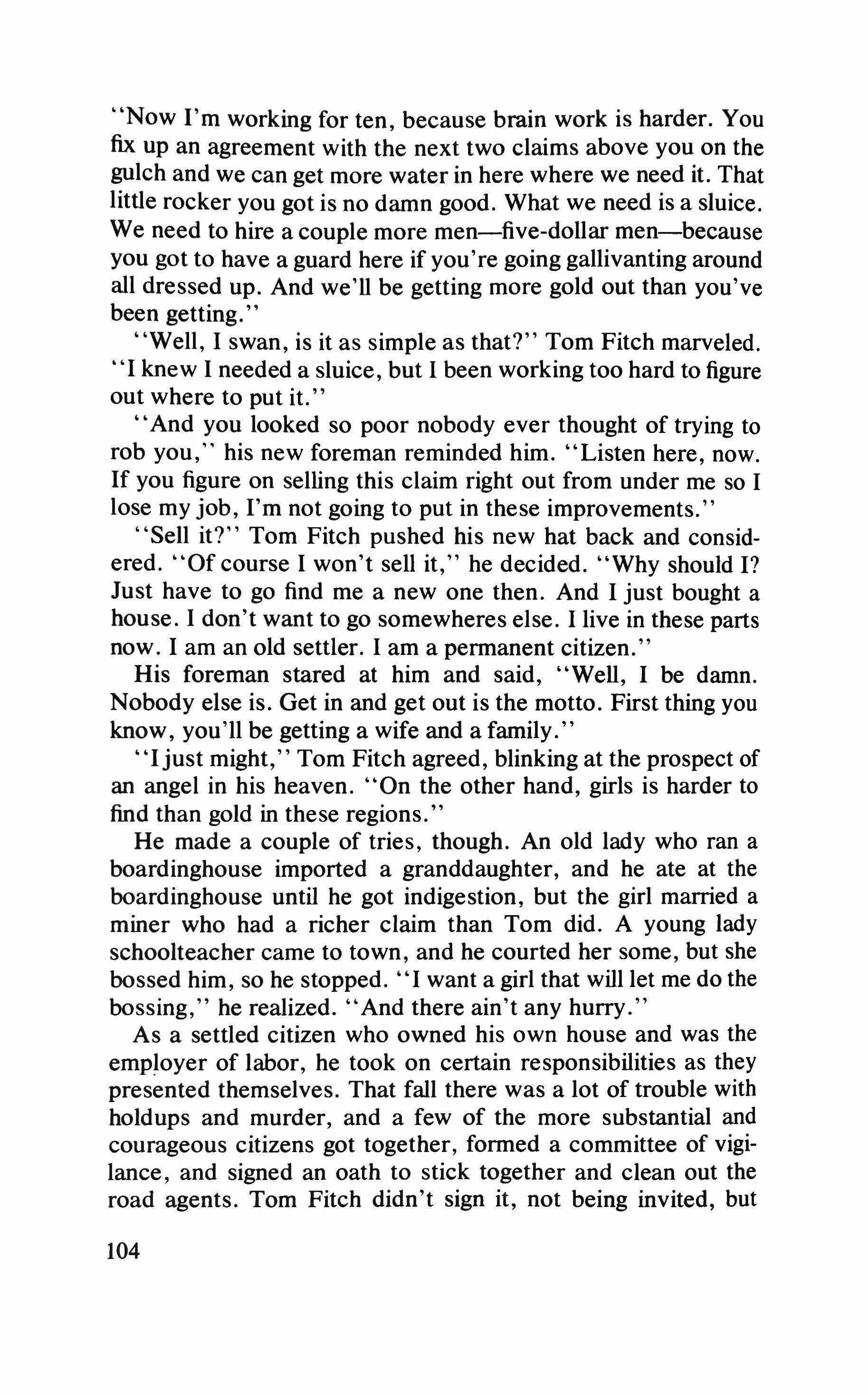
"Now I'm working for ten, because brain work is harder. You fix up an agreement with the next two claims above you on the gulch and we can get more water in here where we need it. That little rocker you got is no damn good. What we need is a sluice. We need to hire a couple more men-five-dollar men-because you got to have a guard here if you're going gallivanting around all dressed up. And we'll be getting more gold out than you've been getting."
"Well, I swan, is it as simple as that?" Tom Fitch marveled 'I knew I needed a sluice, but I been working too hard to figure out where to put it.
'And you looked so poor nobody ever thought of trying to rob you," his new foreman reminded him. "Listen here, now. If you figure on selling this claim right out from under me so I lose my job, I'm not going to put in these improvements."
"Sell it?" Tom Fitch pushed his new hat back and considered. "Of course I won't sell it," he decided. "Why should I? Just have to go find me a new one then. And I just bought a house. I don't want to go somewheres else. I live in these parts now. I am an old settler. I am a permanent citizen."
His foreman stared at him and said, "Well, I be damn. Nobody else is. Get in and get out is the motto. First thing you know, you'll be getting a wife and a family."
"Ijust might," Tom Fitch agreed, blinking at the prospect of an angel in his heaven. "On the other hand, girls is harder to find than gold in these regions."
He made a couple of tries, though. An old lady who ran a boardinghouse imported a granddaughter, and he ate at the boardinghouse until he got indigestion, but the girl married a miner who had a richer claim than Tom did. A young lady schoolteacher came to town, and he courted her some, but she bossed him, so he stopped. "I want a girl that will let me do the bossing," he realized. "And there ain't any hurry."
As a settled citizen who owned his own house and was the employer of labor, he took on certain responsibilities as they presented themselves. That fall there was a lot of trouble with holdups and murder, and a few of the more substantial and courageous citizens got together, formed a committee of vigilance, and signed an oath to stick together and clean out the road agents. Tom Fitch didn't sign it, not being invited, but

when the time came to do some hanging, he helped.
He stood with a rifle in his hands and his back to the scaffold, ready to fire if the yelling mob of miners and roughs tried to prevent the carrying out ofjustice. He didn't, after all, have to shoot anybody, and he got sick to his stomach when he turned around and saw the five limp-necked bodies dangling. But he had put himself on the side of the vigilantes, so from then on he was one of them, and his life was in danger. His back got to feeling ticklish because he never knew who might be aiming at it.
He rode over to Bannack and helped hang the sheriffand two other bad guys and froze his feet on the ride back, so they always bothered him some when it was cold.
And when he looked around at his town on Alder Gulch, he felt about it as he had never felt about any other place. Back on his aunts' farm he had always just been waiting till he was big enough to leave. In all the other places he had been, he was thinking of other places to go. But now he knew for sure that this was his town, where he was going to stay. Not because he had a gold mine on the edge of it, and investments in various business ventures, not because he had a house in it, but because he was helping to clean out the thieves and robbers and make it a place a man wouldn't have to be ashamed of.
A year, almost to the day, from the time he had come in swearing at his slow ox, he saw some pilgrim wagons pull in and children scamper down out of them, yelling, while their fathers swore at the stock and their mothers screamed at the children.
"Now maybe," he thought, "some of them people have brought grown, unmarried daughters?" He leaned against his cabin door, squinting at the commotion. In it he noticed something interesting-a girl with a sunbonnet on, making odd little hops. She was trying to urge a span of mules to move a few feet farther on, though she was afraid of them. But somebody in the wagon was roaring at her to make them move, so she had to do it. She kept hopping back with fright and hopping forward from duty, and she was getting a lot of exercise but was not accomplishing anything else.
"Well, I be damn," said Tom Fitch out loud. "If that ain't what's-her-name, the orphan!"
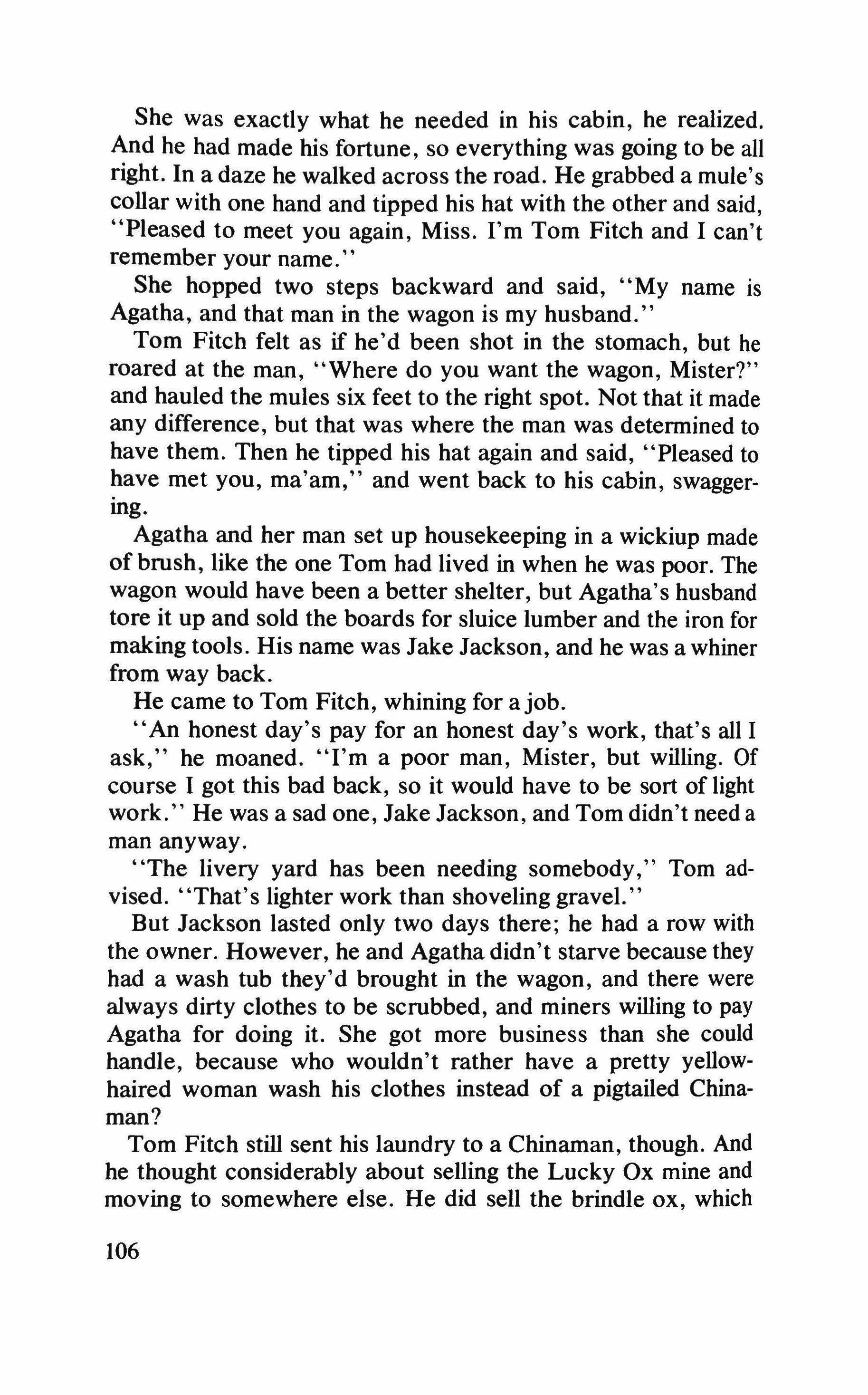
She was exactly what he needed in his cabin, he realized. And he had made his fortune, so everything was going to be all right. In a daze he walked across the road. He grabbed a mule's collar with one hand and tipped his hat with the other and said, "Pleased to meet you again, Miss. I'm Tom Fitch and I can't remember your name.
She hopped two steps backward and said, "My name is Agatha, and that man in the wagon is my husband.
Tom Fitch felt as if he'd been shot in the stomach, but he roared at the man, "Where do you want the wagon, Mister?" and hauled the mules six feet to the right spot. Not that it made any difference, but that was where the man was determined to have them. Then he tipped his hat again and said, "Pleased to have met you, ma'am," and went back to his cabin, swaggering.
Agatha and her man set up housekeeping in a wickiup made of brush, like the one Tom had lived in when he was poor. The wagon would have been a better shelter, but Agatha's husband tore it up and sold the boards for sluice lumber and the iron for making tools. His name was Jake Jackson, and he was a whiner from way back.
He came to Tom Fitch, whining for ajob.
"An honest day's pay for an honest day's work, that's all I ask," he moaned. "I'm a poor man, Mister, but Willing. Of course I got this bad back, so it would have to be sort of light work." He was a sad one, Jake Jackson, and Tom didn't need a man anyway.
"The livery yard has been needing somebody," Tom advised. "That's lighter work than shoveling gravel."
But Jackson lasted only two days there; he had a row with the owner. However, he and Agatha didn't starve because they had a wash tub they'd brought in the wagon, and there were always dirty clothes to be scrubbed, and miners willing to pay Agatha for doing it. She got more business than she could handle, because who wouldn't rather have a pretty yellowhaired woman wash his clothes instead of a pigtailed Chinaman?
Tom Fitch still sent his laundry to a Chinaman, though. And he thought considerably about selling the Lucky Ox mine and moving to somewhere else. He did sell the brindle ox, which

was eating its head off at the livery yard. He told it good-bye without any sentiment. "You done your part," he assured the beast, "but I reckon a man makes his own luck in the long " run.
He was still thinking of moving away when the news came that Alder Gulch and Grasshopper Diggings and a whale of a lot of other country was now a territory in its own right, name of Montana. "It wasn't no trouble at all," said Tom Fitch with a grin, "to change from living in Idaho to living in Montana." He decided to stay.
Winter came early and hard in '64. That was something to worry about. Tom Fitch had money invested in a freight outfit, and his five wagons hadn't yet arrived from Salt Lake City, 475 miles away. A couple dozen others hadn't come either, and all of them would be loaded with provisions that were expected to keep the gold camps fed through the winter.
The storekeepers were worried, too. After a couple of weeks, two of them rode out with Tom Fitch to find the freight wagons. Each of them led a packhorse. They almost froze to death, and one horse broke a leg and had to be shot.
"If we can't get through these drifts with horses," Tom Fitch said, "oxen sure can't get through pulling freight. But let's see if we can find out how the drivers are doing.
They met three of the drivers next day, floundering through the snow, and revived them with whiskey.
"The rest of the boys figure on staying there all winter," one of Tom's drivers said. "Some of the oxen died already, and they butchered them. With the rest, they'll have meat enough, and they got the provisions in the wagons. But the road-the road is drifted forty feet deep in places. We came along the ridges. We seen trees that I know for a fact are fifty, sixty feet tall, and only the tops are sticking out."
That was a hard winter for everybody. It was too cold for placer mining or for Jake Jackson's wife to take in washing. The Chinamen still did, because they had cabins with stoves in them. But the Jacksons had a wickiup made of brush and covered over with the wagon sheet and several feet of snow.
"It's none of my business," Tom Fitch assured himself. "The man of the family ought to be boss, and if his wife puts up with living like they do, that must mean she's satisfied."
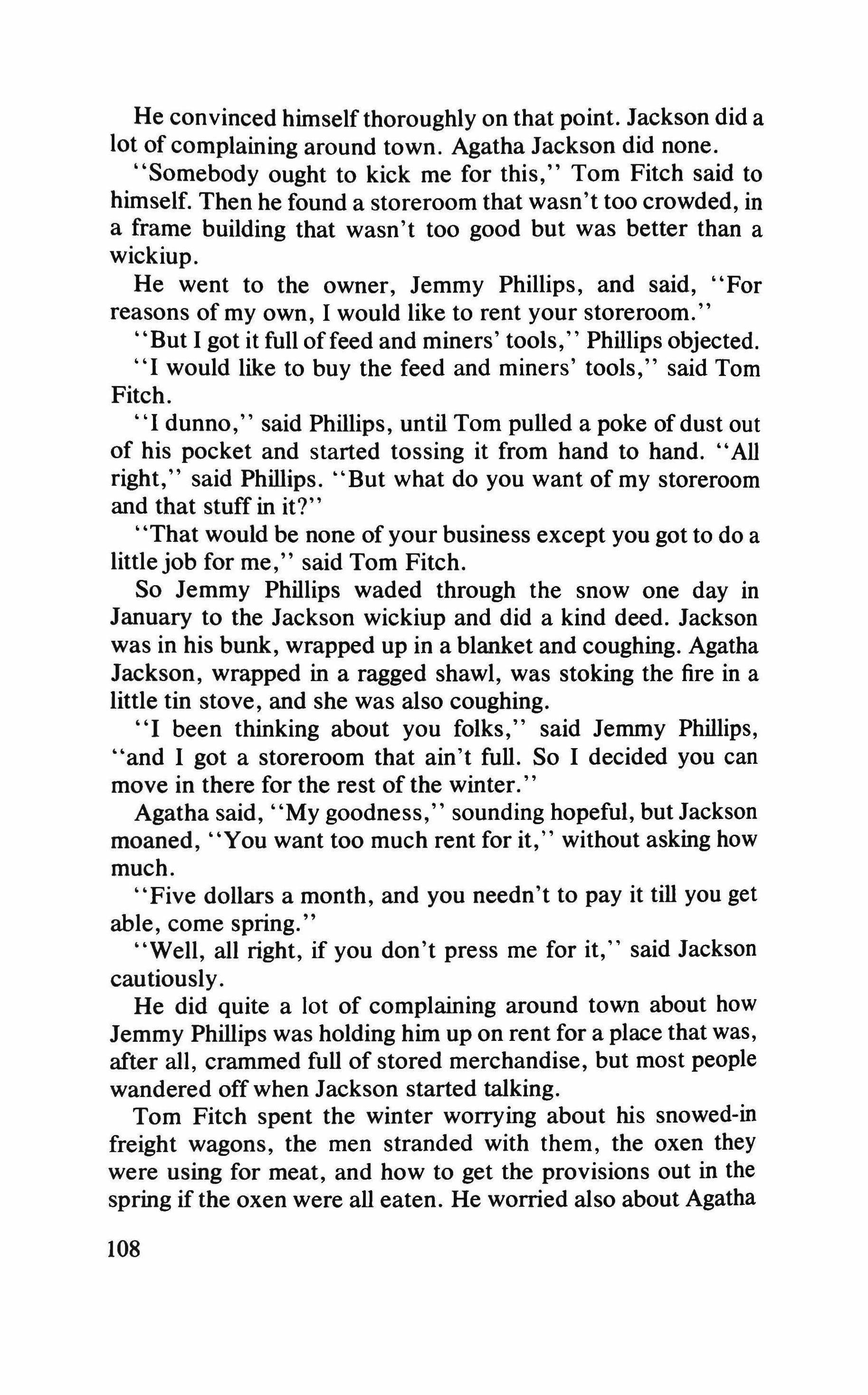
He convinced himselfthoroughly on that point. Jackson did a lot of complaining around town. Agatha Jackson did none.
"Somebody ought to kick me for this," Tom Fitch said to himself. Then he found a storeroom that wasn't too crowded, in a frame building that wasn't too good but was better than a wickiup.
He went to the owner, Jemmy Phillips, and said, "For reasons of my own, I would like to rent your storeroom."
"But I got it full offeed and miners' tools," Phillips objected.
"I would like to buy the feed and miners' tools," said Tom Fitch.
"I dunno," said Phillips, until Tom pulled a poke of dust out of his pocket and started tossing it from hand to hand. "All right," said Phillips. "But what do you want of my storeroom and that stuff in it?"
"That would be none of your business except you got to do a little job for me," said Tom Fitch.
So Jemmy Phillips waded through the snow one day in January to the Jackson wickiup and did a kind deed. Jackson was in his bunk, wrapped up in a blanket and coughing. Agatha Jackson, wrapped in a ragged shawl, was stoking the fire in a little tin stove, and she was also coughing.
"I been thinking about you folks," said Jemmy Phillips, "and I got a storeroom that ain't full. So I decided you can move in there for the rest of the winter."
Agatha said, "My goodness," sounding hopeful, but Jackson moaned, "You want too much rent for it," without asking how much.
"Five dollars a month, and you needn't to pay it till you get able, come spring."
"Well, all right, if you don't press me for it," said Jackson cautiously.
He did quite a lot of complaining around town about how Jemmy Phillips was holding him up on rent for a place that was, after all, crammed full of stored merchandise, but most people wandered off when Jackson started talking.
Tom Fitch spent the winter worrying about his snowed-in freight wagons, the men stranded with them, the oxen they were using for meat, and how to get the provisions out in the spring if the oxen were all eaten. He worried also about Agatha

Jackson, but he spent more time being annoyed at her than worrying.
There was no fun in seeing himself as the rescuer of a married lady, and anyway he was too proud to make any advances.
"Let her come ask me to be rescued," he thought. "Just let her get up that much gumption, that's all I hope for."
"You've got too puffed up with pride," his conscience suggested. "Playing the rich lord, ain't you? Want the girl to come groveling, don't you?"
He didn't know which way to tum, so he didn't do anything. And along in March there was something new to worry about anyway. The price of grub went way up at his boardinghouse.
"Because flour's gone up, that's why," the man said, acting SUlky. "There ain't enough of it, that's why. And one reason is that you never did get them freight teams through.
The Montana Post, which boasted proudly and truly that it was the only newspaper in the territory, carried a list of wholesale prices every week, put in by Rockfellow and Dennee, produce merchants. That list began to get more thorough reading than anything else in the paper, because it gave the price of flour. People got scared and bought more flour, so the price went up some more. If they couldn't buy flour, they bought beans and hominy, so prices went up on them, too. Men with families began to look grim and sound threatening.
Tom Fitch got an idea about flour. He bought two sacks for thirty-six dollars each and another for forty-five dollars and hid two of them cleverly, well wrapped to keep the damp out, in the woodpile back of his cabin. The third he kept in the house. Now and then he gave five or ten pounds to some fellow with a passel of children.
On April 16, flour sold for sixty-five dollars wholesale; next day it was ninety, and the day after that an exciting thing happened. Five hundred armed men marched through town behind a mounted man carrying a banner: an empty flour sack on a stick. They searched every store, every warehouse, and most cabins.
Two of them came to Tom Fitch's and asked, "You got any flour?" and he answered, "Go ahead and search, boys," not answering with either the truth or a lie. He knew what he was going to do with his flour if he was able to keep it.
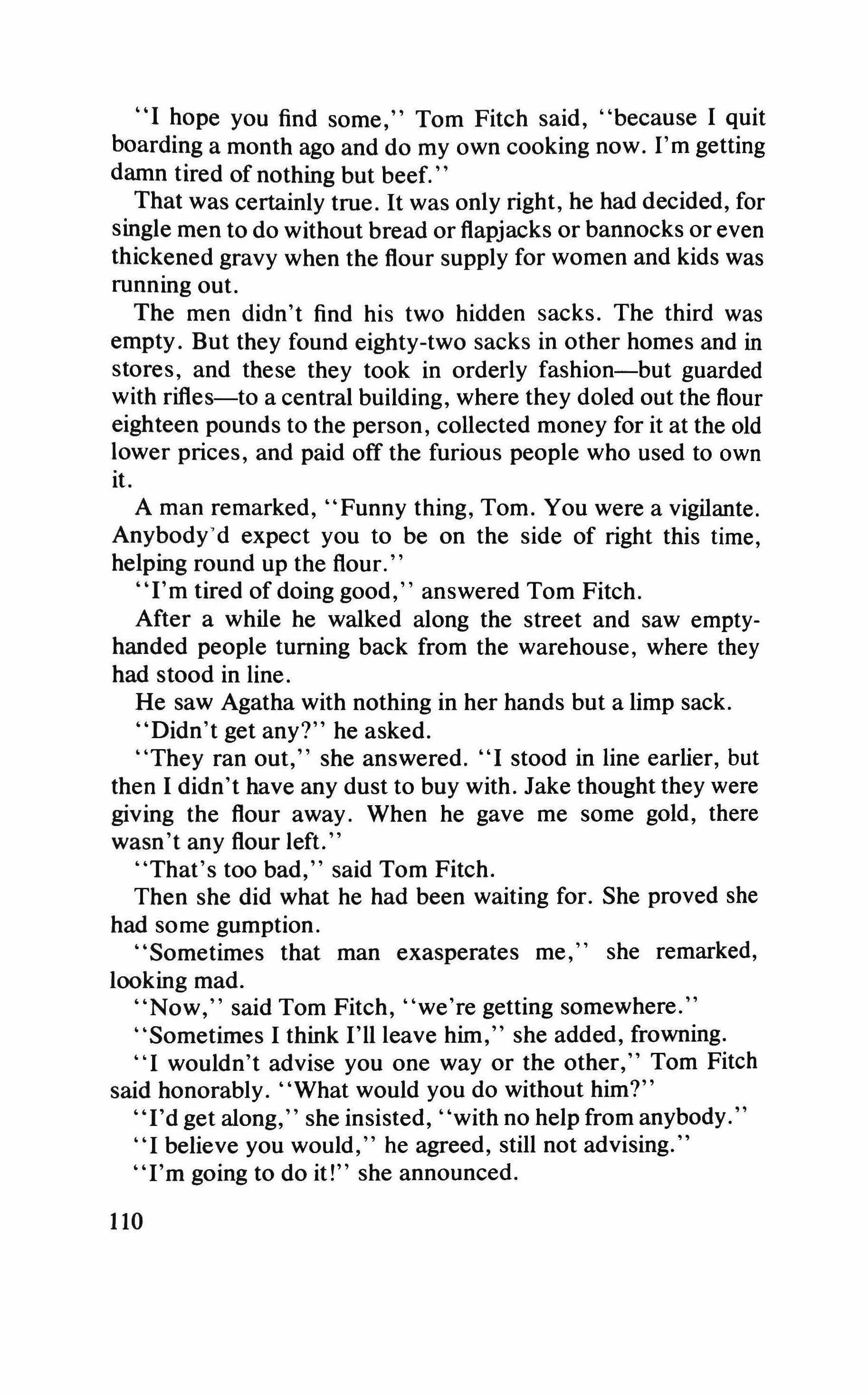
"I hope you find some," Tom Fitch said, "because I quit boarding a month ago and do my own cooking now. I'm getting damn tired of nothing but beef.
That was certainly true. It was only right, he had decided, for single men to do without bread or flapjacks or bannocks or even thickened gravy when the flour supply for women and kids was running out.
The men didn't find his two hidden sacks. The third was empty. But they found eighty-two sacks in other homes and in stores, and these they took in orderly fashion-but guarded with rifles-to a central building, where they doled out the flour eighteen pounds to the person, collected money for it at the old lower prices, and paid off the furious people who used to own it.
A man remarked, "Funny thing, Tom. You were a vigilante. Anybody'd expect you to be on the side of right this time, helping round up the flour."
"I'm tired of doing good," answered Tom Fitch.
After a while he walked along the street and saw emptyhanded people turning back from the warehouse, where they had stood in line.
He saw Agatha with nothing in her hands but a limp sack.
"Didn't get any?" he asked.
"They ran out," she answered. "I stood in line earlier, but then I didn't have any dust to buy with. Jake thought they were giving the flour away. When he gave me some gold, there wasn't any flour left."
"That's too bad," said Tom Fitch.
Then she did what he had been waiting for. She proved she had some gumption.
"Sometimes that man exasperates me," she remarked, looking mad.
"Now," said Tom Fitch, "we're getting somewhere."
"Sometimes I think I'll leave him," she added, frowning.
"I wouldn't advise you one way or the other," Tom Fitch said honorably. "What would you do without him?"
"I'd get along, she insisted, "with no help from anybody.
"I believe you would," he agreed, still not advising."
"I'm going to do it!" she announced.
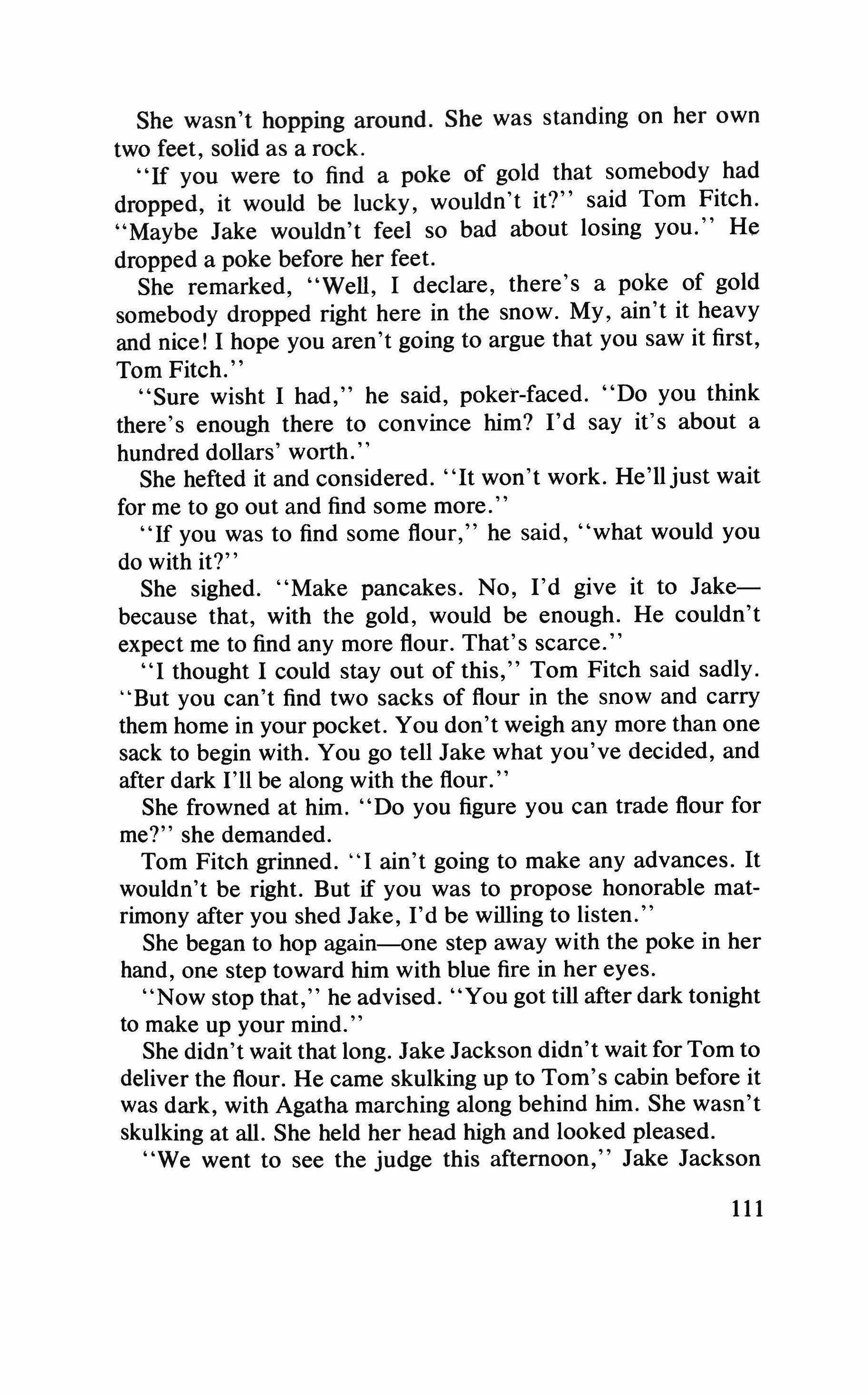
She wasn't hopping around. She was standing on her own two feet, solid as a rock.
"If you were to find a poke of gold that somebody had dropped, it would be lucky, wouldn't it?" said Tom Fitch. "Maybe Jake wouldn't feel so bad about losing you." He dropped a poke before her feet.
She remarked, "Well, I declare, there's a poke of gold somebody dropped right here in the snow. My, ain't it heavy and nice! I hope you aren't going to argue that you saw it first, Tom Fitch. "
"Sure wisht I had," he said, poker-faced. "Do you think there's enough there to convince him? I'd say it's about a hundred dollars' worth."
She hefted it and considered. "It won't work. He'Ujust wait for me to go out and find some more."
"If you was to find some flour," he said, "what would you do with it?"
She sighed. "Make pancakes. No, I'd give it to Jakebecause that, with the gold, would be enough. He couldn't expect me to find any more flour. That's scarce."
"I thought I could stay out of this," Tom Fitch said sadly. "But you can't find two sacks of flour in the snow and carry them home in your pocket. You don't weigh any more than one sack to begin with. You go tell Jake what you've decided, and after dark I'll be along with the flour."
She frowned at him. "Do you figure you can trade flour for me?" she demanded.
Tom Fitch grinned. "I ain't going to make any advances. It wouldn't be right. But if you was to propose honorable matrimony after you shed Jake, I'd be willing to listen."
She began to hop again-one step away with the poke in her hand, one step toward him with blue fire in her eyes.
"Now stop that," he advised. "You got till after dark tonight to make up your mind.
She didn't wait that long. Jake Jackson didn't wait for Tom to deliver the flour. He came skulking up to Tom's cabin before it was dark, with Agatha marching along behind him. She wasn't skulking at all. She held her head high and looked pleased.
"We went to see the judge this afternoon," Jake Jackson
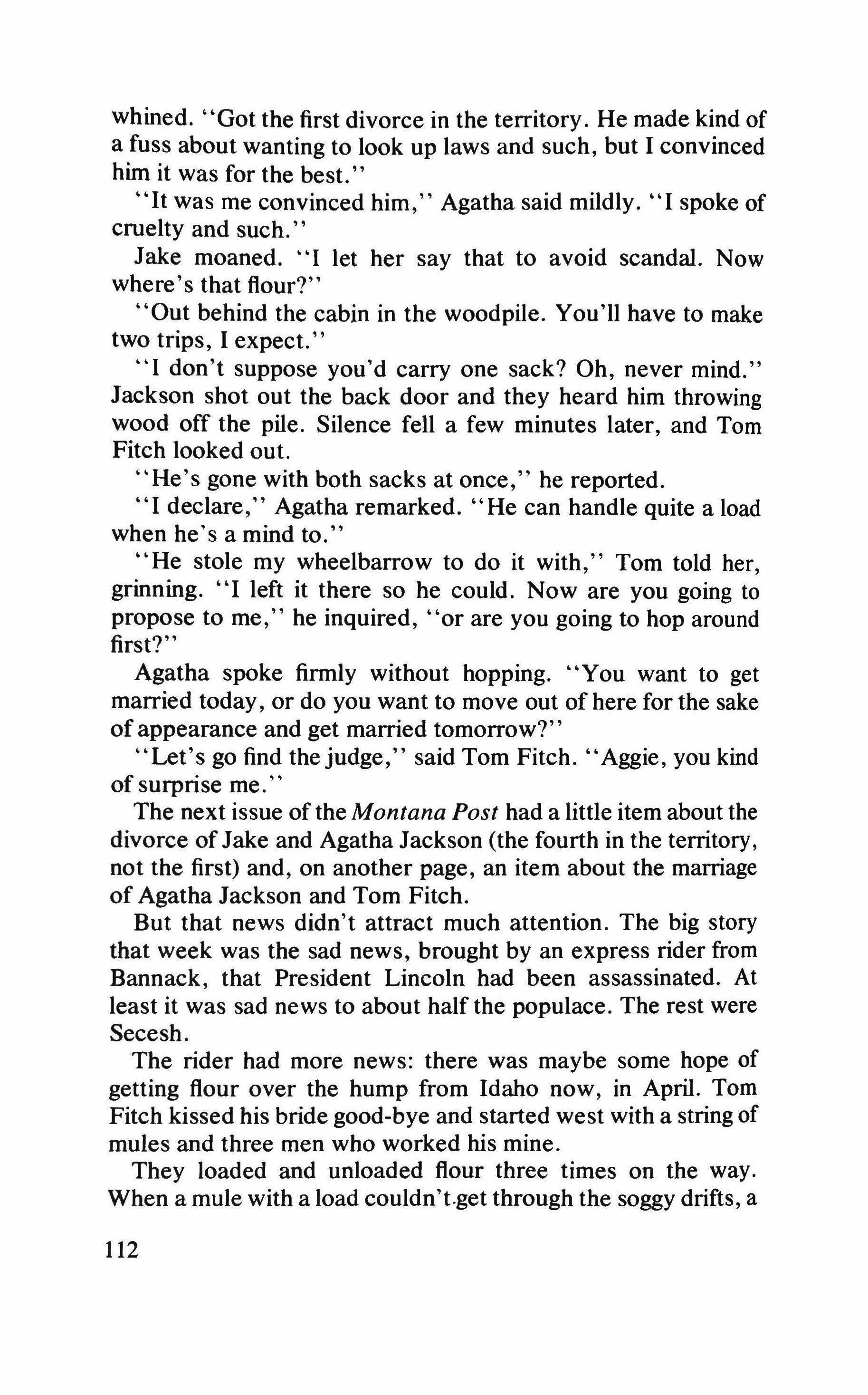
whined. "Got the first divorce in the territory. He made kind of a fuss about wanting to look up laws and such, but I convinced him it was for the best."
"It was me convinced him," Agatha said mildly. "I spoke of cruelty and such."
Jake moaned. "I let her say that to avoid scandal. Now where's that flour?"
"Out behind the cabin in the woodpile. You'll have to make two trips, I expect."
"I don't suppose you'd carry one sack? Oh, never mind." Jackson shot out the back door and they heard him throwing wood off the pile. Silence fell a few minutes later, and Tom Fitch looked out.
"He's gone with both sacks at once," he reported.
"I declare," Agatha remarked. "He can handle quite a load when he's a mind to."
"He stole my wheelbarrow to do it with," Tom told her, grinning. "I left it there so he could. Now are you going to propose to me," he inquired, "or are you going to hop around first?"
Agatha spoke firmly without hopping. "You want to get married today, or do you want to move out of here for the sake of appearance and get married tomorrow?"
"Let's go find the judge," said Tom Fitch. "Aggie, you kind of surprise me."
The next issue of the Montana Post had a little item about the divorce of Jake and Agatha Jackson (the fourth in the territory, not the first) and, on another page, an item about the marriage of Agatha Jackson and Tom Fitch.
But that news didn't attract much attention. The big story that week was the sad news, brought by an express rider from Bannack, that President Lincoln had been assassinated. At least it was sad news to about half the populace. The rest were Secesh.
The rider had more news: there was maybe some hope of getting flour over the hump from Idaho now, in April. Tom Fitch kissed his bride good-bye and started west with a string of mules and three men who worked his mine.
They loaded and unloaded flour three times on the way. When a mule with a load couldn't.get through the soggy drifts, a
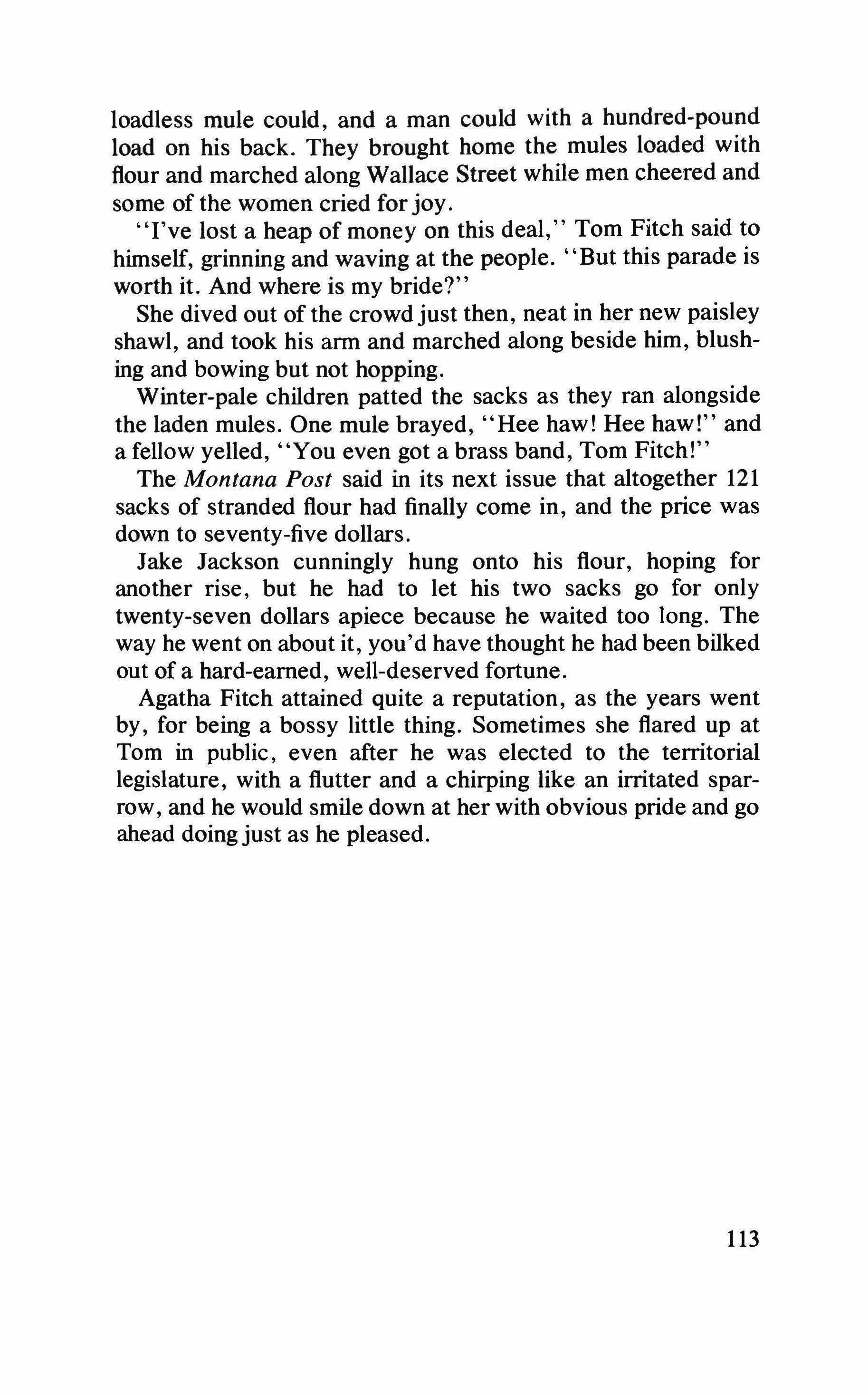
loadless mule could, and a man could with a hundred-pound load on his back. They brought home the mules loaded with flour and marched along Wallace Street while men cheered and some of the women cried forjoy.
"I've lost a heap of money on this deal," Tom Fitch said to himself, grinning and waving at the people. "But this parade is worth it. And where is my bride?"
She dived out of the crowd just then, neat in her new paisley shawl, and took his arm and marched along beside him, blushing and bowing but not hopping.
Winter-pale children patted the sacks as they ran alongside the laden mules. One mule brayed, "Hee haw! Hee haw!" and a fellow yelled, "You even got a brass band, Tom Fitch!"
The Montana Post said in its next issue that altogether 121 sacks of stranded flour had finally come in, and the price was down to seventy-five dollars.
Jake Jackson cunningly hung onto his flour, hoping for another rise, but he had to let his two sacks go for only twenty-seven dollars apiece because he waited too long. The way he went on about it, you'd have thought he had been bilked out of a hard-earned, well-deserved fortune.
Agatha Fitch attained quite a reputation, as the years went by, for being a bossy little thing. Sometimes she flared up at Tom in public, even after he was elected to the territorial legislature, with a flutter and a chirping like an irritated sparrow, and he would smile down at her with obvious pride and go ahead doingjust as he pleased.
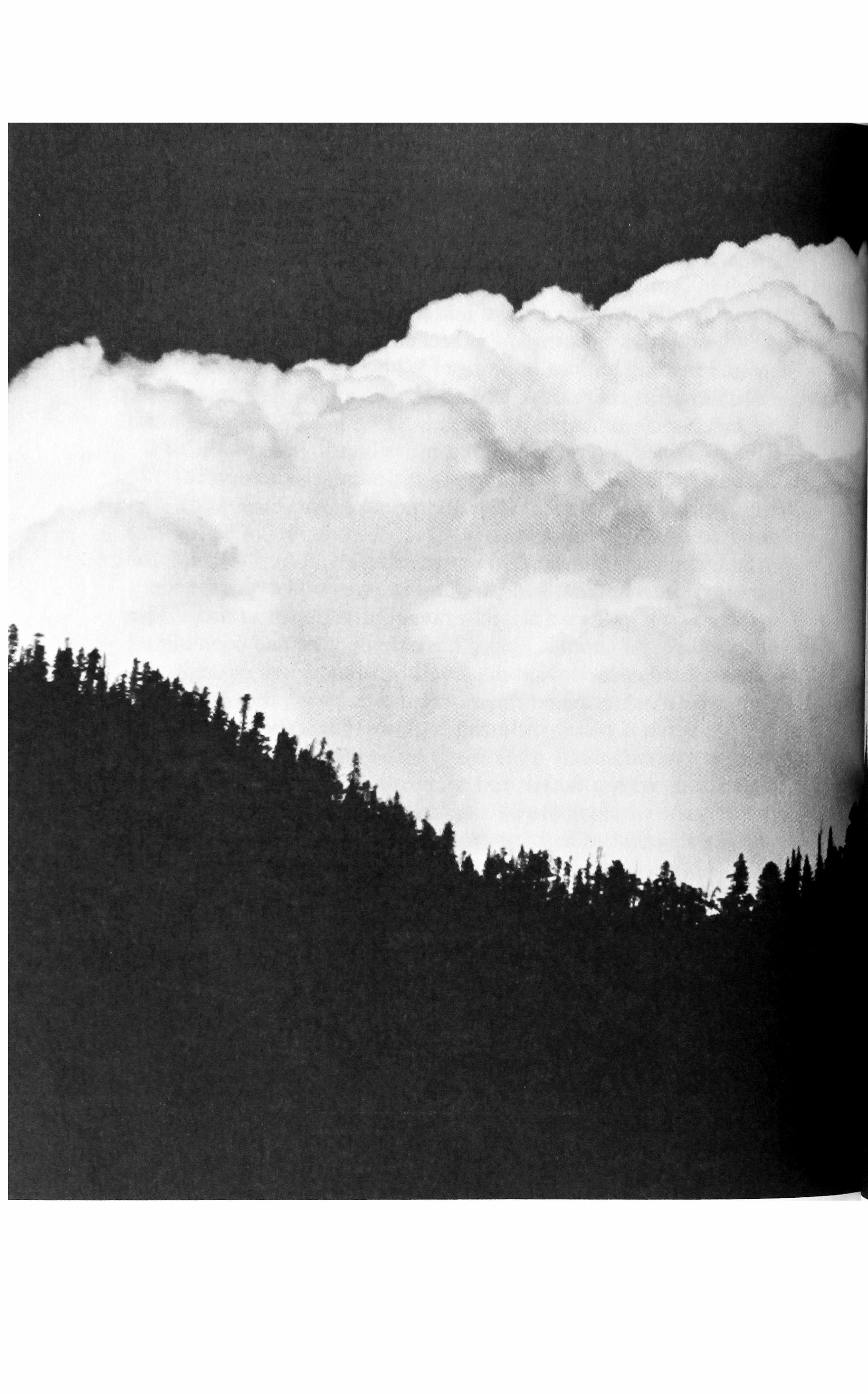
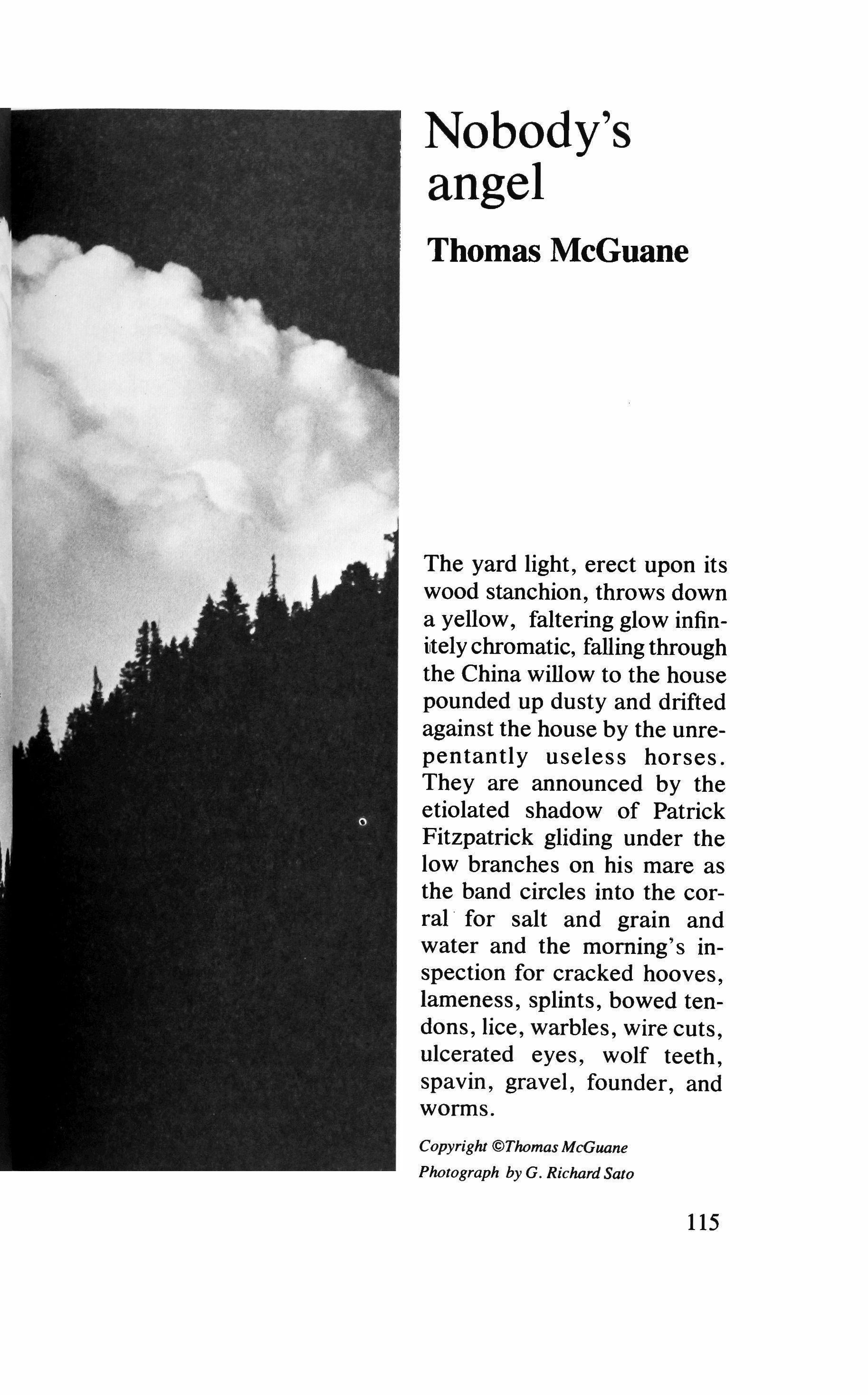
The yard light, erect upon its wood stanchion, throws down a yellow, faltering glow infinitelychromatic, fallingthrough the China willow to the house pounded up dusty and drifted against the house by the unrepentantly useless horses. They are announced by the etiolated shadow of Patrick Fitzpatrick gliding under the low branches on his mare as the band circles into the corral for salt and grain and water and the morning's inspection for cracked hooves, lameness, splints, bowed tendons, lice, warbles, wire cuts, ulcerated eyes, wolf teeth, spavin, gravel, founder, and worms.
Copyright ©Tlwmas McGuane
Photograph by G. Richard Sato
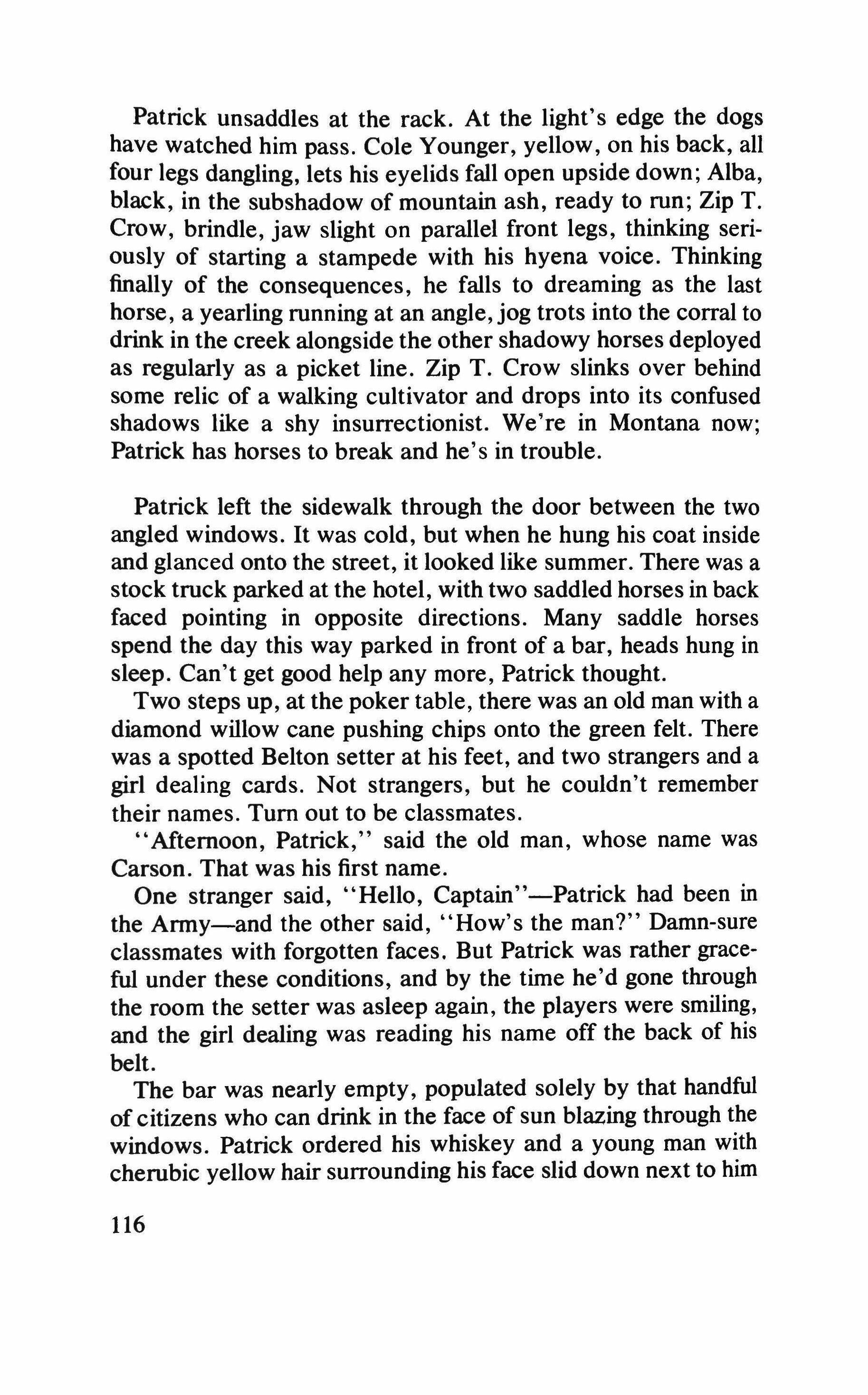
Patrick unsaddles at the rack. At the light's edge the dogs have watched him pass. Cole Younger, yellow, on his back, all four legs dangling, lets his eyelids fall open upside down; Alba, black, in the subshadow of mountain ash, ready to run; Zip T. Crow, brindle, jaw slight on parallel front legs, thinking seriously of starting a stampede with his hyena voice. Thinking finally of the consequences, he falls to dreaming as the last horse, a yearling running at an angle, jog trots into the corral to drink in the creek alongside the other shadowy horses deployed as regularly as a picket line. Zip T. Crow slinks over behind some relic of a walking cultivator and drops into its confused shadows like a shy insurrectionist. We're in Montana now; Patrick has horses to break and he's in trouble.
Patrick left the sidewalk through the door between the two angled windows. It was cold, but when he hung his coat inside and glanced onto the street, it looked like summer. There was a stock truck parked at the hotel, with two saddled horses in back faced pointing in opposite directions. Many saddle horses spend the day this way parked in front of a bar, heads hung in sleep. Can't get good help any more, Patrick thought.
Two steps up, at the poker table, there was an old man with a diamond willow cane pushing chips onto the green felt. There was a spotted Belton setter at his feet, and two strangers and a girl dealing cards. Not strangers, but he couldn't remember their names. Turn out to be classmates.
"Afternoon, Patrick," said the old man, whose name was Carson. That was his first name.
One stranger said, "Hello, Captain"-Patrick had been in the Army-and the other said, "How's the man?" Damn-sure classmates with forgotten faces. But Patrick was rather graceful under these conditions, and by the time he'd gone through the room the setter was asleep again, the players were smiling, and the girl dealing was reading his name off the back of his belt.
The bar was nearly empty, populated solely by that handful of citizens who can drink in the face of sun blazing through the windows. Patrick ordered his whiskey and a young man with cherubic yellow hair surrounding his face slid down next to him
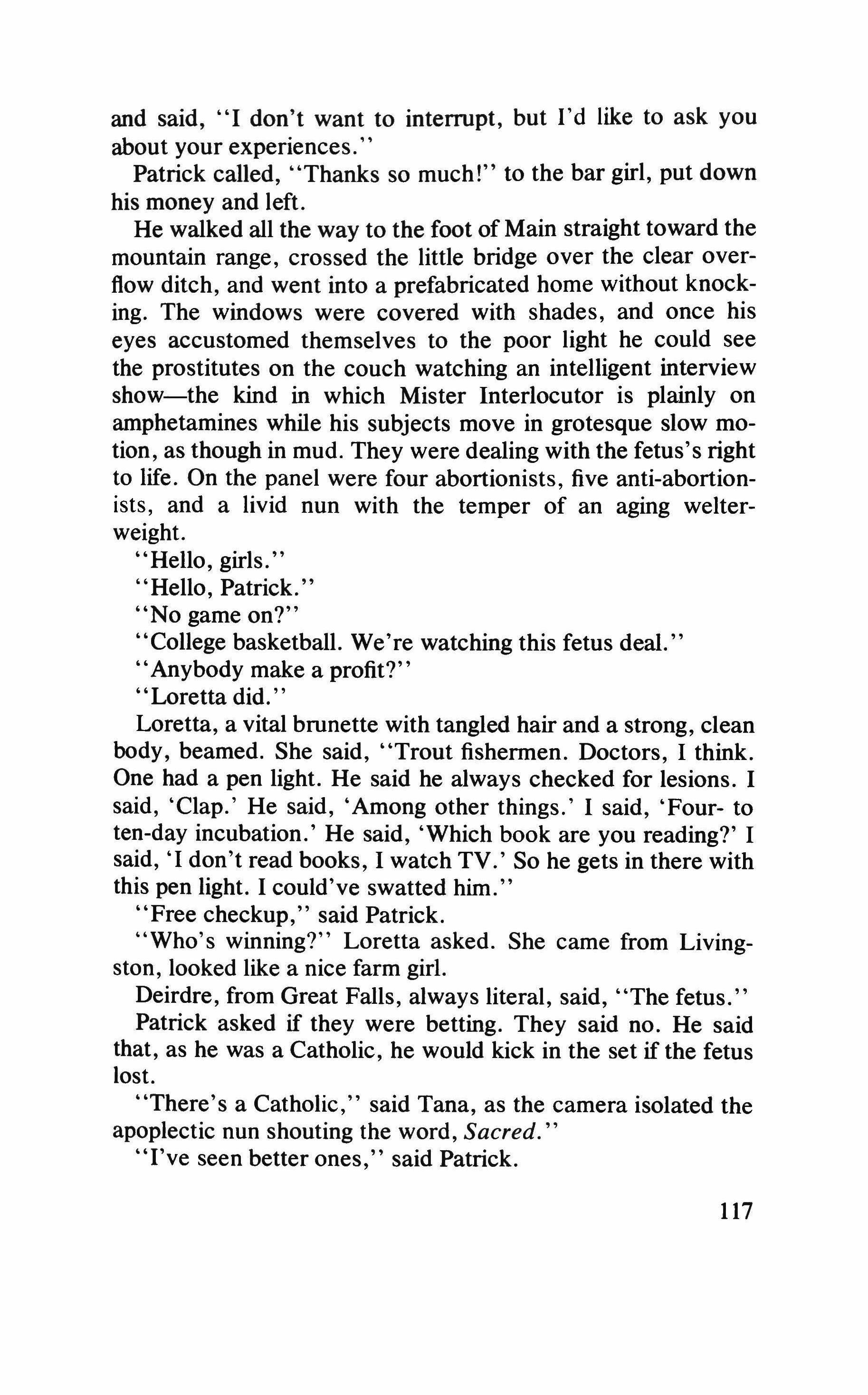
and said, "I don't want to interrupt, but I'd like to ask you about your experiences."
Patrick called, "Thanks so much!" to the bar girl, put down his money and left.
He walked all the way to the foot of Main straight toward the mountain range, crossed the little bridge over the clear overflow ditch, and went into a prefabricated home without knocking. The windows were covered with shades, and once his eyes accustomed themselves to the poor light he could see the prostitutes on the couch watching an intelligent interview show-the kind in which Mister Interlocutor is plainly on amphetamines while his subjects move in grotesque slow motion, as though in mud. They were dealing with the fetus's right to life. On the panel were four abortionists, five anti-abortionists, and a livid nun with the temper of an aging welterweight.
"Hello, girls."
"Hello, Patrick."
"No game on?"
"College basketball. We're watching this fetus deal."
"Anybody make a profit?"
"Loretta did. "
Loretta, a vital brunette with tangled hair and a strong, clean body, beamed. She said, "Trout fishermen. Doctors, 1 think. One had a pen light. He said he always checked for lesions. 1 said, 'Clap.' He said, 'Among other things.' 1 said, 'Four- to ten-day incubation.' He said, 'Which book are you reading?' 1 said, 'I don't read books, 1 watch TV.' So he gets in there with this pen light. 1 could've swatted him."
"Free checkup," said Patrick.
"Who's winning?" Loretta asked. She came from Livingston, looked like a nice farm girl.
Deirdre, from Great Falls, always literal, said, "The fetus.
Patrick asked if they were betting. They said no. He said that, as he was a Catholic, he would kick in the set if the fetus lost.
"There's a Catholic," said Tana, as the camera isolated the apoplectic nun shouting the word, Sacred."
"I've seen better ones," said Patrick.

"Well, there's one is all," she said doggedly. Andrea, the young, bright blonde, was from the High Line. She said, "I was with this rancher on his place. He wanted to go again. All the lights went out. I said, 'That's Rural Electrification for you.' He said, 'That's Montana Power.' I said, 'Well, I can't see nothin".' He said, 'It's hydroelectric. It comes off the grid, out of Columbia Falls.' So I said, 'What's the deal? Do we go again?' He said, 'Not if I can't see.' And just then, like God was on my side, the power came back on and I doubled down for fifty bucks."
"Jesus," Patrick said. "That nun is going to blow her stack." He was staring at the screen.
"She's no help to the fetus team," said Loretta. The moderator kept going, "Sister! Sister!" But nothing could slow her tirade which continued to feature the word "sacred," repeated at very high volume.
''I'm glad I don't have any money on this one," said Patrick. Andrea got up and went to the kitchen to make iced tea.
"Loretta," said Patrick, "do you still do any secretarial work?"
"I could. Part time anyway." Loretta had gone to grammar school with Patrick, had been a medical secretary, then had not been quite happy with that and tried prostitution, a respected job in Montana because of its long utility during the settlement of that region.
Deirdre from Great Falls said, "That nun could use some eye shadow."
Loretta asked, "What needs doing?"
"Paying bills, some letters. It'd mean coming to the ranch a couple of hours a day. The old man isn't the help he was. So I'm doing the rest of it."
Loretta accepted and said she would start on Monday.
Patrick was ticking off obligations. He walked back outside under the heartless blue sky and headed toward the Pastime Bar. He was searching for his grandfather, who had left the ranch early that morning. Patrick feared a binge. But, as Patrick had just left the Army and was not yet used to being home, he was rather like someone out of stir, trying to establish a pattern in a new world. For example, this morning, after
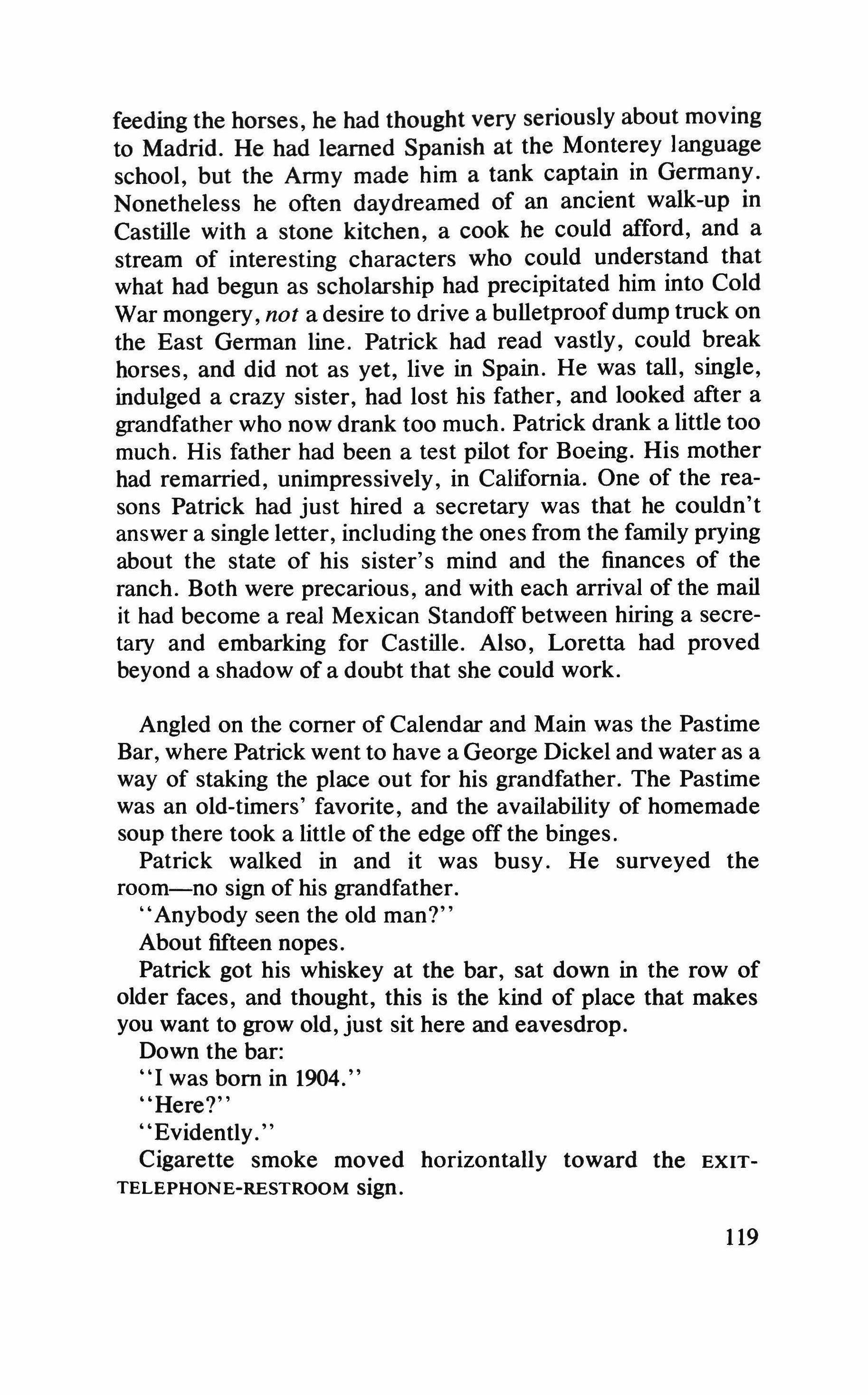
feeding the horses, he had thought very seriously about moving to Madrid. He had learned Spanish at the Monterey language school, but the Army made him a tank captain in Germany. Nonetheless he often daydreamed of an ancient walk-up in Castille with a stone kitchen, a cook he could afford, and a stream of interesting characters who could understand that what had begun as scholarship had precipitated him into Cold War mongery, not a desire to drive a bulletproofdump truck on the East German line. Patrick had read vastly, could break horses, and did not as yet, live in Spain. He was tall, single, indulged a crazy sister, had lost his father, and looked after a grandfather who now drank too much. Patrick drank a little too much. His father had been a test pilot for Boeing. His mother had remarried, unimpressively, in California. One of the reasons Patrick had just hired a secretary was that he couldn't answer a single letter, including the ones from the family prying about the state of his sister's mind and the finances of the ranch. Both were precarious, and with each arrival of the mail it had become a real Mexican Standoff between hiring a secretary and embarking for Castille. Also, Loretta had proved beyond a shadow of a doubt that she could work.
Angled on the comer of Calendar and Main was the Pastime Bar, where Patrick went to have a George Dickel and water as a way of staking the place out for his grandfather. The Pastime was an old-timers' favorite, and the availability of homemade soup there took a little of the edge off the binges.
Patrick walked in and it was busy. He surveyed the room-no sign of his grandfather.
"Anybody seen the old man?"
About fifteen nopes.
Patrick got his whiskey at the bar, sat down in the row of older faces, and thought, this is the kind of place that makes you want to grow old, just sit here and eavesdrop.
Down the bar:
"I was born in 1904."
"Here?"
"Evidently. Cigarette smoke moved horizontally toward the EXITTELEPHONE-RESTROOM sign.
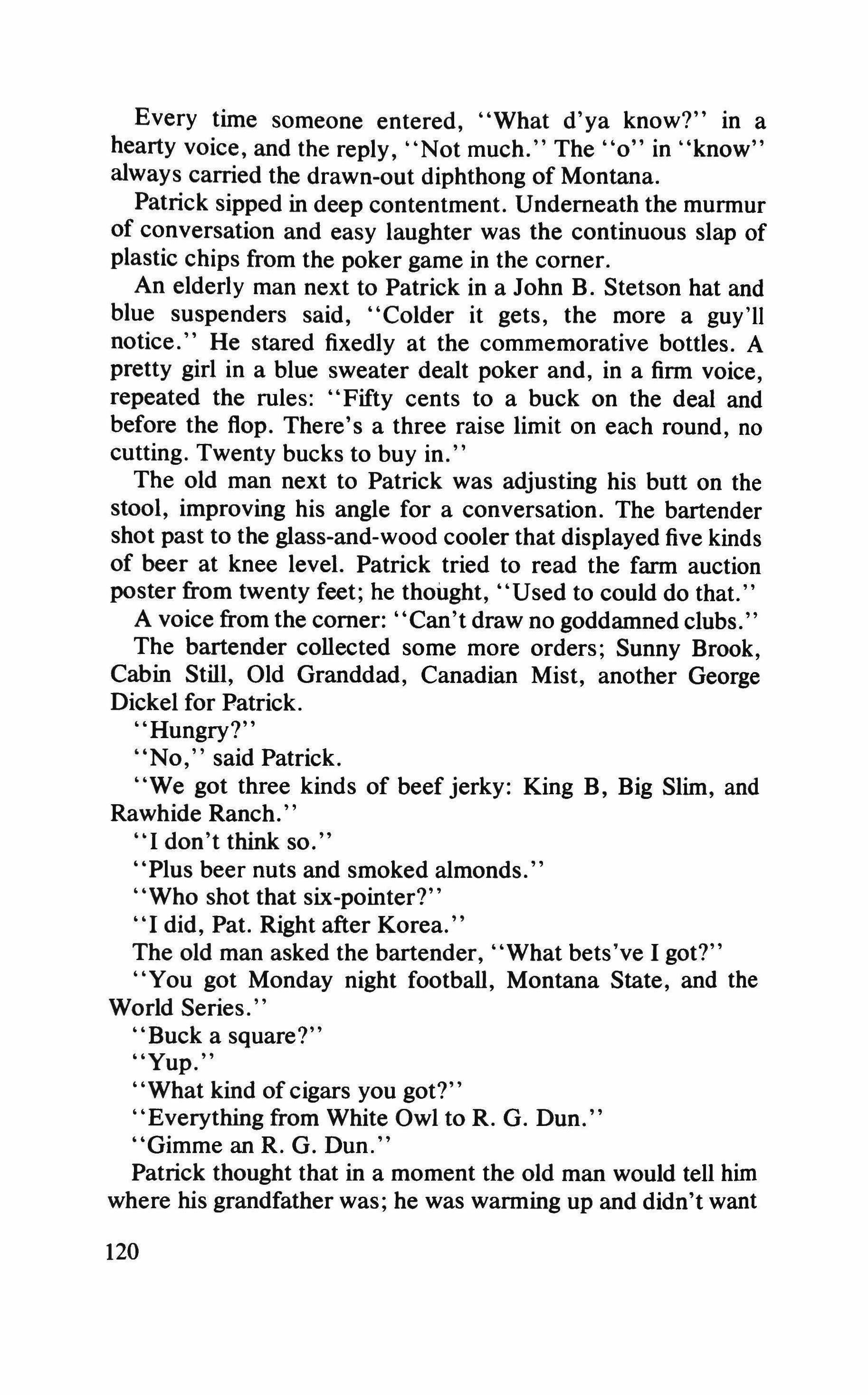
Every time someone entered, "What d'ya know?" in a hearty voice, and the reply, "Not much." The "0" in "know" always carried the drawn-out diphthong of Montana.
Patrick sipped in deep contentment. Underneath the murmur of conversation and easy laughter was the continuous slap of plastic chips from the poker game in the corner.
An elderly man next to Patrick in a John B. Stetson hat and blue suspenders said, "Colder it gets, the more a guy'll notice." He stared fixedly at the commemorative bottles. A pretty girl in a blue sweater dealt poker and, in a firm voice, repeated the rules: "Fifty cents to a buck on the deal and before the flop. There's a three raise limit on each round, no cutting. Twenty bucks to buy in."
The old man next to Patrick was adjusting his butt on the stool, improving his angle for a conversation. The bartender shot past to the glass-and-wood cooler that displayed five kinds of beer at knee level. Patrick tried to read the farm auction poster from twenty feet; he thought, "Used to could do that."
A voice from the corner: "Can't draw no goddamned clubs."
The bartender collected some more orders; Sunny Brook, Cabin Still, Old Granddad, Canadian Mist, another George Dickel for Patrick.
"Hungry?"
"No," said Patrick.
"We got three kinds of beef jerky: King B, Big Slim, and Rawhide Ranch.
"I don't think so."
"Plus beer nuts and smoked almonds."
"Who shot that six-pointer?"
"I did, Pat. Right after Korea."
The old man asked the bartender, "What bets've I got?"
"You got Monday night football, Montana State, and the World Series."
"Buck a square?"
"Yup."
"What kind of cigars you got?"
"Everything from White Owl to R. G. Dun."
"Gimme an R. G. Dun."
Patrick thought that in a moment the old man would tell him where his grandfather was; he was warming up and didn't want
to be a squealer. Patrick pointed to a bottle of Hiram Walker Chocolate Mint liqueur and, to break the ice, asked, "Ever try that?"
"No."
The old man knew Patrick knew. He was going to play it silent. Down the bar a heavy woman in her sixties squinted and started describing commemorative bottles.
"Illinois gladiola festival, a Ducks Unlimited, an Australian koala bear, Indian Chief, Abraham Lincoln, the Kentucky Derby, Am Vets, a telephone
"Barkeep, what's it say on that model train?"
"Jupiter. Saysjust Jupiter."
"I don't know what in the hell that means."
The old man pivoted to Patrick. "Your grandfather is trying out for a movie."
"He what?"
"Read the poster on the inside of the door."
"Say, thanks."

for Hondo's Last Move, a featurefilm.
WANTED
Men. women and children for bit players. extras, et cetera. ALSO NOTE
In order to reflect the hardships endured in the West in the 1880's. we would especially welcome the physically eccentric, those with permanent physical injuries such as scars, missing teeth, broken limbs, broken noses. missing limbs. etc.
Arnold Duxbury, casting coordinator, room 115-117, Murray Hotel. Interviews commence daily at 10:00 A.M.
Patrick thought, the old bugger has scars, missing teeth, and evidence of a broken nose. That is where we shall find him.
Rooms 115-117 were, respectively, reception, waiting room, and Duxbury. There was a considerable lineup of the maimed. The worst was a five-year-old boy whose pet wildcat had recently clawed out his eyeball. He wore an oozing patch and steered his head around trying to figure out what he was doing there. His mother, a beautician who moonlighted at the Melody Supper Club, respected her son's injury enough to bark, "No cuts!" at Patrick when he tried to move up the line and look for his grandfather. The mother indignantly steered the little boy
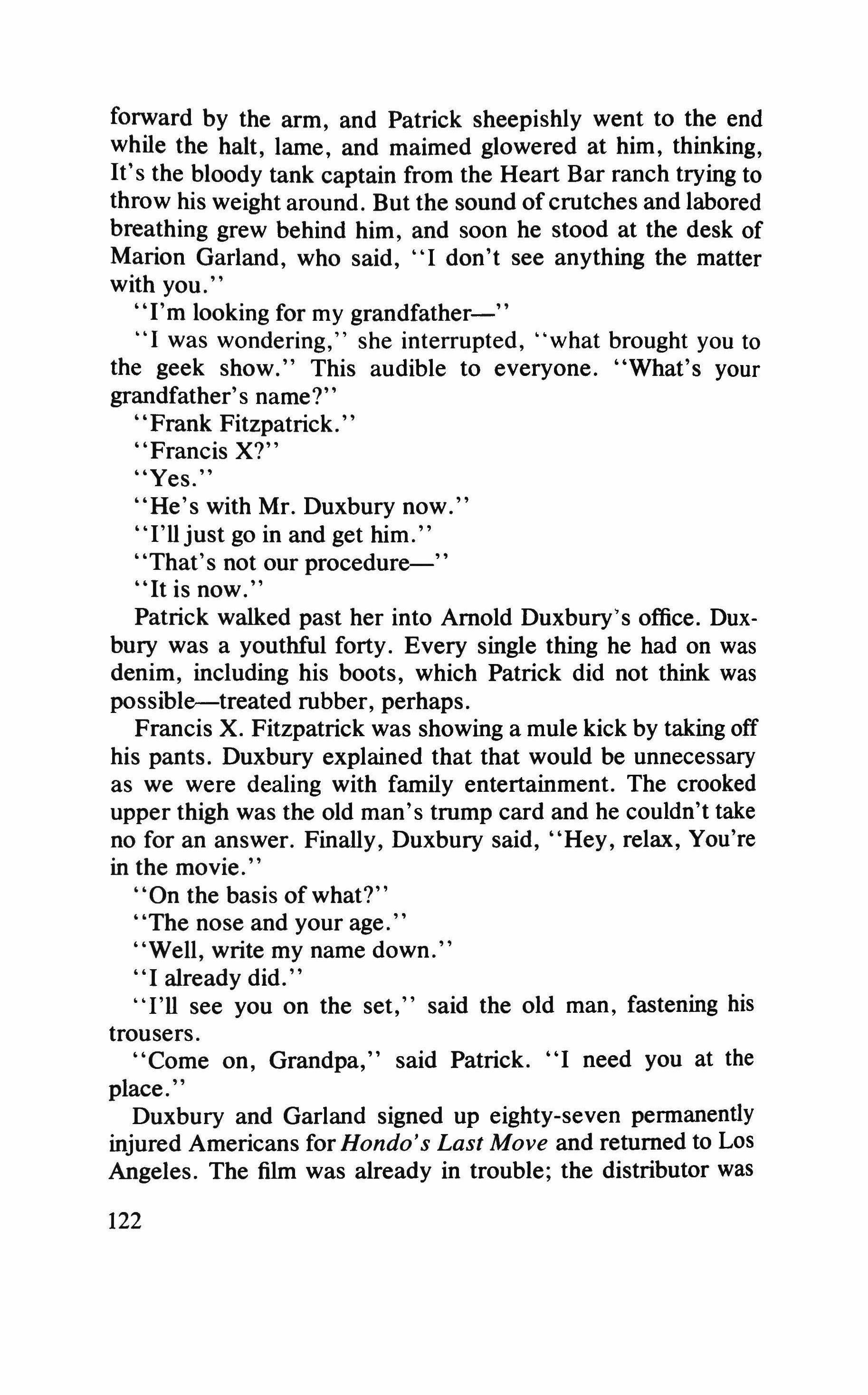
forward by the arm, and Patrick sheepishly went to the end while the halt, lame, and maimed glowered at him, thinking, It's the bloody tank captain from the Heart Bar ranch trying to throw his weight around. But the sound of crutches and labored breathing grew behind him, and soon he stood at the desk of Marion Garland, who said, "I don't see anything the matter with you."
"I'm looking for my grandfather-"
"I was wondering," she interrupted, "what brought you to the geek show." This audible to everyone. "What's your grandfather's name?"
"Frank Fitzpatrick."
"Francis X?"
"Yes."
He's with Mr. Duxbury now."
"I'll just go in and get him."
"That's not our procedure-"
"It is now."
Patrick walked past her into Arnold Duxbury's office. Duxbury was a youthful forty. Every single thing he had on was denim, including his boots, which Patrick did not think was possible-treated rubber, perhaps.
Francis X. Fitzpatrick was showing a mule kick by taking off his pants. Duxbury explained that that would be unnecessary as we were dealing with family entertainment. The crooked upper thigh was the old man's trump card and he couldn't take no for an answer. Finally, Duxbury said, "Hey, relax, You're in the movie."
"On the basis of what?"
"The nose and your age."
"Well, write my name down."
I already did.
I'll see you on the set," said the old man, fastening his trousers.
"Come on, Grandpa," said Patrick. "I need you at the place.
Duxbury and Garland signed up eighty-seven permanently injured Americans for Hondo's Last Move and returned to Los Angeles. The film was already in trouble; the distributor was 122

thinking of pulling out to do something more in the space line, as westerns were beginning to show signs of what he called in a Variety interview, "metal fatigue.
Patrick gave his grandfather a good lead, then got in the Ford and started home. The yellow truck shot along the river road against the amphitheater in the Absaroka range between Suce Creek and Deep Creek. A summer storm hung in the deepest pass above the truck, and lightning volleyed in silence. On the dashboard a lateral glare obscured the instruments. Patrick glanced at his knuckles, looked up, dodged a pothole, admired a hawk circling in a thermal against the limited storm now evaporating like steam on glass. The truck sucked down into the creek bottom. The storm dematerialized and left the hawk in empty blue.
Patrick stopped at the calving shed a mile below the house and played Ornette Coleman on the machine, wondering why Ornette always had a white bass player and why he made you think so hard. Patrick decided that because Ornette was such a thorough master of bebop, he knew a honky could be expected to playa melodic bass and not worry too much about time. Was Ornette as clever as the Yardbird? Why was there not a statue of Charlie Parker in Washington fucking District of fucking Columbia? When Patrick thought of Ornette Coleman running an elevator in Los Angeles with a roomful of scores and his mother sending him food from Texas, he developed grave doubts about the District of Columbia.
Patrick daydreamed on with the unimpeded high energy of one who can work with horses. Lenin's girlfriend Inessa Armand died in 1920 of typhus in the North Caucasus. Patrick read that in a Mexican comic book while preparing for flight to Castille. He read that in the vague interior light of a high-speed American tank in Germany. He was a security measure. He liked whiskey; most of the other security measures preferred pharmaceuticals. With their dilated pupils and languorous movements they were there to help save the West from the East, should the occasion arise. Patrick felt they had already gone East. But, then, he was a captain and being an officer had slowly sunk against the grain until finally, strangely, he was 123
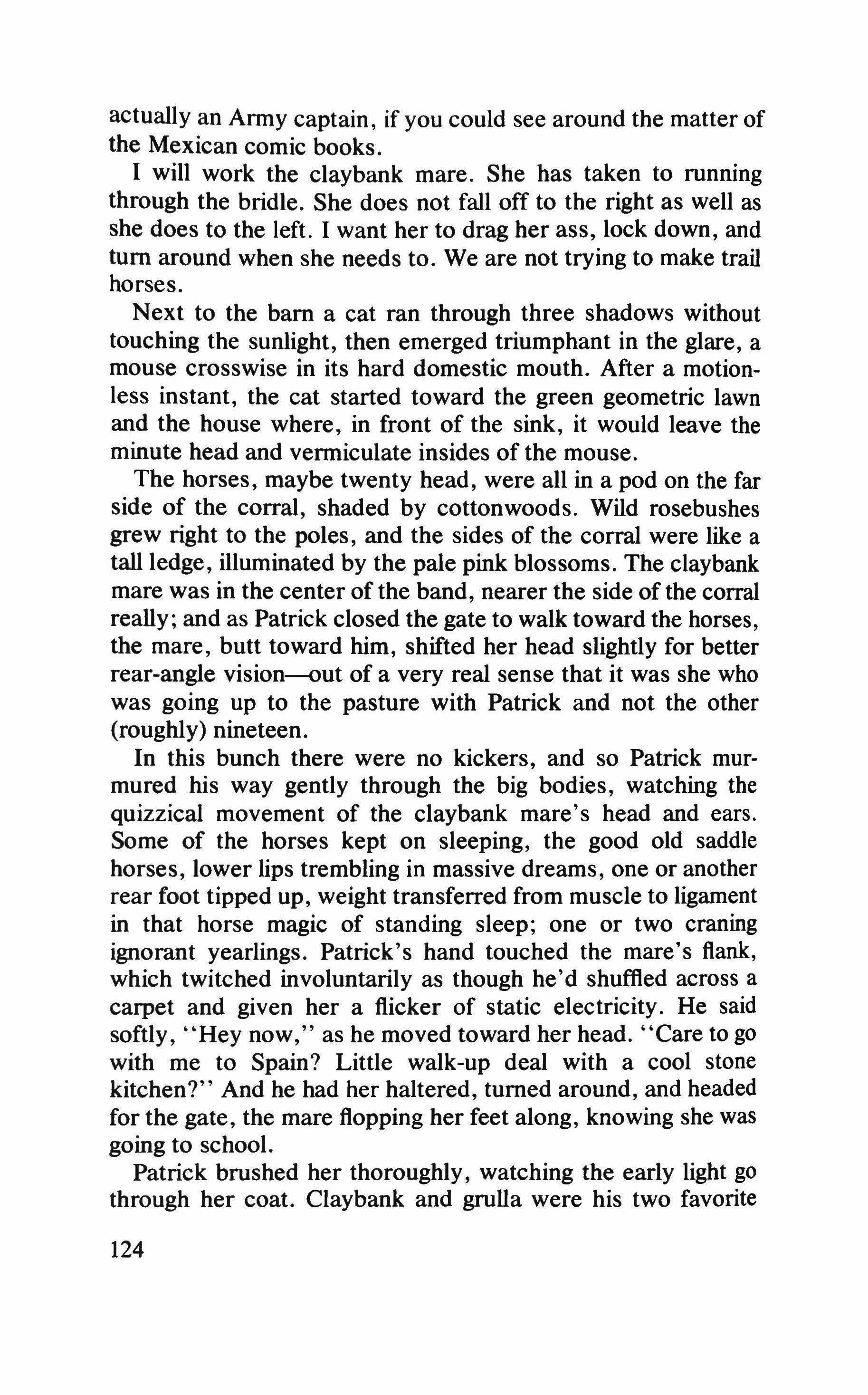
actually an Army captain, if you could see around the matter of the Mexican comic books.
I will work the claybank mare. She has taken to running through the bridle. She does not falloff to the right as well as she does to the left. I want her to drag her ass, lock down, and tum around when she needs to. We are not trying to make trail horses.
Next to the barn a cat ran through three shadows without touching the sunlight, then emerged triumphant in the glare, a mouse crosswise in its hard domestic mouth. After a motionless instant, the cat started toward the green geometric lawn and the house where, in front of the sink, it would leave the minute head and vermiculate insides of the mouse.
The horses, maybe twenty head, were all in a pod on the far side of the corral, shaded by cottonwoods. Wild rosebushes grew right to the poles, and the sides of the corral were like a tall ledge, illuminated by the pale pink blossoms. The claybank mare was in the center of the band, nearer the side of the corral really; and as Patrick closed the gate to walk toward the horses, the mare, butt toward him, shifted her head slightly for better rear-angle vision--out of a very real sense that it was she who was going up to the pasture with Patrick and not the other (roughly) nineteen.
In this bunch there were no kickers, and so Patrick murmured his way gently through the big bodies, watching the quizzical movement of the claybank mare's head and ears. Some of the horses kept on sleeping, the good old saddle horses, lower lips trembling in massive dreams, one or another rear foot tipped up, weight transferred from muscle to ligament in that horse magic of standing sleep; one or two craning ignorant yearlings. Patrick's hand touched the mare's flank, which twitched involuntarily as though he'd shuffled across a carpet and given her a flicker of static electricity. He said softly, "Hey now," as he moved toward her head. "Care to go with me to Spain? Little walk-up deal with a cool stone kitchen?" And he had her haltered, turned around, and headed for the gate, the mare flopping her feet along, knowing she was going to school.
Patrick brushed her thoroughly, watching the early light go through her coat. Claybank and grulla were his two favorite
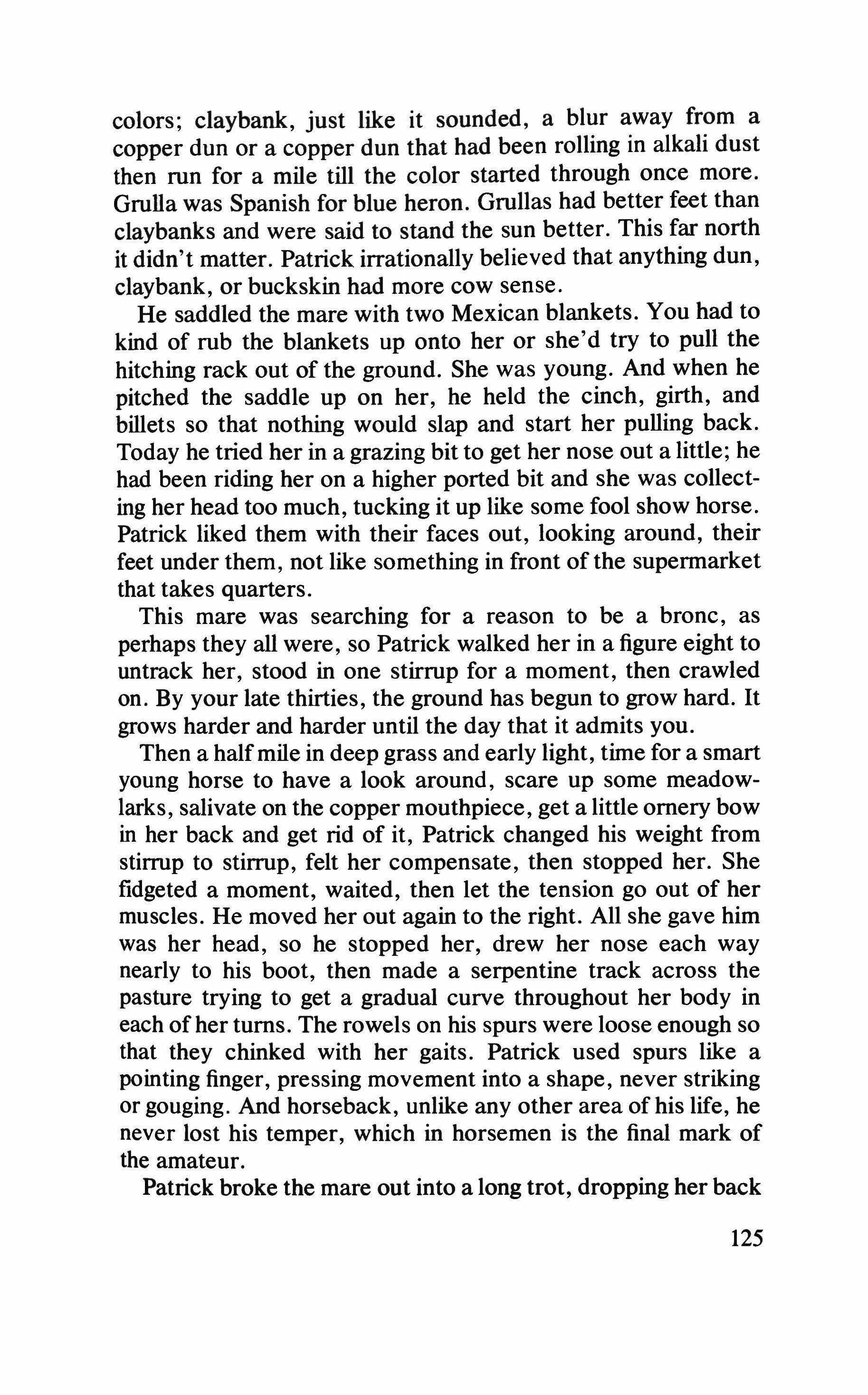
colors; claybank, just like it sounded, a blur away from a copper dun or a copper dun that had been rolling in alkali dust then run for a mile till the color started through once more. Grulla was Spanish for blue heron. Grullas had better feet than claybanks and were said to stand the sun better. This far north it didn't matter. Patrick irrationally believed that anything dun, claybank, or buckskin had more cow sense.
He saddled the mare with two Mexican blankets. You had to kind of rub the blankets up onto her or she'd try to pull the hitching rack out of the ground. She was young. And when he pitched the saddle up on her, he held the cinch, girth, and billets so that nothing would slap and start her pulling back. Today he tried her in a grazing bit to get her nose out a little; he had been riding her on a higher ported bit and she was collecting her head too much, tucking it up like some fool show horse. Patrick liked them with their faces out, looking around, their feet under them, not like something in front of the supermarket that takes quarters.
This mare was searching for a reason to be a bronc, as perhaps they all were, so Patrick walked her in a figure eight to untrack her, stood in one stirrup for a moment, then crawled on. By your late thirties, the ground has begun to grow hard. It grows harder and harder until the day that it admits you.
Then a halfmile in deep grass and early light, time for a smart young horse to have a look around, scare up some meadowlarks, salivate on the copper mouthpiece, get a little ornery bow in her back and get rid of it, Patrick changed his weight from stirrup to stirrup, felt her compensate, then stopped her. She fidgeted a moment, waited, then let the tension go out of her muscles. He moved her out again to the right. All she gave him was her head, so he stopped her, drew her nose each way nearly to his boot, then made a serpentine track across the pasture trying to get a gradual curve throughout her body in each of her turns. The rowels on his spurs were loose enough so that they chinked with her gaits. Patrick used spurs like a pointing finger, pressing movement into a shape, never striking or gouging. And horseback, unlike any other area of his life, he never lost his temper, which in horsemen is the final mark of the amateur.
Patrick broke the mare out into a long trot, dropping her back

each time she tried to move into a lope. She made one long buck out of irritation, then leveled off like a pacer, eating up ground, and slowly rotated the amphitheater of cascading hills to Patrick's happy observation.
He sat the mare down twice, liked her stops, then blew her out for half a mile, the new fence going past his eyes like a filament of mercury, and let her jog home while he told her continuously how wonderful she was, what a lovely person she was becoming.
Black coffee and a morning breeze through the paper. Martinsdale Hutterites had recovered three hundred contaminated chickens. Cowboys for Christ were having a benefit. A Billings fireman captured with three pounds of methamphetamines. Poplar man shot to death in Wolf Point; Bureau of Indian Affairs investigator and tribal police arrested two men as yet unnamed. Half million in felonious cattle defaults. Formerly known as bum deals, thought Patrick. A new treatment center for compulsive gamblers. Lives shattered by slot machines. Wanted or for sale: TV stand, green broke horse, ladies' western suit, four-drawer blond dresser, harvest gold gas range, three box-trained kittens, non-leak laundry tubs, top dollars for deer and elk hides, Brown Swiss, presently milking, Phoenix or Yuma to share gas. When Patrick's father went down, testing an airplane fast enough so its exterior skin glowed at night from the friction of the air, the hurtling pulp that had been his father and the navigator and that had passed through the intricate molecular confusion of an exploding aircraft at its contact with Eastern Oregon, the paper identified him as Patrick Fitzpatrick of Livingston, Montana, and the navigator as Del Franklin of Riverside, California. Great space was given to the model of the aircraft and much speculation about a declared salvage value. As so many people have had to wonder, Patrick thought, if my father is dead, how can I be alive? From then on, as he revered his father and his memory of him, Patrick lost much of his own fear of death. The crash had provoked none of the questions usual to accidental death. There was nothing to identify.

Patrick's grandfather walked into the kitchen, opened the refrigerator, stared about at the contents, settled for a handful of radishes, and sat down.
"What's the cattle market doing?"
"Haven't had the radio on," said Patrick. "Somebody sold a bunch of bred heifers in Billings yesterday for a twenty-sevenhundred-dollar average."
"Bred how?"
"Shoshoni or Chandelier Forever, forgot which. You want me to make you some breakfast?" I can rustle."
"Here, sit down. What do you want?"
"Couple of soft-boiled eggs. Thanks."
Patrick started getting them ready. "In Europe there'd be these restaurants that put a soft-boiled egg in a little porcelain holder and they'd cover it with a knitted thing to keep the egg hot.
"All over Europe?"
"Just in this one place."
"That's the silliest thing I ever heard. I have no desire to see Europe."
Patrick served the eggs and some toast.
"Down there, there in Oklahoma, they've got a toll-free number for the cattle market. I hate having to listen to all this deal on the radio to find what steers brought."
"Steers aren't going to make you anything," said Patrick.
"Feeding out seven months ain't going to make you anything."
"I never said ranching was any good."
"Talk like that," said his grandfather feistily, "and you won't want to fix nothin'."
"Well, just let her fall down, then," Patrick said. It ain't even historical.'
"That's right."
"And where would you be running this remuda of yours?"
"On the damn Forest Service."
"Try it."
"I may."
"Go to hell."
Patrick's grandfather returned to his eggs, smoldering. Patrick was going to let him make his own tomorrow.

"You ought to back your horses more if you want them to get their butts down," said his grandfather.
"Don't tell me to back my horses. I get their feet under them by making them want to stop.
"They aren't tanks, Patrick."
"I rode some colts you broke twenty years ago. Couldn't tum them around in a twenty-acre pasture.
"Why don't Ijust cook my own eggs tomorrow? Seems like a little favor spoils your temperament. I remember some of them colts, you wretched, devilish bastard, and they turned on a dime. Why, you bugger, I broke Leafy's mother!"
"You cook the eggs."
When he was away, Patrick's daydreams fell easily back twenty years to summers of riding in the hills, spooking game in the springs and down in the blue-shadowy draws, swimming in the gold dredge, girls present, the cold sky-blue submersion a kind of baptism, the best place for the emerging consciousness of women to grow in suitable containment. Even, in a West German dance hall, suddenly remembering the flood of tears at twelve when he'd killed a spike buck in the same little grove where he and his father always cut their Christmas tree. Before that, hunting coyotes, his grandfather had crawled into a cave near Blacktail and found a ceremonially dressed, mummified Indian warrior on a slab of rock. His grandfather refused to tell anyone where the corpse was and Patrick wore out two saddle horses looking for it. "You do not disturb the Old Ones," his grandfather had said. And Patrick himself, on the North Rosebud, had found the scribblings of the phantom ancient sheep eaters. He had slept in eagle traps and in the coffinshaped hole in the rock the Crows had made above Mission Creek. He had seen the skeleton of the Cheyenne girl dressed in an army coat, disinterred when the railroad bed was widened. Dead of the white man's smallpox, her family had put silver thimbles on every finger to prove to somebody's god that she was a useful girl who could sew.
After his father went to work for Boeing and split up with his mother, Patrick lived with his grandfather and ate so much poached game that the smell of beef nauseated him. He lost the tips of three fingers in his lariat, heeling calves in the spring, and he never went to the movies except to meet girls-the only

good reason, according to his grandfather. He could shoe horses, beat a hunting knife out of an old file, throw a diamond hitch, fix windmills, and masquerade well enough in town to occasionally get his ashes hauled, though he still preferred the sinewy barrel racers he first met at the gold dredge whose teasing country-ruthless sensuality was somehow smokier than the ten-speeders just learning to roll a number. At sixteen, he was jailed twelve times in a row for disorderly conduct; and his father, in the year that he died-a circumstance that left Patrick permanently scarred with guilt-borrowed against his share of the ranch and sent Patrick to a preparatory school in Michigan, where they thought that a rebellious young cowboy would be a colorful enough addition to a student body which included a Siamese prince with a Corvette, a West German, five Venezuelans, and one Negro, so that they would overlook his poor grades and boisterous history with the law.
They taught him to play soccer.
The two men in the yard stood knee-deep in three dogs. They were at bay. The men, in their forties, had good suits on and they didn't want to get bitten, or, if the dogs were going to be friendly, then the men didn't want to start them jumping all over their suits. As the men moved toward him, Patrick was perhaps more fixed upon these suits than the faces, which were neither friendly nor unfriendly nor burdened with the desire to make a sale. Patrick had the saddle down when they got to him. They were presenting their identification with identical smooth gestures.
"We are from the Federal Bureau of Investigation," said the one on the left.
"Well, let me put this horse up and make my arrangements," said Patrick. He was under arrest.
At this point Patrick's grandfather arose from his brief, sobering nap. And by the time the three men, including Patrick, had crossed the lawn, the old man was on it, his thin, blueveined eyelids lowered minutely upon the composed and staring cowboy's eyes, as direct as the muscular old man's stance. His gaze settled on the three.
"These friends of yours, Patrick?"
"Kind of are," said Patrick. He hunkered down and undid
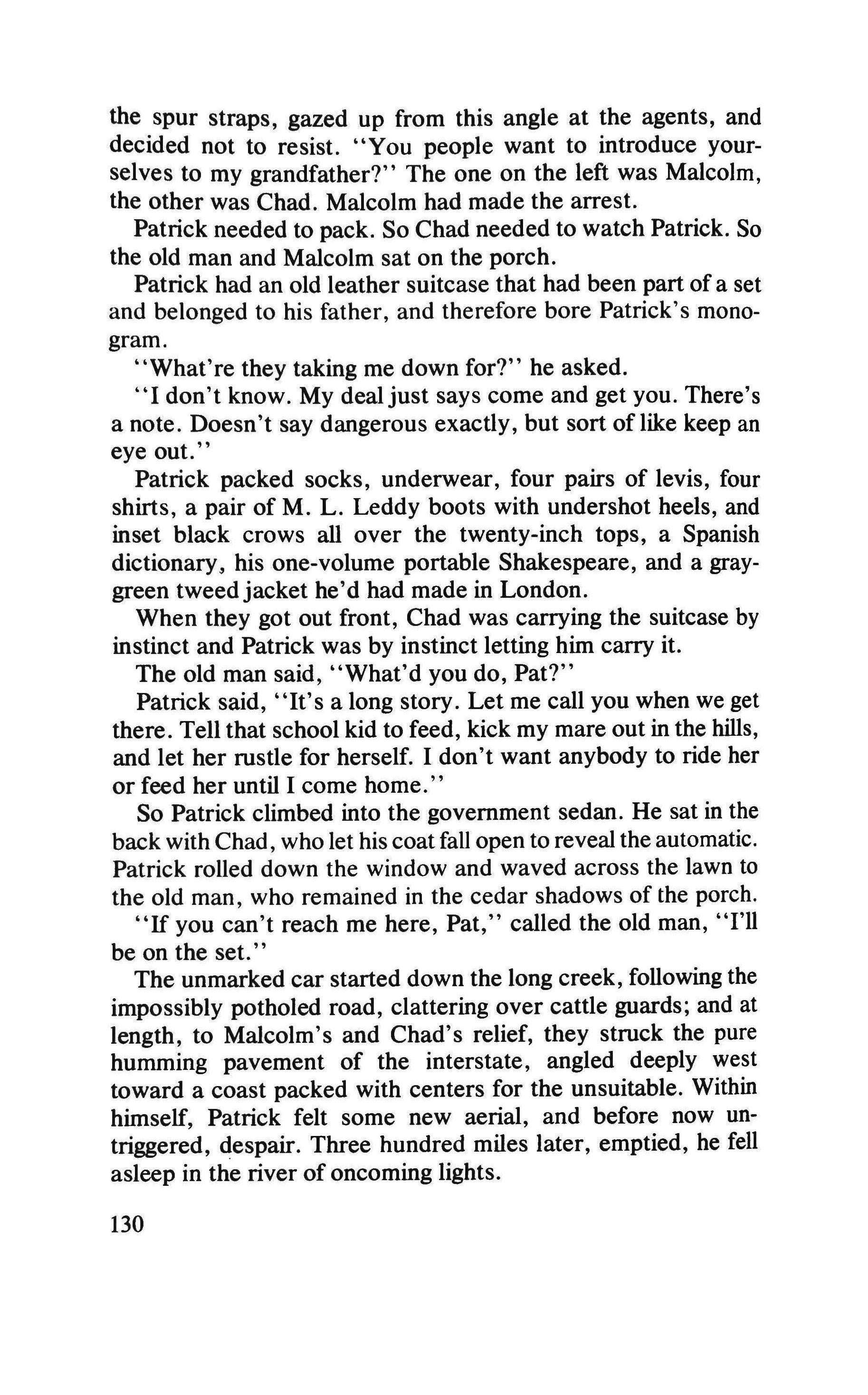
the spur straps, gazed up from this angle at the agents, and decided not to resist. "You people want to introduce yourselves to my grandfather?" The one on the left was Malcolm, the other was Chad. Malcolm had made the arrest.
Patrick needed to pack. So Chad needed to watch Patrick. So the old man and Malcolm sat on the porch.
Patrick had an old leather suitcase that had been part of a set and belonged to his father, and therefore bore Patrick's monogram.
"What're they taking me down for?" he asked.
"I don't know. My deal just says come and get you. There's a note. Doesn't say dangerous exactly, but sort oflike keep an eye out."
Patrick packed socks, underwear, four pairs of levis, four shirts, a pair of M. L. Leddy boots with undershot heels, and inset black crows all over the twenty-inch tops, a Spanish dictionary. his one-volume portable Shakespeare, and a graygreen tweed jacket he'd had made in London.
When they got out front, Chad was carrying the suitcase by instinct and Patrick was by instinct letting him carry it.
The old man said, "What'd you do, Pat?"
Patrick said, "It's a long story. Let me call you when we get there. Tell that school kid to feed, kick my mare out in the hills, and let her rustle for herself. I don't want anybody to ride her or feed her until I come home."
So Patrick climbed into the government sedan. He sat in the back with Chad, who let his coat fall open to reveal the automatic. Patrick rolled down the window and waved across the lawn to the old man, who remained in the cedar shadows of the porch.
"If you can't reach me here, Pat," called the old man, "I'll be on the set."
The unmarked car started down the long creek, following the impossibly potholed road, clattering over cattle guards; and at length, to Malcolm's and Chad's relief, they struck the pure humming pavement of the interstate, angled deeply west toward a coast packed with centers for the unsuitable. Within himself, Patrick felt some new aerial, and before now untriggered, despair. Three hundred miles later, emptied, he fell asleep in the river of oncoming lights.
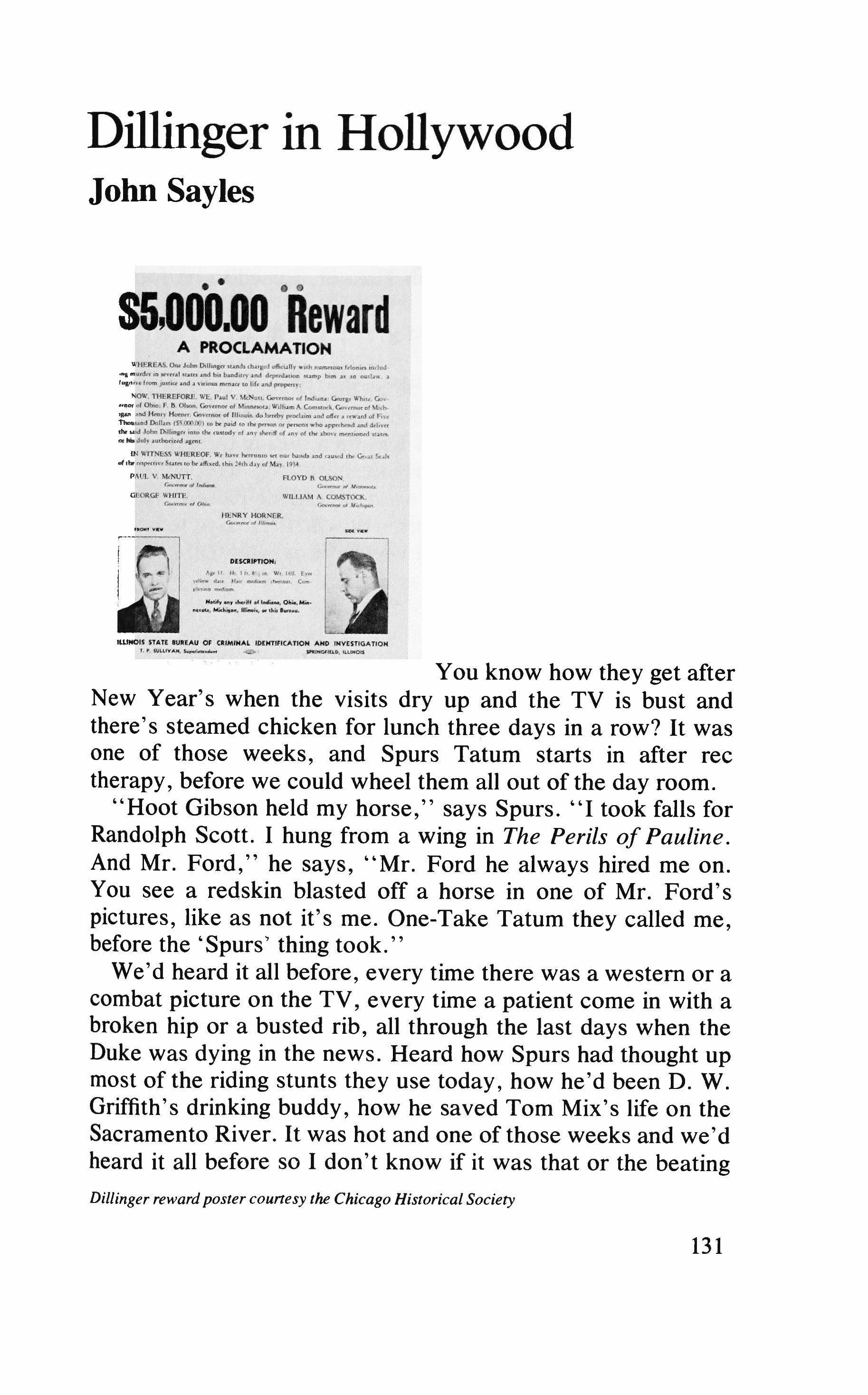
J3U'VtdHnt.yH<cu"a.,''<1' oflU<a<>is.doht,.l>rprocl>,nl.A<lo(f".,,''''><tI<>(I'; �ndo.;,tI.nJSl{O'lJ'(jll"hrp>iD'"'b<p'''''''''O'f''',_, hI>.PP'"<�iII<.I.iol;V''' rtv klJobm[hIf,I!1I."q<o.b.<D."odv"'."'."",,flO{� ,oItht,""",_ l'(..,..t.ll ..,_N.Jl'lv !>onud '. IN WI'TN[oS:>; 'Hbf<EOF ', "",,< ht..-,,""" 00/ N",t.. alld ."u....t 1h< G!-.<" 5<.>.1. -Ilbr r."""'ov�liuo ,,) I)ot�tf."..t.'m �.,h "by!J( M.y.19)..1 P,\\,,'l. 'I, M<I'IUrr, <:., �"'/..J_ FU)vtl f\ g::.."':.,"l", N_. WU.UAM A COMSTQC:I\.. (_· M � G!.'.OR(;Jl wnrra, c.... _",()Joo
1UJM01S SlAJ£ IUIII'''U Of U:IMtH.AL ID[.HTtFICATlOH "ND JHV[SnGAT!Ofo!
You know how they get after New Year's when the visits dry up and the TV is bust and there's steamed chicken for lunch three days in a row? It was one of those weeks, and Spurs Tatum starts in after rec therapy, before we could wheel them all out of the day room.
"Hoot Gibson held my horse," says Spurs. "I took falls for Randolph Scott. 1 hung from a wing in The Perils of Pauline. And Mr. Ford," he says, "Mr. Ford he always hired me on. You see a redskin blasted off a horse in one of Mr. Ford's pictures, like as not it's me. One-Take Tatum they called me, before the 'Spurs' thing took. "
We'd heard it all before, every time there was a western or a combat picture on the TV, every time a patient come in with a broken hip or a busted rib, all through the last days when the Duke was dying in the news. Heard how Spurs had thought up most of the riding stunts they use today, how he'd been D. W. Griffith's drinking buddy, how he saved Tom Mix's life on the Sacramento River. It was hot and one of those weeks and we'd heard it all before so 1 don't know if it was that or the beating Dillinger rewardposter courtesy the Chicago Historical Society
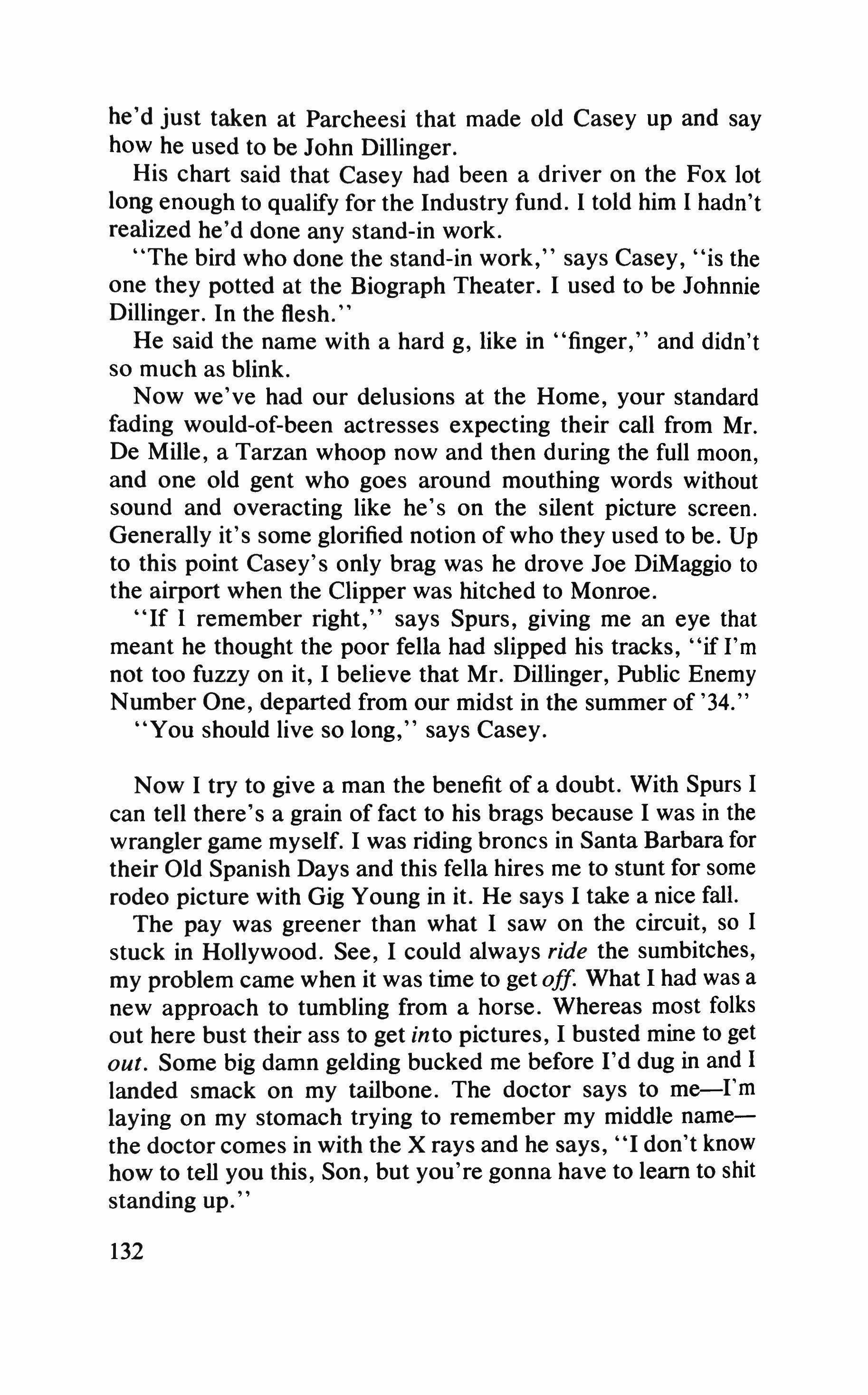
he'd just taken at Parcheesi that made old Casey up and say how he used to be John Dillinger.
His chart said that Casey had been a driver on the Fox lot long enough to qualify for the Industry fund. I told him I hadn't realized he'd done any stand-in work.
"The bird who done the stand-in work," says Casey, "is the one they potted at the Biograph Theater. I used to be Johnnie Dillinger. In the flesh.
He said the name with a hard g, like in "finger," and didn't so much as blink.
Now we've had our delusions at the Home, your standard fading would-of-been actresses expecting their call from Mr. De Mille, a Tarzan whoop now and then during the full moon, and one old gent who goes around mouthing words without sound and overacting like he's on the silent picture screen. Generally it's some glorified notion of who they used to be. Up to this point Casey's only brag was he drove Joe DiMaggio to the airport when the Clipper was hitched to Monroe.
"If I remember right," says Spurs, giving me an eye that meant he thought the poor fella had slipped his tracks, "if I'm not too fuzzy on it, I believe that Mr. Dillinger, Public Enemy Number One, departed from our midst in the summer of '34."
"You should live so long," says Casey.
Now I try to give a man the benefit of a doubt. With Spurs I can tell there's a grain of fact to his brags because I was in the wrangler game myself. I was riding broncs in Santa Barbara for their Old Spanish Days and this fella hires me to stunt for some rodeo picture with Gig Young in it. He says I take a nice fall.
The pay was greener than what I saw on the circuit, so I stuck in Hollywood. See, I could always ride the sumbitches, my problem came when it was time to get of! What I had was a new approach to tumbling from a horse. Whereas most folks out here bust their ass to get into pictures, I busted mine to get out. Some big damn gelding bucked me before I'd dug in and I landed smack on my tailbone. The doctor says to me-I'm laying on my stomach trying to remember my middle namethe doctor comes in with the X rays and he says, "I don't know how to tell you this, Son, but you're gonna have to learn to shit standing up."
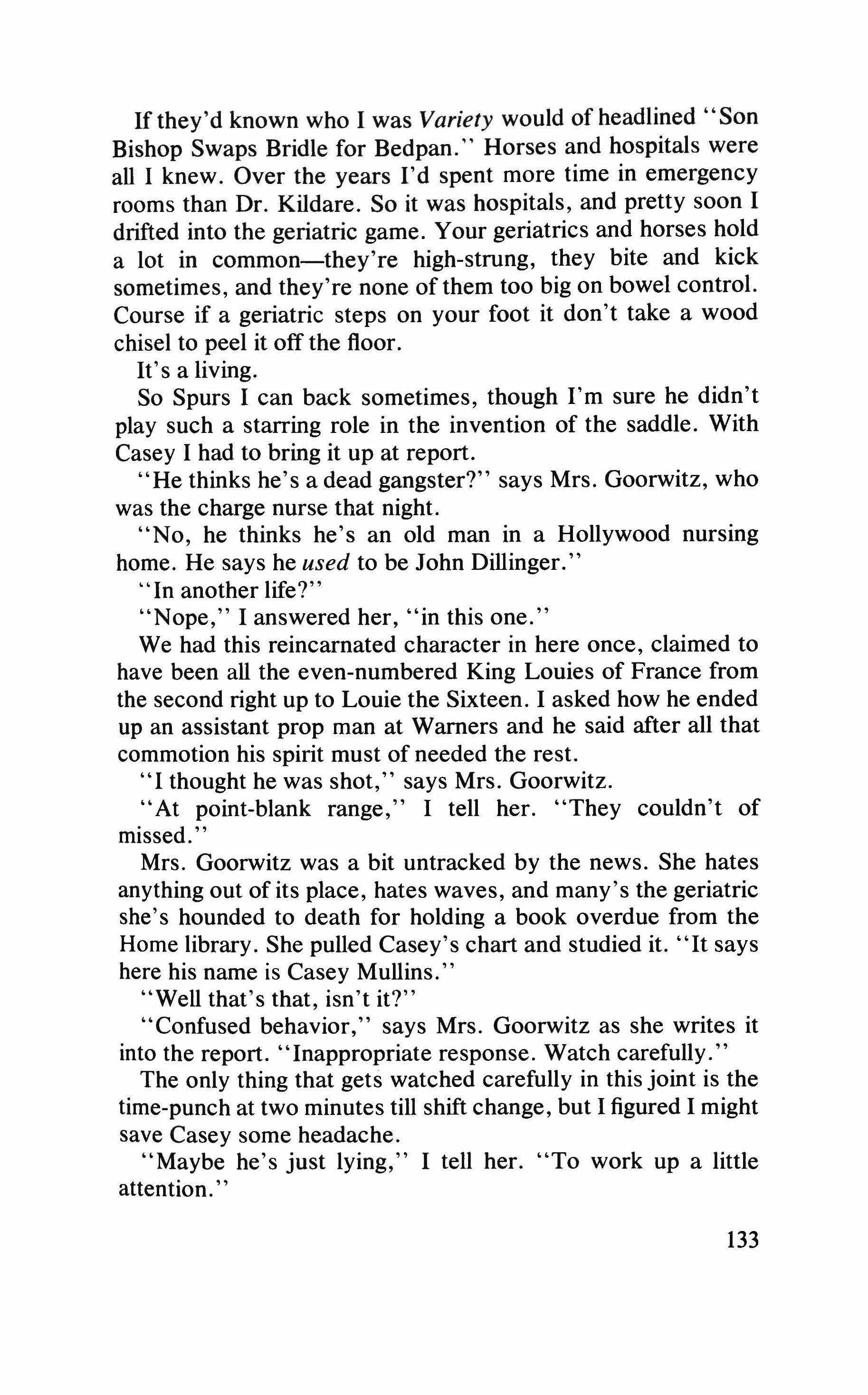
If they'd known who I was Variety would of headlined "Son Bishop Swaps Bridle for Bedpan." Horses and hospitals were all I knew. Over the years I'd spent more time in emergency rooms than Dr. Kildare. So it was hospitals, and pretty soon I drifted into the geriatric game. Your geriatrics and horses hold a lot in common-they're high-strung, they bite and kick sometimes, and they're none of them too big on bowel control. Course if a geriatric steps on your foot it don't take a wood chisel to peel it off the floor.
It's a living.
So Spurs I can back sometimes, though I'm sure he didn't play such a starring role in the invention of the saddle. With Casey I had to bring it up at report.
"He thinks he's a dead gangster?" says Mrs. Goorwitz, who was the charge nurse that night.
"No, he thinks he's an old man in a Hollywood nursing home. He says he used to be John Dillinger."
"In another life?"
"Nope," I answered her, "in this one."
We had this reincarnated character in here once, claimed to have been all the even-numbered King Louies of France from the second right up to Louie the Sixteen. I asked how he ended up an assistant prop man at Warners and he said after all that commotion his spirit must of needed the rest.
"I thought he was shot," says Mrs. Goorwitz.
"At point-blank range," I tell her. "They couldn't of missed. "
Mrs. Goorwitz was a bit untracked by the news. She hates anything out of its place, hates waves, and many's the geriatric she's hounded to death for holding a book overdue from the Home library. She pulled Casey's chart and studied it. "It says here his name is Casey Mullins."
"Well that's that, isn't it?"
"Confused behavior," says Mrs. Goorwitz as she writes it into the report. "Inappropriate response. Watch carefully. The only thing that gets watched carefully in this joint is the time-punch at two minutes till shift change, but I figured I might save Casey some headache.
"Maybe he's just lying," I tell her. "To work up a little attention.
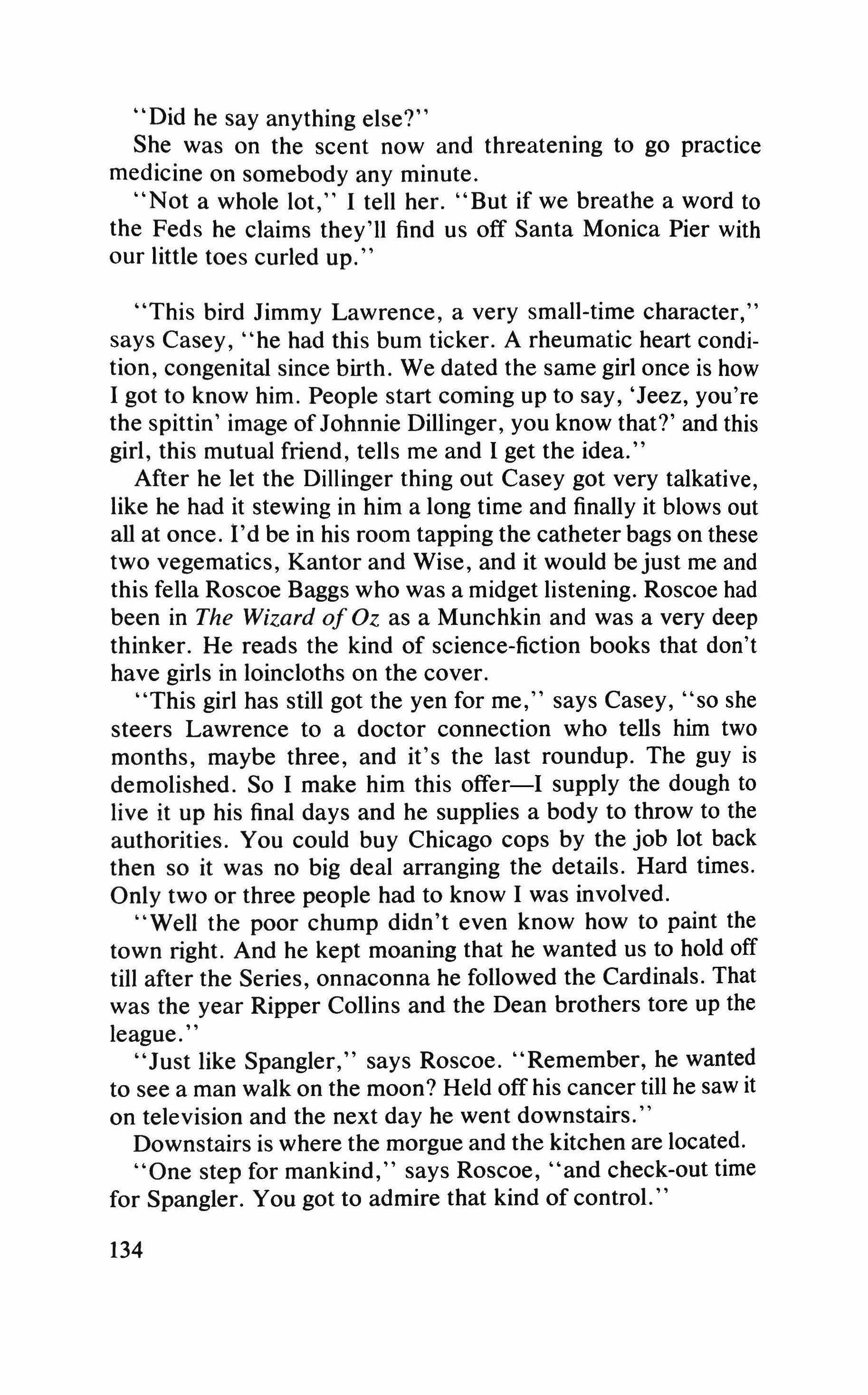
"Did he say anything else?"
She was on the scent now and threatening to go practice medicine on somebody any minute.
"Not a whole lot," I tell her. "But if we breathe a word to the Feds he claims they'll find us off Santa Monica Pier with our little toes curled up."
"This bird Jimmy Lawrence, a very small-time character," says Casey, "he had this bum ticker. A rheumatic heart condition, congenital since birth. We dated the same girl once is how I got to know him. People start coming up to say, 'Jeez, you're the spittin' image ofJohnnie Dillinger, you know that?' and this girl, this mutual friend, tells me and I get the idea."
After he let the Dillinger thing out Casey got very talkative, like he had it stewing in him a long time and finally it blows out all at once. I'd be in his room tapping the catheter bags on these two vegematics, Kantor and Wise, and it would be just me and this fella Roscoe Baggs who was a midget listening. Roscoe had been in The Wizard of OZ as a Munchkin and was a very deep thinker. He reads the kind of science-fiction books that don't have girls in loincloths on the cover.
"This girl has still got the yen for me," says Casey, "so she steers Lawrence to a doctor connection who tells him two months, maybe three, and it's the last roundup. The guy is demolished. So I make him this offer-I supply the dough to live it up his final days and he supplies a body to throw to the authorities. You could buy Chicago cops by the job lot back then so it was no big deal arranging the details. Hard times. Only two or three people had to know I was involved.
"Well the poor chump didn't even know how to paint the town right. And he kept moaning that he wanted us to hold off till after the Series, onnaconna he followed the Cardinals. That was the year Ripper Collins and the Dean brothers tore up the league."
"Just like Spangler," says Roscoe. "Remember, he wanted to see a man walk on the moon? Held off his cancer till he saw it on television and the next day he went downstairs. Downstairs is where the morgue and the kitchen are located.
"One step for mankind," says Roscoe, "and check-out time for Spangler. You got to admire that kind of control."
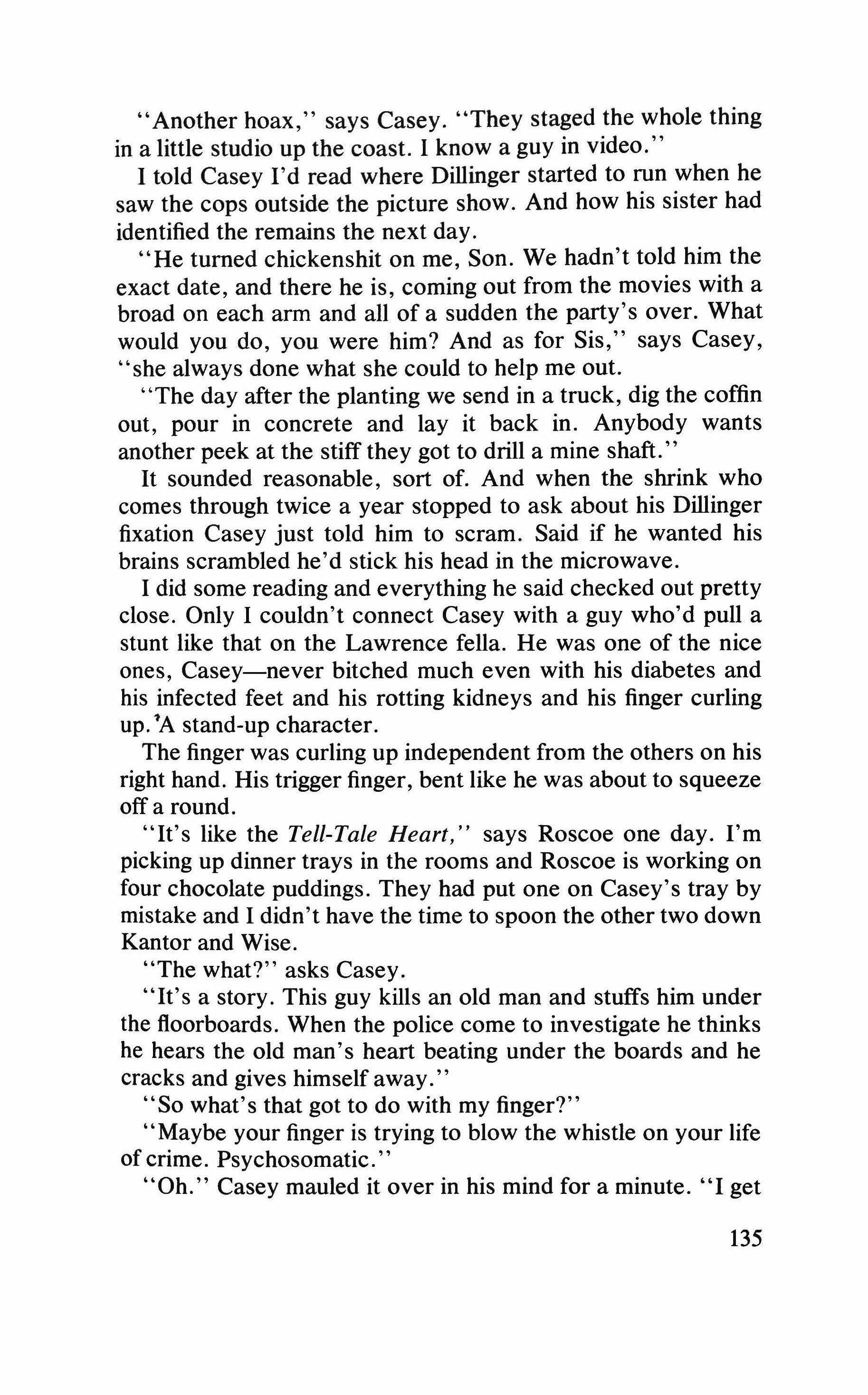
"Another hoax," says Casey. "They staged the whole thing in a little studio up the coast. I know a guy in video."
I told Casey I'd read where Dillinger started to run when he saw the cops outside the picture show. And how his sister had identified the remains the next day.
"He turned chickenshit on me, Son. We hadn't told him the exact date, and there he is, coming out from the movies with a broad on each arm and all of a sudden the party's over. What would you do, you were him? And as for Sis," says Casey, "she always done what she could to help me out.
"The day after the planting we send in a truck, dig the coffin out, pour in concrete and lay it back in. Anybody wants another peek at the stiff they got to drill a mine shaft."
It sounded reasonable, sort of. And when the shrink who comes through twice a year stopped to ask about his Dillinger fixation Casey just told him to scram. Said if he wanted his brains scrambled he'd stick his head in the microwave.
I did some reading and everything he said checked out pretty close. Only I couldn't connect Casey with a guy who'd pull a stunt like that on the Lawrence fella. He was one of the nice ones, Casey-never bitched much even with his diabetes and his infected feet and his rotting kidneys and his finger curling up.'A stand-up character.
The finger was curling up independent from the others on his right hand. His trigger finger, bent like he was about to squeeze off a round.
"It's like the Tell-Tale Heart," says Roscoe one day. I'm picking up dinner trays in the rooms and Roscoe is working on four chocolate puddings. They had put one on Casey's tray by mistake and I didn't have the time to spoon the other two down Kantor and Wise.
"The what?" asks Casey.
"It's a story. This guy kills an old man and stuffs him under the floorboards. When the police come to investigate he thinks he hears the old man's heart beating under the boards and he cracks and gives himself away."
"So what's that got to do with my finger?"
"Maybe your finger is trying to blow the whistle on your life of crime. Psychosomatic."
"Oh." Casey mauled it over in his mind for a minute. "I get
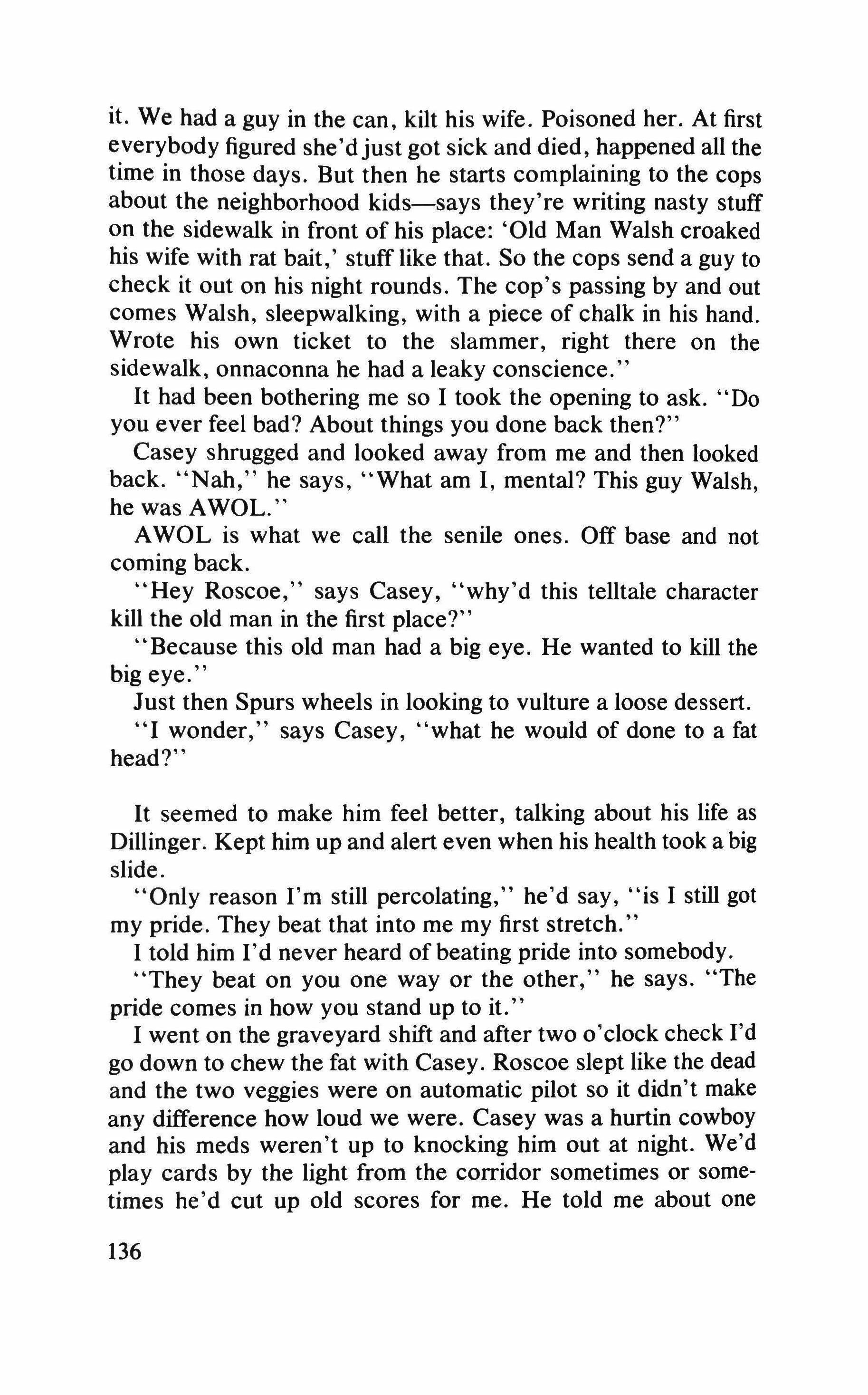
it. We had a guy in the can, kilt his wife. Poisoned her. At first everybody figured she'djust got sick and died, happened all the time in those days. But then he starts complaining to the cops about the neighborhood kids-says they're writing nasty stuff on the sidewalk in front of his place: 'Old Man Walsh croaked his wife with rat bait,' stuff like that. So the cops send a guy to check it out on his night rounds. The cop's passing by and out comes Walsh, sleepwalking, with a piece of chalk in his hand. Wrote his own ticket to the slammer, right there on the sidewalk, onnaconna he had a leaky conscience."
It had been bothering me so I took the opening to ask. "Do you ever feel bad? About things you done back then?"
Casey shrugged and looked away from me and then looked back. "Nab," he says, "What am I, mental? This guy Walsh, he was AWOL.
AWOL is what we call the senile ones. Off base and not coming back.
"Hey Roscoe," says Casey, "why'd this telltale character kill the old man in the first place?"
"Because this old man had a big eye. He wanted to kill the big eye."
Just then Spurs wheels in looking to vulture a loose dessert.
"I wonder," says Casey, "what he would of done to a fat head?"
It seemed to make him feel better, talking about his life as Dillinger. Kept him up and alert even when his health took a big slide.
"Only reason I'm still percolating," he'd say, "is I still got my pride. They beat that into me my first stretch."
I told him I'd never heard of beating pride into somebody.
"They beat on you one way or the other," he says. "The pride comes in how you stand up to it."
I went on the graveyard shift and after two o'clock check I'd go down to chew the fat with Casey. Roscoe slept like the dead and the two veggies were on automatic pilot so it didn't make any difference how loud we were. Casey was a hurtin cowboy and his meds weren't up to knocking him out at night. We'd play cards by the light from the corridor sometimes or sometimes he'd cut up old scores for me. He told me about one

where their advance man posed as a Hollywood location scout for a gangster movie. When they come out of the bank holding hostages the next day, sniping at the local shields, the townspeople just smiled and looked around for cameras.
He didn't have much to say on his years driving for Fox. He only hung on because of what he called the "fringe benefits," which mostly had to do with women.
"Used to be a disease with me," he'd say. "I'd go two days without a tumble and my eyeballs would start to swoll up, my brains would start pushing out my ears. Shut me out for three days and I'd hump anything, just anything. Like some dope fiend.
When I asked how he'd dealt with that while he was in the slammer he clammed up.
He was still able to wheel himself around a bit when Norma took up with him. Norma had bad veins and was in a chair herself. She'd been in the silents in her teens, getting rescued from fates worse than death. Her mother was ninety and shared a room with her. The old vulturejust sat, deaf as a post, glaring at Norma for not being Mary Pickford. Norma had been one of the backgammon crowd till word spread that Casey thought he was John Dillinger. She studied him for a week, keeping her distance, eavesdropping on his sparring matches with Spurs Tatum, watching how he moved and how he talked. Then one day as the singalong is breaking up she wheels up beside him. Norma's voice had gone deeper and deeper with the years and she filled in at bass on "What a Friend We Have in Jesus."
"All I do is dream of you," she sings to Casey, "the whole night through.
"That used to be my favorite song," he says.
"I know," says Norma.
It give me the fantods sometimes, the way they'd look at each other like they known one another forever. Norma had been one of those caught up by the press on Dillinger when he had his year in the headlines. A woman near thirty years old keeping a scrapbook. She had picked up some work as an extra after her silent days were over, but it never came to much. She still had a shoe box full of the postcards her mother had sent out every year to agents and flacks and producers-a grainy blowup of Norma in a toga or a buckskin shift or a French

peasant outfit. Norma Nader in Cimarron. Norma Nader in The Pride and the Passion. Norma Nader in The Greatest Story Ever Told. They were the only credits she got in the talkies, those postcards, but her mother kept the heat on. I'd find Norma out in the corridor at night, wheels locked, watching the light coming out from her room.
"Is she in bed yet?" she'd ask, and I'd go down and peek in on Old Lady Nader.
"She's still awake, Norma."
"She always stood up till I come home, no matter what hour. I come in the door and it's not 'Where you been?' or 'Who'd you see?' but'Any work today?' She had spies at all the studios so I could never lie about making rounds. Once I had an offer for a secretary job, good pay, steady, and I had to tell them sorry, I got to be an actress. "
Casey had his Dillinger routine down pretty well, but with Norma along he was unstoppable.
"Johnnie," she'd say, "you member that time in St. Paul they caught you in the alleyway?" or"Johnnie, remember how Nelson and Van Meter were always at each other's throats?" -1ust like she'd been there. And Casey he'd nod and say he remembered or correct some little detail, reminding her like any old couple sharing memories.
I'd come on at eleven and they'd be in the day room with only the TV for light, Casey squirming in his chair, hurting, and Norma waiting for her mother to go to sleep, holding Casey's hand against the pain. We had another old pair like them, a couple old bachelors were crazy for chess. One game could take them two, three days. Personally I'd rather watch paint dry.
Usually some time around one o'clock Norma would call and we'd wheel them back to their rooms. I'd park Casey by the window so he could watch the traffic on Cahuenga.
By the time I got back on day shift Casey needed a push when he wanted to get anywhere. He could still feed himself and hit the pee-jug nine times out of ten, though we were checking his output to see what was left of his kidneys. This one morning we had square egg for breakfast, which is the powdered variety cooked up in cake pans and cut in little bars like brownies. If they don't get the coloring just right they'll come up greenish and they wiggle on your fork just like jello.

Even the blind patients won't touch them. Usually our only taker is this character Mao, who we call after his resemblance to the late Chinese head Red. Mao is a mongoloid in his mid-thirties whose favorite dishes are square egg and thermometers. Already that morning a new candy striper had given him an oral instead of a rectal and he'd chomped it clear in half. Now she was fluttering around looking for Mr. Hellman's other slipper.
"I looked in his stand and under his bed," she says to me, "and all I could find is the right one."
"He doesn't have a left one," I tell her.
"Why not?"
"He doesn't have a left leg."
"Oh." The candy stripers are good for morale but they take a lot of looking after.
"Next time peek under the covers first."
"Well I started to," she says, "but he was flipping his-you know-his thing at me.
"Don't you worry, honey," says Spurs Tatum. "Worst comes to worst I'd lay odds you could outrun the old goat.
"When they give us this shit in the state pen," says Casey so's everybody in the day room could hear him, "we'd plaster the walls with it.
The candy striper waggles her finger at him. "If you don't care for your breakfast, Mr. Mullins, I'm sure somebody else would appreciate it.
"No dice," says Casey. "I want to see it put down the trash barrel where it can't do no harm. And the name's Dillinger."
''I'm sure you don't mind if somebody shares what you don't want. I mean what are we here for?" Lately we've been getting candy stripers with a more Christian outlook.
"What we're here for," says Casey, "is to die. To die. And some of us, " he says looking to Spurs, "aren't doing much of a job of it."
Casey was on the rag that morning, with a bad case of the runs his new meds give him and a wobbling pile of square egg staring up at him. So when the candy striper reaches to give his portion over to Mao, Casey pushes his tray over onto the floor.
"You birds keep swallowin this shit," he calls out to the others, "they'll keep sending it up."
Mao was well known for his oatmeal tossing. You'd get two
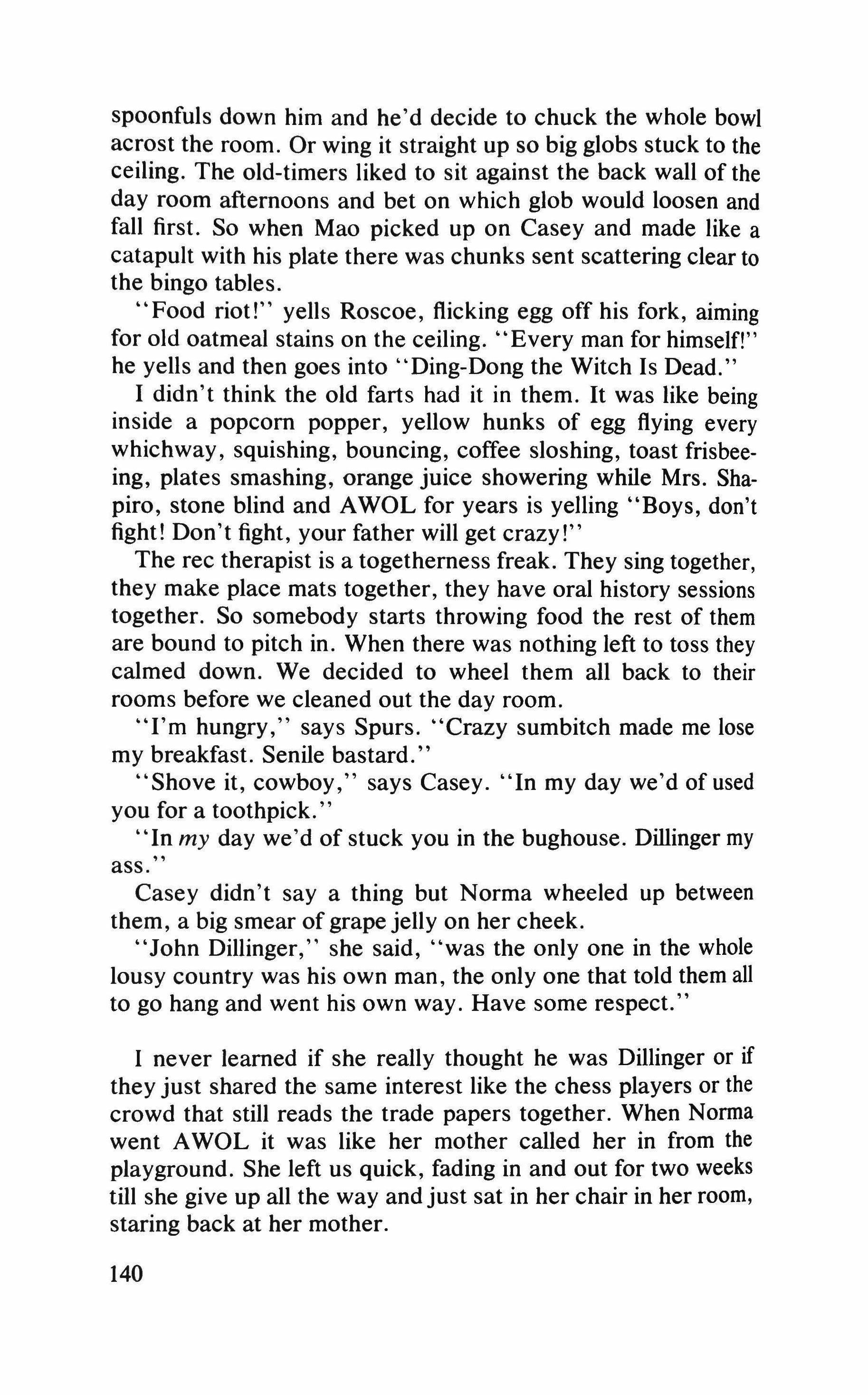
spoonfuls down him and he'd decide to chuck the whole bowl acrost the room. Or wing it straight up so big globs stuck to the ceiling. The old-timers liked to sit against the back wall of the day room afternoons and bet on which glob would loosen and fall first. So when Mao picked up on Casey and made like a catapult with his plate there was chunks sent scattering clear to the bingo tables.
"Food riot!" yells Roscoe, flicking egg off his fork, aiming for old oatmeal stains on the ceiling. "Every man for himself!" he yells and then goes into "Ding-Dong the Witch Is Dead."
I didn't think the old farts had it in them. It was like being inside a popcorn popper, yellow hunks of egg flying every whichway, squishing, bouncing, coffee sloshing, toast frisbeeing, plates smashing, orange juice showering while Mrs. Shapiro, stone blind and AWOL for years is yelling "Boys, don't fight! Don't fight, your father will get crazy!"
The rec therapist is a togetherness freak. They sing together, they make place mats together, they have oral history sessions together. So somebody starts throwing food the rest of them are bound to pitch in. When there was nothing left to toss they calmed down. We decided to wheel them all back to their rooms before we cleaned out the day room.
"I'm hungry," says Spurs. "Crazy sumbitch made me lose my breakfast. Senile bastard."
"Shove it, cowboy," says Casey. "In my day we'd of used you for a toothpick."
"In my day we'd of stuck you in the bughouse. Dillinger my ass."
Casey didn't say a thing but Norma wheeled up between them, a big smear of grape jelly on her cheek.
"John Dillinger," she said, "was the only one in the whole lousy country was his own man, the only one that told them all to go hang and went his own way. Have some respect."
I never learned if she really thought he was Dillinger or if they just shared the same interest like the chess players or the crowd that still reads the trade papers together. When Norma went AWOL it was like her mother called her in from the playground. She left us quick, fading in and out for two weeks till she give up all the way and just sat in her chair in her room, staring back at her mother.

"I'm sorry," she'd say from time to time. No word on why or what for,just stare at Old Lady Nader and say, "J'rn sorry.
Casey tried to pull her out of it at first. But it's like when we have a cardiac arrest and we pull the curtain around the bed--even if you're right in the room you can't see through to know what's happening.
"You remember me?" he'd say. "You remember about Johnnie Dillinger?"
Usually she'd just look at him blank. One time she said, "I seen a movie about him once.
For a while Casey would have us wheel him into Norma's room and he'd talk at her some but she didn't know who he was. Finally it made him so low he stopped visiting. Acted like she'd gone downstairs.
"You lose your mind," he'd say, "the rest of you ain't worth spit."
Mrs. Goorwitz got on his case then and tried to locate relatives. None to be found. What with the way people move around out here that's not so unusual. Casey's chart was nothing but a medical record starting in 1937. Next Mrs. Goorwitz loosed the social worker on him, Friendly Phil, who ought to be selling health food or real estate somewhere. Casey wasn't buying any.
"So what if I am crazy?" he'd say to Phil. "Delusional, schizo, whatever you wanna call it. I can't do squat one way or the other. What difference does it make if I was Dillinger or Norma was Pearl White or Roscoe was the King of Poland? You're all just a bag a bones in the end. "
He went into a funk, Casey, after Norma faded-went into a silence that lasted a good month. Not even Spurs could get his goat enough to argue. He spent a good part of the day trying to keep himself clean.
"I'm on the cycle," he whispered to me one day. "I'm riding the down side."
The geriatric racket is a collection of cycles. Linen goes on beds, gets dirtied, down the chute, washed, dried and back onto the beds. Patients are checked in downstairs, up to the beds, maintained a while and then down to the slabs with them. Casey even found a new cycle, a thing in the paper about scientists who had learned how to make cow flops back into cow food.
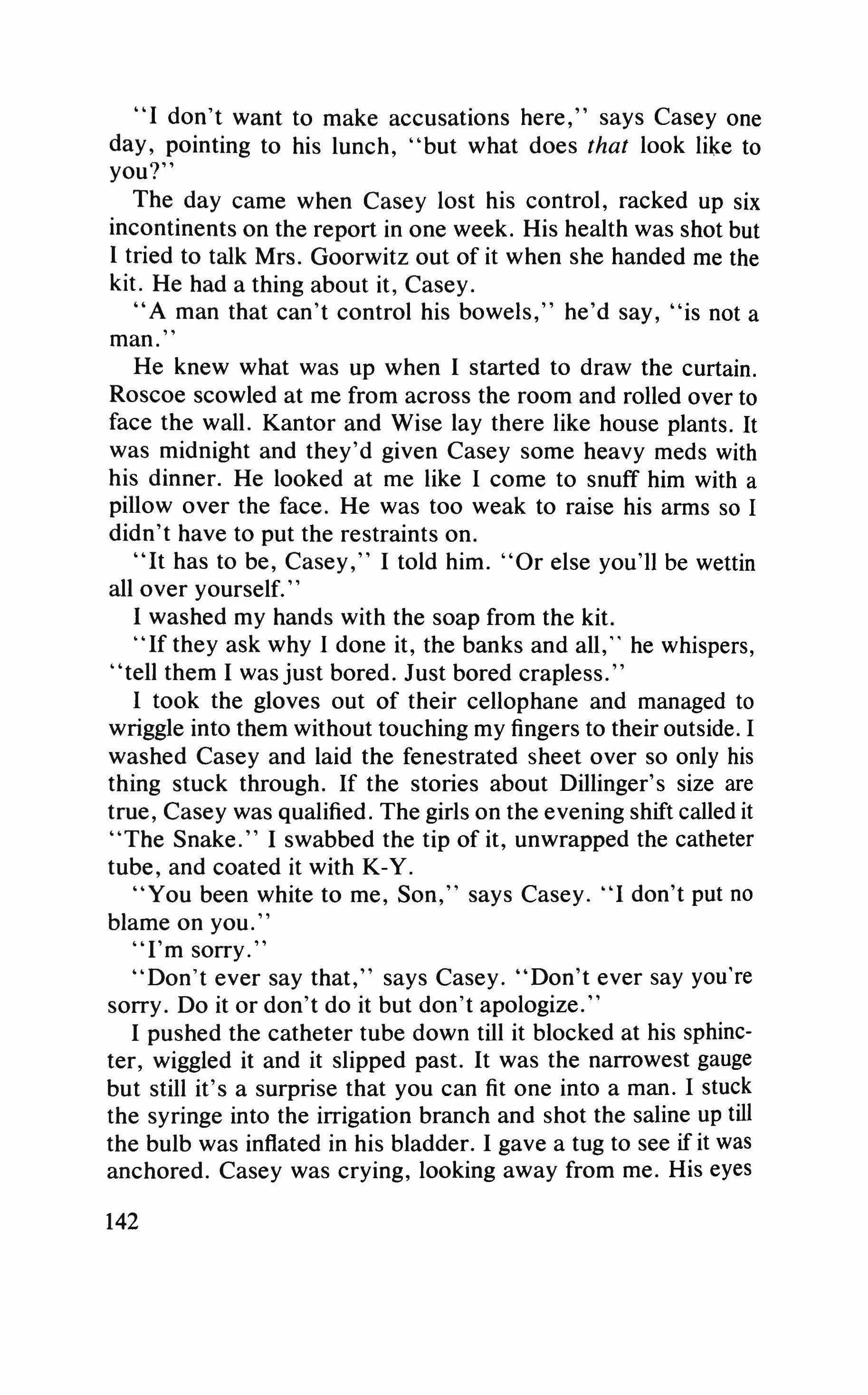
"I don't want to make accusations here," says Casey one day, pointing to his lunch, "but what does that look like to you?"
The day came when Casey lost his control, racked up six incontinents on the report in one week. His health was shot but I tried to talk Mrs. Goorwitz out of it when she handed me the kit. He had a thing about it, Casey.
"A man that can't control his bowels," he'd say, "is not a man."
He knew what was up when I started to draw the curtain. Roscoe scowled at me from across the room and rolled over to face the wall. Kantor and Wise lay there like house plants. It was midnight and they'd given Casey some heavy meds with his dinner. He looked at me like I come to snuff him with a pillow over the face. He was too weak to raise his arms so I didn't have to put the restraints on.
"It has to be, Casey," I told him. "Or else you'll be wettin allover yourself.
I washed my hands with the soap from the kit.
"If they ask why I done it, the banks and all, he whispers, "tell them I was just bored. Just bored crapless."
I took the gloves out of their cellophane and managed to wriggle into them without touching my fingers to their outside. I washed Casey and laid the fenestrated sheet over so only his thing stuck through. If the stories about Dillinger's size are true, Casey was qualified. The girls on the evening shift called it "The Snake." I swabbed the tip of it, unwrapped the catheter tube, and coated it with K - Y.
"You been white to me, Son," says Casey. "I don't put no blame on you."
"I'm sorry."
"Don't ever say that," says Casey. "Don't ever say you're sorry. Do it or don't do it but don't apologize."
I pushed the catheter tube down till it blocked at his sphincter, wiggled it and it slipped past. It was the narrowest gauge but still it's a surprise that you can fit one into a man. I stuck the syringe into the irrigation branch and shot the saline up till the bulb was inflated in his bladder. I gave a tug to see if it was anchored. Casey was crying, looking away from me. His eyes
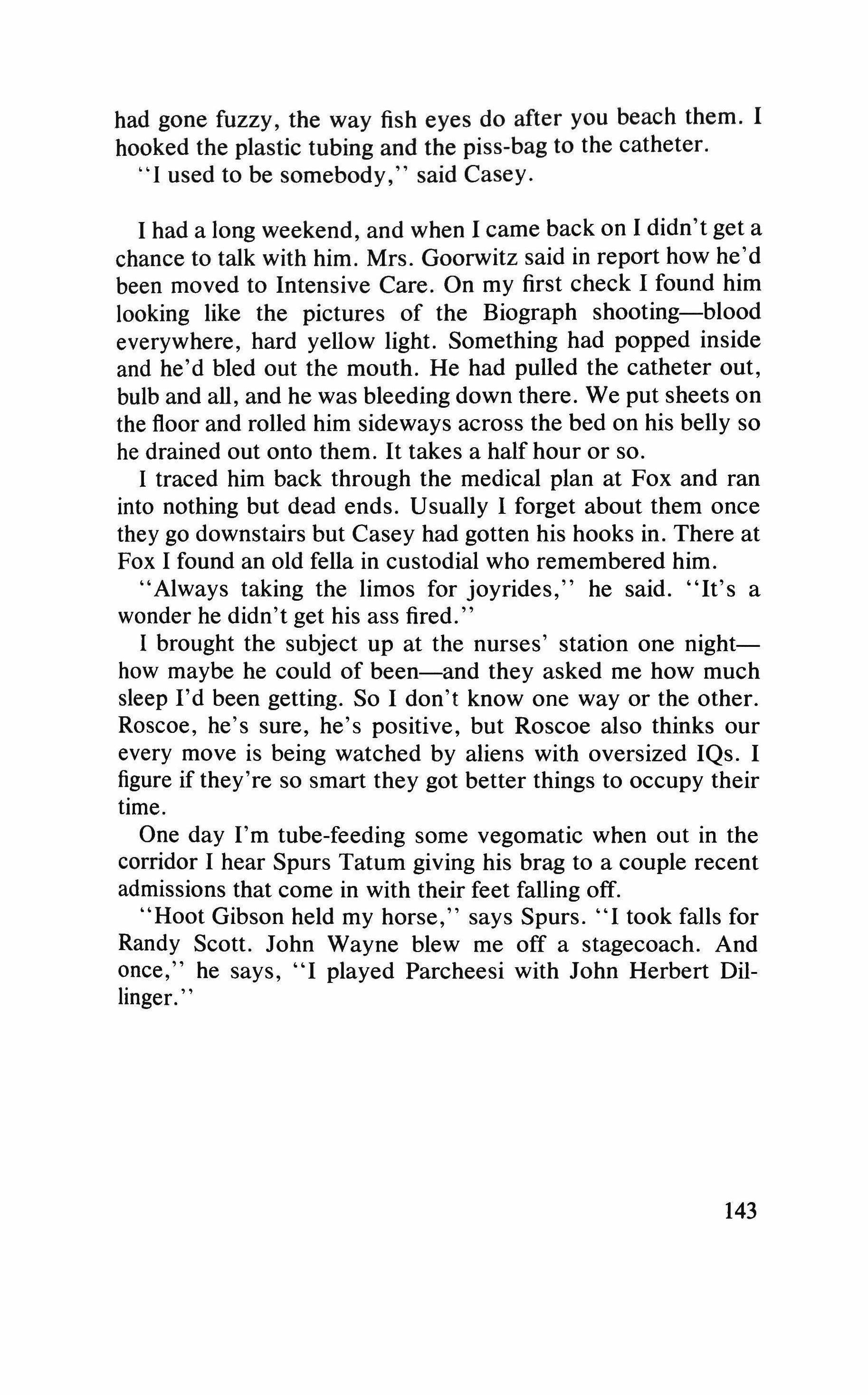
had gone fuzzy, the way fish eyes do after you beach them. I hooked the plastic tubing and the piss-bag to the catheter.
"I used to be somebody," said Casey.
I had a long weekend, and when I came back on I didn't get a chance to talk with him. Mrs. Goorwitz said in report how he'd been moved to Intensive Care. On my first check I found him looking like the pictures of the Biograph shooting-blood everywhere, hard yellow light. Something had popped inside and he'd bled out the mouth. He had pulled the catheter out, bulb and all, and he was bleeding down there. We put sheets on the floor and rolled him sideways across the bed on his belly so he drained out onto them. It takes a half hour or so.
I traced him back through the medical plan at Fox and ran into nothing but dead ends. Usually I forget about them once they go downstairs but Casey had gotten his hooks in. There at Fox I found an old fella in custodial who remembered him.
"Always taking the limos for joyrides," he said. "It's a wonder he didn't get his ass fired."
I brought the subject up at the nurses' station one nighthow maybe he could of been-and they asked me how much sleep I'd been getting. So I don't know one way or the other. Roscoe, he's sure, he's positive, but Roscoe also thinks our every move is being watched by aliens with oversized IQs. I figure if they're so smart they got better things to occupy their time.
One day I'm tube-feeding some vegomatic when out in the corridor I hear Spurs Tatum giving his brag to a couple recent admissions that come in with their feet falling off.
"Hoot Gibson held my horse," says Spurs. "I took falls for Randy Scott. John Wayne blew me off a stagecoach. And once," he says, "I played Parcheesi with John Herbert Dillinger.
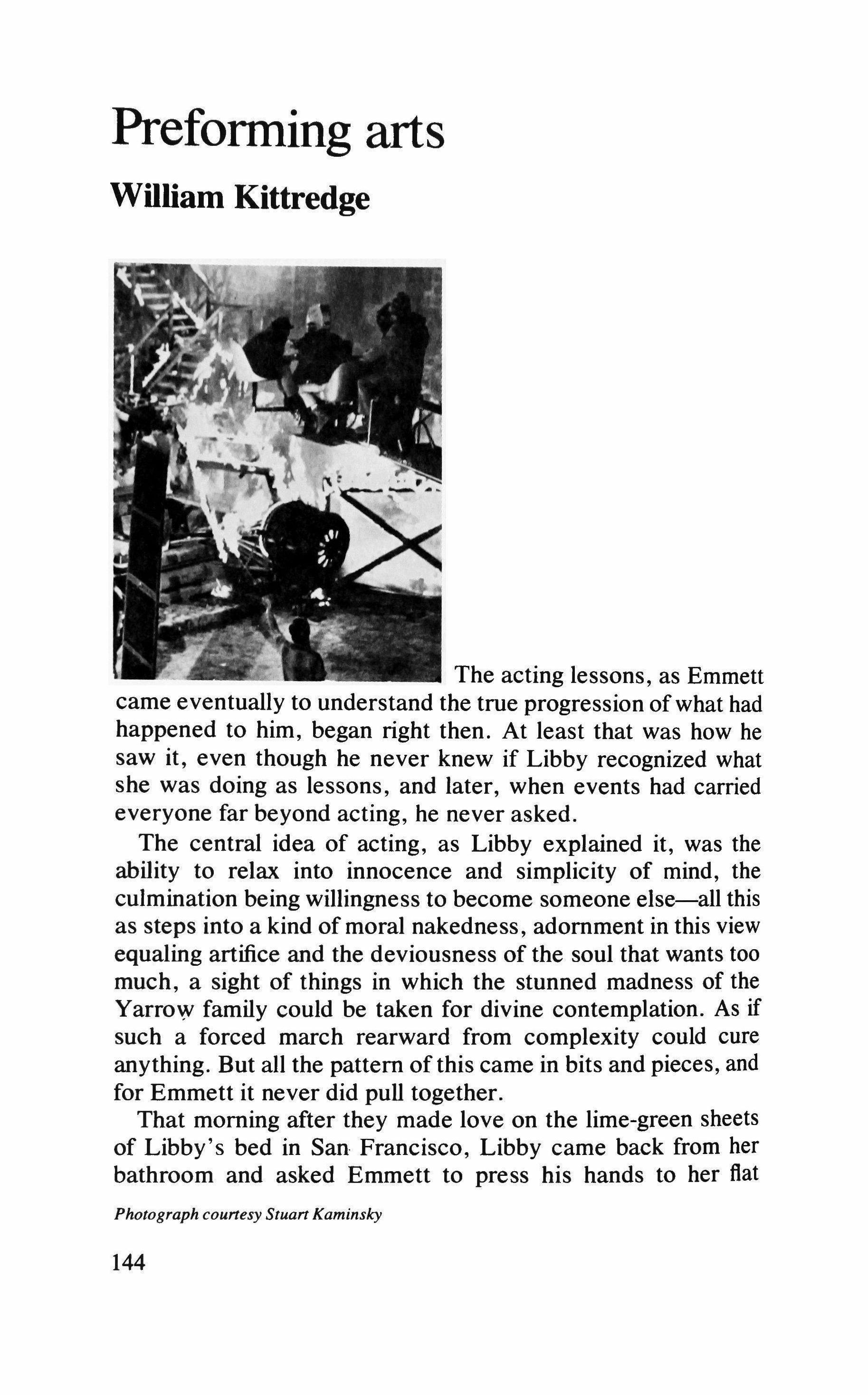
The acting lessons, as Emmett came eventually to understand the true progression ofwhat had happened to him, began right then. At least that was how he saw it, even though he never knew if Libby recognized what she was doing as lessons, and later, when events had carried everyone far beyond acting, he never asked.
The central idea of acting, as Libby explained it, was the ability to relax into innocence and simplicity of mind, the culmination being willingness to become someone else-all this as steps into a kind of moral nakedness, adornment in this view equaling artifice and the deviousness of the soul that wants too much, a sight of things in which the stunned madness of the Yarrow family could be taken for divine contemplation. As if such a forced march rearward from complexity could cure anything. But all the pattern of this came in bits and pieces, and for Emmett it never did pull together.
That morning after they made love on the lime-green sheets of Libby's bed in San Francisco, Libby came back from her bathroom and asked Emmett to press his hands to her flat
Photograph courtesy Stuart Kaminsky
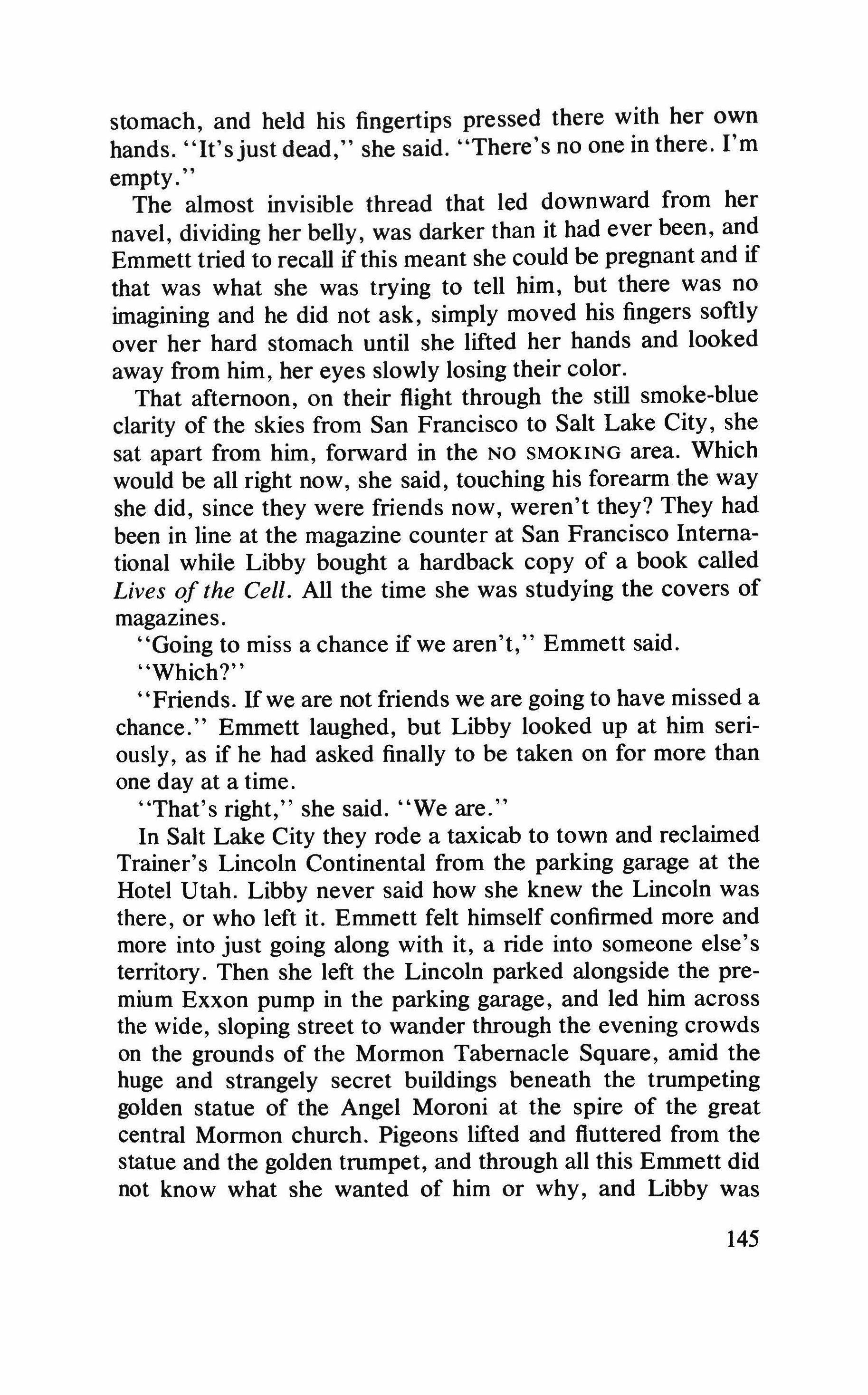
stomach, and held his fingertips pressed there with her own hands. "It's just dead," she said. "There's no one in there. I'm empty.
The almost invisible thread that led downward from her navel, dividing her belly, was darker than it had ever been, and Emmett tried to recall if this meant she could be pregnant and if that was what she was trying to tell him, but there was no imagining and he did not ask, simply moved his fingers softly over her hard stomach until she lifted her hands and looked away from him, her eyes slowly losing their color.
That afternoon, on their flight through the still smoke-blue clarity of the skies from San Francisco to Salt Lake City, she sat apart from him, forward in the NO SMOKING area. Which would be all right now, she said, touching his forearm the way she did, since they were friends now, weren't they? They had been in line at the magazine counter at San Francisco International while Libby bought a hardback copy of a book called Lives of the Cell. All the time she was studying the covers of magazines.
"Going to miss a chance if we aren't," Emmett said.
"Which?"
"Friends. If we are not friends we are going to have missed a chance." Emmett laughed, but Libby looked up at him seriously, as if he had asked finally to be taken on for more than one day at a time.
"That's right," she said. "We are."
In Salt Lake City they rode a taxicab to town and reclaimed Trainer's Lincoln Continental from the parking garage at the Hotel Utah. Libby never said how she knew the Lincoln was there, or who left it. Emmett felt himself confirmed more and more into just going along with it, a ride into someone else's territory. Then she left the Lincoln parked alongside the premium Exxon pump in the parking garage, and led him across the wide, sloping street to wander through the evening crowds on the grounds of the Mormon Tabernacle Square, amid the huge and strangely secret buildings beneath the trumpeting golden statue of the Angel Moroni at the spire of the great central Mormon church. Pigeons lifted and fluttered from the statue and the golden trumpet, and through all this Emmett did not know what she wanted of him or why, and Libby was
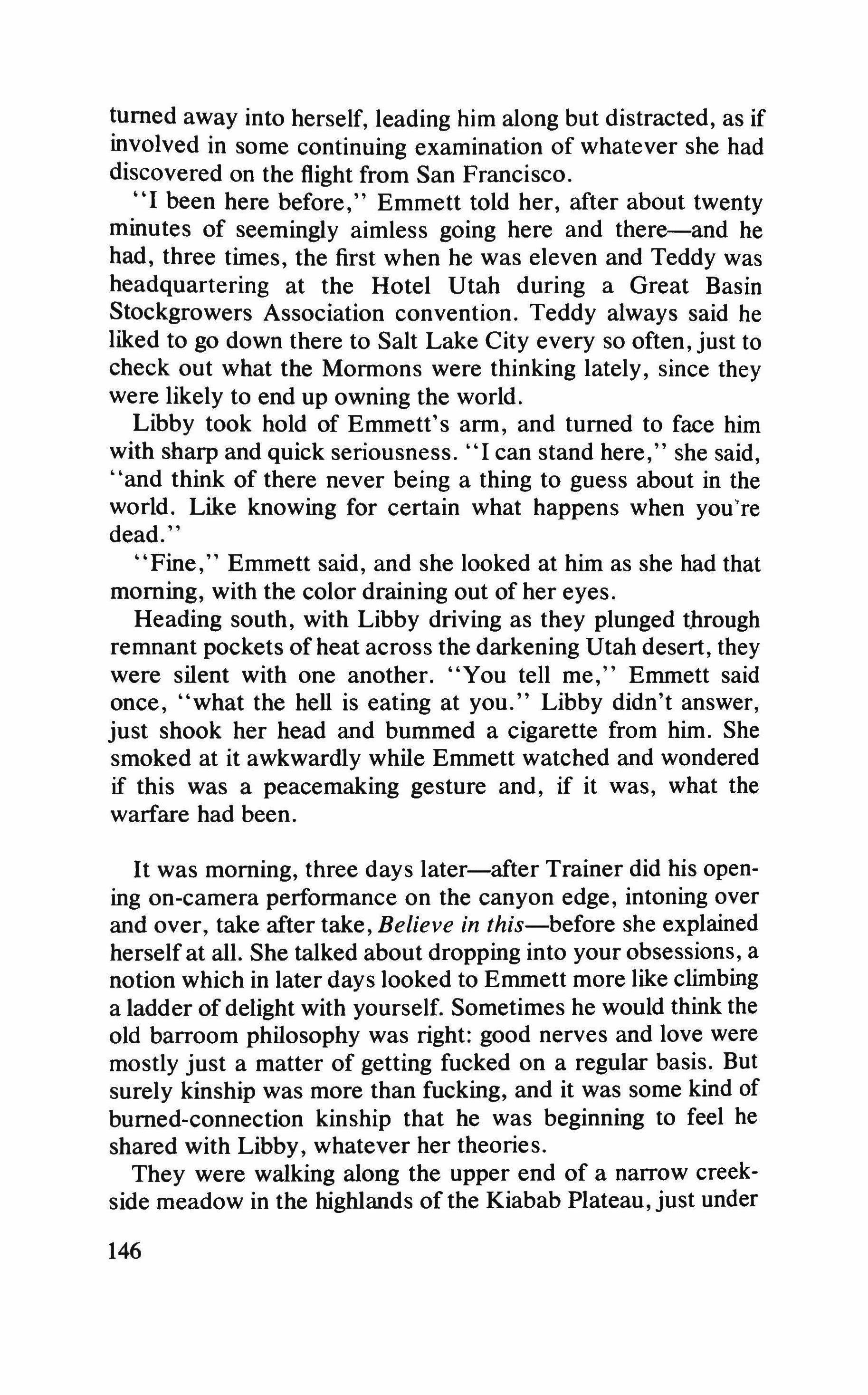
turned away into herself, leading him along but distracted, as if involved in some continuing examination of whatever she had discovered on the flight from San Francisco.
"I been here before," Emmett told her, after about twenty minutes of seemingly aimless going here and there-and he had, three times, the first when he was eleven and Teddy was headquartering at the Hotel Utah during a Great Basin Stockgrowers Association convention. Teddy always said he liked to go down there to Salt Lake City every so often, just to check out what the Mormons were thinking lately, since they were likely to end up owning the world.
Libby took hold of Emmett's arm, and turned to face him with sharp and quick seriousness. "I can stand here," she said, "and think of there never being a thing to guess about in the world. Like knowing for certain what happens when you're dead.
"Fine," Emmett said, and she looked at him as she had that morning, with the color draining out of her eyes.
Heading south, with Libby driving as they plunged through remnant pockets of heat across the darkening Utah desert, they were silent with one another. "You tell me," Emmett said once, "what the hell is eating at you." Libby didn't answer, just shook her head and bummed a cigarette from him. She smoked at it awkwardly while Emmett watched and wondered if this was a peacemaking gesture and, if it was, what the warfare had been.
It was morning, three days later-after Trainer did his opening on-camera performance on the canyon edge, intoning over and over, take after take, Believe in this-before she explained herself at all. She talked about dropping into your obsessions, a notion which in later days looked to Emmett more like climbing a ladder of delight with yourself. Sometimes he would think the old barroom philosophy was right: good nerves and love were mostly just a matter of getting fucked on a regular basis. But surely kinship was more than fucking, and it was some kind of burned-connection kinship that he was beginning to feel he shared with Libby, whatever her theories.
They were walking along the upper end of a narrow creekside meadow in the highlands of the Kiabab Plateau, just under
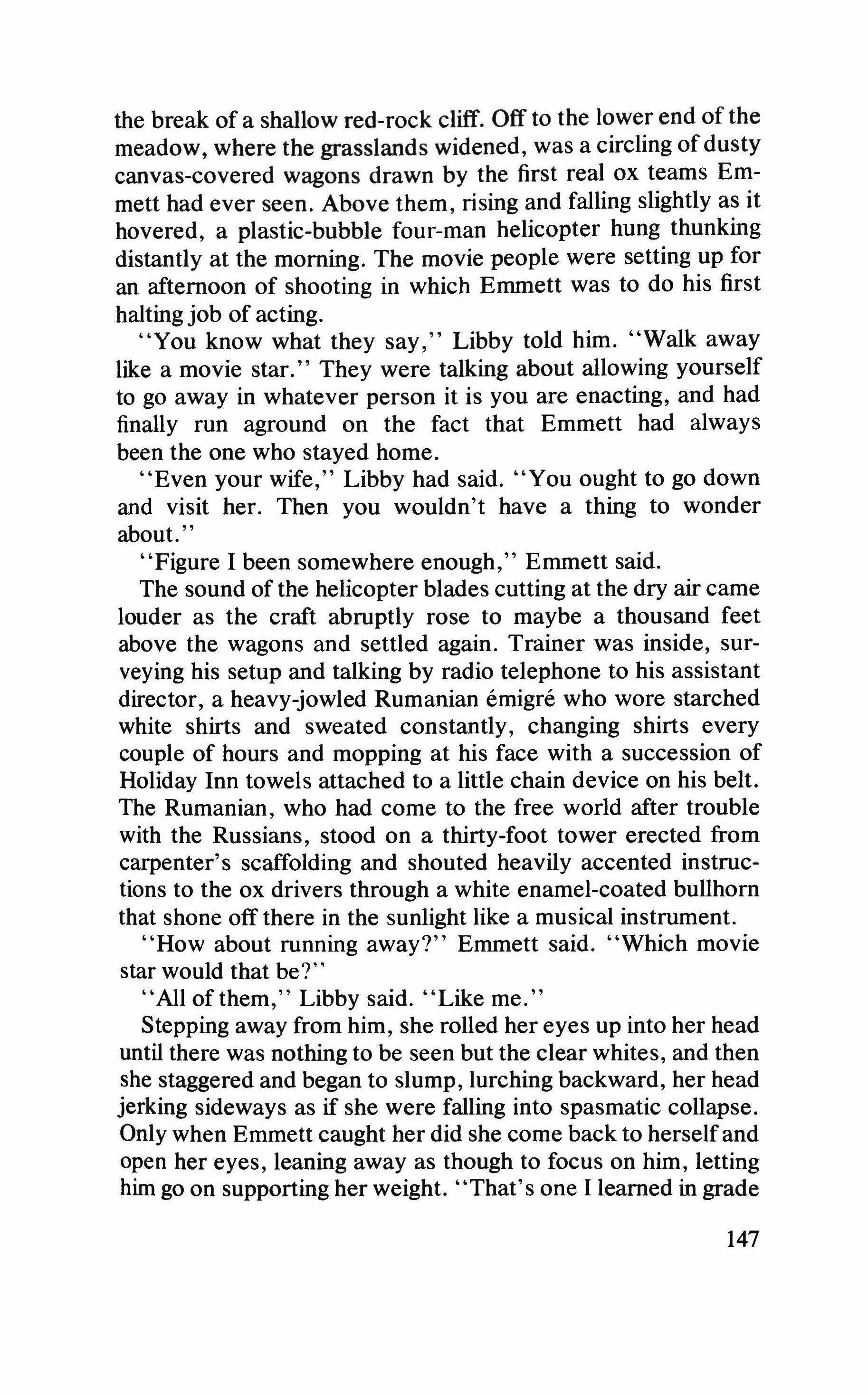
the break of a shallow red-rock cliff. Off to the lower end of the meadow, where the grasslands widened, was a circling of dusty canvas-covered wagons drawn by the first real ox teams Emmett had ever seen. Above them, rising and falling slightly as it hovered, a plastic-bubble four-man helicopter hung thunking distantly at the morning. The movie people were setting up for an afternoon of shooting in which Emmett was to do his first halting job of acting.
"You know what they say," Libby told him. "Walk away like a movie star." They were talking about allowing yourself to go away in whatever person it is you are enacting, and had finally run aground on the fact that Emmett had always been the one who stayed home.
"Even your wife," Libby had said. "You ought to go down and visit her. Then you wouldn't have a thing to wonder about."
"Figure I been somewhere enough," Emmett said.
The sound of the helicopter blades cutting at the dry air came louder as the craft abruptly rose to maybe a thousand feet above the wagons and settled again. Trainer was inside, surveying his setup and talking by radio telephone to his assistant director, a heavy-jowled Rumanian emigre who wore starched white shirts and sweated constantly, changing shirts every couple of hours and mopping at his face with a succession of Holiday Inn towels attached to a little chain device on his belt. The Rumanian, who had come to the free world after trouble with the Russians, stood on a thirty-foot tower erected from carpenter's scaffolding and shouted heavily accented instructions to the ox drivers through a white enamel-coated bullhorn that shone off there in the sunlight like a musical instrument.
"How about running away?" Emmett said. "Which movie star would that be?"
"All of them," Libby said. "Like me."
Stepping away from him, she rolled her eyes up into her head until there was nothing to be seen but the clear whites, and then she staggered and began to slump, lurching backward, her head jerking sideways as if she were falling into spasmatic collapse. Only when Emmett caught her did she come back to herself and open her eyes, leaning away as though to focus on him, letting him go on supporting her weight. "That's one I learned in grade
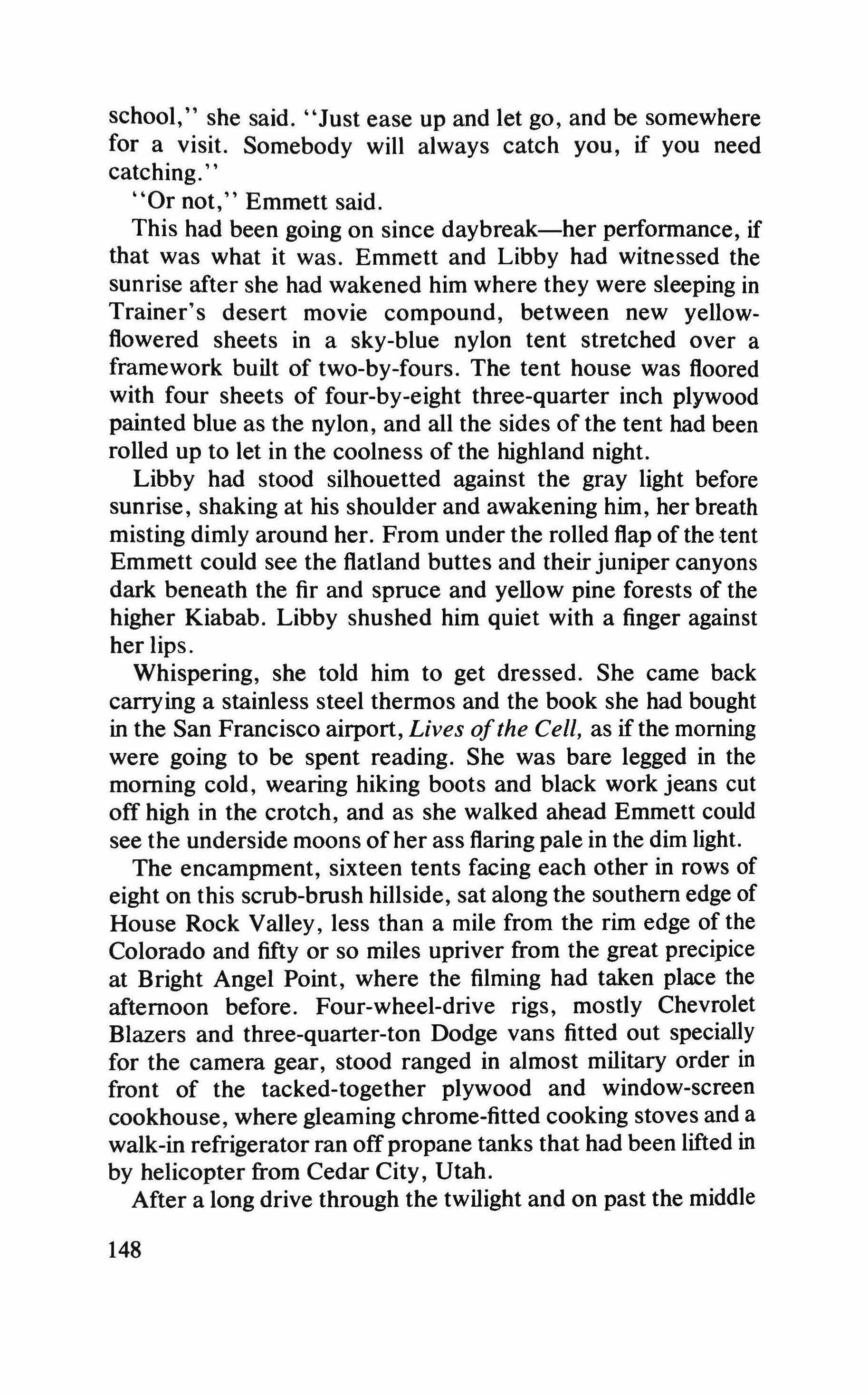
school," she said. "Just ease up and let go, and be somewhere for a visit. Somebody will always catch you, if you need catching.
"Or not," Emmett said.
This had been going on since daybreak-her performance, if that was what it was. Emmett and Libby had witnessed the sunrise after she had wakened him where they were sleeping in Trainer's desert movie compound, between new yellowflowered sheets in a sky-blue nylon tent stretched over a framework built of two-by-fours. The tent house was floored with four sheets of four-by-eight three-quarter inch plywood painted blue as the nylon, and all the sides of the tent had been rolled up to let in the coolness of the highland night.
Libby had stood silhouetted against the gray light before sunrise, shaking at his shoulder and awakening him, her breath misting dimly around her. From under the rolled flap of the tent Emmett could see the flatland buttes and their juniper canyons dark beneath the fir and spruce and yellow pine forests of the higher Kiabab. Libby shushed him quiet with a finger against her lips.
Whispering, she told him to get dressed. She came back carrying a stainless steel thermos and the book she had bought in the San Francisco airport, Lives ofthe Cell, as if the morning were going to be spent reading. She was bare legged in the morning cold, wearing hiking boots and black work jeans cut off high in the crotch, and as she walked ahead Emmett could see the underside moons of her ass flaring pale in the dim light.
The encampment, sixteen tents facing each other in rows of eight on this scrub-brush hillside, sat along the southern edge of House Rock Valley, less than a mile from the rim edge of the Colorado and fifty or so miles upriver from the great precipice at Bright Angel Point, where the filming had taken place the afternoon before. Four-wheel-drive rigs, mostly Chevrolet Blazers and three-quarter-ton Dodge vans fitted out specially for the camera gear, stood ranged in almost military order in front of the tacked-together plywood and window-screen cookhouse, where gleaming chrome-fitted cooking stoves and a walk-in refrigerator ran off propane tanks that had been lifted in by helicopter from Cedar City, Utah.
After a long drive through the twilight and on past the middle

of the night, south from Salt Lake City to Cedar City, the next morning Emmett had refused to strap himself into one of the four-man helicopters alongside Libby, and had ended driving one of the Blazers, with Haggard and Waylon Jennings on the eight-track deck for company. That morning when he refused the helicopter ride, Libby had treated him the way she might a shy dog, not saying anything but shaking her head from side to side and smiling sadly before she just touched his hand and walked away without looking back, finally crouching and hurrying under the windy idling rotor. Like he had failed another simple test.
Off the kitchen in the encampment there was a screened-in recreation and eating room framed with rough lumber and floored, like the tent houses, with plywood. Trainer's movie people seemed to mostly spend their evenings there, some sipping at beer or gin on the rocks and playing quick, impassive bridge and the kind of serious poker that stayed with the classic variations while an elaborate sound system repeated the Beethoven concertos, all of them three or four times that night, over and over, as if this was the only music they could all agree upon. Others read, and Finnegan, the boy who was #1 on the camera crew, rolled joints over a shoe box half filled with dark green marijuana and passed them to three boys and a girl who just nodded and smoked, watching the card players. The night before-after a meal of steak and boiled new potatoes and cauliflower under a creamy yellow sauce that Libby said was Dutch-Emmett sat with Libby, and two older men and three young and almost identical chain-smoking women, all of whom ignored both Emmett and Libby, on worn-out couches in a soundproofed side room and watched Betamax tapes on a 24-inch Sony color television set: Bonnie and Clyde, McCabe and Mrs. Miller. Then, after midnight, they saw the beginning of a grainy black-and-white from the 1930s called Freaks, with midgets and pinheads and circus giants and people born without legs acting as themselves in a make-believe story that became less and less make-believe. A circus movie, it drove Emmett into feeling he had been forced to witness things no one should see, looking into what was not a movie but the privacy of someone's injury, an angered man walking forward on the clenched knuckles of his fists.
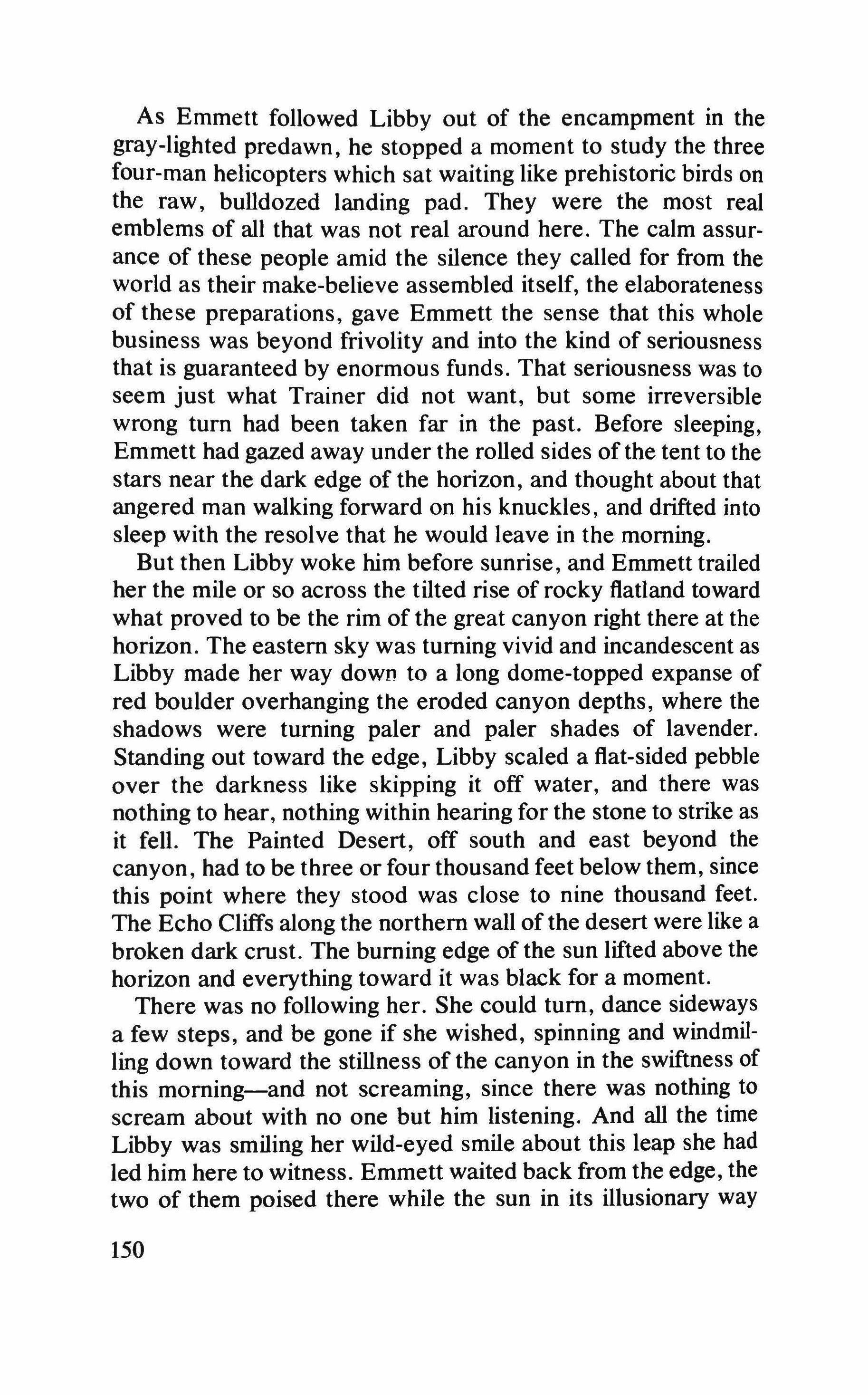
As Emmett followed Libby out of the encampment in the gray-lighted predawn, he stopped a moment to study the three four-man helicopters which sat waiting like prehistoric birds on the raw, bulldozed landing pad. They were the most real emblems of all that was not real around here. The calm assurance of these people amid the silence they called for from the world as their make-believe assembled itself, the elaborateness of these preparations, gave Emmett the sense that this whole business was beyond frivolity and into the kind of seriousness that is guaranteed by enormous funds. That seriousness was to seem just what Trainer did not want, but some irreversible wrong tum had been taken far in the past. Before sleeping, Emmett had gazed away under the rolled sides of the tent to the stars near the dark edge of the horizon, and thought about that angered man walking forward on his knuckles, and drifted into sleep with the resolve that he would leave in the morning.
But then Libby woke him before sunrise, and Emmett trailed her the mile or so across the tilted rise of rocky flatland toward what proved to be the rim of the great canyon right there at the horizon. The eastern sky was turning vivid and incandescent as Libby made her way down to a long dome-topped expanse of red boulder overhanging the eroded canyon depths, where the shadows were turning paler and paler shades of lavender. Standing out toward the edge, Libby scaled a flat-sided pebble over the darkness like skipping it off water, and there was nothing to hear, nothing within hearing for the stone to strike as it fell. The Painted Desert, off south and east beyond the canyon, had to be three or four thousand feet below them, since this point where they stood was close to nine thousand feet. The Echo Cliffs along the northern wall of the desert were like a broken dark crust. The burning edge of the sun lifted above the horizon and everything toward it was black for a moment. There was no following her. She could tum, dance sideways a few steps, and be gone if she wished, spinning and windmilling down toward the stillness of the canyon in the swiftness of this morning-and not screaming, since there was nothing to scream about with no one but him listening. And all the time Libby was smiling her wild-eyed smile about this leap she had led him here to witness. Emmett waited back from the edge, the two of them poised there while the sun in its illusionary way
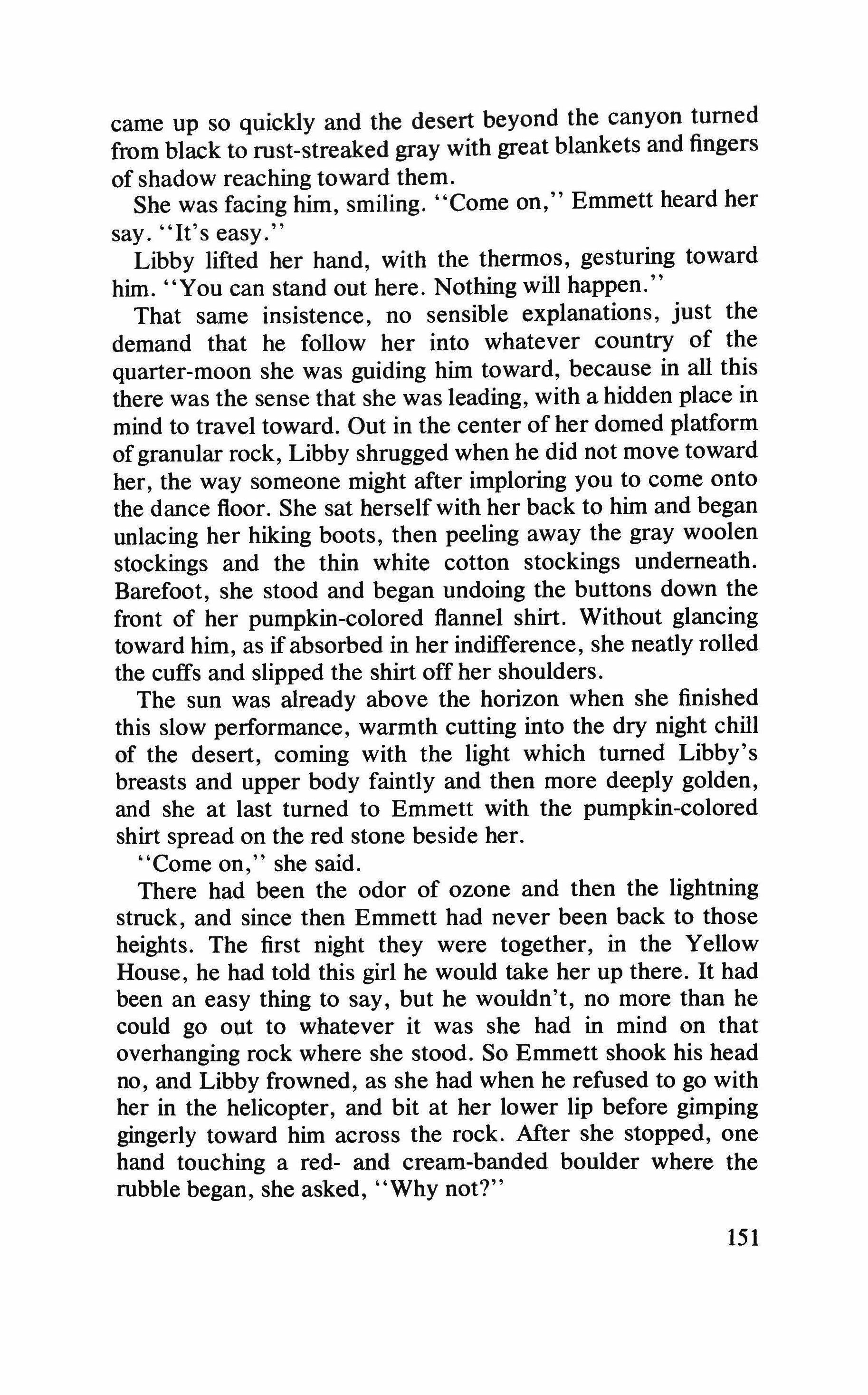
came up so quickly and the desert beyond the canyon turned from black to rust-streaked gray with great blankets and fingers of shadow reaching toward them.
She was facing him, smiling. "Come on," Emmett heard her say. "It's easy.
Libby lifted her hand, with the thermos, gesturing toward him. "You can stand out here. Nothing will happen.
That same insistence, no sensible explanations, just the demand that he follow her into whatever country of the quarter-moon she was guiding him toward, because in all this there was the sense that she was leading, with a hidden place in mind to travel toward. Out in the center of her domed platform ofgranular rock, Libby shrugged when he did not move toward her, the way someone might after imploring you to come onto the dance floor. She sat herself with her back to him and began unlacing her hiking boots, then peeling away the gray woolen stockings and the thin white cotton stockings underneath. Barefoot, she stood and began undoing the buttons down the front of her pumpkin-colored flannel shirt. Without glancing toward him, as if absorbed in her indifference, she neatly rolled the cuffs and slipped the shirt off her shoulders.
The sun was already above the horizon when she finished this slow performance, warmth cutting into the dry night chill of the desert, coming with the light which turned Libby's breasts and upper body faintly and then more deeply golden, and she at last turned to Emmett with the pumpkin-colored shirt spread on the red stone beside her.
"Come on," she said.
There had been the odor of ozone and then the lightning struck, and since then Emmett had never been back to those heights. The first night they were together, in the Yellow House, he had told this girl he would take her up there. It had been an easy thing to say, but he wouldn't, no more than he could go out to whatever it was she had in mind on that overhanging rock where she stood. So Emmett shook his head no, and Libby frowned, as she had when he refused to go with her in the helicopter, and bit at her lower lip before gimping gingerly toward him across the rock. After she stopped, one hand touching a red- and cream-banded boulder where the rubble began, she asked, "Why not?"
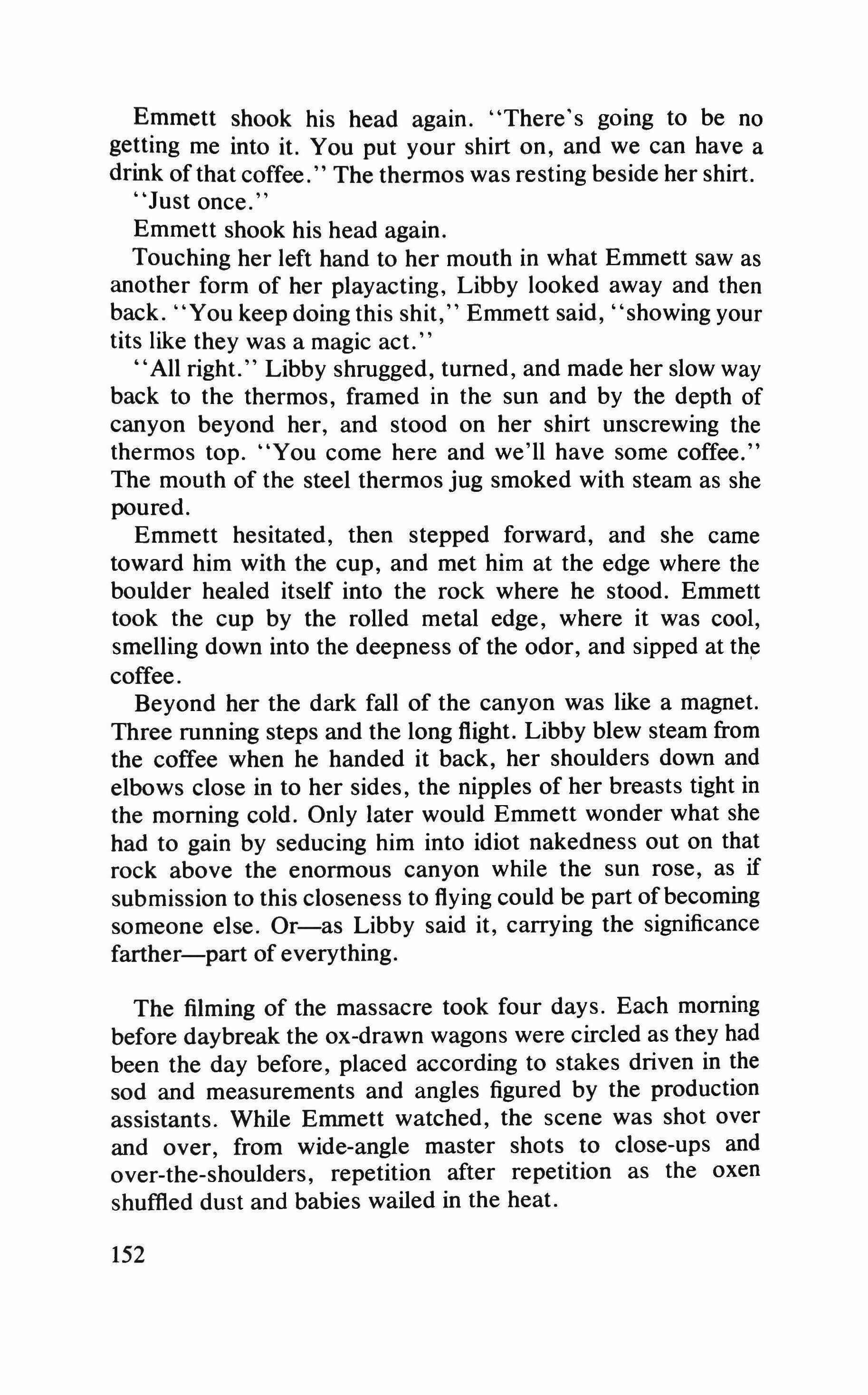
Emmett shook his head again. "There's going to be no getting me into it. You put your shirt on, and we can have a drink of that coffee." The thermos was resting beside her shirt. "Just once."
Emmett shook his head again.
Touching her left hand to her mouth in what Emmett saw as another form of her playacting, Libby looked away and then back. "You keep doing this shit," Emmett said, "showing your tits like they was a magic act.
All right. Libby shrugged, turned, and made her slow way back to the thermos, framed in the sun and by the depth of canyon beyond her, and stood on her shirt unscrewing the thermos top. "You come here and we'll have some coffee." The mouth of the steel thermos jug smoked with steam as she poured.
Emmett hesitated, then stepped forward, and she came toward him with the cup, and met him at the edge where the boulder healed itself into the rock where he stood. Emmett took the cup by the rolled metal edge, where it was cool, smelling down into the deepness of the odor, and sipped at the coffee.
Beyond her the dark fall of the canyon was like a magnet. Three running steps and the long flight. Libby blew steam from the coffee when he handed it back, her shoulders down and elbows close in to her sides, the nipples of her breasts tight in the morning cold. Only later would Emmett wonder what she had to gain by seducing him into idiot nakedness out on that rock above the enormous canyon while the sun rose, as if submission to this closeness to flying could be part ofbecoming someone else. Or-as Libby said it, carrying the significance farther-part of everything.
The filming of the massacre took four days. Each morning before daybreak the ox-drawn wagons were circled as they had been the day before, placed according to stakes driven in the sod and measurements and angles figured by the production assistants. While Emmett watched, the scene was shot over and over, from wide-angle master shots to close-ups and over-the-shoulders, repetition after repetition as the oxen shuffled dust and babies wailed in the heat.
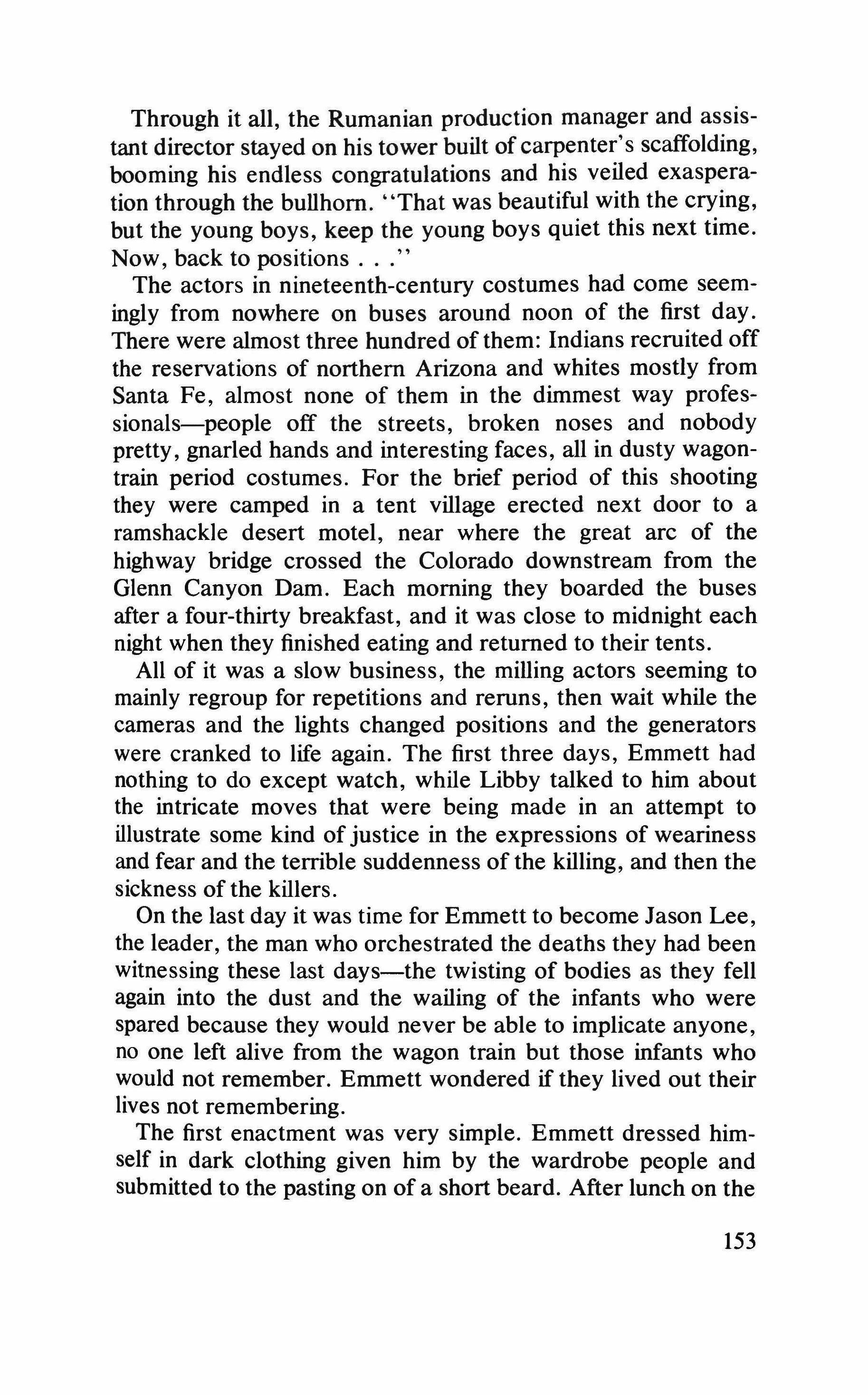
Through it all, the Rumanian production manager and assistant director stayed on his tower built of carpenter's scaffolding, booming his endless congratulations and his veiled exasperation through the bullhorn. "That was beautiful with the crying, but the young boys, keep the young boys quiet this next time. Now, back to positions
The actors in nineteenth-century costumes had come seemingly from nowhere on buses around noon of the first day. There were almost three hundred of them: Indians recruited off the reservations of northern Arizona and whites mostly from Santa Fe, almost none of them in the dimmest way professionals-people off the streets, broken noses and nobody pretty, gnarled hands and interesting faces, all in dusty wagontrain period costumes. For the brief period of this shooting they were camped in a tent village erected next door to a ramshackle desert motel, near where the great arc of the highway bridge crossed the Colorado downstream from the Glenn Canyon Dam. Each morning they boarded the buses after a four-thirty breakfast, and it was close to midnight each night when they finished eating and returned to their tents.
All of it was a slow business, the milling actors seeming to mainly regroup for repetitions and reruns, then wait while the cameras and the lights changed positions and the generators were cranked to life again. The first three days, Emmett had nothing to do except watch, while Libby talked to him about the intricate moves that were being made in an attempt to illustrate some kind of justice in the expressions of weariness and fear and the terrible suddenness of the killing, and then the sickness of the killers.
On the last day it was time for Emmett to become Jason Lee, the leader, the man who orchestrated the deaths they had been witnessing these last days-the twisting of bodies as they fell again into the dust and the wailing of the infants who were spared because they would never be able to implicate anyone, no one left alive from the wagon train but those infants who would not remember. Emmett wondered if they lived out their lives not remembering.
The first enactment was very simple. Emmett dressed himself in dark clothing given him by the wardrobe people and submitted to the pasting on of a short beard. After lunch on the
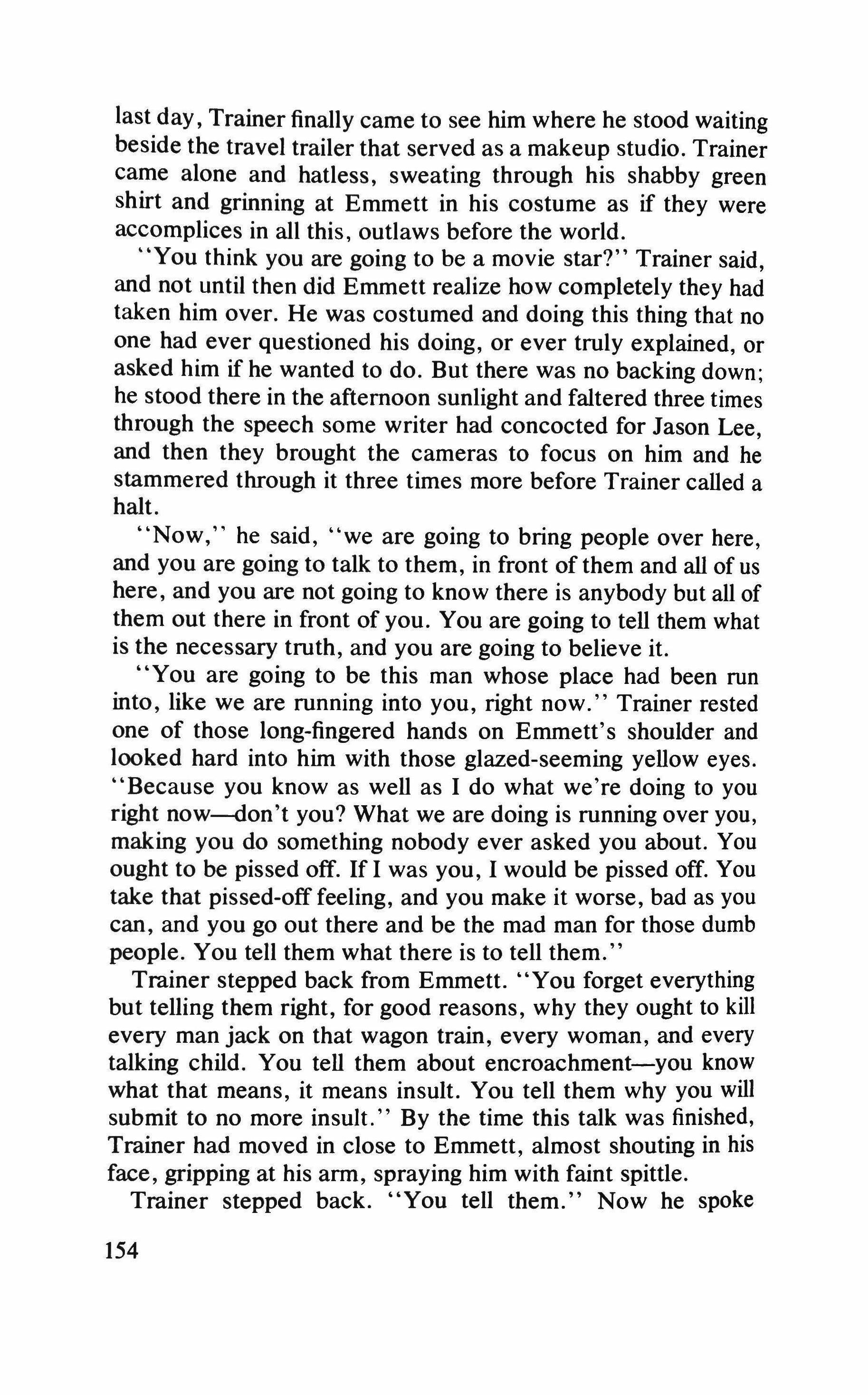
last day, Trainer finally came to see him where he stood waiting beside the travel trailer that served as a makeup studio. Trainer came alone and hatless, sweating through his shabby green shirt and grinning at Emmett in his costume as if they were accomplices in all this, outlaws before the world.
"You think you are going to be a movie star?" Trainer said, and not until then did Emmett realize how completely they had taken him over. He was costumed and doing this thing that no one had ever questioned his doing, or ever truly explained, or asked him if he wanted to do. But there was no backing down; he stood there in the afternoon sunlight and faltered three times through the speech some writer had concocted for Jason Lee, and then they brought the cameras to focus on him and he stammered through it three times more before Trainer called a halt.
"Now," he said, "we are going to bring people over here, and you are going to talk to them, in front of them and all of us here, and you are not going to know there is anybody but all of them out there in front of you. You are going to tell them what is the necessary truth, and you are going to believe it.
"You are going to be this man whose place had been run into, like we are running into you, right now." Trainer rested one of those long-fingered hands on Emmett's shoulder and looked hard into him with those glazed-seeming yellow eyes.
"Because you know as well as I do what we're doing to you right now-don't you? What we are doing is running over you, making you do something nobody ever asked you about. You ought to be pissed off. If I was you, I would be pissed off. You take that pissed-off feeling, and you make it worse, bad as you can, and you go out there and be the mad man for those dumb people. You tell them what there is to tell them."
Trainer stepped back from Emmett. "You forget everything but telling them right, for good reasons, why they ought to kill every man jack on that wagon train, every woman, and every talking child. You tell them about encroachment-you know what that means, it means insult. You tell them why you will submit to no more insult." By the time this talk was finished, Trainer had moved in close to Emmett, almost shouting in his face, gripping at his arm, spraying him with faint spittle.
Trainer stepped back. "You tell them." Now he spoke
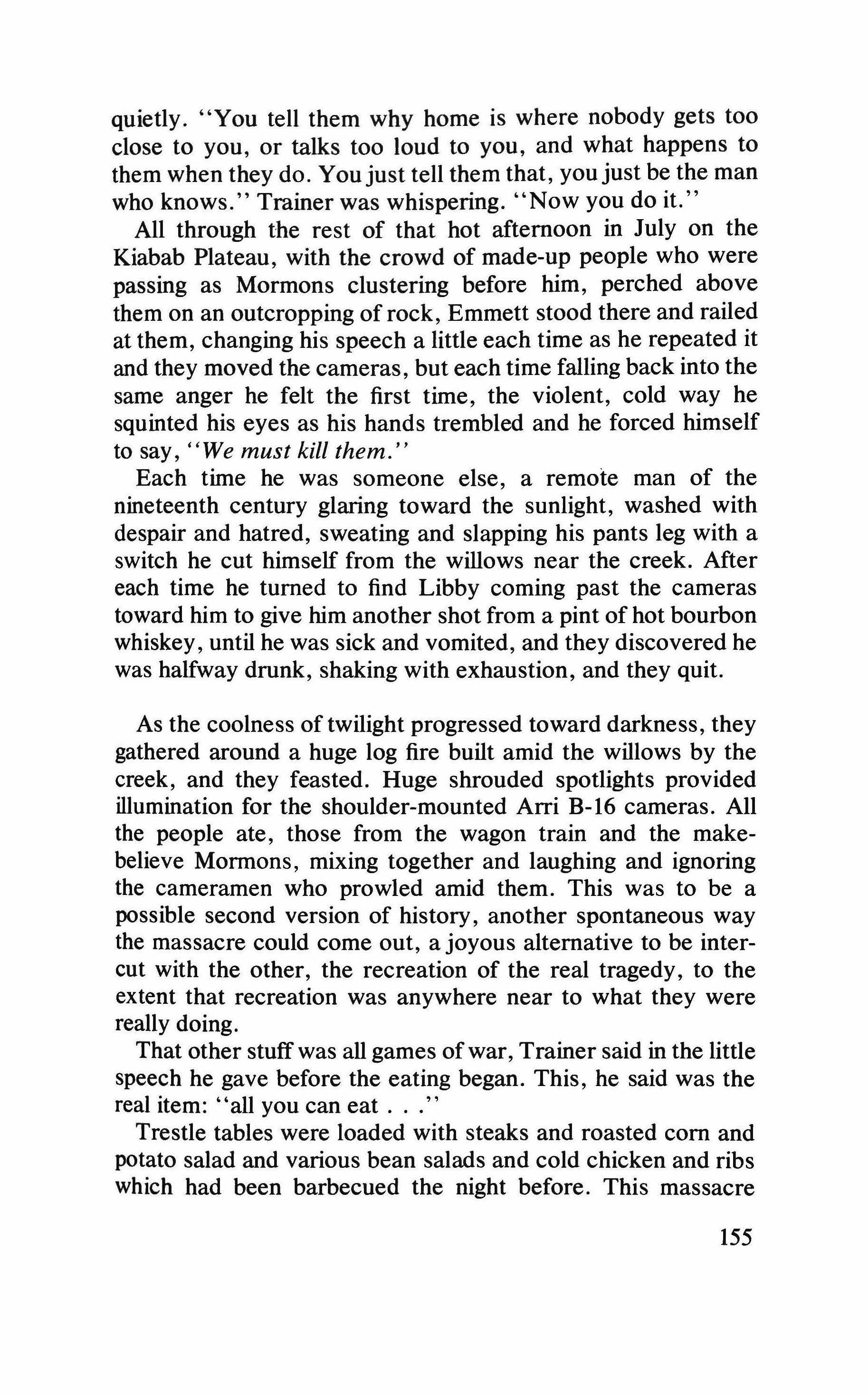
quietly. "You tell them why home is where nobody gets too close to you, or talks too loud to you, and what happens to them when they do. You just tell them that, you just be the man who knows." Trainer was whispering. "Now you do it."
All through the rest of that hot afternoon in July on the Kiabab Plateau, with the crowd of made-up people who were passing as Mormons clustering before him, perched above them on an outcropping of rock, Emmett stood there and railed at them, changing his speech a little each time as he repeated it and they moved the cameras, but each time falling back into the same anger he felt the first time, the violent, cold way he squinted his eyes as his hands trembled and he forced himself to say, "We must kill them."
Each time he was someone else, a remote man of the nineteenth century glaring toward the sunlight, washed with despair and hatred, sweating and slapping his pants leg with a switch he cut himself from the willows near the creek. After each time he turned to find Libby coming past the cameras toward him to give him another shot from a pint of hot bourbon whiskey, until he was sick and vomited, and they discovered he was halfway drunk, shaking with exhaustion, and they quit.
As the coolness of twilight progressed toward darkness, they gathered around a huge log fire built amid the willows by the creek, and they feasted. Huge shrouded spotlights provided illumination for the shoulder-mounted Arri B-16 cameras. All the people ate, those from the wagon train and the makebelieve Mormons, mixing together and laughing and ignoring the cameramen who prowled amid them. This was to be a possible second version of history, another spontaneous way the massacre could come out, a joyous alternative to be intercut with the other, the recreation of the real tragedy, to the extent that recreation was anywhere near to what they were really doing.
That other stuff was all games of war, Trainer said in the little speech he gave before the eating began. This, he said was the real item: "all you can eat
Trestle tables were loaded with steaks and roasted com and potato salad and various bean salads and cold chicken and ribs which had been barbecued the night before. This massacre
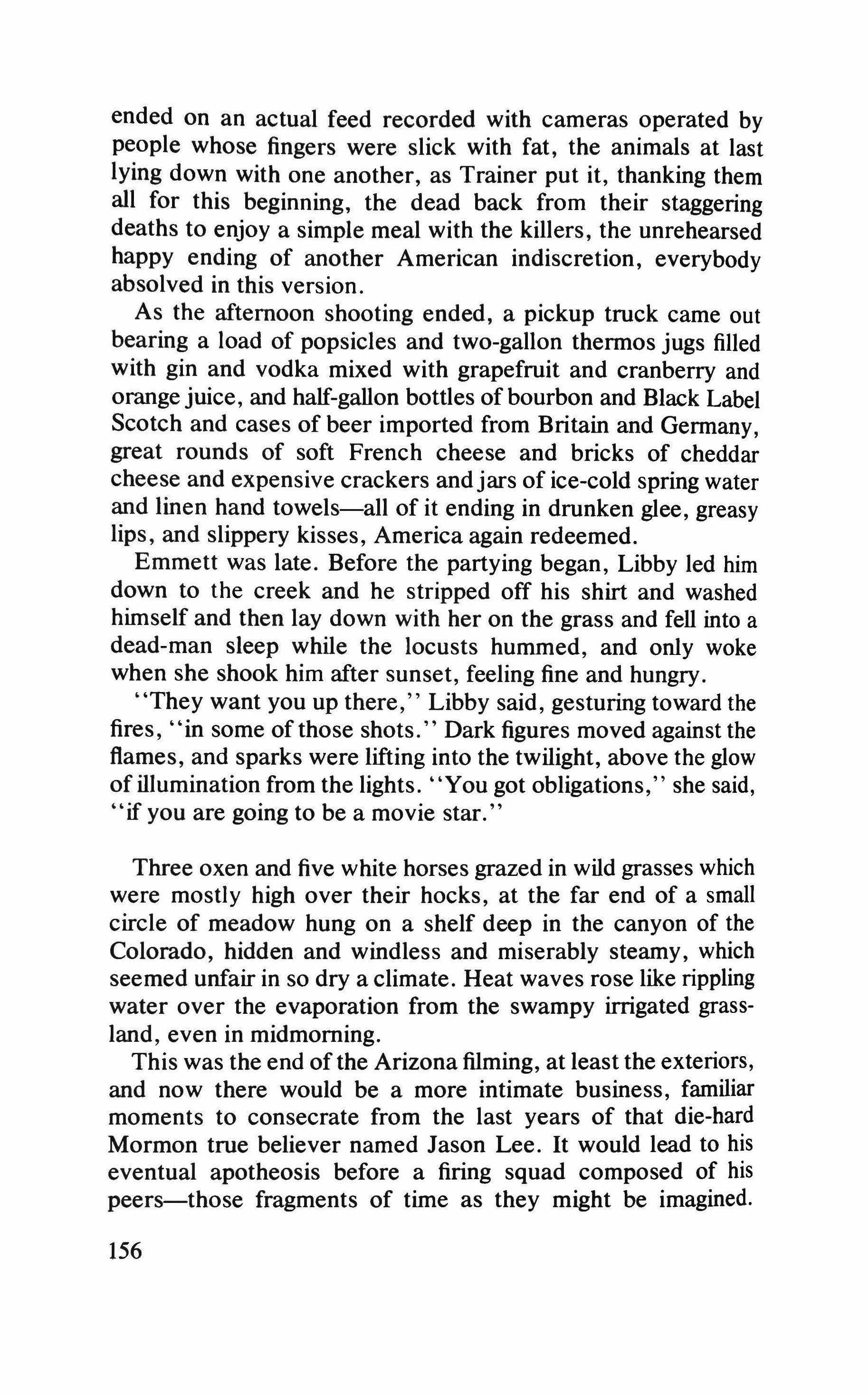
ended on an actual feed recorded with cameras operated by people whose fingers were slick with fat, the animals at last lying down with one another, as Trainer put it, thanking them all for this beginning, the dead back from their staggering deaths to enjoy a simple meal with the killers, the unrehearsed happy ending of another American indiscretion, everybody absolved in this version.
As the afternoon shooting ended, a pickup truck came out bearing a load of popsicles and two-gallon thermos jugs filled with gin and vodka mixed with grapefruit and cranberry and orange juice, and half-gallon bottles of bourbon and Black Label Scotch and cases of beer imported from Britain and Germany, great rounds of soft French cheese and bricks of cheddar cheese and expensive crackers andjars of ice-cold spring water and linen hand towels-all of it ending in drunken glee, greasy lips, and slippery kisses, America again redeemed.
Emmett was late. Before the partying began, Libby led him down to the creek and he stripped off his shirt and washed himself and then lay down with her on the grass and fell into a dead-man sleep while the locusts hummed, and only woke when she shook him after sunset, feeling fine and hungry.
"They want you up there," Libby said, gesturing toward the fires, "in some of those shots." Dark figures moved against the flames, and sparks were lifting into the twilight, above the glow of illumination from the lights. "You got obligations," she said, "if you are going to be a movie star."
Three oxen and five white horses grazed in wild grasses which were mostly high over their hocks, at the far end of a small circle of meadow hung on a shelf deep in the canyon of the Colorado, hidden and windless and miserably steamy, which seemed unfair in so dry a climate. Heat waves rose like rippling water over the evaporation from the swampy irrigated grassland, even in midmorning.
This was the end of the Arizona filming, at least the exteriors, and now there would be a more intimate business, familiar moments to consecrate from the last years of that die-hard Mormon true believer named Jason Lee. It would lead to his eventual apotheosis before a firing squad composed of his peers-those fragments of time as they might be imagined.
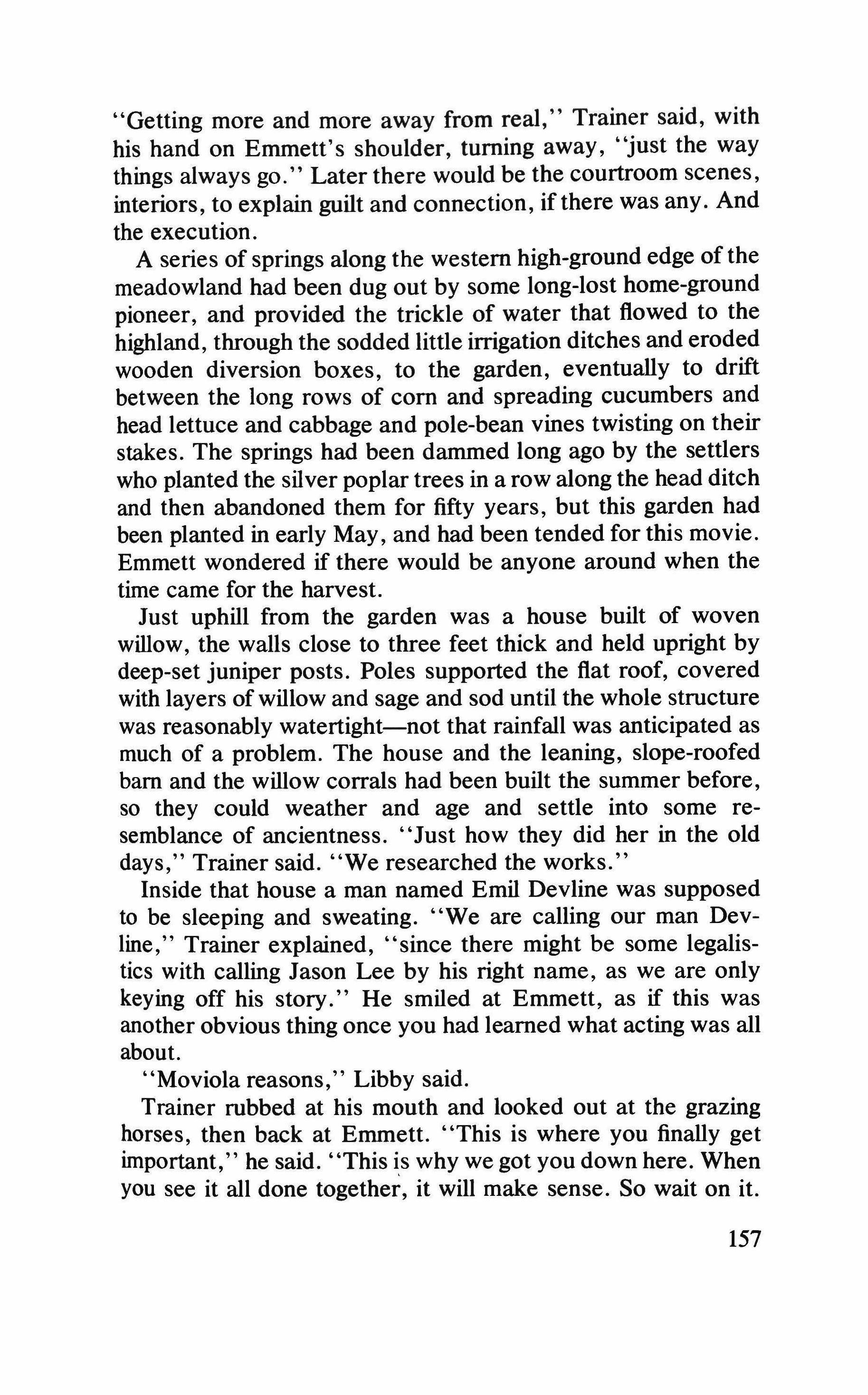
"Getting more and more away from real," Trainer said, with his hand on Emmett's shoulder, turning away, "just the way things always go." Later there would be the courtroom scenes, interiors, to explain guilt and connection, if there was any. And the execution.
A series of springs along the western high-ground edge of the meadowland had been dug out by some long-lost home-ground pioneer, and provided the trickle of water that flowed to the highland, through the sodded little irrigation ditches and eroded wooden diversion boxes, to the garden, eventually to drift between the long rows of com and spreading cucumbers and head lettuce and cabbage and pole-bean vines twisting on their stakes. The springs had been dammed long ago by the settlers who planted the silver poplar trees in a row along the head ditch and then abandoned them for fifty years, but this garden had been planted in early May, and had been tended for this movie. Emmett wondered if there would be anyone around when the time came for the harvest.
Just uphill from the garden was a house built of woven willow, the walls close to three feet thick and held upright by deep-set juniper posts. Poles supported the flat roof, covered with layers ofwillow and sage and sod until the whole structure was reasonably watertight-not that rainfall was anticipated as much of a problem. The house and the leaning, slope-roofed bam and the willow corrals had been built the summer before, so they could weather and age and settle into some resemblance of ancientness. "Just how they did her in the old days," Trainer said. "We researched the works."
Inside that house a man named Emil Devline was supposed to be sleeping and sweating. "We are calling our man Devline," Trainer explained, "since there might be some legalistics with calling Jason Lee by his right name, as we are only keying off his story." He smiled at Emmett, as if this was another obvious thing once you had learned what acting was all about.
"Moviola reasons," Libby said.
Trainer rubbed at his mouth and looked out at the grazing horses, then back at Emmett. "This is where you finally get important," he said. "This is why we got you down here. When you see it all done together, it will make sense. So wait on it.
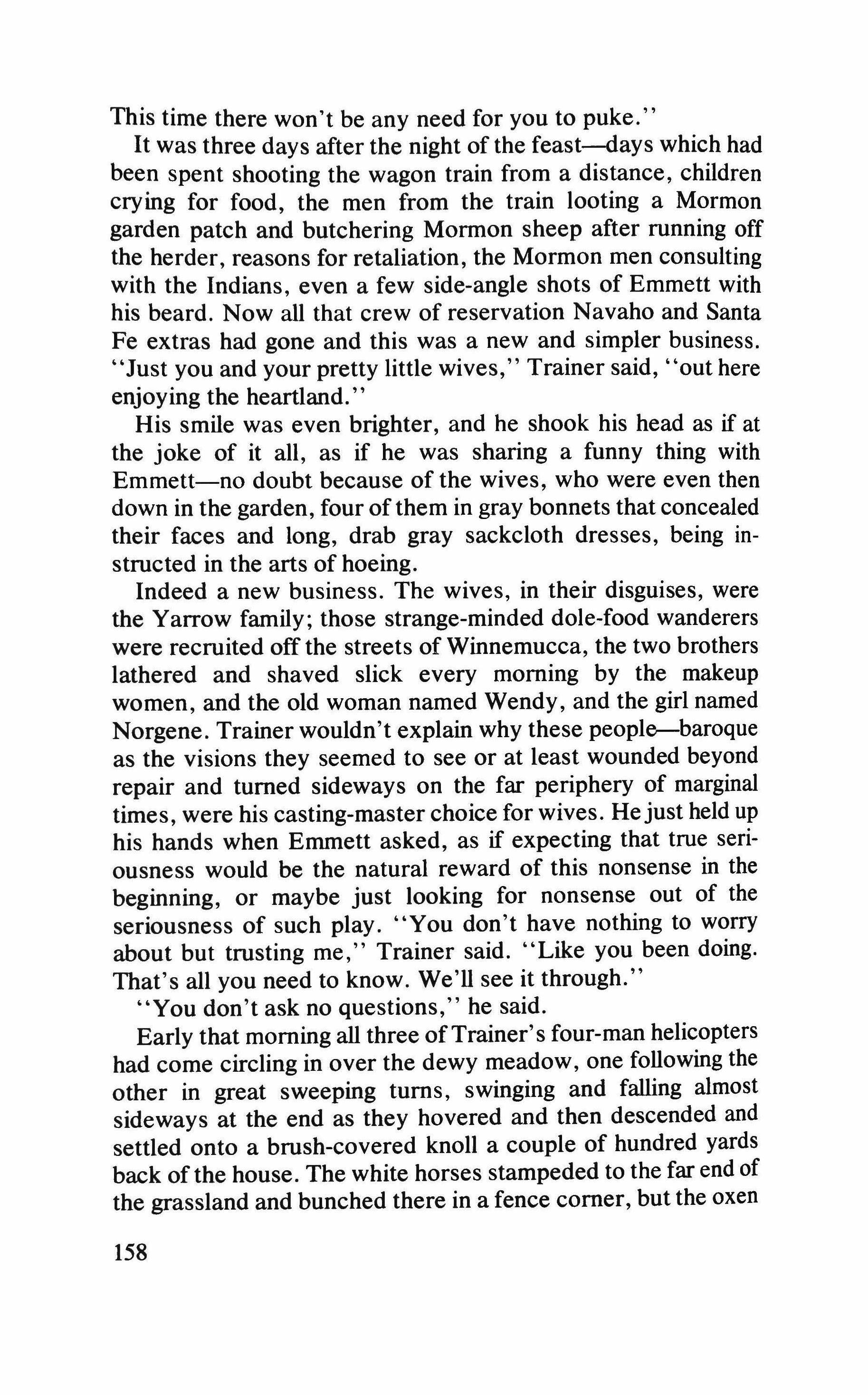
This time there won't be any need for you to puke. "
It was three days after the night of the feast-days which had been spent shooting the wagon train from a distance, children crying for food, the men from the train looting a Mormon garden patch and butchering Mormon sheep after running off the herder, reasons for retaliation, the Mormon men consulting with the Indians, even a few side-angle shots of Emmett with his beard. Now all that crew of reservation Navaho and Santa Fe extras had gone and this was a new and simpler business. "Just you and your pretty little wives," Trainer said, "out here enjoying the heartland."
His smile was even brighter, and he shook his head as if at the joke of it all, as if he was sharing a funny thing with Emmett-no doubt because of the wives, who were even then down in the garden, four of them in gray bonnets that concealed their faces and long, drab gray sackcloth dresses, being instructed in the arts of hoeing.
Indeed a new business. The wives, in their disguises, were the Yarrow family; those strange-minded dole-food wanderers were recruited off the streets of Winnemucca, the two brothers lathered and shaved slick every morning by the makeup women, and the old woman named Wendy, and the girl named Norgene. Trainer wouldn't explain why these people=baroque as the visions they seemed to see or at least wounded beyond repair and turned sideways on the far periphery of marginal times, were his casting-master choice for wives. He just held up his hands when Emmett asked, as if expecting that true seriousness would be the natural reward of this nonsense in the beginning, or maybe just looking for nonsense out of the seriousness of such play. "You don't have nothing to worry about but trusting me," Trainer said. "Like you been doing. That's all you need to know. We'll see it through."
"You don't ask no questions," he said.
Early that morning all three ofTrainer's four-man helicopters had come circling in over the dewy meadow, one following the other in great sweeping turns, swinging and falling almost sideways at the end as they hovered and then descended and settled onto a brush-covered knoll a couple of hundred yards back of the house. The white horses stampeded to the far end of the grassland and bunched there in a fence comer, but the oxen
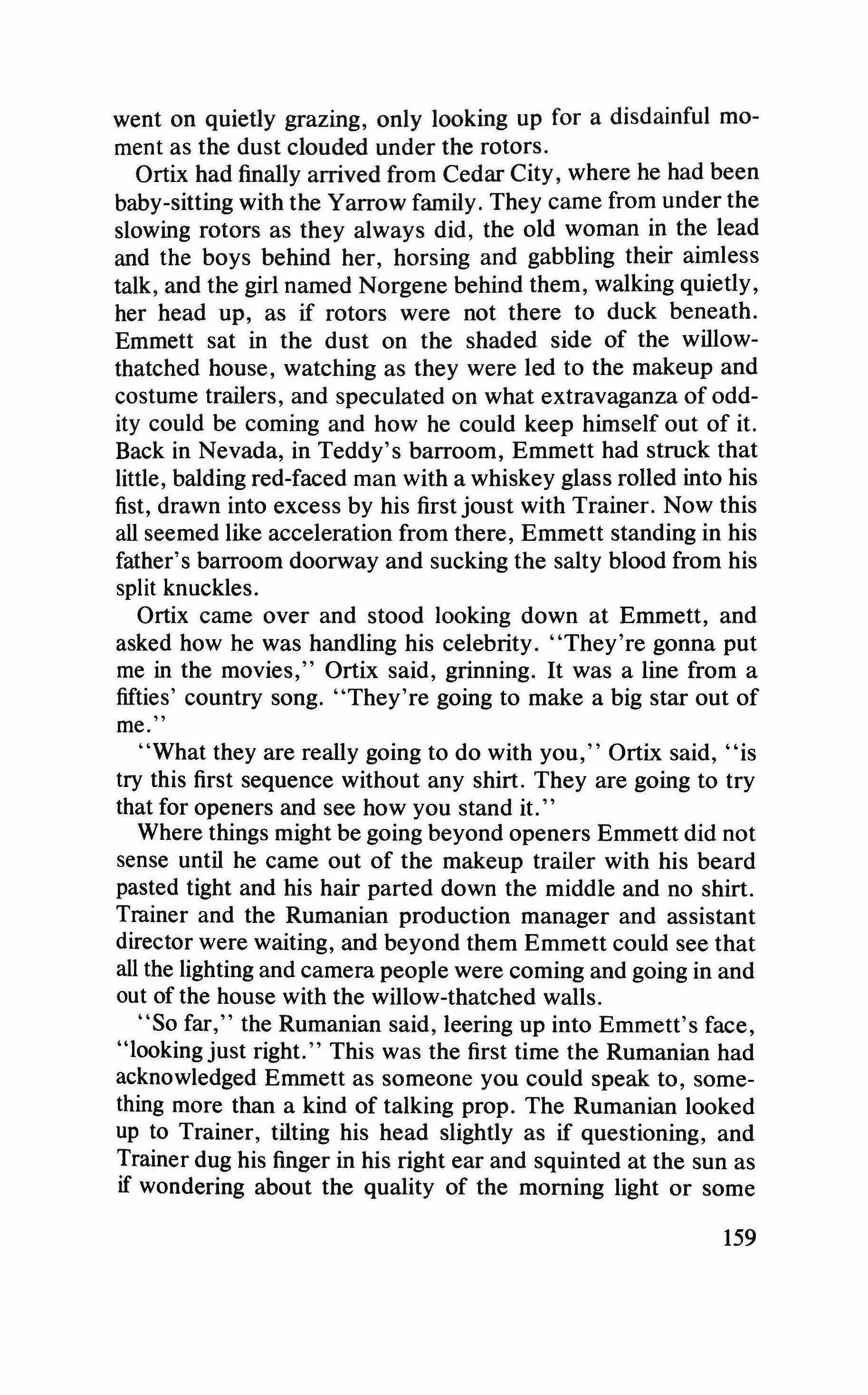
went on quietly grazing, only looking up for a disdainful moment as the dust clouded under the rotors.
Ortix had finally arrived from Cedar City, where he had been baby-sitting with the Yarrow family. They came from under the slowing rotors as they always did, the old woman in the lead and the boys behind her, horsing and gabbling their aimless talk, and the girl named Norgene behind them, walking quietly, her head up, as if rotors were not there to duck beneath. Emmett sat in the dust on the shaded side of the willowthatched house, watching as they were led to the makeup and costume trailers, and speculated on what extravaganza of oddity could be coming and how he could keep himself out of it. Back in Nevada, in Teddy's barroom, Emmett had struck that little, balding red-faced man with a whiskey glass rolled into his fist, drawn into excess by his first joust with Trainer. Now this all seemed like acceleration from there, Emmett standing in his father's barroom doorway and sucking the salty blood from his split knuckles.
Ortix came over and stood looking down at Emmett, and asked how he was handling his celebrity. "They're gonna put me in the movies," Ortix said, grinning. It was a line from a fifties' country song. "They're going to make a big star out of me."
"What they are really going to do with you," Ortix said, "is try this first sequence without any shirt. They are going to try that for openers and see how you stand it.
Where things might be going beyond openers Emmett did not sense until he came out of the makeup trailer with his beard pasted tight and his hair parted down the middle and no shirt. Trainer and the Rumanian production manager and assistant director were waiting, and beyond them Emmett could see that all the lighting and camera people were coming and going in and out of the house with the willow-thatched walls.
"So far," the Rumanian said, leering up into Emmett's face, "lookingjust right." This was the first time the Rumanian had acknowledged Emmett as someone you could speak to, something more than a kind of talking prop. The Rumanian looked up to Trainer, tilting his head slightly as if questioning, and Trainer dug his finger in his right ear and squinted at the sun as if wondering about the quality of the morning light or some
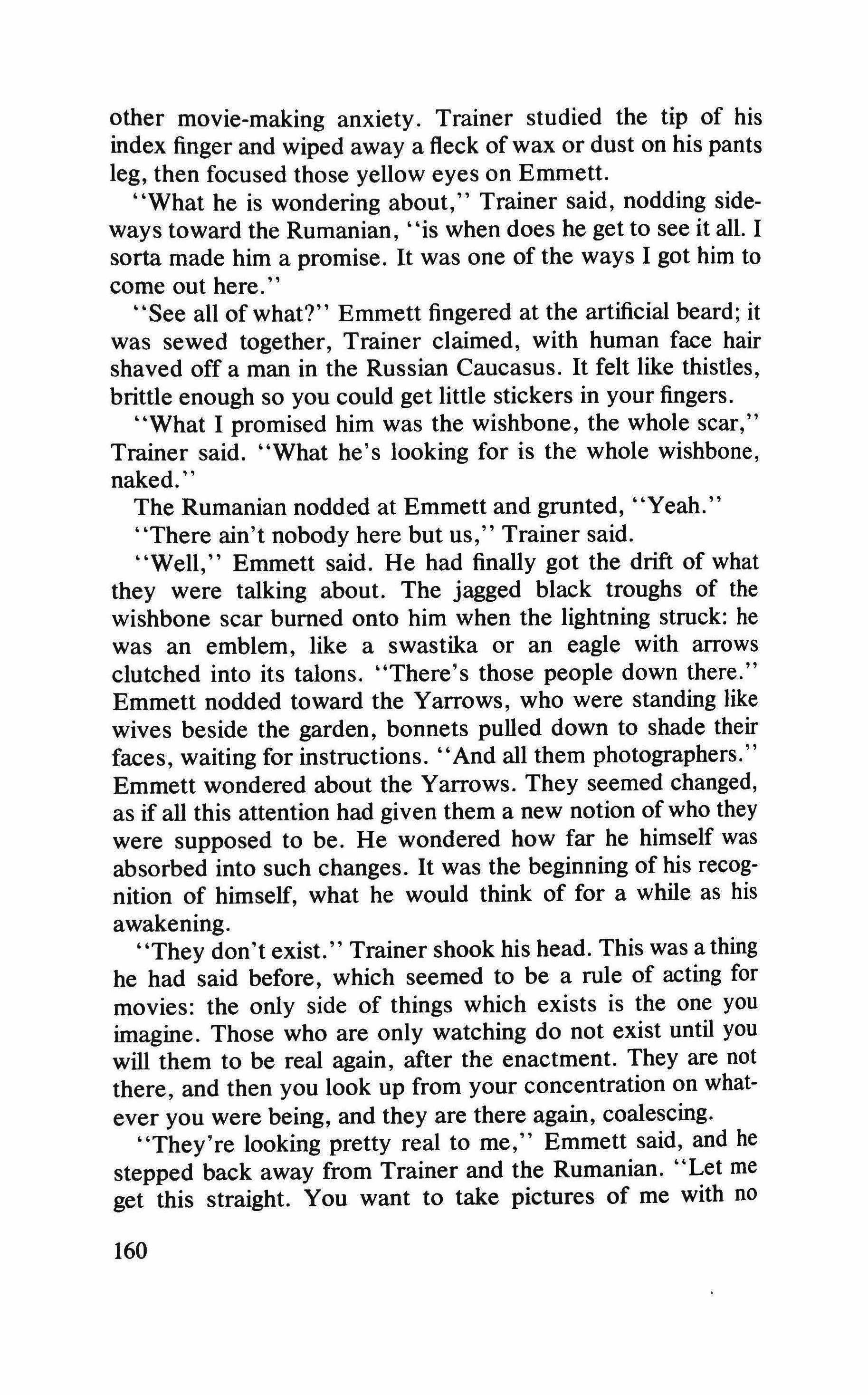
other movie-making anxiety. Trainer studied the tip of his index finger and wiped away a fleck of wax or dust on his pants leg, then focused those yellow eyes on Emmett.
"What he is wondering about," Trainer said, nodding sideways toward the Rumanian, "is when does he get to see it all. I sorta made him a promise. It was one of the ways I got him to come out here.
"See all of what?" Emmett fingered at the artificial beard; it was sewed together, Trainer claimed, with human face hair shaved off a man in the Russian Caucasus. It felt like thistles, brittle enough so you could get little stickers in your fingers.
"What I promised him was the wishbone, the whole scar," Trainer said. "What he's looking for is the whole wishbone, naked.
The Rumanian nodded at Emmett and grunted, "Yeah."
"There ain't nobody here but us," Trainer said.
"Well," Emmett said. He had finally got the drift of what they were talking about. The jagged black troughs of the wishbone scar burned onto him when the lightning struck: he was an emblem, like a swastika or an eagle with arrows clutched into its talons. "There's those people down there." Emmett nodded toward the Yarrows, who were standing like wives beside the garden, bonnets pulled down to shade their faces, waiting for instructions. "And all them photographers." Emmett wondered about the Yarrows. They seemed changed, as if all this attention had given them a new notion of who they were supposed to be. He wondered how far he himself was absorbed into such changes. It was the beginning of his recognition of himself, what he would think of for a while as his awakening.
"They don't exist." Trainer shook his head. This was a thing he had said before, which seemed to be a rule of acting for movies: the only side of things which exists is the one you imagine. Those who are only watching do not exist until you will them to be real again, after the enactment. They are not there, and then you look up from your concentration on whatever you were being, and they are there again, coalescing.
"They're looking pretty real to me," Emmett said, and he stepped back away from Trainer and the Rumanian. "Let me get this straight. You want to take pictures of me with no
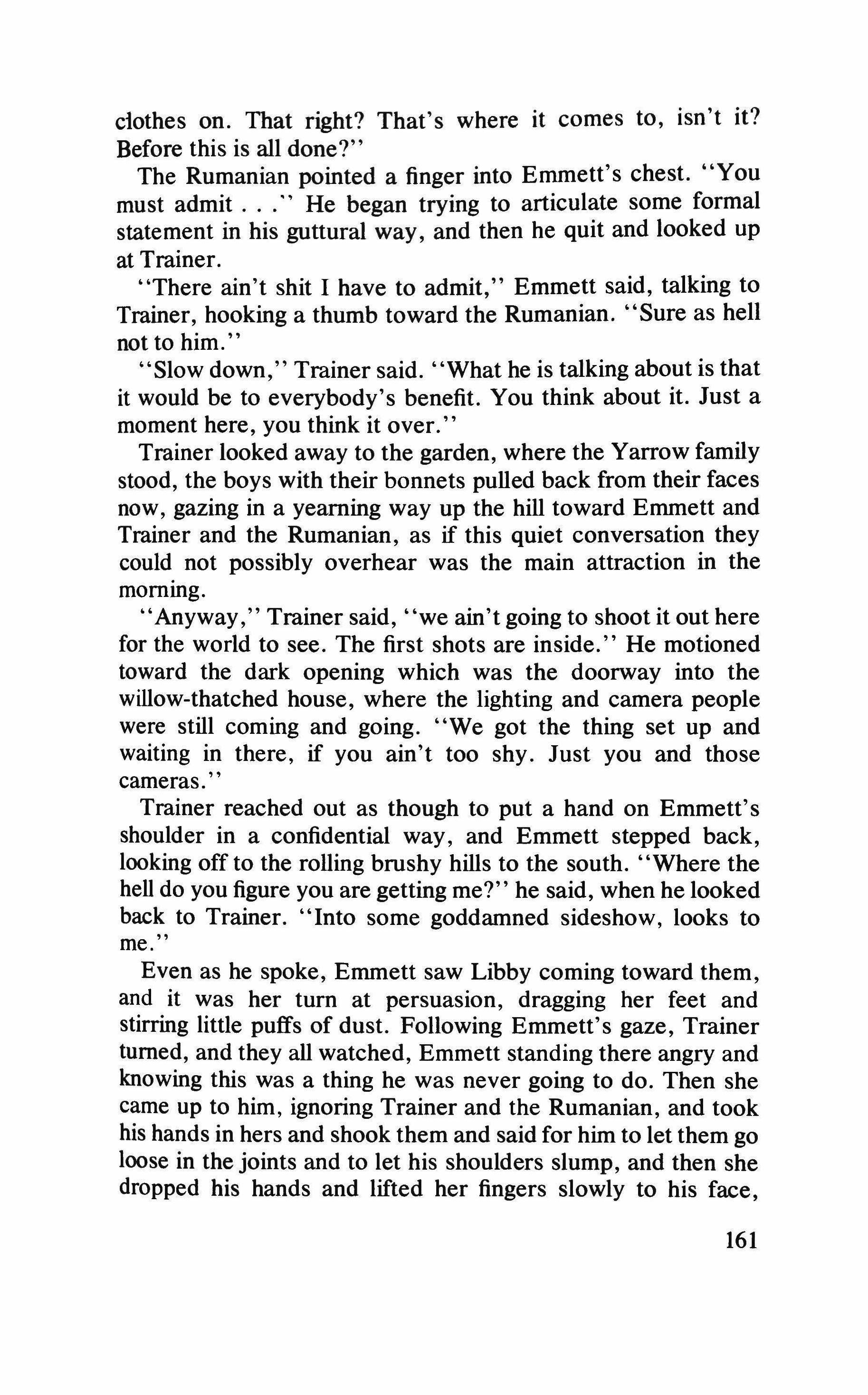
clothes on. That right? That's where it comes to, isn't it? Before this is all done?"
The Rumanian pointed a finger into Emmett's chest. "You must admit .' He began trying to articulate some formal statement in his guttural way, and then he quit and looked up at Trainer.
"There ain't shit I have to admit," Emmett said, talking to Trainer, hooking a thumb toward the Rumanian. "Sure as hell not to him.
"Slow down," Trainer said. "What he is talking about is that it would be to everybody's benefit. You think about it. Just a moment here, you think it over.
Trainer looked away to the garden, where the Yarrow family stood, the boys with their bonnets pulled back from their faces now, gazing in a yearning way up the hill toward Emmett and Trainer and the Rumanian, as if this quiet conversation they could not possibly overhear was the main attraction in the morning.
"Anyway," Trainer said, "we ain't going to shoot it out here for the world to see. The first shots are inside." He motioned toward the dark opening which was the doorway into the willow-thatched house, where the lighting and camera people were still coming and going. "We got the thing set up and waiting in there, if you ain't too shy. Just you and those cameras."
Trainer reached out as though to put a hand on Emmett's shoulder in a confidential way, and Emmett stepped back, looking off to the rolling brushy hills to the south. "Where the hell do you figure you are getting me?" he said, when he looked back to Trainer. "Into some goddamned sideshow, looks to me."
Even as he spoke, Emmett saw Libby coming toward them, and it was her turn at persuasion, dragging her feet and stirring little puffs of dust. Following Emmett's gaze, Trainer turned, and they all watched, Emmett standing there angry and knowing this was a thing he was never going to do. Then she came up to him, ignoring Trainer and the Rumanian, and took his hands in hers and shook them and said for him to let them go loose in the joints and to let his shoulders slump, and then she dropped his hands and lifted her fingers slowly to his face,

tracing his cheeks while he stood there, letting her do it in front of the world, her fingers cool even in this heat, and then she pressed and stroked her fingers over his eyelids, whispering for him to close them, just lightly close them and see the colored lights inside, and he was doing it like a child. Libby told him to stay there with his eyes closed and to lift his hands and his arms and to wiggle his fingers like he was flying, to think of nothing but the lightness ofeverything he was and the softness offlying, and walking on water, how easy it would be. "It's simple as holding your breath," she whispered. "You know it. That's how easy it is." And then, as Emmett stood there with Libby's fingers on his eyelids, she was telling him about the usefulness of knowing one word and repeating it over and over.
"Thistle plum," she said. "Just say it. Your word can be 'thistle plum.'
Emmett stepped back and opened his eyes and dropped his arms. "Suffering shit," he said. "You almost got me going."
"Just try it. Close your eyes again, and say it. Go back into those shadows, and say it."
"Once," Emmett said. "Maybe once." Even as an old man he was to reflect on how far what he liked about standing there as the center ofall their attentions had led him toward strapping himself into their intentions. "They played me like a violin": that was a pet thing he would say as he grew older, laughing at himself and retelling the story of trying to make himself into more than the hero of his own wishbone fantasies. What he tried to do right then was see it as ajoke, and he did it, telling himself there was no use running backward now, and he retreated into the willow-thatched house and poised himself in that hot darkness-alone with his eyes closed and knowing it was no joke, or that if it was ajoke, it was on him, but that he was going to do it anyway. "Thistle plum," he muttered to himself, but it was too goddamned silly, and he just opened his eyes and dropped his pants down and then realized he would have to kick out of his boots first.
"You want me barefoot?"
"Absolutely," Libby called back. "Barefoot is perfect."
So with misgivings not adequate to keep him from going on with it, Emmett came to participate in what became for him, for a few weeks that summer, a great turning of the spirit. He
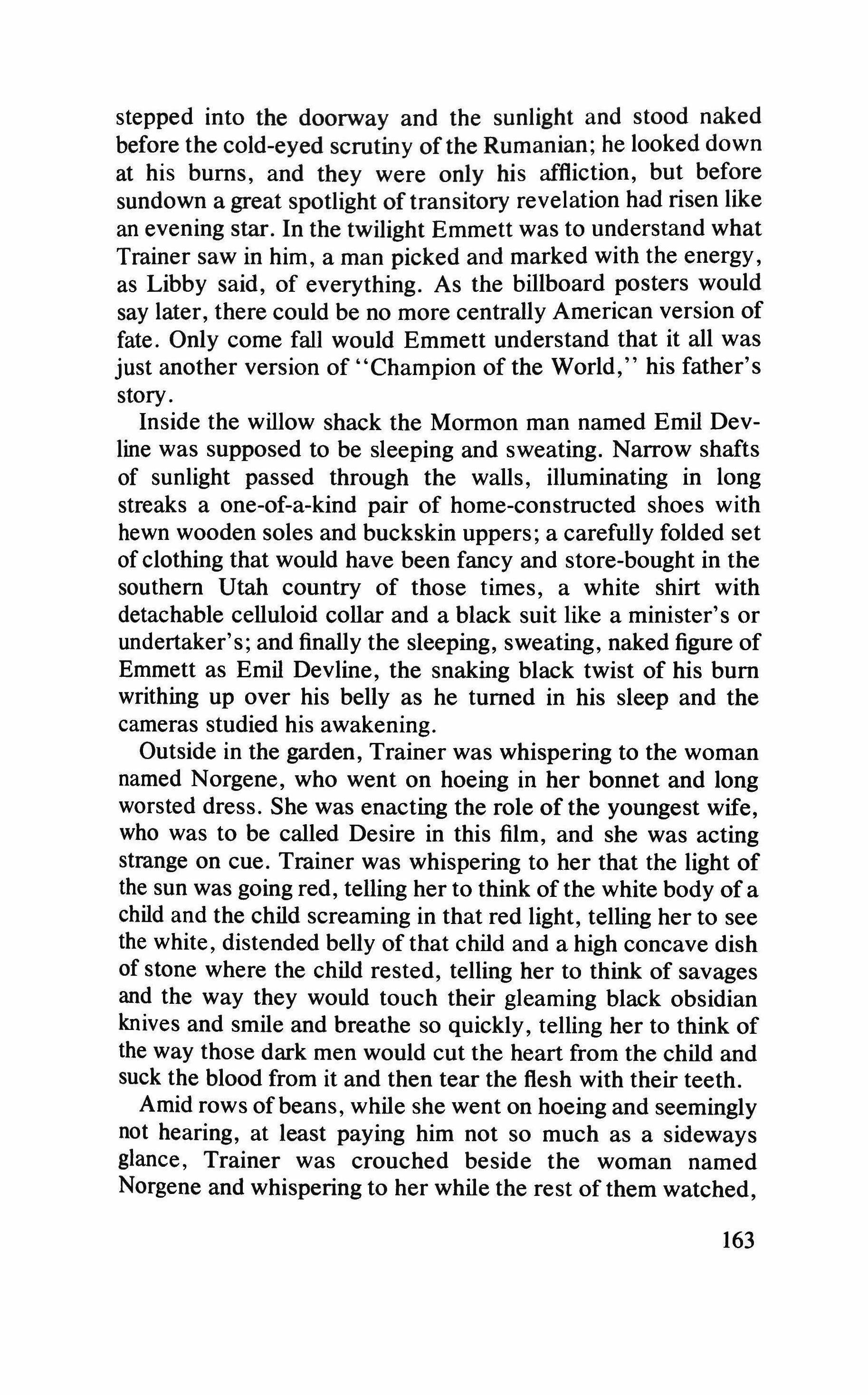
stepped into the doorway and the sunlight and stood naked before the cold-eyed scrutiny ofthe Rumanian; he looked down at his bums, and they were only his affliction, but before sundown a great spotlight of transitory revelation had risen like an evening star. In the twilight Emmett was to understand what Trainer saw in him, a man picked and marked with the energy, as Libby said, of everything. As the billboard posters would say later, there could be no more centrally American version of fate. Only come fall would Emmett understand that it all was just another version of "Champion of the World," his father's story.
Inside the willow shack the Mormon man named Emil Devline was supposed to be sleeping and sweating. Narrow shafts of sunlight passed through the walls, illuminating in long streaks a one-of-a-kind pair of home-constructed shoes with hewn wooden soles and buckskin uppers; a carefully folded set of clothing that would have been fancy and store-bought in the southern Utah country of those times, a white shirt with detachable celluloid collar and a black suit like a minister's or undertaker's; and finally the sleeping, sweating, naked figure of Emmett as Emil Devline, the snaking black twist of his bum writhing up over his belly as he turned in his sleep and the cameras studied his awakening.
Outside in the garden, Trainer was whispering to the woman named Norgene, who went on hoeing in her bonnet and long worsted dress. She was enacting the role of the youngest wife, who was to be called Desire in this film, and she was acting strange on cue. Trainer was Whispering to her that the light of the sun was going red, telling her to think of the white body of a child and the child screaming in that red light, telling her to see the white, distended belly of that child and a high concave dish of stone where the child rested, telling her to think of savages and the way they would touch their gleaming black obsidian knives and smile and breathe so quickly, telling her to think of the way those dark men would cut the heart from the child and suck the blood from it and then tear the flesh with their teeth.
Amid rows ofbeans, while she went on hoeing and seemingly not hearing, at least paying him not so much as a sideways glance, Trainer was crouched beside the woman named Norgene and Whispering to her while the rest of them watched,
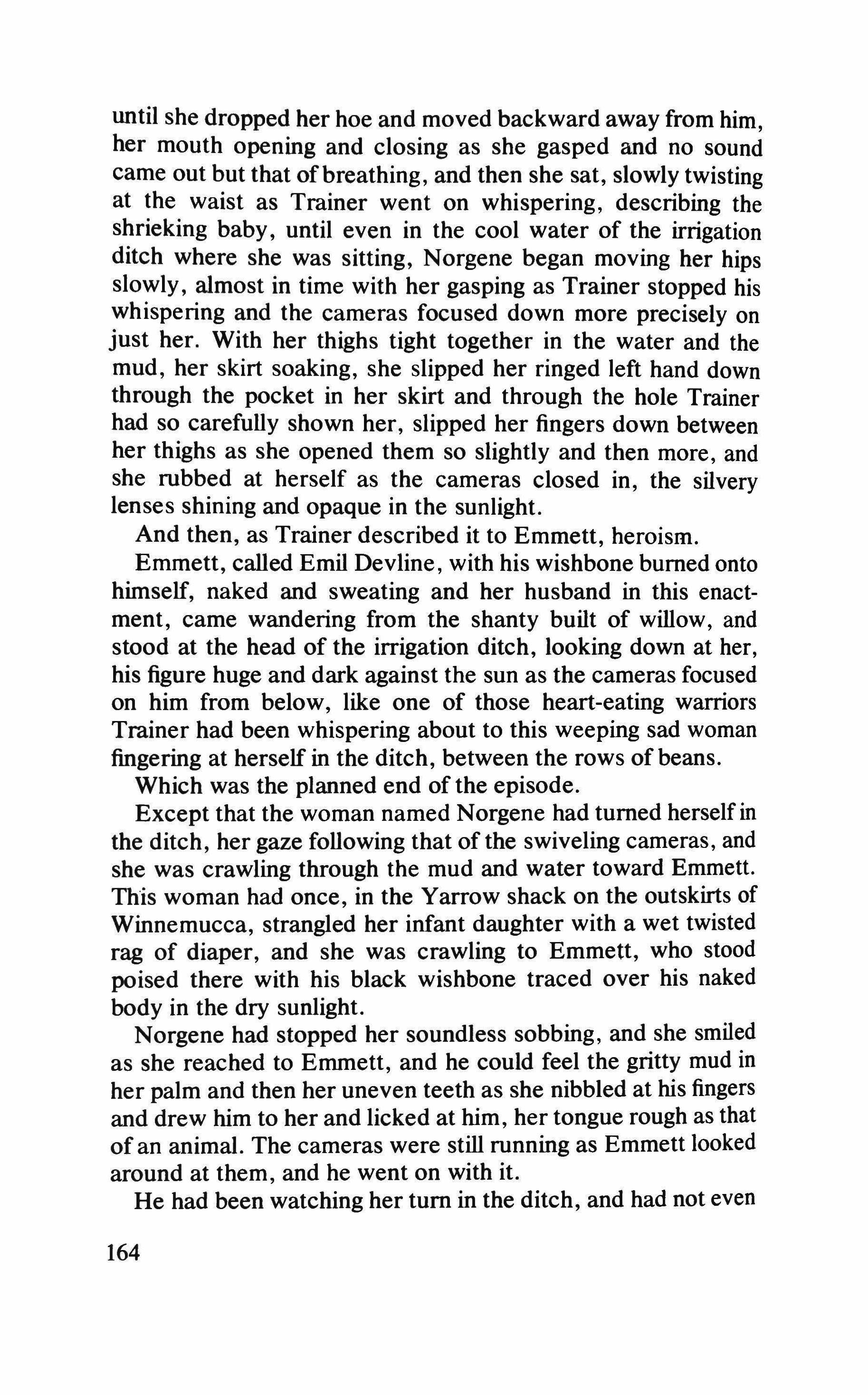
until she dropped her hoe and moved backward away from him, her mouth opening and closing as she gasped and no sound came out but that ofbreathing , and then she sat, slowly twisting at the waist as Trainer went on whispering, describing the shrieking baby, until even in the cool water of the irrigation ditch where she was sitting, Norgene began moving her hips slowly, almost in time with her gasping as Trainer stopped his Whispering and the cameras focused down more precisely on just her. With her thighs tight together in the water and the mud, her skirt soaking, she slipped her ringed left hand down through the pocket in her skirt and through the hole Trainer had so carefully shown her, slipped her fingers down between her thighs as she opened them so slightly and then more, and she rubbed at herself as the cameras closed in, the silvery lenses shining and opaque in the sunlight.
And then, as Trainer described it to Emmett, heroism.
Emmett, called Emil Devline, with his wishbone burned onto himself, naked and sweating and her husband in this enactment, came wandering from the shanty built of willow, and stood at the head of the irrigation ditch, looking down at her, his figure huge and dark against the sun as the cameras focused on him from below, like one of those heart-eating warriors Trainer had been whispering about to this weeping sad woman fingering at herself in the ditch, between the rows of beans.
Which was the planned end of the episode.
Except that the woman named Norgene had turned herself in the ditch, her gaze following that of the swiveling cameras, and she was crawling through the mud and water toward Emmett. This woman had once, in the Yarrow shack on the outskirts of Winnemucca, strangled her infant daughter with a wet twisted rag of diaper, and she was crawling to Emmett, who stood poised there with his black wishbone traced over his naked body in the dry sunlight.
Norgene had stopped her soundless sobbing, and she smiled as she reached to Emmett, and he could feel the gritty mud in her palm and then her uneven teeth as she nibbled at his fingers and drew him to her and licked at him, her tongue rough as that of an animal. The cameras were still running as Emmett looked around at them, and he went on with it.
He had been watching her tum in the ditch, and had not even
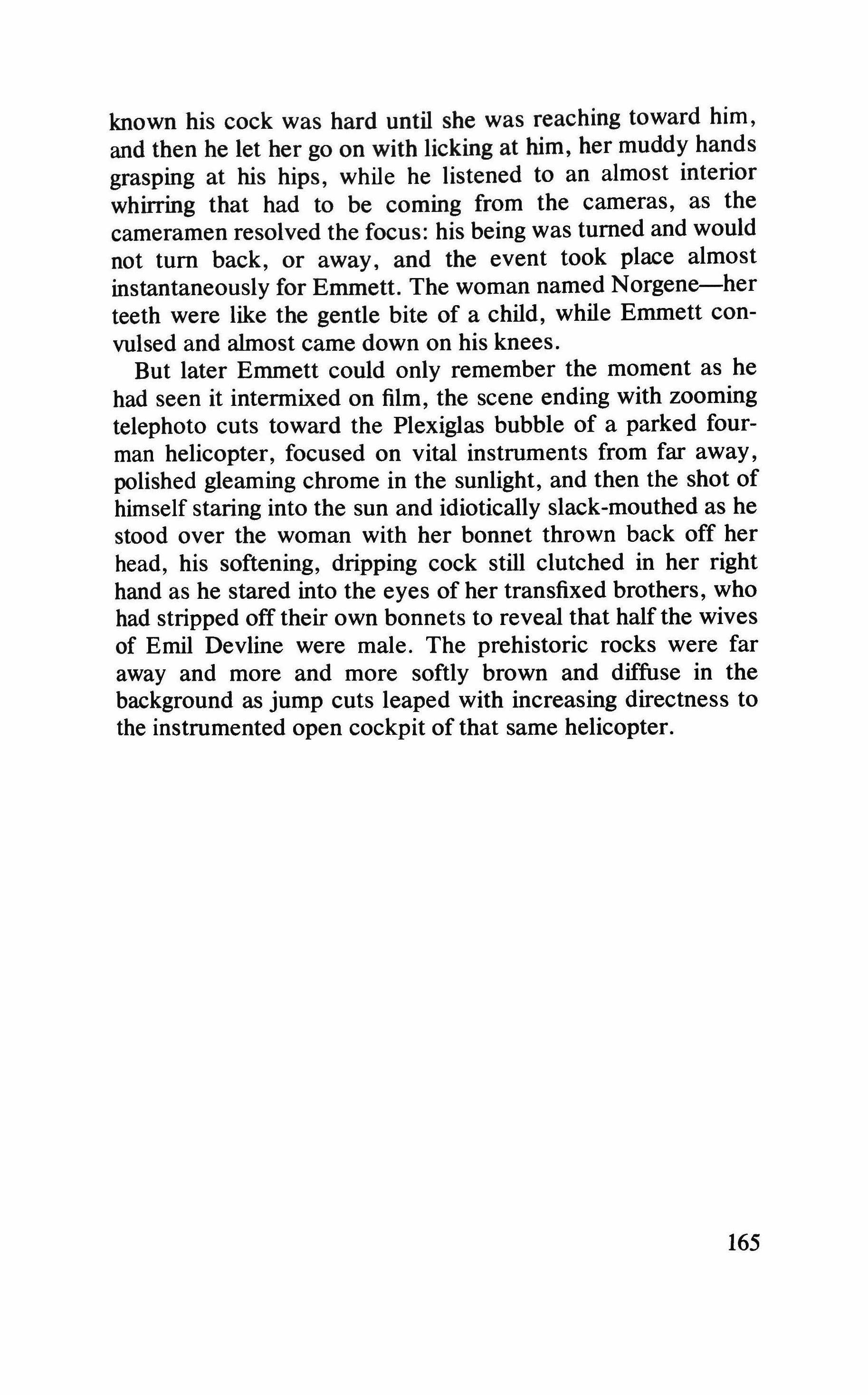
known his cock was hard until she was reaching toward him, and then he let her go on with licking at him, her muddy hands grasping at his hips, while he listened to an almost interior whirring that had to be coming from the cameras, as the cameramen resolved the focus: his being was turned and would not tum back, or away. and the event took place almost instantaneously for Emmett. The woman named Norgene-her teeth were like the gentle bite of a child, while Emmett convulsed and almost came down on his knees.
But later Emmett could only remember the moment as he had seen it intermixed on film, the scene ending with zooming telephoto cuts toward the Plexiglas bubble of a parked fourman helicopter, focused on vital instruments from far away, polished gleaming chrome in the sunlight, and then the shot of himself staring into the sun and idiotically slack-mouthed as he stood over the woman with her bonnet thrown back off her head, his softening, dripping cock still clutched in her right hand as he stared into the eyes of her transfixed brothers, who had stripped off their own bonnets to reveal that half the wives of Emil Devline were male. The prehistoric rocks were far away and more and more softly brown and diffuse in the background as jump cuts leaped with increasing directness to the instrumented open cockpit of that same helicopter.
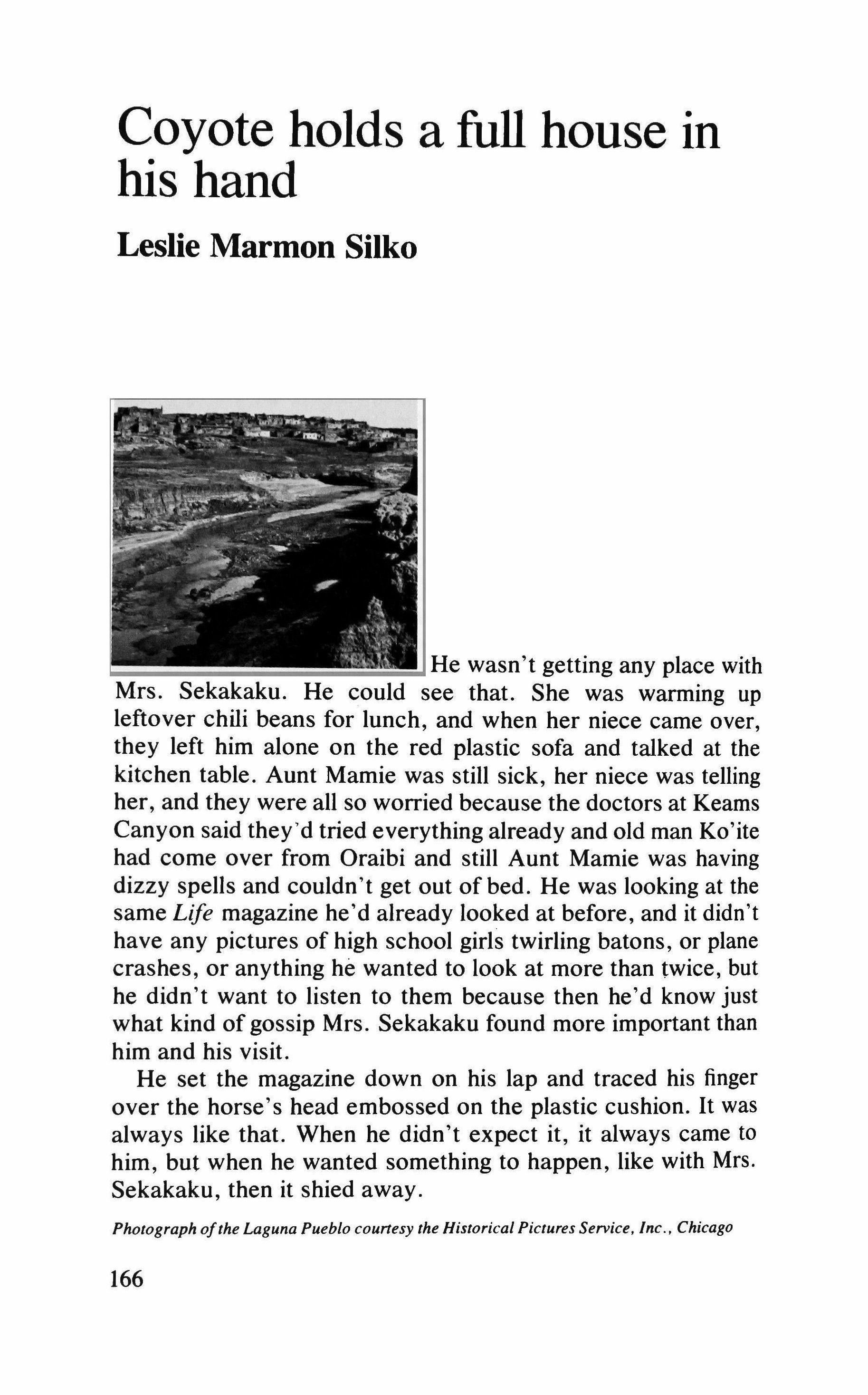
iiiiiiiiiiiiiiiiiiiiiiiiiiiiii_ He wasn't getting any place with Mrs. Sekakaku. He could see that. She was warming up leftover chili beans for lunch, and when her niece came over, they left him alone on the red plastic sofa and talked at the kitchen table. Aunt Mamie was still sick, her niece was telling her, and they were all so worried because the doctors at Keams Canyon said they'd tried everything already and old man Ko'ite had come over from Oraibi and still Aunt Mamie was having dizzy spells and couldn't get out of bed. He was looking at the same Life magazine he'd already looked at before, and it didn't have any pictures of high school girls twirling batons, or plane crashes, or anything he wanted to look at more than twice, but he didn't want to listen to them because then he'd know just what kind of gossip Mrs. Sekakaku found more important than him and his visit.
He set the magazine down on his lap and traced his finger over the horse's head embossed on the plastic cushion. It was always like that. When he didn't expect it, it always came to him, but when he wanted something to happen, like with Mrs. Sekakaku, then it shied away.
Photograph ofthe Laguna Pueblo courtesy the Historical Pictures Service. Inc Chicago

Mrs. Sekakaku's letters had made the comer of the trading post where the mailboxes were smell like the perfume counter at Woolworth's. The Mexican woman with the fat arms was the postmaster and ran the trading post. She didn't approve of perfumed letters and she used to pretend the letters weren't there, even when he could smell them and see their pastel edges sticking out ofthe pile in the general delivery slot. The Mexican woman thought Pueblo men were great lovers. He knew this because he heard her say so to another Mexican woman one day while he was finishing his strawberry soda on the other side of the dry-goods section. In the summer he spent a good number of hours there watching her because she wore sleeveless blouses that revealed her fat upper arms, full and round, and the tender underarm creases curving to her breasts. They had not noticed he was still there, leaning on the counter behind a pile ofoveralls. The size of a horse" was all that he had heard, but he knew what she was talking about. They were all like that, those Mexican women. That was all they talked about when they were alone. "As big as a horse"-he knew that much Spanish and more too, but she had never treated him nice, not even when he brought her the heart-shaped box of candy, having carried it on the bus all the way from Albuquerque. He didn't think it was his being older than her; she was over thirty herself. It was because she didn't approve of men who drank. That was the last thing he did before he left town; he did it because he had to. Liquor was illegal on the reservation, so the last thing he did was have a few drinks to carry home with him, the same way other people stocked up on lamb nipples or extra matches. She must have smelled it on his breath when he handed her the candy because she didn't say anything and she left the box under the counter by the old newspapers and balls of string. The cellophane was never opened, and the fine gray dust that covered everything in the store finally settled on the pink satin bow. The postmaster was jealous of the letters that were coming, but she was the one who had sent him into the arms of Mrs. Sekakaku.
In her last two letters Mrs. Sekakaku had been hinting around for him to come see her at Bean Dance time. That was after Christmas when he had sent a big poinsettia plant all the way to Second Mesa on the mail bus. Up until then she had

never answered the parts in his letters where he said he wished he could see the beautiful Hopi mesas with snow on them. But that had been the first time a potted plant ever rode into Hopi on the mail bus, and Mrs. Sekakaku finally realized the kind of man he was. All along, that had been the trouble at Laguna: nobody understood just what kind of man he was. They thought he was sort of good-for-nothing, he knew that, but for a long time he kept telling himself to keep on trying and trying. But it seemed like people would never forget the time the whole village was called out to clean up for feast day and he sent his mother to tell them he was sick with liver trouble. He was still hurt because they didn't understand that with liver trouble you can walk around and sometimes even ride the bus to Albuquerque. Everyone was jealous of him and they didn't stop to think how much it meant to his mother to have someone living with her in her old age. All they could talk about was the big COD that came to the post office in his name and she cashed her pension check to pay for it. But she was the one who had told him, "Sonny Boy, if you want that jacket, you go ahead and order it." It was made out of brown vinyl, resembling leather, and he still wore it whenever he went to town. Even on the day she had the last stroke, his two older brothers had been telling her to quit paying his bills for him and to make him get out and live on his own. But she always stood up for him in front of the others, even if she did complain privately at times to her nieces, who then scolded him about the bills from the record club and the correspondence school. He always knew he could be a lawyer; he had listened to the lawyers in the courtrooms of the Federal Building on those hot summer afternoons when he needed a cool place to sit while he waited for the bus to Laguna. He listened and he knew he could be a lawyer because he was so good at making up stories to justify why things happened the way they did. He thought correspondence school would be different from Indian school, which had given him stomachaches and made him run away all through his seventh-grade year. Right after that he had cut his foot pretty bad, chopping wood for his older brother's wife-the one who kept brushing her arms across his shoulders whenever she poured coffee at the supper table. The foot had taken so long to heal that his mother agreed he shouldn't go back to Indian school or chop wood any more. A few months after that, they

were all swimming at the river and he hurt his back in a dive off the old wooden bridge, so it was no wonder he couldn't do the same work as the other young men.
When Mildred told him she was marrying that Hopi, he didn't try to stop her, although she stood there for a long time like she was waiting for him to say something. He liked things just the way they were down along the river after dark. Her mother and aunts owned so many fields they expected a husband to hoe them, and he had already promised his mother he wouldn't leave her alone in her old age. He thought it would be easier this way, but after Mildred's wedding, people who had seen him and Mildred together started joking about how he had lost out to a Hopi.
Hopi men were famous for their fast hands and the way they could go on all night. But some ofthejokes hinted that he himself was as lazy at lovemaking as he was with his shovel during spring ditch cleaning, and that he would take a girlfriend to the deep sand along the river so he could lie on the bottom while she worked on top. Later on, some of the old men took him aside and said he shouldn't feel bad about Mildred, and told him about women they'd lost to Hopis when they were all working on the railroad together in Winslow. Women believed the stories about Hopi men, they told him, because women liked the sound of those stories, and the women didn't care if it was the Hopi men who were making up the stories in the first place. So when he finally found himself riding the Greyhound bus into Winslow on his way to see Mrs. Sekakaku and the Bean Dance he got to thinking about those stories about Hopi men. It had been years since Mildred had married that Hopi, and her aunts and her mother kept the man working in their fields all year round. Even Laguna people said "Poor thing" whenever they saw the Hopi man walking past with a shovel on his shoulder. So he knew he wasn't going because of that-he was going because of Mrs. Sekakaku's letters and because it was lonely living in a place where no one appreciates you even when you keep trying and trying. At Hopi he could get a fresh start; he could tell people about himself while they looked at the photos in the plastic pages of his wallet.
He waited for the mail bus and drank a cup of coffee in the
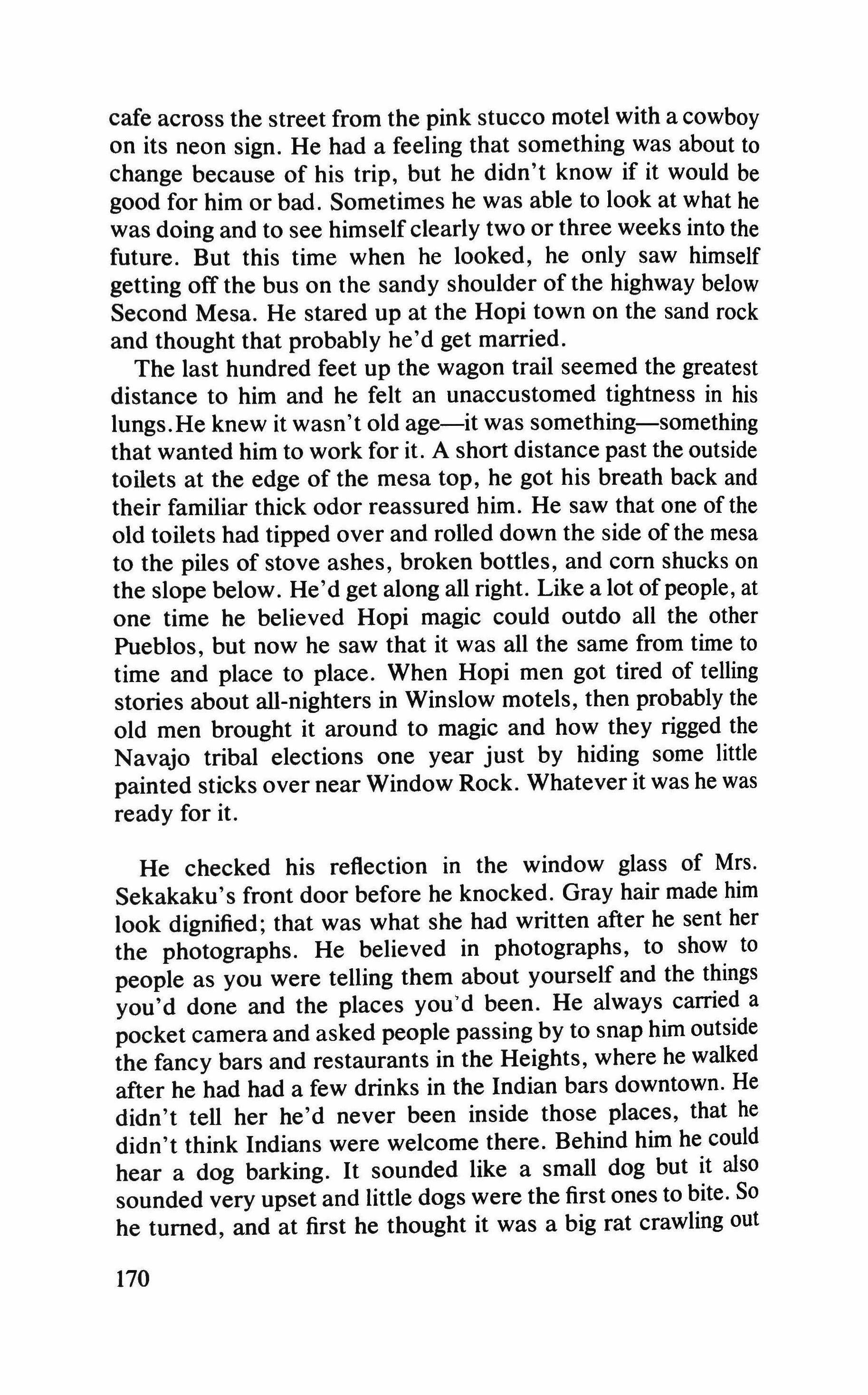
cafe across the street from the pink stucco motel with a cowboy on its neon sign. He had a feeling that something was about to change because of his trip, but he didn't know if it would be good for him or bad. Sometimes he was able to look at what he was doing and to see himself clearly two or three weeks into the future. But this time when he looked, he only saw himself getting off the bus on the sandy shoulder of the highway below Second Mesa. He stared up at the Hopi town on the sand rock and thought that probably he'd get married.
The last hundred feet up the wagon trail seemed the greatest distance to him and he felt an unaccustomed tightness in his lungs.He knew it wasn't old age-it was something-something that wanted him to work for it. A short distance past the outside toilets at the edge of the mesa top, he got his breath back and their familiar thick odor reassured him. He saw that one of the old toilets had tipped over and rolled down the side of the mesa to the piles of stove ashes, broken bottles, and com shucks on the slope below. He'd get along all right. Like a lot ofpeople, at one time he believed Hopi magic could outdo all the other Pueblos, but now he saw that it was all the same from time to time and place to place. When Hopi men got tired of telling stories about all-nighters in Winslow motels, then probably the old men brought it around to magic and how they rigged the Navajo tribal elections one year just by hiding some little painted sticks over near Window Rock. Whatever it was he was ready for it.
He checked his reflection in the window glass of Mrs. Sekakaku's front door before he knocked. Gray hair made him look dignified; that was what she had written after he sent her the photographs. He believed in photographs, to show to people as you were telling them about yourself and the things you'd done and the places you'd been. He always carried a pocket camera and asked people passing by to snap him outside the fancy bars and restaurants in the Heights, where he walked after he had had a few drinks in the Indian bars downtown. He didn't tell her he'd never been inside those places, that he didn't think Indians were welcome there. Behind him he could hear a dog barking. It sounded like a small dog but it also sounded very upset and little dogs were the first ones to bite. So he turned, and at first he thought it was a big rat crawling out
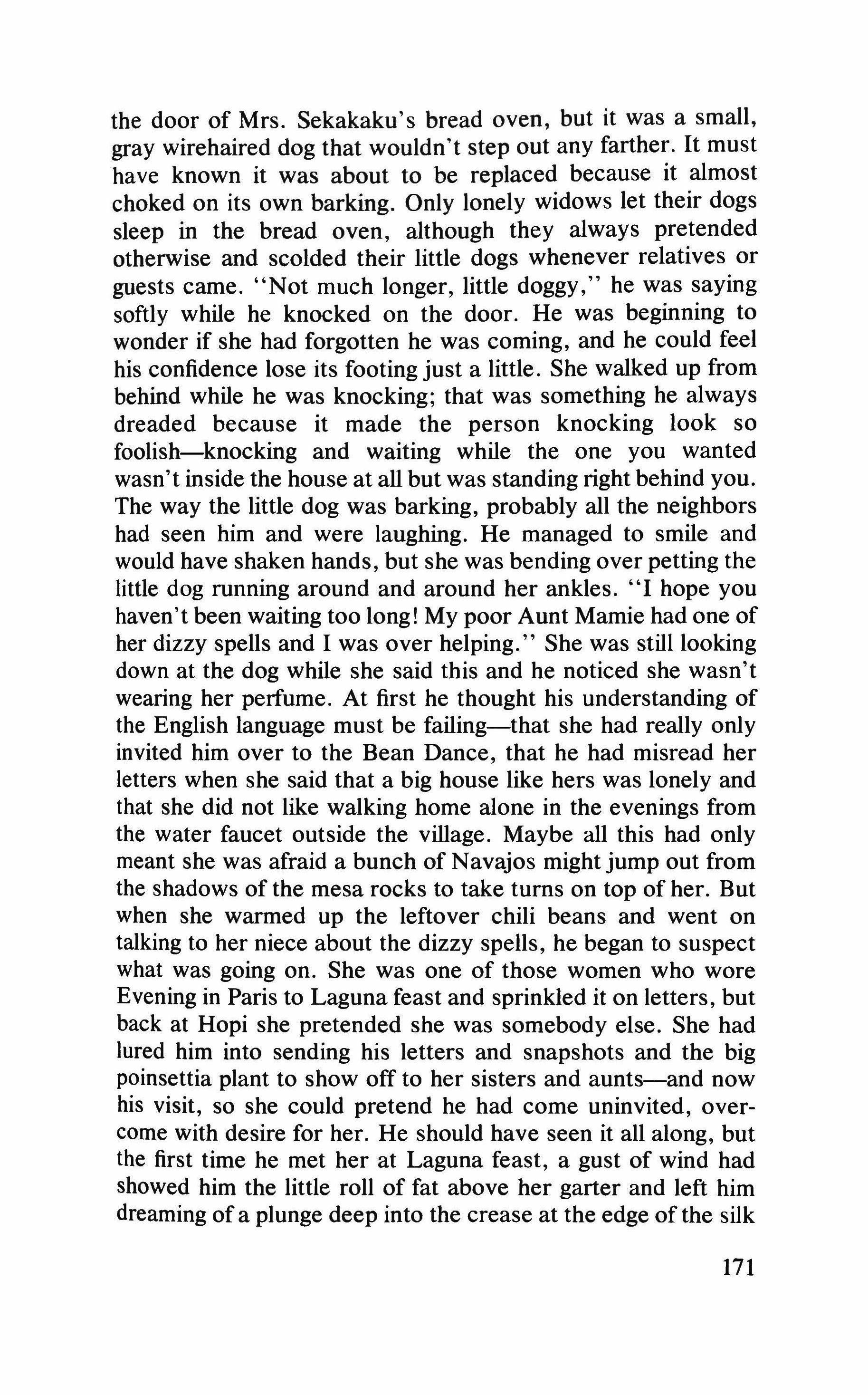
the door of Mrs. Sekakaku's bread oven, but it was a small, gray wirehaired dog that wouldn't step out any farther. It must have known it was about to be replaced because it almost choked on its own barking. Only lonely widows let their dogs sleep in the bread oven, although they always pretended otherwise and scolded their little dogs whenever relatives or guests came. "Not much longer, little doggy," he was saying softly while he knocked on the door. He was beginning to wonder if she had forgotten he was coming, and he could feel his confidence lose its footing just a little. She walked up from behind while he was knocking; that was something he always dreaded because it made the person knocking look so foolish-knocking and waiting while the one you wanted wasn't inside the house at all but was standing right behind you. The way the little dog was barking, probably all the neighbors had seen him and were laughing. He managed to smile and would have shaken hands, but she was bending over petting the little dog running around and around her ankles. "I hope you haven't been waiting too long! My poor Aunt Mamie had one of her dizzy spells and I was over helping." She was still looking down at the dog while she said this and he noticed she wasn't wearing her perfume. At first he thought his understanding of the English language must be failing-that she had really only invited him over to the Bean Dance, that he had misread her letters when she said that a big house like hers was lonely and that she did not like walking home alone in the evenings from the water faucet outside the village. Maybe all this had only meant she was afraid a bunch of Navajos mightjump out from the shadows of the mesa rocks to take turns on top of her. But when she warmed up the leftover chili beans and went on talking to her niece about the dizzy spells, he began to suspect what was going on. She was one of those women who wore Evening in Paris to Laguna feast and sprinkled it on letters, but back at Hopi she pretended she was somebody else. She had lured him into sending his letters and snapshots and the big poinsettia plant to show off to her sisters and aunts-and now his visit, so she could pretend he had come uninvited, overcome with desire for her. He should have seen it all along, but the first time he met her at Laguna feast, a gust of wind had showed him the little roll of fat above her garter and left him dreaming of a plunge deep into the crease at the edge of the silk
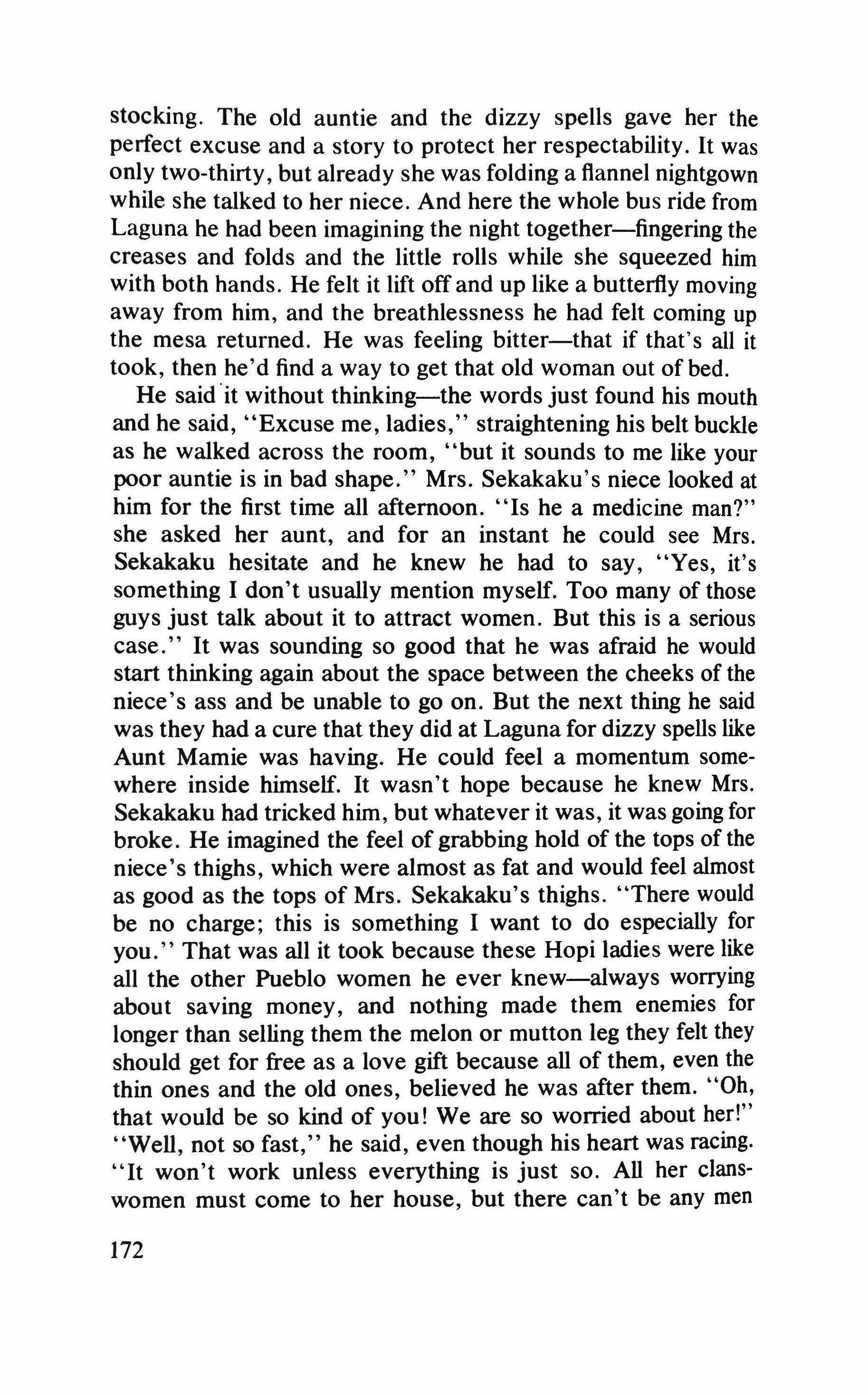
stocking. The old auntie and the dizzy spells gave her the perfect excuse and a story to protect her respectability. It was only two-thirty, but already she was folding a flannel nightgown while she talked to her niece. And here the whole bus ride from Laguna he had been imagining the night together-fingering the creases and folds and the little rolls while she squeezed him with both hands. He felt it lift off and up like a butterfly moving away from him, and the breathlessness he had felt coming up the mesa returned. He was feeling bitter-that if that's all it took, then he'd find a way to get that old woman out of bed. He said 'it without thinking-the words just found his mouth and he said, "Excuse me, ladies," straightening his belt buckle as he walked across the room, "but it sounds to me like your poor auntie is in bad shape." Mrs. Sekakaku's niece looked at him for the first time all afternoon. "Is he a medicine man?" she asked her aunt, and for an instant he could see Mrs. Sekakaku hesitate and he knew he had to say, "Yes, it's something I don't usually mention myself. Too many of those guys just talk about it to attract women. But this is a serious case." It was sounding so good that he was afraid he would start thinking again about the space between the cheeks of the niece's ass and be unable to go on. But the next thing he said was they had a cure that they did at Laguna for dizzy spells like Aunt Mamie was having. He could feel a momentum somewhere inside himself. It wasn't hope because he knew Mrs. Sekakaku had tricked him, but whatever it was, it was going for broke. He imagined the feel of grabbing hold of the tops of the niece's thighs, which were almost as fat and would feel almost as good as the tops of Mrs. Sekakaku's thighs. "There would be no charge; this is something I want to do especially for you." That was all it took because these Hopi ladies were like all the other Pueblo women he ever knew-always worrying about saving money, and nothing made them enemies for longer than selling them the melon or mutton leg they felt they should get for free as a love gift because all of them, even the thin ones and the old ones, believed he was after them. "Oh, that would be so kind of you! We are so worried about her!" "Well, not so fast," he said, even though his heart was racing. "It won't work unless everything is just so. All her c1answomen must come to her house, but there can't be any men
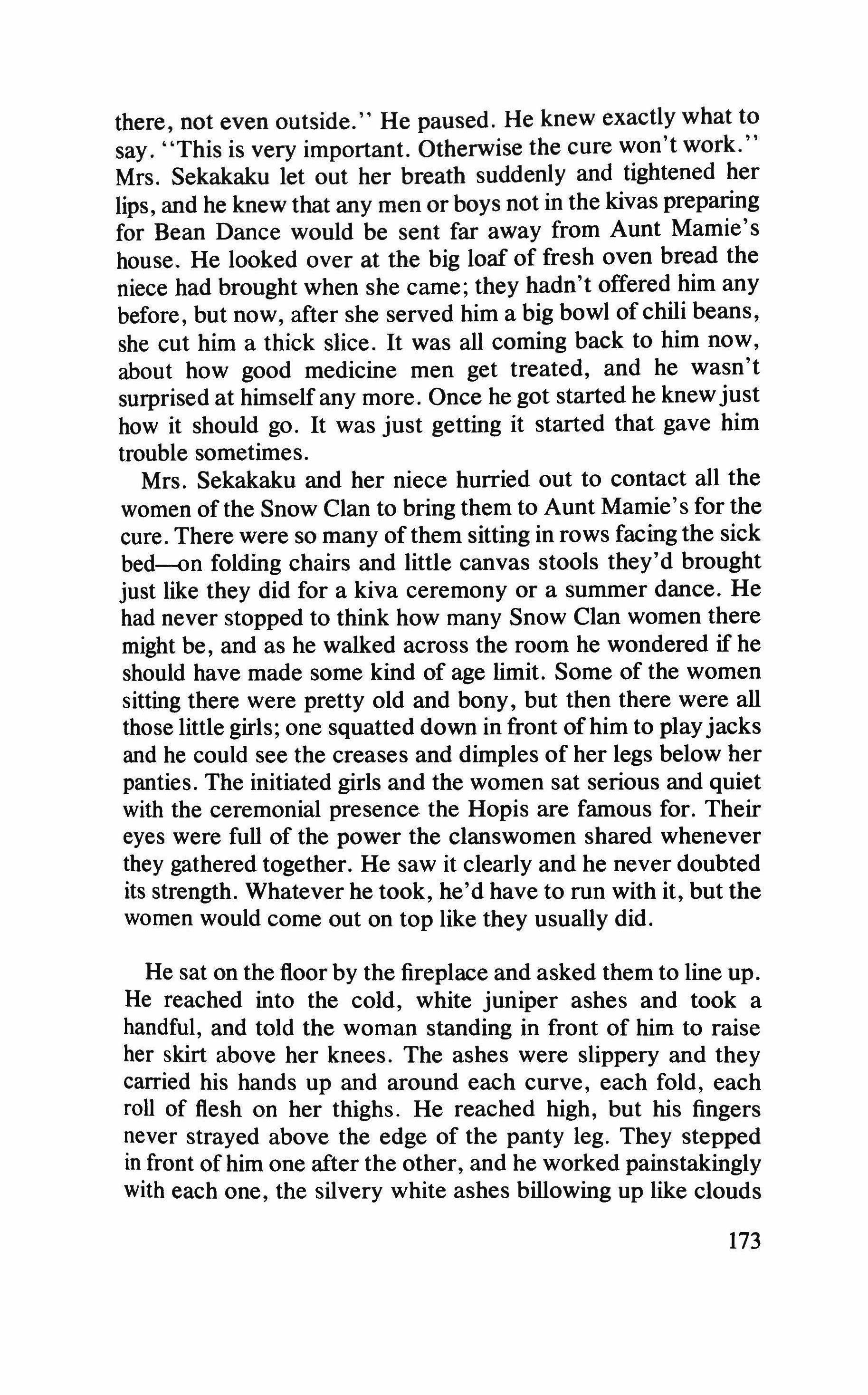
there, not even outside." He paused. He knew exactly what to say. "This is very important. Otherwise the cure won't work. Mrs. Sekakaku let out her breath suddenly and tightened her lips, and he knew that any men or boys not in the kivas preparing for Bean Dance would be sent far away from Aunt Mamie's house. He looked over at the big loaf of fresh oven bread the niece had brought when she came; they hadn't offered him any before, but now, after she served him a big bowl of chili beans, she cut him a thick slice. It was all coming back to him now, about how good medicine men get treated, and he wasn't surprised at himself any more. Once he got started he knewjust how it should go. It was just getting it started that gave him trouble sometimes.
Mrs. Sekakaku and her niece hurried out to contact all the women ofthe Snow Clan to bring them to Aunt Mamie's for the cure. There were so many of them sitting in rows facing the sick bed-<m folding chairs and little canvas stools they'd brought just like they did for a kiva ceremony or a summer dance. He had never stopped to think how many Snow Clan women there might be, and as he walked across the room he wondered if he should have made some kind of age limit. Some of the women sitting there were pretty old and bony, but then there were all those little girls; one squatted down in front of him to playjacks and he could see the creases and dimples of her legs below her panties. The initiated girls and the women sat serious and quiet with the ceremonial presence the Hopis are famous for. Their eyes were full of the power the clanswomen shared whenever they gathered together. He saw it clearly and he never doubted its strength. Whatever he took, he'd have to run with it, but the women would come out on top like they usually did.
He sat on the floor by the fireplace and asked them to line up. He reached into the cold, white juniper ashes and took a handful, and told the woman standing in front of him to raise her skirt above her knees. The ashes were slippery and they carried his hands up and around each curve, each fold, each roll of flesh on her thighs. He reached high, but his fingers never strayed above the edge of the panty leg. They stepped in front of him one after the other, and he worked painstakingly with each one, the silvery white ashes billowing up like clouds
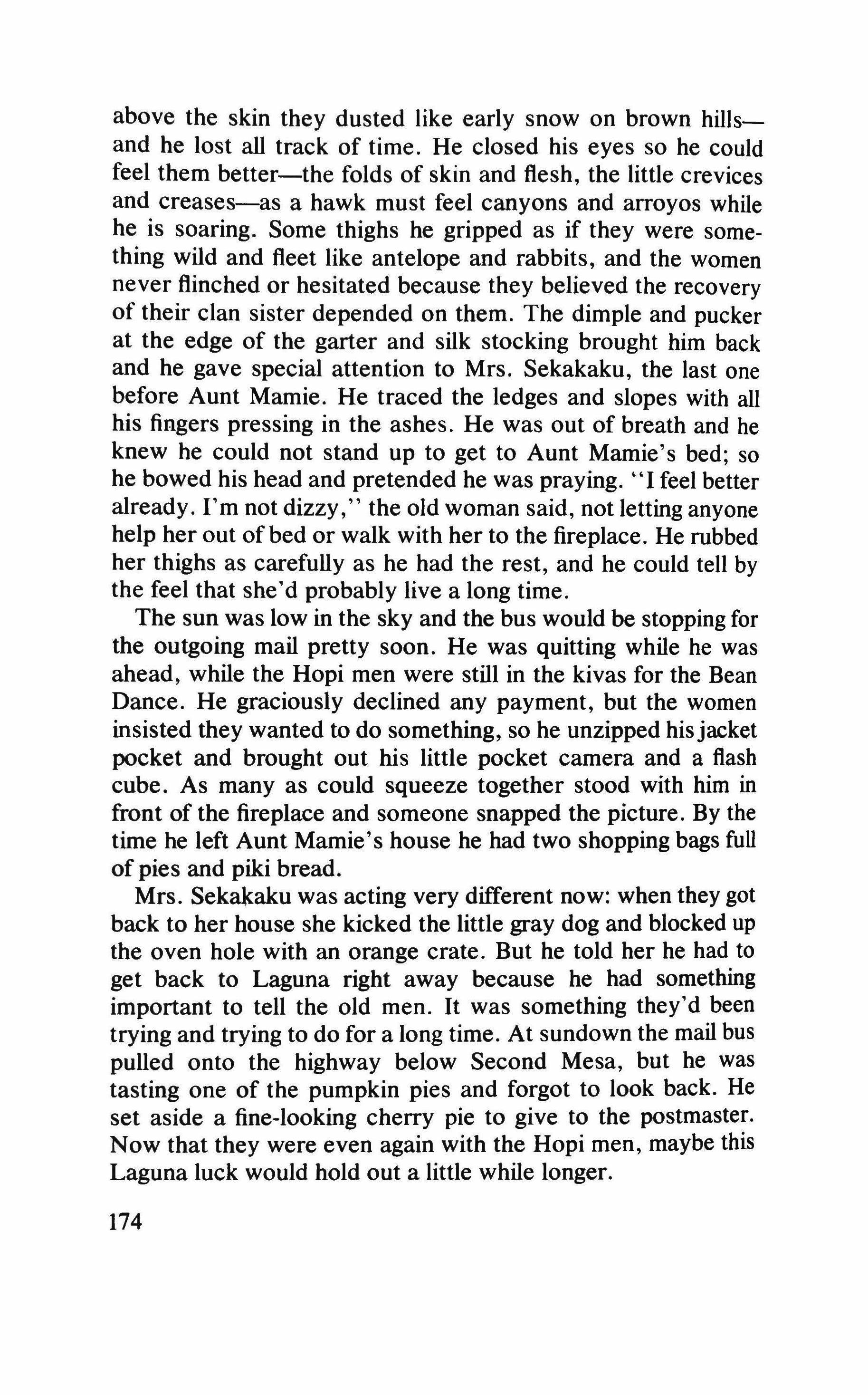
above the skin they dusted like early snow on brown hillsand he lost all track of time. He closed his eyes so he could feel them better-the folds of skin and flesh, the little crevices and creases-as a hawk must feel canyons and arroyos while he is soaring. Some thighs he gripped as if they were something wild and fleet like antelope and rabbits, and the women never flinched or hesitated because they believed the recovery of their clan sister depended on them. The dimple and pucker at the edge of the garter and silk stocking brought him back and he gave special attention to Mrs. Sekakaku, the last one before Aunt Mamie. He traced the ledges and slopes with all his fingers pressing in the ashes. He was out of breath and he knew he could not stand up to get to Aunt Mamie's bed; so he bowed his head and pretended he was praying.••I feel better already. I'm not dizzy," the old woman said, not letting anyone help her out of bed or walk with her to the fireplace. He rubbed her thighs as carefully as he had the rest, and he could tell by the feel that she'd probably live a long time.
The sun was low in the sky and the bus would be stopping for the outgoing mail pretty soon. He was quitting while he was ahead, while the Hopi men were still in the kivas for the Bean Dance. He graciously declined any payment, but the women insisted they wanted to do something, so he unzipped hisjacket pocket and brought out his little pocket camera and a flash cube. As many as could squeeze together stood with him in front of the fireplace and someone snapped the picture. By the time he left Aunt Mamie's house he had two shopping bags full of pies and piki bread.
Mrs. Sekakaku was acting very different now: when they got back to her house she kicked the little gray dog and blocked up the oven hole with an orange crate. But he told her he had to get back to Laguna right away because he had something important to tell the old men. It was something they'd been trying and trying to do for a long time. At sundown the mail bus pulled onto the highway below Second Mesa, but he was tasting one of the pumpkin pies and forgot to look back. He set aside a fine-looking cherry pie to give to the postmaster. Now that they were even again with the Hopi men, maybe this Laguna luck would hold out a little while longer.
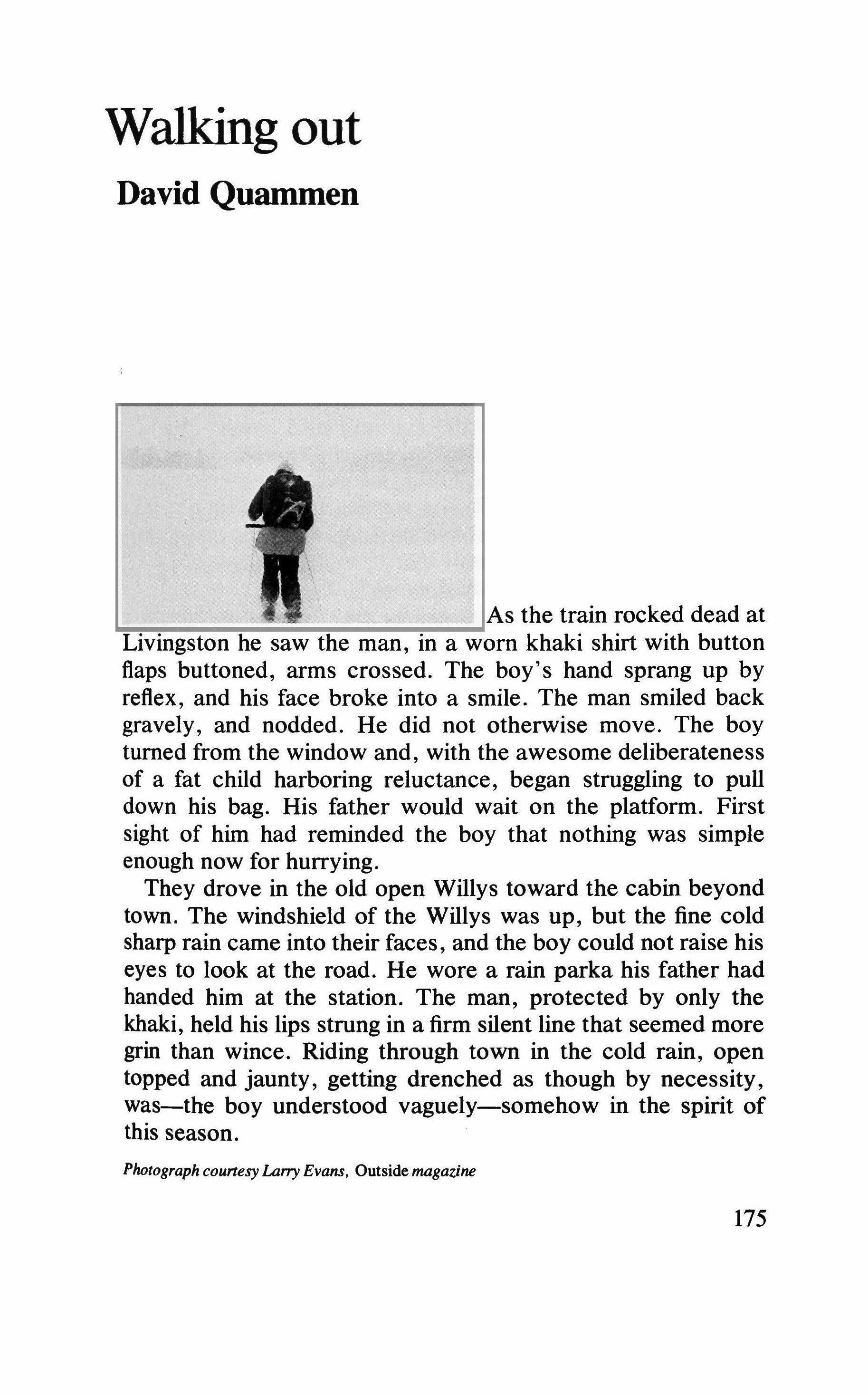
As the train rocked dead at ��--�����������
Livingston he saw the man, in a worn khaki shirt with button flaps buttoned, arms crossed. The boy's hand sprang up by reflex, and his face broke into a smile. The man smiled back gravely, and nodded. He did not otherwise move. The boy turned from the window and, with the awesome deliberateness of a fat child harboring reluctance, began struggling to pull down his bag. His father would wait on the platform. First sight of him had reminded the boy that nothing was simple enough now for hurrying.
They drove in the old open Willys toward the cabin beyond town. The windshield of the Willys was up, but the fine cold sharp rain came into their faces, and the boy could not raise his eyes to look at the road. He wore a rain parka his father had handed him at the station. The man, protected by only the khaki, held his lips strung in a firm silent line that seemed more grin than wince. Riding through town in the cold rain, open topped and jaunty, getting drenched as though by necessity, was-the boy understood vaguely-somehow in the spirit of this season.
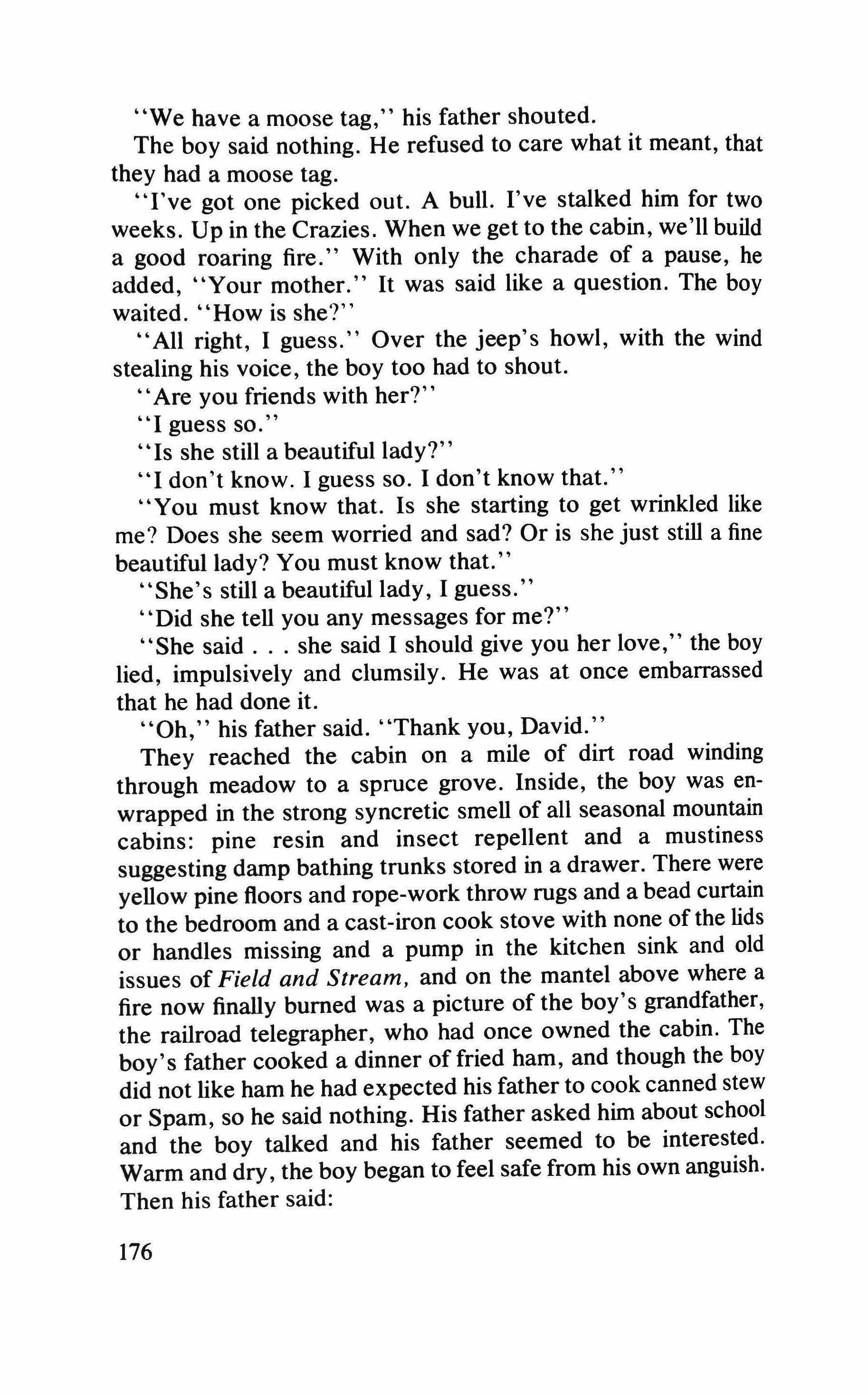
"We have a moose tag," his father shouted. The boy said nothing. He refused to care what it meant, that they had a moose tag.
"Tve got one picked out. A bull. I've stalked him for two weeks. Up in the Crazies. When we get to the cabin, we'll build a good roaring fire." With only the charade of a pause, he added, "Your mother." It was said like a question. The boy waited. "How is she?"
"All right, I guess." Over the jeep's howl, with the wind stealing his voice, the boy too had to shout.
"Are you friends with her?"
"I guess so."
"Is she still a beautiful lady?"
"I don't know. I guess so. I don't know that."
"You must know that. Is she starting to get wrinkled like me? Does she seem worried and sad? Or is she just still a fine beautiful lady? You must know that.
"She's still a beautiful lady I guess."
"Did she tell you any messages for me?"
"She said she said I should give you her love," the boy lied, impulsively and clumsily. He was at once embarrassed that he had done it.
"Oh," his father said. "Thank you, David."
They reached the cabin on a mile of dirt road winding through meadow to a spruce grove. Inside, the boy was enwrapped in the strong syncretic smell of all seasonal mountain cabins: pine resin and insect repellent and a mustiness suggesting damp bathing trunks stored in a drawer. There were yellow pine floors and rope-work throw rugs and a bead curtain to the bedroom and a cast-iron cook stove with none of the lids or handles missing and a pump in the kitchen sink and old issues of Field and Stream, and on the mantel above where a fire now finally burned was a picture of the boy's grandfather, the railroad telegrapher, who had once owned the cabin. The boy's father cooked a dinner of fried ham, and though the boy did not like ham he had expected his father to cook canned stew or Spam, so he said nothing. His father asked him about school and the boy talked and his father seemed to be interested. Warm and dry, the boy began to feel safe from his own anguish. Then his father said:
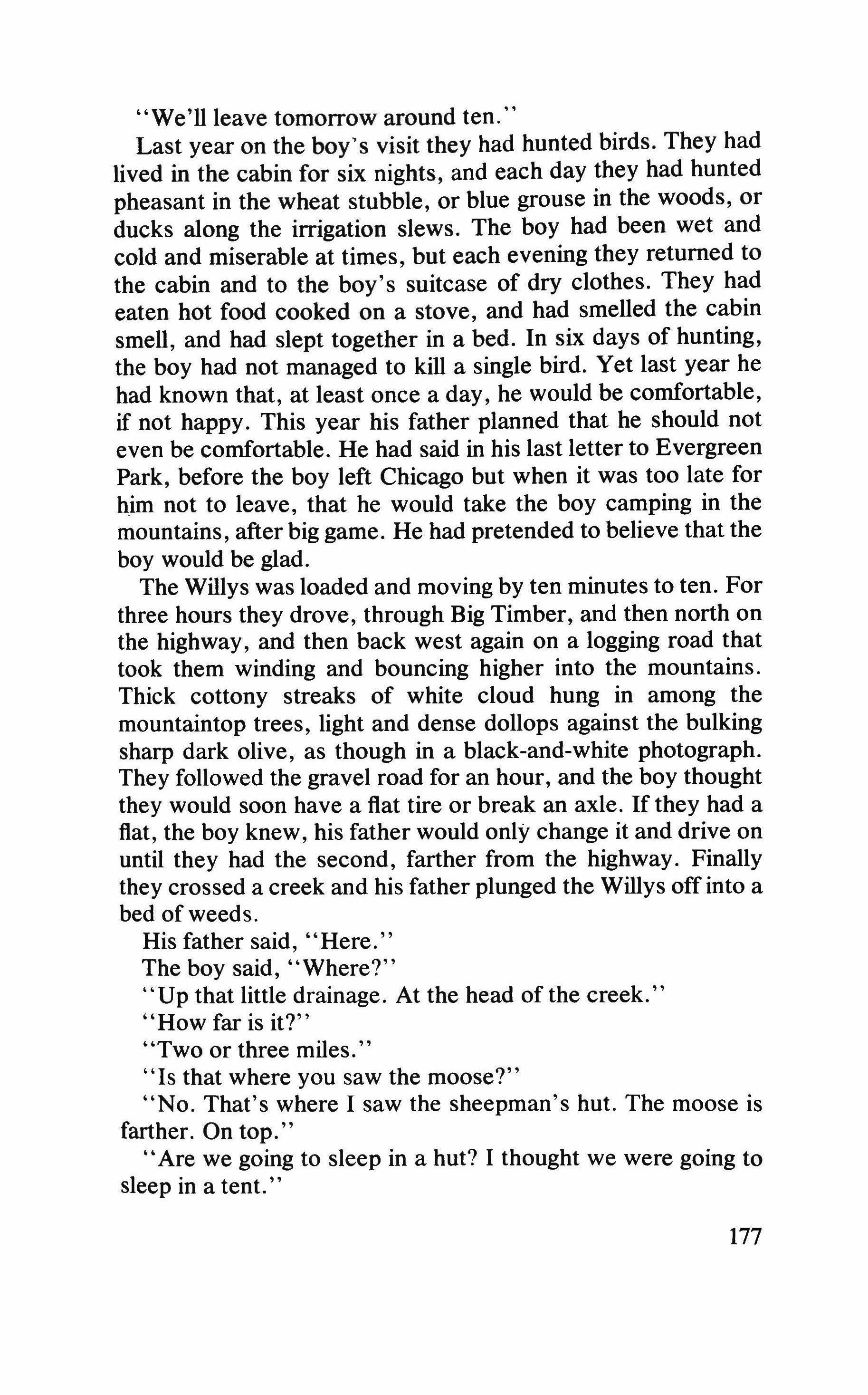
"We'lJ leave tomorrow around ten."
Last year on the boy's visit they had hunted birds. They had lived in the cabin for six nights, and each day they had hunted pheasant in the wheat stubble, or blue grouse in the woods, or ducks along the irrigation slews. The boy had been wet and cold and miserable at times, but each evening they returned to the cabin and to the boy's suitcase of dry clothes. They had eaten hot food cooked on a stove, and had smelled the cabin smell, and had slept together in a bed. In six days of hunting, the boy had not managed to kill a single bird. Yet last year he had known that, at least once a day, he would be comfortable, if not happy. This year his father planned that he should not even be comfortable. He had said in his last letter to Evergreen Park, before the boy left Chicago but when it was too late for him not to leave, that he would take the boy camping in the mountains, after big game. He had pretended to believe that the boy would be glad.
The Willys was loaded and moving by ten minutes to ten. For three hours they drove, through Big Timber, and then north on the highway, and then back west again on a logging road that took them winding and bouncing higher into the mountains. Thick cottony streaks of white cloud hung in among the mountaintop trees, light and dense dollops against the bulking sharp dark olive, as though in a black-and-white photograph. They followed the gravel road for an hour, and the boy thought they would soon have a flat tire or break an axle. If they had a fiat, the boy knew, his father would only change it and drive on until they had the second, farther from the highway. Finally they crossed a creek and his father plunged the Willys off into a bed of weeds.
His father said, "Here."
The boy said, "Where?"
Up that little drainage. At the head of the creek.
"How far is it?"
"Two or three miles."
"Is that where you saw the moose?"
"No. That's where I saw the sheepman's hut. The moose is farther. On top."
"Are we going to sleep in a hut? I thought we were going to sleep in a tent."

"No. Why should we carry a tent up there when we have a perfectly good hut?"
The boy couldn't answer that question. He thought now that this might be the time when he would cry. He had known it was coming.
"I don't much want to sleep in a hut," he said, and his voice broke with the simple honesty of it, and his eyes glazed. He held his mouth tight against the trembling.
As though something had broken in him too, the boy's father laid his forehead down on the steering wheel, against his knuckles. For a moment he remained bowed, breathing exhaustedly. But he looked up again before speaking.
"Well, we don't have to, David."
The boy said nothing.
"It's an old sheepman's hut made oflogs, and it's near where we're going to hunt, and we can fix it dry and good. I thought you might like that. I thought it might be more fun than a tent. But we don't have to do it. We can drive back to Big Timber and buy a tent, or we can drive back to the cabin and hunt birds, like last year. Whatever you want to do. You have to forgive me the kind of ideas I get. I hope you will. We don't have to do anything that you don't want to do."
"No," the boy said. "I want to."
"Are you sure?"
"No," the boy said. "But I just want to."
They bushwhacked along the creek, treading a thick soft mixture of moss and humus and needles, climbing upward through brush. Then the brush thinned and they were ascending an open creek bottom, thirty yards wide, darkened by fir and cedar. Farther, and they struck a trail, which led them upward along the creek. Farther still, and the trail received a branch, then another, then forked.
"Who made this trail? Did the sheepman?"
"No," his father said. "Deer and elk."
Gradually the creek's little canyon narrowed, steep wooded shoulders funneling closer on each side. For a while the game trails forked and converged like a maze, but soon again there were only two branches, and finally one, heavily worn. It dodged through alder and willow, skirting tangles of browned raspberry, so that the boy and his father could never see more
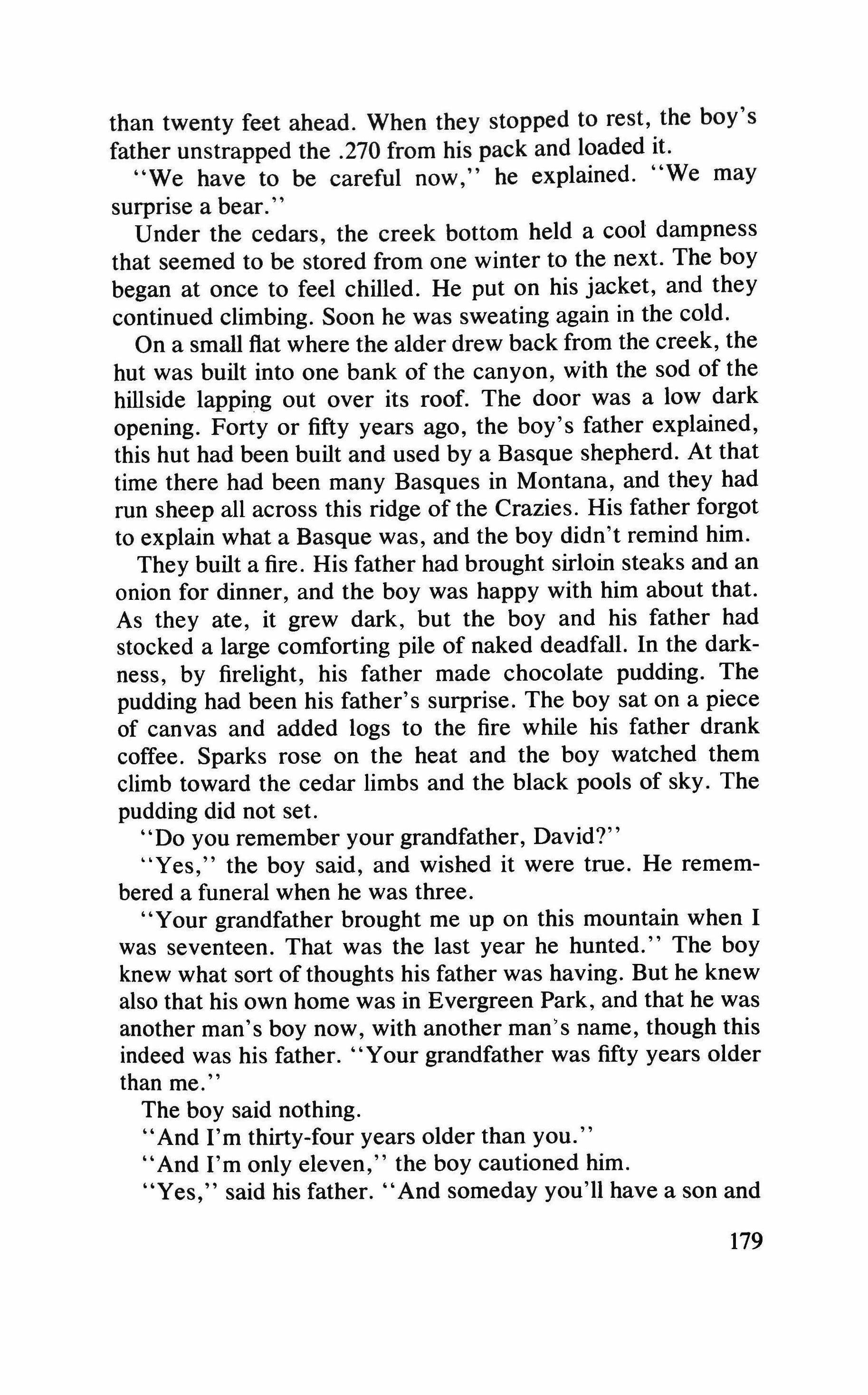
than twenty feet ahead. When they stopped to rest, the boy's father unstrapped the .270 from his pack and loaded it.
"We have to be careful now," he explained. "We may surprise a bear.
Under the cedars, the creek bottom held a cool dampness that seemed to be stored from one winter to the next. The boy began at once to feel chilled. He put on his jacket, and they continued climbing. Soon he was sweating again in the cold.
On a small flat where the alder drew back from the creek, the hut was built into one bank of the canyon, with the sod of the hillside lapping out over its roof. The door was a low dark opening. Forty or fifty years ago, the boy's father explained, this hut had been built and used by a Basque shepherd. At that time there had been many Basques in Montana, and they had run sheep all across this ridge of the Crazies. His father forgot to explain what a Basque was, and the boy didn't remind him.
They built a fire. His father had brought sirloin steaks and an onion for dinner, and the boy was happy with him about that. As they ate, it grew dark, but the boy and his father had stocked a large comforting pile of naked deadfall. In the darkness, by firelight, his father made chocolate pudding. The pudding had been his father's surprise. The boy sat on a piece of canvas and added logs to the fire while his father drank coffee. Sparks rose on the heat and the boy watched them climb toward the cedar limbs and the black pools of sky. The pudding did not set.
"Do you remember your grandfather, David?" "Yes," the boy said, and wished it were true. He remembered a funeral when he was three.
"Your grandfather brought me up on this mountain when I was seventeen. That was the last year he hunted." The boy knew what sort of thoughts his father was having. But he knew also that his own home was in Evergreen Park, and that he was another man's boy now, with another man's name, though this indeed was his father. "Your grandfather was fifty years older than me."
The boy said nothing.
"And I'm thirty-four years older than you."
"And I'm only eleven," the boy cautioned him. "Yes," said his father. "And someday you'll have a son and 179

you'll be forty years older than him, and you'll want so badly for him to know who you are that you could cry.
The boy was embarrassed.
"And that's called the cycle of life's infinite wisdom," his father said, and laughed at himself unpleasantly.
"What did he die of?" the boy asked, desperate to escape the focus of his father's rumination.
"He was eighty-seven then. Christ. He was tired." The boy's father went silent. Then he shook his head, and poured himself the remaining coffee.
Through that night the boy was never quite warm. He slept on his side with his knees drawn up, and this was uncomfortable but his body seemed to demand it for warmth. The hard cold mountain earth pressed upward through the mat of fir boughs his father had laid, and drew heat from the boy's body like a pallet of leeches. He clutched the bedroll around his neck and folded the empty part at the bottom back under his legs. Once he woke to a noise. Though his father was sleeping between him and the door of the hut, for a while the boy lay awake, listening worriedly, and then woke again on his back to realize time had passed. He heard droplets begin to hit the canvas his father had spread over the sod roof of the hut. But he remained dry.
He rose to the smell of a fire. The tarp was rigid with sleet and frost. The firewood and the knapsacks were frosted. It was that gray time of dawn before any blue and, through the branches above, the boy was unable to tell whether the sky was murky or clear. Delicate sheet ice hung on everything, but there was no wetness. The rain seemed to have been hushed by the cold.
"What time is it?"
"Early yet."
"How early?" The boy was thinking about the cold at home as he waited outside on 96th Street for his school bus. That was the cruelest moment of his day, but it seemed a benign and familiar part of him compared to this.
"Early. I don't have a watch. What difference does it make, David?"
"Not any."
After breakfast they began walking up the valley. His father
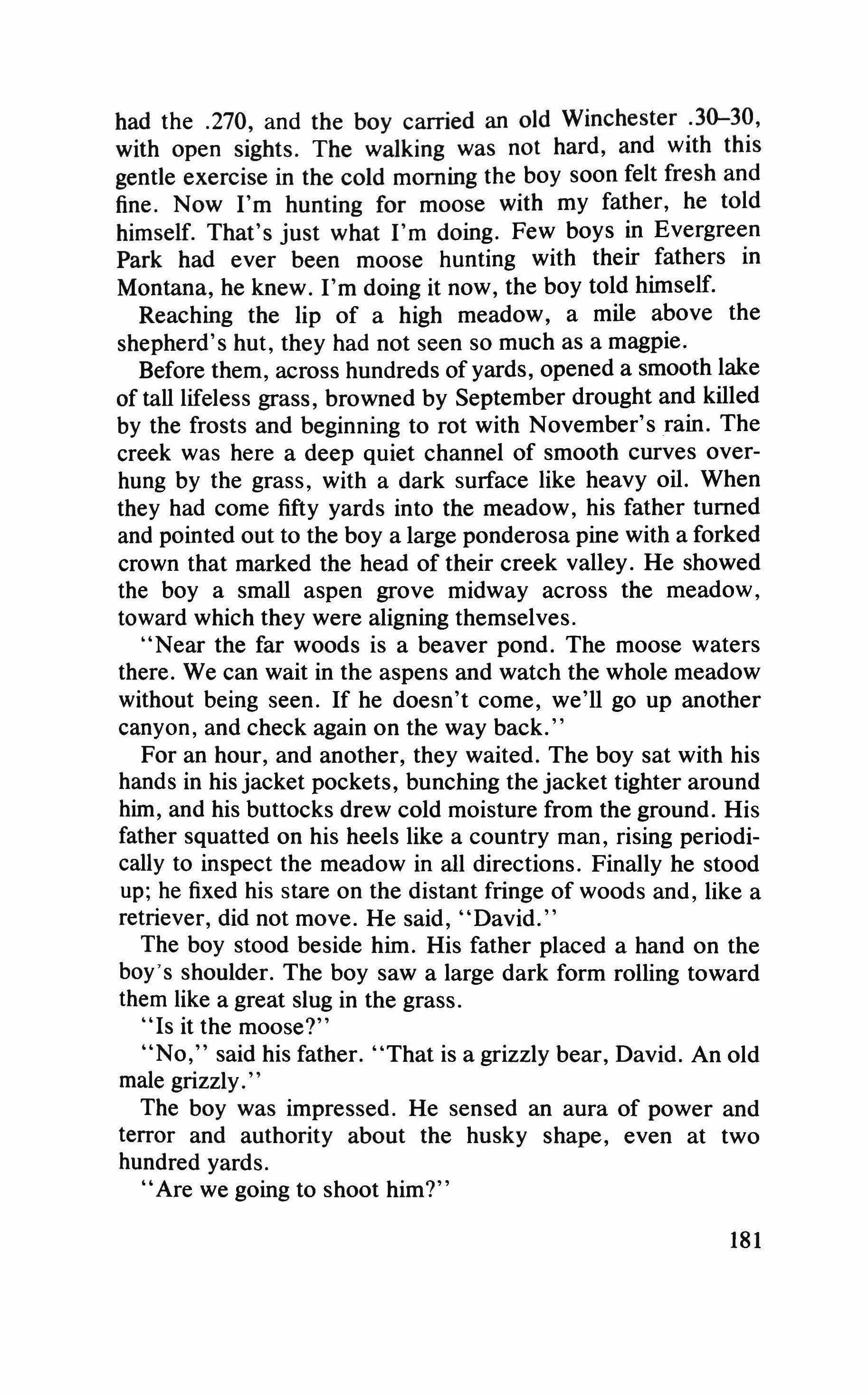
had the .270, and the boy carried an old Winchester .3�30, with open sights. The walking was not hard, and with this gentle exercise in the cold morning the boy soon felt fresh and fine. Now I'm hunting for moose with my father, he told himself. That's just what I'm doing. Few boys in Evergreen Park had ever been moose hunting with their fathers in Montana, he knew. I'm doing it now, the boy told himself.
Reaching the lip of a high meadow, a mile above the shepherd's hut, they had not seen so much as a magpie.
Before them, across hundreds of yards, opened a smooth lake of tall lifeless grass, browned by September drought and killed by the frosts and beginning to rot with November's rain. The creek was here a deep quiet channel of smooth curves overhung by the grass, with a dark surface like heavy oil. When they had come fifty yards into the meadow, his father turned and pointed out to the boy a large ponderosa pine with a forked crown that marked the head of their creek valley. He showed the boy a small aspen grove midway across the meadow, toward which they were aligning themselves.
"Near the far woods is a beaver pond. The moose waters there. We can wait in the aspens and watch the whole meadow without being seen. If he doesn't come, we'll go up another canyon, and check again on the way back."
For an hour, and another, they waited. The boy sat with his hands in his jacket pockets, bunching the jacket tighter around him, and his buttocks drew cold moisture from the ground. His father squatted on his heels like a country man, rising periodically to inspect the meadow in all directions. Finally he stood up; he fixed his stare on the distant fringe of woods and, like a retriever, did not move. He said, "David."
The boy stood beside him. His father placed a hand on the boy's shoulder. The boy saw a large dark form rolling toward them like a great slug in the grass.
"Is it the moose?"
"No," said his father. "That is a grizzly bear, David. An old male grizzly.
The boy was impressed. He sensed an aura of power and terror and authority about the husky shape, even at two hundred yards.
"Are we going to shoot him?"
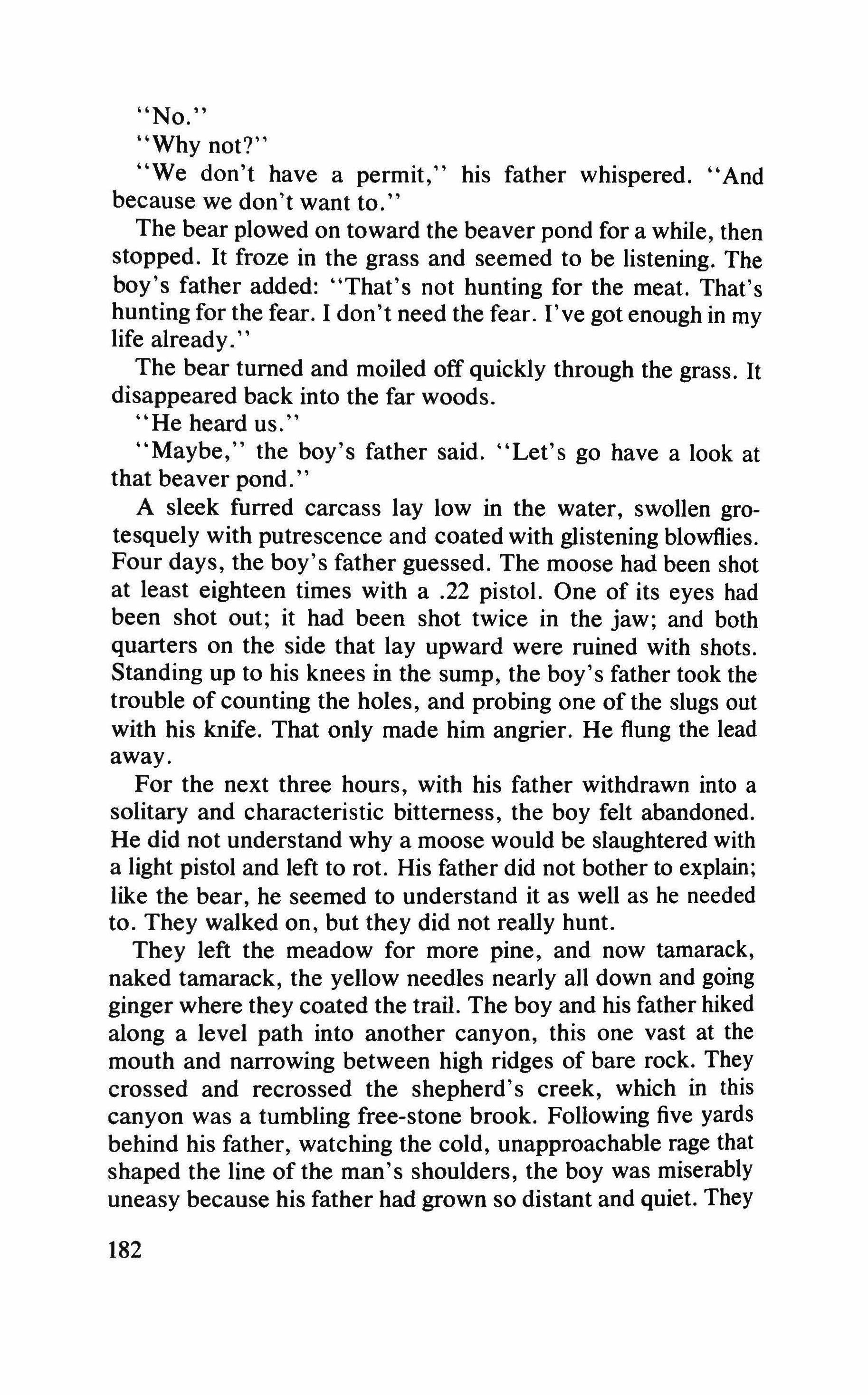
"No. " "Why not?"
"We don't have a permit," his father whispered. "And because we don't want to."
The bear plowed on toward the beaver pond for a while, then stopped. It froze in the grass and seemed to be listening. The boy's father added: "That's not hunting for the meat. That's hunting for the fear. I don't need the fear. I've got enough in my life already.
The bear turned and moiled off quickly through the grass. It disappeared back into the far woods.
"He heard us."
"Maybe," the boy's father said. "Let's go have a look at that beaver pond."
A sleek furred carcass lay low in the water, swollen grotesquely with putrescence and coated with glistening blowflies. Four days, the boy's father guessed. The moose had been shot at least eighteen times with a .22 pistol. One of its eyes had been shot out; it had been shot twice in the jaw; and both quarters on the side that lay upward were ruined with shots. Standing up to his knees in the sump, the boy's father took the trouble of counting the holes, and probing one of the slugs out with his knife. That only made him angrier. He flung the lead away.
For the next three hours, with his father withdrawn into a solitary and characteristic bitterness, the boy felt abandoned. He did not understand why a moose would be slaughtered with a light pistol and left to rot. His father did not bother to explain; like the bear, he seemed to understand it as well as he needed to. They walked on, but they did not really hunt.
They left the meadow for more pine, and now tamarack, naked tamarack, the yellow needles nearly all down and going ginger where they coated the trail. The boy and his father hiked along a level path into another canyon, this one vast at the mouth and narrowing between high ridges of bare rock. They crossed and recrossed the shepherd's creek, which in this canyon was a tumbling free-stone brook. Following five yards behind his father, watching the cold, unapproachable rage that shaped the line of the man's shoulders, the boy was miserably uneasy because his father had grown so distant and quiet. They

climbed over deadfalls blocking the trail, skirted one boulder large as a cabin, and blundered into a garden of nettles that stung them fiercely through their trousers. They saw fresh elk scat, and they saw bear, diarrhetic with late berries. The boy's father eventually grew bored with brooding, and showed the boy how to stalk. Before dusk that day they had shot an elk.
An open and gently sloped hillside, almost a meadow, ran for a quarter mile in quaking aspen, none over fifteen feet tall. The elk was above. The boy's father had the boy brace his gun in the notch of an aspen and take the first shot. The boy missed. The elk reeled and bolted down and his father killed it before it made cover. It was a five-point bull. They dressed the elk out and dragged it down to the cover of large pines, near the stream, where they would quarter it tomorrow, and then they returned under twilight to the hut.
That night even the fetal position could not keep the boy warm. He shivered wakefully for hours. He was glad that the following day, though full of walking and butchery and oppressive burdens, would be their last in the woods. He heard nothing. When he woke, through the door of the hut he saw whiteness like bone.
Six inches had fallen, and it was still snowing. The boy stood about in the campsite, amazed. When it snowed three inches in Evergreen Park, the boy would wake before dawn to the hiss of sand trucks and the ratchet of chains. Here there had been no warning. The boy was not much colder than he had been yesterday, and the transformation of the woods seemed mysterious and benign and somehow comic. He thought of Christmas. Then his father barked at him.
His father's mood had also changed, but in a different way; he seemed serious and hurried. As he wiped the breakfast pots clean with snow, he gave the boy orders for other chores. They left camp with two empty pack frames, both rifles, and a handsaw and rope. The boy soon understood why his father felt pressure of time: it took them an hour to climb the mile to the meadow. The snow continued. They did not rest until they reached the aspens.
"I had half a mind at breakfast to let the bull lie and pack us straight down out of here," his father admitted. "Probably smarter and less trouble in the long run. I could have come

back on snowshoes next week. But by then it might be three feet deep and starting to drift. We can get two quarters out today. That will make it easier for me later." The boy was surprised by two things: that his father would be so wary in the face of a gentle snowfall and that he himself would have felt disappointed to be taken out of the woods that morning. The air of the meadow teemed with white.
"If it stops soon, we're fine," said his father. It continued.
The path up the far canyon was hard climbing in eight inches of snow. The boy fell once, filling his collar and sleeves, and the gun-sight put a small gouge in his chin. But he was not discouraged. That night they would be warm and dry at the cabin. A half mile on and he came up beside his father, who had stopped to stare down at dark splashes of blood.
Heavy tracks and a dragging belly mark led up to the scramble of deepening red, and away. The tracks were nine inches long and showed claws. The boy's father knelt. As the boy watched, one shining maroon splotch the size of a saucer sank slowly beyond sight into the snow. The blood was warm.
Inspecting the tracks carefully, his father said, "She's got a cub with her. "
"What happened?"
"Just a kill. Seems to have been a bird. That's too much blood for a grouse, but I don't see signs of any four-footed creature. Maybe a turkey." He frowned thoughtfully. "A turkey without feathers. I don't know. What I dislike is coming up on her with a cub." He drove a round into the chamber of the .270.
Trailing red smears, the tracks preceded them. Within fifty feet they found the body. It was half-buried. The top of its head had been shorn away, and the cub's brains had been licked out.
His father said "Christ," and plunged off the trail. He snapped at the boy to follow closely.
They made a wide crescent through brush and struck back after a quarter mile. His father slogged ahead in the snow, stopping often to stand holding his gun ready and glancing around while the boy caught up and passed him. The boy was confused. He knew his father was worried, but he did not feel any danger himself. They met the trail again, and went on to the
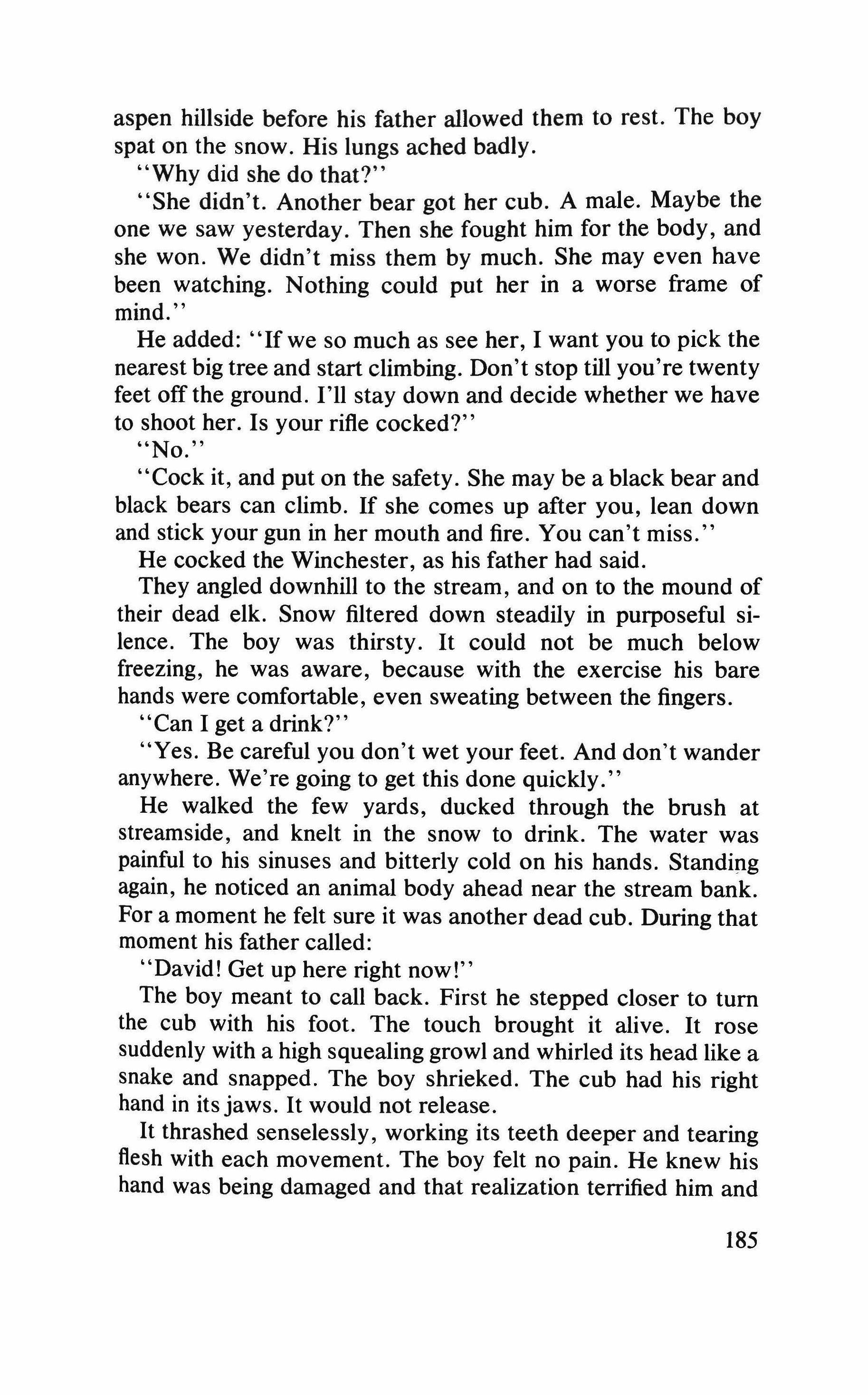
aspen hillside before his father allowed them to rest. The boy spat on the snow. His lungs ached badly.
"Why did she do that?"
"She didn't. Another bear got her cub. A male. Maybe the one we saw yesterday. Then she fought him for the body, and she won. We didn't miss them by much. She may even have been watching. Nothing could put her in a worse frame of mind."
He added: "If we so much as see her, I want you to pick the nearest big tree and start climbing. Don't stop till you're twenty feet off the ground. I'll stay down and decide whether we have to shoot her. Is your rifle cocked?"
"No.
"Cock it, and put on the safety. She may be a black bear and black bears can climb. If she comes up after you, lean down and stick your gun in her mouth and fire. You can't miss."
He cocked the Winchester, as his father had said.
They angled downhill to the stream, and on to the mound of their dead elk. Snow filtered down steadily in purposeful silence. The boy was thirsty. It could not be much below freezing, he was aware, because with the exercise his bare hands were comfortable, even sweating between the fingers
Can I get a drink?"
"Yes. Be careful you don't wet your feet. And don't wander anywhere. We're going to get this done quickly."
He walked the few yards, ducked through the brush at streamside, and knelt in the snow to drink. The water was painful to his sinuses and bitterly cold on his hands. Standing again, he noticed an animal body ahead near the stream bank. For a moment he felt sure it was another dead cub. During that moment his father called:
"David! Get up here right now!"
The boy meant to call back. First he stepped closer to tum the cub with his foot. The touch brought it alive. It rose suddenly with a high squealing growl and whirled its head like a snake and snapped. The boy shrieked. The cub had his right hand in its jaws. It would not release.
It thrashed senselessly, working its teeth deeper and tearing flesh with each movement. The boy felt no pain. He knew his hand was being damaged and that realization terrified him and

he was desperate to get the hand back before it was ruined. But he was helpless. He sensed the same furious terror racking the cub that he felt in himself, and he screamed at the cub almost reasoningly to let him go. His screams scared the cub more. Its head snatched back and forth. The boy did not think to shout for his father. He did not see him or hear him coming.
His father moved at full stride in a slowed laboring run through the snow, saying nothing and holding the rifle he did not use, crossed the last six feet still gathering speed, and brought his right boot up into the cub's belly. That kick seemed to lift the cub clear of the snow. It opened its jaws to another shrill piggish squeal, and the boy felt dull relief on his hand, as though his father had pressed open the blades of a spring trap with his foot. The cub tumbled once and disappeared over the stream bank, then surfaced downstream, squalling and paddling. The boy looked at his hand and was horrified. He still had no pain, but the hand was unrecognizable. His fingers had been peeled down through the palm like flaps on a banana. Glands at the sides of his jaw threatened that he would vomit, and he might have stood stupidly watching the hand bleed if his father had not grabbed him.
He snatched the boy by the arm and dragged him toward a tree without even looking at the boy's hand. The boy jerked back in angry resistance as though he had been struck. He screamed at his father. He screamed that his hand was cut, believing his father did not know, and as he screamed he began to cry. He began to feel hot throbbing pain. He began to worry about the blood he was losing. He could imagine his blood melting red holes in the snow behind him and he did not want to look. He did not want to do anything until he had taken care of his hand. At that instant he hated his father. But his father was stronger. He all but carried the boy to a tree.
He lifted the boy. In a voice that was quiet and hurried and very unlike the harsh grip with which he had taken the boy's arm, he said:
"Grab hold and climb up a few branches as best you can. Sit on a limb and hold tight and clamp the hand under your other armpit, if you can do that. I'll be right back to you. Hold tight because you're going to get dizzy." The boy groped desper-
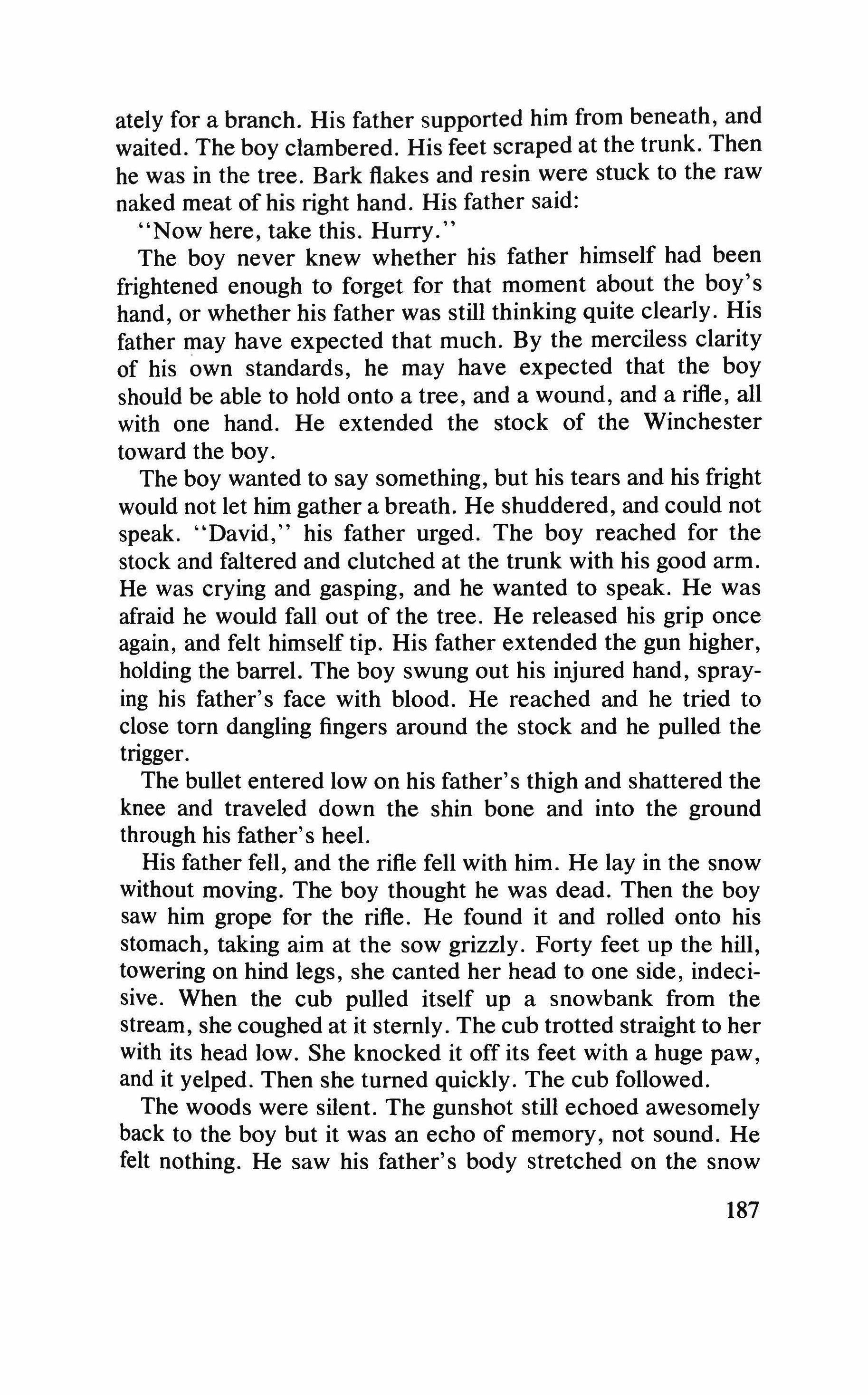
ately for a branch. His father supported him from beneath, and waited. The boy clambered. His feet scraped at the trunk. Then he was in the tree. Bark flakes and resin were stuck to the raw naked meat of his right hand. His father said: "Now here, take this. Hurry."
The boy never knew whether his father himself had been frightened enough to forget for that moment about the boy's hand, or whether his father was still thinking quite clearly. His father may have expected that much. By the merciless clarity of his own standards, he may have expected that the boy should be able to hold onto a tree, and a wound, and a rifle, all with one hand. He extended the stock of the Winchester toward the boy.
The boy wanted to say something, but his tears and his fright would not let him gather a breath. He shuddered, and could not speak. "David," his father urged. The boy reached for the stock and faltered and clutched at the trunk with his good arm. He was crying and gasping, and he wanted to speak. He was afraid he would fall out of the tree. He released his grip once again, and felt himself tip. His father extended the gun higher, holding the barrel. The boy swung out his injured hand, spraying his father's face with blood. He reached and he tried to close torn dangling fingers around the stock and he pulled the trigger.
The bullet entered low on his father's thigh and shattered the knee and traveled down the shin bone and into the ground through his father's heel.
His father fell, and the rifle fell with him. He lay in the snow without moving. The boy thought he was dead. Then the boy saw him grope for the rifle. He found it and rolled onto his stomach, taking aim at the sow grizzly. Forty feet up the hill, towering on hind legs, she canted her head to one side, indecisive. When the cub pulled itself up a snowbank from the stream, she coughed at it sternly. The cub trotted straight to her with its head low. She knocked it off its feet with a huge paw, and it yelped. Then she turned quickly. The cub followed.
The woods were silent. The gunshot still echoed awesomely back to the boy but it was an echo of memory, not sound. He felt nothing. He saw his father's body stretched on the snow
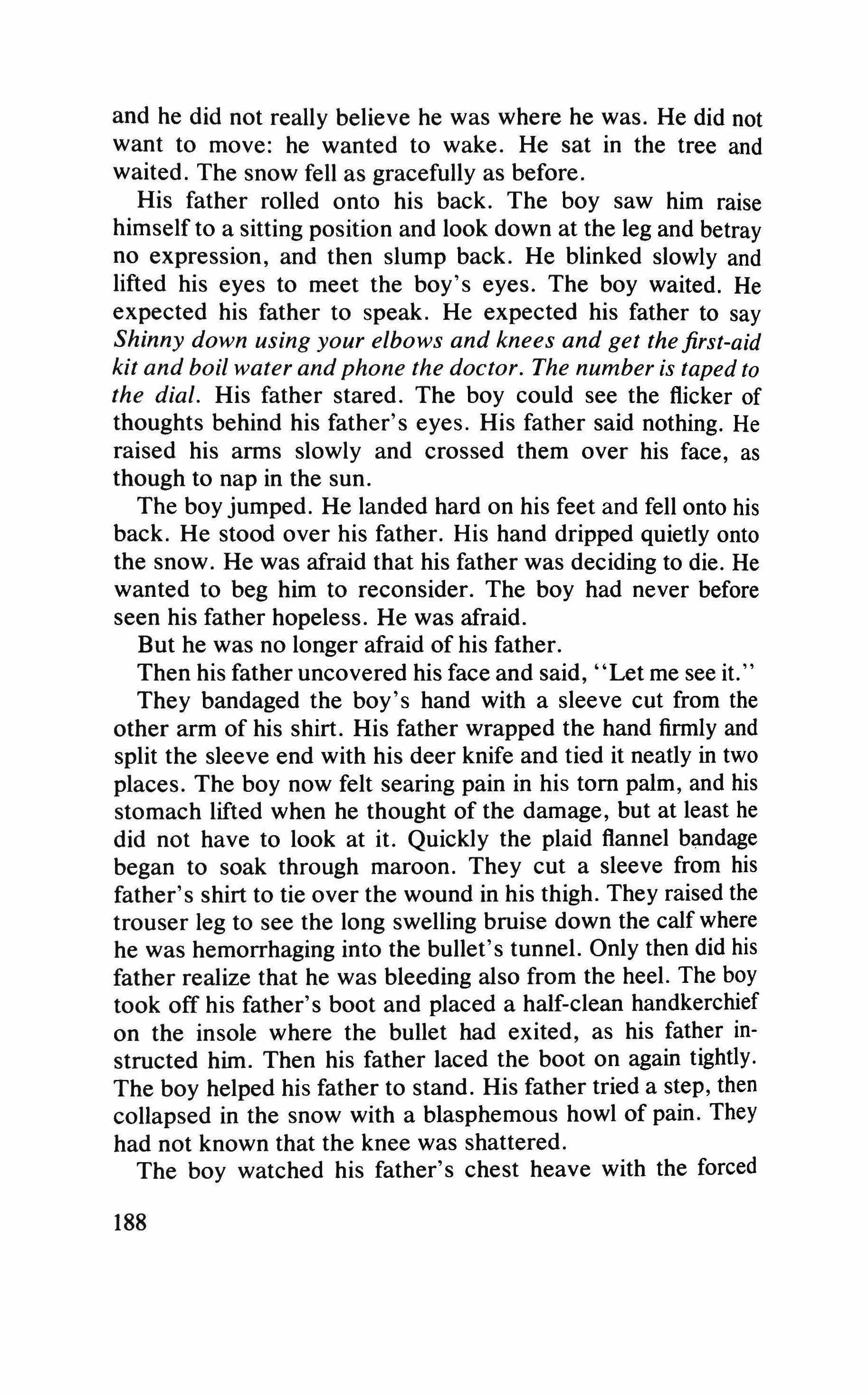
and he did not really believe he was where he was. He did not want to move: he wanted to wake. He sat in the tree and waited. The snow fell as gracefully as before.
His father rolled onto his back. The boy saw him raise himself to a sitting position and look down at the leg and betray no expression, and then slump back. He blinked slowly and lifted his eyes to meet the boy's eyes. The boy waited. He expected his father to speak. He expected his father to say Shinny down using your elbows and knees and get thefirst-aid kit and boil water and phone the doctor. The number is taped to the dial. His father stared. The boy could see the flicker of thoughts behind his father's eyes. His father said nothing. He raised his arms slowly and crossed them over his face, as though to nap in the sun.
The boy jumped. He landed hard on his feet and fell onto his back. He stood over his father. His hand dripped quietly onto the snow. He was afraid that his father was deciding to die. He wanted to beg him to reconsider. The boy had never before seen his father hopeless. He was afraid.
But he was no longer afraid of his father.
Then his father uncovered his face and said, "Let me see it."
They bandaged the boy's hand with a sleeve cut from the other arm of his shirt. His father wrapped the hand firmly and split the sleeve end with his deer knife and tied it neatly in two places. The boy now felt searing pain in his tom palm, and his stomach lifted when he thought of the damage, but at least he did not have to look at it. Quickly the plaid flannel bandage began to soak through maroon. They cut a sleeve from his father's shirt to tie over the wound in his thigh. They raised the trouser leg to see the long swelling bruise down the calf where he was hemorrhaging into the bullet's tunnel. Only then did his father realize that he was bleeding also from the heel. The boy took off his father's boot and placed a half-clean handkerchief on the insole where the bullet had exited, as his father instructed him. Then his father laced the boot on again tightly. The boy helped his father to stand. His father tried a step, then collapsed in the snow with a blasphemous howl of pain. They had not known that the knee was shattered.
The boy watched his father's chest heave with the forced
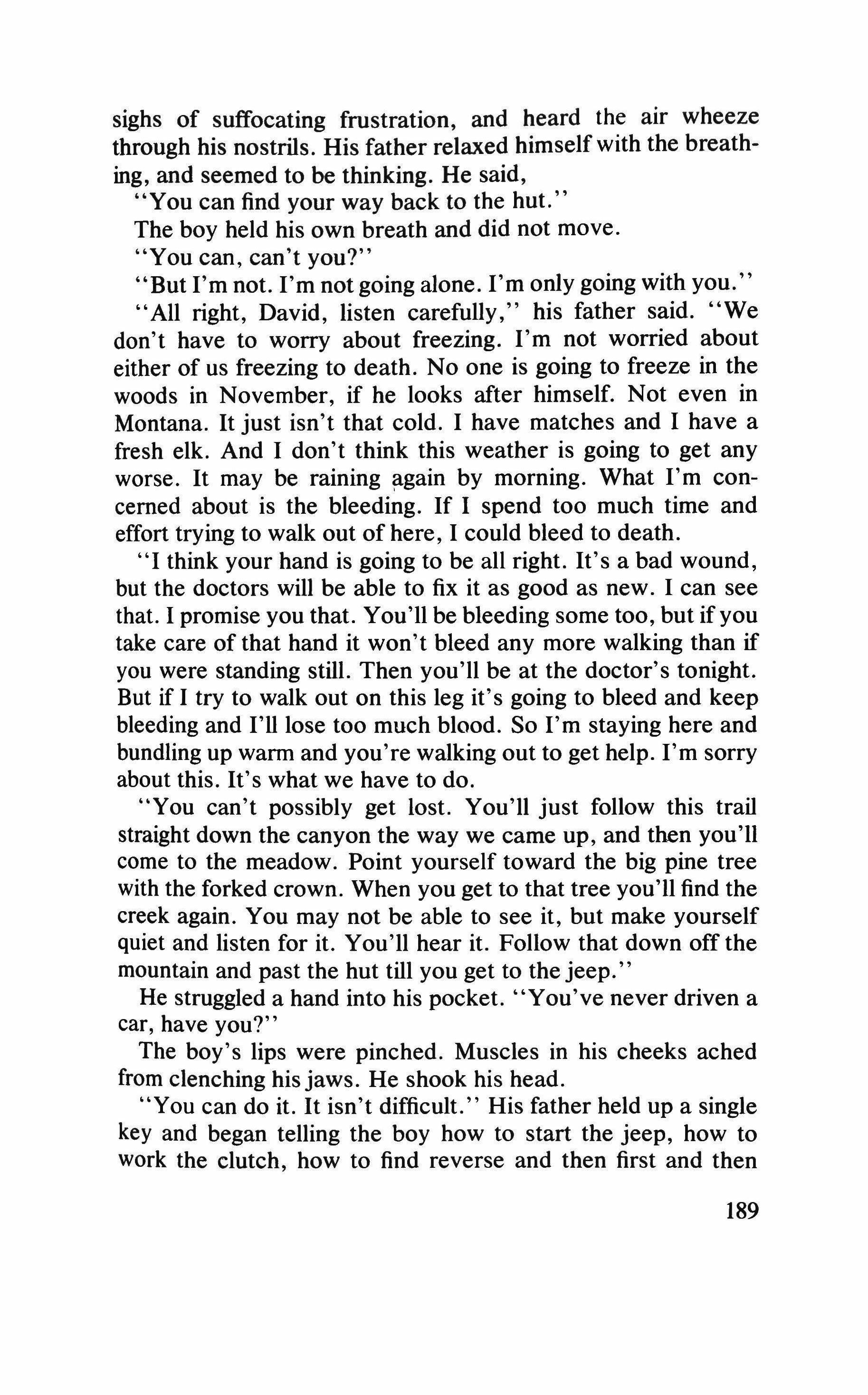
sighs of suffocating frustration, and heard the air wheeze through his nostrils. His father relaxed himself with the breathing, and seemed to be thinking. He said,
"You can find your way back to the hut."
The boy held his own breath and did not move.
"You can, can't you?"
"But I'm not. I'm not going alone. I'm only going with you."
"All right, David, listen carefully," his father said. "We don't have to worry about freezing. I'm not worried about either of us freezing to death. No one is going to freeze in the woods in November, if he looks after himself. Not even in Montana. It just isn't that cold. 1 have matches and 1 have a fresh elk. And 1 don't think this weather is going to get any worse. It may be raining again by morning. What I'm concerned about is the bleeding. If 1 spend too much time and effort trying to walk out of here, 1 could bleed to death.
"I think your hand is going to be all right. It's a bad wound, but the doctors will be able to fix it as good as new. 1 can see that. 1 promise you that. You'll be bleeding some too, but if you take care of that hand it won't bleed any more walking than if you were standing still. Then you'll be at the doctor's tonight. But if 1 try to walk out on this leg it's going to bleed and keep bleeding and I'll lose too much blood. So I'm staying here and bundling up warm and you're walking out to get help. I'm sorry about this. It's what we have to do.
"You can't possibly get lost. You'll just follow this trail straight down the canyon the way we came up, and then you'll come to the meadow. Point yourself toward the big pine tree with the forked crown. When you get to that tree you'll find the creek again. You may not be able to see it, but make yourself quiet and listen for it. You'll hear it. Follow that down off the mountain and past the hut till you get to the jeep."
He struggled a hand into his pocket. "You've never driven a car, have you?"
The boy's lips were pinched. Muscles in his cheeks ached from clenching his jaws. He shook his head.
"You can do it. It isn't difficult." His father held up a single key and began telling the boy how to start the jeep, how to work the clutch, how to find reverse and then first and then
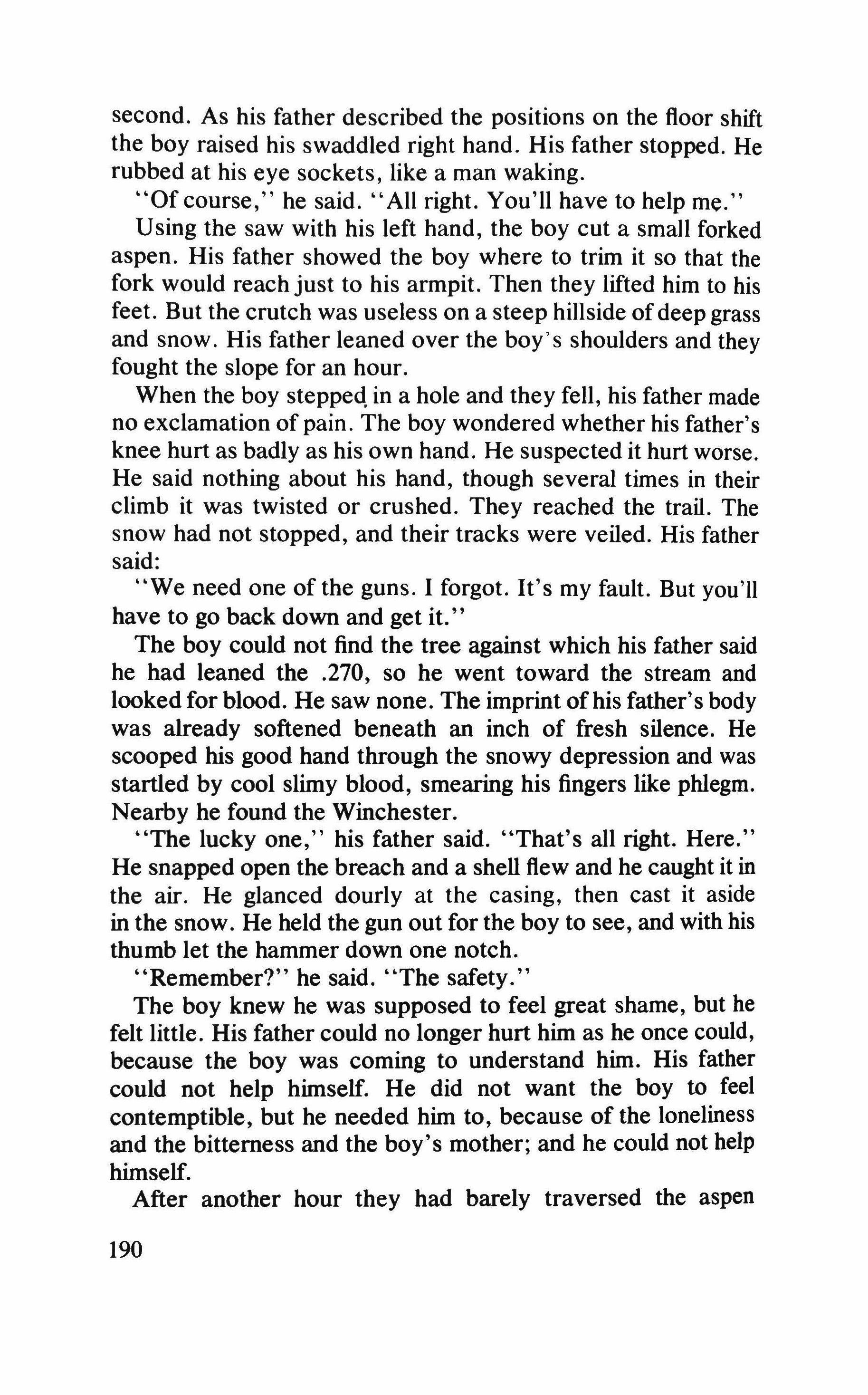
second. As his father described the positions on the floor shift the boy raised his swaddled right hand. His father stopped. He rubbed at his eye sockets, like a man waking.
"Of course," he said. "All right. You'll have to help me."
Using the saw with his left hand, the boy cut a small forked aspen. His father showed the boy where to trim it so that the fork would reach just to his armpit. Then they lifted him to his feet. But the crutch was useless on a steep hillside ofdeep grass and snow. His father leaned over the boy's shoulders and they fought the slope for an hour.
When the boy stepped. in a hole and they fell, his father made no exclamation of pain. The boy wondered whether his father's knee hurt as badly as his own hand. He suspected it hurt worse. He said nothing about his hand, though several times in their climb it was twisted or crushed. They reached the trail. The snow had not stopped, and their tracks were veiled. His father said:
"We need one of the guns. I forgot. It's my fault. But you'll have to go back down and get it.
The boy could not find the tree against which his father said he had leaned the .270, so he went toward the stream and looked for blood. He saw none. The imprint ofhis father's body was already softened beneath an inch of fresh silence. He scooped his good hand through the snowy depression and was startled by cool slimy blood, smearing his fingers like phlegm. Nearby he found the Winchester.
"The lucky one," his father said. "That's all right. Here." He snapped open the breach and a shell flew and he caught it in the air. He glanced dourly at the casing, then cast it aside in the snow. He held the gun out for the boy to see, and with his thumb let the hammer down one notch.
"Remember?" he said. "The safety."
The boy knew he was supposed to feel great shame, but he felt little. His father could no longer hurt him as he once could, because the boy was corning to understand him. His father could not help himself. He did not want the boy to feel contemptible, but he needed him to, because of the loneliness and the bitterness and the boy's mother; and he could not help himself.
After another hour they had barely traversed the aspen
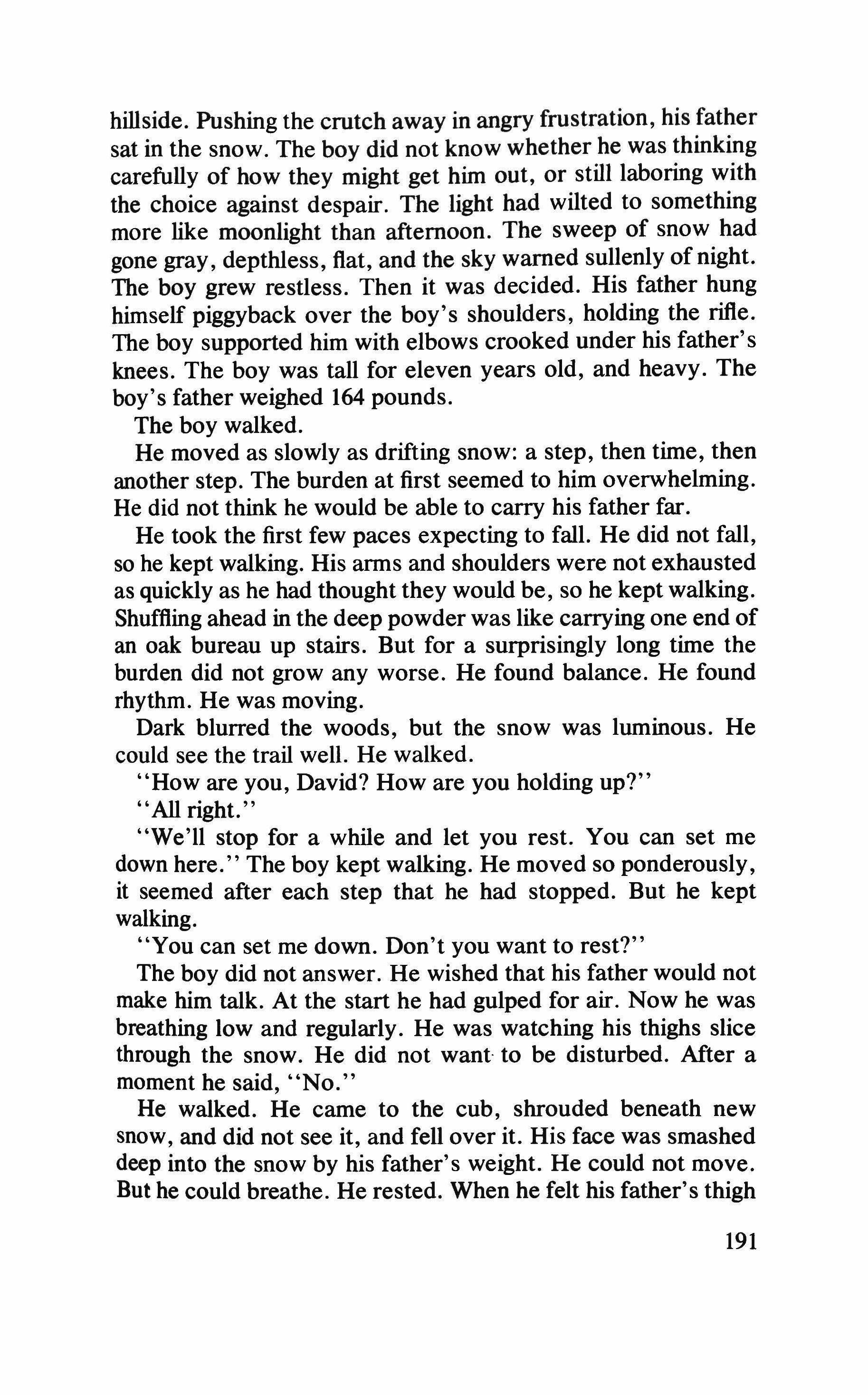
hillside. Pushing the crutch away in angry frustration, his father sat in the snow. The boy did not know whether he was thinking carefully of how they might get him out, or still laboring with the choice against despair. The light had wilted to something more like moonlight than afternoon. The sweep of snow had gone gray, depthless, flat, and the sky warned sullenly of night. The boy grew restless. Then it was decided. His father hung himself piggyback over the boy's shoulders, holding the rifle. The boy supported him with elbows crooked under his father's knees. The boy was tall for eleven years old, and heavy. The boy's father weighed 164 pounds.
The boy walked.
He moved as slowly as drifting snow: a step, then time, then another step. The burden at first seemed to him overwhelming. He did not think he would be able to carry his father far.
He took the first few paces expecting to fall. He did not fall, so he kept walking. His arms and shoulders were not exhausted as quickly as he had thought they would be, so he kept walking. Shuffling ahead in the deep powder was like carrying one end of an oak bureau up stairs. But for a surprisingly long time the burden did not grow any worse. He found balance. He found rhythm. He was moving.
Dark blurred the woods, but the snow was luminous. He could see the trail well. He walked.
"How are you, David? How are you holding up?"
"All right."
"We'll stop for a while and let you rest. You can set me down here." The boy kept walking. He moved so ponderously, it seemed after each step that he had stopped. But he kept walking.
"You can set me down. Don't you want to rest?"
The boy did not answer. He wished that his father would not make him talk. At the start he had gulped for air. Now he was breathing low and regularly. He was watching his thighs slice through the snow. He did not want to be disturbed. After a moment he said, "No."
He walked. He came to the cub, shrouded beneath new snow, and did not see it, and fell over it. His face was smashed deep into the snow by his father's weight. He could not move. But he could breathe. He rested. When he felt his father's thigh
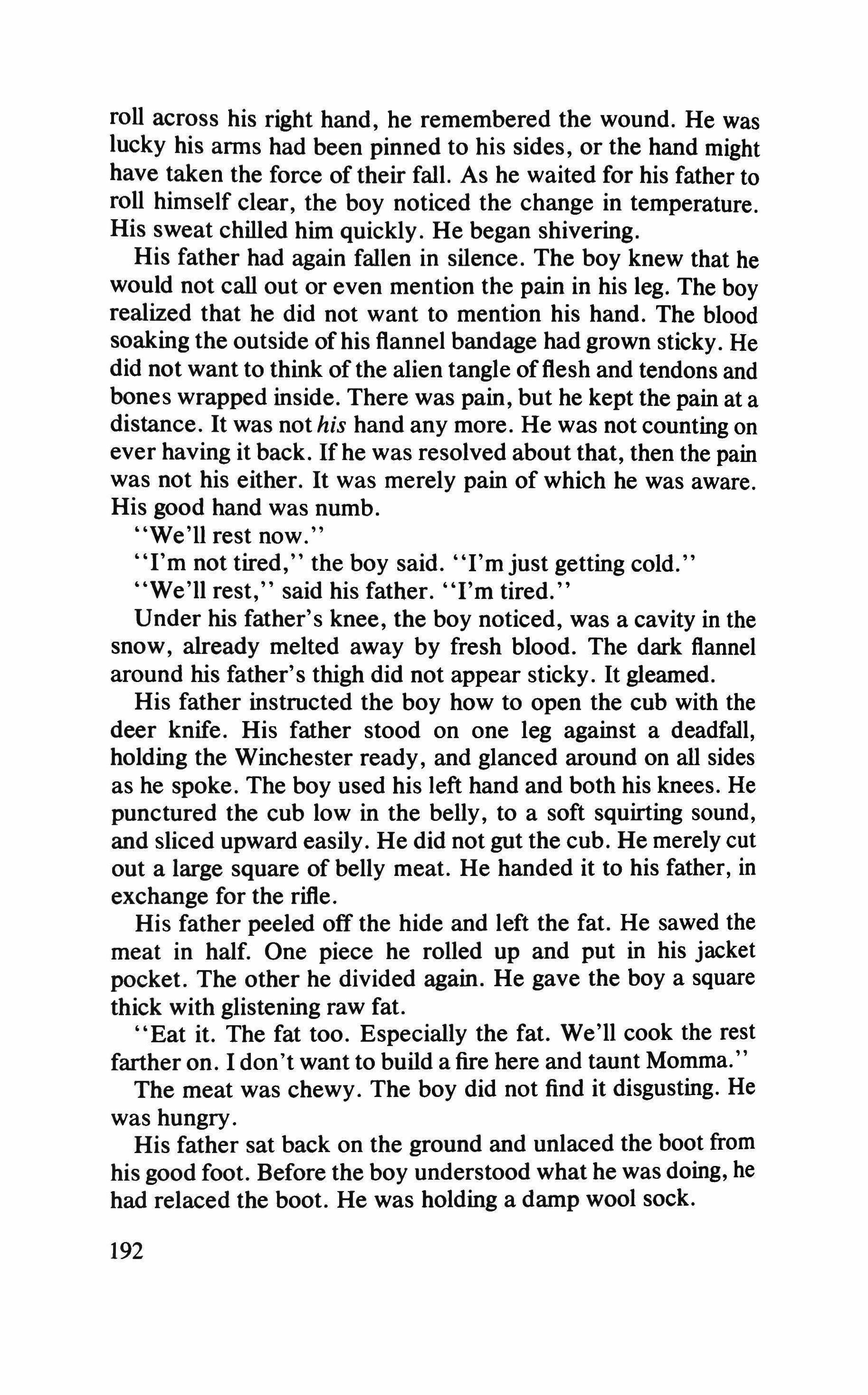
roll across his right hand, he remembered the wound. He was lucky his arms had been pinned to his sides, or the hand might have taken the force of their fall. As he waited for his father to roll himself clear, the boy noticed the change in temperature. His sweat chilled him quickly. He began shivering.
His father had again fallen in silence. The boy knew that he would not call out or even mention the pain in his leg. The boy realized that he did not want to mention his hand. The blood soaking the outside of his flannel bandage had grown sticky. He did not want to think of the alien tangle offlesh and tendons and bones wrapped inside. There was pain, but he kept the pain at a distance. It was not his hand any more. He was not counting on ever having it back. If he was resolved about that, then the pain was not his either. It was merely pain of which he was aware. His good hand was numb.
"We'll rest now."
"I'm not tired," the boy said. "I'm just getting cold."
"We'll rest," said his father. "I'm tired."
Under his father's knee, the boy noticed, was a cavity in the snow, already melted away by fresh blood. The dark flannel around his father's thigh did not appear sticky. It gleamed.
His father instructed the boy how to open the cub with the deer knife. His father stood on one leg against a deadfall, holding the Winchester ready, and glanced around on all sides as he spoke. The boy used his left hand and both his knees. He punctured the cub low in the belly, to a soft squirting sound, and sliced upward easily. He did not gut the cub. He merely cut out a large square of belly meat. He handed it to his father, in exchange for the rifle.
His father peeled off the hide and left the fat. He sawed the meat in half. One piece he rolled up and put in his jacket pocket. The other he divided again. He gave the boy a square thick with glistening raw fat.
"Eat it. The fat too. Especially the fat. We'll cook the rest farther on. I don't want to build a fire here and taunt Momma."
The meat was chewy. The boy did not find it disgusting. He was hungry.
His father sat back on the ground and unlaced the boot from his good foot. Before the boy understood what he was doing, he had relaced the boot. He was holding a damp wool sock.
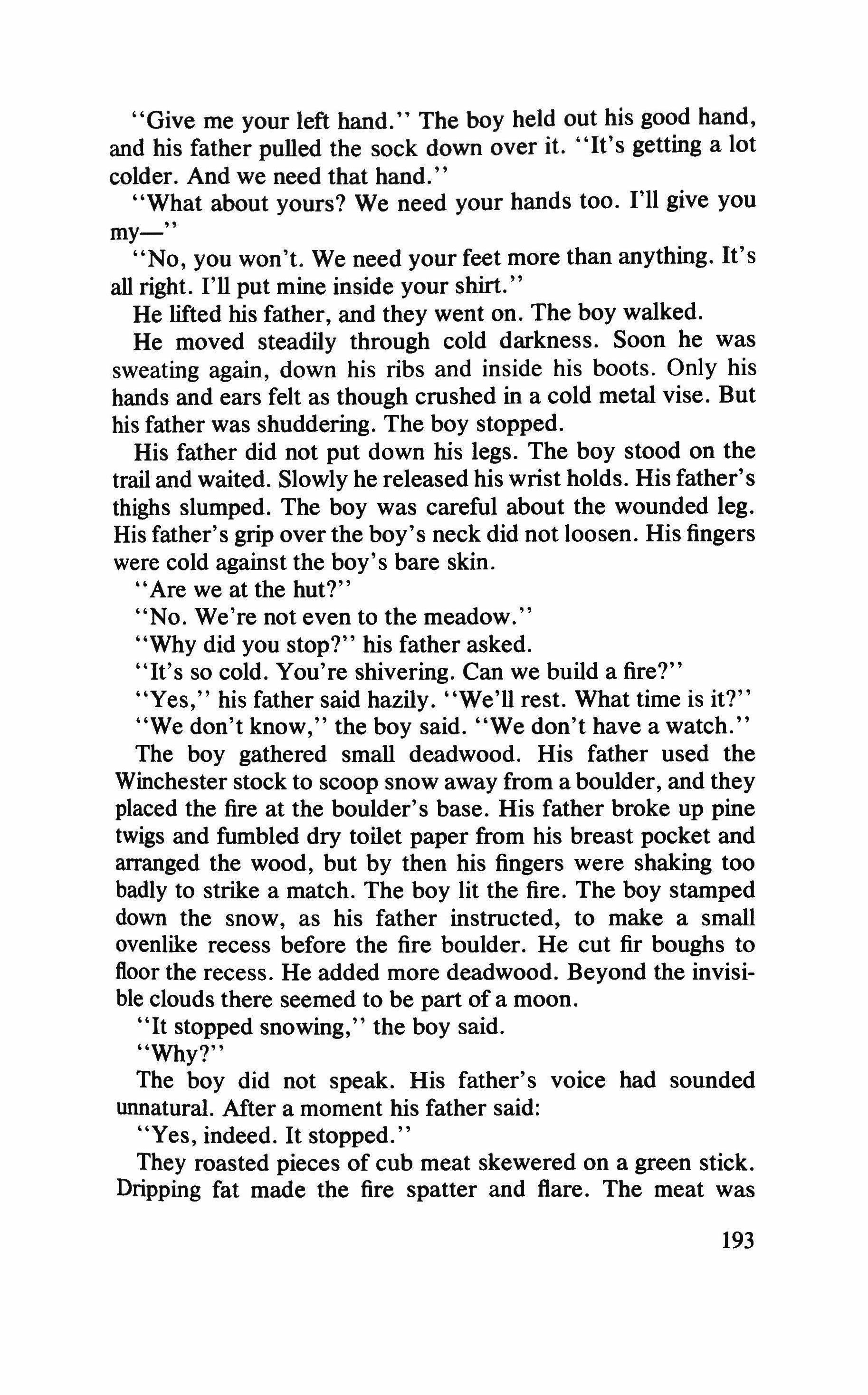
"Give me your left hand." The boy held out his good hand, and his father pulled the sock down over it. "It's getting a lot colder. And we need that hand."
"What about yours? We need your hands too. I'll give you my-"
"No, you won't. We need your feet more than anything. It's all right. I'll put mine inside your shirt.
He lifted his father, and they went on. The boy walked.
He moved steadily through cold darkness. Soon he was sweating again, down his ribs and inside his boots. Only his hands and ears felt as though crushed in a cold metal vise. But his father was shuddering. The boy stopped.
His father did not put down his legs. The boy stood on the trail and waited. Slowly he released his wrist holds. His father's thighs slumped. The boy was careful about the wounded leg. His father's grip over the boy's neck did not loosen. His fingers were cold against the boy's bare skin.
"Are we at the hut?"
"No. We're not even to the meadow."
"Why did you stop?" his father asked.
"It's so cold. You're shivering. Can we build a fire?"
"Yes," his father said hazily. "We'll rest. What time is it?"
"We don't know," the boy said. "We don't have a watch."
The boy gathered small deadwood. His father used the Winchester stock to scoop snow away from a boulder, and they placed the fire at the boulder's base. His father broke up pine twigs and fumbled dry toilet paper from his breast pocket and arranged the wood, but by then his fingers were shaking too badly to strike a match. The boy lit the fire. The boy stamped down the snow, as his father instructed, to make a small ovenlike recess before the fire boulder. He cut fir boughs to floor the recess. He added more deadwood. Beyond the invisible clouds there seemed to be part of a moon.
"It stopped snowing," the boy said.
"Why?"
The boy did not speak. His father's voice had sounded unnatural. After a moment his father said: "Yes, indeed. It stopped."
They roasted pieces of cub meat skewered on a green stick. Dripping fat made the fire spatter and flare. The meat was

scorched on the outside and raw within. It tasted as good as any meat the boy had ever eaten. They burned their palates on hot fat. The second stick smoldered through before they had noticed, and that batch of meat fell in the fire. The boy's father cursed once and reached into the flame for it and dropped it and clawed it out, and then put his hand in the snow. He did not look at the blistered fingers. They ate. The boy saw that both his father's hands had gone clumsy and almost useless.
The boy went for more wood. He found a bleached deadfall not far off the trail, but with one arm he could only break up and carry small loads. They lay down in the recess together like spoons, the boy nearer the fire. They pulled fir boughs into place above them, resting across the snow. They pressed close together. The boy's father was shivering spastically now, and he clenched the boy in a fierce hug. The boy put his father's hands back inside his own shirt. The boy slept. He woke when the fire faded and added more wood and slept. He woke again and tended the fire and changed places with his father and slept. He slept less soundly with his father between him and the fire. He woke again when his father began to vomit.
The boy was terrified. His father wrenched with sudden vomiting that brought up cub meat and yellow liquid and blood and sprayed them across the snow by the grayish-red glow of the fire and emptied his stomach dry and then would not release him. He heaved on pathetically. The boy pleaded to be told what was wrong. His father could not or would not answer. The spasms seized him at the stomach and twisted the rest of his body taut in uglyjerks. Between the attacks he breathed with a wet rumbling sound deep in his chest, and did not speak. When the vomiting subsided, his breathing stretched itself out into long bubbling sighs, then shallow gasps, then more liquidy sighs. His breath caught and froth rose in his throat and into his mouth and he gagged on it and began vomiting again. The boy thought his father would choke. He knelt beside him and held him and cried. He could not see his father's face well and he did not want to look closely while the sounds that were coming from inside his father's body seemed so unhuman. The boy had never been more frightened. He wept for himself, and for his father. He knew from the noises and movements that his father
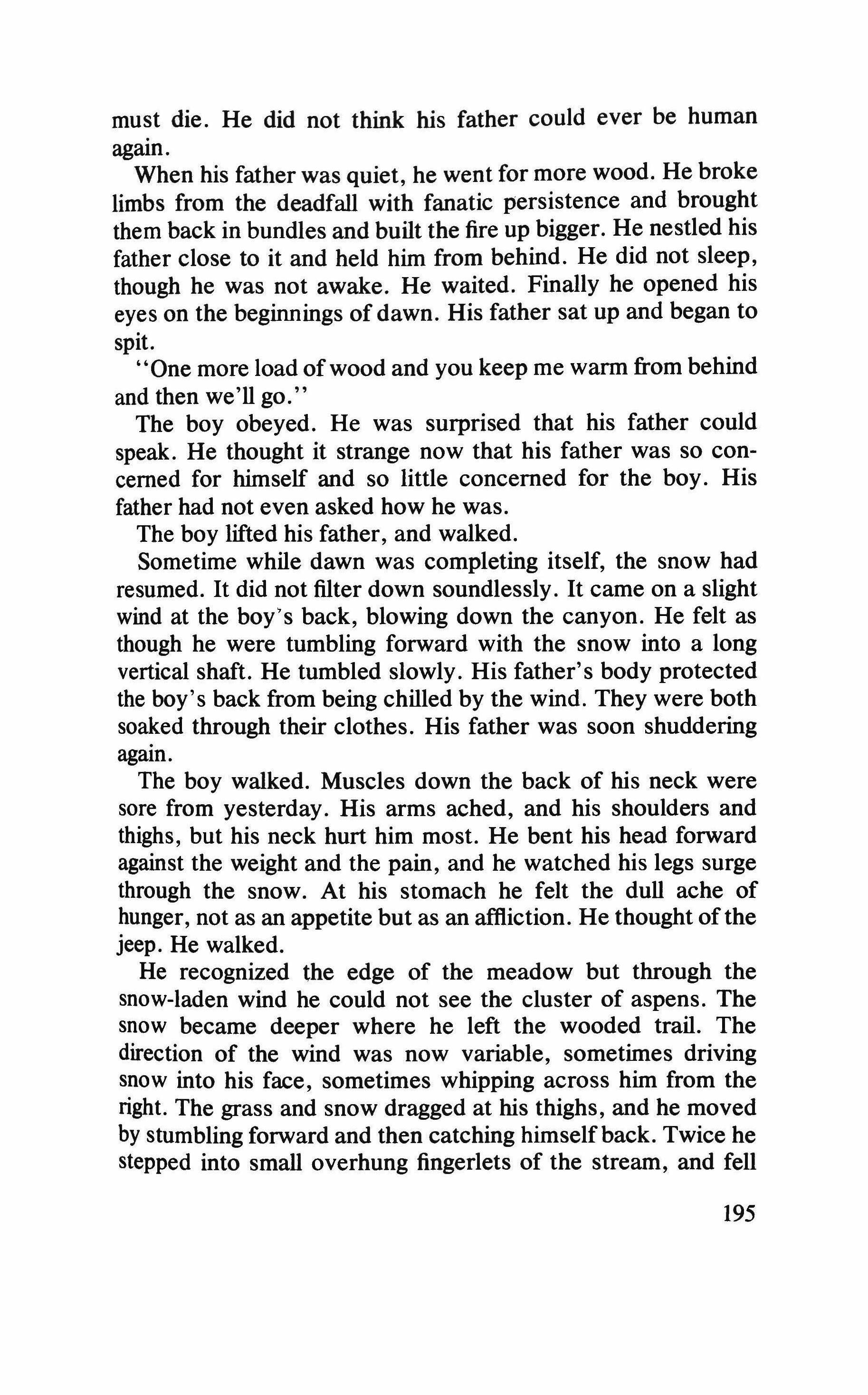
must die. He did not think his father could ever be human again.
When his father was quiet, he went for more wood. He broke limbs from the deadfall with fanatic persistence and brought them back in bundles and built the fire up bigger. He nestled his father close to it and held him from behind. He did not sleep, though he was not awake. He waited. Finally he opened his eyes on the beginnings of dawn. His father sat up and began to spit.
"One more load of wood and you keep me warm from behind and then we'll go."
The boy obeyed. He was surprised that his father could speak. He thought it strange now that his father was so concerned for himself and so little concerned for the boy. His father had not even asked how he was.
The boy lifted his father, and walked.
Sometime while dawn was completing itself, the snow had resumed. It did not filter down soundlessly. It came on a slight wind at the boy's back, blowing down the canyon. He felt as though he were tumbling forward with the snow into a long vertical shaft. He tumbled slowly. His father's body protected the boy's back from being chilled by the wind. They were both soaked through their clothes. His father was soon shuddering again.
The boy walked. Muscles down the back of his neck were sore from yesterday. His arms ached, and his shoulders and thighs, but his neck hurt him most. He bent his head forward against the weight and the pain, and he watched his legs surge through the snow. At his stomach he felt the dull ache of hunger, not as an appetite but as an affliction. He thought ofthe jeep. He walked.
He recognized the edge of the meadow but through the snow-laden wind he could not see the cluster of aspens. The snow became deeper where he left the wooded trail. The direction of the wind was now variable, sometimes driving snow into his face, sometimes Whipping across him from the right. The grass and snow dragged at his thighs, and he moved by stumbling forward and then catching himself back. Twice he stepped into small overhung fingerlets of the stream, and fell
195
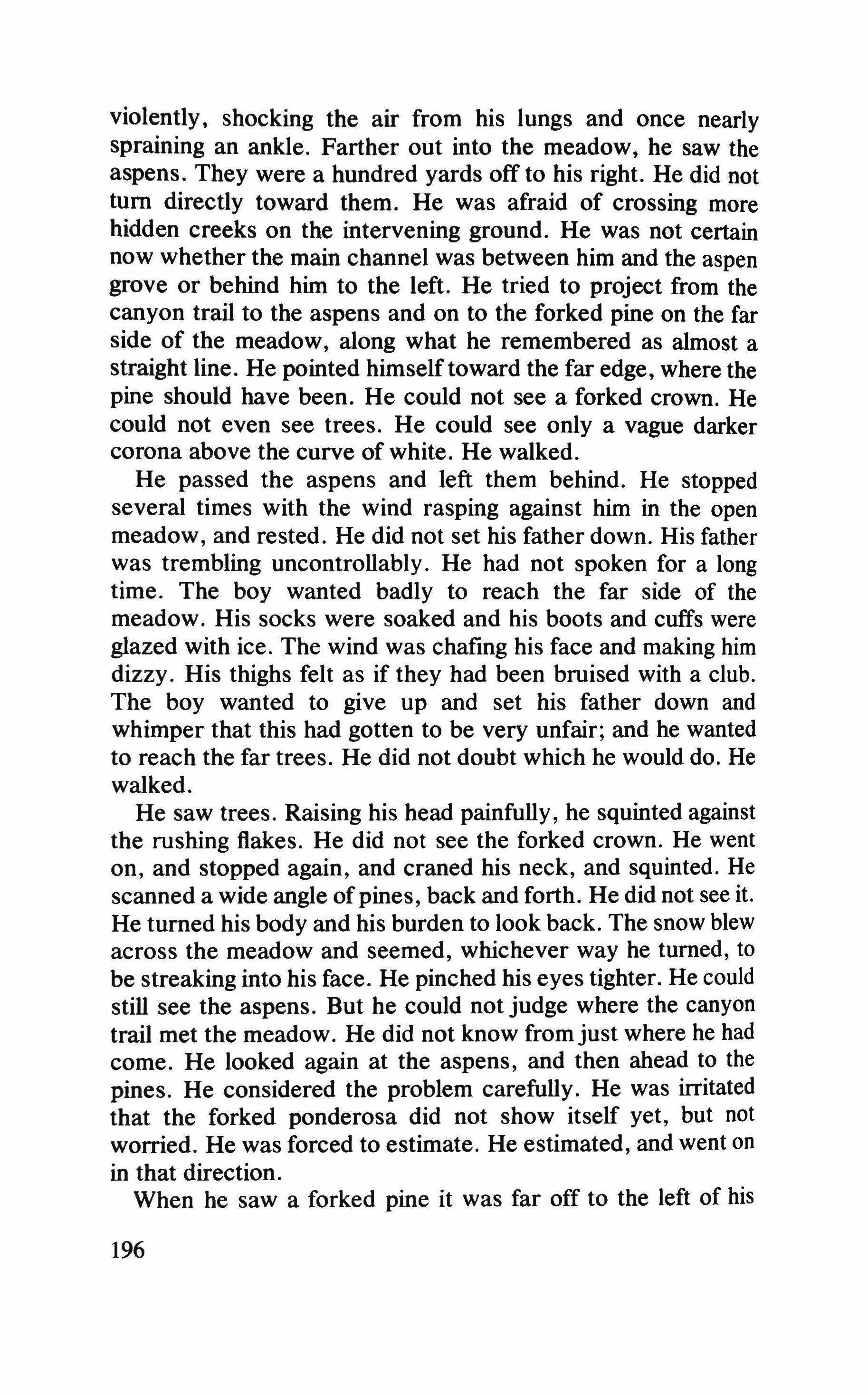
violently. shocking the air from his lungs and once nearly spraining an ankle. Farther out into the meadow, he saw the aspens. They were a hundred yards off to his right. He did not turn directly toward them. He was afraid of crossing more hidden creeks on the intervening ground. He was not certain now whether the main channel was between him and the aspen grove or behind him to the left. He tried to project from the canyon trail to the aspens and on to the forked pine on the far side of the meadow, along what he remembered as almost a straight line. He pointed himselftoward the far edge, where the pine should have been. He could not see a forked crown, He could not even see trees. He could see only a vague darker corona above the curve of white. He walked. He passed the aspens and left them behind. He stopped several times with the wind rasping against him in the open meadow, and rested. He did not set his father down. His father was trembling uncontrollably. He had not spoken for a long time. The boy wanted badly to reach the far side of the meadow. His socks were soaked and his boots and cuffs were glazed with ice. The wind was chafing his face and making him dizzy. His thighs felt as if they had been bruised with a club. The boy wanted to give up and set his father down and whimper that this had gotten to be very unfair; and he wanted to reach the far trees. He did not doubt which he would do. He walked.
He saw trees. Raising his head painfully, he squinted against the rushing flakes. He did not see the forked crown. He went on, and stopped again, and craned his neck, and squinted. He scanned a wide angle ofpines, back and forth. He did not see it. He turned his body and his burden to look back. The snow blew across the meadow and seemed, whichever way he turned, to be streaking into his face. He pinched his eyes tighter. He could still see the aspens. But he could not judge where the canyon trail met the meadow. He did not know from just where he had come. He looked again at the aspens, and then ahead to the pines. He considered the problem carefully. He was irritated that the forked ponderosa did not show itself yet, but not worried. He was forced to estimate. He estimated, and went on in that direction.
When he saw a forked pine it was far off to the left of his
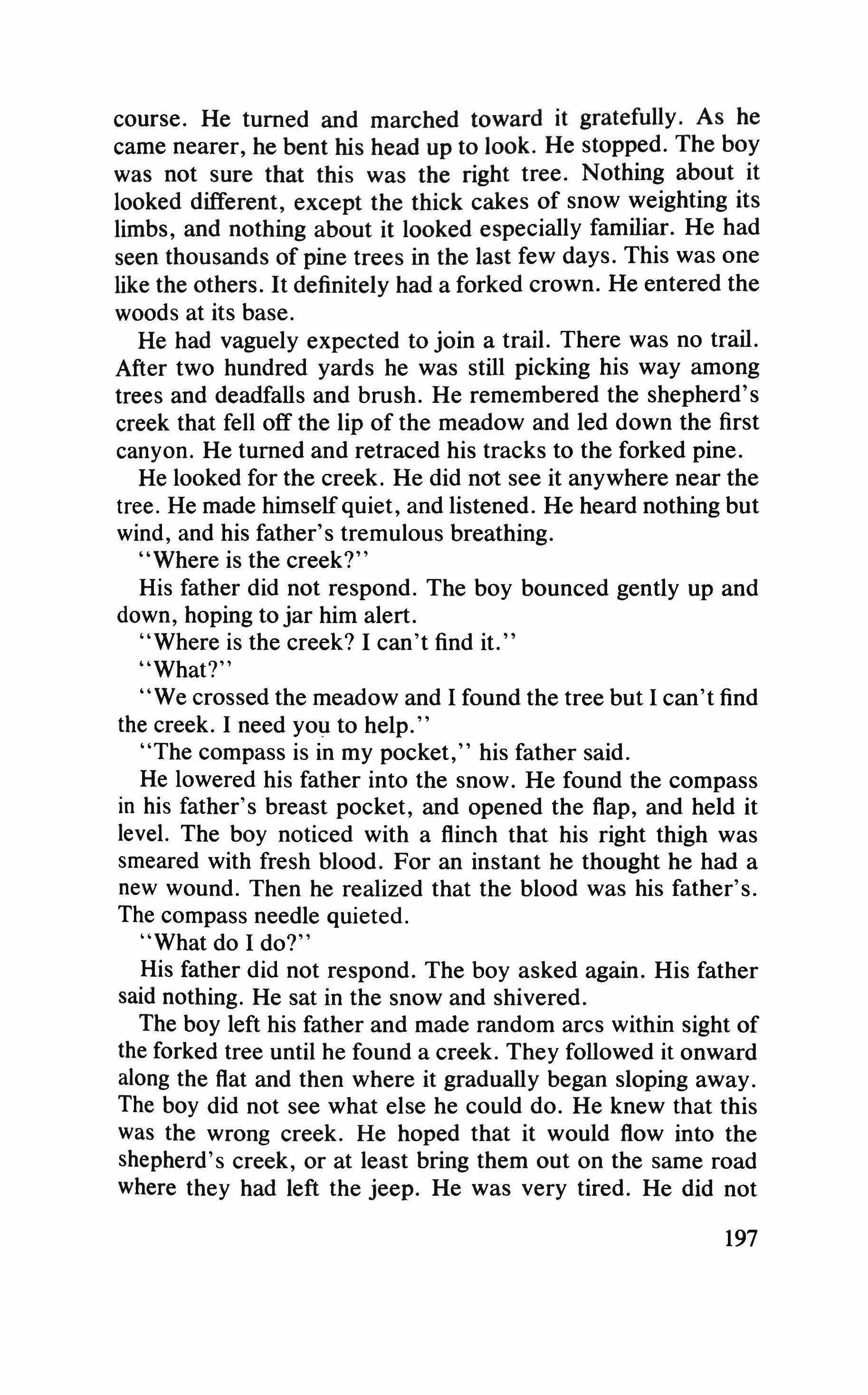
course. He turned and marched toward it gratefully. As he came nearer, he bent his head up to look. He stopped. The boy was not sure that this was the right tree. Nothing about it looked different, except the thick cakes of snow weighting its limbs, and nothing about it looked especially familiar. He had seen thousands of pine trees in the last few days. This was one like the others. It definitely had a forked crown. He entered the woods at its base.
He had vaguely expected to join a trail. There was no trail. After two hundred yards he was still picking his way among trees and deadfalls and brush. He remembered the shepherd's creek that fell off the lip of the meadow and led down the first canyon. He turned and retraced his tracks to the forked pine.
He looked for the creek. He did not see it anywhere near the tree. He made himself quiet, and listened. He heard nothing but wind, and his father's tremulous breathing.
"Where is the creek?"
His father did not respond. The boy bounced gently up and down, hoping to jar him alert.
"Where is the creek? I can't find it."
"What?"
"We crossed the meadow and I found the tree but I can't find the creek. I need you to help."
"The compass is in my pocket," his father said.
He lowered his father into the snow. He found the compass in his father's breast pocket, and opened the flap, and held it level. The boy noticed with a flinch that his right thigh was smeared with fresh blood. For an instant he thought he had a new wound. Then he realized that the blood was his father's. The compass needle quieted.
"What do I do?"
His father did not respond. The boy asked again. His father said nothing. He sat in the snow and shivered.
The boy left his father and made random arcs within sight of the forked tree until he found a creek. They followed it onward along the flat and then where it gradually began sloping away. The boy did not see what else he could do. He knew that this was the wrong creek. He hoped that it would flow into the shepherd's creek, or at least bring them out on the same road where they had left the jeep. He was very tired. He did not
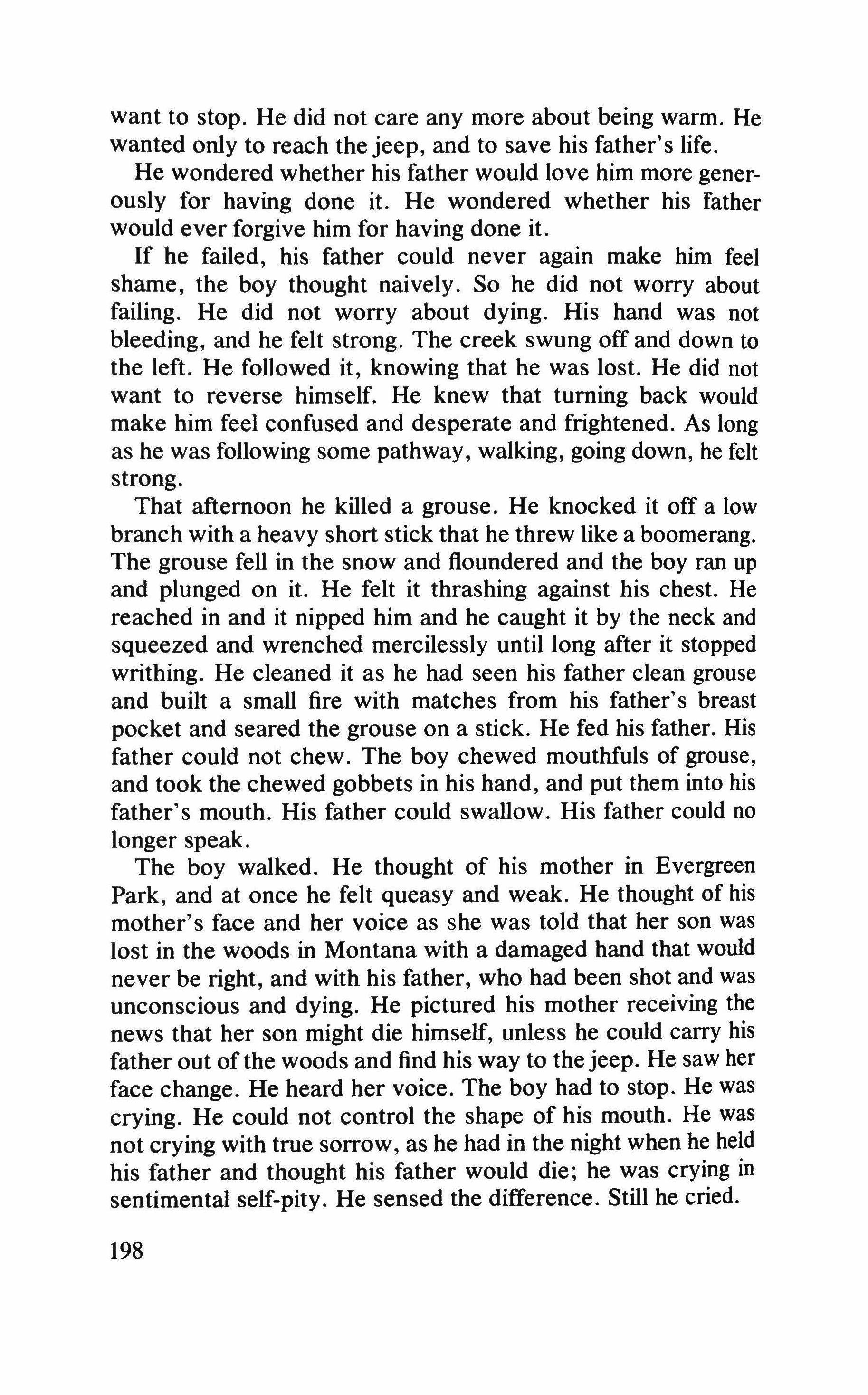
want to stop. He did not care any more about being warm. He wanted only to reach the jeep, and to save his father's life.
He wondered whether his father would love him more generously for having done it. He wondered whether his father would ever forgive him for having done it.
If he failed, his father could never again make him feel shame, the boy thought naively. So he did not worry about failing. He did not worry about dying. His hand was not bleeding, and he felt strong. The creek swung off and down to the left. He followed it, knowing that he was lost. He did not want to reverse himself. He knew that turning back would make him feel confused and desperate and frightened. As long as he was following some pathway, walking, going down, he felt strong.
That afternoon he killed a grouse. He knocked it off a low branch with a heavy short stick that he threw like a boomerang. The grouse fell in the snow and floundered and the boy ran up and plunged on it. He felt it thrashing against his chest. He reached in and it nipped him and he caught it by the neck and squeezed and wrenched mercilessly until long after it stopped writhing. He cleaned it as he had seen his father clean grouse and built a small fire with matches from his father's breast pocket and seared the grouse on a stick. He fed his father. His father could not chew. The boy chewed mouthfuls of grouse, and took the chewed gobbets in his hand, and put them into his father's mouth. His father could swallow. His father could no longer speak.
The boy walked. He thought of his mother in Evergreen Park, and at once he felt queasy and weak. He thought of his mother's face and her voice as she was told that her son was lost in the woods in Montana with a damaged hand that would never be right, and with his father, who had been shot and was unconscious and dying. He pictured his mother receiving the news that her son might die himself, unless he could carry his father out ofthe woods and find his way to the jeep. He saw her face change. He heard her voice. The boy had to stop. He was crying. He could not control the shape of his mouth. He was not crying with true sorrow, as he had in the night when he held his father and thought his father would die; he was crying in sentimental self-pity. He sensed the difference. Still he cried.

He must not think of his mother, the boy realized. Thinking of her could only weaken him. If she knew where he was, what he had to do, she could only make it impossible for him to do it. He was lucky that she knew nothing, the boy thought.
No one knew what the boy was doing, or what he had yet to do. Even the boy's father no longer knew. The boy was lucky. No one was watching, no one knew, and he was free to be capable.
The boy imagined himself alone at his father's grave. The grave was open. His father's casket had already been lowered. The boy stood at the foot in his black Christmas suit, and his hands were crossed at his groin, and he was not crying. Men with shovels stood back from the grave, waiting for the boy's order for them to begin filling it. The boy felt a horrible swelling sense ofjoy. The men watched him, and he stared down into the hole. He knew it was a lie. If his father died, the boy's mother would rush out to Livingston and have him buried and stand at the grave in a black dress and veil squeezing the boy to her side like he was a child. There was nothing the boy could do about that. All the more reason he must keep walking.
Then she would tow the boy back with her to Evergreen Park. And he would be standing on 96th Street in the morning dark before his father's cold body had even begun to grow alien and decayed in the buried box. She would drag him back, and there would be nothing the boy could do. And he realized that if he returned with his mother after the burial, he would never again see the cabin outside Livingston. He would have no more summers and no more Novembers anywhere but in Evergreen Park.
The cabin now seemed to be at the center of the boy's life. It seemed to stand halfway between this snowbound creek valley and the train station in Chicago. It would be his cabin soon.
The boy knew nothing about his father's will, and he had never been told that legal ownership of the cabin was destined for him. Legal ownership did not matter. The cabin might be owned by his mother, or sold to pay his father's debts, or taken away by the state, but it would still be the boy's cabin. It could only forever belong to him. His father had been telling him Here, this is yours. Prepare to receive it. The boy had sensed that much. But he had been threatened, and unwilling. The boy

realized now that he might be resting warm in the cabin in a matter of hours, or he might never see. it again. He could appreciate the justice of that. He walked.
He thought of his father as though his father were far away from him. He saw himself in the black suit at the grave, and he heard his father speak to him from aside: That's good. Now raise your eyes and tell them in a man's voice to begin shoveling. Then turn away and walk slowly back down the hill. Be sure you don't cry. That's good. The boy stopped. He felt his glands quiver, full of new tears. He knew that it was a lie. His father would never be there to congratulate him. His father would never know how well the boy had done.
He took deep breaths. He settled himself. Yes, his father would know somehow, the boy believed. His father had known all along. His father knew.
He built the recess just as they had the night before, except this time he found flat space between a stone bank and a large fallen cottonwood trunk. He scooped out the snow, he laid boughs, and he made a fire against each reflector. At first the bed was quite warm. Then the melt from the fires began to run down and collect in the middle, forming a puddle of wet boughs under them. The boy got up and carved runnels across the packed snow to drain the fires. He went back to sleep and slept warm, holding his father. He rose again each half hour to feed the fires.
The snow stopped in the night, and did not resume. The woods seemed to grow quieter, settling, sighing beneath the new weight. What was going to come had come.
The boy grew tired of breaking deadwood and began walking again before dawn and walked for five more hours. He did not try to kill the grouse that he saw because he did not want to spend time cleaning and cooking it. He was hurrying now. He drank from the creek. At one point he found small black insects like winged ants crawling in great numbers across the snow near the creek. He stopped to pinch up and eat thirty or forty of them. They were tasteless. He did not bother to feed any to his father. He felt he had come a long way down the mountain. He thought he was reaching the level now where there might be roads. He followed the creek, which had received other 200
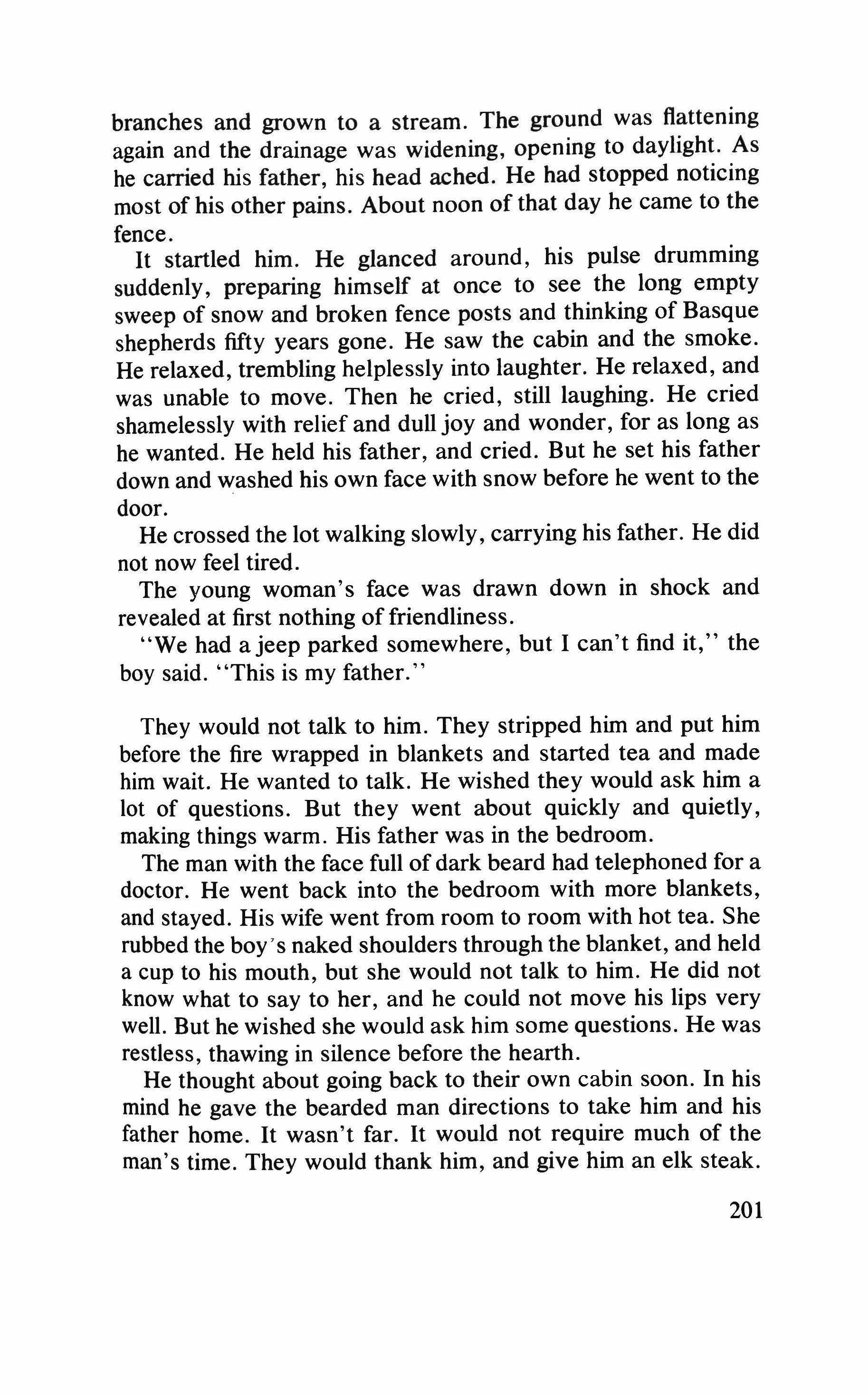
branches and grown to a stream. The ground was flattening again and the drainage was widening, opening to daylight. As he carried his father, his head ached. He had stopped noticing most of his other pains. About noon of that day he came to the fence.
It startled him. He glanced around, his pulse drumming suddenly, preparing himself at once to see the long empty sweep of snow and broken fence posts and thinking of Basque shepherds fifty years gone. He saw the cabin and the smoke. He relaxed, trembling helplessly into laughter. He relaxed, and was unable to move. Then he cried, still laughing. He cried shamelessly with relief and dull joy and wonder, for as long as he wanted. He held his father, and cried. But he set his father down and washed his own face with snow before he went to the door.
He crossed the lot walking slowly, carrying his father. He did not now feel tired.
The young woman's face was drawn down in shock and revealed at first nothing of friendliness.
"We had ajeep parked somewhere, but I can't find it," the boy said. "This is my father."
They would not talk to him. They stripped him and put him before the fire wrapped in blankets and started tea and made him wait. He wanted to talk. He wished they would ask him a lot of questions. But they went about quickly and quietly, making things warm. His father was in the bedroom.
The man with the face full of dark beard had telephoned for a doctor. He went back into the bedroom with more blankets, and stayed. His wife went from room to room with hot tea. She rubbed the boy's naked shoulders through the blanket, and held a cup to his mouth, but she would not talk to him. He did not know what to say to her, and he could not move his lips very well. But he wished she would ask him some questions. He was restless, thawing in silence before the hearth.
He thought about going back to their own cabin soon. In his mind he gave the bearded man directions to take him and his father home. It wasn't far. It would not require much of the man's time. They would thank him, and give him an elk steak.
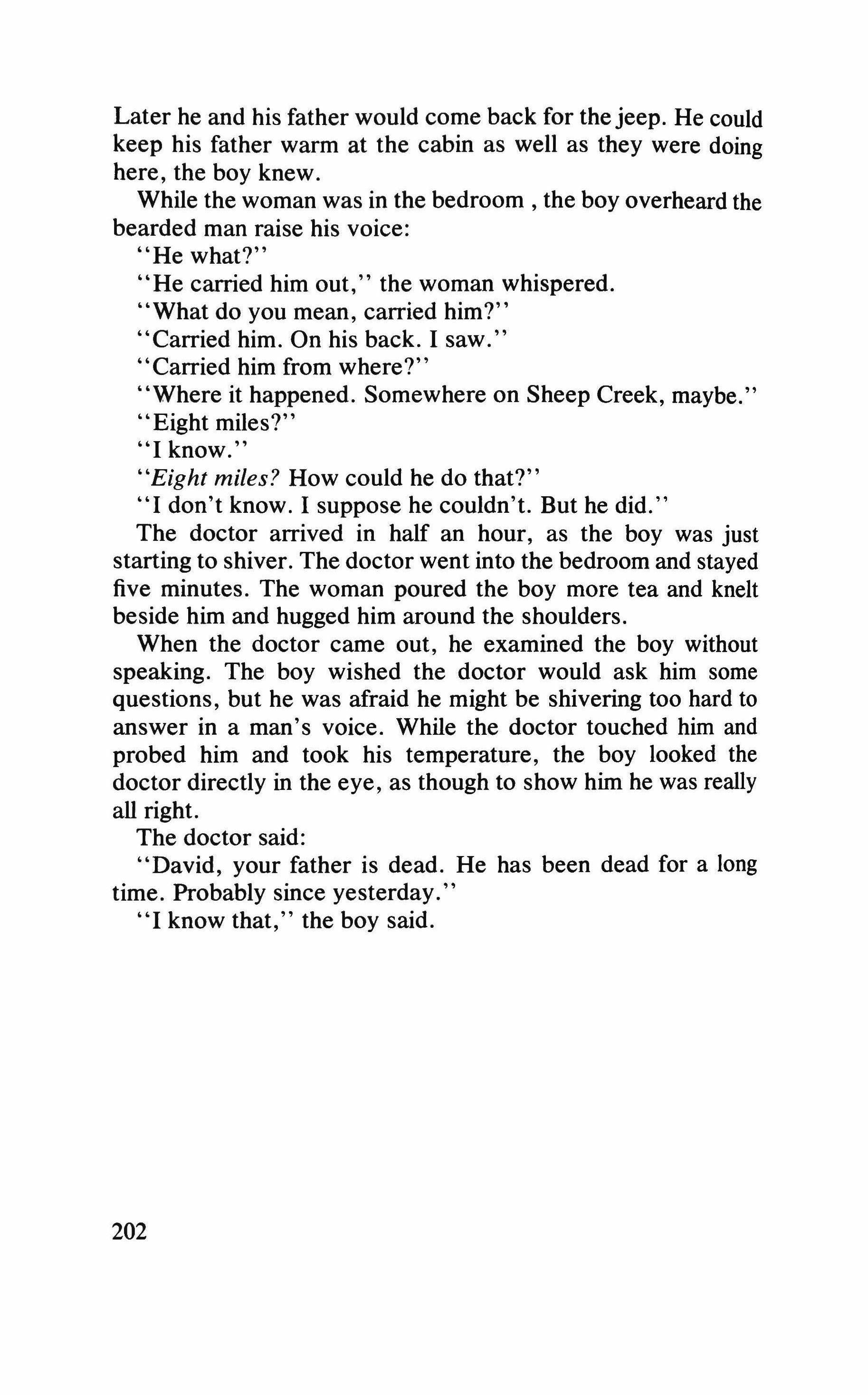
Later he and his father would come back for the jeep. He could keep his father warm at the cabin as well as they were doing here, the boy knew.
While the woman was in the bedroom, the boy overheard the bearded man raise his voice:
"He what?"
"He carried him out," the woman whispered.
"What do you mean, carried him?"
"Carried him. On his back. I saw."
"Carried him from where?"
"Where it happened. Somewhere on Sheep Creek, maybe."
"Eight miles?"
"I know."
"Eight miles? How could he do that?"
"I don't know. I suppose he couldn't. But he did."
The doctor arrived in half an hour, as the boy was just starting to shiver. The doctor went into the bedroom and stayed five minutes. The woman poured the boy more tea and knelt beside him and hugged him around the shoulders.
When the doctor came out, he examined the boy without speaking. The boy wished the doctor would ask him some questions, but he was afraid he might be shivering too hard to answer in a man's voice. While the doctor touched him and probed him and took his temperature, the boy looked the doctor directly in the eye, as though to show him he was really all right.
The doctor said:
"David, your father is dead. He has been dead for a long time. Probably since yesterday."
"I know that," the boy said.
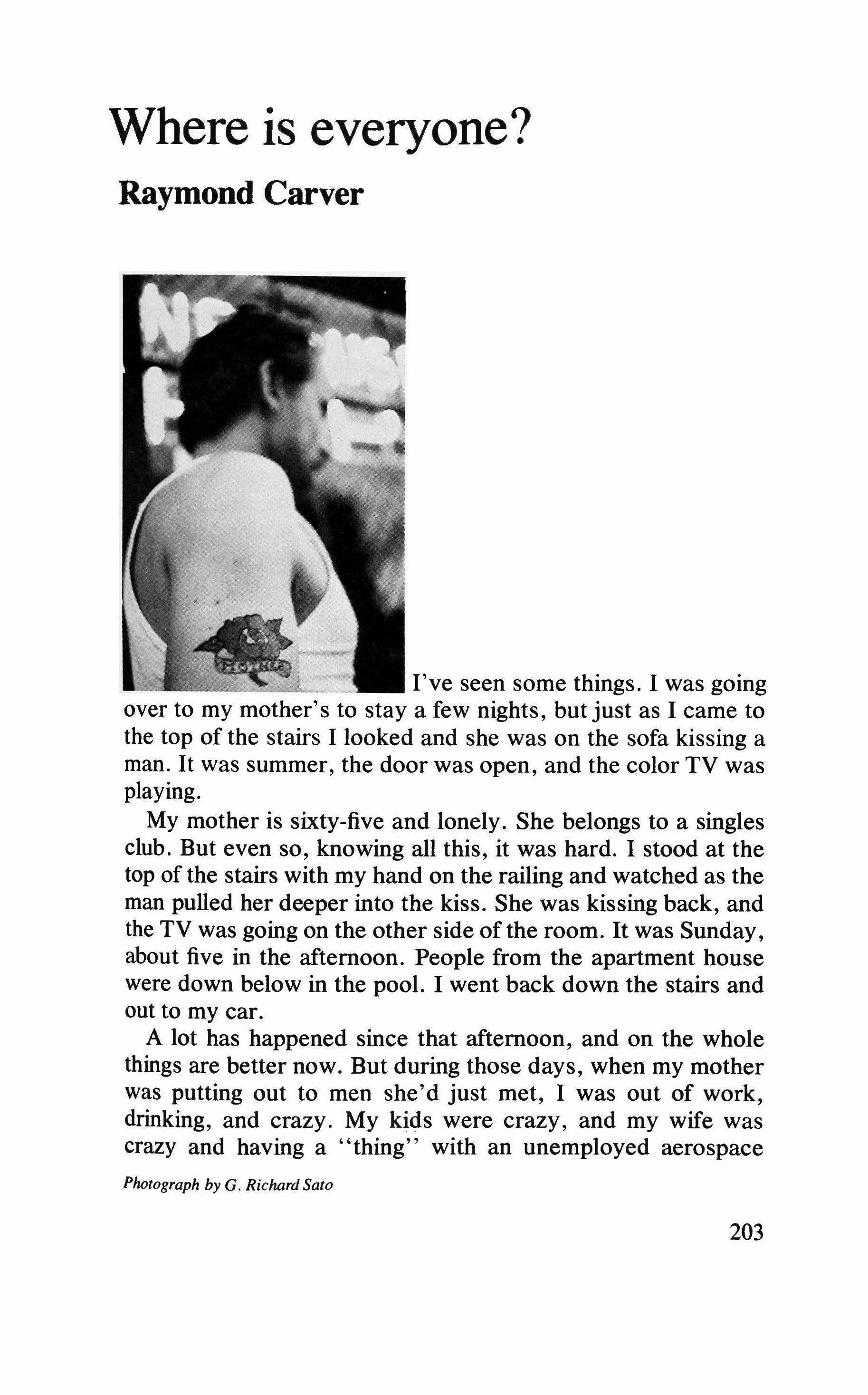
I've seen some things. I was going over to my mother's to stay a few nights, but just as I came to the top of the stairs I looked and she was on the sofa kissing a man. It was summer, the door was open, and the color TV was playing.
My mother is sixty-five and lonely. She belongs to a singles club. But even so, knowing all this, it was hard. I stood at the top of the stairs with my hand on the railing and watched as the man pulled her deeper into the kiss. She was kissing back, and the TV was going on the other side of the room. It was Sunday, about five in the afternoon. People from the apartment house were down below in the pool. I went back down the stairs and out to my car.
A lot has happened since that afternoon, and on the whole things are better now. But during those days, when my mother was putting out to men she'd just met, I was out of work, drinking, and crazy. My kids were crazy, and my wife was crazy and having a "thing" with an unemployed aerospace
Photograph by G. Richard Sato
engineer she'd met at AA. He was crazy too. His name was Ross and he had five or six kids. He walked with a limp from a gunshot wound his first wife had given him. He didn't have a wife now; he wanted my wife. I don't know what we were all thinking of in those days. The second wife had come and gone, but it was his first wife who had shot him in the thigh some years back, giving him the limp, and who now had him in and out of court, or in jail, every six months or so for not meeting his support payments. I wish him well now. But it was different then. More than once in those days I mentioned weapons. I'd say to my wife, I'd shout it, "I'm going to kill him!" But nothing ever happened. Things lurched on. I never met the man, though we talked on the phone a few times. I did find a couple of pictures of him once when I was going through my wife's purse. He was a little guy, not too little, and he had a mustache and was wearing a striped jersey, waiting for a kid to come down the slide. In the other picture he was standing against a house-my house? I couldn't tell-with his arms crossed, dressed up, wearing a tie. Ross, you son of a bitch, I hope you're okay now. I hope things are better for you too.
The last time he'd been jailed, a month before that Sunday, I found out from my daughter that her mother had gone bail for him. Daughter Kate, who was fifteen, didn't take to this any better than I did. It wasn't that she had any loyalty to me in this-she had no loyalties to me or her mother in anything and was only too willing to sell either one of us down the river. No, it was that there was a serious cash-flow problem in the house and if money went to Ross, there'd be that much less for what she needed. So Ross was on her list now. Also, she didn't like his kids, she'd said, but she'd told me once before that in general Ross was all right, even funny and interesting when he wasn't drinking. He'd even told her fortune.
He spent his time repairing things, now that he could no longer hold a job in the aerospace industry. But I'd seen his house from the outside; and the place looked like a dumping ground, with all kinds and makes of old appliances and equipment that would never wash or cook or play again-all of itjust standing in his open garage and on his drive and in the front yard. He also kept some broken-down cars around that he liked to tinker on. In the first stages of their affair my wife had told

me he "collected antique cars." Those were her words. I'd seen some of his cars parked in front of his house when I'd driven by there trying to see what I could see. Old 1950s and I%Os, dented cars with torn seat covers. They were junkers, that's all. I knew. I had his number. We had things in common, more thanjust driving old cars and trying to hold on for dear life to the same woman. Still, handyman or not, he couldn't manage to tune my wife's car properly or fix our TV set when it broke down and we lost the picture. We had volume, but no picture. If we wanted to get the news, we'd have to sit around the screen at night and listen to the set. I'd drink and make some crack to my kids about Mr. Fixit. Even now I don't know if my wife believed that stuff or not, about antique cars and such. But she cared for him, she loved him even; that's pretty clear now.
They'd met when Cynthia was trying to stay sober and was going to meetings three or four times a week. I had been in and out of AA for several months, though when Cynthia met Ross I was out and drinking a fifth a day of anything I could get my hands on. But as I heard Cynthia say to someone over the phone about me, I'd had the exposure to AA and knew where to go when I really wanted help. Ross had been in AA and then had gone back to drinking again. Cynthia felt, I think, that maybe there was more hope for him than for me and tried to help him and so went to the meetings to keep herself sober, then went over to cook for him or clean his house. His kids were no help to him in this regard. Nobody lifted a hand around his house except Cynthia when she was there. But the less his kids pitched in, the more he loved them. It was strange. It was the opposite with me. I hated my kids during this time. I'd be on the sofa with a glass of vodka and grapefruitjuice when one of them would come in from school and slam the door. One afternoon I screamed and got into a scuffle with my son. Cynthia had to break it up when I threatened to knock him to pieces. I said I would kill him. I said, "I gave you life and I can take it away."
Madness.
The kids, Katy and Mike, were only too happy to take advantage ofthis crumbling situation. They seemed to thrive on the threats and bullying they inflicted on each other and on
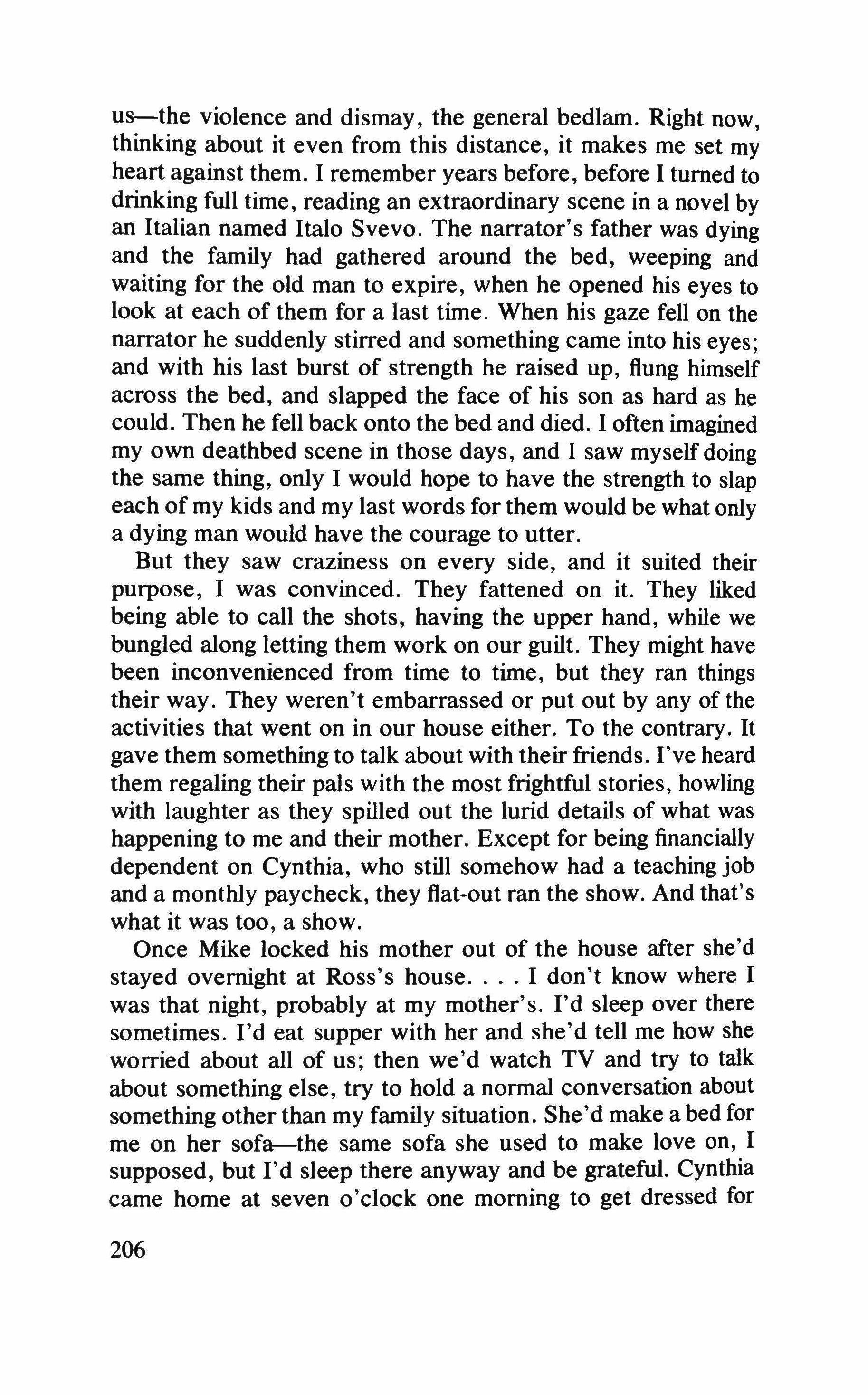
us-the violence and dismay, the general bedlam. Right now, thinking about it even from this distance, it makes me set my heart against them. I remember years before, before I turned to drinking full time, reading an extraordinary scene in a novel by an Italian named Italo Svevo. The narrator's father was dying and the family had gathered around the bed, weeping and waiting for the old man to expire, when he opened his eyes to look at each of them for a last time. When his gaze fell on the narrator he suddenly stirred and something came into his eyes; and with his last burst of strength he raised up, flung himself across the bed, and slapped the face of his son as hard as he could. Then he fell back onto the bed and died. I often imagined my own deathbed scene in those days, and I saw myselfdoing the same thing, only I would hope to have the strength to slap each of my kids and my last words for them would be what only a dying man would have the courage to utter.
But they saw craziness on every side, and it suited their purpose, I was convinced. They fattened on it. They liked being able to call the shots, having the upper hand, while we bungled along letting them work on our guilt. They might have been inconvenienced from time to time, but they ran things their way. They weren't embarrassed or put out by any of the activities that went on in our house either. To the contrary. It gave them something to talk about with their friends. I've heard them regaling their pals with the most frightful stories, howling with laughter as they spilled out the lurid details of what was happening to me and their mother. Except for being financially dependent on Cynthia, who still somehow had a teaching job and a monthly paycheck, they flat-out ran the show. And that's what it was too, a show.
Once Mike locked his mother out of the house after she'd stayed overnight at Ross's house I don't know where I was that night, probably at my mother's. I'd sleep over there sometimes. I'd eat supper with her and she'd tell me how she worried about all of us; then we'd watch TV and try to talk about something else, try to hold a normal conversation about something other than my family situation. She'd make a bed for me on her sofa-the same sofa she used to make love on, I supposed, but I'd sleep there anyway and be grateful. Cynthia came home at seven o'clock one morning to get dressed for
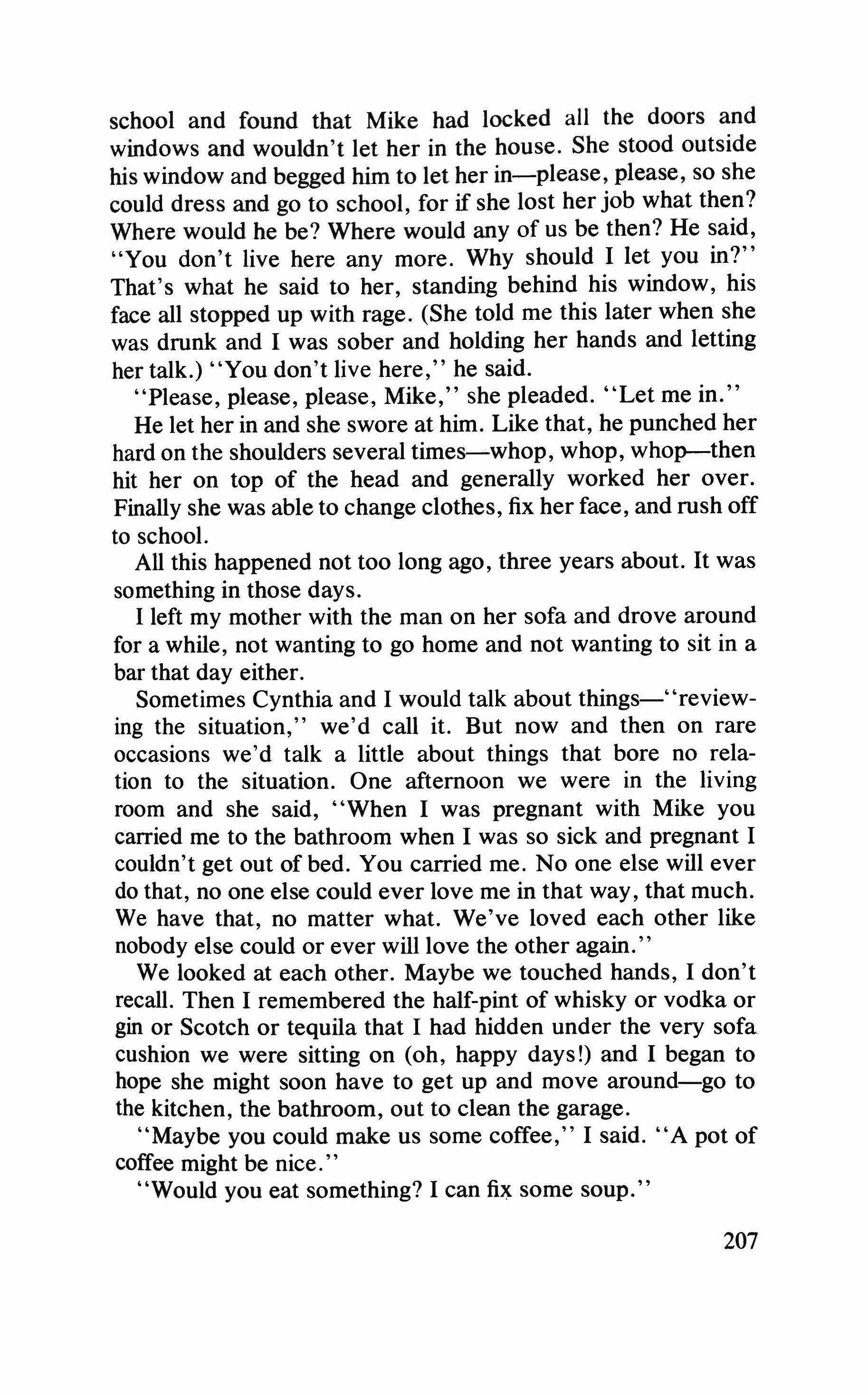
school and found that Mike had locked all the doors and windows and wouldn't let her in the house. She stood outside his window and begged him to let her in-please, please, so she could dress and go to school, for if she lost her job what then? Where would he be? Where would any of us be then? He said, "You don't live here any more. Why should I let you in?" That's what he said to her, standing behind his window, his face all stopped up with rage. (She told me this later when she was drunk and I was sober and holding her hands and letting her talk.) "You don't live here," he said.
"Please, please, please, Mike," she pleaded. "Let me in."
He let her in and she swore at him. Like that, he punched her hard on the shoulders several times-whop, whop, whop-then hit her on top of the head and generally worked her over. Finally she was able to change clothes, fix her face, and rush off to school.
All this happened not too long ago, three years about. It was something in those days.
I left my mother with the man on her sofa and drove around for a while, not wanting to go home and not wanting to sit in a bar that day either.
Sometimes Cynthia and I would talk about things-"reviewing the situation," we'd call it. But now and then on rare occasions we'd talk a little about things that bore no relation to the situation. One afternoon we were in the living room and she said, "When I was pregnant with Mike you carried me to the bathroom when I was so sick and pregnant I couldn't get out of bed. You carried me. No one else will ever do that, no one else could ever love me in that way, that much. We have that, no matter what. We've loved each other like nobody else could or ever will love the other again."
We looked at each other. Maybe we touched hands, I don't recall. Then I remembered the half-pint of whisky or vodka or gin or Scotch or tequila that I had hidden under the very sofa cushion we were sitting on (oh, happy days!) and I began to hope she might soon have to get up and move around-go to the kitchen, the bathroom, out to clean the garage.
"Maybe you could make us some coffee," I said. "A pot of coffee might be nice.
"Would you eat something? I can fix some soup."

"Maybe I could eat something, but I'll for sure drink a cup of coffee.
She went out to the kitchen. I waited until I heard her begin to run water. Then I reached under the cushion for the bottle, unscrewed the lid, and drank.
I never told these things at AA. I never said much at the meetings. I'd "pass" as they called it: when it came your tum to speak and you didn't say anything except "I'll pass tonight, thanks." But I would listen and shake my head and laugh in recognition at the awful stories I heard. Usually I was drunk when I went to those first meetings. You're scared and you need something more than cookies and instant coffee.
But those conversations touching on love or the past were rare. If we talked, we talked about business, survival, the bottom line of things. Money. Where is the money going to come from? The telephone was on the way out, the lights and gas threatened. What about Katy? She needs clothes. Her grades. That boyfriend of hers is a biker. Mike. What's going to happen to Mike? What's going to happen to us all? "My God," she'd say. But God wasn't having any of it. He'd washed his hands of us.
I wanted Mike to join the army, navy, or the coast guard. He was impossible. A dangerous character. Even Ross felt the army would be good for him, Cynthia had told me, and she hadn't liked him telling her that a bit. But I was pleased to hear this and to find out that Ross and I were in agreement on the matter. Ross went up a peg in my estimation. But it angered Cynthia because, miserable as Mike was to have around, despite his violent streak, she thought it was just a phase that would soon pass. She didn't want him in the army. But Ross told Cynthia that Mike belonged in the army where he'd learn respect and manners. He told her this after there'd been a pushing and shoving match out in his drive in the early morning hours when Mike had thrown him down on the pavement.
Ross loved Cynthia, but he also had a twenty-two-year-old girl named Beverly who was pregnant with his baby, though Ross assured Cynthia he loved her, not Beverly. They didn't even sleep together any longer, he told Cynthia, but Beverly was carrying his baby and he loved all his children, even the unborn, and he couldn't just give her the boot, could he? He
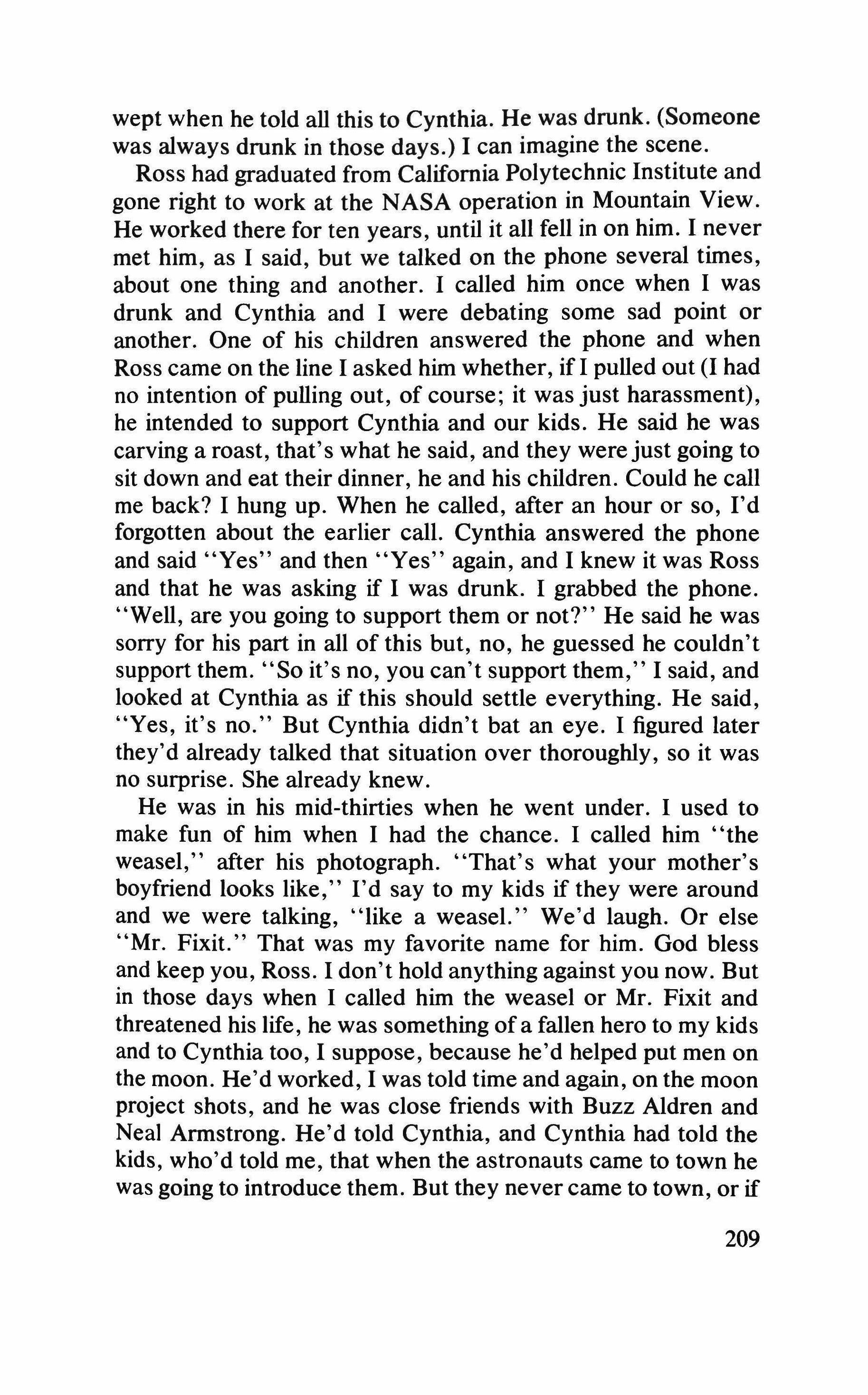
wept when he told all this to Cynthia. He was drunk. (Someone was always drunk in those days.) I can imagine the scene.
Ross had graduated from California Polytechnic Institute and gone right to work at the NASA operation in Mountain View. He worked there for ten years, until it all fell in on him. 1 never met him, as I said, but we talked on the phone several times, about one thing and another. I called him once when I was drunk and Cynthia and I were debating some sad point or another. One of his children answered the phone and when Ross came on the line I asked him whether, if 1 pulled out (I had no intention of pulling out, of course; it was just harassment), he intended to support Cynthia and our kids. He said he was carving a roast, that's what he said, and they were just going to sit down and eat their dinner, he and his children. Could he call me back? 1 hung up. When he called, after an hour or so, I'd forgotten about the earlier call. Cynthia answered the phone and said "Yes" and then "Yes" again, and I knew it was Ross and that he was asking if I was drunk. I grabbed the phone. "Well, are you going to support them or not?" He said he was sorry for his part in all of this but, no, he guessed he couldn't support them. "So it's no, you can't support them," I said, and looked at Cynthia as if this should settle everything. He said, "Yes, it's no." But Cynthia didn't bat an eye. I figured later they'd already talked that situation over thoroughly, so it was no surprise. She already knew.
He was in his mid-thirties when he went under. I used to make fun of him when I had the chance. I called him "the weasel," after his photograph. "That's what your mother's boyfriend looks like," I'd say to my kids if they were around and we were talking, "like a weasel." We'd laugh. Or else "Mr. Fixit." That was my favorite name for him. God bless and keep you, Ross. I don't hold anything against you now. But in those days when I called him the weasel or Mr. Fixit and threatened his life, he was something of a fallen hero to my kids and to Cynthia too, I suppose, because he'd helped put men on the moon. He'd worked, I was told time and again, on the moon project shots, and he was close friends with Buzz Aldren and Neal Armstrong. He'd told Cynthia, and Cynthia had told the kids, who'd told me, that when the astronauts came to town he was going to introduce them. But they never came to town, or if
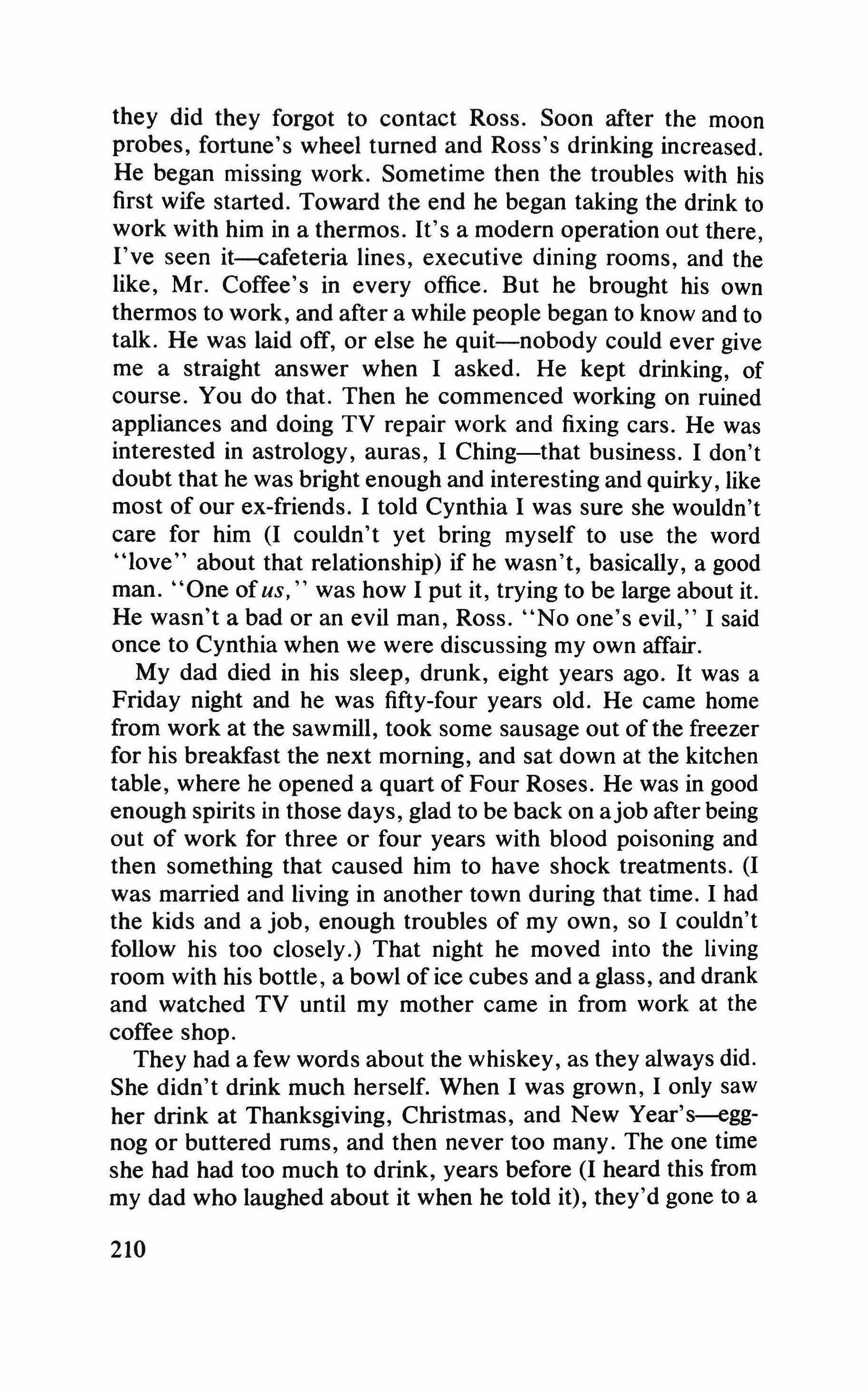
they did they forgot to contact Ross. Soon after the moon probes, fortune's wheel turned and Ross's drinking increased. He began missing work. Sometime then the troubles with his first wife started. Toward the end he began taking the drink to work with him in a thermos. It's a modem operation out there, I've seen it-cafeteria lines, executive dining rooms, and the like, Mr. Coffee's in every office. But he brought his own thermos to work, and after a while people began to know and to talk. He was laid off, or else he quit-nobody could ever give me a straight answer when 1 asked. He kept drinking, of course. You do that. Then he commenced working on ruined appliances and doing TV repair work and fixing cars. He was interested in astrology, auras, 1 Ching-that business. 1 don't doubt that he was bright enough and interesting and quirky, like most of our ex-friends. 1 told Cynthia 1 was sure she wouldn't care for him (I couldn't yet bring myself to use the word "love" about that relationship) if he wasn't, basically, a good man. "One ofus," was how 1 put it, trying to be large about it. He wasn't a bad or an evil man, Ross. "No one's evil," 1 said once to Cynthia when we were discussing my own affair.
My dad died in his sleep, drunk, eight years ago. It was a Friday night and he was fifty-four years old. He came home from work at the sawmill, took some sausage out of the freezer for his breakfast the next morning, and sat down at the kitchen table, where he opened a quart of Four Roses. He was in good enough spirits in those days, glad to be back on ajob after being out of work for three or four years with blood poisoning and then something that caused him to have shock treatments. (I was married and living in another town during that time. 1 had the kids and a job, enough troubles of my own, so 1 couldn't follow his too closely.) That night he moved into the living room with his bottle, a bowl of ice cubes and a glass, and drank and watched TV until my mother came in from work at the coffee shop.
They had a few words about the whiskey, as they always did. She didn't drink much herself. When 1 was grown, 1 only saw her drink at Thanksgiving, Christmas, and New Year's-eggnog or buttered rums, and then never too many. The one time she had had too much to drink, years before (I heard this from my dad who laughed about it when he told it), they'd gone to a

little place outside Eureka and she'd had a great many whiskey sours. Just as they got into the car to leave, she started to get sick and had to open the door. Somehow her false teeth came out, the car moved forward a little, and a tire passed over her dentures. After that she never drank except on holidays and then never to excess.
My dad kept on drinking that Friday night and tried to ignore my mother, who sat out in the kitchen and smoked and tried to write a letter to her sister in Little Rock. Finally he got up and went to bed. My mother went to bed not long after, when she was sure he was asleep. She said later she noticed nothing out of the ordinary except maybe his snoring seemed heavier and deeper and she couldn't get him to turn on his side. But she went to sleep. She woke up when my dad's sphincter muscles and bladder let go. It was just sunrise. Birds were singing. My dad was still on his back, eyes closed and mouth open. My mother looked at him and cried his name.
I kept driving around. It was dark by now. I drove by my house, every light ablaze, but Cynthia's car wasn't in the drive. I went to a bar where I sometimes drank and called home. Katy answered and said her mother wasn't there, and where was I? She needed five dollars. I shouted something and hung up. Then I called collect to a woman six hundred miles away whom I hadn't seen in months, a good woman who, the last time I'd seen her, had said she would pray for me.
She accepted the charges. She asked where I was calling from. She asked how I was. "Are you all right?" she said.
We talked. I asked about her husband. He'd been a friend of mine and was now living away from her and the children.
"He's still in Richland," she said. "How did all this happen to us?" she asked. "We started out good people." We talked a While longer; then she said she still loved me and that she would continue to pray for me.
"Pray for me," I said. "Yes." Then we said good-bye and hung up.
Later I called home again, but this time no one answered. I dialed my mother's number. She picked up the phone on the first ring, her voice cautious, as if expecting trouble.
"It's me," I said. ''I'm sorry to be calling."
"No, no, honey, I was up," she said. "Where are you? Is
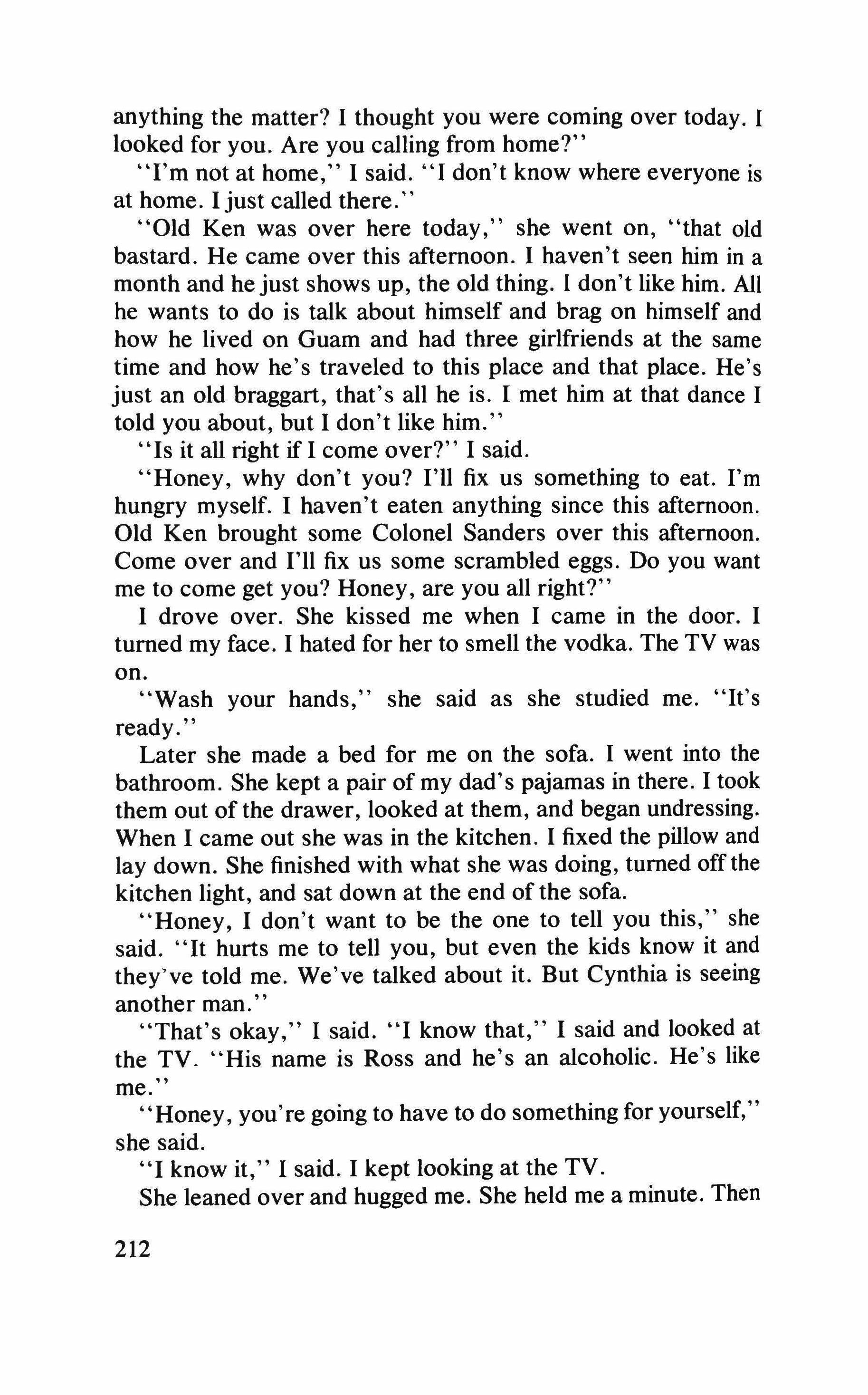
anything the matter? I thought you were coming over today. I looked for you. Are you calling from home?"
'T m not at home," I said. "I don't know where everyone is at home. I just called there."
"Old Ken was over here today," she went on, "that old bastard. He came over this afternoon. I haven't seen him in a month and he just shows up, the old thing. I don't like him. All he wants to do is talk about himself and brag on himself and how he lived on Guam and had three girlfriends at the same time and how he's traveled to this place and that place. He's just an old braggart, that's all he is. I met him at that dance I told you about, but I don't like him."
"Is it all right if I come over?" I said.
"Honey, why don't you? I'll fix us something to eat. I'm hungry myself. I haven't eaten anything since this afternoon. Old Ken brought some Colonel Sanders over this afternoon. Come over and I'll fix us some scrambled eggs. Do you want me to come get you? Honey, are you all right?"
I drove over. She kissed me when I came in the door. I turned my face. I hated for her to smell the vodka. The TV was on.
"Wash your hands," she said as she studied me. "It's ready.
Later she made a bed for me on the sofa. I went into the bathroom. She kept a pair of my dad's pajamas in there. I took them out of the drawer, looked at them, and began undressing. When I came out she was in the kitchen. I fixed the pillow and lay down. She finished with what she was doing, turned off the kitchen light, and sat down at the end of the sofa.
"Honey, I don't want to be the one to tell you this," she said. "It hurts me to tell you, but even the kids know it and they've told me. We've talked about it. But Cynthia is seeing another man."
"That's okay," I said. "I know that," I said and looked at the TV. "His name is Ross and he's an alcoholic. He's like me."
"Honey, you're going to have to do something for yourself," she said.
"I know it," I said. I kept looking at the TV. She leaned over and hugged me. She held me a minute. Then

she let go and wiped her eyes. "TIl get you up in the morning," she said.
"I don't have much to do tomorrow. I might sleep in a while after you go." I thought: after you get up, after you've gone to the bathroom and gotten dressed, then I'll get into your bed and lie there and doze and listen to your radio out in the kitchen giving the news and weather.
"Honey, I'm so worried about you.
"Don't worry," I said. I shook my head.
"You get some rest now," she said. "You need to sleep."
"I'll sleep. I'm very sleepy."
"Watch television as long as you want," she said.
I nodded.
She bent and kissed me. Her lips seemed bruised and swollen. She drew the blanket over me. Then she went into her bedroom. She left the door open, and in a minute I could hear her snoring.
I lay there staring at the TV. There were images of uniformed men on the screen, a low murmur, then tanks and a man using a flamethrower. I couldn't hear it, but I didn't want to get up. I kept staring until I felt my eyes close. But I woke up with a start, the pajamas damp with sweat. A snowy light filled the room. There was a roaring coming at me. The room clamored. I lay there. I didn't move.

When Harry Quinn was eight, his father caught a sleeve accidentally in the conveyor mouth of a John Deere com-husker on a dairy farm outside of Manistee, Michigan. And when the man who owned the farm, a Dutchman named Van't Hul, had seen him from a long way off, leaning against the husker's bright red panels waving his free arm in the air, he came running to see what was exciting. The hand was pulled in pieces by the time he got there, and most of it was already stripped loose of the arm, and the bones had jammed in the husker and shut down the works as truly as a piece of board. But when Harry Quinn's father got out of the hospital, he set about to quit working farms and quit saving money for farm land and quit laying up surplus machinery, and moved out of Manistee County altogether to a rented stucco house on Menominee Street in Traverse, and went to work for John Deere selling huskers with metal features across their conveyor mouths, using his new red stump for a selling aid. His father began to seem happier right away, and laughed all the time, and smoked big cigars, and told his customers he liked
Photograph. courtesy Steven M. Krauzer 214

selling huskers more than he liked working them, and that if he hadn't lost his hand to one he would never have gotten the chance to get smart. Though for years after the accident, his mother would wake up in the night and scream "Hand, hand!" as loud as she could because she had a dream where she saw it all happening again, even though she hadn't seen it the first time. He could remember, when he was nine and ten, waking up after the screaming had stopped, hearing his father talking in the next room in a soft, consoling voice, calming his wife back to sleep. And when Quinn was thirteen, his father told him, sitting in the warm ice hut in the middle of the big bay, that sometimes while he soothed her it was everything he could do to keep himselffrom breaking out laughing, because he thought that if he hadn't lost his hand and given up the idea of a farm, he'd have gone crazy in no time at all, and his wife would've left him as a failure, and his whole life, and Quinn's too, would've been nothing but a misery from then on.
In November, Quinn had begun running the deer tag stations on the county roads between East Jordan and Mancelona and working nights in the state jeep, sitting solo in the trees with the door left open to the air waiting for a seal beam to snap in the firebreaks or up in the old white pine slashes, and hear a poacher's .22 crackle smartly in the cold, and start idling toward where the noise was with his lights out. He liked that, the high-density sensation of work at night. It made him feel out of time and out of real space and located close to himself, as if located was the illusion, the thing he'd missed since he'd come back from the service, the ultimate good luck.
Rae hadn't liked things from the beginning. Quinn had bought a mobile home in Traverse City and moved it up onto a finished basement at the top of the bay where the birches and the cherry woods could plug off the wind. She hadn't liked the trailer and hadn't liked where it sat at the edge of a cut-over orchard, too near the timber for light to stay in the trailer all day. She didn't like Michigan. She told him it was glacial and ground down, and too bleak and uncharming for people to live. She said she liked the west, liked looking up and down at things instead of across at them. She didn't like the flat-head bars and the cafes he took her to in Mancelona and Torch Lake and

down in Traverse, wherever he was working. Sometimes in the bar light he'd see a face he knew, somebody from school, somebody he didn't want to talk to. There was nobody he thought he needed to talk to just then, and it made her mad. And late at night they'd go home in the jeep and she'd be mad.
He began to come home mornings in the first December and find Rae out of the bed, see her through the window, motionless in her yellow parka at the farthest edge of the orchard where it rode up into the birches, looking down at the trailer and at him when he drove up, as if it was a sight that kept appearing to her in a dream but that she couldn't believe really existed in her life, and she had to go out and wait in the clear cold and verify it for herself. In a little while she would come inside where he was cooking eggs, standing at the stove in his undershirt and suspenders with all the lights on and the heat up in the kitchen and the grease smelling in the air.
Once she said to him: "I never thought I'd live in a trailer in the woods with a game warden. You know that? It wasn't what I had in mind for myself when I was twelve."
He stopped and looked out the cold kitchen window at the fog running off the snow crust, swarming back through the bare white birch trunks into the denser timber. He liked the plain compacted loneliness, the low almost pleasing pain of knowing that nothing of any consequence was going bad for once. "I never thought I'd fly helicopters and pour shit on Chinamen either, but I did.
"You wanted that though, didn't you?" she said.
"Sure." He looked at the eggs where they had broken up in the grease, turning pale.
"Do you have bad dreams about that now?"
"Never do." He thumbed down the heat and let the eggs go rubbery and hard.
She sat down at the dinette and looked at the same place he was looking, only through the lower window.•• I just think, you know," she said calmly, and waited a moment. "I mean, I just kick around here." She looked at him. She still had her yellow parka on. "I thought you wouldn't keep being this way. I thought it was because you'd been in the war, but I don't think that's right, is it?"
He put his eggs on his plate and carried it to the table and put
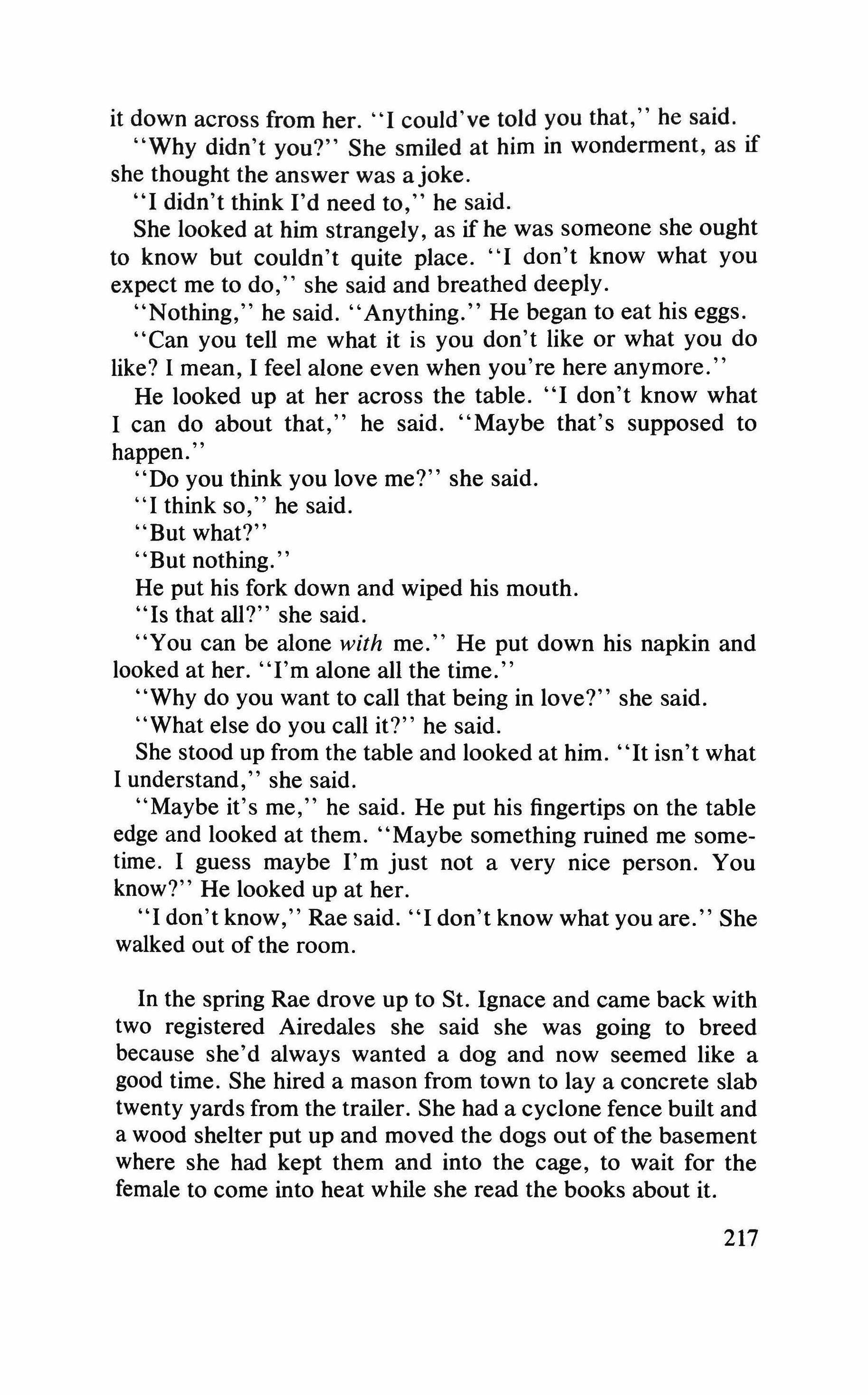
it down across from her. "I could've told you that," he said.
"Why didn't you?" She smiled at him in wonderment, as if she thought the answer was ajoke.
"I didn't think I'd need to," he said.
She looked at him strangely, as if he was someone she ought to know but couldn't quite place. "I don't know what you expect me to do," she said and breathed deeply.
"Nothing," he said. "Anything." He began to eat his eggs.
"Can you tell me what it is you don't like or what you do like? I mean, I feel alone even when you're here anymore."
He looked up at her across the table. "I don't know what I can do about that," he said. "Maybe that's supposed to happen."
"Do you think you love me?" she said.
"I think so," he said.
"But what?"
"But nothing."
He put his fork down and wiped his mouth.
"Is that all?" she said.
"You can be alone with me." He put down his napkin and looked at her. "I'm alone all the time."
"Why do you want to call that being in love?" she said.
"What else do you call it?" he said.
She stood up from the table and looked at him. "It isn't what I understand," she said.
"Maybe it's me," he said. He put his fingertips on the table edge and looked at them. "Maybe something ruined me sometime. I guess maybe I'm just not a very nice person. You know?" He looked up at her.
"I don't know," Rae said. "I don't know what you are." She walked out of the room.
In the spring Rae drove up to St. Ignace and came back with two registered Airedales she said she was going to breed because she'd always wanted a dog and now seemed like a good time. She hired a mason from town to lay a concrete slab twenty yards from the trailer. She had a cyclone fence built and a wood shelter put up and moved the dogs out of the basement where she had kept them and into the cage, to wait for the female to come into heat while she read the books about it.

In September the female had not come in yet, and Rae began sleeping late and driving nights up to Petoskey taking any kind ofjunior college classes she could get. In October he caught his first two months working days, but Rae wouldn't come back from Petoskey sometimes until after two. The dogs would wake him up barking, and he could see the lights go on out in the enclosure, hear the gates clank, and hear her talking to the dogs in a sweet, coaxing voice. He would lie in bed and try to stay awake until she came in, feeling like he missed her but that she was a long way away, almost out of reach, so that when she came inside from the dogs he would always be asleep.
In late November he went back to working nights, and Rae began staying over in Petoskey, going up on Tuesday and coming back Wednesday night-staying, she said, with a woman she met in her history class. They had stopped making love in the summer, after she got the dogs, and he had begun to feel as far back as then, like he was running a skein out, but that he could stand it. He thought-sitting out in the frozen night in the jeep, drinking whiskey and coffee out of a hot-flask and watching the empty ice huts speckling the bay in the moonlight-that the only dangerous lie about being in love was that it was permanent. And once you knew that, love didn't make you miserable, and you were safe from falling in it too deep. In the best world it was a losing proposition, but even that could be satisfactory if you didn't insist on making up all the losses, because you could erase yourself by mistake in the process. And he wanted to avoid that. He knew the limits, and that seemed to be the key to everything.
On the sixth of December he drove into the trailer before five A.M., when it was still dark out in the orchard. The light was left on in the kitchen and in the dog cages, and the car was gone. In the kitchen there was a note taped to the window above the sink. It said: "Dear Harry, Just too bleak here. Love, R." He took the paper off the window and put it on the sink top and read it again. He had on his green state issue parka with the silver badge; and shining out of the glassy darkness of the window, he thought he looked good enough and up to everything, even though he felt just at that moment like a man falling, all out ofattitude, from somewhere he didn't remember, toward some place he couldn't see below. He walked back

outside and across the frozen yard to the kennels. Both pens were empty, and the spotlight over the gate was left on to warm the air. He looked inside the shelter, but the dogs weren't there. The concrete had been scrubbed and ice had formed in the depressions, and the dog smell had gone thin in the cold. He walked back inside and went into every room in the trailer, turning on the lights and opening the closets. He turned on the radio in the kitchen to get the weather. He had the idea he should go in the basement and check the pipes and the water heater in case it snapped off cold. But when he got down the stairs in the basement where it was still and moist, he turned on the bulb and looked at the water heater, white and shining in the comer as if it were alive, and something seemed odd to him about it, something obstinate and repelling. He went back out to the jeep, opened down the gate, got the AR-16 out of the case, and went back to the basement and down the steps. He stopped at the bottom riser and chambered the first round, put his arm through the sling, flattened his back against the wall, found the water heater in the irons, and opened up on it like a range dummy, hitting it all over, blowing the fixtures off the top, blowing the brass medallion out and back inside the tank, and blowing the heater all the way off its base and back into the soft cement wall behind it. When he finished, he turned off the light, put the gun back in the jeep, went inside to the kitchen, and ate some toast and stood and watched the light gray up. After that he went back down and turned off the gas and the water in the basement, then came back and got in bed.
And he thought, lying in his clothes, his father's favorite thought: that every move was a necessary move, an emblem of something that needed to be fixed or set right in the everyday scheme of things, like a hand needing to come off, and what Rae had done was try to fix her luck the best she could by making a move. He didn't blame her for it, and even though it left him feeling for that moment like he was falling some place he couldn't see, it didn't make him unhappy as an idea. The best thing you could do, he thought, was to take events one at a time, and hope that one event by itself wouldn't cut you up.
At eleven o'clock he woke up with the radio playing Johnny Paycheck allover the trailer. He put on his parka, got the dead dog crate out of the jeep, and brought it inside and shoveled the

pieces of the water heater in it. He stood in the living room with the door open, in the cold foggy light, listening to the furnace loading up and clicking, trying to keep the trailer warm, then took the crate out beyond the kennels into the snow and weed stubble and dumped it. Fog was expanding off the snow and clouding up into the birches at the top of the orchard. He took the box back to the jeep, shut the kennel gate, went inside and changed his uniform, and drove in to East Port the way he dreamed he would when he had been asleep.
At six o'clock Rae went into the bathroom and stayed a long time. Light was down now, and the mountains he could see from the bed through the window wore the same smeared patches of black, like silk draped below an orange-pink film. It was the danger time, now, the time of day when children got beaten, when suicides gassed themselves, when prisoners out in the penal gave up and started feeling for their veins. It had turned from the natural sequins of afternoon light to oyster gray, and the first dim lights of the deep trollers froze through the gloom. It was, he thought, listening to the shower hiss like rain behind the door, a bad time to be anywhere by yourself. And it had come to be the time he liked best in Mexico, as if the country was the tissue of everyone's loneliness.
He got up and put on his pants and walked in his bare feet out into the little fiat-stone patio that opened on the city and the smooth white-rock roofs terraced down into the evening. The air was damp and eucalyptus sweet, and he could see a long way up the Oaxaca valley, beyond where the city stretched to an end, to where the light was still amber and smokes dwindled out through the palms in the pueblos you couldn't see in daylight. The city layout in the dun darkness with no lights burning yet, as if the space were empty and there was no one alive for miles.
When Rae had been gone three months, he had driven in the jeep down to South Bend and taken the train to Chicago to see a woman he'd met in a bar in Charlevoix, whose husband worked for a company that kept him in California. He could remember dozing in the parlor car in the early morning quiet, watching the snow fall in the Indiana freight yards, waiting for the Amtrak to move. While he waited, a cut of cars was pulled away from
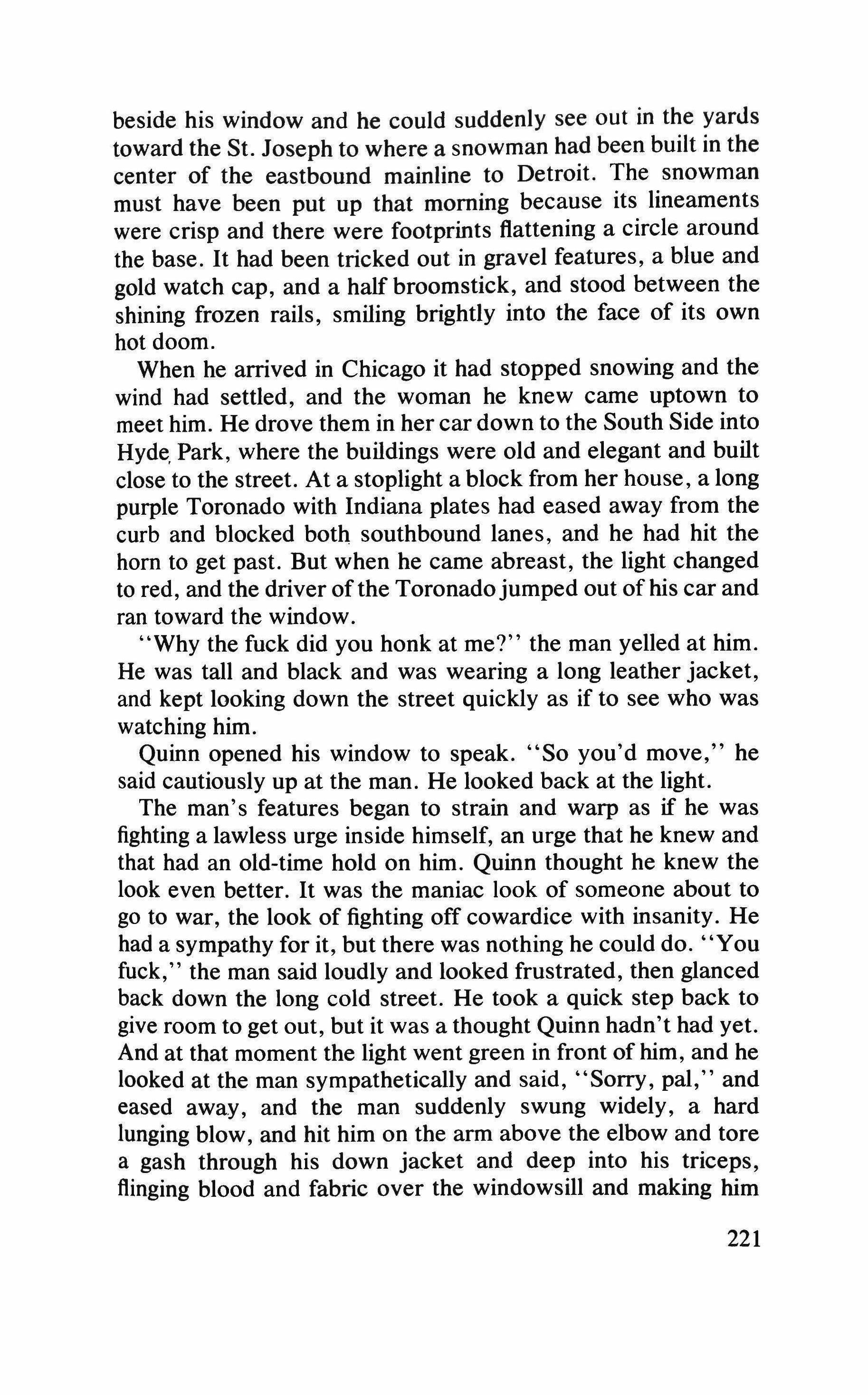
beside his window and he could suddenly see out in the yards toward the St. Joseph to where a snowman had been built in the center of the eastbound mainline to Detroit. The snowman must have been put up that morning because its lineaments were crisp and there were footprints flattening a circle around the base. It had been tricked out in gravel features, a blue and gold watch cap, and a half broomstick, and stood between the shining frozen rails, smiling brightly into the face of its own hot doom.
When he arrived in Chicago it had stopped snowing and the wind had settled, and the woman he knew came uptown to meet him. He drove them in her car down to the South Side into Hyde, Park, where the buildings were old and elegant and built close to the street. At a stoplight a block from her house, a long purple Toronado with Indiana plates had eased away from the curb and blocked both southbound lanes, and he had hit the hom to get past. But when he came abreast, the light changed to red, and the driver ofthe Toronadojumped out of his car and ran toward the window.
"Why the fuck did you honk at me?" the man yelled at him. He was tall and black and was wearing a long leather jacket, and kept looking down the street quickly as if to see who was watching him.
Quinn opened his window to speak. "So you'd move," he said cautiously up at the man. He looked back at the light.
The man's features began to strain and warp as if he was fighting a lawless urge inside himself, an urge that he knew and that had an old-time hold on him. Quinn thought he knew the look even better. It was the maniac look of someone about to go to war, the look of fighting off cowardice with insanity. He had a sympathy for it, but there was nothing he could do. "You fuck," the man said loudly and looked frustrated, then glanced back down the long cold street. He took a quick step back to give room to get out, but it was a thought Quinn hadn't had yet. And at that moment the light went green in front of him, and he looked at the man sympathetically and said, "Sorry, pal," and eased away, and the man suddenly swung widely, a hard lunging blow, and hit him on the arm above the elbow and tore a gash through his down jacket and deep into his triceps, flinging blood and fabric over the windowsill and making him

swerve into the other lane and nearly hit a parked car. The woman said, "Oh fuck," and he began to feel the blood, cold and beginning to dry.
He pulled over and bailed out, but the man had already run to his Toronado and was on his way up Kenwood Avenue, leaving him standing in the snow in the middle of the street, wishing he had a gun to blow the man's head off.
The cut had been superficial and hadn't required stitches. The woman put methiolate on it in her bathroom and said she thought he'd been cut with a bottle opener or a key ward, and that the man had been reaching for his face when the car started moving. His jacket was a loss and he had gotten a tetanus shot, and when he had spent an hour with the woman in her apartment across from Jackson Park and the I.e. line, he told her he wanted to see a friend who lived on the North Side. He took a cab up to Randolph Street and stayed all night by himself in the Holiday Inn overlooking the lake, unable to sleep until he could see the winter haze begin to brighten out toward Michigan.
But it had all given rise to a feeling he had never had before, even late in the war, counting days: a conscious, conspicuous fear of enormous injury. Sitting out nights in the frozen basswoods below Elk Lake, listening for trolling motors easing down into the shallows of the Rapid River, sinking steelhead weirs in between the first narrow sand shoals, he would sense something nearby, something that would crush him or blow him to pieces, and he'd pitch sideways in the jeep to miss whatever it was, though there was nothing. Delivery boys backing a TV out an appliance store door would make him twist up high in his stomach, ready to receive a killing blow. And at night in the trailer, just asleep, there'd be the same galvanic shock that sat him up in bed shuddering from the instinct that he'd almost been hit, though there was nothing to hit him and no one in the trailer but him, and his pistol beside the bed. And every time he had that fear, in the moments afterward, he'd picture in his mind not the junkie who'd cut him on Kenwood Avenue, which he thought was the true cause of it all, but the snowman in the train yards in South Bend, standing up erect by himself, smiling out at some disaster rising up over the horizon.
He thought now, though, watching the lights beginning to prickle up across the valley ofOaxaca out beyond the mountain
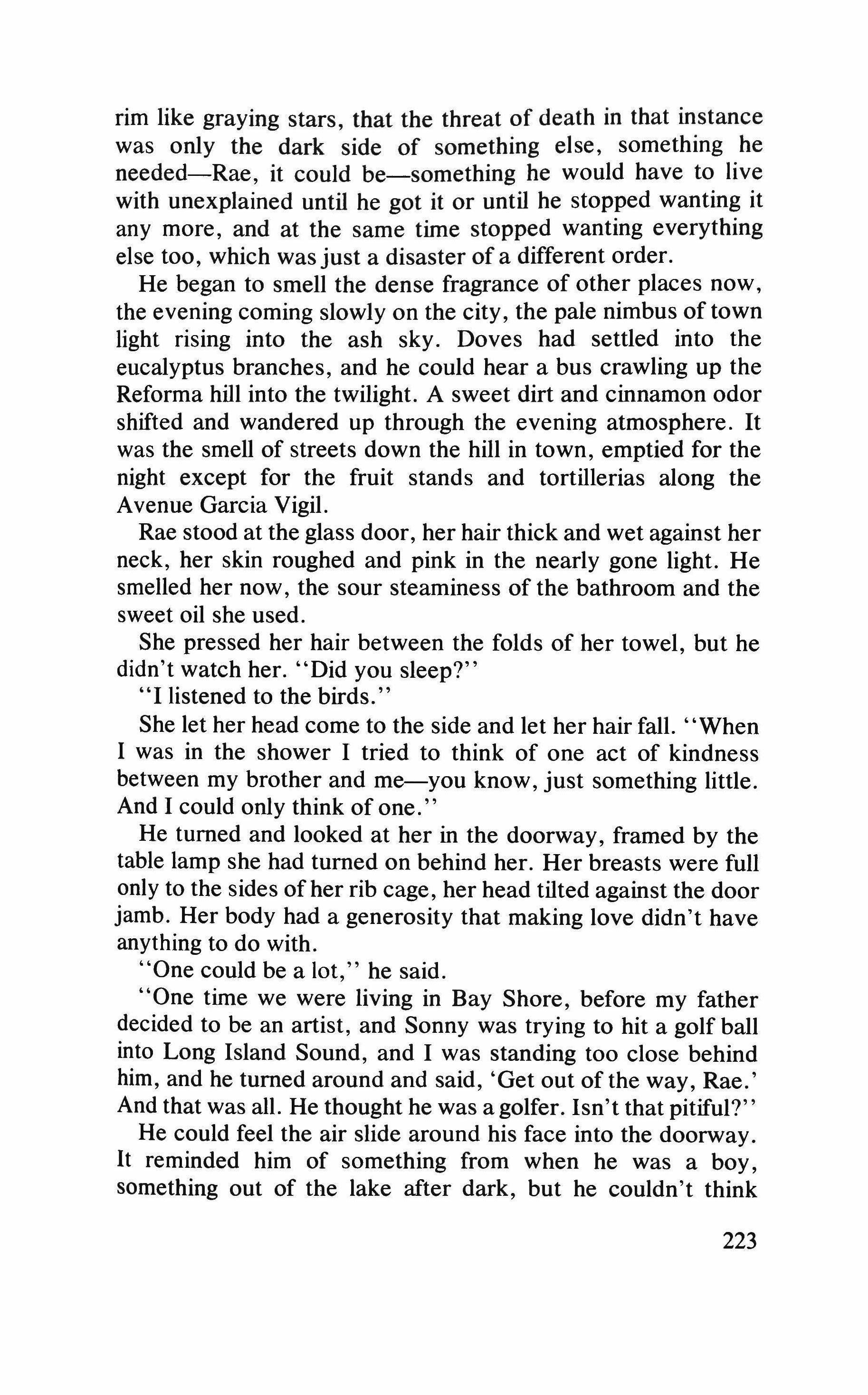
rim like graying stars, that the threat of death in that instance was only the dark side of something else, something he needed-Rae, it could be-something he would have to live with unexplained until he got it or until he stopped wanting it any more, and at the same time stopped wanting everything else too, which was just a disaster of a different order.
He began to smell the dense fragrance of other places now, the evening coming slowly on the city, the pale nimbus of town light rising into the ash sky. Doves had settled into the eucalyptus branches, and he could hear a bus crawling up the Reforma hill into the twilight. A sweet dirt and cinnamon odor shifted and wandered up through the evening atmosphere. It was the smell of streets down the hill in town, emptied for the night except for the fruit stands and tortillerias along the Avenue Garcia Vigil.
Rae stood at the glass door, her hair thick and wet against her neck, her skin roughed and pink in the nearly gone light. He smelled her now, the sour steaminess of the bathroom and the sweet oil she used.
She pressed her hair between the folds of her towel, but he didn't watch her. "Did you sleep?"
"I listened to the birds."
She let her head come to the side and let her hair fall. "When I was in the shower I tried to think of one act of kindness between my brother and me-you know, just something little. And I could only think of one."
He turned and looked at her in the doorway, framed by the table lamp she had turned on behind her. Her breasts were full only to the sides of her rib cage, her head tilted against the door jamb. Her body had a generosity that making love didn't have anything to do with.
"One could be a lot," he said.
"One time we were living in Bay Shore, before my father decided to be an artist, and Sonny was trying to hit a golf ball into Long Island Sound, and I was standing too close behind him, and he turned around and said, 'Get out of the way, Rae.' And that was all. He thought he was a golfer. Isn't that pitiful?"
He could feel the air slide around his face into the doorway. It reminded him of something from when he was a boy, something out of the lake after dark, but he couldn't think
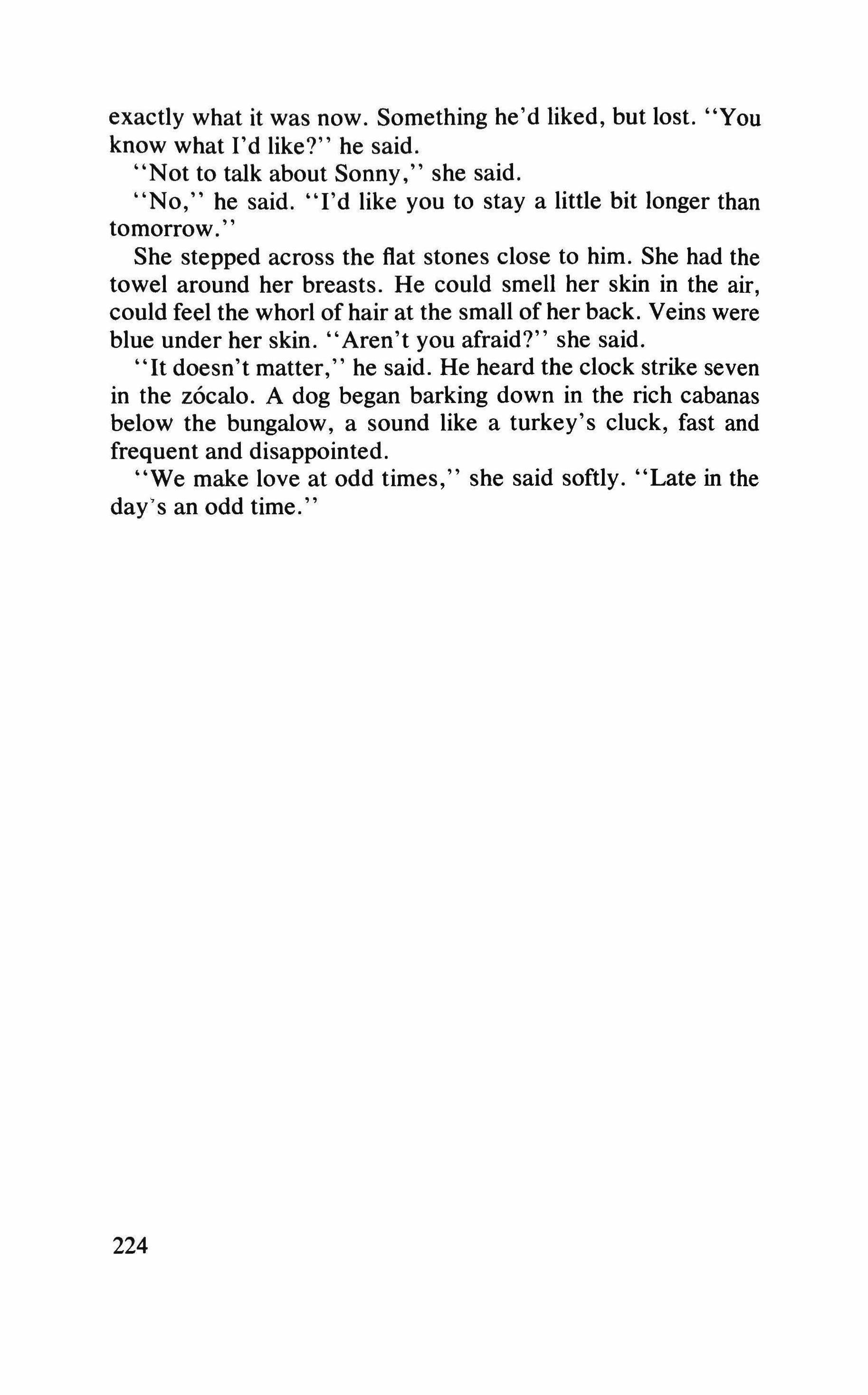
exactly what it was now. Something he'd liked, but lost. "You know what I'd like?" he said.
"Not to talk about Sonny," she said.
"No," he said. "I'd like you to stay a little bit longer than tomorrow."
She stepped across the flat stones close to him. She had the towel around her breasts. He could smell her skin in the air, could feel the whorl of hair at the small of her back. Veins were blue under her skin. "Aren't you afraid?" she said.
"It doesn't matter," he said. He heard the clock strike seven in the zocalo. A dog began barking down in the rich cabanas below the bungalow, a sound like a turkey's cluck, fast and frequent and disappointed.
"We make love at odd times," she said softly. "Late in the day's an odd time."
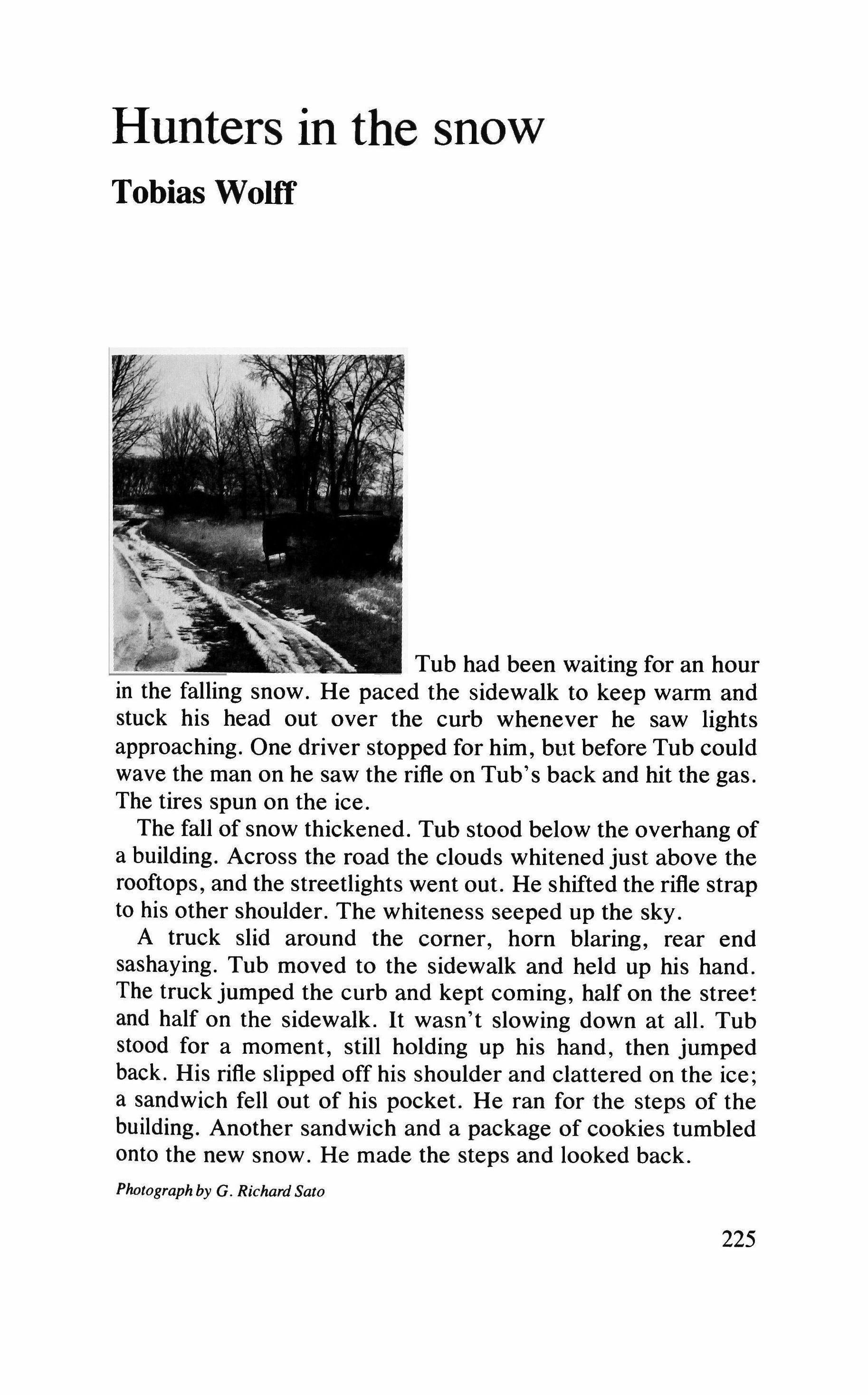
Tub had been waiting for an hour in the falling snow. He paced the sidewalk to keep warm and stuck his head out over the curb whenever he saw lights approaching. One driver stopped for him, but before Tub could wave the man on he saw the rifle on Tub's back and hit the gas. The tires spun on the ice.
The fall of snow thickened. Tub stood below the overhang of a building. Across the road the clouds whitened just above the rooftops, and the streetlights went out. He shifted the rifle strap to his other shoulder. The whiteness seeped up the sky.
A truck slid around the corner, horn blaring, rear end sashaying. Tub moved to the sidewalk and held up his hand. The truck jumped the curb and kept coming, half on the street and half on the sidewalk. It wasn't slowing down at all. Tub stood for a moment, still holding up his hand, then jumped back. His rifle slipped off his shoulder and clattered on the ice; a sandwich fell out of his pocket. He ran for the steps of the building. Another sandwich and a package of cookies tumbled onto the new snow. He made the steps and looked back.
Photograph by G. Richard Sato
The truck had stopped several feet beyond where Tub had been standing. He picked up his sandwiches and his cookies and slung the rifle and went up to the driver's window. The driver was bent against the steering wheel, slapping his knees and drumming his feet on the floorboards. He looked like a cartoon of a person laughing, except that his eyes watched the man on the seat beside him.
"You ought to see yourself," said the driver. "He looks just like a beach ball with a hat on, doesn't he? Doesn't he, Frank?"
The man beside him smiled and looked off.
"You almost ran me down," said Tub. "You could've killed me."
"Come on, Tub," said the man beside the driver. "Be mellow. Kenny was just messing around." He opened the door and slid over to the middle of the seat.
Tub took the bolt out of his rifle and climbed in beside him. "I waited an hour," he said. "If you meant ten o'clock, why didn't you say ten o'clock?"
"Tub, you haven't done anything but complain since we got here," said the man in the middle. "If you want to piss and moan all day you might as well go home and bitch at your kids. Take your pick." When Tub didn't say anything, he turned to the driver. "Okay, Kenny, let's hit the road."
Some juvenile delinquents had heaved a brick through the windshield on the driver's side, so the cold and snow tunneled right into the cab. The heater didn't work. They covered themselves with a couple of blankets Kenny had brought along and pulled down the muffs on their caps. Tub tried to keep his hands warm by rubbing them under the blanket, but Frank made him stop.
They left Spokane and drove deep into the country, running along black lines of fences. The snow let up, but still there was no edge to the land where it met the sky. Nothing moved in the chalky fields. The cold bleached their faces and made the stubble stand out on their cheeks and along their upper lips. They had to stop and have coffee several times before they got to the woods where Kenny wanted to hunt.
Tub was for trying some place different; two years in a row they'd been up and down this land and hadn't seen a thing.
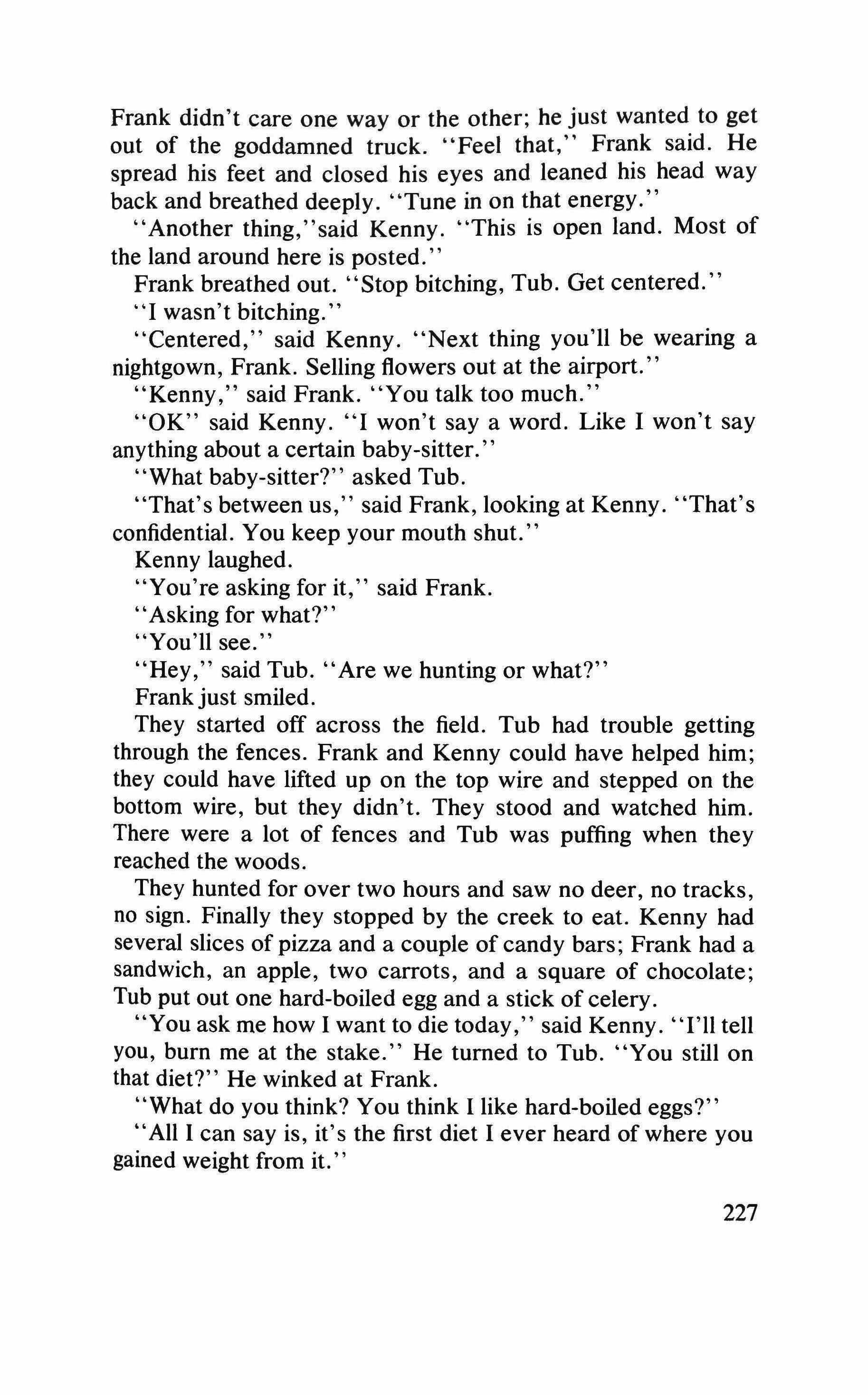
Frank didn't care one way or the other; he just wanted to get out of the goddamned truck. "Feel that," Frank said. He spread his feet and closed his eyes and leaned his head way back and breathed deeply. "Tune in on that energy."
"Another thing,"said Kenny. "This is open land. Most of the land around here is posted."
Frank breathed out. "Stop bitching, Tub. Get centered.
"I wasn't bitching."
"Centered," said Kenny. "Next thing you'll be wearing a nightgown, Frank. Selling flowers out at the airport."
"Kenny," said Frank. "You talk too much."
"OK" said Kenny. "I won't say a word. Like I won't say anything about a certain baby-sitter."
"What baby-sitter?" asked Tub.
"That's between us," said Frank, looking at Kenny. "That's confidential. You keep your mouth shut.
Kenny laughed.
"You're asking for it," said Frank.
"Asking for what?"
"You'll see."
"Hey," said Tub. "Are we hunting or what?"
Frank just smiled.
They started off across the field. Tub had trouble getting through the fences. Frank and Kenny could have helped him; they could have lifted up on the top wire and stepped on the bottom wire, but they didn't. They stood and watched him. There were a lot of fences and Tub was puffing when they reached the woods.
They hunted for over two hours and saw no deer, no tracks, no sign. Finally they stopped by the creek to eat. Kenny had several slices of pizza and a couple of candy bars; Frank had a sandwich, an apple, two carrots, and a square of chocolate; Tub put out one hard-boiled egg and a stick of celery.
"You ask me how I want to die today," said Kenny. "T'Il tell you, burn me at the stake." He turned to Tub. "You still on that diet?" He winked at Frank.
"What do you think? You think I like hard-boiled eggs?"
"All I can say is, it's the first diet I ever heard of where you gained weight from it. 227
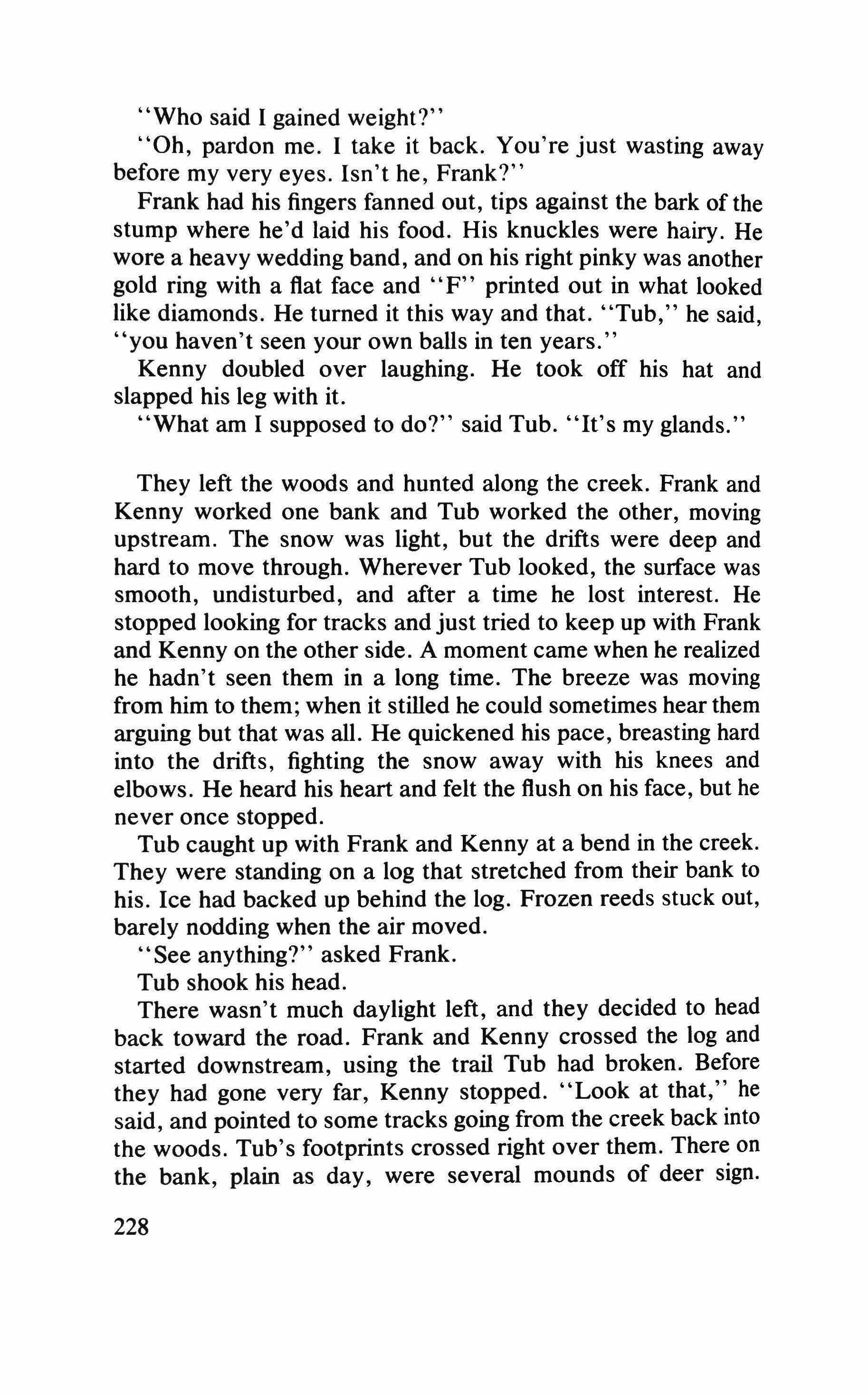
"Who said I gained weight?"
"Oh, pardon me. I take it back. You're just wasting away before my very eyes. Isn't he, Frank?"
Frank had his fingers fanned out, tips against the bark of the stump where he'd laid his food. His knuckles were hairy. He wore a heavy wedding band, and on his right pinky was another gold ring with a flat face and •. F" printed out in what looked like diamonds. He turned it this way and that. "Tub," he said, "you haven't seen your own balls in ten years."
Kenny doubled over laughing. He took off his hat and slapped his leg with it.
"What am I supposed to do?" said Tub. "It's my glands."
They left the woods and hunted along the creek. Frank and Kenny worked one bank and Tub worked the other, moving upstream. The snow was light, but the drifts were deep and hard to move through. Wherever Tub looked, the surface was smooth, undisturbed, and after a time he lost interest. He stopped looking for tracks and just tried to keep up with Frank and Kenny on the other side. A moment came when he realized he hadn't seen them in a long time. The breeze was moving from him to them; when it stilled he could sometimes hear them arguing but that was all. He quickened his pace, breasting hard into the drifts, fighting the snow away with his knees and elbows. He heard his heart and felt the flush on his face, but he never once stopped.
Tub caught up with Frank and Kenny at a bend in the creek. They were standing on a log that stretched from their bank to his. Ice had backed up behind the log. Frozen reeds stuck out, barely nodding when the air moved.
"See anything?" asked Frank.
Tub shook his head.
There wasn't much daylight left, and they decided to head back toward the road. Frank and Kenny crossed the log and started downstream, using the trail Tub had broken. Before they had gone very far, Kenny stopped. "Look at that," he said, and pointed to some tracks going from the creek back into the woods. Tub's footprints crossed right over them. There on the bank, plain as day, were several mounds of deer sign.

"What do you think that is, Tub?" Kenny kicked at it. "Walnuts on vanilla icing?"
"I guess I didn't notice."
Kenny looked at Frank.
"I was lost."
"You were lost. Big deal."
They followed the tracks into the woods. The deer had gone over a fence half buried in drifting snow. A no-hunting sign was nailed to the top of one of the posts. Frank laughed and said the son of a bitch could read. Kenny wanted to go after him, but Frank said no way-the people out here didn't mess around. He thought maybe the farmer who owned the land would let them use it if they asked, though Kenny wasn't so sure. Anyway, he figured that by the time they walked to the truck and drove up the road and doubled back it would be almost dark. "Relax," said Frank. "You can't hurry nature. If we're meant to get that deer, we'll get it. If we're not, we won't."
They started back toward the truck. This part of the woods was mainly pine. The snow was shaded and had a glaze on it. It held up Kenny and Frank, but Tub kept falling through. As he kicked forward, the edge of the crust bruised his shins. Kenny and Frank pulled ahead of him, to where he couldn't even hear their voices any more. He sat down on a stump and wiped his face. He ate both the sandwiches and half the cookies, taking his own sweet time. It was dead quiet.
When Tub crossed the last fence into the road, the truck started moving. Tub had to run for it and just managed to grab hold of the tailgate and hoist himself into the bed. He lay there panting. Kenny looked out the rear window and grinned. Tub crawled into -the lee of the cab to get out of the freezing wind. He pulled his earflaps low and pushed his chin into the collar of his coat. Someone rapped on the window, but Tub would not turn around.
He and Frank waited outside while Kenny went into the farmhouse to ask permission. The house was old, and paint was curling off the sides. The smoke streamed westward off the top ofthe chimney, fanning away into a thin gray plume. Above the ridge of the hills another ridge of blue clouds was rising.
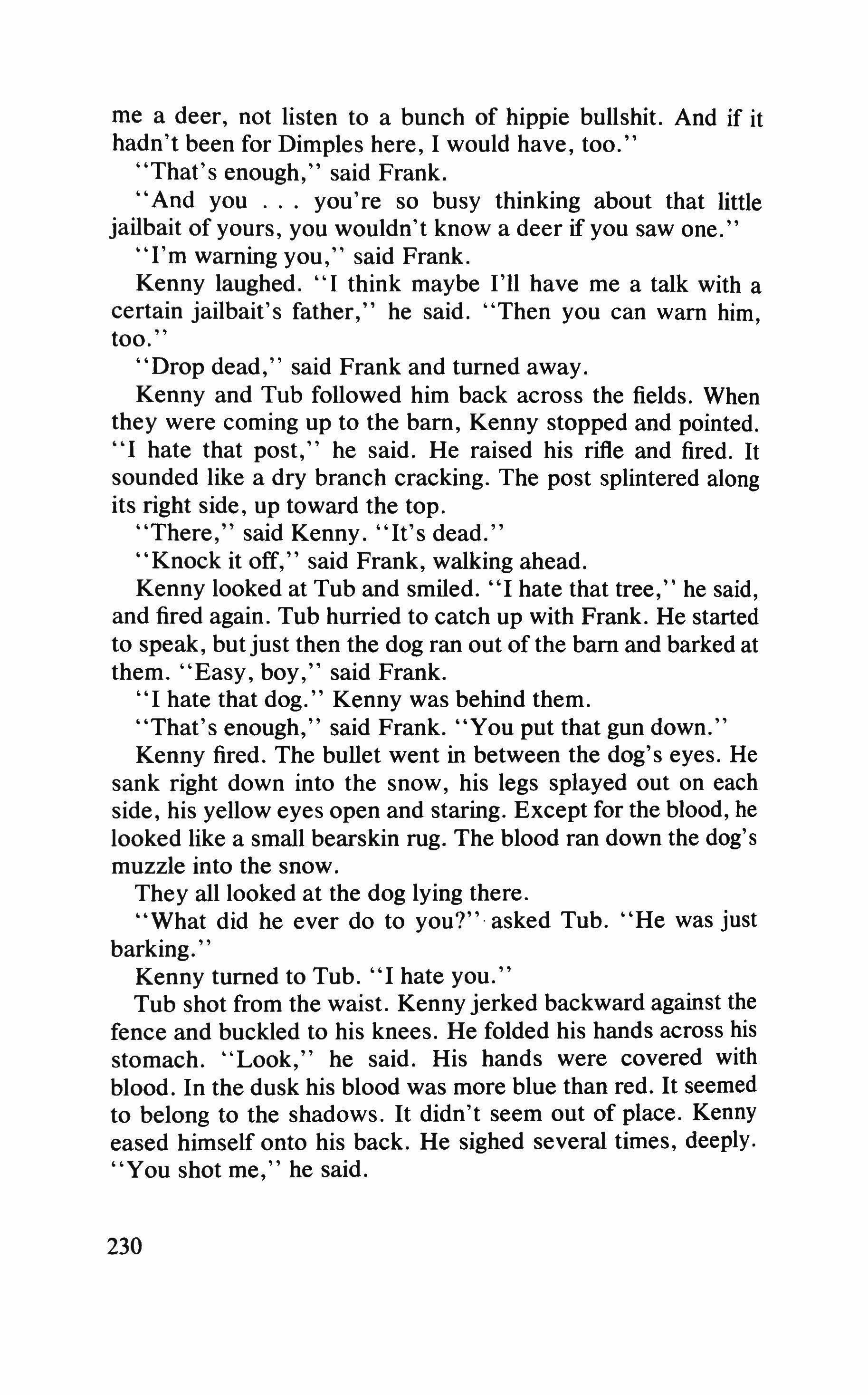
me a deer, not listen to a bunch of hippie bullshit. And if it hadn't been for Dimples here, I would have, too."
"That's enough," said Frank.
"And you you're so busy thinking about that little jailbait of yours, you wouldn't know a deer if you saw one."
"Tm warning you," said Frank.
Kenny laughed. "I think maybe I'll have me a talk with a certain jailbait's father," he said. "Then you can warn him, too."
"Drop dead," said Frank and turned away.
Kenny and Tub followed him back across the fields. When they were coming up to the bam, Kenny stopped and pointed. "I hate that post," he said. He raised his rifle and fired. It sounded like a dry branch cracking. The post splintered along its right side, up toward the top.
"There," said Kenny. "It's dead."
"Knock it off," said Frank, walking ahead.
Kenny looked at Tub and smiled. "I hate that tree," he said, and fired again. Tub hurried to catch up with Frank. He started to speak, butjust then the dog ran out of the bam and barked at them. "Easy, boy," said Frank.
"I hate that dog." Kenny was behind them.
"That's enough," said Frank. "You put that gun down."
Kenny fired. The bullet went in between the dog's eyes. He sank right down into the snow, his legs splayed out on each side, his yellow eyes open and staring. Except for the blood, he looked like a small bearskin rug. The blood ran down the dog's muzzle into the snow.
They all looked at the dog lying there.
"What did he ever do to you?"· asked Tub. "He was just barking.
Kenny turned to Tub. "I hate you."
Tub shot from the waist. Kennyjerked backward against the fence and buckled to his knees. He folded his hands across his stomach. "Look," he said. His hands were covered with blood. In the dusk his blood was more blue than red. It seemed to belong to the shadows. It didn't seem out of place. Kenny eased himself onto his back. He sighed several times, deeply. "You shot me," he said.
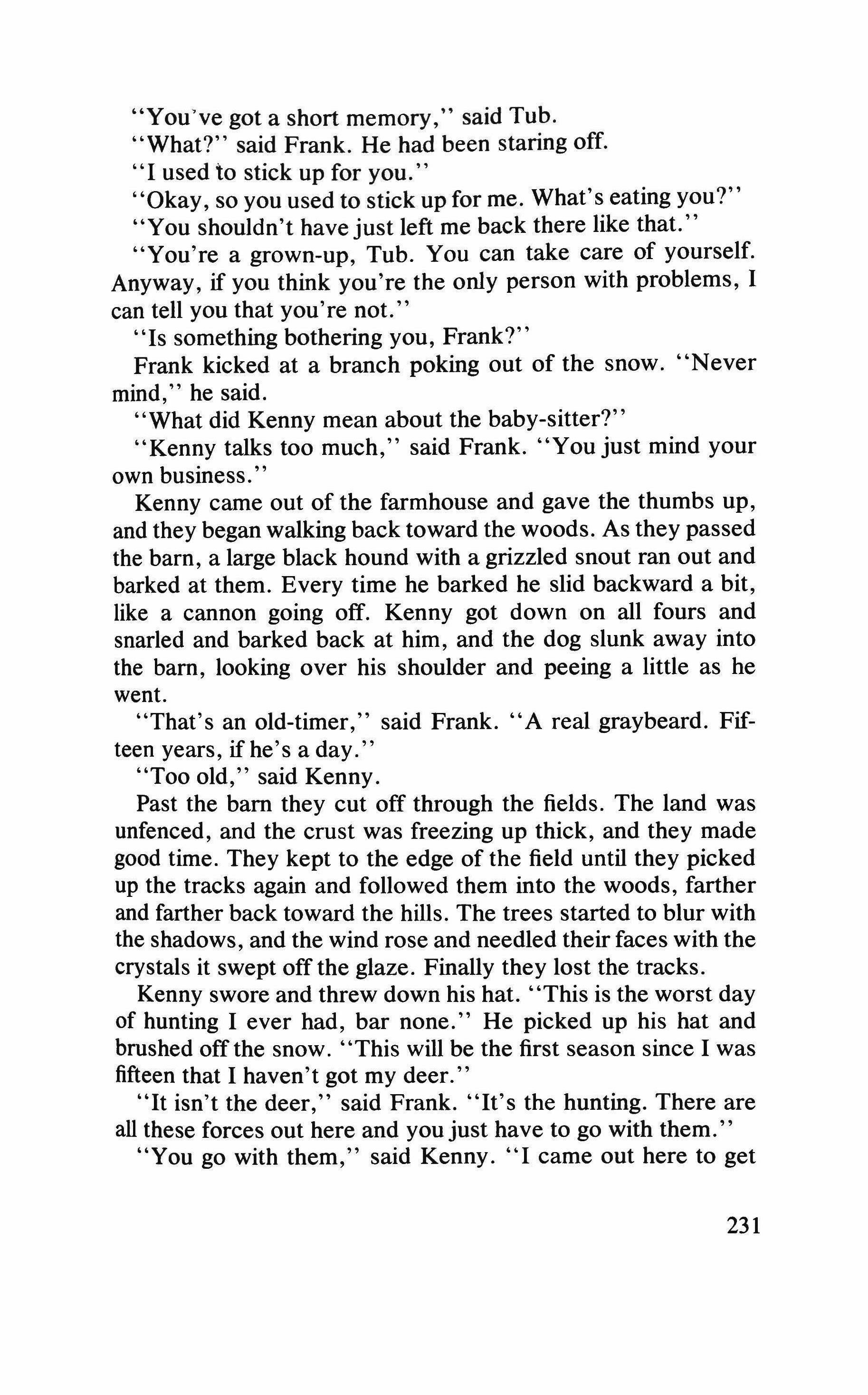
"You've got a short memory," said Tub. "What?" said Frank. He had been staring off.
"I used to stick up for you.
"Okay, so you used to stick up for me. What's eating you?"
"You shouldn't have just left me back there like that."
"You're a grown-up, Tub. You can take care of yourself. Anyway, if you think you're the only person with problems, I can tell you that you're not."
"Is something bothering you, Frank?"
Frank kicked at a branch poking out of the snow. "Never mind," he said.
"What did Kenny mean about the baby-sitter?"
"Kenny talks too much," said Frank. "You just mind your own business."
Kenny came out of the farmhouse and gave the thumbs up, and they began walking back toward the woods. As they passed the barn, a large black hound with a grizzled snout ran out and barked at them. Every time he barked he slid backward a bit, like a cannon going off. Kenny got down on all fours and snarled and barked back at him, and the dog slunk away into the barn, looking over his shoulder and peeing a little as he went.
"That's an old-timer," said Frank. "A real graybeard. Fifteen years, if he's a day."
"Too old," said Kenny.
Past the barn they cut off through the fields. The land was unfenced, and the crust was freezing up thick, and they made good time. They kept to the edge of the field until they picked up the tracks again and followed them into the woods, farther and farther back toward the hills. The trees started to blur with the shadows, and the wind rose and needled their faces with the crystals it swept off the glaze. Finally they lost the tracks.
Kenny swore and threw down his hat. "This is the worst day of hunting I ever had, bar none." He picked up his hat and brushed off the snow. "This will be the first season since I was fifteen that I haven't got my deer."
"It isn't the deer," said Frank. "It's the hunting. There are all these forces out here and you just have to go with them."
"You go with them," said Kenny. "I came out here to get

"I had to," said Tub. He knelt beside Kenny. "Oh, God," he said. "Frank. Frank."
Frank hadn't moved since Kenny killed the dog. "Frank!" Tub shouted.
I was just kidding around," said Kenny. "It was a joke. Oh!" he said, and arched his back suddenly. "Oh!" he said again, and dug his heels into the snow and pushed himself along on his head for several feet. Then he stopped and lay there, rocking back and forth on his heels and head like a wrestler doing warm-up exercises.
Frank roused himself. "Kenny," he said. He bent down and put his gloved hand on Kenny's brow. "You shot him," he said to Tub.
"He made me," said Tub.
"No, no, no," said Kenny.
Tub was weeping from the eyes and nostrils. His whole face was wet. Frank closed his eyes, then looked down at Kenny again. "Where does it hurt?"
"Everywhere," said Kenny. "Just everywhere." "Oh, God," said Tub.
"I mean where did it go in?" said Frank. "Here." Kenny pointed at the wound in his stomach. It was welling slowly with blood.
"You're lucky," said Frank. "It's on the left side. It missed your appendix. If it had hit your appendix, you'd really be in the soup." He turned and threw up onto the snow, holding his sides as if to keep warm.
"Are you all right?" asked Tub.
"There's some aspirin in the truck," said Kenny.
"I'm all right," said Frank.
"We'd better call an ambulance," said Tub. "Jesus," said Frank, "what are we going to say?"
"Exactly what happened," said Tub. "He was going to shoot me but I shot him first.
"No, sir!" said Kenny. "I wasn't either!"
Frank patted Kenny on the arm. "Easy does it, partner." He stood. "Let's go."
Tub picked up Kenny's rifle as they walked down toward the farmhouse. "No sense leaving this around," he said. "Kenny might get ideas. "
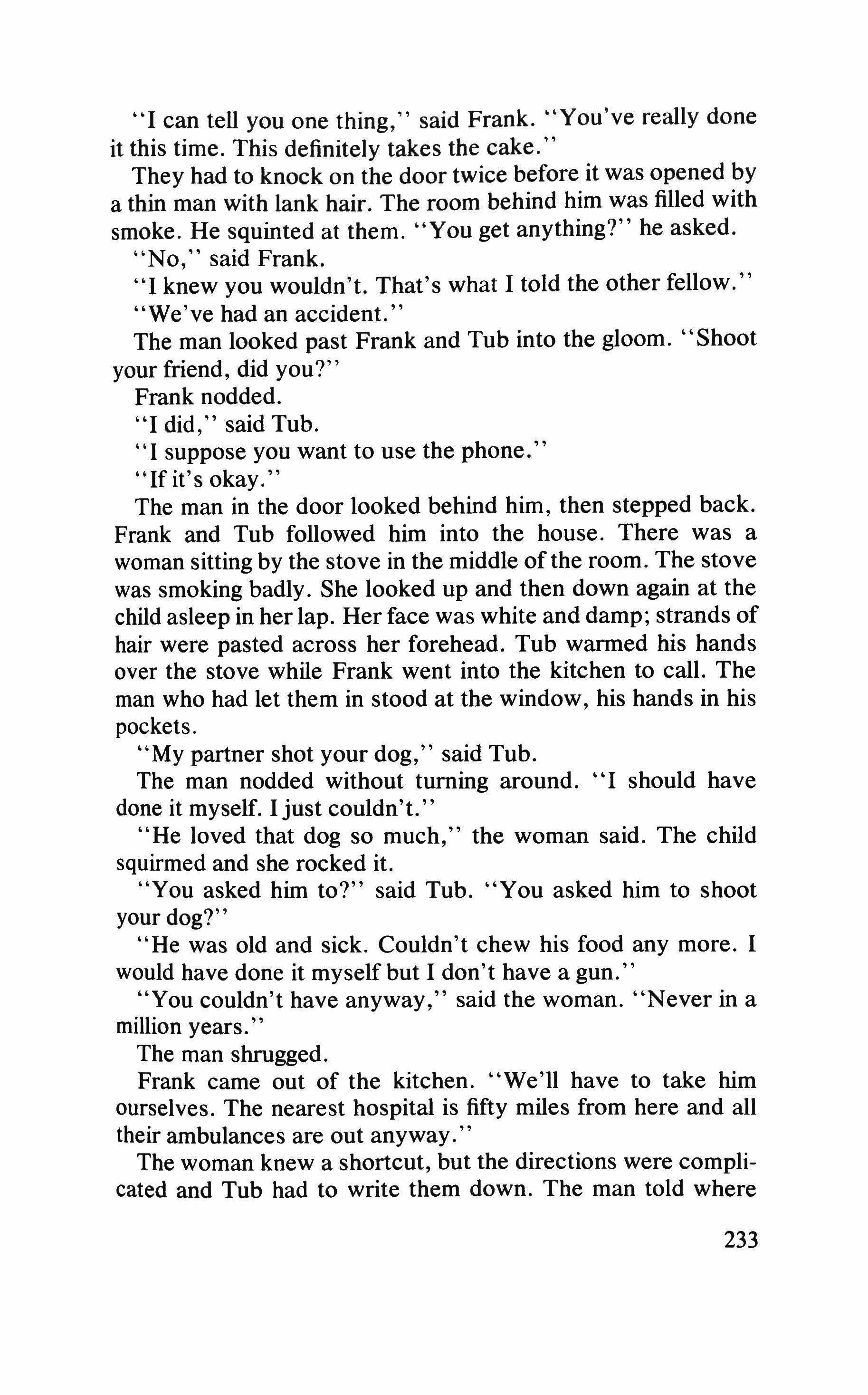
"I can tell you one thing," said Frank. "You've really done it this time. This definitely takes the cake."
They had to knock on the door twice before it was opened by a thin man with lank hair. The room behind him was filled with smoke. He squinted at them. "You get anything?" he asked.
"No," said Frank.
"I knew you wouldn't. That's what I told the other fellow."
"We've had an accident."
The man looked past Frank and Tub into the gloom. "Shoot your friend, did you?"
Frank nodded.
"I did," said Tub.
"I suppose you want to use the phone."
"If it's okay."
The man in the door looked behind him, then stepped back. Frank and Tub followed him into the house. There was a woman sitting by the stove in the middle of the room. The stove was smoking badly. She looked up and then down again at the child asleep in her lap. Her face was white and damp; strands of hair were pasted across her forehead. Tub warmed his hands over the stove while Frank went into the kitchen to call. The man who had let them in stood at the window, his hands in his pockets.
"My partner shot your dog," said Tub.
The man nodded without turning around. "I should have done it myself. I just couldn't."
"He loved that dog so much," the woman said. The child squirmed and she rocked it.
"You asked him to?" said Tub. "You asked him to shoot your dog?"
"He was old and sick. Couldn't chew his food any more. I would have done it myself but I don't have a gun."
"You couldn't have anyway," said the woman. "Never in a million years."
The man shrugged.
Frank came out of the kitchen. "We'll have to take him ourselves. The nearest hospital is fifty miles from here and all their ambulances are out anyway.
The woman knew a shortcut, but the directions were complicated and Tub had to write them down. The man told where
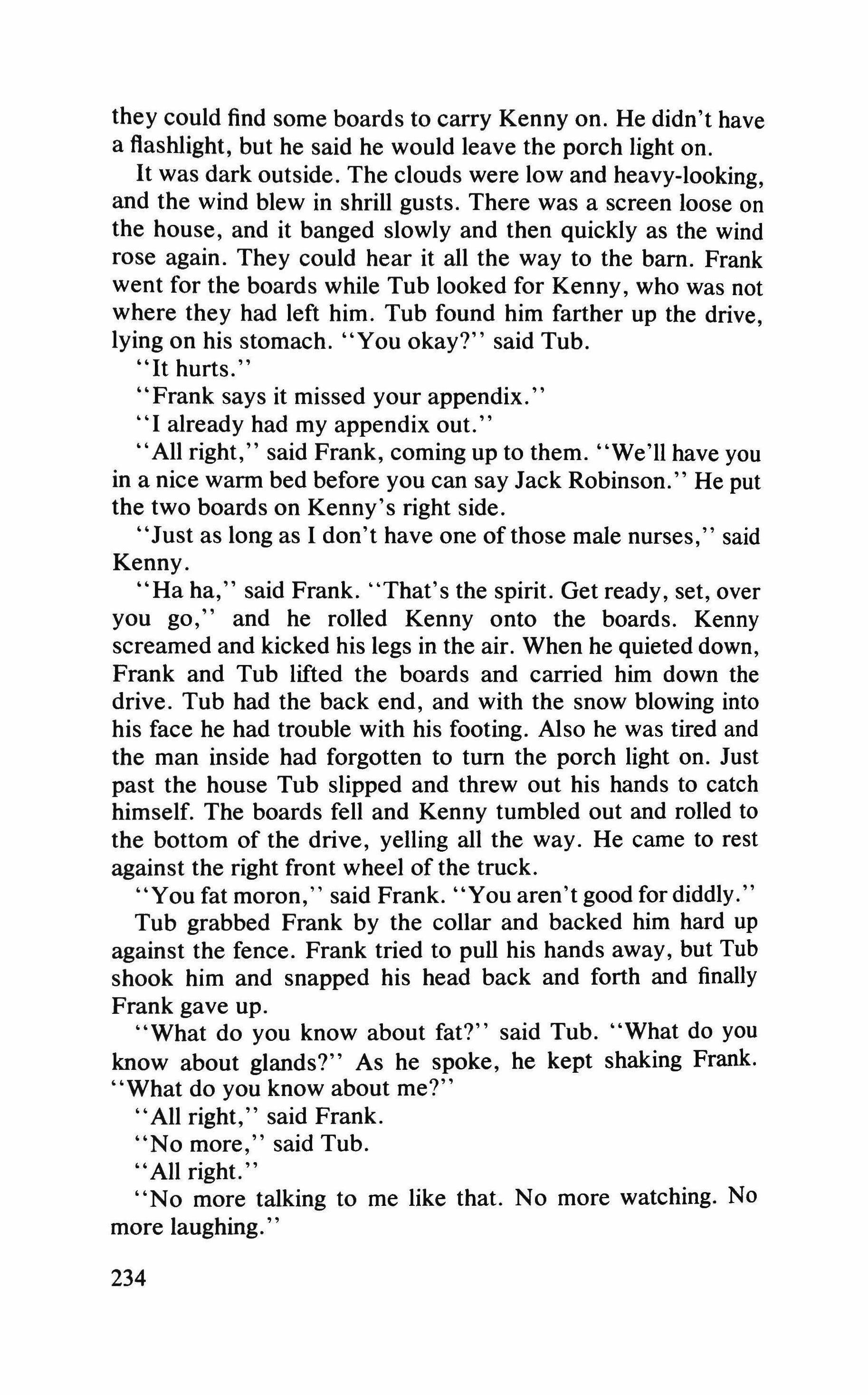
they could find some boards to carry Kenny on. He didn't have a flashlight, but he said he would leave the porch light on.
It was dark outside. The clouds were low and heavy-looking, and the wind blew in shrill gusts. There was a screen loose on the house, and it banged slowly and then quickly as the wind rose again. They could hear it all the way to the bam. Frank went for the boards while Tub looked for Kenny, who was not where they had left him. Tub found him farther up the drive, lying on his stomach. "You okay?" said Tub.
"It hurts."
"Frank says it missed your appendix.
"I already had my appendix out.
"All right," said Frank, coming up to them. "We'll have you in a nice warm bed before you can say Jack Robinson." He put the two boards on Kenny's right side.
"Just as long as I don't have one of those male nurses," said Kenny.
"Ha ha," said Frank. "That's the spirit. Get ready, set, over you go," and he rolled Kenny onto the boards. Kenny screamed and kicked his legs in the air. When he quieted down, Frank and Tub lifted the boards and carried him down the drive. Tub had the back end, and with the snow blowing into his face he had trouble with his footing. Also he was tired and the man inside had forgotten to tum the porch light on. Just past the house Tub slipped and threw out his hands to catch himself. The boards fell and Kenny tumbled out and rolled to the bottom of the drive, yelling all the way. He came to rest against the right front wheel of the truck.
"You fat moron," said Frank. "You aren't good for diddly."
Tub grabbed Frank by the collar and backed him hard up against the fence. Frank tried to pull his hands away, but Tub shook him and snapped his head back and forth and finally Frank gave up.
"What do you know about fat?" said Tub. "What do you know about glands?" As he spoke, he kept shaking Frank. "What do you know about me?"
"All right," said Frank.
"No more," said Tub.
"All right. "
"No more talking to me like that. No more watching. No more laughing."
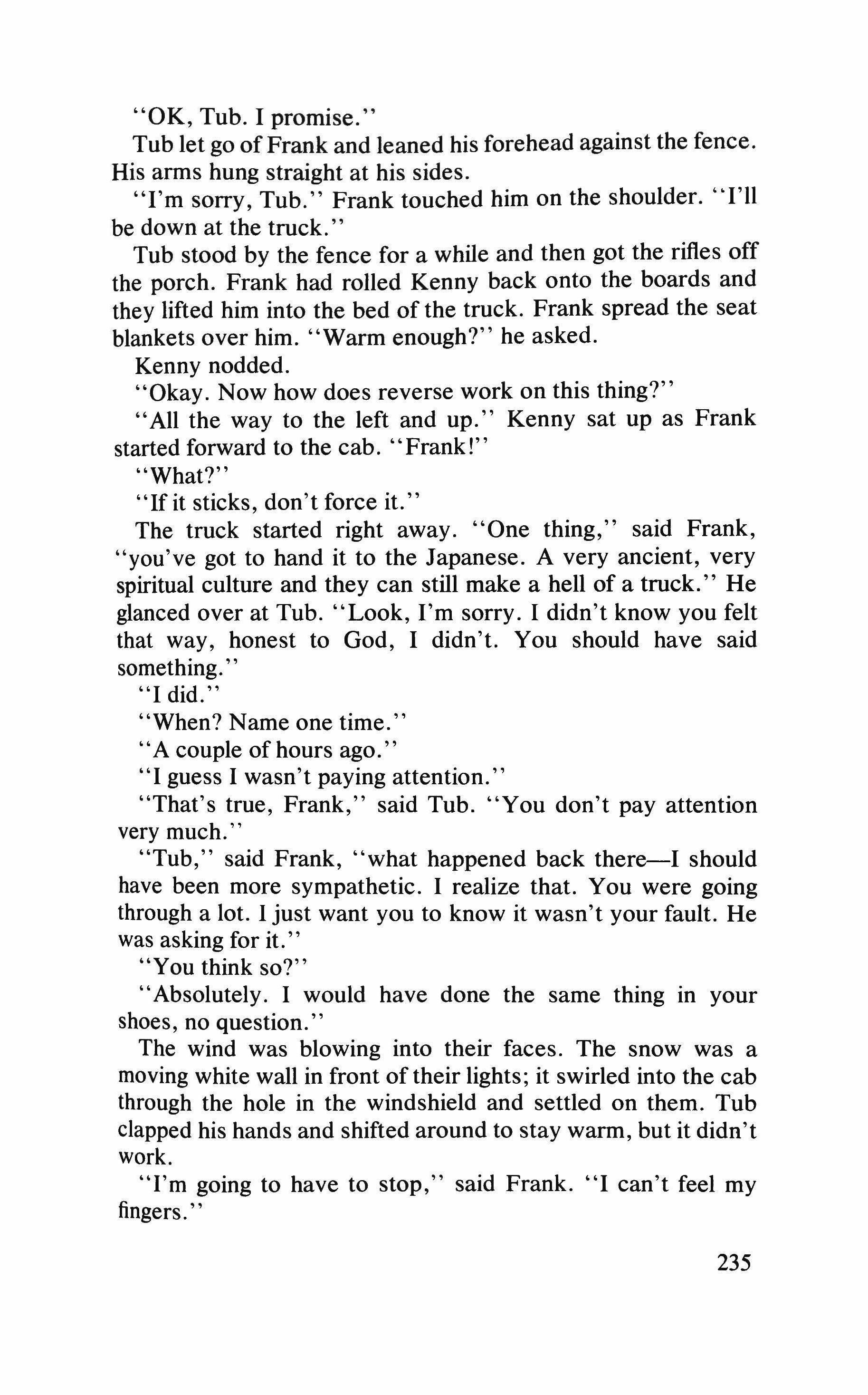
"OK, Tub. I promise."
Tub let go of Frank and leaned his forehead against the fence. His arms hung straight at his sides.
"I'm sorry, Tub." Frank touched him on the shoulder. "J'Il be down at the truck."
Tub stood by the fence for a while and then got the rifles off the porch. Frank had rolled Kenny back onto the boards and they lifted him into the bed of the truck. Frank spread the seat blankets over him. "Warm enough?" he asked.
Kenny nodded.
"Okay. Now how does reverse work on this thing?"
"All the way to the left and up."
Kenny sat up as Frank started forward to the cab. "Frank!"
"What?"
"If it sticks, don't force it."
The truck started right away. "One thing," said Frank, "you've got to hand it to the Japanese. A very ancient, very spiritual culture and they can still make a hell of a truck." He glanced over at Tub. "Look, I'm sorry. I didn't know you felt that way, honest to God, I didn't. You should have said something.
"I did."
"When? Name one time."
"A couple of hours ago."
"I guess I wasn't paying attention."
"That's true, Frank," said Tub. "You don't pay attention very much.
"Tub," said Frank, "what happened back there-I should have been more sympathetic. I realize that. You were going through a lot. I just want you to know it wasn't your fault. He was asking for it.
"You think so?"
"Absolutely. I would have done the same thing in your shoes, no question."
The wind was blowing into their faces. The snow was a moving white wall in front of their lights; it swirled into the cab through the hole in the windshield and settled on them. Tub clapped his hands and shifted around to stay warm, but it didn't work.
"I'rn going to have to stop," said Frank. "I can't feel my fingers.

Up ahead they saw some lights off the road. It was a tavern. Outside in the parking lot were several jeeps and trucks. A couple of them had deer strapped across their hoods. Frank parked and they went back to Kenny. •. How you doing, partner?" said Frank.
"I'm cold."
"Well, don't feel like the Lone Ranger. It's worse inside, take my word for it. You should get that windshield fixed.
"Look," said Tub, "he threw the blankets off." They were lying in a heap against the tailgate.
"Now look, Kenny," said Frank, "it's no use whining about being cold if you're not going to try and keep warm. You've got to do your share." He spread the blankets over Kenny and tucked them in at the corners.
"They blew off. "
"Hold on to them then."
"Why are we stopping, Frank?"
"Because if me and Tub don't get warmed up we're going to freeze solid and then where will you be?" He punched Kenny lightly in the arm. "So just hold your horses."
The bar was full of men in colored jackets, mostly orange. The waitress brought coffee. "Just what the doctor ordered," said Frank, cradling the steaming cup in his hand. His skin was bone white. "Tub, I've been thinking. What you said about me not paying attention, that's true."
"It's OK."
"No. I really had that coming. I guess I've just been a little too interested in old number one. I've had a lot on my mindnot that that's any excuse."
Forget it, Frank. I sort of lost my temper back there. I guess we're all a little on edge."
Frank shook his head. "It isn't just that."
"You want to talk about it?"
"Just between us, Tub?"
"Sure, Frank. Just between us."
"Tub, I think I'm going to be leaving Nancy."
"Oh, Frank. Oh, Frank." Tub sat back. "What's the problem? Has she been seeing someone?"
"No. I wish she was, Tub. I wish to God she was." He reached out and laid his hand on Tub's arm. "Tub, have you ever been really in love?"
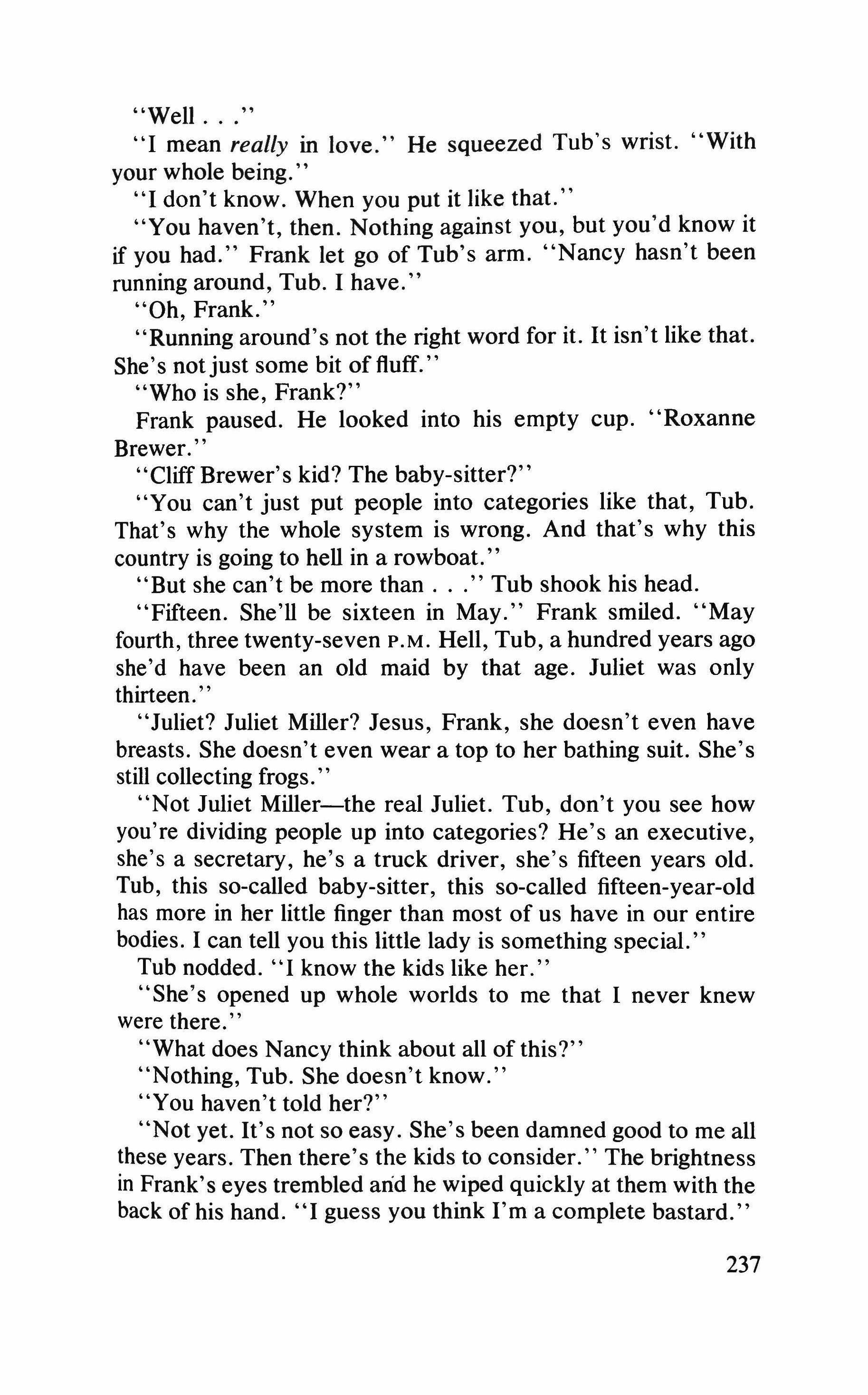
"Well
"I mean really in love." He squeezed Tub's wrist. "With your whole being.
"I don't know. When you put it like that."
"You haven't, then. Nothing against you, but you'd know it if you had." Frank let go of Tub's arm. "Nancy hasn't been running around, Tub. I have."
"Oh, Frank."
"Running around's not the right word for it. It isn't like that. She's not just some bit of fluff.
"Who is she, Frank?"
Frank paused. He looked into his empty cup. "Roxanne Brewer."
"Cliff Brewer's kid? The baby-sitter?"
"You can't just put people into categories like that, Tub. That's why the whole system is wrong. And that's why this country is going to hell in a rowboat.
"But she can't be more than " Tub shook his head.
"Fifteen. She'll be sixteen in May." Frank smiled. "May fourth, three twenty-seven P.M. Hell, Tub, a hundred years ago she'd have been an old maid by that age. Juliet was only thirteen.
"Juliet? Juliet Miller? Jesus, Frank, she doesn't even have breasts. She doesn't even wear a top to her bathing suit. She's still collecting frogs."
"Not Juliet Miller-the real Juliet. Tub, don't you see how you're dividing people up into categories? He's an executive, she's a secretary, he's a truck driver, she's fifteen years old. Tub, this so-called baby-sitter, this so-called fifteen-year-old has more in her little finger than most of us have in our entire bodies. I can tell you this little lady is something special."
Tub nodded. "I know the kids like her."
"She's opened up whole worlds to me that I never knew were there."
"What does Nancy think about all of this?"
"Nothing, Tub. She doesn't know."
"You haven't told her?"
"Not yet. It's not so easy. She's been damned good to me all these years. Then there's the kids to consider." The brightness in Frank's eyes trembled arid he wiped quickly at them with the back of his hand. "I guess you think I'm a complete bastard."
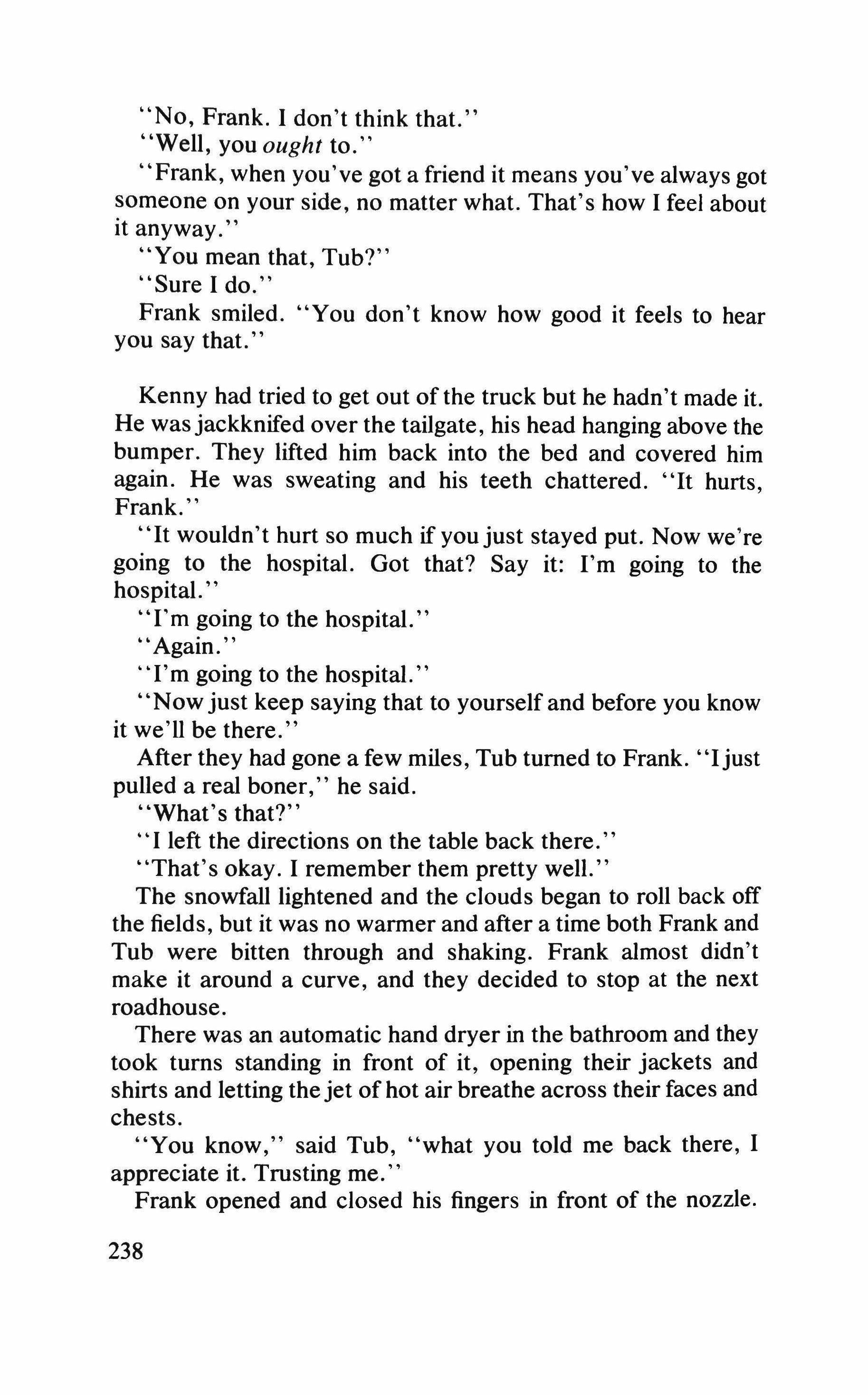
"No, Frank. I don't think that."
"Well, you ought to.
"Frank, when you've got a friend it means you've always got someone on your side, no matter what. That's how I feel about it anyway.
"You mean that, Tub?"
"Sure I do."
Frank smiled. "You don't know how good it feels to hear you say that.
Kenny had tried to get out of the truck but he hadn't made it. He was jackknifed over the tailgate, his head hanging above the bumper. They lifted him back into the bed and covered him again. He was sweating and his teeth chattered. "It hurts, Frank."
"It wouldn't hurt so much if you just stayed put. Now we're going to the hospital. Got that? Say it: I'm going to the hospital.
''I'm going to the hospital."
"Again.
"I'm going to the hospital."
"Now just keep saying that to yourself and before you know it we'll be there."
After they had gone a few miles, Tub turned to Frank. "Ijust pulled a real boner," he said.
"What's that?"
"I left the directions on the table back there."
"That's okay. I remember them pretty well."
The snowfall lightened and the clouds began to roll back off the fields, but it was no warmer and after a time both Frank and Tub were bitten through and shaking. Frank almost didn't make it around a curve, and they decided to stop at the next roadhouse.
There was an automatic hand dryer in the bathroom and they took turns standing in front of it, opening their jackets and shirts and letting thejet of hot air breathe across their faces and chests.
"You know," said Tub, "what you told me back there, I appreciate it. Trusting me.
Frank opened and closed his fingers in front of the nozzle.
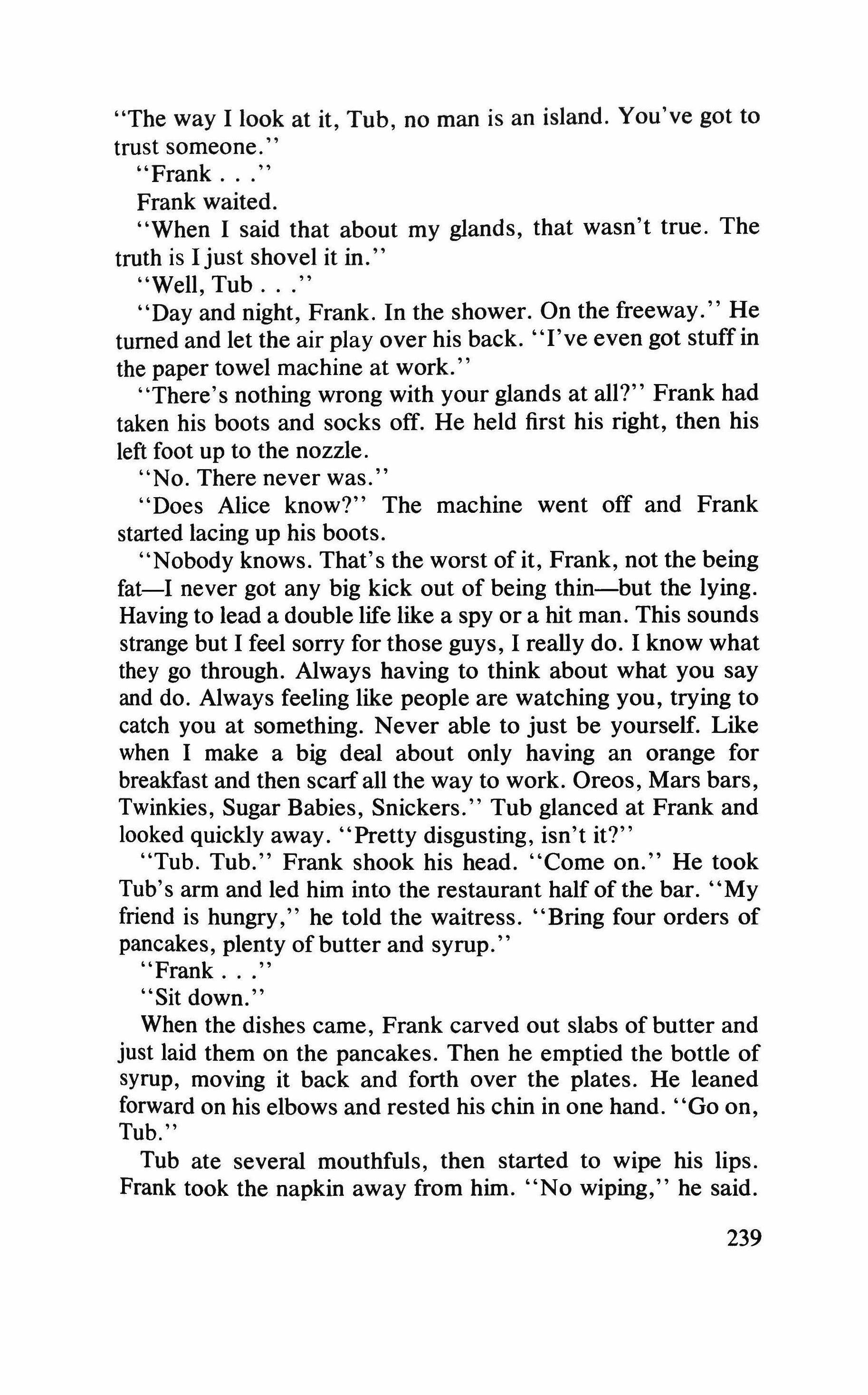
"The way I look at it, Tub, no man is an island. You've got to trust someone."
"Frank Frank waited.
"When I said that about my glands, that wasn't true. The truth is I just shovel it in."
"Well, Tub
"Day and night, Frank. In the shower. On the freeway." He turned and let the air play over his back. "I've even got stuff in the paper towel machine at work.
"There's nothing wrong with your glands at all?" Frank had taken his boots and socks off. He held first his right, then his left foot up to the nozzle.
"No. There never was."
"Does Alice know?" The machine went off and Frank started lacing up his boots.
"Nobody knows. That's the worst of it, Frank, not the being fat-I never got any big kick out of being thin-but the lying. Having to lead a double life like a spy or a hit man. This sounds strange but I feel sorry for those guys, I really do. I know what they go through. Always having to think about what you say and do. Always feeling like people are watching you, trying to catch you at something. Never able to just be yourself. Like when I make a big deal about only having an orange for breakfast and then scarf all the way to work. Oreos, Mars bars, Twinkies, Sugar Babies, Snickers." Tub glanced at Frank and looked quickly away. "Pretty disgusting, isn't it?"
"Tub. Tub." Frank shook his head. "Come on." He took Tub's arm and led him into the restaurant half of the bar. "My friend is hungry," he told the waitress. "Bring four orders of pancakes, plenty of butter and syrup."
"Frank "Sit down."
When the dishes came, Frank carved out slabs of butter and just laid them on the pancakes. Then he emptied the bottle of syrup, moving it back and forth over the plates. He leaned forward on his elbows and rested his chin in one hand. "Go on, Tub."
Tub ate several mouthfuls, then started to wipe his lips. Frank took the napkin away from him. "No wiping," he said.
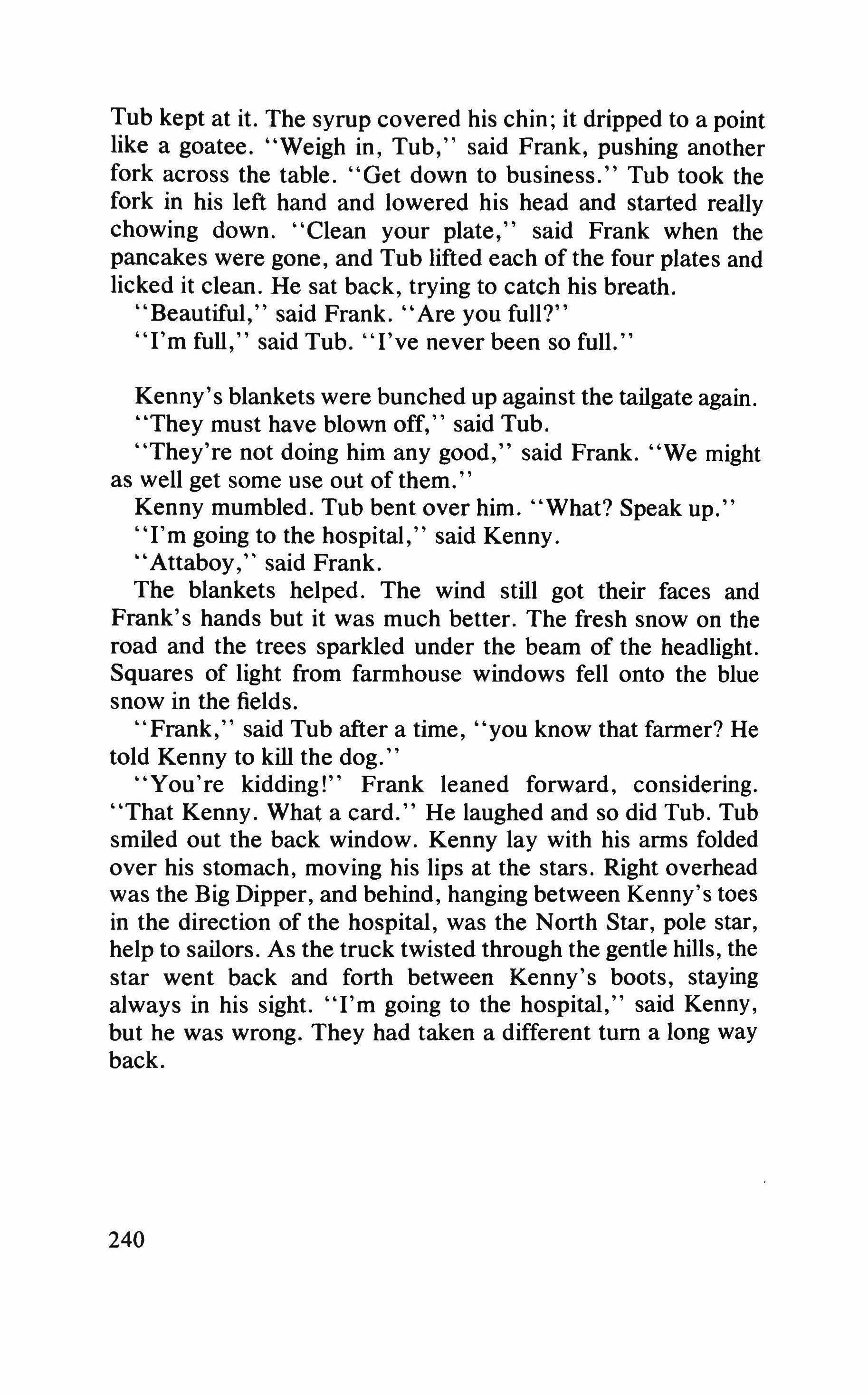
Tub kept at it. The syrup covered his chin; it dripped to a point like a goatee. "Weigh in, Tub," said Frank, pushing another fork across the table. "Get down to business." Tub took the fork in his left hand and lowered his head and started really chowing down. "Clean your plate," said Frank when the pancakes were gone, and Tub lifted each of the four plates and licked it clean. He sat back, trying to catch his breath.
"Beautiful," said Frank. "Are you full?"
''I'm full," said Tub. "I've never been so full."
Kenny's blankets were bunched up against the tailgate again. "They must have blown off," said Tub.
"They're not doing him any good," said Frank. "We might as well get some use out of them.
Kenny mumbled. Tub bent over him. "What? Speak up."
''I'm going to the hospital," said Kenny.
"Attaboy," said Frank.
The blankets helped. The wind still got their faces and Frank's hands but it was much better. The fresh snow on the road and the trees sparkled under the beam of the headlight. Squares of light from farmhouse windows fell onto the blue snow in the fields.
"Frank," said Tub after a time, "you know that farmer? He told Kenny to kill the dog.
"You' re kidding!" Frank leaned forward, considering. "That Kenny. What a card." He laughed and so did Tub. Tub smiled out the back window. Kenny lay with his arms folded over his stomach, moving his lips at the stars. Right overhead was the Big Dipper, and behind, hanging between Kenny's toes in the direction of the hospital, was the North Star, pole star, help to sailors. As the truck twisted through the gentle hills, the star went back and forth between Kenny's boots, staying always in his sight. "I'm going to the hospital," said Kenny, but he was wrong. They had taken a different tum a long way back.
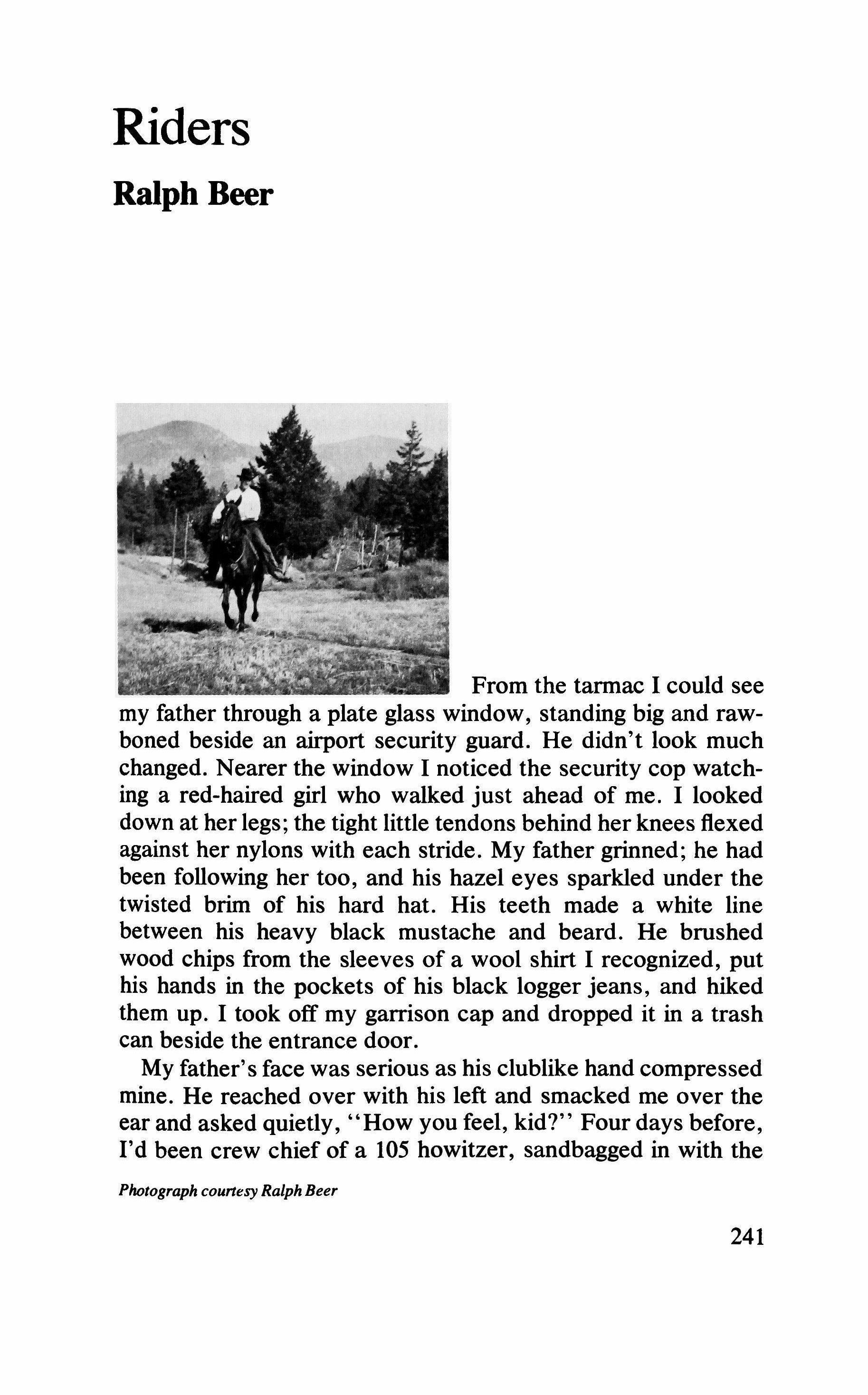
From the tarmac I could see my father through a plate glass window, standing big and rawboned beside an airport security guard. He didn't look much changed. Nearer the window I noticed the security cop watching a red-haired girl who walked just ahead of me. I looked down at her legs; the tight little tendons behind her knees flexed against her nylons with each stride. My father grinned; he had been following her too, and his hazel eyes sparkled under the twisted brim of his hard hat. His teeth made a white line between his heavy black mustache and beard. He brushed wood chips from the sleeves of a wool shirt I recognized, put his hands in the pockets of his black logger jeans, and hiked them up. I took off my garrison cap and dropped it in a trash can beside the entrance door.
My father's face was serious as his clublike hand compressed mine. He reached over with his left and smacked me over the ear and asked quietly, "How you feel, kid?" Four days before, I'd been crew chief of a 105 howitzer, sandbagged in with the
Photograph courtesy Ralph Beer
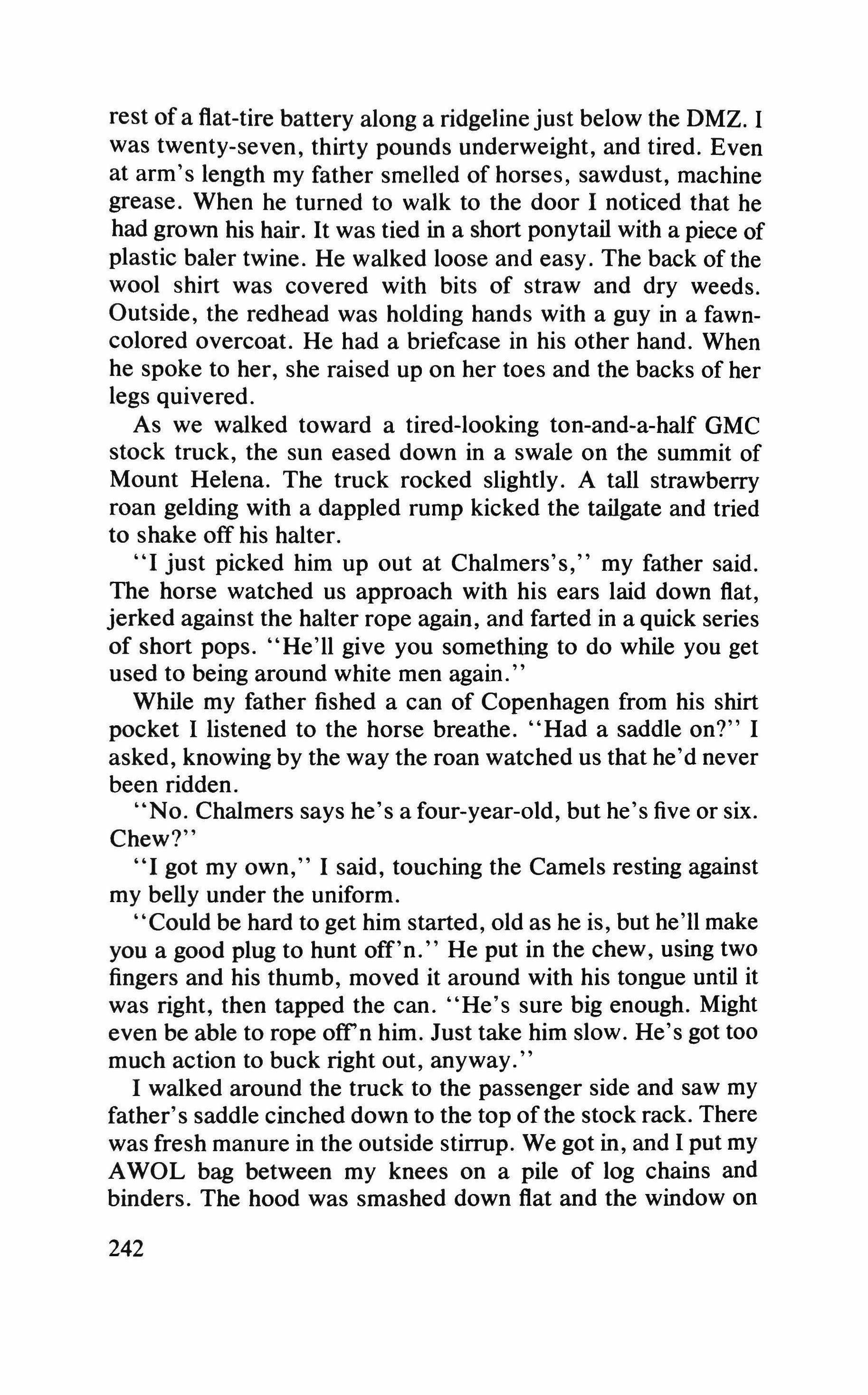
rest of a fiat-tire battery along a ridgelinejust below the DMZ. I was twenty-seven, thirty pounds underweight, and tired. Even at arm's length my father smelled of horses, sawdust, machine grease. When he turned to walk to the door 1 noticed that he had grown his hair. It was tied in a short ponytail with a piece of plastic baler twine. He walked loose and easy. The back of the wool shirt was covered with bits of straw and dry weeds. Outside, the redhead was holding hands with a guy in a fawncolored overcoat. He had a briefcase in his other hand. When he spoke to her, she raised up on her toes and the backs of her legs quivered.
As we walked toward a tired-looking ton-and-a-half GMC stock truck, the sun eased down in a swale on the summit of Mount Helena. The truck rocked slightly. A tall strawberry roan gelding with a dappled rump kicked the tailgate and tried to shake off his halter.
"I just picked him up out at Chalmers's," my father said. The horse watched us approach with his ears laid down fiat, jerked against the halter rope again, and farted in a quick series of short pops. "He'll give you something to do while you get used to being around white men again."
While my father fished a can of Copenhagen from his shirt pocket I listened to the horse breathe. "Had a saddle on?" I asked, knowing by the way the roan watched us that he'd never been ridden.
"No. Chalmers says he's a four-year-old, but he's five or six. Chew?"
"I got my own," 1 said, touching the Camels resting against my belly under the uniform.
"Could be hard to get him started, old as he is, but he'll make you a good plug to hunt off'n." He put in the chew, using two fingers and his thumb, moved it around with his tongue until it was right, then tapped the can. "He's sure big enough. Might even be able to rope off'n him. Just take him slow. He's got too much action to buck right out, anyway."
1 walked around the truck to the passenger side and saw my father's saddle cinched down to the top of the stock rack. There was fresh manure in the outside stirrup. We got in, and I put my AWOL bag between my knees on a pile of log chains and binders. The hood was smashed down fiat and the window on

my side was spider-webbed with broken slivers of glass. The truck lurched forward.
"Clutch's about gone," my father said. "Keep that rifle from banging into the shifters, will you?" I put the toe of the hard leather scabbard between my shoes and let the dark oiled butt of the .25-35 Winchester rest against my thigh.
"That girl in Canada sent you down some of that fancy tobacco, you know, in the round yellow cans. She expecting you?" The gelding kicked and jumped around in the back of the truck.
"Not for a while yet."
"That fool horse has been stompin' and kickin' and raising hell since this afternoon. He looked at me out of the comer of his eye. "Hope he's got sense enough not to knock down his hips on those side boards.
We headed north across the Prickly Pear Valley. It was late September, and it smelled of frost-killed hay and skunk. Rows of large, limbless cottonwood snags marked the old stream channel; a heron stood waiting in the shallow water- running through the new one. I looked back at my father. Only the big work-hardened hands on the steering wheel, the oversized knuckles, weathered checks, and cordIike veins told his years. Around Clancy he was known to be good with horses, as his father had been. Honest. And the best elk hunter in the area.
"Killed three seven-point Royals while you was gone," he said, splitting into fourth/ over with the old vacuum shift. "One a year, and a couple of spikes for ranch meat. Head-shot two of the Royals. Got some steaks from the last one out for supper tonight. About most other things he was modest.
He looked across the seat, face poker serious, his heavy brows highlighted by a passing pickup truck, and said, "The old man is real sick."
"You wrote that."
"Emphysema. Maybe cancer. He won't talk about coming into town to see a doctor." My father reached up with his index finger and removed a drop that had been hanging from the end of his nose for several miles. "Be a good idea for you to get up to the high ranch and see him right away.
I looked out the side window. It will frost sure as hell tonight, I thought, though I hadn't seen frost for a long time. The roan
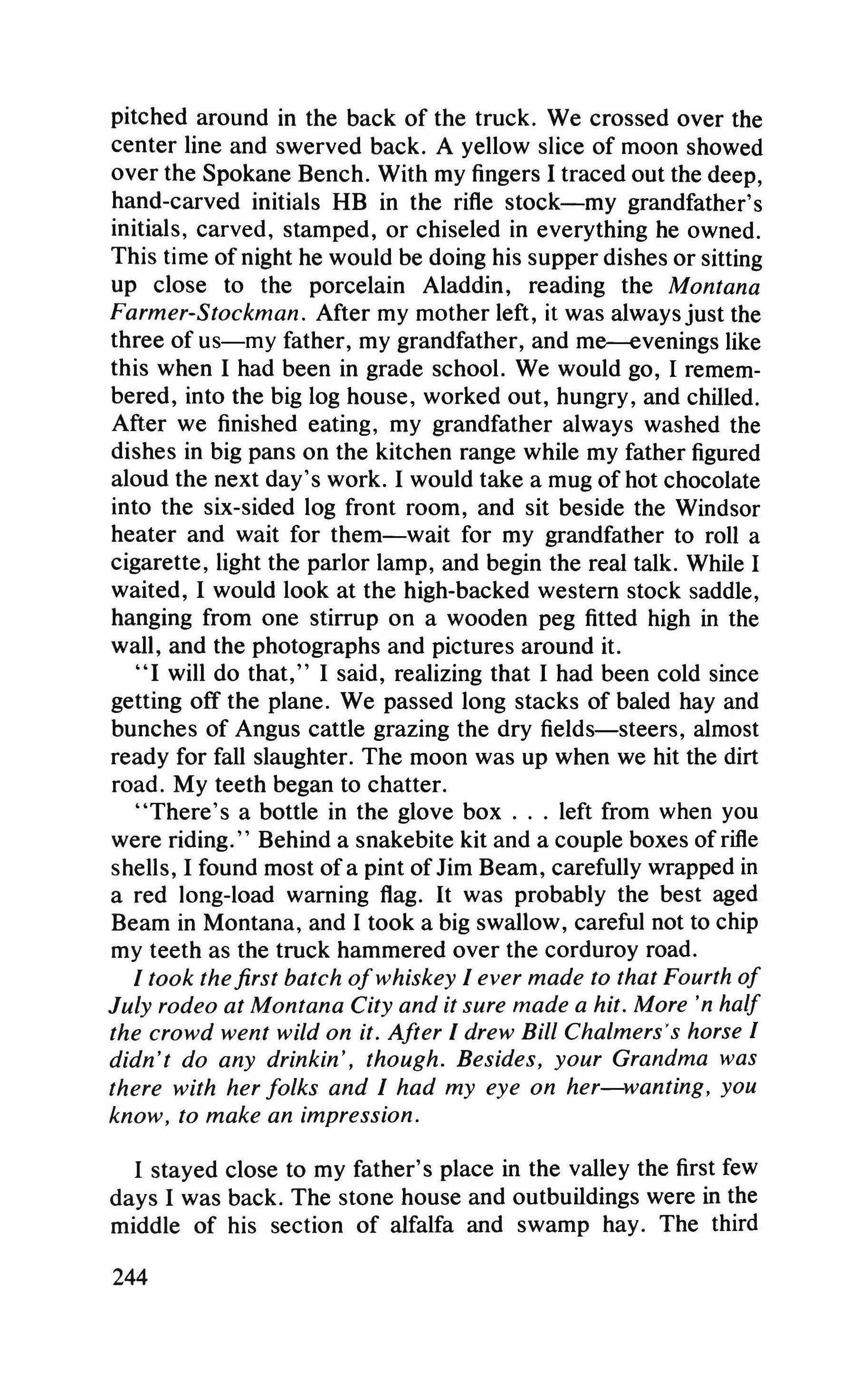
pitched around in the back of the truck. We crossed over the center line and swerved back. A yellow slice of moon showed over the Spokane Bench. With my fingers I traced out the deep, hand-carved initials HB in the rifle stock-my grandfather's initials, carved, stamped, or chiseled in everything he owned. This time of night he would be doing his supper dishes or sitting up close to the porcelain Aladdin, reading the Montana Farmer-Stockman. After my mother left, it was alwaysjust the three of us-my father, my grandfather, and me-evenings like this when I had been in grade school. We would go, I remembered, into the big log house, worked out, hungry, and chilled. After we finished eating, my grandfather always washed the dishes in big pans on the kitchen range while my father figured aloud the next day's work. I would take a mug of hot chocolate into the six-sided log front room, and sit beside the Windsor heater and wait for them-wait for my grandfather to roll a cigarette, light the parlor lamp, and begin the real talk. While I waited, I would look at the high-backed western stock saddle, hanging from one stirrup on a wooden peg fitted high in the wall, and the photographs and pictures around it.
"I will do that," I said, realizing that I had been cold since getting off the plane. We passed long stacks of baled hay and bunches of Angus cattle grazing the dry fields-steers, almost ready for fall slaughter. The moon was up when we hit the dirt road. My teeth began to chatter.
"There's a bottle in the glove box left from when you were riding." Behind a snakebite kit and a couple boxes of rifle shells, I found most of a pint of Jim Beam, carefully wrapped in a red long-load warning flag. It was probably the best aged Beam in Montana, and I took a big swallow, careful not to chip my teeth as the truck hammered over the corduroy road.
I took thejirst batch ofwhiskey I ever made to that Fourth of July rodeo at Montana City and it sure made a hit. More 'n half the crowd went wild on it. After I drew Bill Chalmers's horse I didn't do any drinkin'; though. Besides, your Grandma was there with her folks and I had my eye on her-s-wanting; you know, to make an impression.
I stayed close to my father's place in the valley the first few days I was back. The stone house and outbuildings were in the middle of his section of alfalfa and swamp hay. The third

cutting had been finished while I was still in Nam. The days were crisp, and I didn't feel much like town, so each morning I caught the roan and worked him. The horse corral was round and solid, slightly out-sloping at the top. Beside the corral, a shelterbelt of Russian olive trees grew in an old ditch that ran a quarter mile down the section line. Off south, in line with the belt, the smelter stack in East Helena stood centered in the blue of the Elkhorn Range beyond, like a gunsight. Magpies and Hungarian partridge lived in the shelterbelt. The magpies liked to keep company with the horse. When I tired of splitting and stacking the fir log butts that my father brought in each night, I would go sit on the corral and watch the horse move.
We had six or seven farmers helping at the chute, puttin' on riggin's and helping the riders get on. When they got that big red bastard in the chute he kept tryin to climb out, standing on his hind legs and pawin' the planks. He scared most of the volunteer help off. Ifinally had to saddle him myself. Chalmers was there watchin', his leg in a castfrom that time he got piled above Rocker Gulch and laid up there three days till Babe found him. Bill always did have a bad bronc or two around, you know.
Each morning I worked the horse: sacked him until he was used to being touched, caned his legs until he led without hesitation, talked him into taking a bit in his mouth, and got him to stand still while the neck strap bent his ears. I touched him and told him how things were. Magpies would settle down and walk the top corral rail, watching the roan follow me with a saddle blanket on his back. He'd fart like a 105 throwing high-explosive rounds, and I'd tell him what a fine war-horse he was. He listened and walked and I talked him tired.
Late in the mornings the wind would come out of the southwest, rolling in breakers off the divide, washing down the Ten-Mile into the Helena Valley. In the wind I walked the horse and told him everything I could remember about the girl in Canada-a girl who walked up behind me at dusk, right after I'd been eliminated from the money in saddle broncs, at the Williams Lake Stampede. She just walked up behind me as I was unlacing my chaps, put her hand on my arm, and said hello. I told the roan how she walked with a little limp, about her voice that was always almost a whisper, about the fingerwide scars on her hip, and how she sent me tobacco. And I told
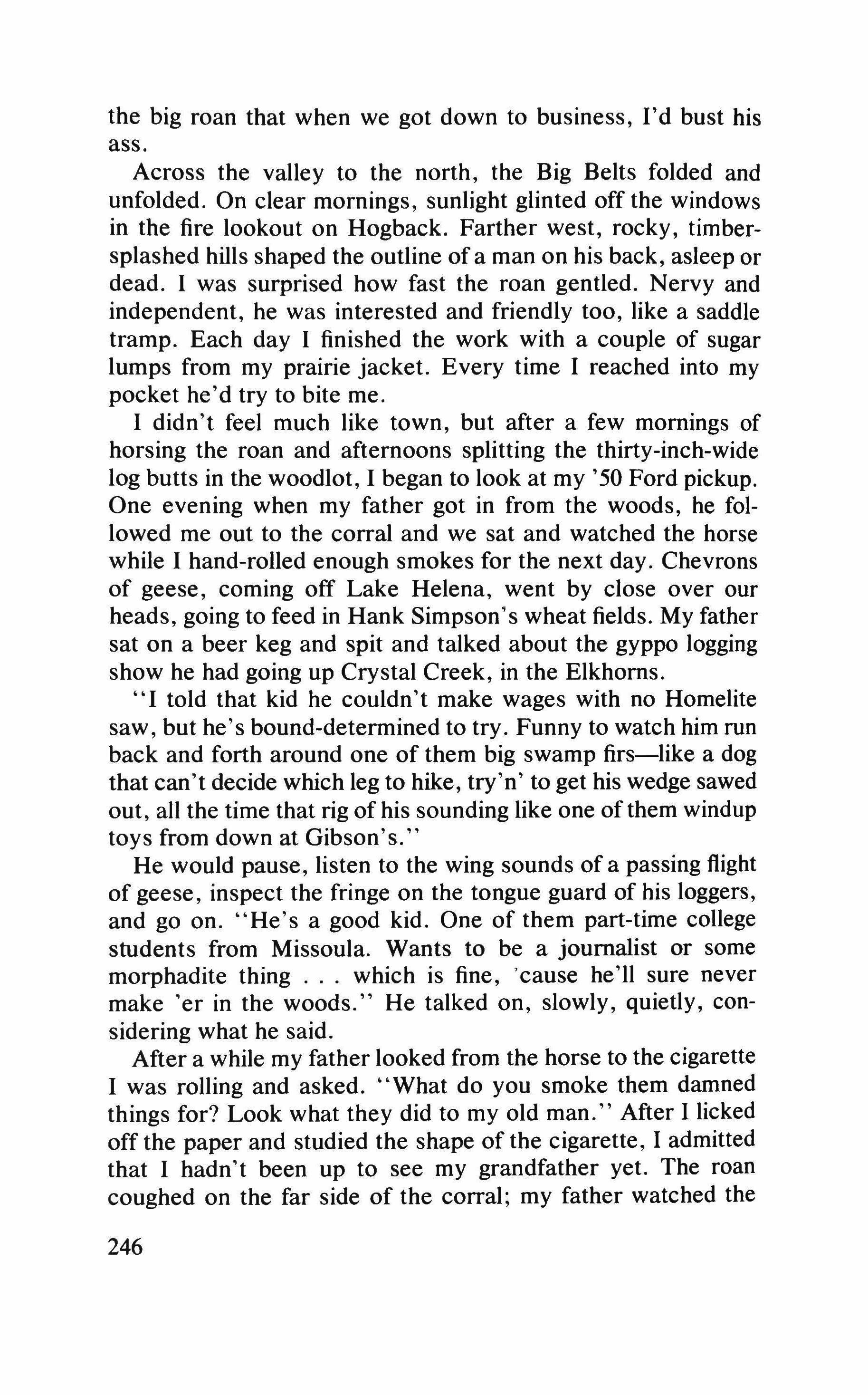
the big roan that when we got down to business, I'd bust his ass.
Across the valley to the north, the Big Belts folded and unfolded. On clear mornings, sunlight glinted off the windows in the fire lookout on Hogback. Farther west, rocky, timbersplashed hills shaped the outline of a man on his back, asleep or dead. I was surprised how fast the roan gentled. Nervy and independent, he was interested and friendly too, like a saddle tramp. Each day I finished the work with a couple of sugar lumps from my prairie jacket. Every time I reached into my pocket he'd try to bite me.
I didn't feel much like town, but after a few mornings of horsing the roan and afternoons splitting the thirty-inch-wide log butts in the woodlot, I began to look at my '50 Ford pickup. One evening when my father got in from the woods, he followed me out to the corral and we sat and watched the horse while I hand-rolled enough smokes for the next day. Chevrons of geese, corning off Lake Helena, went by close over our heads, going to feed in Hank Simpson's wheat fields. My father sat on a beer keg and spit and talked about the gyppo logging show he had going up Crystal Creek, in the Elkhorns.
"I told that kid he couldn't make wages with no Homelite saw, but he's bound-determined to try. Funny to watch him run back and forth around one of them big swamp firs-like a dog that can't decide which leg to hike, try'n' to get his wedge sawed out, all the time that rig of his sounding like one of them windup toys from down at Gibson's."
He would pause, listen to the wing sounds of a passing flight of geese, inspect the fringe on the tongue guard of his loggers, and go on. "He's a good kid. One of them part-time college students from Missoula. Wants to be a journalist or some morphadite thing which is fine, 'cause he'll sure never make 'er in the woods." He talked on, slowly, quietly, considering what he said.
After a while my father looked from the horse to the cigarette I was rolling and asked. "What do you smoke them damned things for? Look what they did to myoid man." After I licked off the paper and studied the shape of the cigarette, I admitted that I hadn't been up to see my grandfather yet. The roan coughed on the far side of the corral; my father watched the

geese and went silent. I had a lot oftrouble sittin' that horse in the chute. He'd rare and lunge and try 'n' scrape me off I was ridin' broncs here at the ranch most every day then, because broke horses were in demandfor the war and knew I could ride him if I could get out the gate in one piece. The long-cut Dominion tobacco worked easily off my fingers, straight and even and firm. Cigarettes that were lumpy or tapered at one end I took apart and rolled again. The roan would get curious, walk over and look through the rails, and I'd feed him a smoke. Within a week he had the habit too.
One morning after chores I led the roan into the loading chute and eased my stock saddle down over the blanket. I reached between the rails with a piece of wire and hooked the cinch ring. He stood still as I looped the wide leather cinch strap back and forth through the Canterbury buckle and eased it tight. The roan looked straight ahead, tensed like a choker cable under strain. I fed him a cigarette, folded the stirrups slowly down, and smoked one myself. I backed him out of the chute and he made a few halfhearted bucks on the end of the lead rope. He farted and crow-hopped around, then lost interest in the weight of the saddle and the flap of stirrups on his sides. He stood dead still, ears back and head high, then walked up to me, wanting sugar and tobacco.
Late in the second week I started tinkering with the truck. The oil in the crankcase was thick as asphalt. Spark-plug electrodes were green, and the points were welded together. All the tires except the spare were flat and the battery was gone. I pumped up the tires with a compressor hose off a Ford 9-N tractor and then put the six-volt tractor battery in the truck. It started with a roar and a cloud ofblack smoke like a diesel. The flathead V-8 sounded good, talking through nine feet of straight pipe. The transmission growled in neutral and ground on every shift. I double-clutched into third, drifted onto the country road sideways, popped the stick down into fourth, and ran it up to seventy.
There was more traffic than I remembered on the old Great Falls Highway. The orphanage at the city limits was deserted; with uplifted arms, the white stone Jesus out front blessed a dozer leveling dredge piles across the road.
Uptown, I looked at saddles in Devore's. Low-backed, full-
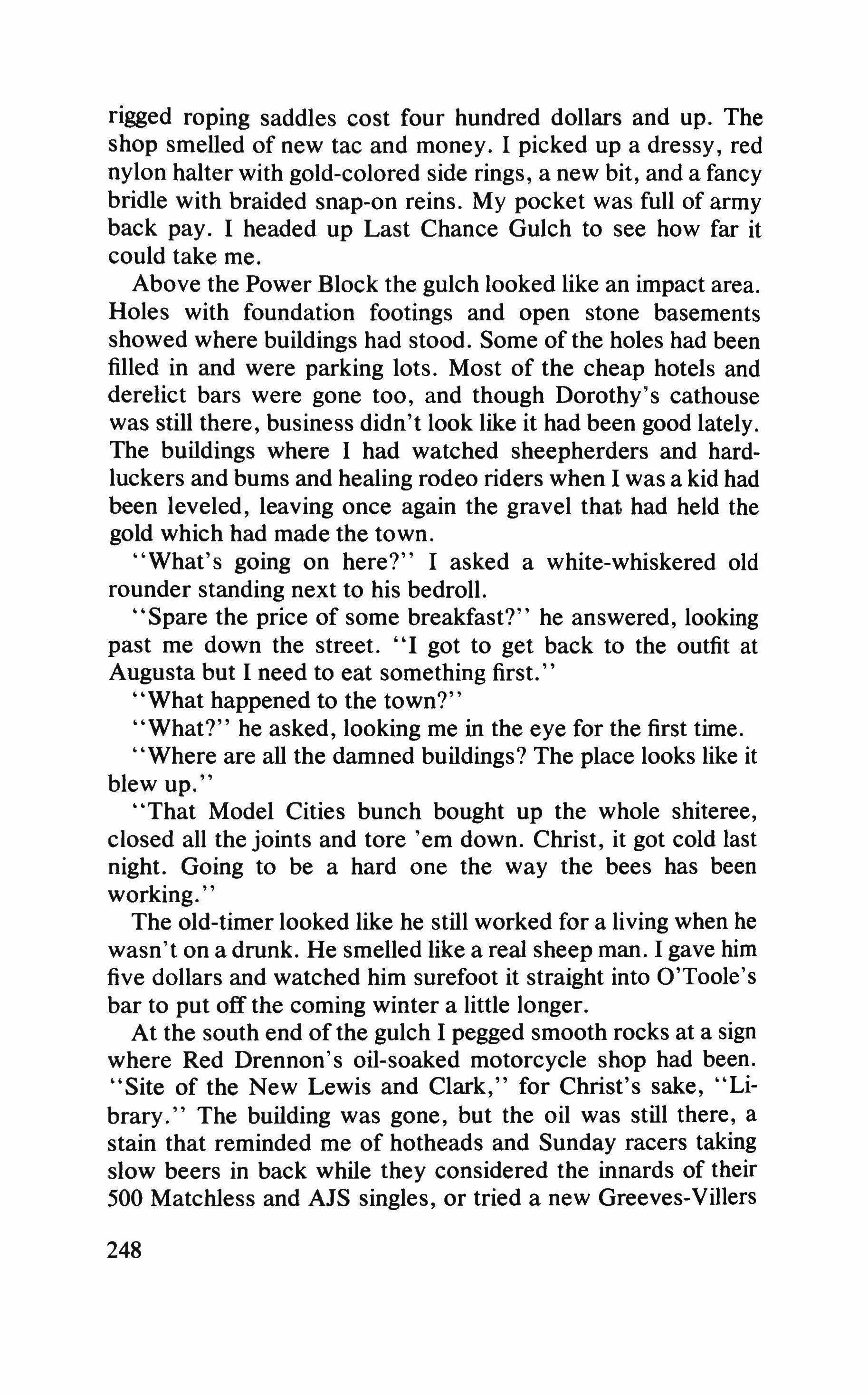
rigged roping saddles cost four hundred dollars and up. The shop smelled of new tac and money. I picked up a dressy, red nylon halter with gold-colored side rings, a new bit, and a fancy bridle with braided snap-on reins. My pocket was full of army back pay. I headed up Last Chance Gulch to see how far it could take me.
Above the Power Block the gulch looked like an impact area. Holes with foundation footings and open stone basements showed where buildings had stood. Some of the holes had been filled in and were parking lots. Most of the cheap hotels and derelict bars were gone too, and though Dorothy's cathouse was still there, business didn't look like it had been good lately. The buildings where I had watched sheepherders and hardluckers and bums and healing rodeo riders when I was a kid had been leveled, leaving once again the gravel that had held the gold which had made the town.
"What's going on here?" I asked a white-whiskered old rounder standing next to his bedroll.
"Spare the price of some breakfast?" he answered, looking past me down the street. "I got to get back to the outfit at Augusta but I need to eat something first.
"What happened to the town?"
"What?" he asked, looking me in the eye for the first time.
"Where are all the damned buildings? The place looks like it blew up."
"That Model Cities bunch bought up the whole shiteree, closed all the joints and tore 'em down. Christ, it got cold last night. Going to be a hard one the way the bees has been working."
The old-timer looked like he still worked for a living when he wasn't on a drunk. He smelled like a real sheep man. I gave him five dollars and watched him surefoot it straight into O'Toole's bar to put off the coming winter a little longer.
At the south end of the gulch I pegged smooth rocks at a sign where Red Drennon's oil-soaked motorcycle shop had been. "Site of the New Lewis and Clark," for Christ's sake, "Library." The building was gone, but the oil was still there, a stain that reminded me of hotheads and Sunday racers taking slow beers in back while they considered the innards of their 500 Matchless and AJS singles, or tried a new Greeves-Villers
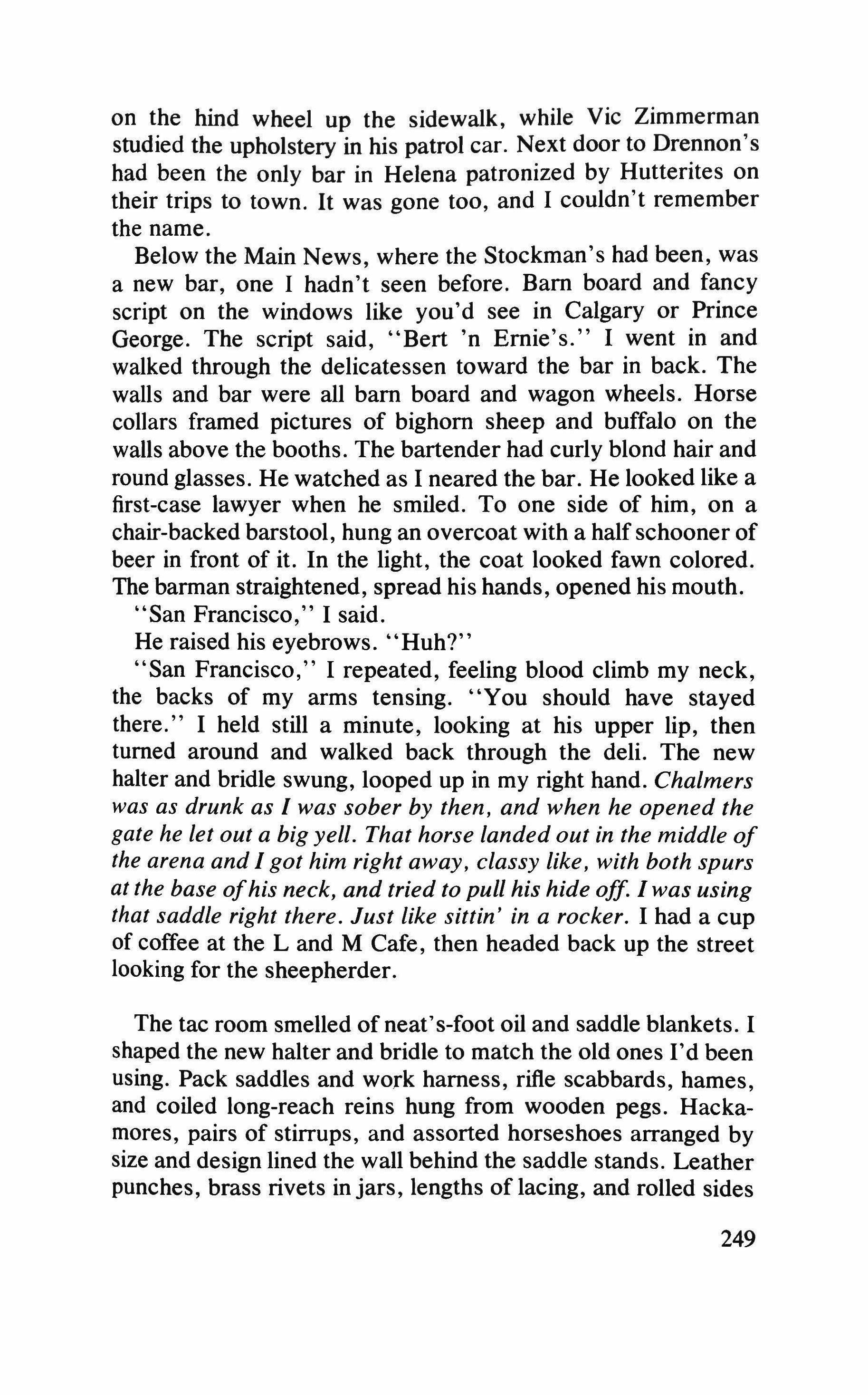
on the hind wheel up the sidewalk, while Vic Zimmerman studied the upholstery in his patrol car. Next door to Drennon's had been the only bar in Helena patronized by Hutterites on their trips to town. It was gone too, and I couldn't remember the name.
Below the Main News, where the Stockman's had been, was a new bar, one I hadn't seen before. Bam board and fancy script on the windows like you'd see in Calgary or Prince George. The script said, "Bert 'n Ernie's." I went in and walked through the delicatessen toward the bar in back. The walls and bar were all bam board and wagon wheels. Horse collars framed pictures of bighorn sheep and buffalo on the walls above the booths. The bartender had curly blond hair and round glasses. He watched as I neared the bar. He looked like a first-case lawyer when he smiled. To one side of him, on a chair-backed barstool, hung an overcoat with a half schooner of beer in front of it. In the light, the coat looked fawn colored. The barman straightened, spread his hands, opened his mouth.
"San Francisco," I said. He raised his eyebrows. "Huh?"
"San Francisco," I repeated, feeling blood climb my neck, the backs of my arms tensing. "You should have stayed there." I held still a minute, looking at his upper lip, then turned around and walked back through the deli. The new halter and bridle swung, looped up in my right hand. Chalmers was as drunk as I was sober by then, and when he opened the gate he let out a big yell. That horse landed out in the middle of the arena and I got him right away, classy like, with both spurs at the base ofhis neck, and tried to pull his hide off I was using that saddle right there. Just like sittin' in a rocker. I had a cup of coffee at the Land M Cafe, then headed back up the street looking for the sheepherder.
The tac room smelled ofneat's-foot oil and saddle blankets. I shaped the new halter and bridle to match the old ones I'd been using. Pack saddles and work harness, rifle scabbards, hames, and coiled long-reach reins hung from wooden pegs. Hackamores, pairs of stirrups, and assorted horseshoes arranged by size and design lined the wall behind the saddle stands. Leather punches, brass rivets in jars, lengths of lacing, and rolled sides

of latigo leather were pigeon-holed along the work bench. A calendar girl a yard long sat on a hay bale, smiling at me. I'd watched ten years for her shirt's bottom button to pop loose. Below the cowgirl it said: 19 DUNCAN AND SONS FEED 59. Mouse turds rolled on the bench as I saddle-soaped the new bridle. The girl in Canada thought I was still in Vietnam. I looked at the calendar and wondered why I wouldn't call her. She'd written a couple of times a week, even after I extended the second time. On the wall in front of me, next to a reloading press, hung my father's dull iron-gray spurs. I took them down and slid them up my left arm, found a set of bucking rolls, and buckled them onto my saddle. I piled a blanket, bridle, halter, and a pair of stiff, leggin'-type chaps on the saddle and took it all outside.
The roan had got used to being saddled in the last couple of weeks and only half-tried to kick my arm as I reached under his belly for the cinch. I had his head tied to a post and kept him between me and the corral rails while I worked. He watched me with his head turned back as I laced the cinch, and tried to bite my elbow when I pulled the air out of him. I shaped the heart-knot on the top cinch ring, and he finally got hold of my Levi jacket and gave me a shake.
On the far side of the corral I kicked off my boots. The sole and upper on the right one had come unstitched and my sock was black along the inside. I studied the boot before stepping into the stovepipe chaps. After I had quit riding at Williams Lake, I'd gone to work haying. I bought the boots in Vernon, B. C., with my wages when she took me home. The chaps were separate and laced together at the crotch, then buckled around beltlike in back. The corral was dry and manure-soft, but it never crossed my mind not to use the chaps. They were my father's; he wore them shiny at eighteen, making a living at what I was getting ready to try again. They were stiffwith years of sweat. I pulled on my boots and buckled the spurs over them. I had trouble with my finders. The rowels on the spurs were dime-sized and blunt. They made no sound as I walked. Then he come loose and started to spin. I had a hell of a time keepin' my hand offthe saddle. When he straightened out [was still there. He'd buck high and sunfish, and sometimes [didn't figure he'd ever come down. Folks were waving and [wanted to 250

get off Then all sudden-like he stands up and tries to climb over the corral. Felt just like Tom Mix on Tony with him standin' up like that, except'n when he hit thefence and backed away he pulled offthe top rail.
I lit a cigarette and pulled the felt hat down until my ears stuck out. Through the smoke I could see the roan relaxing on three legs, cocky, keeping company with the magpies, ignoring me. I walked around the circle of the corral, throwing boards and a few big rocks over the fence. My breath was short. My eyes fastened to things I'd never noticed: the iron latch on the gate, a broken floor plank in the loading chute, bricks missing from the machine shop wall.
I led the roan once around the corral, twice, three times. Then I got him up against the fence where I'd saddled him. I knotted the halter rope and dropped it over the horn, and stretched my bandanna over his eyes between the head straps of the bridle. He lifted his tail. As I put my hip against his left shoulder and twisted the stirrup around, my stomach turned. What came up was bitter-maybe a cupful. I tried to spit it clear, but most of it ran down my chin onto my shirt. The big roan took a step. I held the stirrup and reached for the horn. He farted and backed up. I pulled myself on, hit my right foot against a corral rail, and tried to push him away from the fence. He settled his weight and backed another step. I'd reach up with my hat and pound his head. I was dead sure he'd turn over backwards on me. But I couldn't get him awayfrom thatfence. Them rails were nailed on with spikes no longer than your finger, and in a couple more jumps that big red bastard had another one knocked loose. Then over the whole mess we went. Chalmers was there, right in the way, hoppin' on his good leg and wavin' his hat. The horse damn near ran him down. I wanted that right stirrup, but not bad enough to put my leg between him and the fence. The sky was very blue and there were geese headed north, toward Lake Helena. I reached down and pulled the bandanna away.
The sky was very blue and when I landed it fell on my chest. I tried to roll to the right toward the fence but a hind foot landed there beside my ear. I watched the roan twist away, reins going straight in the air each time he came down. I got to my knees and threw up, hard this time. The roan stopped bucking almost
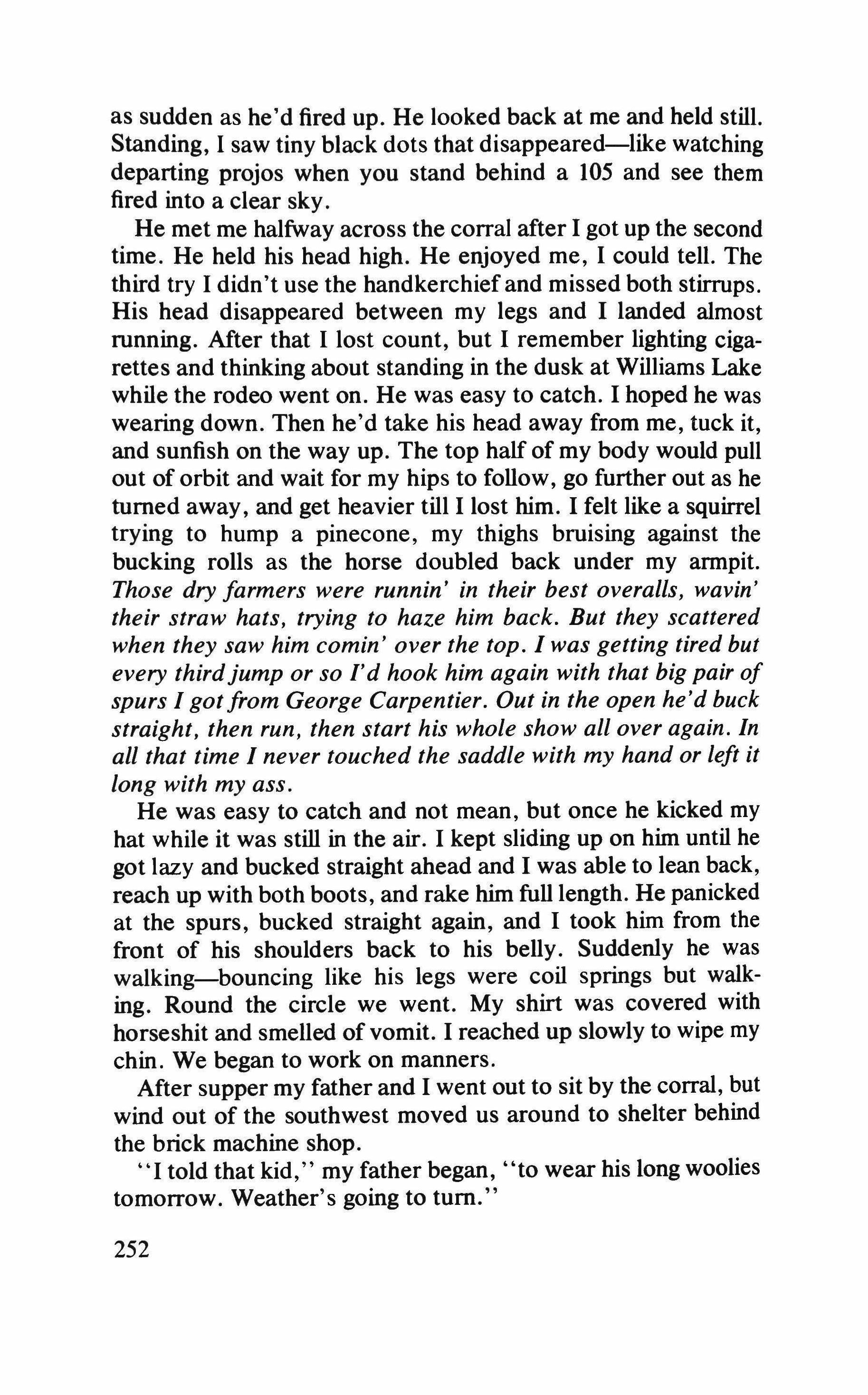
as sudden as he'd fired up. He looked back at me and held still. Standing, I saw tiny black dots that disappeared-like watching departing projos when you stand behind a 105 and see them fired into a clear sky.
He met me halfway across the corral after I got up the second time. He held his head high. He enjoyed me, I could tell. The third try I didn't use the handkerchief and missed both stirrups. His head disappeared between my legs and I landed almost running. After that I lost count, but I remember lighting cigarettes and thinking about standing in the dusk at Williams Lake while the rodeo went on. He was easy to catch. I hoped he was wearing down. Then he'd take his head away from me, tuck it, and sunfish on the way up. The top half of my body would pull out of orbit and wait for my hips to follow, go further out as he turned away, and get heavier till I lost him. I felt like a squirrel trying to hump a pinecone, my thighs bruising against the bucking rolls as the horse doubled back under my armpit. Those dry farmers were runnin' in their best overalls, wavin' their straw hats, trying to haze him back. But they scattered when they saw him comin' over the top. I was getting tired but every thirdjump or so ['d hook him again with that big pair of spurs I gotfrom George Carpentier. Out in the open he'd buck straight, then run, then start his whole show all over again. In all that time I never touched the saddle with my hand or Left it Long with my ass.
He was easy to catch and not mean, but once he kicked my hat while it was still in the air. I kept sliding up on him until he got lazy and bucked straight ahead and I was able to lean back, reach up with both boots, and rake him full length. He panicked at the spurs, bucked straight again, and I took him from the front of his shoulders back to his belly. Suddenly he was walking-bouncing like his legs were coil springs but walking. Round the circle we went. My shirt was covered with horseshit and smelled of vomit. I reached up slowly to wipe my chin. We began to work on manners.
After supper my father and I went out to sit by the corral, but wind out of the southwest moved us around to shelter behind the brick machine shop.
"I told that kid," my father began, "to wear his long woolies tomorrow. Weather's going to tum."
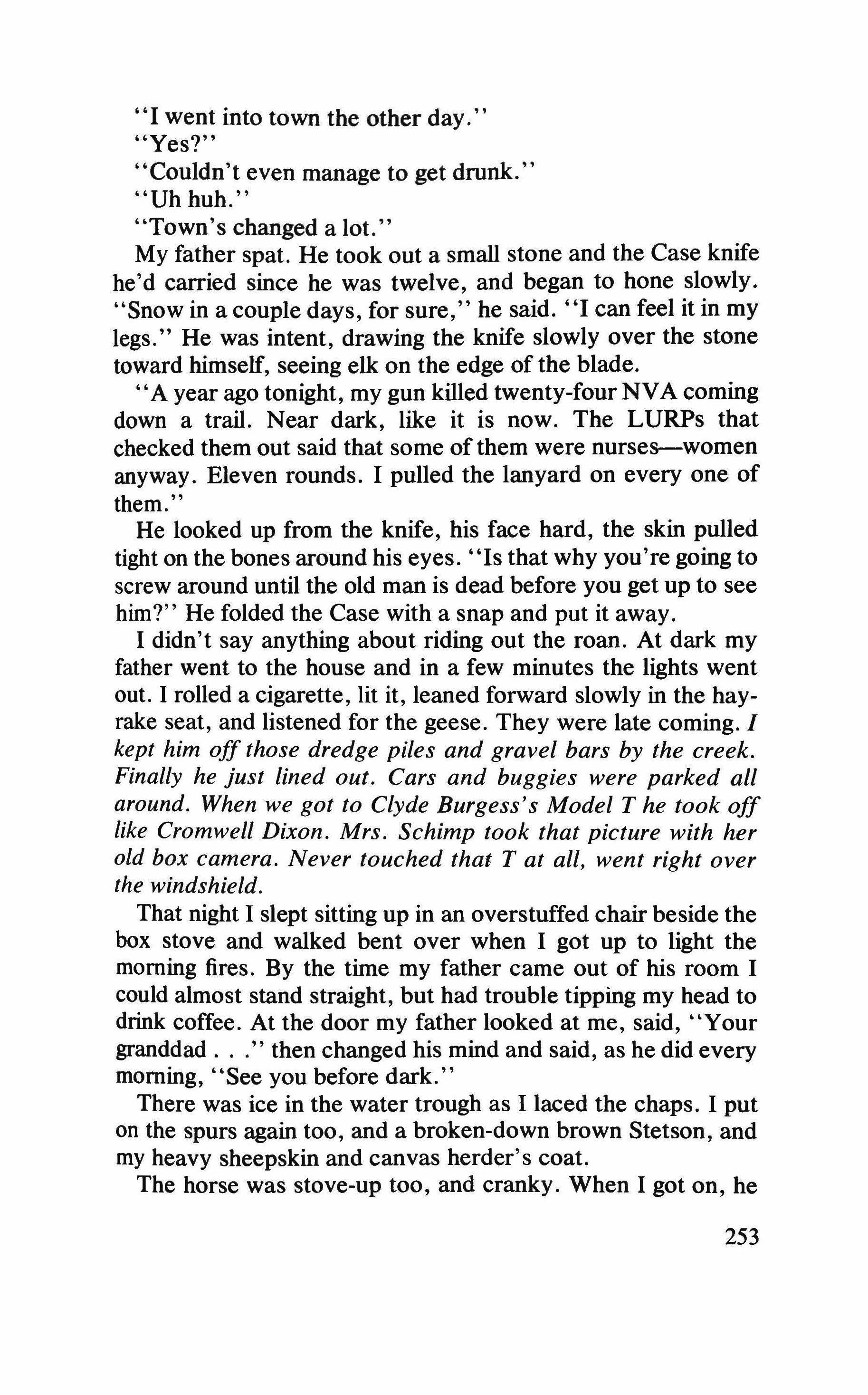
"I went into town the other day." "Yes?"
"Couldn't even manage to get drunk." "Uh huh."
"Town's changed a lot.
My father spat. He took out a small stone and the Case knife he'd carried since he was twelve, and began to hone slowly. "Snow in a couple days, for sure," he said. "I can feel it in my legs." He was intent, drawing the knife slowly over the stone toward himself, seeing elk on the edge of the blade.
A year ago tonight, my gun killed twenty-four NVA coming down a trail. Near dark, like it is now. The LURPs that checked them out said that some of them were nurses--women anyway. Eleven rounds. I pulled the lanyard on every one of them."
He looked up from the knife, his face hard, the skin pulled tight on the bones around his eyes. "Is that why you're going to screw around until the old man is dead before you get up to see him?" He folded the Case with a snap and put it away.
I didn't say anything about riding out the roan. At dark my father went to the house and in a few minutes the lights went out. I rolled a cigarette, lit it, leaned forward slowly in the hayrake seat, and listened for the geese. They were late coming. I kept him off those dredge piles and gravel bars by the creek. Finally he just lined out. Cars and buggies were parked all around. When we got to Clyde Burgess's Model T he took off like Cromwell Dixon. Mrs. Schimp took that picture with her old box camera. Never touched that T at all, went right over the windshield.
That night I slept sitting up in an overstuffed chair beside the box stove and walked bent over when I got up to light the morning fires. By the time my father came out of his room I could almost stand straight, but had trouble tipping my head to drink coffee. At the door my father looked at me, said, "Your granddad. .' then changed his mind and said, as he did every morning, "See you before dark."
There was ice in the water trough as I laced the chaps. I put on the spurs again too, and a broken-down brown Stetson, and my heavy sheepskin and canvas herder's coat.
The horse was stove-up too, and cranky. When I got on, he

tried to rub me off on the gatepost. He was sore and tired of me, but I kept him moving. Finally I raised the gate latch with my toe, and we headed south over the frosted stubble in the hay field.
The wind came off Red Mountain, taking wisps of our breath with it. Too cold to snow, I thought. Seems that some things you just can't ride, like Montana weather or the past. We crossed a summer-fallowed wheat field at daybreak, and while I was lighting a smoke ajackrabbit came up, bounding away. The roan was limbering, and when the jack took off he slammed sideways, almost out from under me. I caught the far side bucking roll to stay with him, but lost the cigarette. The twist and pull made the cords in my neck bum. I turned up the fleece collar and we kept on south, going up the Prickly Pear, past Klefner's big stone bam, and later, the new Kaiser cement plant.
At Montana City, the horse balked at the overpass above the interstate highway to Butte. I was afraid he'd buck into the guardrails if I booted him, so I led him across. There was nothing left at Montana City except the school my father had attended for a few years. The corrals and rodeo stands were long gone. I bought that horse from Chalmers for two pint cream bottles of shine and ten dollars. Used to ride him clear up Warm Springs Creek to court your grandma, he was that special. Beyond the interstate stretched open range, bordered by Taylor grazing ground to the west and the Burnell Ranch to the south-rolling miles of rocky grassland, scrub timber, and an old man.
Two sections of the Burnell home ranch had never been fenced. Shared with unfenced ground from neighboring outfits, it served as a common summer range. I touched the roan in the ribs and headed him up a long, rocky, knife-edged ridge-a landmark called Harris Hill by old-timers, for a dirt farmer who, during the depression, had turned his homestead into lime-rock quarry.
On the north slope of the ridge I turned the horse so we followed the faint contour of a buffalo trail, gaining ground out of the wind.· Just off the trail, a mound of rocks marked a quarter-section comer. I stopped the roan to let him breathe. A 254
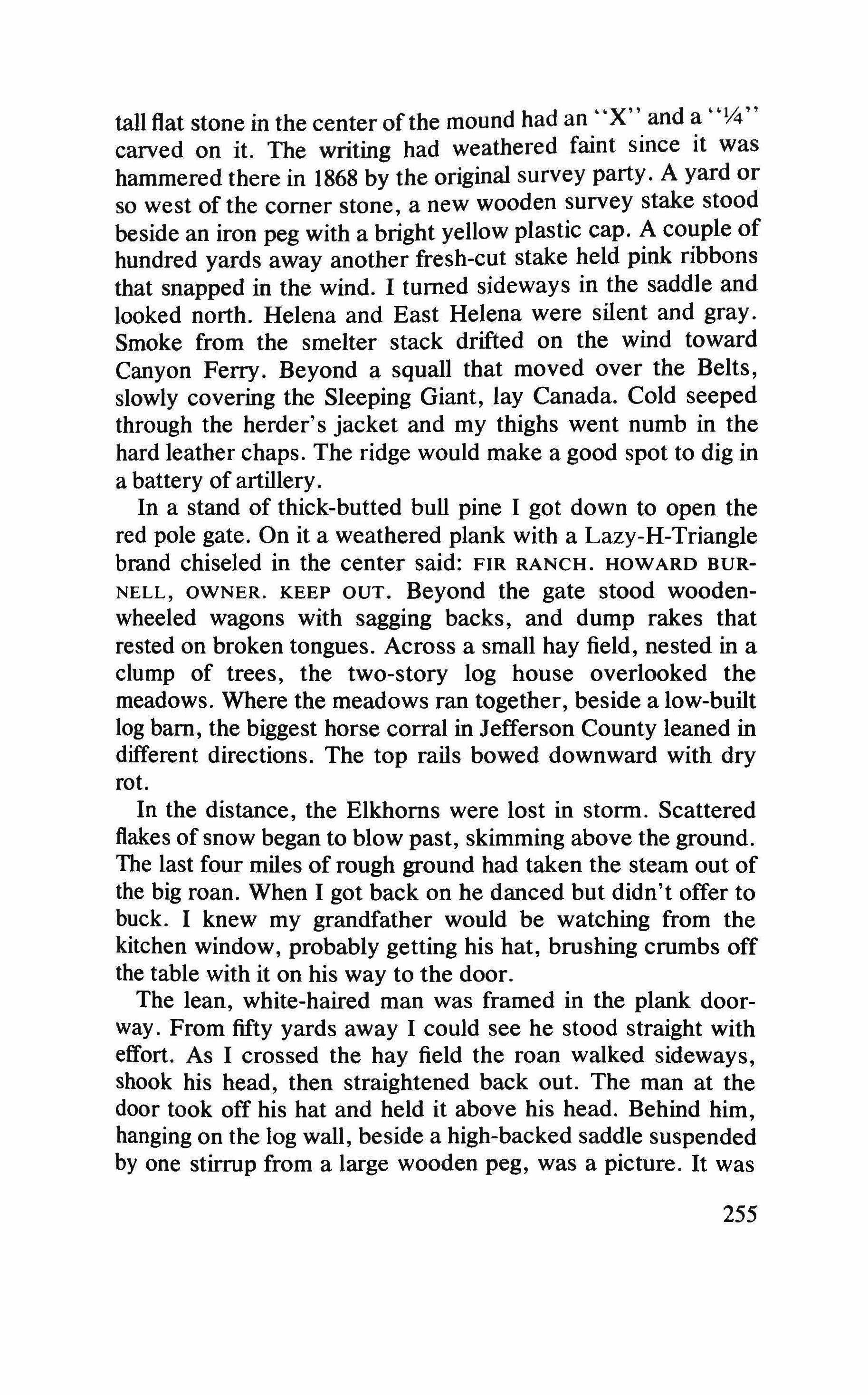
tall flat stone in the center of the mound had an X" and a � carved on it. The writing had weathered faint since it was hammered there in 1868 by the original survey party. A yard or so west of the comer stone, a new wooden survey stake stood beside an iron peg with a bright yellow plastic cap. A couple of hundred yards away another fresh-cut stake held pink ribbons that snapped in the wind. I turned sideways in the saddle and looked north. Helena and East Helena were silent and gray. Smoke from the smelter stack drifted on the wind toward Canyon Ferry. Beyond a squall that moved over the Belts, slowly covering the Sleeping Giant, lay Canada. Cold seeped through the herder's jacket and my thighs went numb in the hard leather chaps. The ridge would make a good spot to dig in a battery of artillery.
In a stand of thick-butted bull pine I got down to open the red pole gate. On it a weathered plank with a Lazy-H-Triangle brand chiseled in the center said: FIR RANCH. HOWARD BURNELL, OWNER. KEEP OUT. Beyond the gate stood woodenwheeled wagons with sagging backs, and dump rakes that rested on broken tongues. Across a small hay field, nested in a clump of trees, the two-story log house overlooked the meadows. Where the meadows ran together, beside a low-built log bam, the biggest horse corral in Jefferson County leaned in different directions. The top rails bowed downward with dry rot.
In the distance, the Elkhoms were lost in storm. Scattered flakes of snow began to blow past, skimming above the ground. The last four miles of rough ground had taken the steam out of the big roan. When I got back on he danced but didn't offer to buck. I knew my grandfather would be watching from the kitchen window, probably getting his hat, brushing crumbs off the table with it on his way to the door.
The lean, white-haired man was framed in the plank doorway. From fifty yards away I could see he stood straight with effort. As I crossed the hay field the roan walked sideways, shook his head, then straightened back out. The man at the door took off his hat and held it above his head. Behind him, hanging on the log wall, beside a high-backed saddle suspended by one stirrup from a large wooden peg, was a picture. It was
255

gray with age, but the frame and glass would be wiped clean. A horse and rider hung in midair over a new-looking Model T Ford. The horse's head was twisted around to his right and his front legs were spread and stiff. His mouth was wide open. The rider faced the camera and you could tell who it was. He leaned back, holding his hat in one hand, looking off to his right, waiting for the horse to land. He was grinning. Grinning like from up there he could see it all: the blur of grassy ridges and timbered hills that made him what he was; friends running and waving and among them the girl, one hand lifted to her mouth, her eyes for an instant meeting his before looking away, and smiling, like she saw something too.
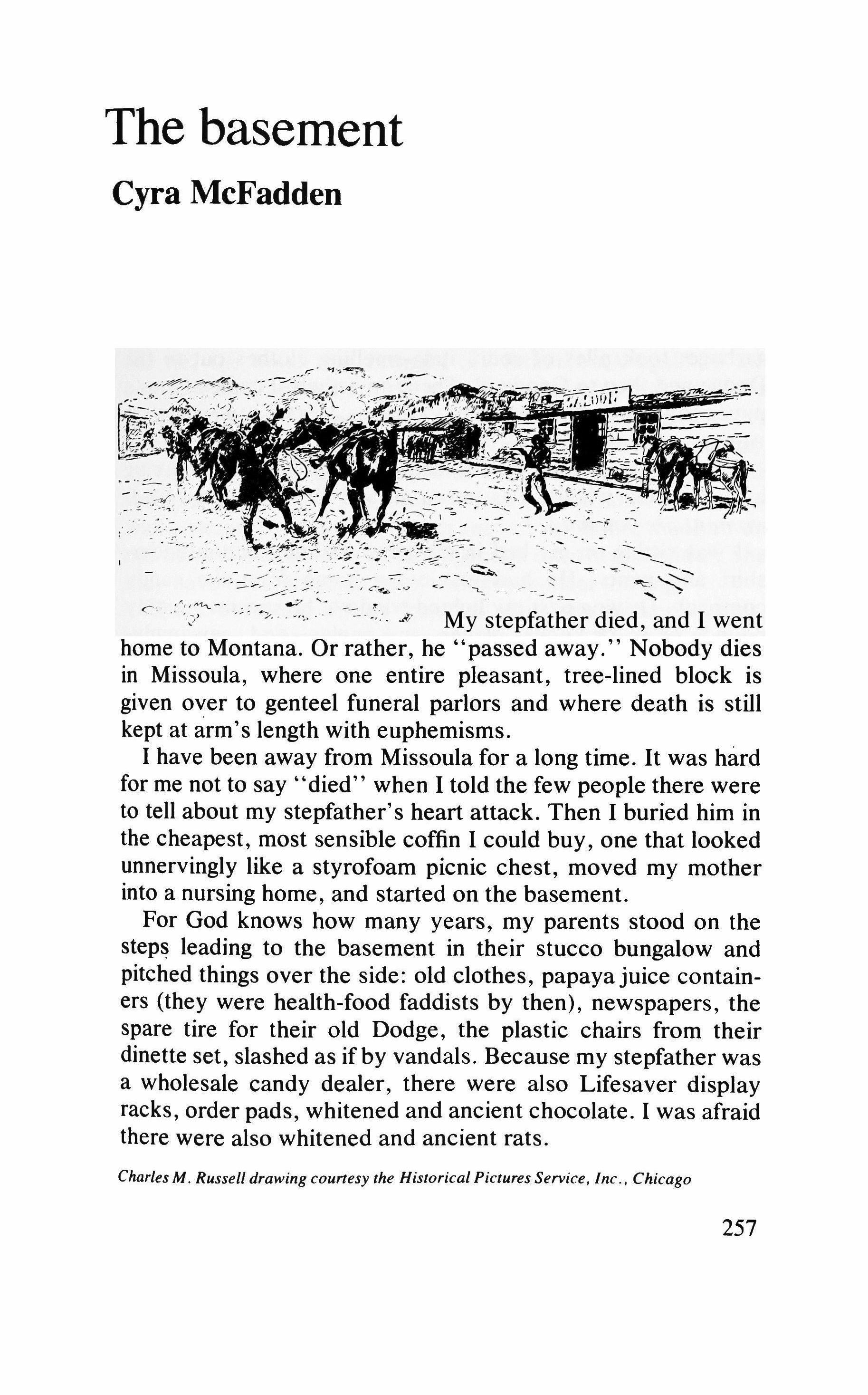
':�7"'-- .c_ "» - ",.
My stepfather died, and I went home to Montana. Or rather, he "passed away." Nobody dies in Missoula, where one entire pleasant, tree-lined block is given over to genteel funeral parlors and where death is still kept at arm's length with euphemisms.
I have been away from Missoula for a long time. It was hard for me not to say "died" when I told the few people there were to tell about my stepfather's heart attack. Then I buried him in the cheapest, most sensible coffin I could buy, one that looked unnervingly like a styrofoam picnic chest, moved my mother into a nursing home, and started on the basement.
For God knows how many years, my parents stood on the steps leading to the basement in their stucco bungalow and pitched things over the side: old clothes, papaya juice containers (they were health-food faddists by then), newspapers, the spare tire for their old Dodge, the plastic chairs from their dinette set, slashed as ifby vandals. Because my stepfather was a wholesale candy dealer, there were also Lifesaver display racks, order pads, whitened and ancient chocolate. I was afraid there were also whitened and ancient rats.
Charles M. Russell drawing courtesy the
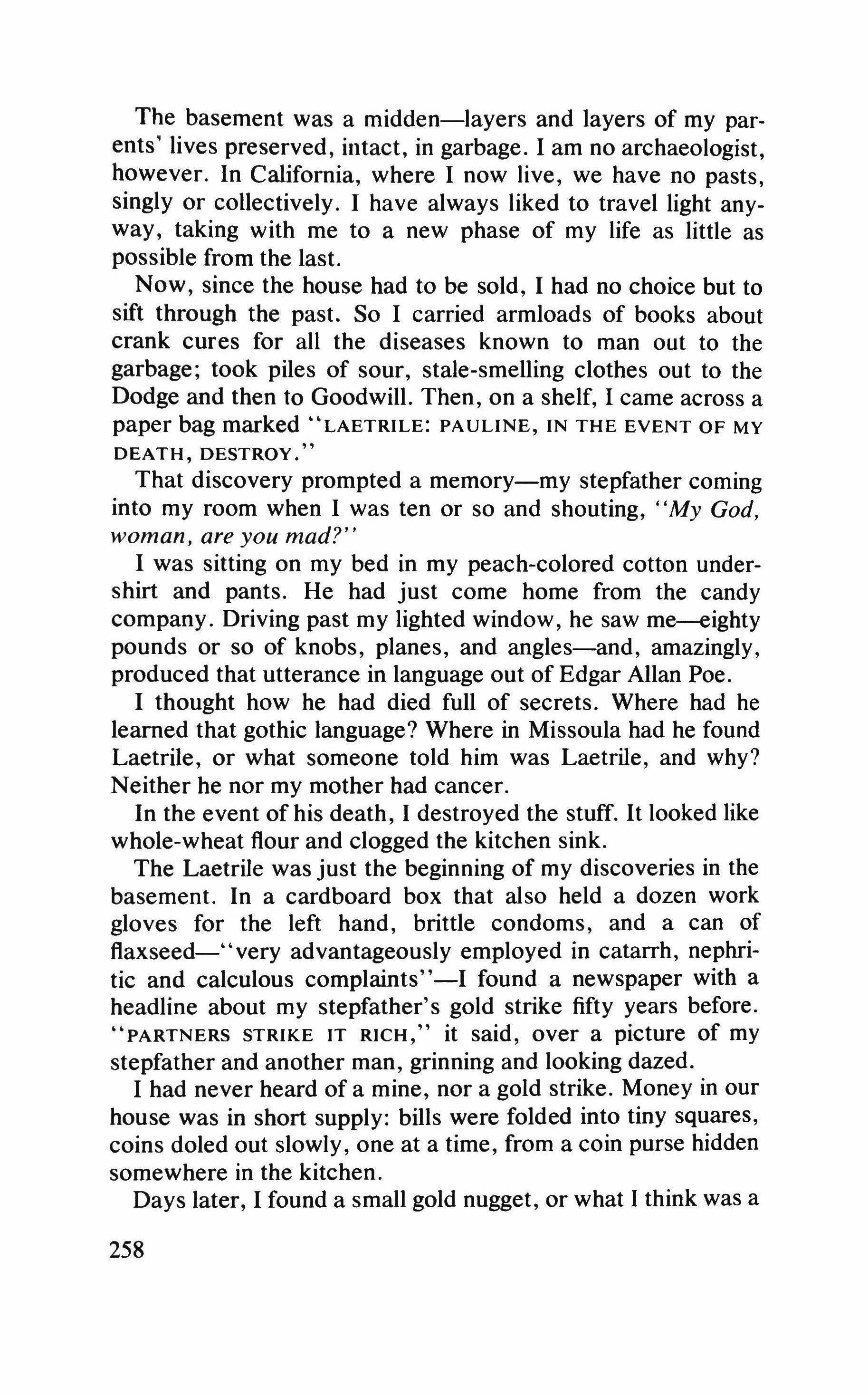
The basement was a midden-layers and layers of my parents' lives preserved, intact, in garbage. I am no archaeologist, however. In California, where I now live, we have no pasts, singly or collectively. I have always liked to travel light anyway, taking with me to a new phase of my life as little as possible from the last.
Now, since the house had to be sold, I had no choice but to sift through the past. So I carried armloads of books about crank cures for all the diseases known to man out to the garbage; took piles of sour, stale-smelling clothes out to the Dodge and then to Goodwill. Then, on a shelf, I came across a paper bag marked "LAETRILE: PAULINE, IN THE EVENT OF MY DEATH, DESTROY."
That discovery prompted a memory-my stepfather coming into my room when I was ten or so and shouting, "My God, woman, are you mad?"
I was sitting on my bed in my peach-colored cotton undershirt and pants. He had just come home from the candy company. Driving past my lighted window, he saw me-eighty pounds or so of knobs, planes, and angles-and, amazingly, produced that utterance in language out of Edgar Allan Poe.
I thought how he had died full of secrets. Where had he learned that gothic language? Where in Missoula had he found Laetrile, or what someone told him was Laetrile, and why? Neither he nor my mother had cancer.
In the event of his death, I destroyed the stuff. It looked like whole-wheat flour and clogged the kitchen sink.
The Laetrile was just the beginning of my discoveries in the basement. In a cardboard box that also held a dozen work gloves for the left hand, brittle condoms, and a can of f1axseed-"very advantageously employed in catarrh, nephritic and calculous complaints''-I found a newspaper with a headline about my stepfather's gold strike fifty years before. "PARTNERS STRIKE IT RICH," it said, over a picture of my stepfather and another man, grinning and looking dazed.
I had never heard of a mine, nor a gold strike. Money in our house was in short supply: bills were folded into tiny squares, coins doled out slowly, one at a time, from a coin purse hidden somewhere in the kitchen.
Days later, I found a small gold nugget, or what I think was a
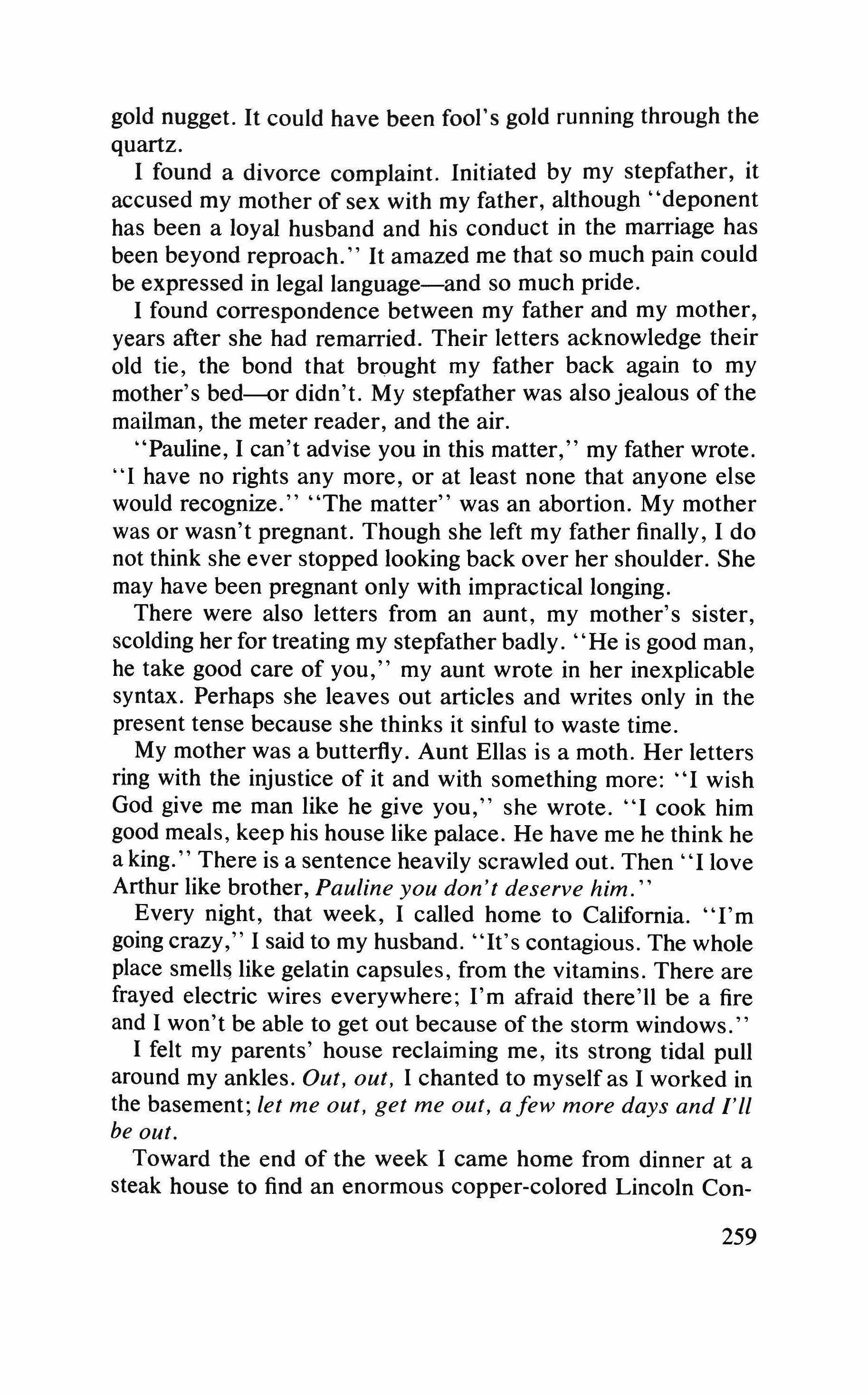
gold nugget. It could have been fool's gold running through the quartz.
I found a divorce complaint. Initiated by my stepfather, it accused my mother of sex with my father, although "deponent has been a loyal husband and his conduct in the marriage has been beyond reproach." It amazed me that so much pain could be expressed in legal language-and so much pride.
I found correspondence between my father and my mother, years after she had remarried. Their letters acknowledge their old tie, the bond that brought my father back again to my mother's bed-or didn't. My stepfather was also jealous of the mailman, the meter reader, and the air.
"Pauline, I can't advise you in this matter," my father wrote. "I have no rights any more, or at least none that anyone else would recognize." "The matter" was an abortion. My mother was or wasn't pregnant. Though she left my father finally, I do not think she ever stopped looking back over her shoulder. She may have been pregnant only with impractical longing.
There were also letters from an aunt, my mother's sister, scolding her for treating my stepfather badly. "He is good man, he take good care of you," my aunt wrote in her inexplicable syntax. Perhaps she leaves out articles and writes only in the present tense because she thinks it sinful to waste time.
My mother was a butterfly. Aunt ElIas is a moth. Her letters ring with the injustice of it and with something more: "I wish God give me man like he give you," she wrote. "I cook him good meals, keep his house like palace. He have me he think he a king." There is a sentence heavily scrawled out. Then "I love Arthur like brother, Pauline you don't deserve him."
Every night, that week, I called home to California. ''I'm going crazy," I said to my husband. "It's contagious. The whole place smells like gelatin capsules, from the vitamins. There are frayed electric wires everywhere; I'm afraid there'll be a fire and I won't be able to get out because of the storm windows."
I felt my parents' house reclaiming me, its strong tidal pull around my ankles. Out, out, I chanted to myself as I worked in the basement; let me out, get me out, a few more days and I'll be out.
Toward the end of the week I came home from dinner at a steak house to find an enormous copper-colored Lincoln Con-
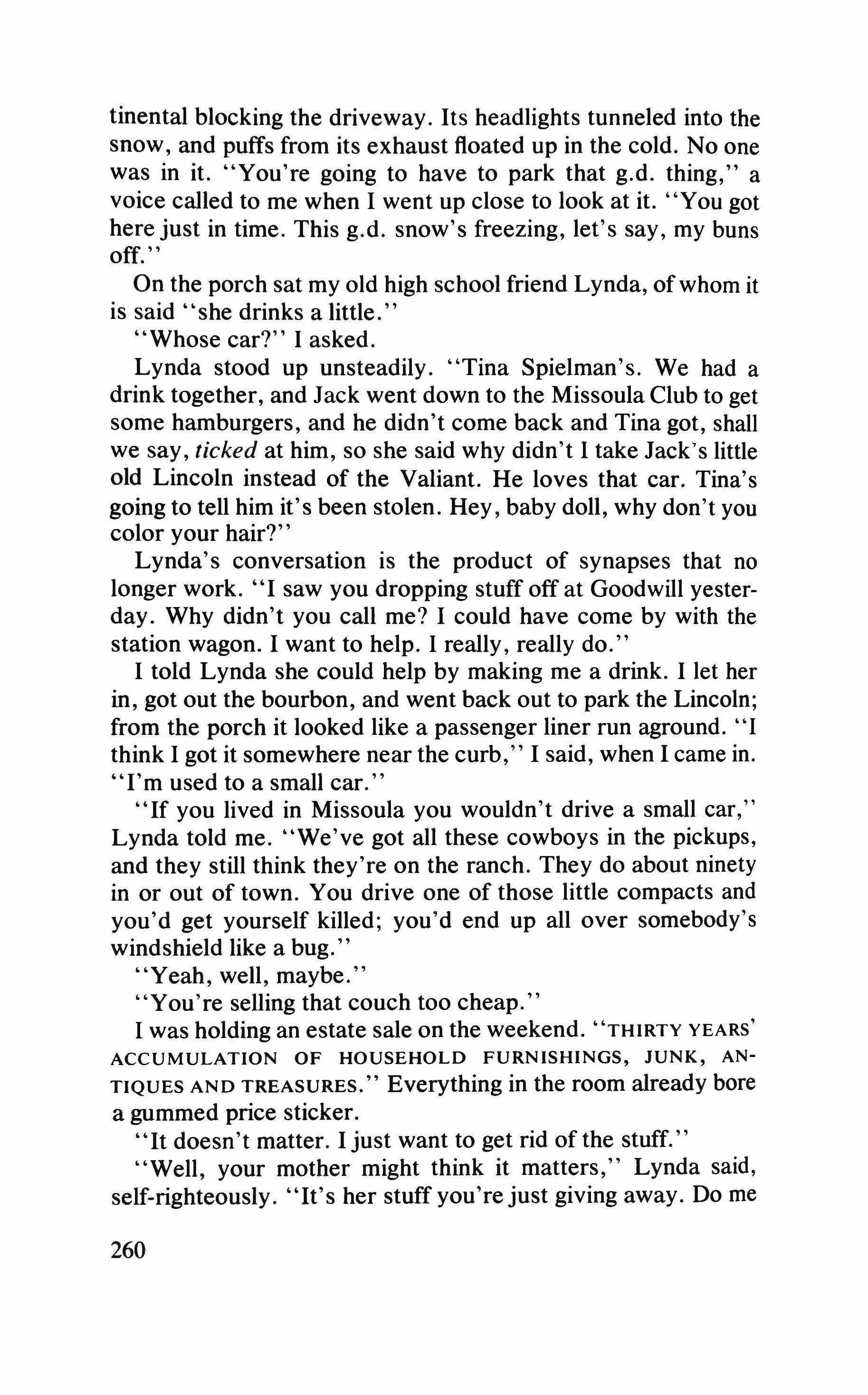
tinental blocking the driveway. Its headlights tunneled into the snow, and puffs from its exhaust floated up in the cold. No one was in it. "You're going to have to park that g.d. thing," a voice called to me when I went up close to look at it. 'You got here just in time. This g.d. snow's freezing, let's say, my buns off."
On the porch sat myoId high school friend Lynda, ofwhom it is said •. she drinks a little. '
"Whose car?" I asked.
Lynda stood up unsteadily. "Tina Spielman's. We had a drink together, and Jack went down to the Missoula Club to get some hamburgers, and he didn't come back and Tina got, shall we say, ticked at him, so she said why didn't I take Jack's little old Lincoln instead of the Valiant. He loves that car. Tina's going to tell him it's been stolen. Hey, baby doll, why don't you color your hair?"
Lynda's conversation is the product of synapses that no longer work. "I saw you dropping stuff off at Goodwill yesterday. Why didn't you call me? I could have come by with the station wagon. I want to help. I really, really do."
I told Lynda she could help by making me a drink. I let her in, got out the bourbon, and went back out to park the Lincoln; from the porch it looked like a passenger liner run aground..•I think I got it somewhere near the curb," I said, when I came in I'm used to a small car.
"If you lived in Missoula you wouldn't drive a small car," Lynda told me. "We've got all these cowboys in the pickups, and they still think they're on the ranch. They do about ninety in or out of town. You drive one of those little compacts and you'd get yourself killed; you'd end up all over somebody's windshield like a bug."
"Yeah, well, maybe."
"You're selling that couch too cheap."
I was holding an estate sale on the weekend. "THIRTY YEARS' ACCUMULATION OF HOUSEHOLD FURNISHINGS, JUNK, ANTIQUES AND TREASURES." Everything in the room already bore a gummed price sticker.
"It doesn't matter. I just want to get rid of the stuff."
"Well, your mother might think it matters," Lynda said, self-righteously. "It's her stuff you're just giving away. Do me

a favor-at least take the casters off that couch. They're solid copper. Ted and I will come over Saturday and help. Okay? Otherwise they're going to steal you blind."
"How is Ted? Feeling any better?"
"God, you don't know what any of this stuff is worth. Look at this platter: bone china. You've got it marked a dollar."
"A dollar and a half," I said, "and it isn't china, it's ironstone. "
"That settles it, I'm just going to have Ted come over here and take a look. Tell you what things are worth here, because he really knows."
"Fine."
"So just leave it all to him. Tomorrow we can have lunch at the Florence Hotel. Tina wants to meet you I wonder if old Jack has missed his car yet."
"I can't. Too much left to do."
"I said Ted would take care of it. Look, baby doll, don't tell me you don't have time to come and see the girls. They love you. They thought you were going to stay with us. Debbie moved into Kim's room."
"I know, but I thought I ought to stay here. Not leave the house empty. Maybe there aren't any burglars in Missoula
Lynda took this as an insult. "We've got plenty of burglars," she said angrily. She came to the door of the kitchen, where I was mixing another drink. "You remember Fred Warden?"
"I don't think so. Is he a burglar?"
"Because I saw him the other day, and I told him you were in town, and he said he'd like to see you. I'll bet you do too remember him. He sure remembers you."
"Fred Warden I think so."
"You think so." Lynda rocked with laughter in her cowboy boots. "Oh boy, wait till I tell him that. You think so. Well I'll tell you who you do remember, Miss Big City college teacher -you remember Russell McCoy. Coming back from Butte in the bus, after the big game. You were doing it, they took your picture. Phil Beckwith was going to put it in the BitterRoot."
"The what?"
"The yearbook. I suppose you don't remember."
"Oh, for God's sake," I said, feeling tired and sour. "I don't

live here any more. We're not in high school. I'm forty. You're what, thirty-eight? Listen, Lynda, when I say I don't remember, I just don't remember. Anyway, nobody took a picture of me 'doing it' with Russell McCoy. I never went on those bus trips, my parents wouldn't let me." I heard the adolescent whine in my voice with astonishment. "So don't give me the name when I didn't play the game, okay?"
Lynda advanced upon me blearily and put her arms around me. She is sturdy and muscular; her hug felt like a hammerlock. "Listen," she said. "I love you, baby doll. I'm not going to tell anybody about you and Russell."
By the time it was light and we were out of bourbon, Lynda had told me that Ted was impotent. The pills he took for failing kidneys depressed his libido. "You're so damned smart, what would you do?" she demanded, sobbing.
I said, truthfully, 1 didn't know. I said that 1 was sorry-also true. We smoked, and Lynda talked about people I didn't know, or dimly knew, or could attach to tiny photos in my high school albums, or thought I could picture through the fog of years: somebody tall in a red windbreaker, a girl named Penny with a pleated skirt, a fluffy blonde cheerleader, a high school basketball champion wearing a purple letter sweater with a gold M on it. Some of them, Lynda told me, were already "gone."
Well," I said drunkenly, "you never know You never, never really know.
She left, and 1 cried for Bob Bailey, killed in a car crash when 1 was fifteen years old. Then I cried for Lynda and her burntout synapses, for impotent Ted, for myoId high school boyfriend who married someone else, for my plain spinster aunt. 1 went to bed awash in bourbon, tears, and memories.
Lynda and Ted came at eight Saturday morning, blinking like moles in the pale winter light. Ted looked terrible. Something was wrong with his motor coordination, and his motions were all languorous and oddly stylized. Holding a cigarette in shaking fingers, he went around the house marking up prices. "Trn afraid I can't stay all morning," he said. "Doctor's appointment. But 1 wanted to do what I could to help."
Knowing more than I wanted to about him, 1 was glad he wore opaque dark glasses. "You okay?" 1 asked.

Ted smiled, distantly. "Tm fine," he said. "Perfectly fine."
At ten, as advertised, I opened the door-to an onslaught. What seemed like the entire population of Missoula poured into my parents' house, filling the small rooms, smelling of wet wool and rubber boots. They stripped the place right down to thin, dirt-sodden rugs and yellowed window shades.
I went through the sale in a daze, taking money and making change and watching the relics of what had once been my life go out the door, under the arms of strangers. They seemed no more related to me than exhibits in some dusty museum: "Item 13, roller skates and skate key on a lanyard, made at summer camp."
When the house was empty, I went to visit my mother. In her convalescent home there is a sign: PLACE-RATTLESNAKE
ROAD NURSING FACILITY: DAY-WEDNESDAY. This is called reality therapy.
"You're not going to believe this, but the basement's empty," I told my mother, holding her hand. She shook her head and spoke unintelligibly, dismissing me with her goodchild's smile. Since her stroke, she speaks a language no one can decode. Still, I think she was trying to say, "It can't be."
But it was, bare as a bleached bone in a Charlie Russell print. When the three boxes of stuff I had saved came down to me some months later on a moving van, I took them to the dump unopened. We live close to the fault line here in California, in frail wooden houses high on stilts. You understand, I'm sure, why we cannot have basements.
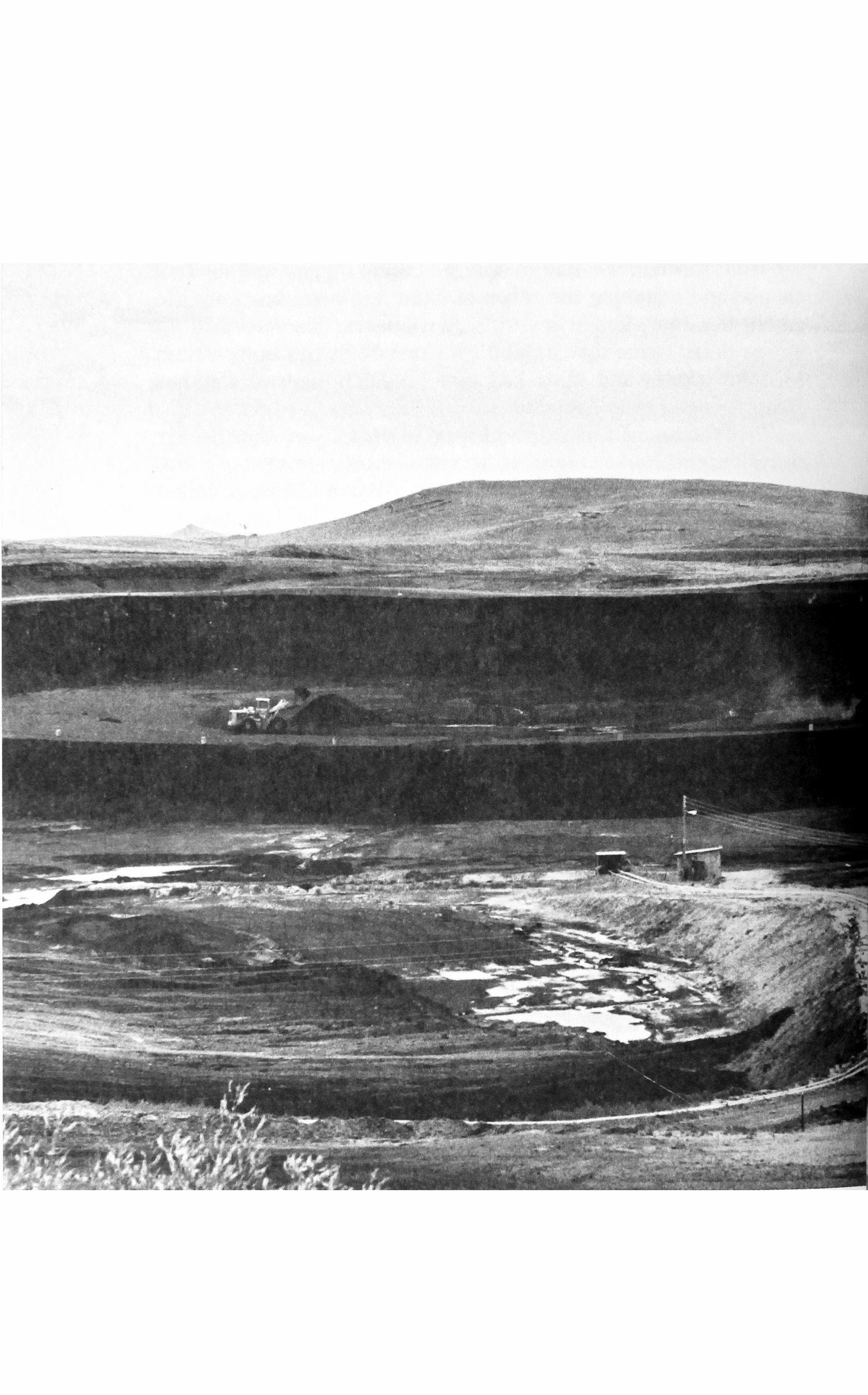

Forty years of unchecked development were coming to a head. Chicanos were almost extinct. Chamisaville was so unbalanced and disoriented, people did not know if they were dreaming or awake. And a host of totally unreal events occurred, indicating that for the moment there was little surface rhyme or reason in the flow ofthings. A small sand cloud, piloted by a confused trade wind, floated over the valley, depositing fine layers of grit. On the day it arrived, a galactic seer, Mojo Shir Bud hit

town, immediately went into a trace atop the Plaza police pillbox that was experimenting with astral projection, freed his soul from his body, forgot how to reel it back in on its silver cord, and keeled over dead as a doornail, becoming the first known case of "death by meditation" in the southwestern United States. Eight hours later, in an entirely different part of town, the town manager, Kenneth Eagleton, almost lost his own life under equally weird circumstances. Early that morning he had treated his head with a "dry look" hair spray. Around noon, when he lit a cigar after dining in the La Tortuga with a lawyer, Peter Moose, and the mayor, his hair exploded into flames, and only some fast moves by the mayor, who doused him with a pitcher of dry martinis, saved the town manager's life. Hardly had Kenneth recovered than insult was added to injury when a lanky freak wearing a red cape and a chartreuse ski mask walked into his office and nailed him in the kisser with a lemon meringue pie.
Immediately a rash of pie deliveries occurred.
Mayor Mel "Sonny" Christiansen was leaning against a bulldozer drinking a Coors despite the boycott when he almost suffocated inside a gooey pineapple concoction that came out of nowhere. Bob Moose (the elder) was playing tennis in his backyard when a chubby figure wearing a Superman costume waddled clumsily onto the court and, aiming for the crusty lawyer's startled face, plastered him instead in the chest with a cherry pie. Then this spastic apparition cantered blindly into the net, fell backward, scrambled on all fours offthe court, and, tattered cape flapping, disappeared into some shocked hydrangeas blooming beside Bob's mansion. After that, the town moneybags, Mr. Joseph Bonatelli himself, during a First State Bank board meeting, received his just dessert. A small skylight directly overhead popped open, and the old bastard looked up just in time to get hit flush in the face with an enormous banana cream concoction, whose thick custard, driven on impact down his throat, through his stomach, and into his duodenum, almost choked him to death.
The electric co-op' s tottering prexy, octogenarian Randolph Bonney, swore that the mince pie practically shoved up his nose came out of the telephone when he groggily answered it at three A.M. And the hospital's new surgical whiz, Ed Diebold,
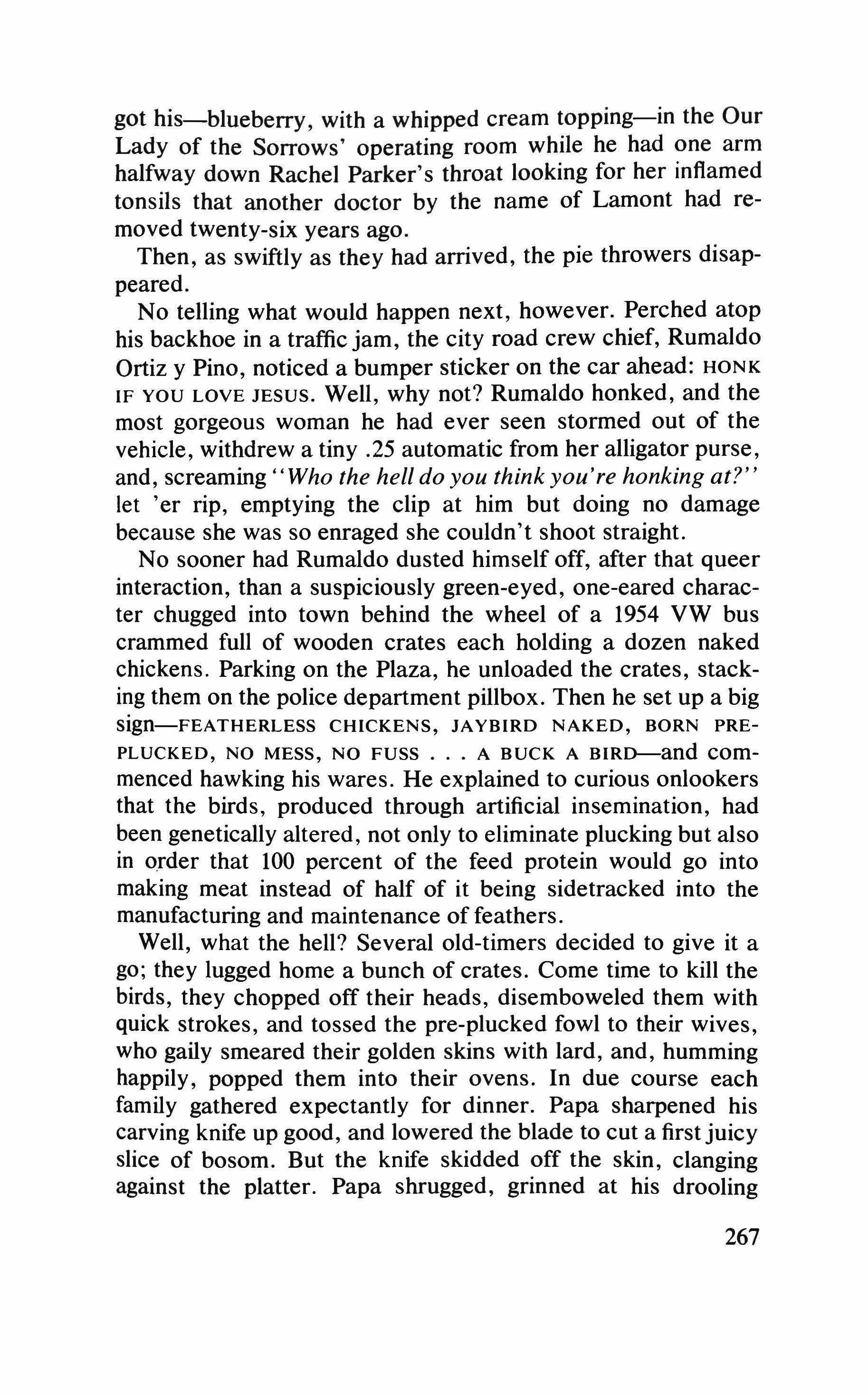
got his-blueberry, with a whipped cream topping-in the Our Lady of the Sorrows' operating room while he had one arm halfway down Rachel Parker's throat looking for her inflamed tonsils that another doctor by the name of Lamont had removed twenty-six years ago.
Then, as swiftly as they had arrived, the pie throwers disappeared.
No telling what would happen next, however. Perched atop his backhoe in a traffic jam, the city road crew chief, Rumaldo Ortiz y Pino, noticed a bumper sticker on the car ahead: HONK IF YOU LOVE JESUS. Well, why not? Rumaldo honked, and the most gorgeous woman he had ever seen stormed out of the vehicle, withdrew a tiny .25 automatic from her alligator purse, and, screaming "Who the hell do you think you're honking at?" let 'er rip, emptying the clip at him but doing no damage because she was so enraged she couldn't shoot straight.
No sooner had Rumaldo dusted himself off, after that queer interaction, than a suspiciously green-eyed, one-eared character chugged into town behind the wheel of a 1954 VW bus crammed full of wooden crates each holding a dozen naked chickens. Parking on the Plaza, he unloaded the crates, stacking them on the police department pillbox. Then he set up a big sign-FEATHERLESS CHICKENS, JAYBIRD NAKED, BORN PREPLUCKED, NO MESS, NO FUSS A BUCK A BIRD-and commenced hawking his wares. He explained to curious onlookers that the birds, produced through artificial insemination, had been genetically altered, not only to eliminate plucking but also in order that 100 percent of the feed protein would go into making meat instead of half of it being sidetracked into the manufacturing and maintenance of feathers.
Well, what the hell? Several old-timers decided to give it a go; they lugged home a bunch of crates. Come time to kill the birds, they chopped off their heads, disemboweled them with quick strokes, and tossed the pre-plucked fowl to their wives, who gaily smeared their golden skins with lard, and, humming happily, popped them into their ovens. In due course each family gathered expectantly for dinner. Papa sharpened his carving knife up good, and lowered the blade to cut a first juicy slice of bosom. But the knife skidded off the skin, clanging against the platter. Papa shrugged, grinned at his drooling
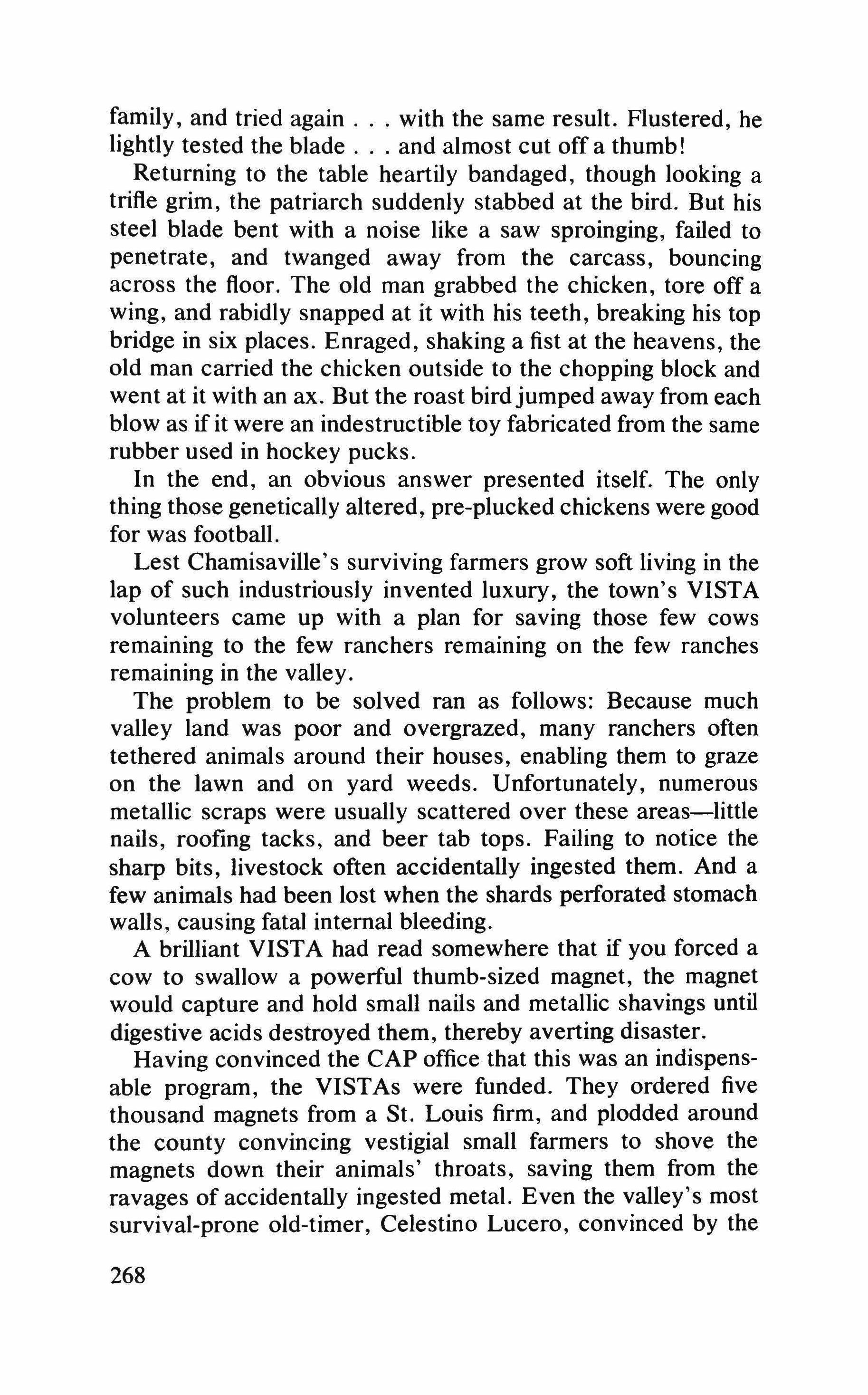
family, and tried again with the same result. Flustered, he lightly tested the blade and almost cut off a thumb!
Returning to the table heartily bandaged, though looking a trifle grim, the patriarch suddenly stabbed at the bird. But his steel blade bent with a noise like a saw sproinging, failed to penetrate, and twanged away from the carcass, bouncing across the floor. The old man grabbed the chicken, tore off a wing, and rabidly snapped at it with his teeth, breaking his top bridge in six places. Enraged, shaking a fist at the heavens, the old man carried the chicken outside to the chopping block and went at it with an ax. But the roast birdjumped away from each blow as if it were an indestructible toy fabricated from the same rubber used in hockey pucks.
In the end, an obvious answer presented itself. The only thing those genetically altered, pre-plucked chickens were good for was football.
Lest Chamisaville's surviving farmers grow soft living in the lap of such industriously invented luxury, the town' s VISTA volunteers came up with a plan for saving those few cows remaining to the few ranchers remaining on the few ranches remaining in the valley.
The problem to be solved ran as follows: Because much valley land was poor and overgrazed, many ranchers often tethered animals around their houses, enabling them to graze on the lawn and on yard weeds. Unfortunately, numerous metallic scraps were usually scattered over these areas-little nails, roofing tacks, and beer tab tops. Failing to notice the sharp bits, livestock often accidentally ingested them. And a few animals had been lost when the shards perforated stomach walls, causing fatal internal bleeding.
A brilliant VISTA had read somewhere that if you forced a cow to swallow a powerful thumb-sized magnet, the magnet would capture and hold small nails and metallic shavings until digestive acids destroyed them, thereby averting disaster.
Having convinced the CAP office that this was an indispensable program, the VISTAs were funded. They ordered five thousand magnets from a St. Louis firm, and plodded around the county convincing vestigial small farmers to shove the magnets down their animals' throats, saving them from the ravages of accidentally ingested metal. Even the valley's most survival-prone old-timer, Celestino Lucero, convinced by the
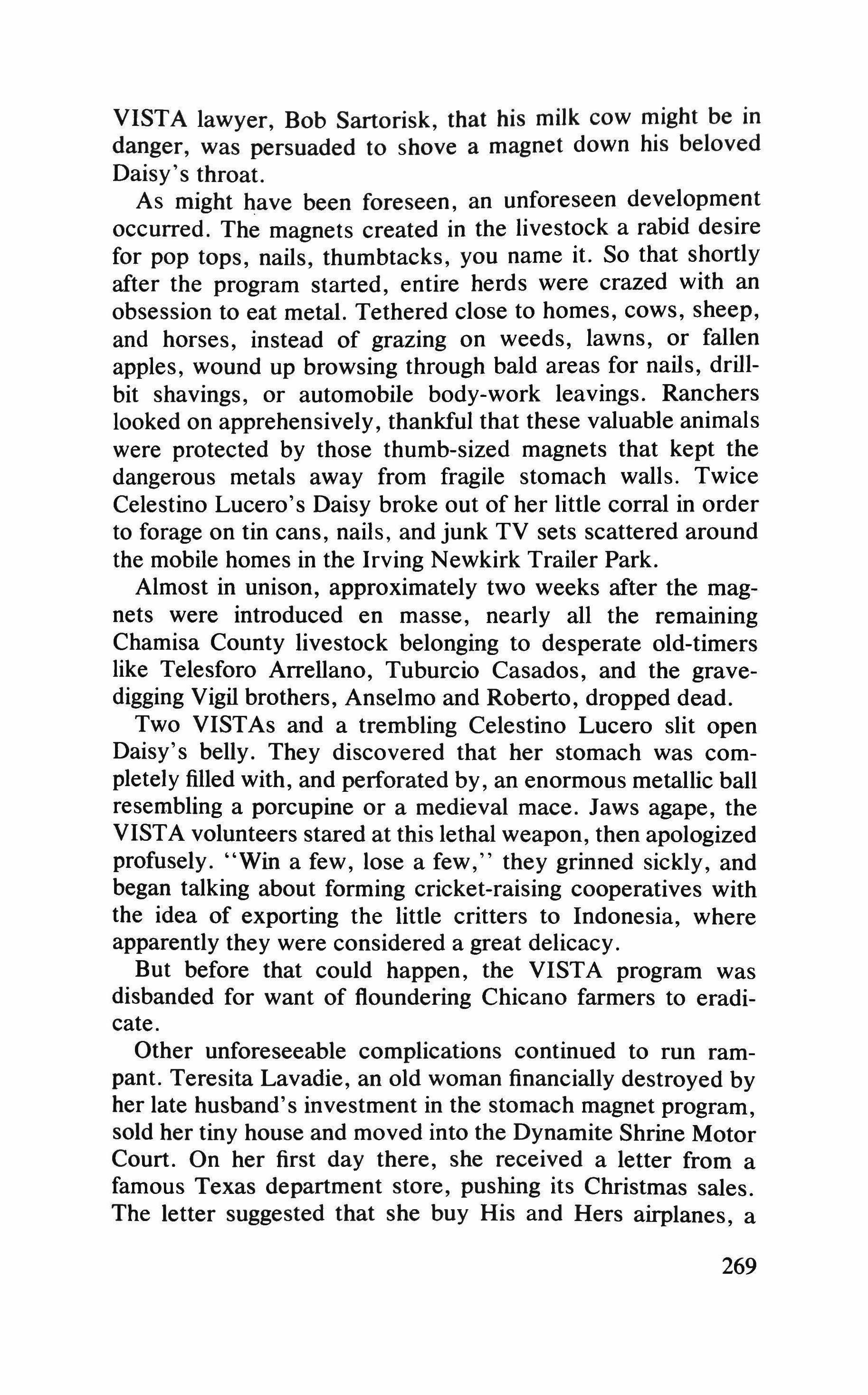
VISTA lawyer, Bob Sartorisk, that his milk cow might be in danger, was persuaded to shove a magnet down his beloved Daisy's throat.
As might have been foreseen, an unforeseen development occurred. The magnets created in the livestock a rabid desire for pop tops, nails, thumbtacks, you name it. So that shortly after the program started, entire herds were crazed with an obsession to eat metal. Tethered close to homes, cows, sheep, and horses, instead of grazing on weeds, lawns, or fallen apples, wound up browsing through bald areas for nails, drillbit shavings, or automobile body-work leavings. Ranchers looked on apprehensively, thankful that these valuable animals were protected by those thumb-sized magnets that kept the dangerous metals away from fragile stomach walls. Twice Celestino Lucero's Daisy broke out of her little corral in order to forage on tin cans, nails, and junk TV sets scattered around the mobile homes in the Irving Newkirk Trailer Park.
Almost in unison, approximately two weeks after the magnets were introduced en masse, nearly all the remaining Chamisa County livestock belonging to desperate old-timers like Telesforo Arrellano, Tuburcio Casados, and the gravedigging Vigil brothers, Anselmo and Roberto, dropped dead.
Two VISTAs and a trembling Celestino Lucero slit open Daisy's belly. They discovered that her stomach was completely filled with, and perforated by, an enormous metallic ball resembling a porcupine or a medieval mace. Jaws agape, the VISTA volunteers stared at this lethal weapon, then apologized profusely. "Win a few, lose a few," they grinned sickly, and began talking about forming cricket-raising cooperatives with the idea of exporting the little critters to Indonesia, where apparently they were considered a great delicacy.
But before that could happen, the VISTA program was disbanded for want of floundering Chicano farmers to eradicate.
Other unforeseeable complications continued to run rampant. Teresita Lavadie, an old woman financially destroyed by her late husband's investment in the stomach magnet program, sold her tiny house and moved into the Dynamite Shrine Motor Court. On her first day there, she received a letter from a famous Texas department store, pushing its Christmas sales. The letter suggested that she buy His and Hers airplanes, a
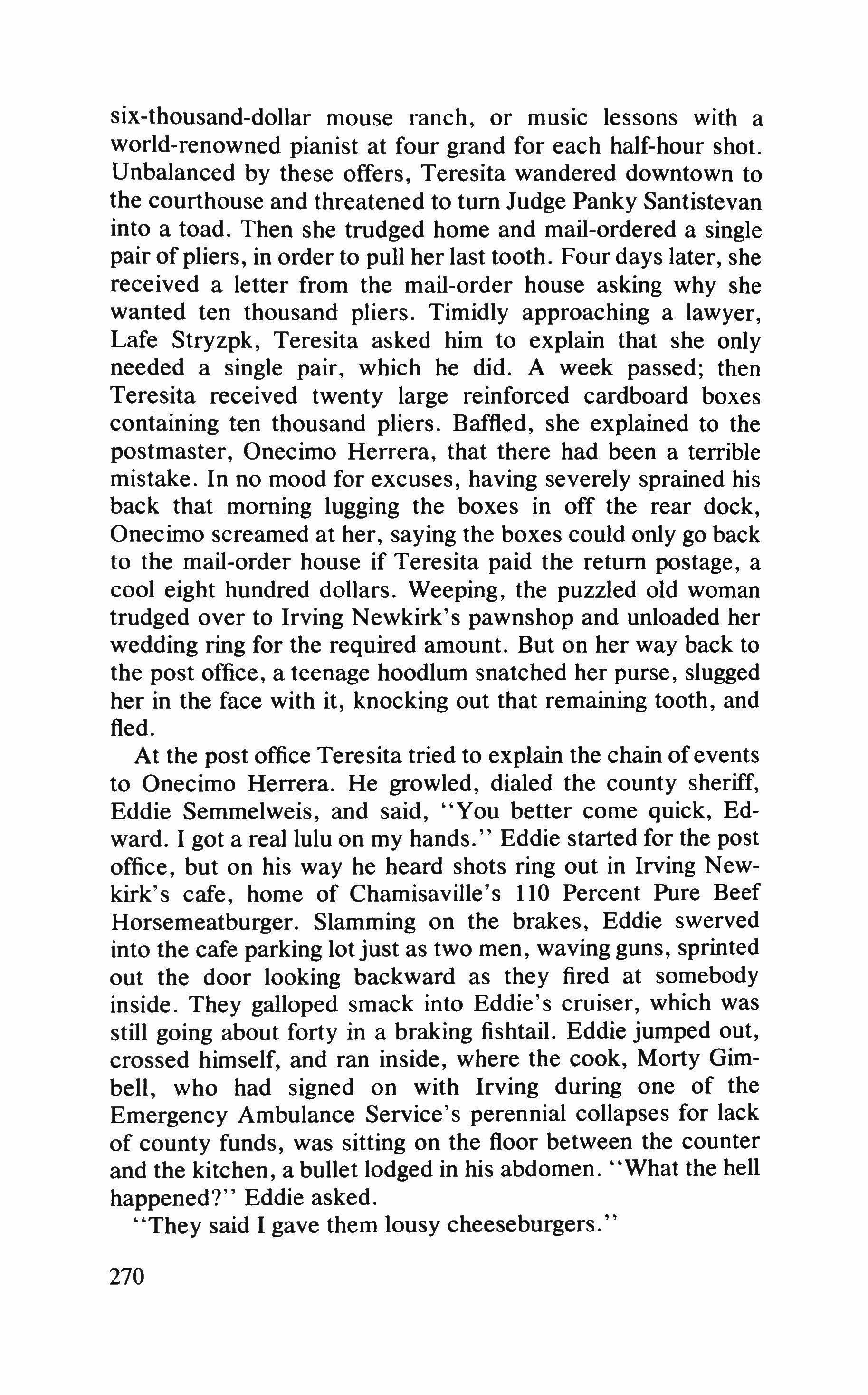
six-thousand-dollar mouse ranch, or music lessons with a world-renowned pianist at four grand for each half-hour shot. Unbalanced by these offers, Teresita wandered downtown to the courthouse and threatened to tum Judge Panky Santistevan into a toad. Then she trudged home and mail-ordered a single pair of pliers, in order to pull her last tooth. Four days later, she received a letter from the mail-order house asking why she wanted ten thousand pliers. Timidly approaching a lawyer, Lafe Stryzpk, Teresita asked him to explain that she only needed a single pair, which he did. A week passed; then Teresita received twenty large reinforced cardboard boxes containing ten thousand pliers. Baffled, she explained to the postmaster, Onecimo Herrera, that there had been a terrible mistake. In no mood for excuses, having severely sprained his back that morning lugging the boxes in off the rear dock, Onecimo screamed at her, saying the boxes could only go back to the mail-order house if Teresita paid the return postage, a cool eight hundred dollars. Weeping, the puzzled old woman trudged over to Irving Newkirk's pawnshop and unloaded her wedding ring for the required amount. But on her way back to the post office, a teenage hoodlum snatched her purse, slugged her in the face with it, knocking out that remaining tooth, and fled.
At the post office Teresita tried to explain the chain of events to Onecimo Herrera. He growled, dialed the county sheriff, Eddie Semmelweis, and said, "You better come quick, Edward. I got a real lulu on my hands." Eddie started for the post office, but on his way he heard shots ring out in Irving Newkirk's cafe, home of Chamisaville's 110 Percent Pure Beef Horsemeatburger. Slamming on the brakes, Eddie swerved into the cafe parking lot just as two men, waving guns, sprinted out the door looking backward as they fired at somebody inside. They galloped smack into Eddie's cruiser, which was still going about forty in a braking fishtail. Eddie jumped out, crossed himself, and ran inside, where the cook, Morty Gimbell, who had signed on with Irving during one of the Emergency Ambulance Service's perennial collapses for lack of county funds, was sitting on the floor between the counter and the kitchen, a bullet lodged in his abdomen. "What the hell happened?" Eddie asked.
"They said I gave them lousy cheeseburgers."
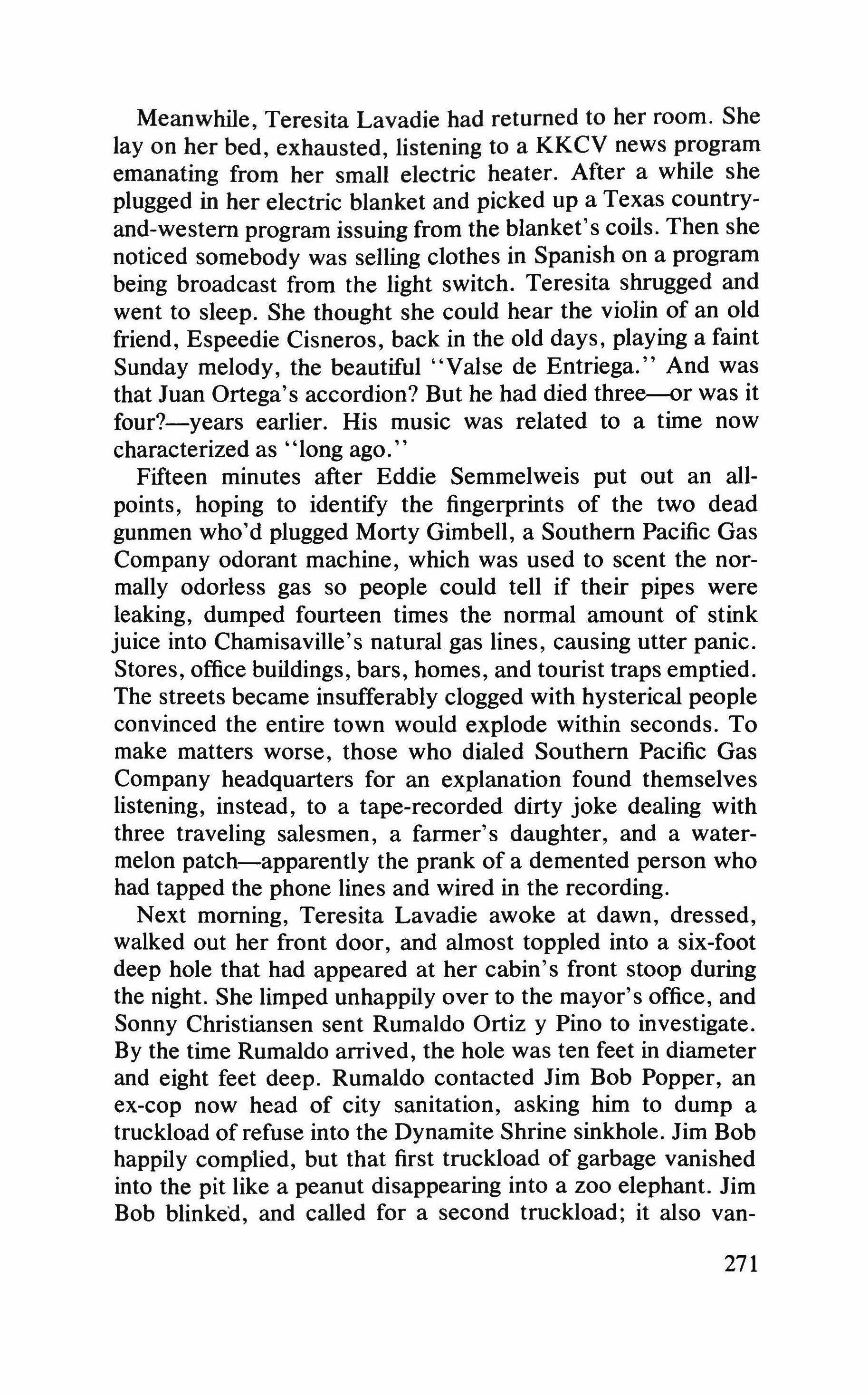
Meanwhile, Teresita Lavadie had returned to her room. She lay on her bed, exhausted, listening to a KKCV news program emanating from her small electric heater. After a while she plugged in her electric blanket and picked up a Texas countryand-western program issuing from the blanket's coils. Then she noticed somebody was selling clothes in Spanish on a program being broadcast from the light switch. Teresita shrugged and went to sleep. She thought she could hear the violin of an old friend, Espeedie Cisneros, back in the old days, playing a faint Sunday melody, the beautiful "Valse de Entriega." And was that Juan Ortega's accordion? But he had died three--or was it four?-years earlier. His music was related to a time now characterized as "long ago."
Fifteen minutes after Eddie Semmelweis put out an allpoints, hoping to identify the fingerprints of the two dead gunmen who'd plugged Morty Gimbell, a Southern Pacific Gas Company odorant machine, which was used to scent the normally odorless gas so people could tell if their pipes were leaking, dumped fourteen times the normal amount of stink juice into Chamisaville's natural gas lines, causing utter panic. Stores, office buildings, bars, homes, and tourist traps emptied. The streets became insufferably clogged with hysterical people convinced the entire town would explode within seconds. To make matters worse, those who dialed Southern Pacific Gas Company headquarters for an explanation found themselves listening, instead, to a tape-recorded dirty joke dealing with three traveling salesmen, a farmer's daughter, and a watermelon patch-apparently the prank of a demented person who had tapped the phone lines and wired in the recording.
Next morning, Teresita Lavadie awoke at dawn, dressed, walked out her front door, and almost toppled into a six-foot deep hole that had appeared at her cabin's front stoop during the night. She limped unhappily over to the mayor's office, and Sonny Christiansen sent Rumaldo Ortiz y Pino to investigate. By the time Rumaldo arrived, the hole was ten feet in diameter and eight feet deep. Rumaldo contacted Jim Bob Popper, an ex-cop now head of city sanitation, asking him to dump a truckload of refuse into the Dynamite Shrine sinkhole. Jim Bob happily complied, but that first truckload of garbage vanished into the pit like a peanut disappearing into a zoo elephant. Jim Bob blinked, and called for a second truckload; it also van-
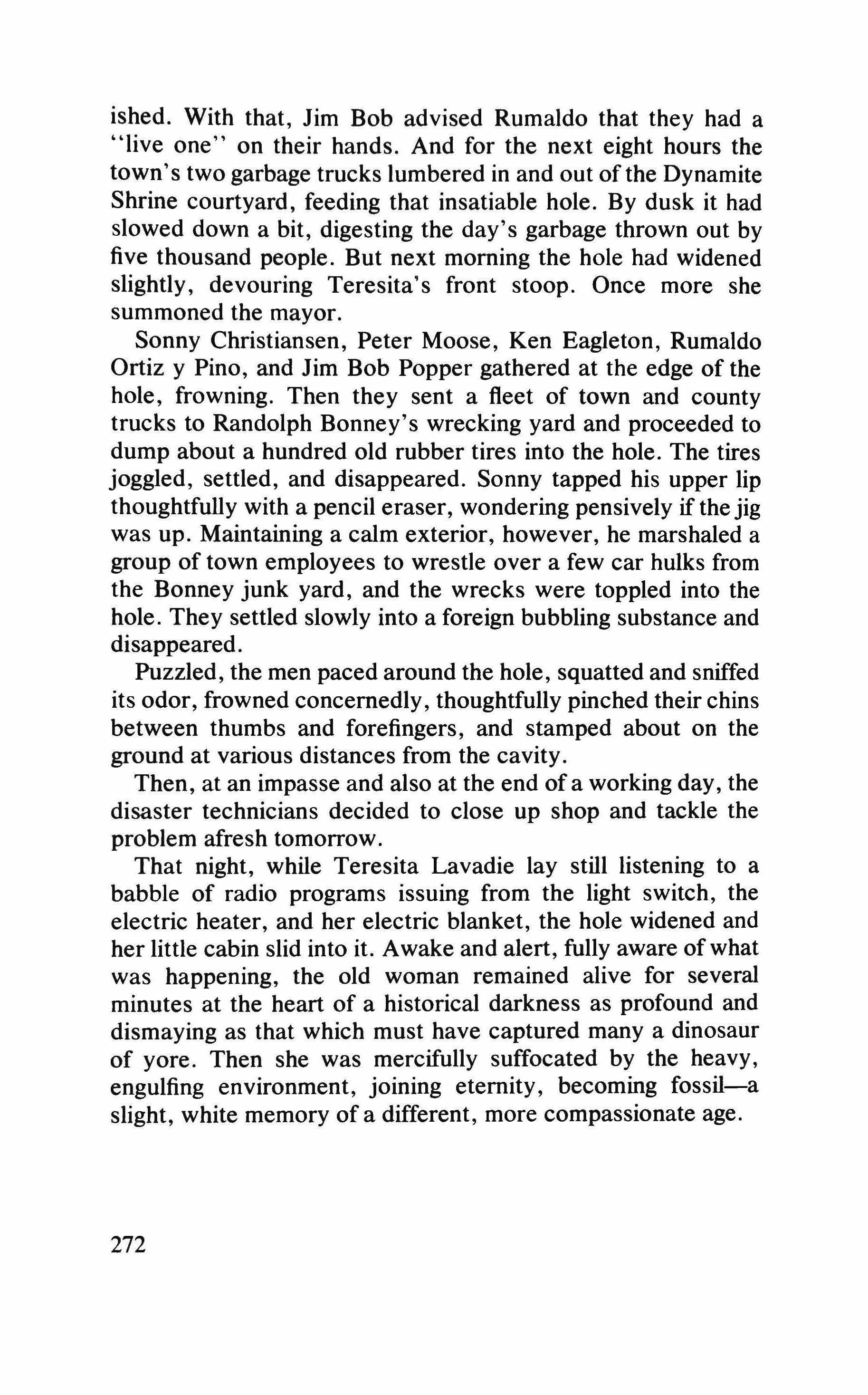
ished. With that, Jim Bob advised Rumaldo that they had a "live one" on their hands. And for the next eight hours the town's two garbage trucks lumbered in and out of the Dynamite Shrine courtyard, feeding that insatiable hole. By dusk it had slowed down a bit, digesting the day's garbage thrown out by five thousand people. But next morning the hole had widened slightly, devouring Teresita's front stoop. Once more she summoned the mayor.
Sonny Christiansen, Peter Moose, Ken Eagleton, Rumaldo Ortiz y Pino, and Jim Bob Popper gathered at the edge of the hole, frowning. Then they sent a fleet of town and county trucks to Randolph Bonney's wrecking yard and proceeded to dump about a hundred old rubber tires into the hole. The tires joggled, settled, and disappeared. Sonny tapped his upper lip thoughtfully with a pencil eraser, wondering pensively if the jig was up. Maintaining a calm exterior, however, he marshaled a group of town employees to wrestle over a few car hulks from the Bonney junk yard, and the wrecks were toppled into the hole. They settled slowly into a foreign bubbling substance and disappeared.
Puzzled, the men paced around the hole, squatted and sniffed its odor, frowned concernedly, thoughtfully pinched their chins between thumbs and forefingers, and stamped about on the ground at various distances from the cavity.
Then, at an impasse and also at the end of a working day, the disaster technicians decided to close up shop and tackle the problem afresh tomorrow.
That night, while Teresita Lavadie lay still listening to a babble of radio programs issuing from the light switch, the electric heater, and her electric blanket, the hole widened and her little cabin slid into it. Awake and alert, fully aware of what was happening, the old woman remained alive for several minutes at the heart of a historical darkness as profound and dismaying as that which must have captured many a dinosaur of yore. Then she was mercifully suffocated by the heavy, engulfing environment, joining eternity, becoming fossil-a slight, white memory of a different, more compassionate age.

Two men sit on a rock half-
way up the slope of a desert mountain. Sundown: the air is still, caught in the pause between the heat of day and the cool of evening. Doves call in the twilight, testing the tentative peace. Down slope from the men a rattlesnake slides out of its dark den, scales hissing over stone, the yellow eyes glowing with hunger=death in its glance.
The men are roasting the remains of a small mammal-too small for goat, too large for rabbit-on a bed of mesquite coals. Their horses stumble nearby, hobbled by the forelegs, browsing on thorny acacia, prickly pear, burr sage. The feed is scanty here and the horses look ganted and weary; like the men, they have come a long way.
One man pokes at the fire with a stick and turns the meat over. "How do you want it, boss?"
The other man, staring at something far in the west, does not immediately reply. His gaze is fixed on the fires of a burning city, where towers of dark glass stand in smoke and dust against the yellow sky of sunset. "What's that?" he says.
Photograph by G. Richard Sato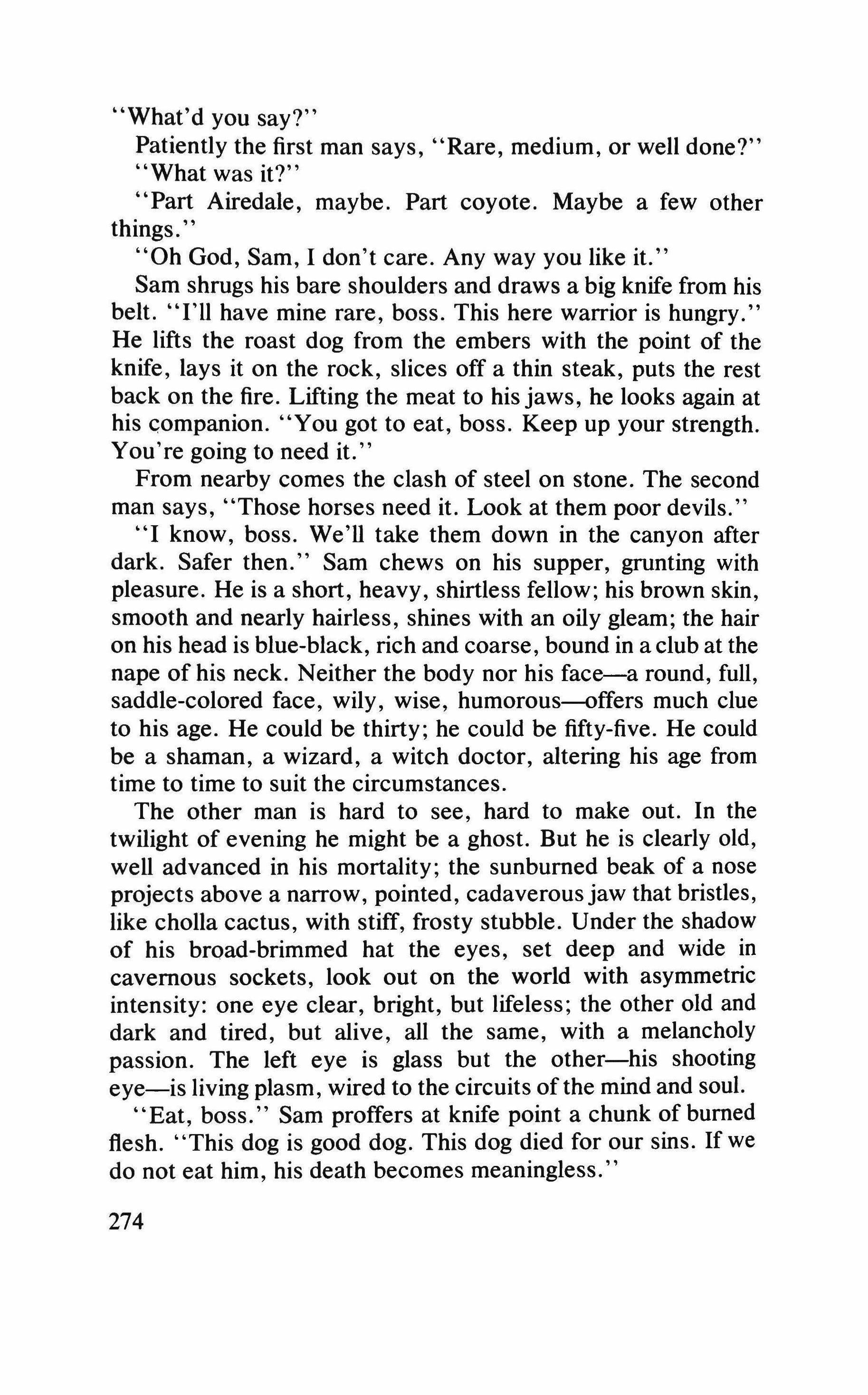
"What'd you say?"
Patiently the first man says, "Rare, medium, or well done?"
"What was it?"
"Part Airedale, maybe. Part coyote. Maybe a few other things.
"Oh God, Sam, I don't care. Any way you like it."
Sam shrugs his bare shoulders and draws a big knife from his belt. "I'll have mine rare, boss. This here warrior is hungry." He lifts the roast dog from the embers with the point of the knife, lays it on the rock, slices off a thin steak, puts the rest back on the fire. Lifting the meat to his jaws, he looks again at his companion. "You got to eat, boss. Keep up your strength. You're going to need it. '
From nearby comes the clash of steel on stone. The second man says, "Those horses need it. Look at them poor devils."
"I know, boss. We'll take them down in the canyon after dark. Safer then." Sam chews on his supper, grunting with pleasure. He is a short, heavy, shirtless fellow; his brown skin, smooth and nearly hairless, shines with an oily gleam; the hair on his head is blue-black, rich and coarse, bound in a club at the nape of his neck. Neither the body nor his face-a round, full, saddle-colored face, wily, wise, humorous-offers much clue to his age. He could be thirty; he could be fifty-five. He could be a shaman, a wizard, a witch doctor, altering his age from time to time to suit the circumstances.
The other man is hard to see, hard to make out. In the twilight of evening he might be a ghost. But he is clearly old, well advanced in his mortality; the sunburned beak of a nose projects above a narrow, pointed, cadaverous jaw that bristles, like cholla cactus, with stiff, frosty stubble. Under the shadow of his broad-brimmed hat the eyes, set deep and wide in cavernous sockets, look out on the world with asymmetric intensity: one eye clear, bright, but lifeless; the other old and dark and tired, but alive, all the same, with a melancholy passion. The left eye is glass but the other-his shooting eye-is living plasm, wired to the circuits of the mind and soul.
"Eat, boss." Sam proffers at knife point a chunk of burned flesh. "This dog is good dog. This dog died for our sins. If we do not eat him, his death becomes meaningless.

"Ain't really hungry, Sam."
"You think too much, boss. Thinking is good but one must not think too much. You are very thin-turned sideways I can hardly see you. Look at me."
"No. The old man stares at the sunset, the burning city, the phantoms of memory. "And you don't need to call me boss any more."
"What shall I call you?"
"You know my name. We're partners now. You come as far as you had to. "
"Look at me."
"No. "
"Look at me, Jack Burns. Look at my hands."
"Oh, Christ." Reluctantly the old man turns toward the Indian. "No more of your goddamn tricks, Sam. I ain't in the mood."
"Watch. See this knife?" Sam waves the greasy, glittering naked blade back and forth slowly, with the weaving motion of a snake at bay. "Now watch closely, boss." The blade glitters, flashes; there is a hissing noise, a sudden rasping vibration, and where the knife had been a rattlesnake appears, its body draped over Sam's shoulder, tail a whirring blur, the spade-shaped head gliding forward over Sam's half-open right hand, toward Burns.
The old man lurches to his feet. "Goddamn it, Sam, don't do that. Jesus Christ
"Don't be afraid." Sam strokes the snake with his left hand, murmurs a few words in a Tewa dialect. The buzzing stops, the serpent peers at Burns with half-lidded eyes, black tongue out and sensing the air. "This is our friend, boss. Some day this snake will save our lives. Touch him."
"What?"
"Touch him. Stroke his head."
"Come on, Sam. I know a rattlesnake when I see one. I know I'm crazy, but I ain't that crazy."
"Are you sure?" Smiling, Sam speaks in Tewa to the snake. Then to Burns: "Hold your hand toward him, flat up."
"He won't strike?"
"He will not strike."
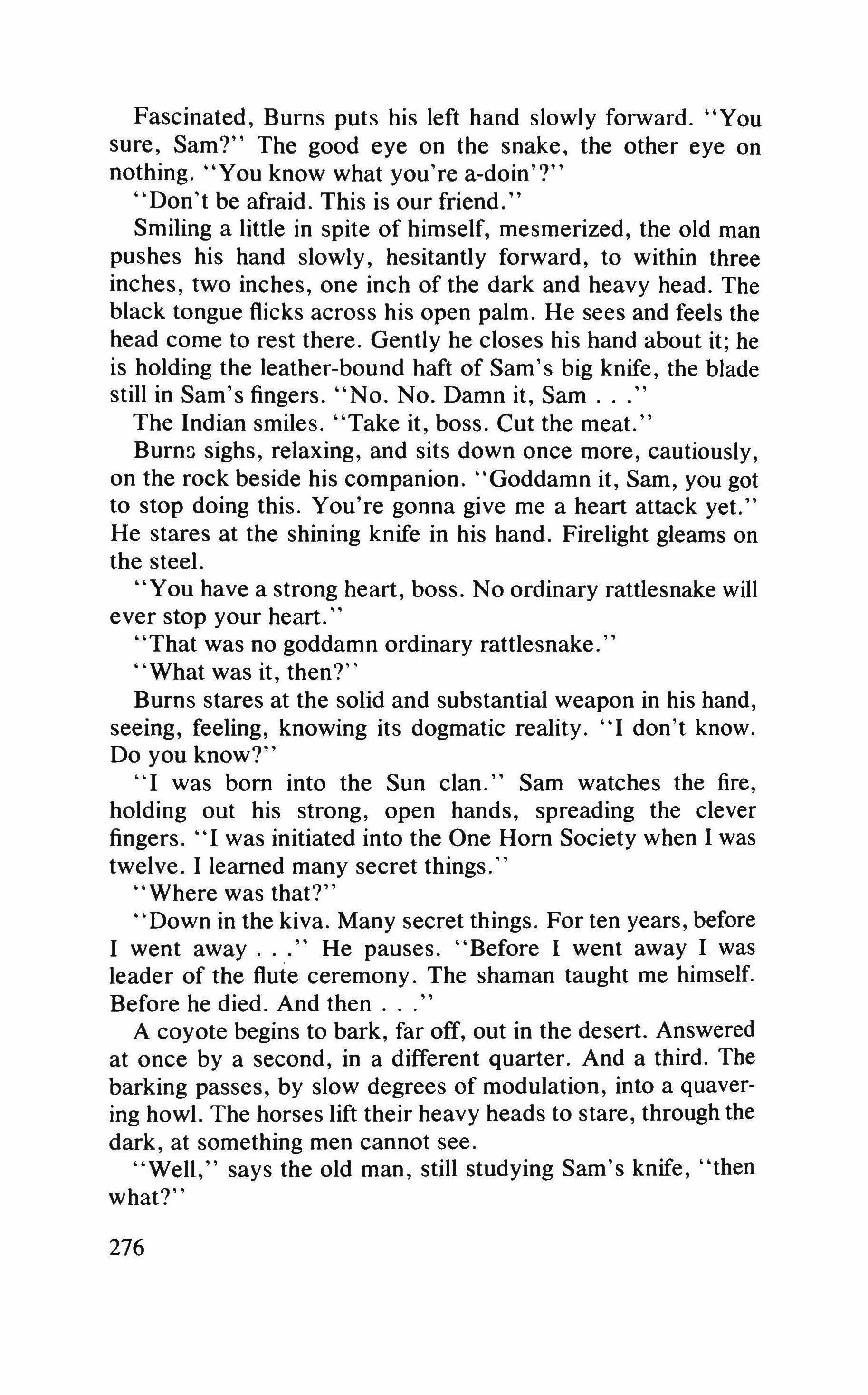
Fascinated, Burns puts his left hand slowly forward. "You sure, Sam?" The good eye on the snake, the other eye on nothing. "You know what you're a-doin'?"
"Don't be afraid. This is our friend."
Smiling a little in spite of himself, mesmerized, the old man pushes his hand slowly, hesitantly forward, to within three inches, two inches, one inch of the dark and heavy head. The black tongue flicks across his open palm. He sees and feels the head come to rest there. Gently he closes his hand about it; he is holding the leather-bound haft of Sam's big knife, the blade still in Sam's fingers. "No. No. Damn it, Sam
The Indian smiles. "Take it, boss. Cut the meat."
Burns sighs, relaxing, and sits down once more, cautiously, on the rock beside his companion. "Goddamn it, Sam, you got to stop doing this. You're gonna give me a heart attack yet." He stares at the shining knife in his hand. Firelight gleams on the steel.
"You have a strong heart, boss. No ordinary rattlesnake will ever stop your heart.
"That was no goddamn ordinary rattlesnake."
"What was it, then?"
Burns stares at the solid and substantial weapon in his hand, seeing, feeling, knowing its dogmatic reality. "I don't know. Do you know?"
"I was born into the Sun clan." Sam watches the fire, holding out his strong, open hands, spreading the clever fingers. "I was initiated into the One Horn Society when I was twelve. I learned many secret things."
"Where was that?"
"Down in the kiva. Many secret things. For ten years, before I went away He pauses. "Before I went away I was leader of the flute ceremony. The shaman taught me himself. Before he died. And then
A coyote begins to bark, far off, out in the desert. Answered at once by a second, in a different quarter. And a third. The barking passes, by slow degrees of modulation, into a quavering howl. The horses lift their heavy heads to stare, through the dark, at something men cannot see.
"Well," says the old man, still studying Sam's knife, "then what?"

"Eat your supper."
Burns leans forward with the knife, picks up the meat. "You can tell me, Sam. What the hell, we're partners." He carves a hunk off the blackened roast of dog. "How'd you do it?"
"Trade secret, boss. You tell me something."
"Call me Jack, damn it."
"You tell me something, Jack."
"Yeah?"
The Indian points toward the smoldering city, the scatter of fires and lights spread across ten miles of the horizon. "How do you think we're going to find him? In that dying mess? All those frightened people? You don't even know what he looks like now."
"I know his name." Burns chews slowly and grudgingly, with little appetite, on the unsalted meat. "I'll know him when I see him."
"You think so? You last saw him twenty years ago. How old was he then?"
"Rrrmmm The lean jaws make a clicking sound as the old man eats; he readjusts his loose bridgework.' "How old was he? Hah " Staring at the embers of the fire, Burns smiles. He draws an ancient wallet from his hip pocket, opens to a picture under cracked celluloid. Smiling, he contemplates the faded image of a solemn, towheaded, handsome boy of ten or twelve. "Good-lookin' devil, just like his daddy. We'll know him when we see him, Sam. No doubt about that."
"How do you know he's even there? In the city?"
His smile fading, the old man puts away the picture. "You touch on a tender spot, partner. We don't know. All I know is he was there four years ago when I got that last letter. The last letter anybody got, I reckon. If he ain't there any more, then I don't know where to look. We'll ride on to California. I'll find the little bastard somewheres."
"How do you know California is still there? How do you know he'll know you? Or want to?"
"All right, Sam." Burns frowns at his big, powerful, interlocked hands. "You sure know where the fear is, all right. Don't you, you son ofa bitch? I don't know."
"Who wrote that last letter?"
The old man does not answer.
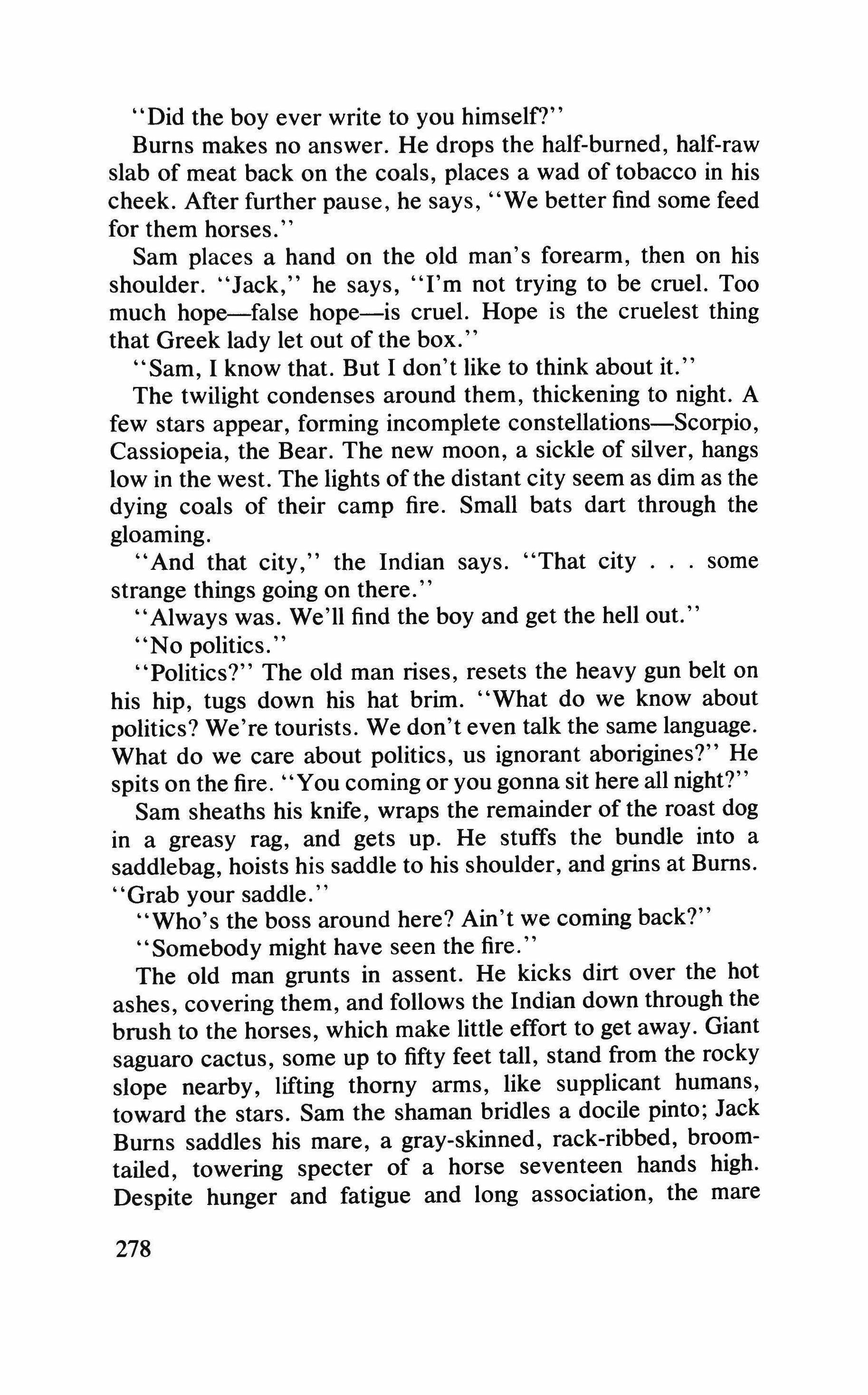
"Did the boy ever write to you himself?"
Burns makes no answer. He drops the half-burned, half-raw slab of meat back on the coals, places a wad of tobacco in his cheek. After further pause, he says, "We better find some feed for them horses."
Sam places a hand on the old man's forearm, then on his shoulder. "Jack," he says, ''I'm not trying to be cruel. Too much hope-false hope-is cruel. Hope is the cruelest thing that Greek lady let out of the box."
"Sam, I know that. But I don't like to think about it."
The twilight condenses around them, thickening to night. A few stars appear, forming incomplete constellations-Scorpio, Cassiopeia, the Bear. The new moon, a sickle of silver, hangs low in the west. The lights of the distant city seem as dim as the dying coals of their camp fire. Small bats dart through the gloaming.
"And that city," the Indian says. "That city some strange things going on there."
"Always was. We'll find the boy and get the hell out."
"No politics."
"Politics?" The old man rises, resets the heavy gun belt on his hip, tugs down his hat brim. "What do we know about politics? We're tourists. We don't even talk the same language. What do we care about politics, us ignorant aborigines?" He spits on the fire • You coming or you gonna sit here all night?"
Sam sheaths his knife, wraps the remainder of the roast dog in a greasy rag, and gets up. He stuffs the bundle into a saddlebag, hoists his saddle to his shoulder, and grins at Burns. "Grab your saddle."
"Who's the boss around here? Ain't we coming back?"
"Somebody might have seen the fire."
The old man grunts in assent. He kicks dirt over the hot ashes, covering them, and follows the Indian down through the brush to the horses, which make little effort to get away. Giant saguaro cactus, some up to fifty feet tall, stand from the rocky slope nearby, lifting thorny arms, like supplicant humans, toward the stars. Sam the shaman bridles a docile pinto; Jack Burns saddles his mare, a gray-skinned, rack-ribbed, broomtailed, towering specter of a horse seventeen hands high. Despite hunger and fatigue and long association, the mare
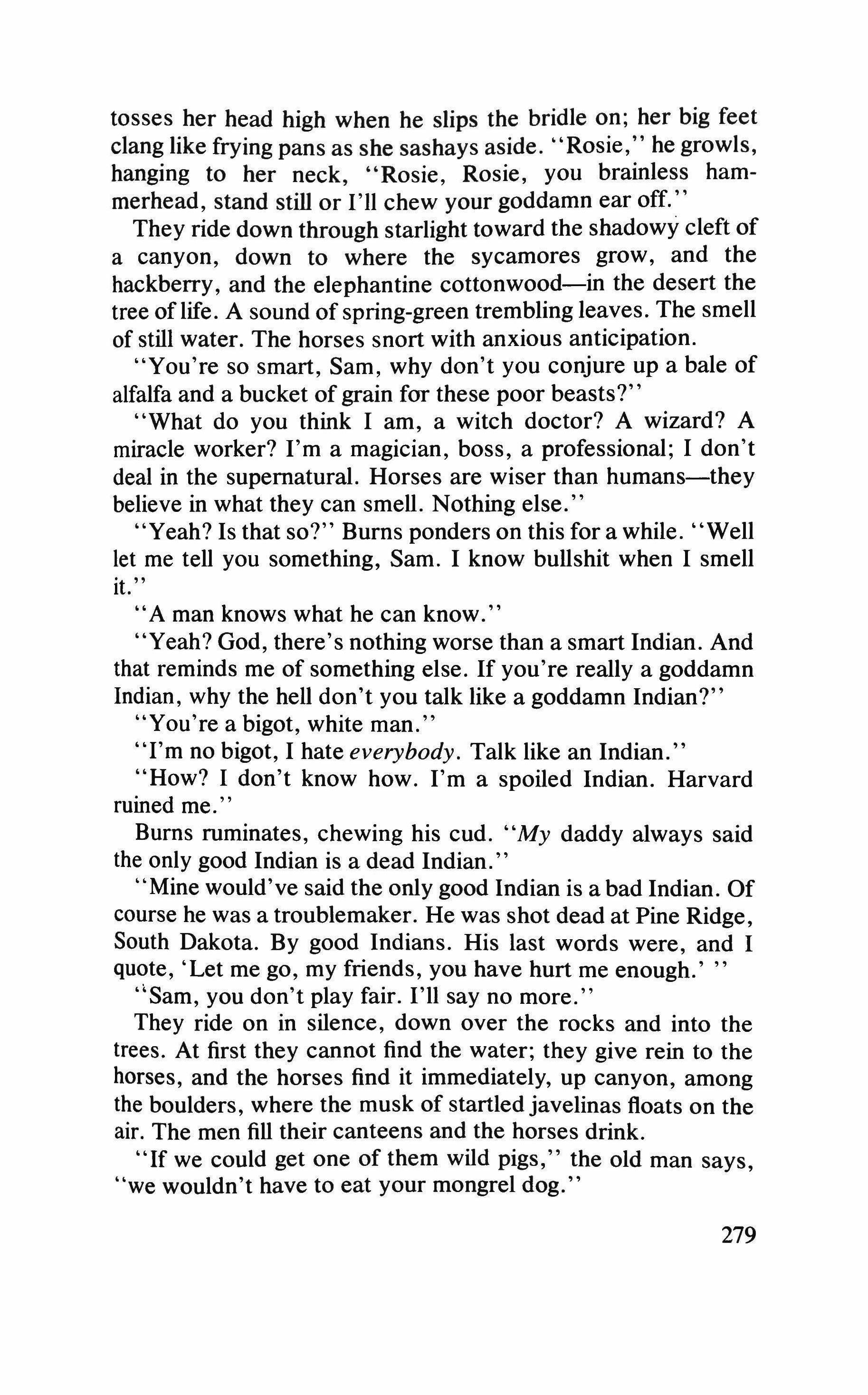
tosses her head high when he slips the bridle on; her big feet clang like frying pans as she sashays aside. "Rosie," he growls, hanging to her neck, "Rosie, Rosie, you brainless hammerhead, stand still or I'll chew your goddamn ear off."
They ride down through starlight toward the shadowy cleft of a canyon, down to where the sycamores grow, and the hackberry, and the elephantine cottonwood-in the desert the tree of life. A sound of spring-green trembling leaves. The smell of still water. The horses snort with anxious anticipation.
"You're so smart, Sam, why don't you conjure up a bale of alfalfa and a bucket of grain for these poor beasts?"
"What do you think I am, a witch doctor? A wizard? A miracle worker? I'm a magician, boss, a professional; I don't deal in the supernatural. Horses are wiser than humans-they believe in what they can smell. Nothing else."
"Yeah? Is that so?" Burns ponders on this for a while. "Well let me tell you something, Sam. I know bullshit when I smell it.
"A man knows what he can know.
"Yeah? God, there's nothing worse than a smart Indian. And that reminds me of something else. If you're really a goddamn Indian, why the hell don't you talk like a goddamn Indian?"
"You're a bigot, white man."
"I'm no bigot, I hate everybody. Talk like an Indian."
"How? I don't know how. I'm a spoiled Indian. Harvard ruined me."
Bums ruminates, chewing his cud. "My daddy always said the only good Indian is a dead Indian."
"Mine would've said the only good Indian is a bad Indian. Of course he was a troublemaker. He was shot dead at Pine Ridge, South Dakota. By good Indians. His last words were, and I quote, 'Let me go, my friends, you have hurt me enough.'
"Sam, you don't play fair. I'll say no more."
They ride on in silence, down over the rocks and into the trees. At first they cannot find the water; they give rein to the horses, and the horses find it immediately, up canyon, among the boulders, where the musk of startled javelinas floats on the air. The men fill their canteens and the horses drink.
"If we could get one of them wild pigs," the old man says, "we wouldn't have to eat your mongrel dog."
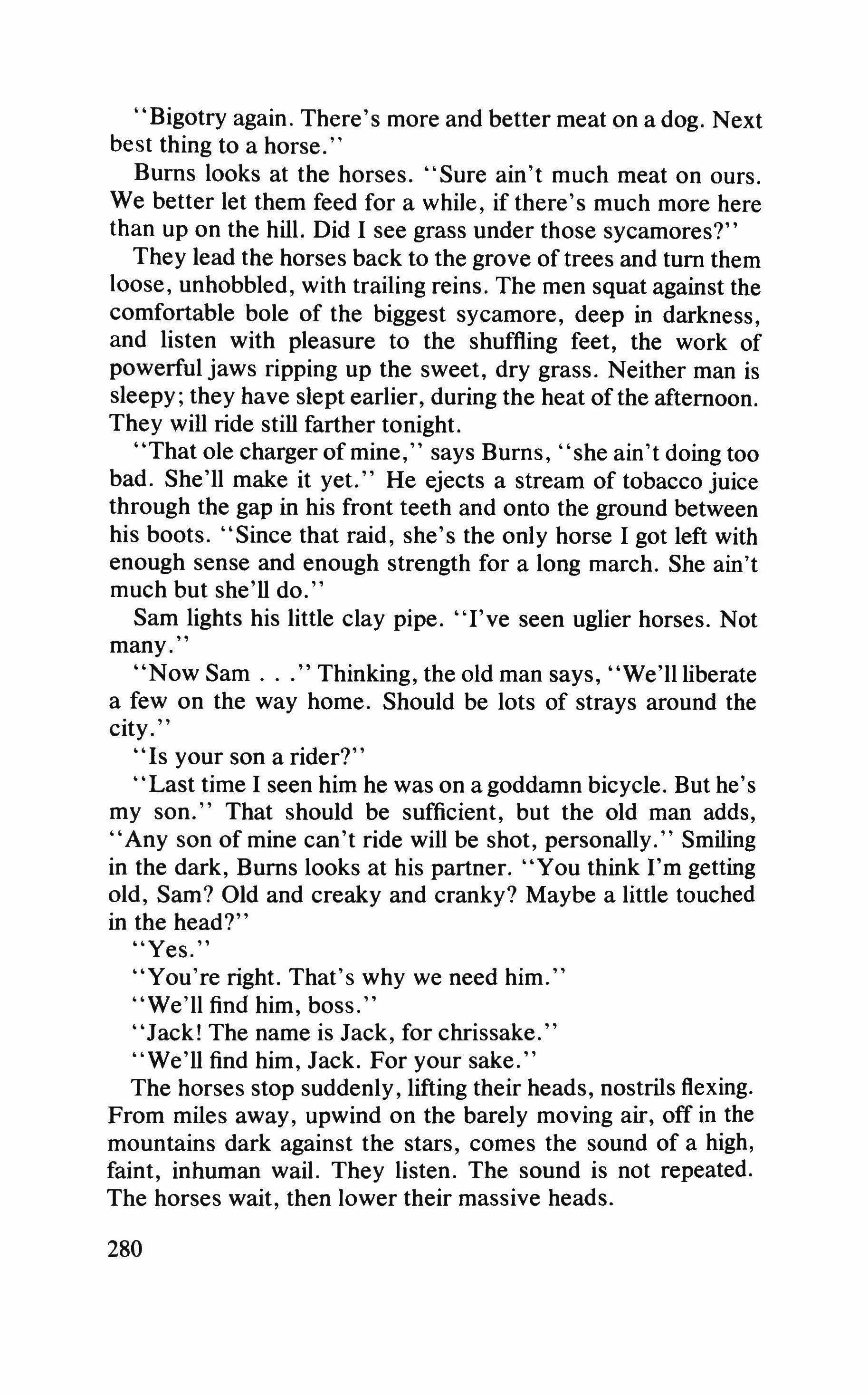
"Bigotry again. There's more and better meat on a dog. Next best thing to a horse."
Burns looks at the horses. "Sure ain't much meat on ours. We better let them feed for a while, if there's much more here than up on the hill. Did I see grass under those sycamores?"
They lead the horses back to the grove of trees and turn them loose, unhobbled, with trailing reins. The men squat against the comfortable bole of the biggest sycamore, deep in darkness, and listen with pleasure to the shuffling feet, the work of powerful jaws ripping up the sweet, dry grass. Neither man is sleepy; they have slept earlier, during the heat of the afternoon. They will ride still farther tonight.
"That ole charger of mine," says Burns, "she ain't doing too bad. She'll make it yet." He ejects a stream of tobacco juice through the gap in his front teeth and onto the ground between his boots. "Since that raid, she's the only horse I got left with enough sense and enough strength for a long march. She ain't much but she'll do."
Sam lights his little clay pipe. "I've seen uglier horses. Not many."
"Now Sam Thinking, the old man says, "We'll liberate a few on the way home. Should be lots of strays around the city.
"Is your son a rider?"
"Last time I seen him he was on a goddamn bicycle. But he's my son." That should be sufficient, but the old man adds, "Any son of mine can't ride will be shot, personally." Smiling in the dark, Bums looks at his partner. "You think I'm getting old, Sam? Old and creaky and cranky? Maybe a little touched in the head?"
"Yes."
"You 're right. That's why we need him.
"We'll find him, boss."
"Jack! The name is Jack, for chrissake."
"We'll find him, Jack. For your sake."
The horses stop suddenly, lifting their heads, nostrils flexing. From miles away, upwind on the barely moving air, off in the mountains dark against the stars, comes the sound of a high, faint, inhuman wail. They listen. The sound is not repeated. The horses wait, then lower their massive heads.
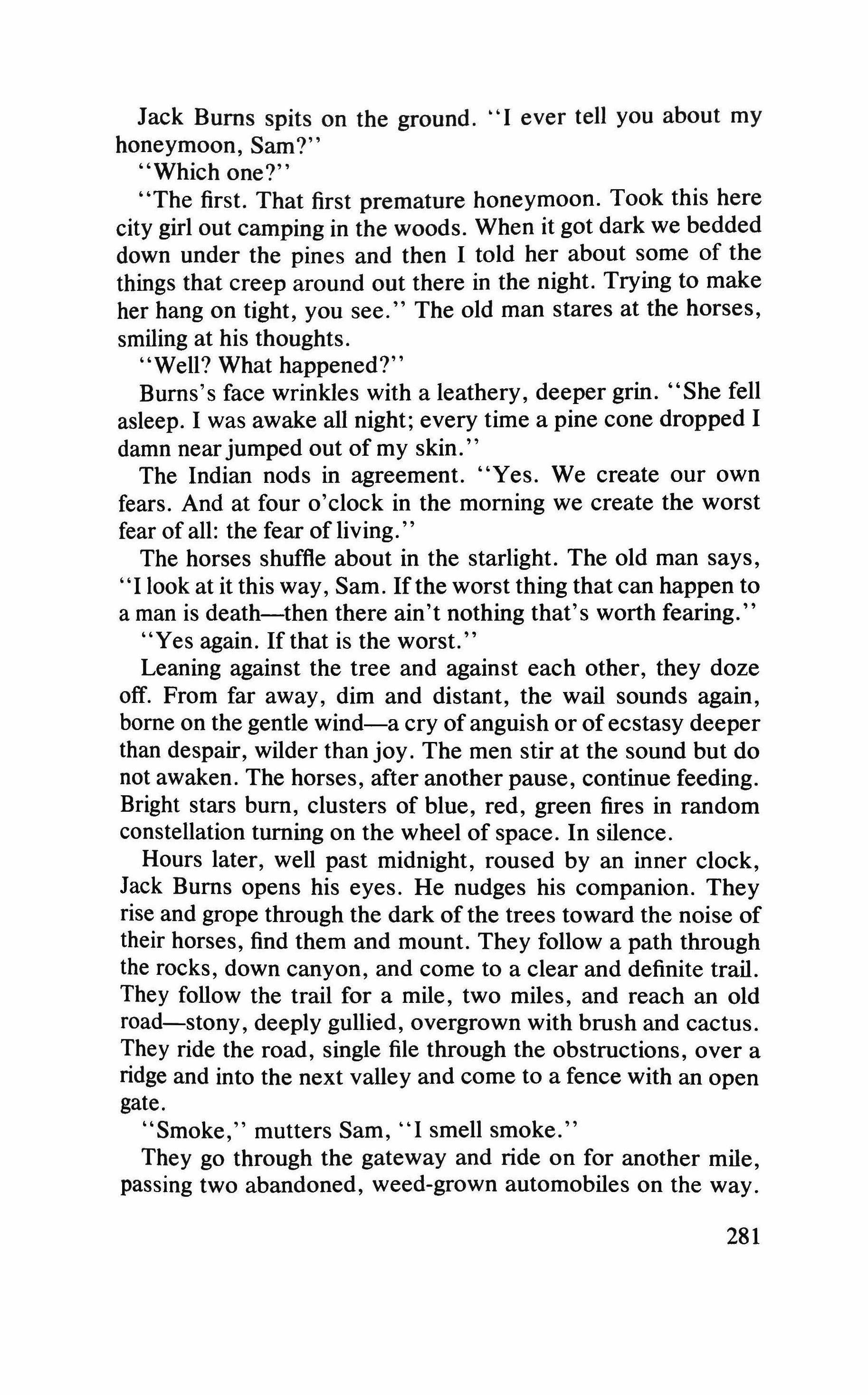
Jack Bums spits on the ground... I ever tell you about my honeymoon, Sam?"
"Which one?"
"The first. That first premature honeymoon. Took this here city girl out camping in the woods. When it got dark we bedded down under the pines and then I told her about some of the things that creep around out there in the night. Trying to make her hang on tight, you see." The old man stares at the horses, smiling at his thoughts.
"Well? What happened?"
Bums's face wrinkles with a leathery, deeper grin. "She fell asleep. I was awake all night; every time a pine cone dropped I damn near jumped out of my skin."
The Indian nods in agreement. "Yes. We create our own fears. And at four o'clock in the morning we create the worst fear of all: the fear of living.
The horses shuffle about in the starlight. The old man says, "I look at it this way, Sam. Ifthe worst thing that can happen to a man is death-then there ain't nothing that's worth fearing."
"Yes again. If that is the worst."
Leaning against the tree and against each other, they doze off. From far away, dim and distant, the wail sounds again, borne on the gentle wind-a cry of anguish or ofecstasy deeper than despair, wilder than joy. The men stir at the sound but do not awaken. The horses, after another pause, continue feeding. Bright stars burn, clusters of blue, red, green fires in random constellation turning on the wheel of space. In silence.
Hours later, well past midnight, roused by an inner clock, Jack Burns opens his eyes. He nudges his companion. They rise and grope through the dark of the trees toward the noise of their horses, find them and mount. They follow a path through the rocks, down canyon, and come to a clear and definite trail. They follow the trail for a mile, two miles, and reach an old road-stony, deeply gullied, overgrown with brush and cactus. They ride the road, single file through the obstructions, over a ridge and into the next valley and come to a fence with an open gate.
"Smoke," mutters Sam, "I smell smoke."
They go through the gateway and ride on for another mile, passing two abandoned, weed-grown automobiles on the way.
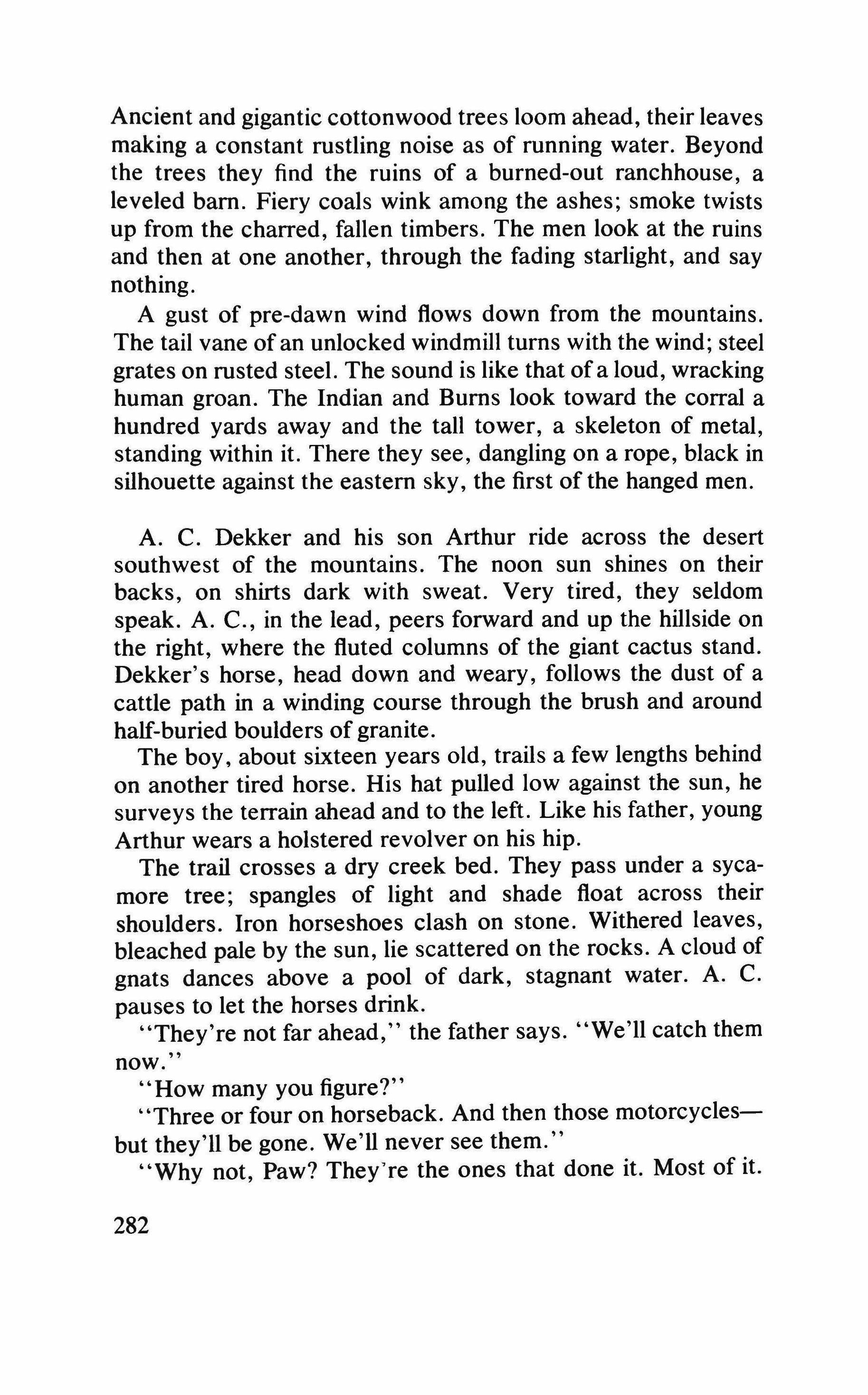
Ancient and gigantic cottonwood trees loom ahead, their leaves making a constant rustling noise as of running water. Beyond the trees they find the ruins of a burned-out ranchhouse, a leveled bam. Fiery coals wink among the ashes; smoke twists up from the charred, fallen timbers. The men look at the ruins and then at one another, through the fading starlight, and say nothing.
A gust of pre-dawn wind flows down from the mountains. The tail vane of an unlocked windmill turns with the wind; steel grates on rusted steel. The sound is like that of a loud, wracking human groan. The Indian and Bums look toward the corral a hundred yards away and the tall tower, a skeleton of metal, standing within it. There they see, dangling on a rope, black in silhouette against the eastern sky, the first of the hanged men.
A. C. Dekker and his son Arthur ride across the desert southwest of the mountains. The noon sun shines on their backs, on shirts dark with sweat. Very tired, they seldom speak. A. C., in the lead, peers forward and up the hillside on the right, where the fluted columns of the giant cactus stand. Dekker's horse, head down and weary, follows the dust of a cattle path in a winding course through the brush and around half-buried boulders of granite.
The boy, about sixteen years old, trails a few lengths behind on another tired horse. His hat pulled low against the sun, he surveys the terrain ahead and to the left. Like his father, young Arthur wears a holstered revolver on his hip.
The trail crosses a dry creek bed. They pass under a sycamore tree; spangles of light and shade float across their shoulders. Iron horseshoes clash on stone. Withered leaves, bleached pale by the sun, lie scattered on the rocks. A cloud of gnats dances above a pool of dark, stagnant water. A. C. pauses to let the horses drink.
"They're not far ahead," the father says. "We'll catch them now."
"How many you figure?"
"Three or four on horseback. And then those motorcyclesbut they'll be gone. We'll never see them."
"Why not, Paw? They're the ones that done it. Most of it.
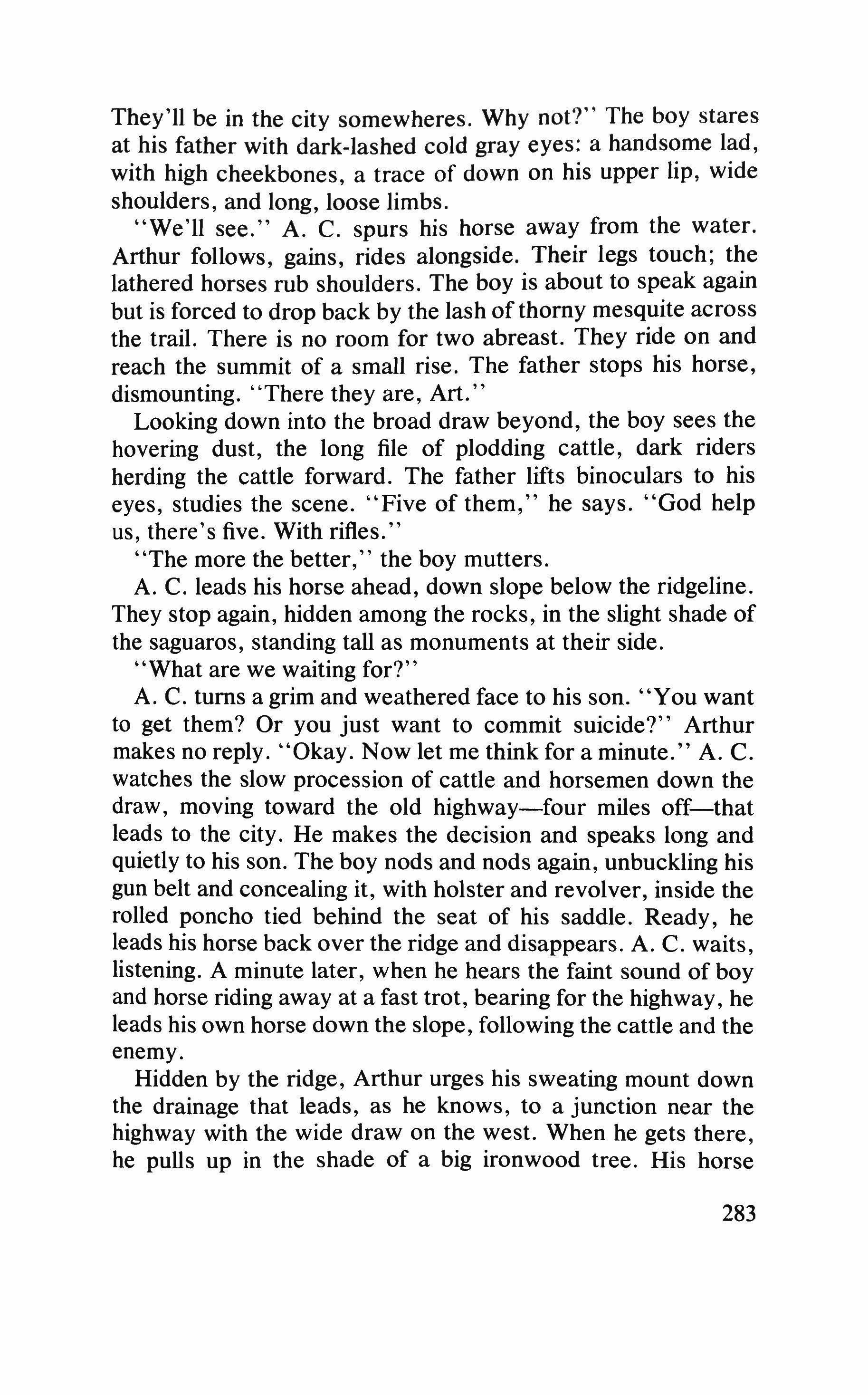
They'll be in the city somewheres. Why not?" The boy stares at his father with dark-lashed cold gray eyes: a handsome lad, with high cheekbones, a trace of down on his upper lip, wide shoulders, and long, loose limbs.
"We'll see." A. C. spurs his horse away from the water. Arthur follows, gains, rides alongside. Their legs touch; the lathered horses rub shoulders. The boy is about to speak again but is forced to drop back by the lash of thorny mesquite across the trail. There is no room for two abreast. They ride on and reach the summit of a small rise. The father stops his horse, dismounting. "There they are, Art."
Looking down into the broad draw beyond, the boy sees the hovering dust, the long file of plodding cattle, dark riders herding the cattle forward. The father lifts binoculars to his eyes, studies the scene. "Five of them," he says. "God help us, there's five. With rifles."
"The more the better," the boy mutters.
A. C. leads his horse ahead, down slope below the ridgeline. They stop again, hidden among the rocks, in the slight shade of the saguaros, standing tall as monuments at their side.
"What are we waiting for?"
A. C. turns a grim and weathered face to his son. "You want to get them? Or you just want to commit suicide?" Arthur makes no reply. "Okay. Now let me think for a minute." A. C. watches the slow procession of cattle and horsemen down the draw, moving toward the old highway-four miles off-that leads to the city. He makes the decision and speaks long and quietly to his son. The boy nods and nods again, unbuckling his gun belt and concealing it, with holster and revolver, inside the rolled poncho tied behind the seat of his saddle. Ready, he leads his horse back over the ridge and disappears. A. C. waits, listening. A minute later, when he hears the faint sound of boy and horse riding away at a fast trot, bearing for the highway, he leads his own horse down the slope, following the cattle and the enemy.
Hidden by the ridge, Arthur urges his sweating mount down the drainage that leads, as he knows, to a junction near the highway with the wide draw on the west. When he gets there, he pulls up in the shade of a big ironwood tree. His horse

trembles with fatigue and the contagion of fear. The boy speaks to it softly, and strokes the sweat-dark hide. The horse quiets a little as he tethers it to the tree.
The asphalt highway lies within sight, a transparent scrim of heat waves shimmering above it. There is no traffic on that road. Scrubby weeds grow from cracks in the pavement. An abandoned Greyhound bus, once blue and silver but faded now to a lusterless gray, sits on deflated tires half on and half offthe roadway; a small, drab bird flies in through a broken window and out through the open door. Beyond the highway and the waves of rising heat, the desert hills to the south appear like islands floating on a sea without color. In that direction the world looks marvelously still and empty.
The boy waits, squatting in the shade. The first rider appears, a tall man in khaki uniform, a flat-brimmed trooper's hat on his head, shading his face. The boy stands up. The rider halts his horse and draws a rifle from the saddle scabbard. Arthur holds both hands aloft to show that he is unarmed. The rider approaches. He speaks a few words into a two-way radio. The string of cattle comes in sight, flanked by the other uniformed horsemen, dark figures in the dust. As the first rider comes near, the boy lowers his arms and casually leans back against the side of his horse, covering the brand on the horse's hip. The brand-a rocking K-is the same as the one on the cattle: the Dekkers' brand, Dekkers' cattle.
The leading rider comes to within ten feet of Arthur and stops. He wears a lightning-bolt patch on his shoulder, the gold bars of a lieutenant on his collar, a heat-weary scowl on his face. "Well," he says, "who are you?" He holds his carbine in the crook of his arm, the barrel pointing at Arthur.
"I'm not feelin' too good," Arthur says. "You have any water?"
The officer inspects the boy with moderate interest. "How old are you?"
Arthur hesitates; on the verge of insolence, he reconsiders. "J'rn sixteen," he mumbles.
"Get on your horse. You're coming with us."
"1 need some water.
"You'll get water. Mount up."
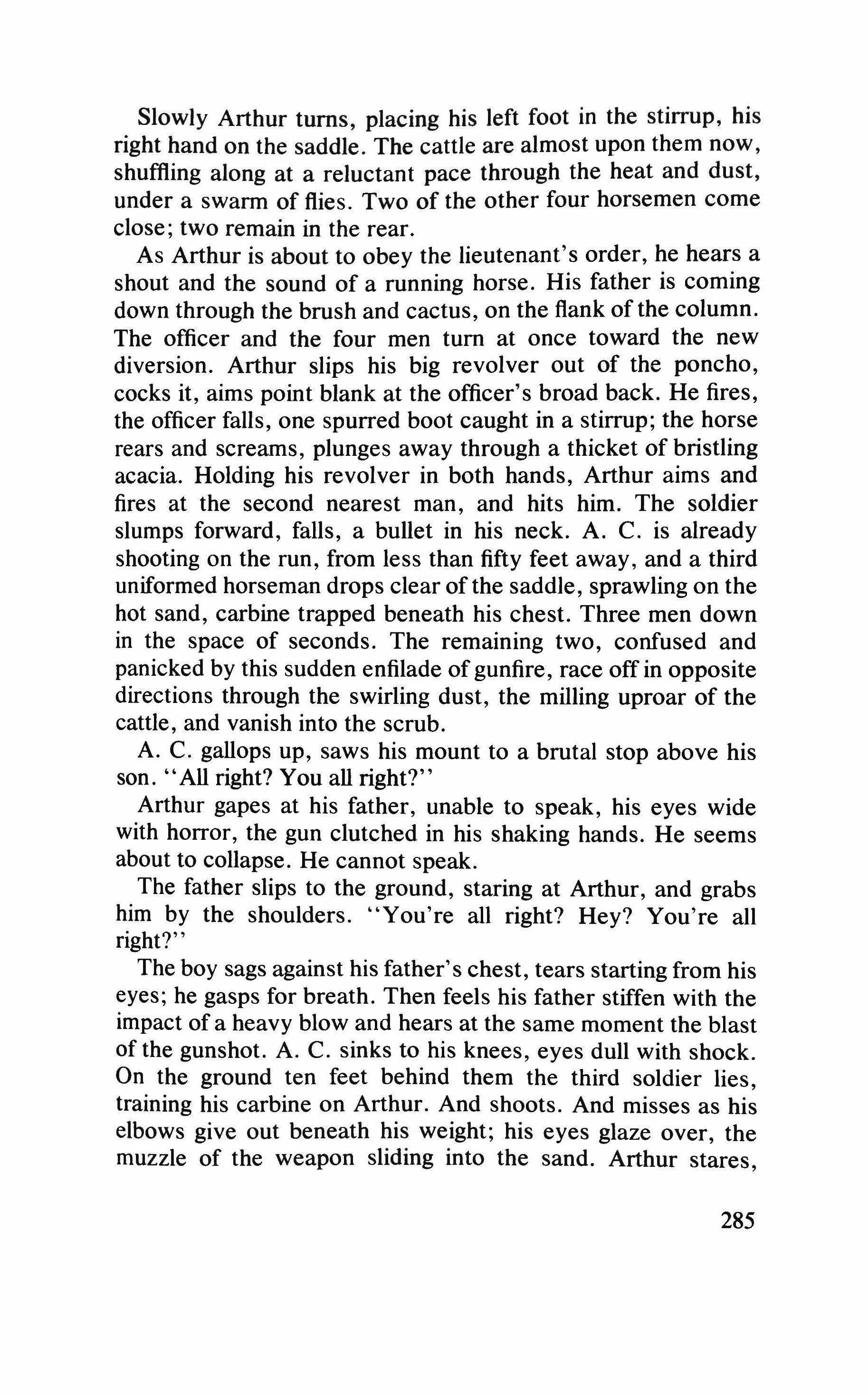
Slowly Arthur turns, placing his left foot in the stirrup, his right hand on the saddle. The cattle are almost upon them now, shuffling along at a reluctant pace through the heat and dust, under a swarm of flies. Two of the other four horsemen come close; two remain in the rear.
As Arthur is about to obey the lieutenant's order, he hears a shout and the sound of a running horse. His father is coming down through the brush and cactus, on the flank of the column. The officer and the four men tum at once toward the new diversion. Arthur slips his big revolver out of the poncho, cocks it, aims point blank at the officer's broad back. He fires, the officer falls, one spurred boot caught in a stirrup; the horse rears and screams, plunges away through a thicket of bristling acacia. Holding his revolver in both hands, Arthur aims and fires at the second nearest man, and hits him. The soldier slumps forward, falls, a bullet in his neck. A. C. is already shooting on the run, from less than fifty feet away, and a third uniformed horseman drops clear of the saddle, sprawling on the hot sand, carbine trapped beneath his chest. Three men down in the space of seconds. The remaining two, confused and panicked by this sudden enfilade of gunfire, race off in opposite directions through the swirling dust, the milling uproar of the cattle, and vanish into the scrub.
A. C. gallops up, saws his mount to a brutal stop above his son .••All right? You all right?"
Arthur gapes at his father, unable to speak, his eyes wide with horror, the gun clutched in his shaking hands. He seems about to collapse. He cannot speak.
The father slips to the ground, staring at Arthur, and grabs him by the shoulders. "You're all right? Hey? You're all right?"
The boy sags against his father's chest, tears starting from his eyes; he gasps for breath. Then feels his father stiffen with the impact of a heavy blow and hears at the same moment the blast of the gunshot. A. C. sinks to his knees, eyes dull with shock. On the ground ten feet behind them the third soldier lies, training his carbine on Arthur. And shoots. And misses as his elbows give out beneath his weight; his eyes glaze over, the muzzle of the weapon sliding into the sand. Arthur stares,
285
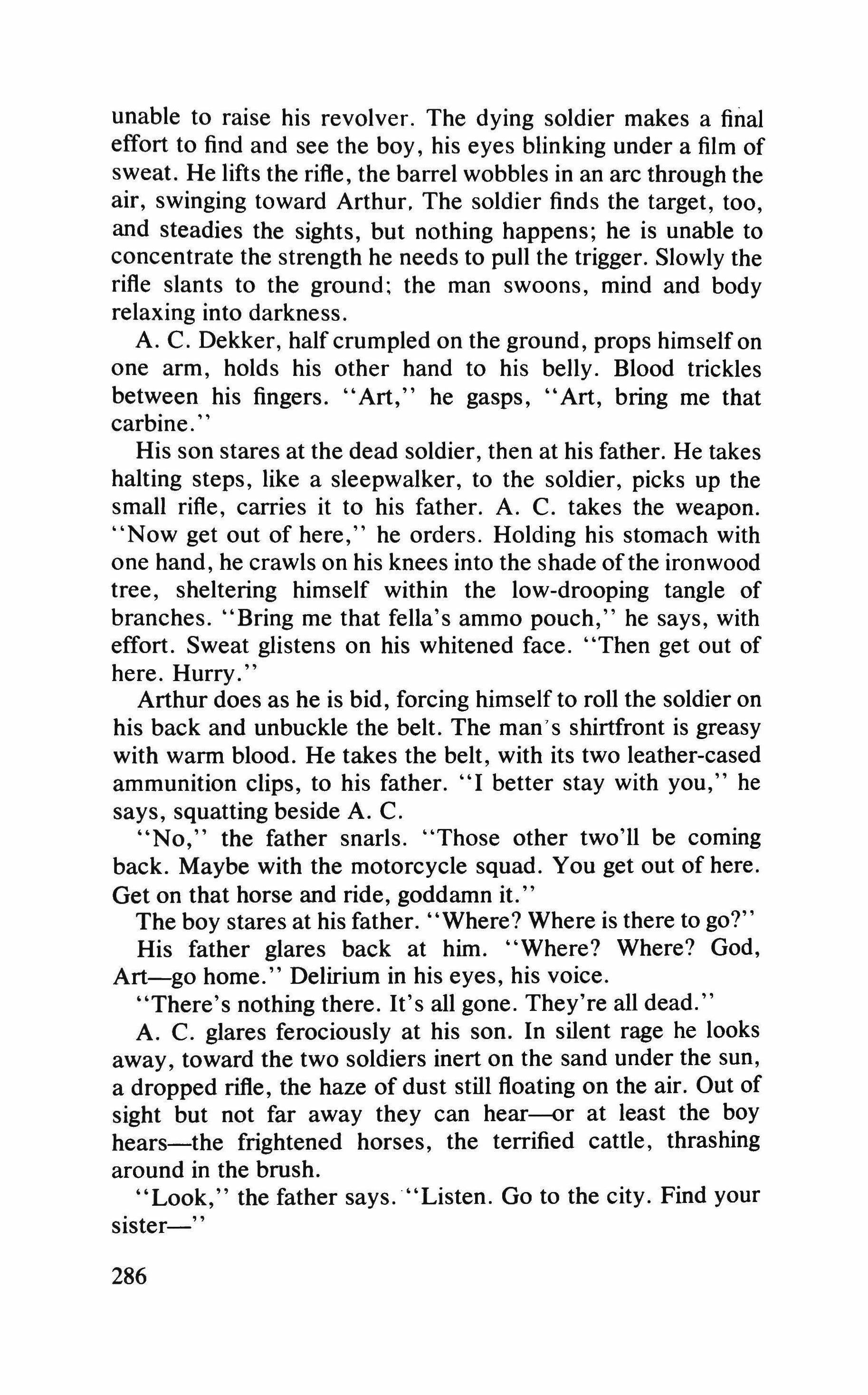
unable to raise his revolver. The dying soldier makes a final effort to find and see the boy, his eyes blinking under a film of sweat. He lifts the rifle, the barrel wobbles in an arc through the air, swinging toward Arthur. The soldier finds the target, too, and steadies the sights, but nothing happens; he is unable to concentrate the strength he needs to pull the trigger. Slowly the rifle slants to the ground; the man swoons, mind and body relaxing into darkness.
A. C. Dekker, half crumpled on the ground, props himself on one arm, holds his other hand to his belly. Blood trickles between his fingers. "Art," he gasps, "Art, bring me that carbine.
His son stares at the dead soldier, then at his father. He takes halting steps, like a sleepwalker, to the soldier, picks up the small rifle, carries it to his father. A. C. takes the weapon. "Now get out of here," he orders. Holding his stomach with one hand, he crawls on his knees into the shade ofthe ironwood tree, sheltering himself within the low-drooping tangle of branches. "Bring me that fella's ammo pouch," he says, with effort. Sweat glistens on his whitened face. "Then get out of here. Hurry."
Arthur does as he is bid, forcing himself to roll the soldier on his back and unbuckle the belt. The man's shirtfront is greasy with warm blood. He takes the belt, with its two leather-cased ammunition clips, to his father. "I better stay with you," he says, squatting beside A. C.
"No," the father snarls. "Those other two'Il be coming back. Maybe with the motorcycle squad. You get out of here. Get on that horse and ride, goddamn it.
The boy stares at his father. "Where? Where is there to go?" His father glares back at him. "Where? Where? God, Art-go home." Delirium in his eyes, his voice.
"There's nothing there. It's all gone. They're all dead."
A. C. glares ferociously at his son. In silent rage he looks away, toward the two soldiers inert on the sand under the sun, a dropped rifle, the haze of dust still floating on the air. Out of sight but not far away they can hear-or at least the boy hears-the frightened horses, the terrified cattle, thrashing around in the brush.
"Look," the father says. "Listen. Go to the city. Find your sister-"
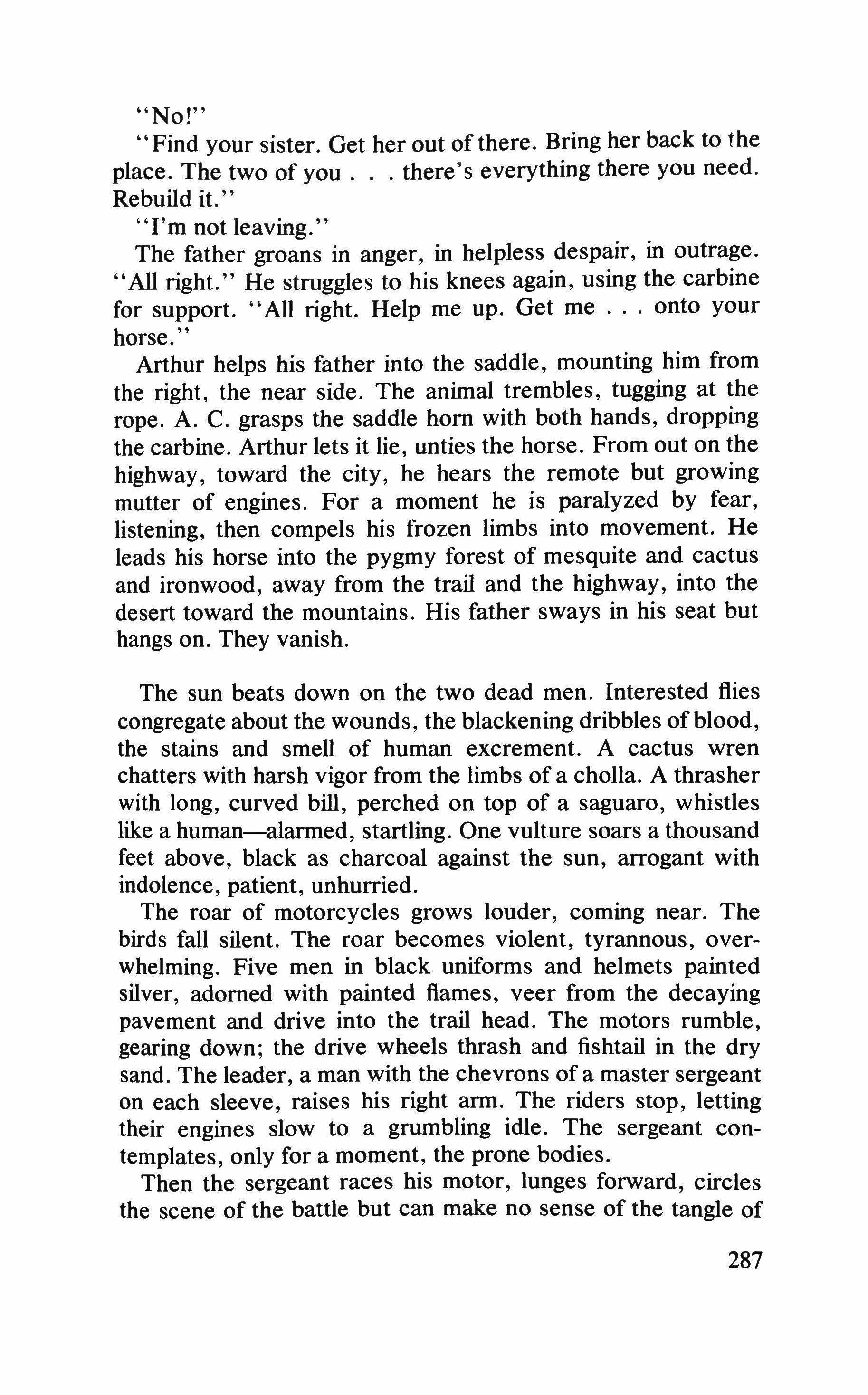
"Find your sister. Get her out of there. Bring her back to the place. The two of you there's everything there you need. Rebuild it."
"I'm not leaving."
The father groans in anger, in helpless despair, in outrage. "All right." He struggles to his knees again, using the carbine for support. All right. Help me up. Get me onto your horse.
Arthur helps his father into the saddle, mounting him from the right, the near side. The animal trembles, tugging at the rope. A. C. grasps the saddle hom with both hands, dropping the carbine. Arthur lets it lie, unties the horse. From out on the highway, toward the city, he hears the remote but growing mutter of engines. For a moment he is paralyzed by fear, listening, then compels his frozen limbs into movement. He leads his horse into the pygmy forest of mesquite and cactus and ironwood, away from the trail and the highway, into the desert toward the mountains. His father sways in his seat but hangs on. They vanish.
The sun beats down on the two dead men. Interested flies congregate about the wounds, the blackening dribbles ofblood, the stains and smell of human excrement. A cactus wren chatters with harsh vigor from the limbs of a cholla. A thrasher with long, curved bill, perched on top of a saguaro, whistles like a human-alarmed, startling. One vulture soars a thousand feet above, black as charcoal against the sun, arrogant with indolence, patient, unhurried.
The roar of motorcycles grows louder, coming near. The birds fall silent. The roar becomes violent, tyrannous, overwhelming. Five men in black uniforms and helmets painted silver, adorned with painted flames, veer from the decaying pavement and drive into the trail head. The motors rumble, gearing down; the drive wheels thrash and fishtail in the dry sand. The leader, a man with the chevrons of a master sergeant on each sleeve, raises his right arm. The riders stop, letting their engines slow to a grumbling idle. The sergeant contemplates, only for a moment, the prone bodies.
Then the sergeant races his motor, lunges forward, circles the scene of the battle but can make no sense of the tangle of
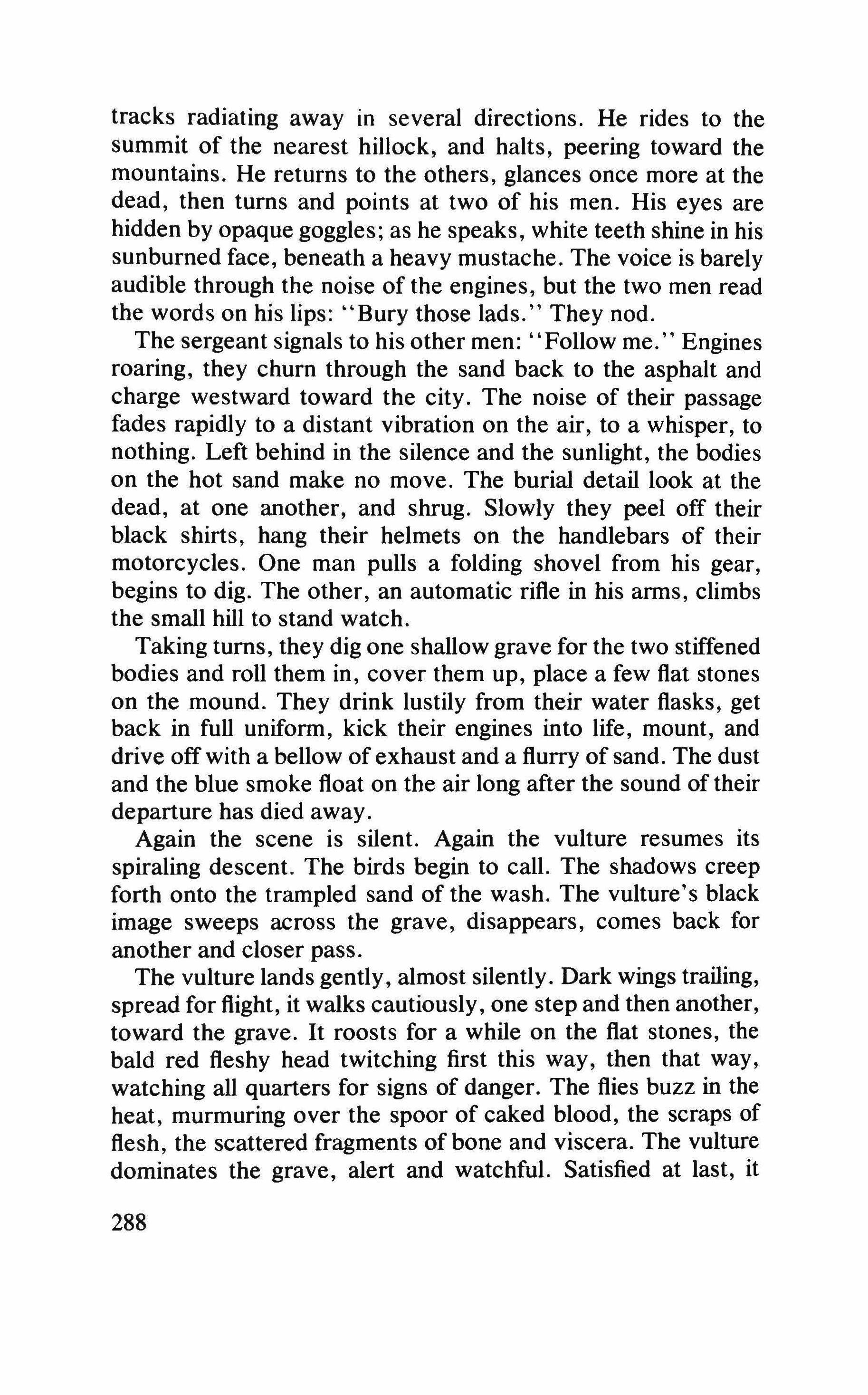
tracks radiating away in several directions. He rides to the summit of the nearest hillock, and halts, peering toward the mountains. He returns to the others, glances once more at the dead, then turns and points at two of his men. His eyes are hidden by opaque goggles; as he speaks, white teeth shine in his sunburned face, beneath a heavy mustache. The voice is barely audible through the noise of the engines, but the two men read the words on his lips: "Bury those lads." They nod.
The sergeant signals to his other men: "Follow me. Engines roaring, they churn through the sand back to the asphalt and charge westward toward the city. The noise of their passage fades rapidly to a distant vibration on the air, to a whisper, to nothing. Left behind in the silence and the sunlight, the bodies on the hot sand make no move. The burial detail look at the dead, at one another, and shrug. Slowly they peel off their black shirts, hang their helmets on the handlebars of their motorcycles. One man pulls a folding shovel from his gear, begins to dig. The other, an automatic rifle in his arms, climbs the small hill to stand watch.
Taking turns, they dig one shallow grave for the two stiffened bodies and roll them in, cover them up, place a few flat stones on the mound. They drink lustily from their water flasks, get back in full uniform, kick their engines into life, mount, and drive off with a bellow of exhaust and a flurry of sand. The dust and the blue smoke float on the air long after the sound of their departure has died away.
Again the scene is silent. Again the vulture resumes its spiraling descent. The birds begin to call. The shadows creep forth onto the trampled sand of the wash. The vulture's black image sweeps across the grave, disappears, comes back for another and closer pass.
The vulture lands gently, almost silently. Dark wings trailing, spread for flight, it walks cautiously, one step and then another, toward the grave. It roosts for a while on the flat stones, the bald red fleshy head twitching first this way, then that way, watching all quarters for signs of danger. The flies buzz in the heat, murmuring over the spoor of caked blood, the scraps of flesh, the scattered fragments of bone and viscera. The vulture dominates the grave, alert and watchful. Satisfied at last, it
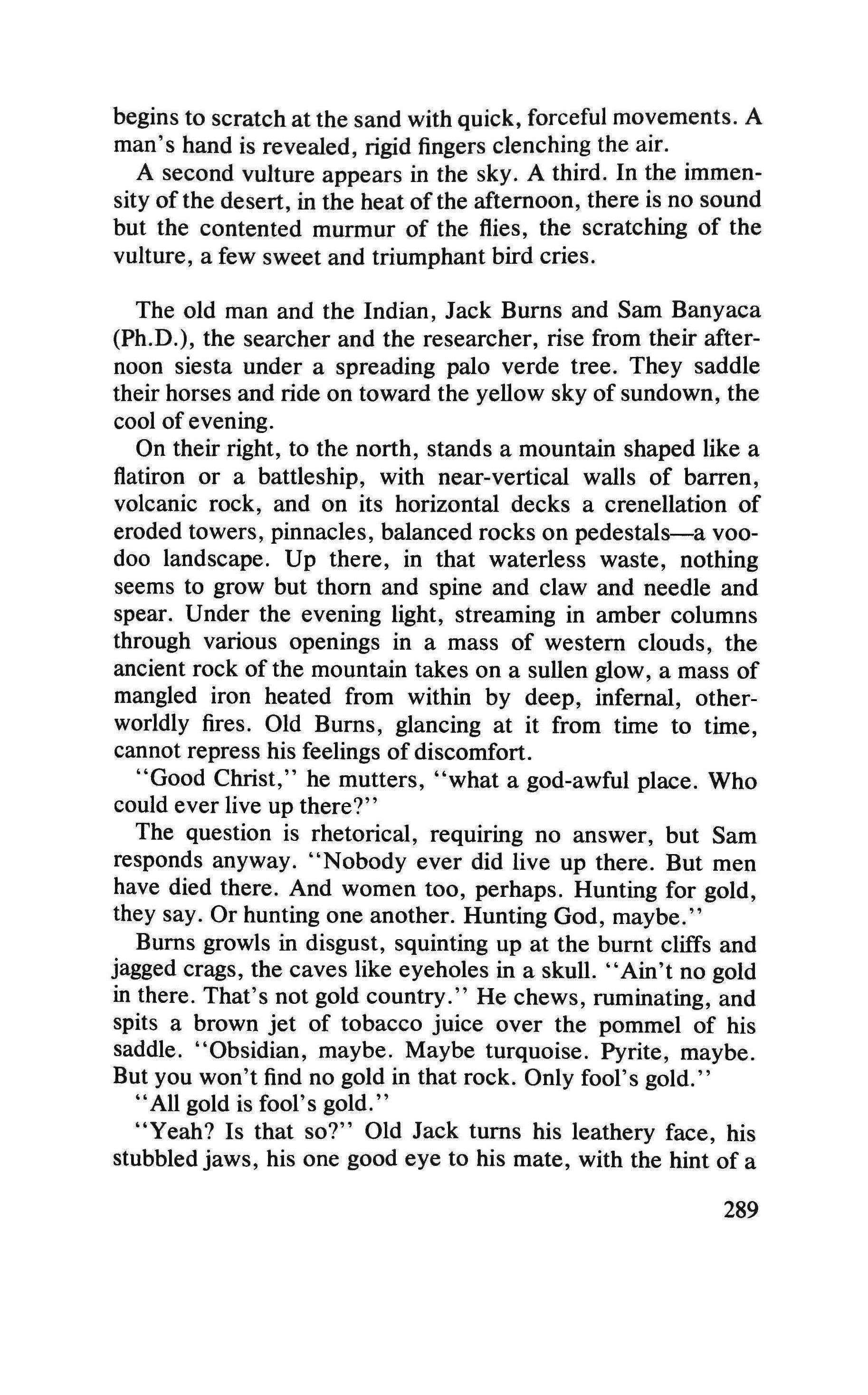
begins to scratch at the sand with quick, forceful movements. A man's hand is revealed, rigid fingers clenching the air.
A second vulture appears in the sky. A third. In the immensity of the desert, in the heat of the afternoon, there is no sound but the contented murmur of the flies, the scratching of the vulture, a few sweet and triumphant bird cries.
The old man and the Indian, Jack Burns and Sam Banyaca (Ph.D.), the searcher and the researcher, rise from their afternoon siesta under a spreading palo verde tree. They saddle their horses and ride on toward the yellow sky of sundown, the cool of evening.
On their right, to the north, stands a mountain shaped like a flatiron or a battleship, with near-vertical walls of barren, volcanic rock, and on its horizontal decks a crenellation of eroded towers, pinnacles, balanced rocks on pedestals-a voodoo landscape. Up there, in that waterless waste, nothing seems to grow but thorn and spine and claw and needle and spear. Under the evening light, streaming in amber columns through various openings in a mass of western clouds, the ancient rock of the mountain takes on a sullen glow, a mass of mangled iron heated from within by deep, infernal, otherworldly fires. Old Burns, glancing at it from time to time, cannot repress his feelings of discomfort.
"Good Christ," he mutters, "what a god-awful place. Who could ever live up there?"
The question is rhetorical, requiring no answer, but Sam responds anyway. "Nobody ever did live up there. But men have died there. And women too, perhaps. Hunting for gold, they say. Or hunting one another. Hunting God, maybe."
Burns growls in disgust, squinting up at the burnt cliffs and jagged crags, the caves like eyeholes in a skull. "Ain't no gold in there. That's not gold country." He chews, ruminating, and spits a brown jet of tobacco juice over the pommel of his saddle. "Obsidian, maybe. Maybe turquoise. Pyrite, maybe. But you won't find no gold in that rock. Only fool's gold."
"All gold is fool's gold."
Yeah? Is that so?" Old Jack turns his leathery face, his stubbled jaws, his one good eye to his mate, with the hint of a
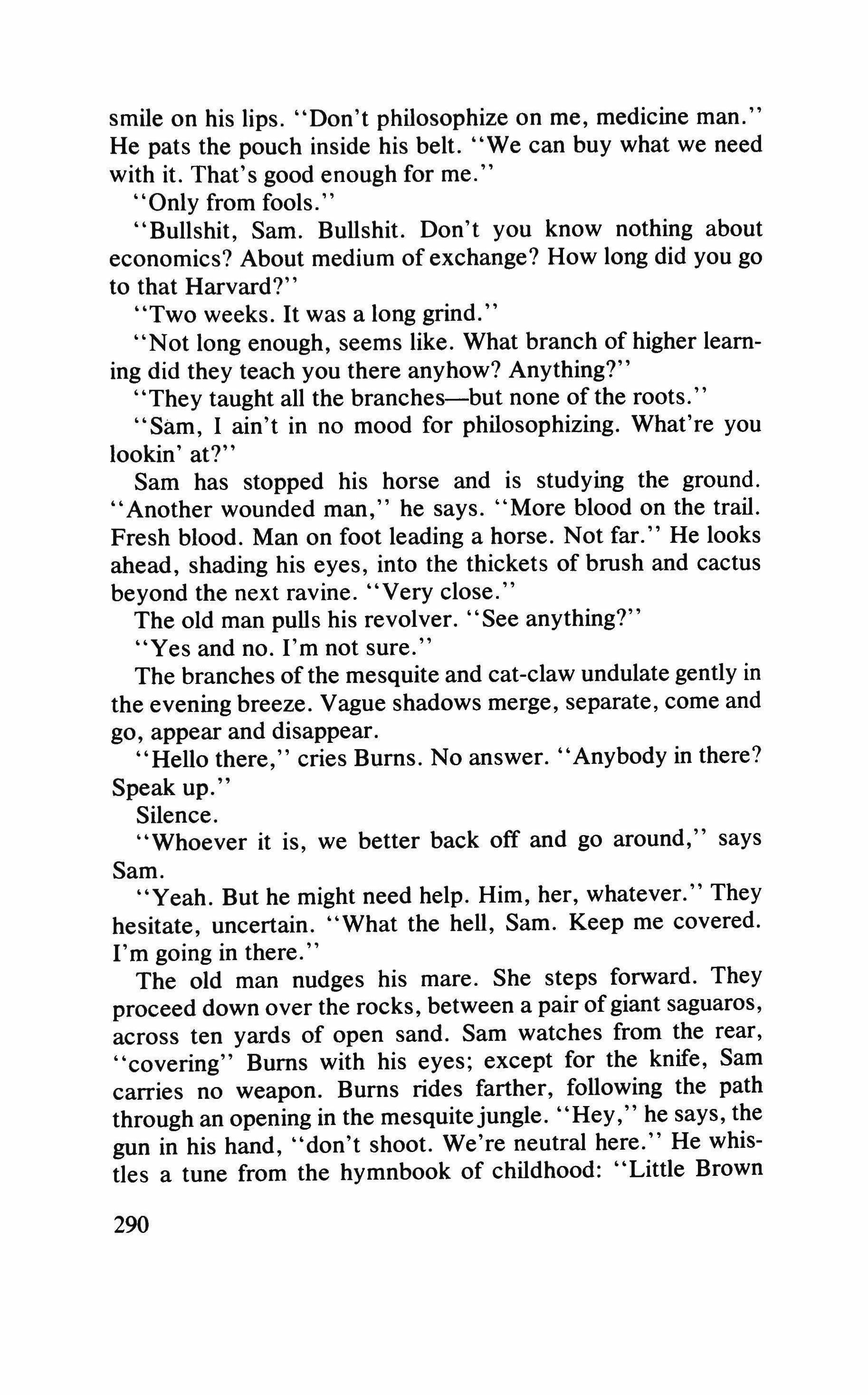
smile on his lips. "Don't philosophize on me, medicine man." He pats the pouch inside his belt. "We can buy what we need with it. That's good enough for me."
"Only from fools."
"Bullshit, Sam. Bullshit. Don't you know nothing about economics? About medium of exchange? How long did you go to that Harvard?"
"Two weeks. It was a long grind."
"Not long enough, seems like. What branch of higher learning did they teach you there anyhow? Anything?"
"They taught all the branches-but none of the roots."
"Sam, I ain't in no mood for philosophizing. What're you lookin' at?"
Sam has stopped his horse and is studying the ground.
"Another wounded man," he says. "More blood on the trail. Fresh blood. Man on foot leading a horse. Not far." He looks ahead, shading his eyes, into the thickets of brush and cactus beyond the next ravine. "Very close."
The old man pulls his revolver. "See anything?"
"Yes and no. I'm not sure."
The branches of the mesquite and cat-claw undulate gently in the evening breeze. Vague shadows merge, separate, come and go, appear and disappear.
"Hello there," cries Bums. No answer. "Anybody in there? Speak up."
Silence.
"Whoever it is, we better back off and go around," says Sam.
"Yeah. But he might need help. Him, her, whatever." They hesitate, uncertain. "What the hell, Sam. Keep me covered. I'm going in there."
The old man nudges his mare. She steps forward. They proceed down over the rocks, between a pair ofgiant saguaros, across ten yards of open sand. Sam watches from the rear, "covering" Bums with his eyes; except for the knife, Sam carries no weapon. Bums rides farther, following the path through an opening in the mesquitejungle. "Hey," he says, the gun in his hand, "don't shoot. We're neutral here." He whistles a tune from the hymnbook of childhood: "Little Brown
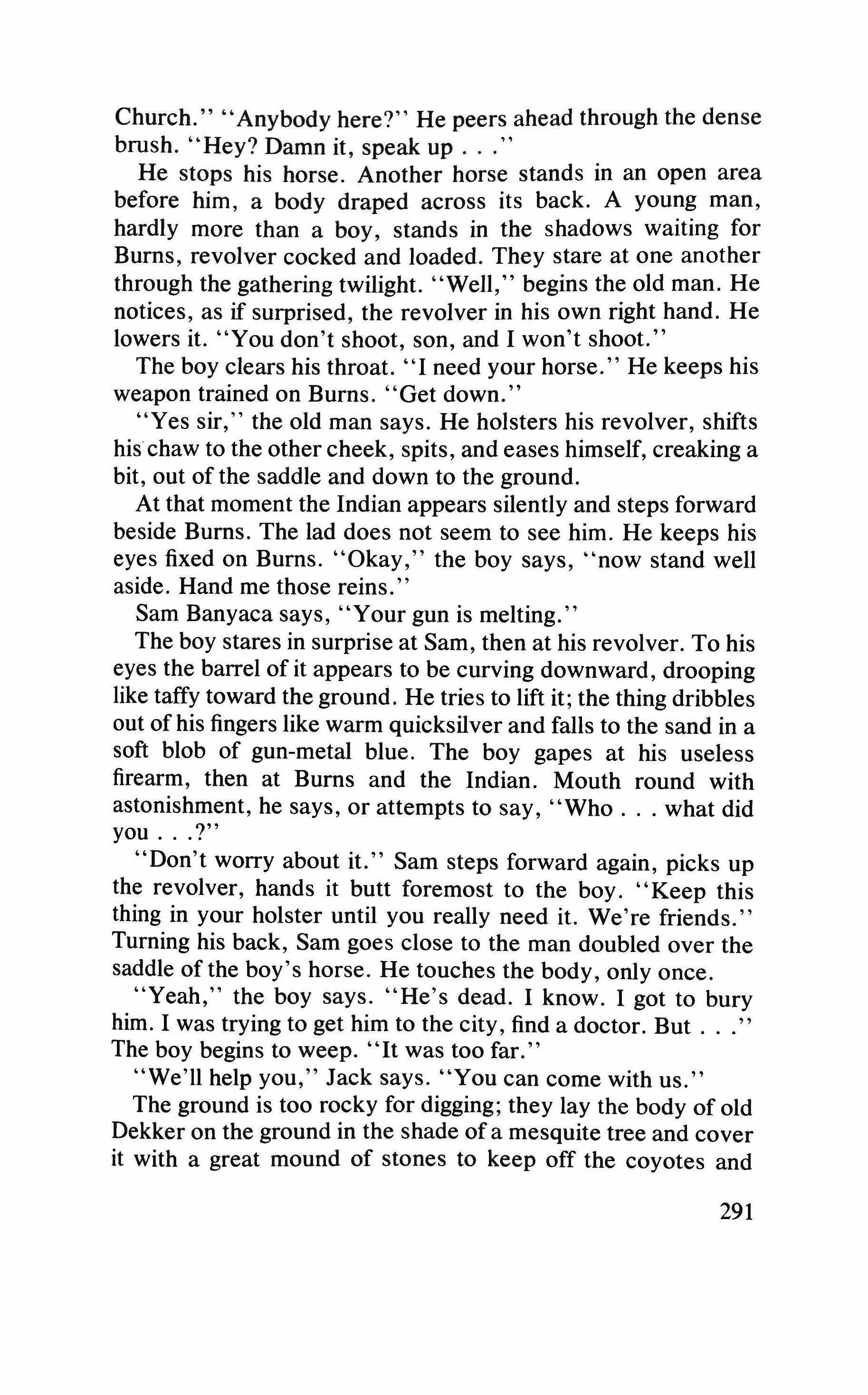
Church." "Anybody here?" He peers ahead through the dense brush. "Hey? Damn it, speak up
He stops his horse. Another horse stands in an open area before him, a body draped across its back. A young man, hardly more than a boy, stands in the shadows waiting for Burns, revolver cocked and loaded. They stare at one another through the gathering twilight. "Well," begins the old man. He notices, as if surprised, the revolver in his own right hand. He lowers it. "You don't shoot, son, and I won't shoot."
The boy clears his throat. "I need your horse." He keeps his weapon trained on Burns. "Get down."
"Yes sir," the old man says. He holsters his revolver, shifts his chaw to the other cheek, spits, and eases himself, creaking a bit, out of the saddle and down to the ground.
At that moment the Indian appears silently and steps forward beside Bums. The lad does not seem to see him. He keeps his eyes fixed on Bums. "Okay," the boy says, "now stand well aside. Hand me those reins."
Sam Banyaca says, "Your gun is melting."
The boy stares in surprise at Sam, then at his revolver. To his eyes the barrel of it appears to be curving downward, drooping like taffy toward the ground. He tries to lift it; the thing dribbles out of his fingers like warm quicksilver and falls to the sand in a soft blob of gun-metal blue. The boy gapes at his useless firearm, then at Burns and the Indian. Mouth round with astonishment, he says, or attempts to say, "Who what did you ?"
"Don't worry about it." Sam steps forward again, picks up the revolver, hands it butt foremost to the boy. "Keep this thing in your holster until you really need it. We're friends."
Turning his back, Sam goes close to the man doubled over the saddle of the boy's horse. He touches the body, only once.
"Yeah," the boy says. "He's dead. I know. I got to bury him. I was trying to get him to the city, find a doctor. But The boy begins to weep. "It was too far."
"We'll help you," Jack says. "You can come with us."
The ground is too rocky for digging; they lay the body of old Dekker on the ground in the shade of a mesquite tree and cover it with a great mound of stones to keep off the coyotes and 291
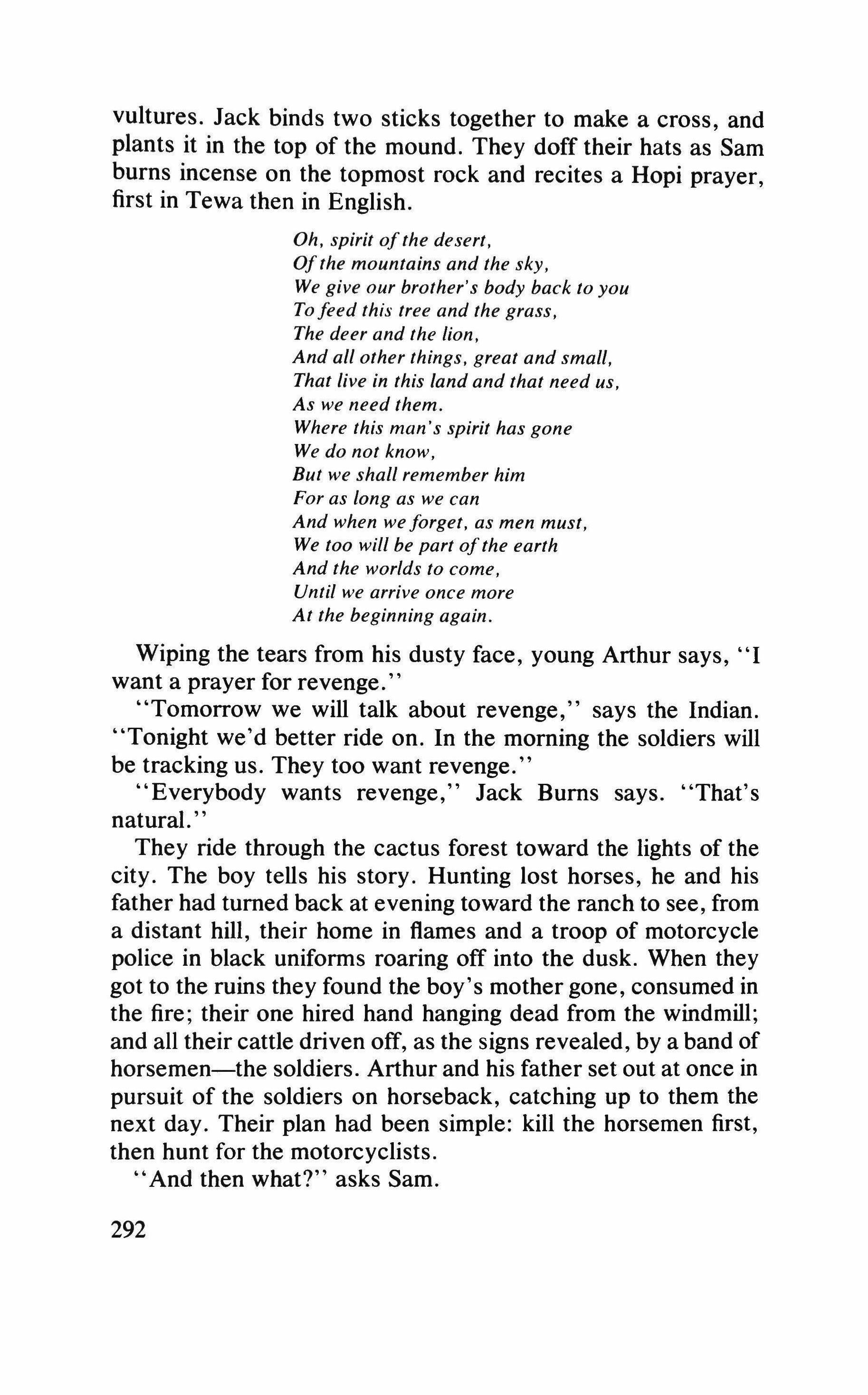
vultures. Jack binds two sticks together to make a cross, and plants it in the top of the mound. They doff their hats as Sam burns incense on the topmost rock and recites a Hopi prayer, first in Tewa then in English.
Oh, spirit ofthe desert, Of the mountains and the sky, We give our brother's body back to you To feed this tree and the grass, The deer and the lion, And all other things, great and small, That live in this land and that need us,
As we need them.
Where this man's spirit has gone We do not know,
But we shall remember him
For as long as we can
And when we forget, as men must, We too will be part ofthe earth
And the worlds to come,
Until we arrive once more
At the beginning again.
Wiping the tears from his dusty face, young Arthur says, "I want a prayer for revenge."
"Tomorrow we will talk about revenge," says the Indian. "Tonight we'd better ride on. In the morning the soldiers will be tracking us. They too want revenge."
"Everybody wants revenge," Jack Burns says. "That's natural.
They ride through the cactus forest toward the lights of the city. The boy tells his story. Hunting lost horses, he and his father had turned back at evening toward the ranch to see, from a distant hill, their home in flames and a troop of motorcycle police in black uniforms roaring off into the dusk. When they got to the ruins they found the boy's mother gone, consumed in the fire; their one hired hand hanging dead from the windmill; and all their cattle driven off, as the signs revealed, by a band of horsemen-the soldiers. Arthur and his father set out at once in pursuit of the soldiers on horseback, catching up to them the next day. Their plan had been simple: kill the horsemen first, then hunt for the motorcyclists.
"And then what?" asks Sam. 292

"And then?" says the boy. "Why then, then the Chief. The one they call the Chief. That's all.
"How?"
"I don't know yet. But I got the rest of my life to figure it out."
"Who's the Chief?" says Burns.
The boy tells what he knows of the Chief, which is not much. Sam adds the few details that he has heard, giving Burns the vague picture of a man apparently once an air force officer, then some kind of professor at the state university, who has made himself the master of the dying city before them. Ruler of the condemned. Boss of the survivors. Commander, with imperial ambitions, of a mercenary army.
"Nothing new in any ofthat," Burns says. "We been dealing with folks like him all my life. We can handle that type all right, no trouble a-tall."
"But we're staying out of politics," the Indian reminds him. "Why sure, sure. We find my boy and clear out. I know that, Sam."
Their slow progress through the desert brings them to the side of the former highway, now silent, untraveled. Under the cool stars, through the warm evening, Sam and Jack ride side by side, followed by Arthur Dekker. A chorus of coyotes breaks out suddenly in the middle distance, a wild frenzy of yapping and squawling, which stops as quickly as it began.
Nor do any of the three say a word about the abandoned trucks along the highway, the derelict automobiles at rest on flattened tires, doors sagging open and mice, moles, and birds nesting in the ruin of their interiors. Vines and weeds grow from the rotted upholstery of dead Fords, defunct Chevrolets, moribund Powerwagons, decayed Cadillacs, and wasted Winnebagos. Quiet bats flicker in, flicker out through the broken windows of tractor-trailer rigs, four-wheel-drive pickups, Blazers, Broncos, Scouts, Jeeps. One thing-besides futility-these machines have in common: all are facing east, away from the city.
A fat lizard, thick as a man's forearm, scuttles across the broken pavement before them. The old man reaches for his revolver; Sam lays a restraining hand on his wrist. "A friend," he says. 293

"Friend?" says Jack Burns. "That thing? That's a goddamn Gila monster if I ever seen one."
"Only the white man calls it a monster."
"Well, I'm a white man."
"Try to grow out of it. The real monster is up ahead in those glass towers. Look at this junk along the road: these steel toys, these pet baby dinosaurs. Even they tried to get away from him.
Burns considers for only a moment. "Sam," he says, "don't kid me. If there's one thing I can't stand it's an ecological Indian. Why, back in the old days the worst overgrazed range you could find anywhere was on the reservations. The worst strip mines, too.
"Worse than Appalachia?"
"I ain't been there."
"I've been there."
"Well, anything the white folks did bad you Indians could do worse.
"We learned from you. Before you came, we were doing all right.
"Yeah, I've heard about that. Fighting and stealing, torturing everybody you could catch. Maybe five million of you in a land that we showed could support three hundred million.
"But our way supported us for twenty thousand years. And then you came, your ancestors, that swarm of greedy peasants from all the slums of Europe, and you made a commercialindustrial slum out of our America."
"Now Sam, I wouldn't call it a slum. Not all of it. And like I said, we fed a lot of people."
"And how long did it last?"
"Well The old man hesitates. "What of it? What does that prove? Which is better-a hundred and fifty years of fun, excitement, lots of money or twenty thousand years of flies, filth, poverty, and stagnation with a mob of ignorant heathen savages? Eh? How about that, you red-skinned devil? At least we never ate dog.
"You ate one another.
"The times were hard, pardner. Times are hard. Look at that boy.
294

Young Arthur is slumping in the saddle, exhausted, half asleep. They turn away from the highway and make camp for the night near the ruins of a transformer station; slack power lines, long dead, trail for miles across the desert sands. The boy goes to sleep on his saddle blanket, head pillowed on his forearm. Sam Banyaca and Jack Burns, still arguing to pass the time, squat by a tiny fire of mesquite twigs. The old man nods off. Sam opens his saddlebag, takes out a beaded medicine pouch, and packs his little clay pipe with the crushed leaves of wild tobacco. He smokes, keeping watch, as his friends sleep. The horses, tethered close by in case of need, browse wearily onjojoba, bursage, rice grass, acacia. Not enough. But they are all hungry, men as well as animals.
Sam keeps watch, listening to the sounds of the desert night: an elf owl in a saguaro; a horned owl hooting from its perch on a leaning power pole; javelinas scuffling through a thicket of prickly pear; a pack of coyotes miles away, snarling over the dismembered remains of a man in the rags of a uniform Peace, peace, peace and order everywhere that he can hear. They are surrounded by friends. Their enemies are silent.
Early in the morning, before sunrise, the Indian rouses the other two. They saddle up and ride on through the fading starlight. They pass more burned-out ruins, abandoned homes, empty trailer houses in the suburbs of a suburb. They file beneath a pair of human bodies, of indeterminate age and sex, blackened in decay, dangling by the neck from the crossarms of a rusted steel pylon.
Long before the rising sun begins to shine upon their backs, they see its light reflected, in fierce red glare, from the walls of glass and aluminum that form the aspiring cathedrals of the city.
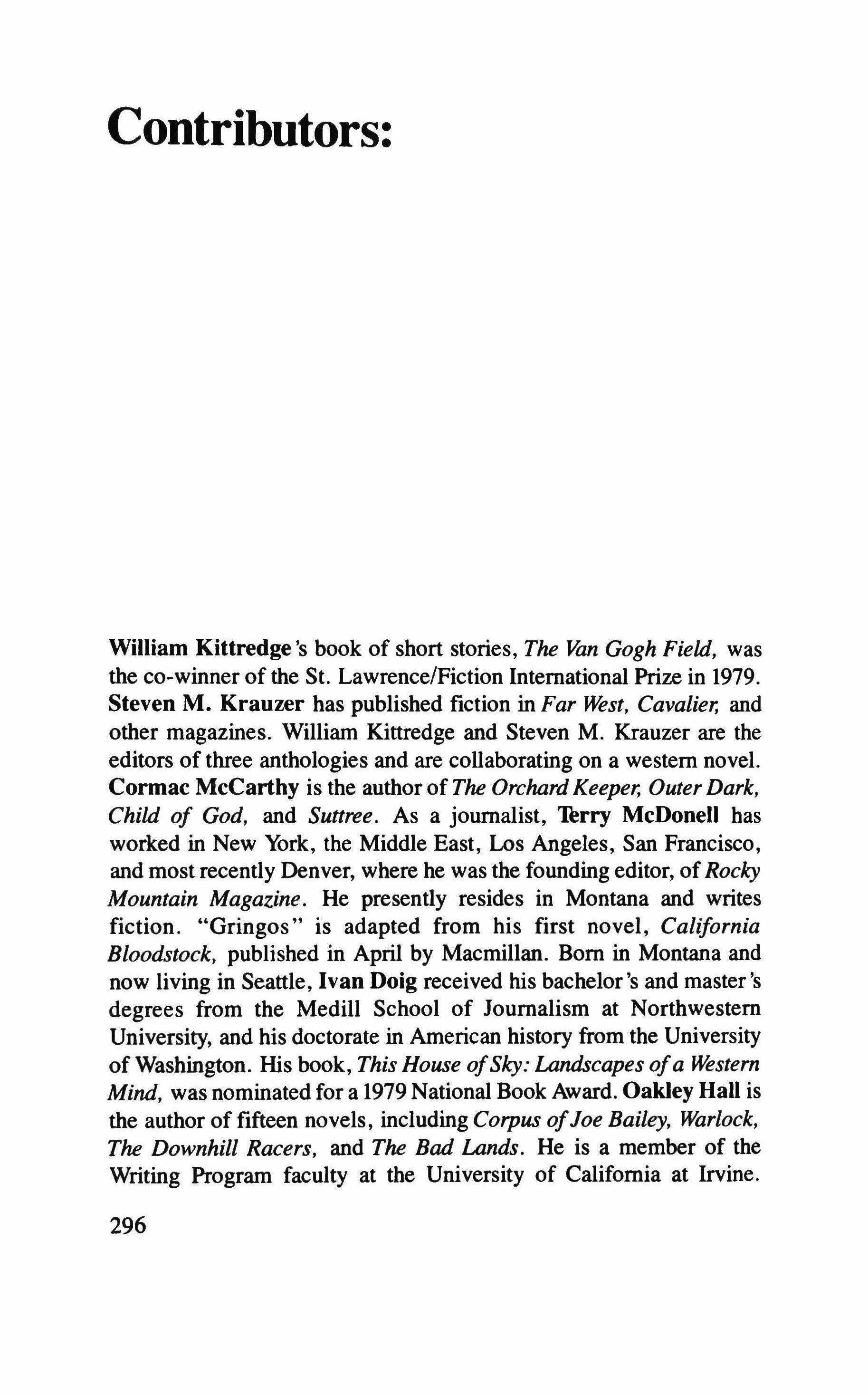
William Kittredge's book of short stories, The Van Gogh Field, was the co-winner of the St. Lawrence/Fiction International Prize in 1979. Steven M. Krauzer has published fiction in Far West, Cavalier, and other magazines. William Kittredge and Steven M. Krauzer are the editors of three anthologies and are collaborating on a western novel. Cormac McCarthy is the author of The Orchard Keeper, Outer Dark, Child of God, and Suttree. As a journalist, Thrry McDonell has worked in New York, the Middle East, Los Angeles, San Francisco, and most recently Denver, where he was the founding editor, of Rocky Mountain Magazine. He presently resides in Montana and writes fiction. "Gringos" is adapted from his first novel, California Bloodstock, published in April by Macmillan. Born in Montana and now living in Seattle, Ivan Doig received his bachelor's and master's degrees from the Medill School of Journalism at Northwestern University, and his doctorate in American history from the University of Washington. His book, This House ofSky: Landscapes ofa Western Mind, was nominated for a 1979 National Book Award. Oakley HaU is the author of fifteen novels, including Corpus ofJoe Bailey, Warlock, The Downhill Racers, and The Bad Lands. He is a member of the Writing Program faculty at the University of California at Irvine.
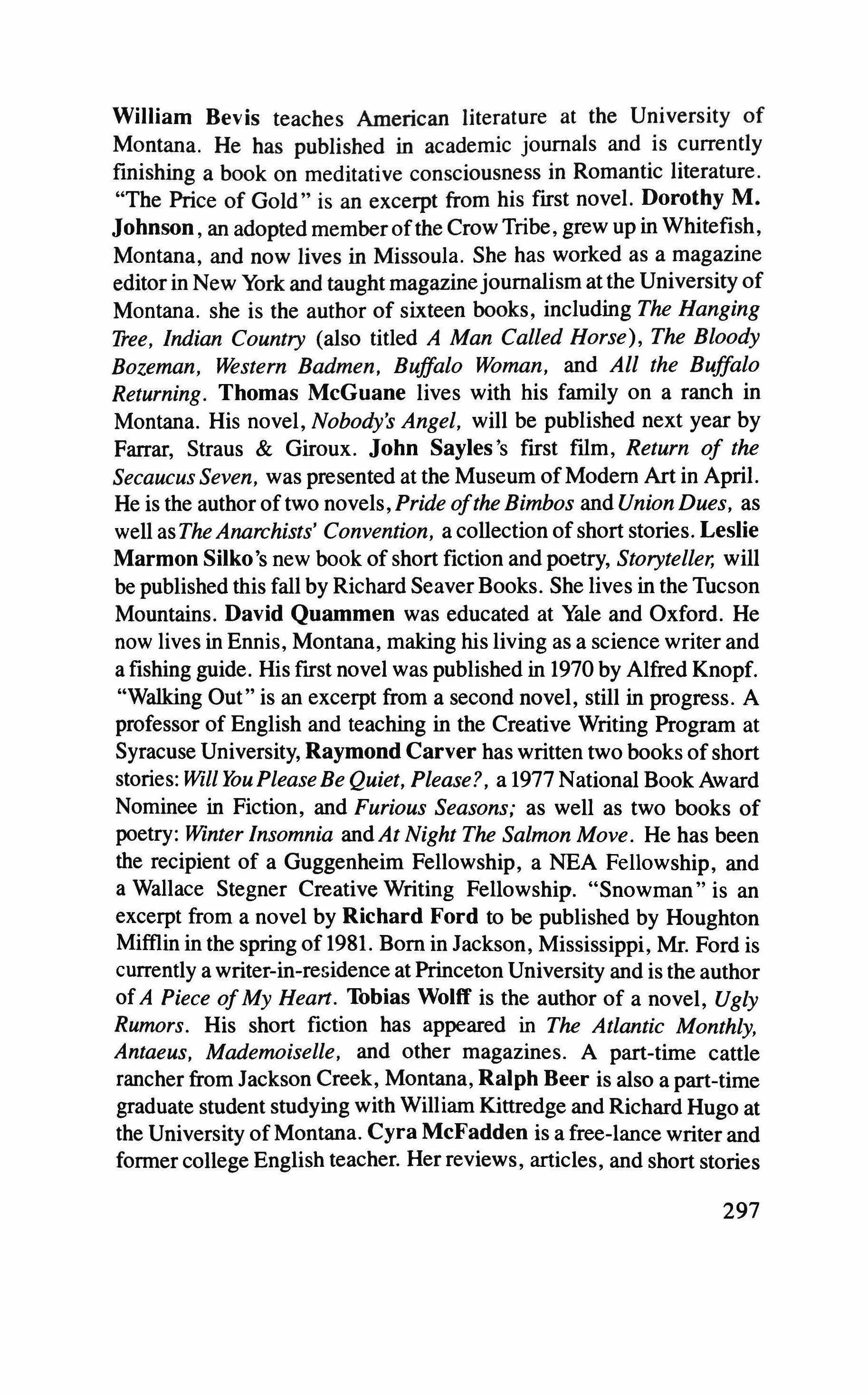
William Bevis teaches American literature at the University of Montana. He has published in academic journals and is currently fmishing a book on meditative consciousness in Romantic literature. "The Price of Gold" is an excerpt from his first novel. Dorothy M. Johnson, an adopted member ofthe Crow Tribe, grew up in Whitefish, Montana, and now lives in Missoula. She has worked as a magazine editorin New York and taughtmagazinejournalism at the University of Montana. she is the author of sixteen books, including The Hanging Tree, Indian Country (also titled A Man Called Horse), The Bloody Bozeman, Western Badmen, Buffalo Woman, and All the Buffalo Returning. Thomas McGuane lives with his family on a ranch in Montana. His novel, Nobody's Angel, will be published next year by Farrar, Straus & Giroux. John Sayles's first film, Return of the Secaucus Seven, was presented at the Museum ofModern Art in April. He is the author of two novels, Pride ofthe Bimbos and Union Dues, as well as The Anarchists' Convention, a collection of short stories. Leslie Marmon Sitko's new book of short fiction and poetry, Storyteller, will be published this fall by Richard Seaver Books. She lives in the Tucson Mountains. David Quammen was educated at Yale and Oxford. He now lives in Ennis, Montana, making his living as a science writer and a fishing guide. His first novel was published in 1970 by Alfred Knopf. "Walking Out" is an excerpt from a second novel, still in progress. A professor of English and teaching in the Creative Writing Program at Syracuse University, Raymond Carver has written two books of short stories: Will You Please Be Quiet, Please?, a 1977 National Book Award Nominee in Fiction, and Furious Seasons; as well as two books of poetry: Winter Insomnia and At Night The Salmon Move. He has been the recipient of a Guggenheim Fellowship, a NEA Fellowship, and a Wallace Stegner Creative Writing Fellowship. "Snowman" is an excerpt from a novel by Richard Ford to be published by Houghton Mifflin in the spring of 1981. Born in Jackson, Mississippi, Mr. Ford is currently a writer-in-residence at Princeton University and is the author ofA Piece ofMy Heart. Tobias Wolff is the author of a novel, Ugly Rumors. His short fiction has appeared in The Atlantic Monthly, Antaeus, Mademoiselle, and other magazines. A part-time cattle rancher from Jackson Creek, Montana, Ralph Beer is also a part-time graduate student studying with William Kittredge and Richard Hugo at the University of Montana. Cyra McFadden is a free-lance writer and former college English teacher. Her reviews, articles, and short stories
297

have been published in The Nation, The New Leader, McCall's, The New York Times Magazine, Smithsonian, and other magazines. She is the author of one book, The Serial. John Nichols is from Taos, New Mexico. He is currently at work on his sixth novel, The Nirvana Blues, which will complete a trilogy that includes The MilagroBeanfield War and The MagicJourney. His most recent novel is A Ghost in the Music (Holt, Rinehart & Winston, 1979). Edward Abbey is the author of, among other books, The Monkey Wrench Gang, TheJourneyHome, and Abbey's Road.
A special thanks to Durrett Wagner and Historical Pictures Service, Inc., a Chicago photo archive many of whose drawings and photographs appear in this collection; to Dale Grande, Chicago Tattooing Company for his tattoo on p. 203; and to John Davies, model, p. 203.
Note The art credit for TriQuarterly 47 should read: Cover and interior illustration concepts by Dianne BleIl; Stephen Sanders, photographer.
Yeats, Eliot, Pound, Stevens, Williams, Moore, MacLeish, Auden, Jeffers, Cummings, Shapiro, Schwartz, Jarrell, Lowell, Merrill, Thomas, Nemerov, Ashbery, Hecht, Kunitz, Plath, Hall, Ammons, Bishop, Hollander, Meredith, Berryman, Wagoner, Snyder, Van Duyn, Kumin, Wright, Ignatow, Atwood, Pinsky, Dubie, Raab, and Bottoms have something in common.
Since 1912 America's premiere poetry monthly: -latest poems by today's leading and newly discovered talents - extensive book reviews - monthly book listingsnews notes on the poetry scene around the country
Write us direct about POETRY's new special classroom discount rates.
POETRY continues to make history. Pass it on.
o I enclose $18 for a one-year subscription.
o Send classroom rate details.
Name Address
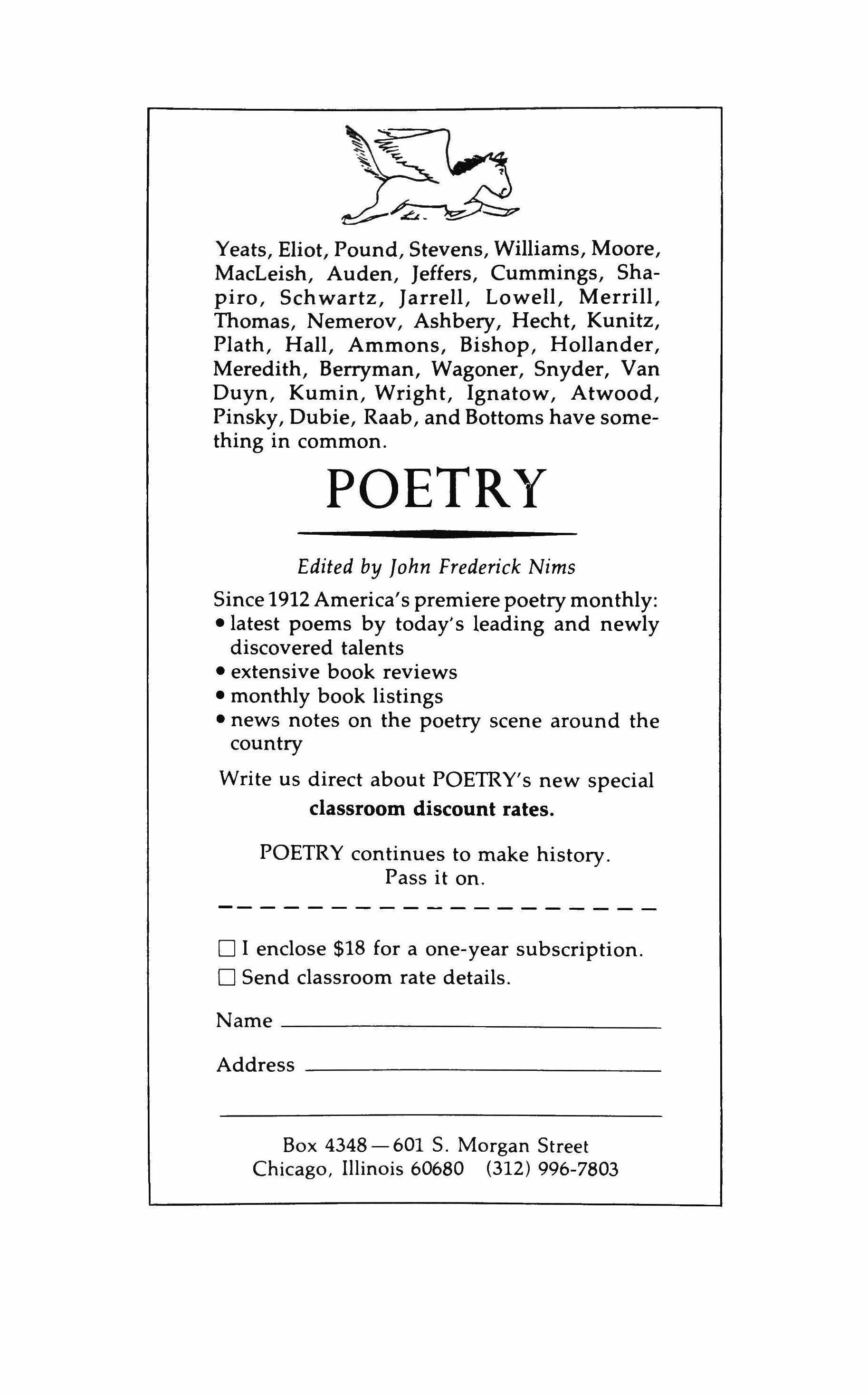
Box 4348 - 601 S. Morgan Street Chicago, lllinois 60680 (312) 996-7803
FOR SPRING 1980
Fiction by ANDRE DUBUS
Poetry by DONALD DAVIE AND OTHERS
HENRY ADAMS
Essays by JAMES M. Cox and B. L. REm
Reviews by EARL N. HAlUJERT and LAURENCE B. HOLLAND
GEORGE WOODCOCK: "Romanticism: Studies and Speculations"
THOMAS DANIEL YOUNG: The State of Letters
MARY ELLMANN: "Voices of the Self'
.------ AMERICAN LITERARy SCHOLARSmP
Essays and Reviews by HAROLD BEAVER, KENNETH DAUBER, C. HUGH HOLMAN, and LEWIS P. SIMPSON

One-year subscription: $9 (personal) $3.25 per copy (including postage)
The Sewanee Review, Sewanee, Tennessee, 37375

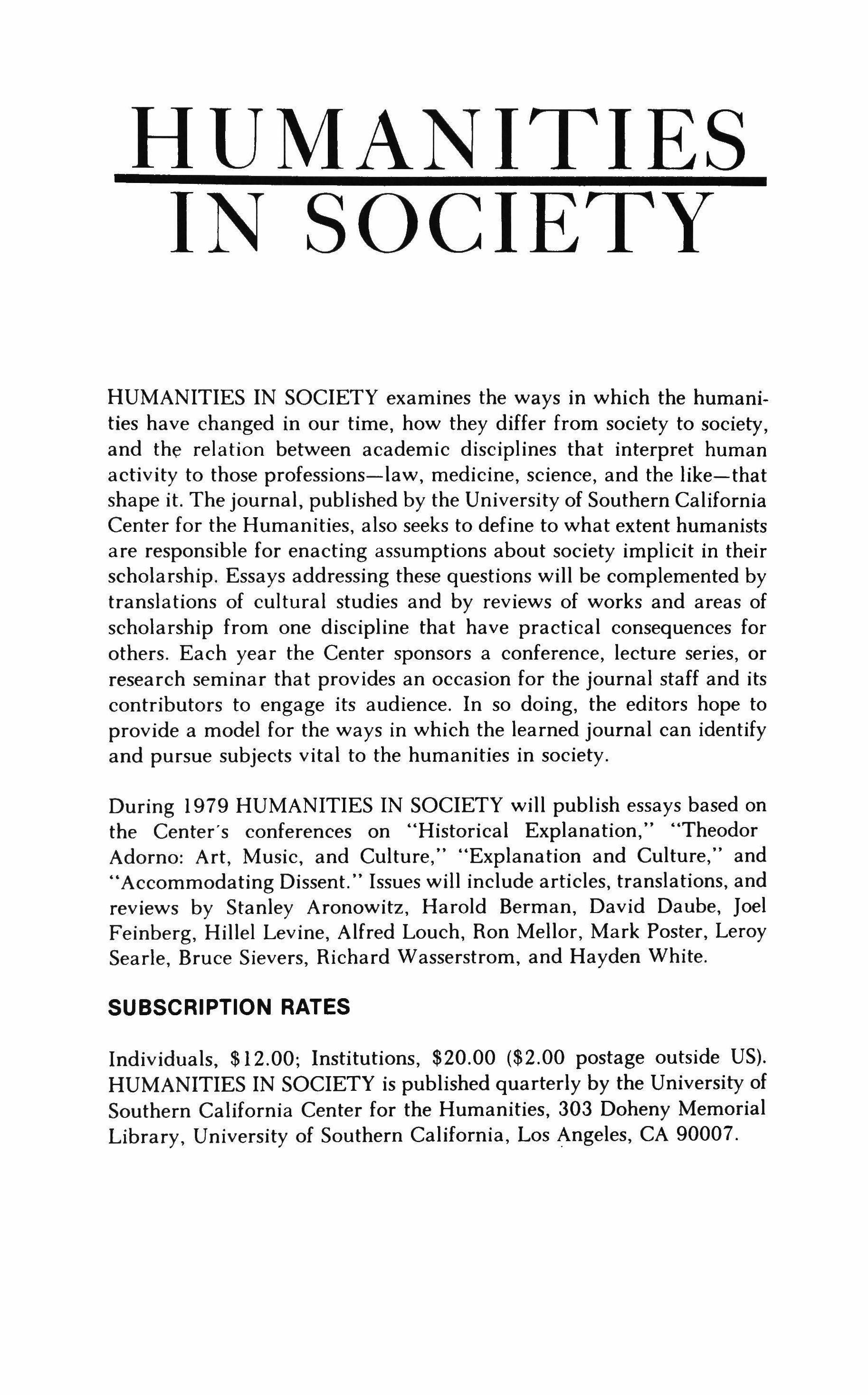
HUMANITIES IN SOCIETY examines the ways in which the humanities have changed in our time, how they differ from society to society, and the relation between academic disciplines that interpret human activity to those professions-law, medicine, science, and the like-that shape it. The journal, published by the University of Southern California Center for the Humanities, also seeks to define to what extent humanists are responsible for enacting assumptions about society implicit in their scholarship. Essays addressing these questions will be complemented by translations of cultural studies and by reviews of works and areas of scholarship from one discipline that have practical consequences for others. Each year the Center sponsors a conference, lecture series, or research seminar that provides an occasion for the journal staff and its contributors to engage its audience. In so doing, the editors hope to provide a model for the ways in which the learned journal can identify and pursue subjects vital to the humanities in society.
During 1979 HUMANITIES IN SOCIETY will publish essays based on the Center's conferences on "Historical Explanation," "Theodor Adorno: Art, Music, and Culture," "Explanation and Culture," and "Accommodating Dissent." Issues will include articles, translations, and reviews by Stanley Aronowitz, Harold Berman, David Daube, Joel Feinberg, Hillel Levine, Alfred Louch, Ron Mellor, Mark Poster, Leroy Searle, Bruce Sievers, Richard Wasserstrom, and Hayden White.
Individuals, $12.00; Institutions, $20.00 ($2.00 postage outside US). HUMANITIES IN SOCIETY is published quarterly by the University of Southern California Center for the Humanities, 303 Doheny Memorial Library, University of Southern California, Los Angeles, CA 90007.
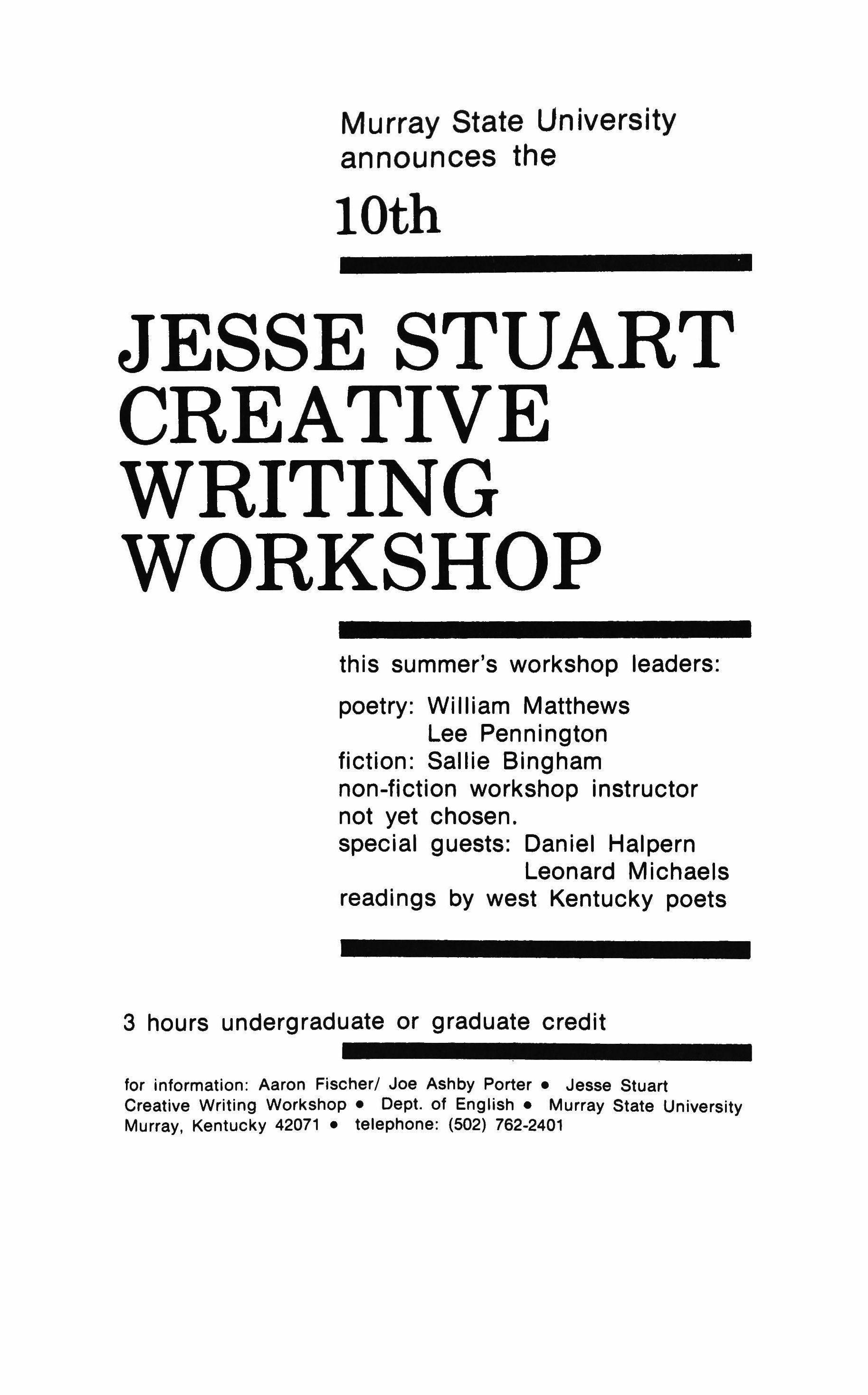
Murray State University announces the 10th
this summer's workshop leaders: poetry: William Matthews Lee Pennington fiction: Sallie Bingham non-fiction workshop instructor not yet chosen. special guests: Daniel Halpern Leonard Michaels readings by west Kentucky poets 3 hours undergraduate or
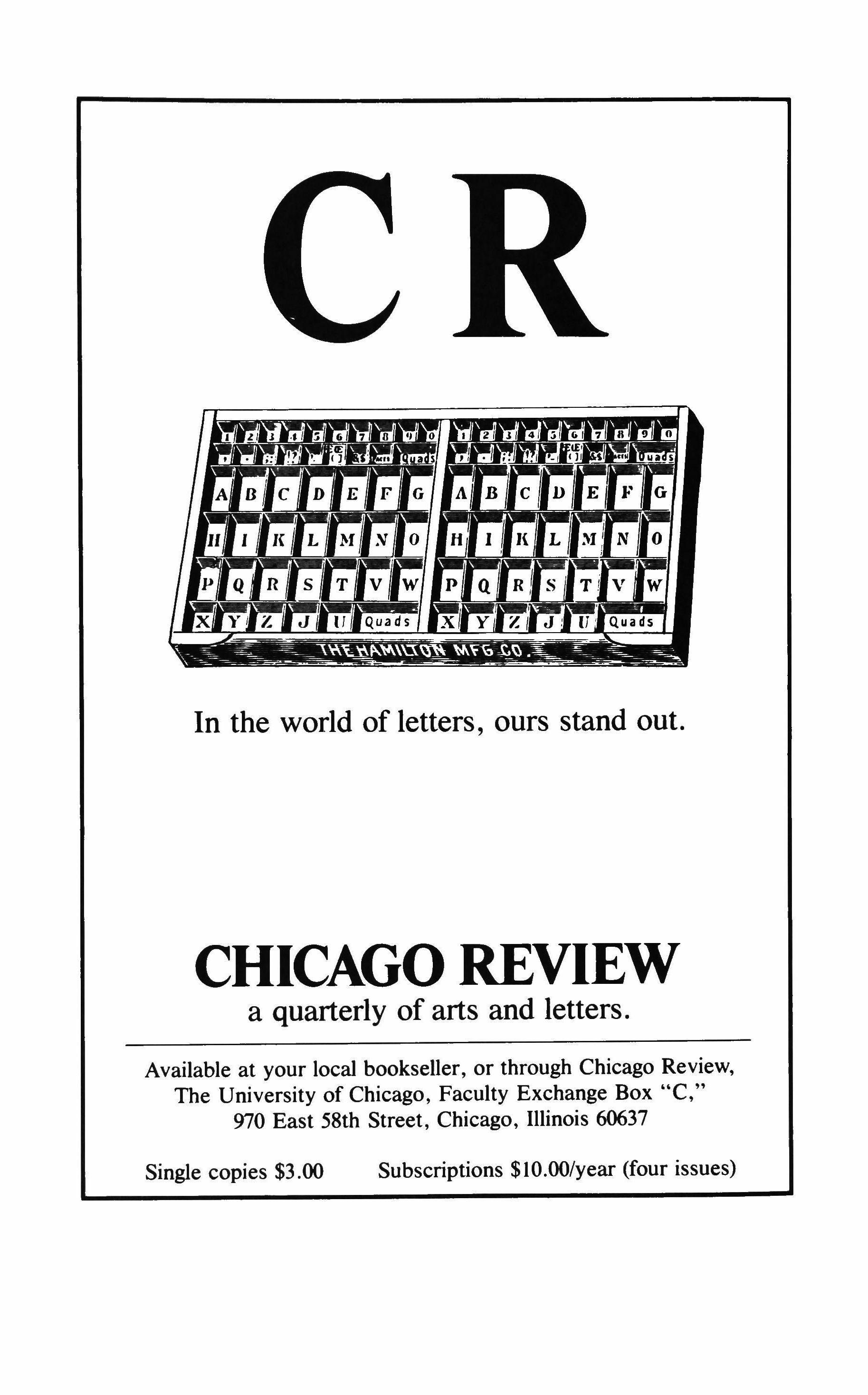
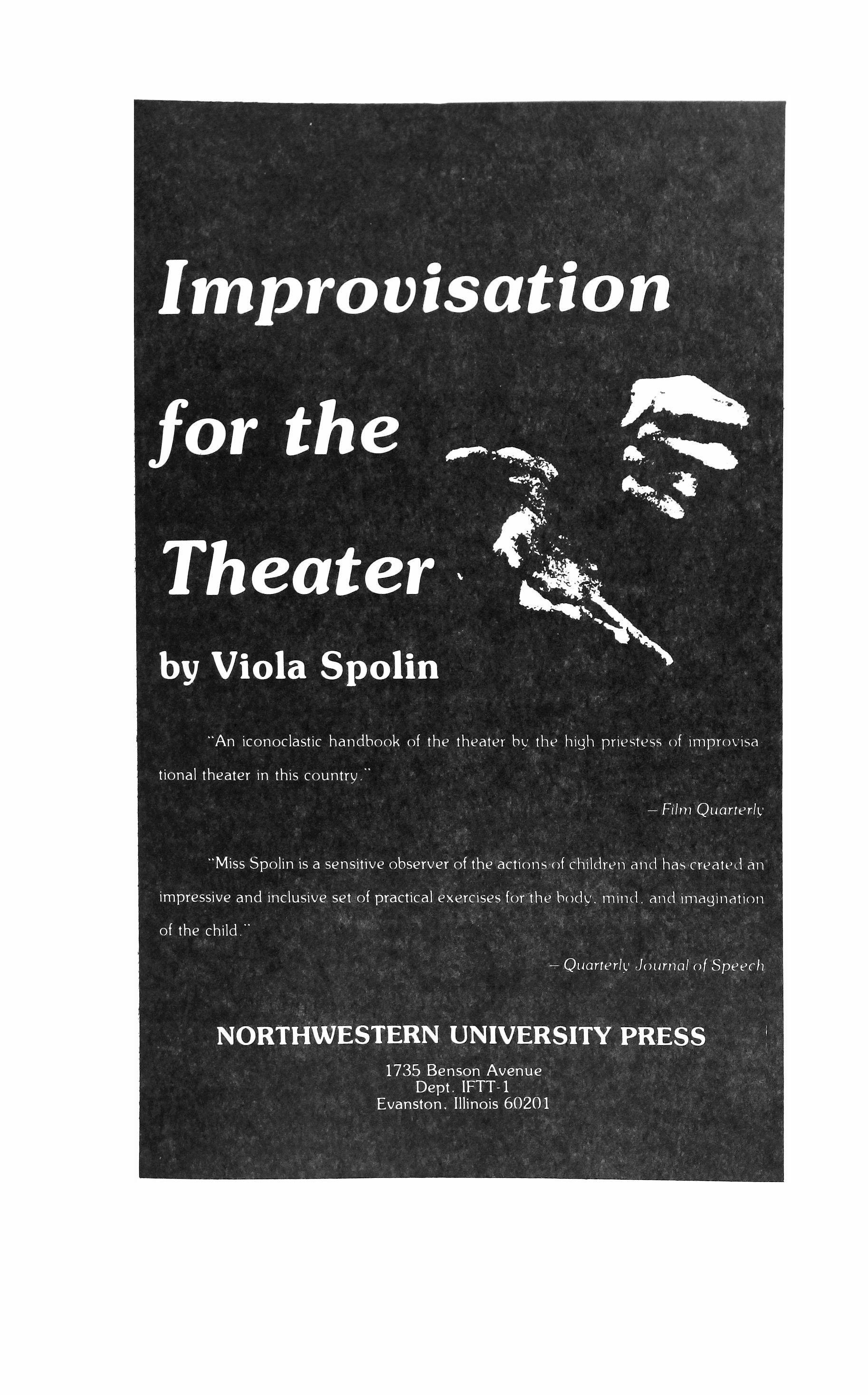
biolraphy is the first and only scholarly quarterly in the world solely devoted to the neglected study oflife-writing.
biolraphy is a central forum for all serious writers about biography: biographers, students of literature, librarians, psychologists, historians, and social scientists.
biolraphy is a central forum for all serious readers of biography and all those who think humans in the human condition are important.
"We should give a warm welcome to Biography Certainly we can do with such a magazine."
P. N. Furbank, TLS
"Those who read biography and certainly those who write it will welcome this unique quarterly Biography is a must for those involved in life-writing." Jane Barnard, Serials Review "Biography should be congratulated for creative initiative and contribution to this study area this valuable periodical is recommended for academic and larger public libraries."
Lubomyr R. Wynar, Ammcan Reference Book Annual 1979
BIOGaAPHY: THEORY AND FORM-Leon Edel, "Biography: A Manifesto" (I: I) BIOGRAPHY AND LITERATCRE-Joel Blair, "The Mixed Genre of the PortraitCharacter: the Case oi Halifax's A Character of King Charies II" (1:4) BIOGRAPHY: NEWLY PUBLISHED DOCUMENTS-R. S. Shankland, "Albert Einstein" (II:3) BIOGRAPHY AND HIfiORy-Walter Johnson, AdlaI E. Stevenson-His Editor's View" (1:2) BIOGaAPHY AND PSYCHOLOGy-H. J. Eysenck, "Biography In the Service ofScience: a Look at Astrology" (II: I) BIOGaAPHY AND WOMEN-Margot Peters, "Biographies of Women" (II:4) BIOGRAPHY AND CoNTINENTAL EUROPI-Owen A. Aldridge, "Prob-
RATES FOR INDIVIDUALS
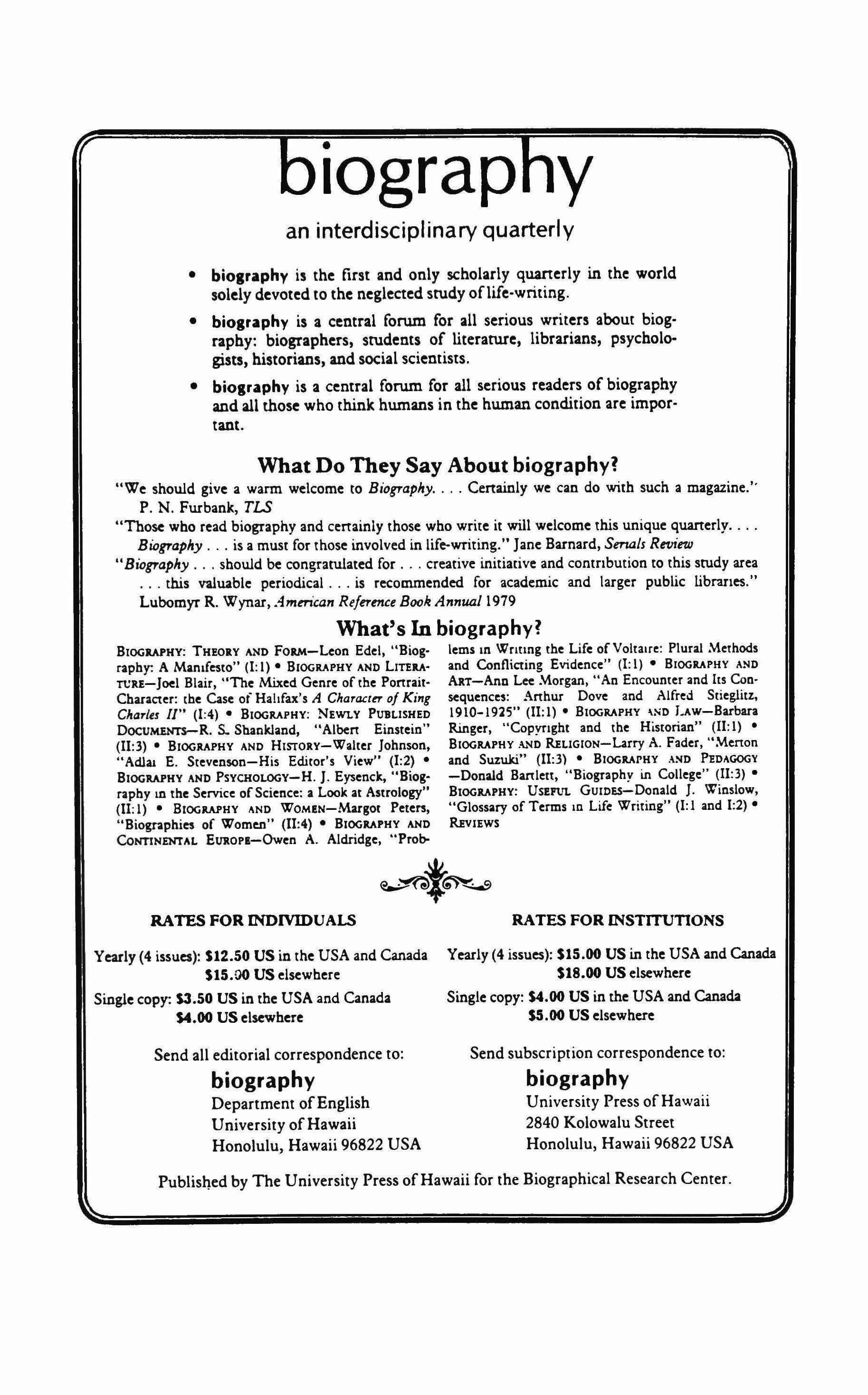
lems In Writing the Life of Voltme: Plural .\tethods and Conflicting Evidence" (I: I) BIOGRAPHY AND AlIT-AnD Lee .\torgan, "An Encounter and Its Consequences: Arthur Dove and Alfred Stieglitz. 1910-19:25" (II:I) BIOGRAPHY \ND LAw-Barbara Ringer, "Copyright and the Historian" (II:I) BIOGRAPHY AND RELIGION-Larry A. Fader, "Merton and Suzuki" (II:3) BIOGRAPHY .\ND PEDAGOGY -Donald Bartlett, "Biography in College" (II:3) BIOGRAPHY: USI!FVL GUIDES-Donald J. Winslow, "Glossary of Terms In Life Writing" (I: I and 1:2) REvIEWS
Yearly (4 issues): $12.50 US in the USA and Canada
$15.00 US elsewhere
Single copy: $3.50 US in the USA and Canada
$4.00 US elsewhere
Send all editorial correspondence to:
Department ofEnglish University of Hawaii Honolulu, Hawaii 96822 USA
RATES FOR INSTITUTIONS
Yearly (4 issues): $15.00 US in the USA and Canada
$18.00 US elsewhere
Single copy: $4.00 US in the USA and Canada
$5.00 US elsewhere
Send subscription correspondence to:
University Press of Hawaii 2840 Kolowalu Street Honolulu, Hawaii 96822 USA
Published by The University Press ofHawaii for the Biographical Research Center.

Few poets today write with Frederick Morgan's range and control. His various voices always speak to fundamental human concerns: death, pain, transcendence, love, and the nature of the self.
Morgan's first collection of poetry, A Book of Change, was nominated for the National Book Award in 1972. His second, Poems of the Two Worlds, was hailed by A. R. Ammons as "releasing a range of feelings of a richness unprecedented in our times."
This latest collection finds Morgan further developing his poetic range in subtle and profound treatment of basic human experiences. The book is divided into eight sections, each in a different mode, including autobiographical reminiscences, dreams, dramatic monologues, and fables. This is indeed a tour de force by a respected American poet of solid and varied talent. Cloth, $10.00; paper, $3.95.
At bookstores, or order from
UNIVERSITY OF ILLINOIS PRESS Box 5081, Station A, Champaign, IL 61820
(translated by
Richard Howard)This collection of essays by the most prominent French literary and social commentator documents a transitional and highly important period in Barthes's career. Critical Essays affords invaluable insights into Barthes's critical and scholarly perspectives.
The English translation was first published in 1972. Northwestern University Press is pleased to announce the first paperback edition of this influential work.
'Throughout this most impressive collection, Barthes makes every word carry a genuine thought: his paragraphs are other men's books
-The New York Times

Critical Essays
Roland Barthes
$6.95
A Northwestern University Press paperback (Hardcover edition: $14.95)
"8orges is a world writer, because he knows all the rules and knows how and when to break them. His literary life has been a long struggle to liberate the word, to give it a new vitality in an age when it is constantly under attack. He is a magician of language, but like all the best tricksters and pdets he makes us feel when the trick is revealed and the poem is said, that it was always there, somewhere unexpressed within us" (Frank Macshane, in "Borges the Craftsman").
Originally published as a special issue of Tri-Quarterly magazine, Prose for Borges is a collection of tributes, criticisms, and commentary on the Latin American author who has become so important to American readers. The essays explore the nature of Borges' art, his place in the literary history of the Americas, and the important themes and symbols of his writings. A collection of photos and an interview with his sister, Norah Borges, provide a personal glimpse of Borges and recount his family history.
Contributors to Prose for Borges include: Richard Howard, Mary Kinzie, Ronald Christ, Nestor Ibarra, Alastair Reid, Emir Rodriguez Monegal, R. H. W. Dillard, Humberto M. Rasi, Adolfo Bioy Casares, Kenneth Fields, Jaime Alazraki, Ben Belitt, Anthony Kerrigan, John C. Murchison, Robert Alter, John Wright, Alexander Coleman, Frank Macshane, Carter Wheelock, Victoria Ocampo, John Hollander, and Norman Thomas di Giovanni.

ISBN �8101-O438-5 $16.75 Northwestern University Press 1735 Benson Ave. Evanston, Illinois 60201
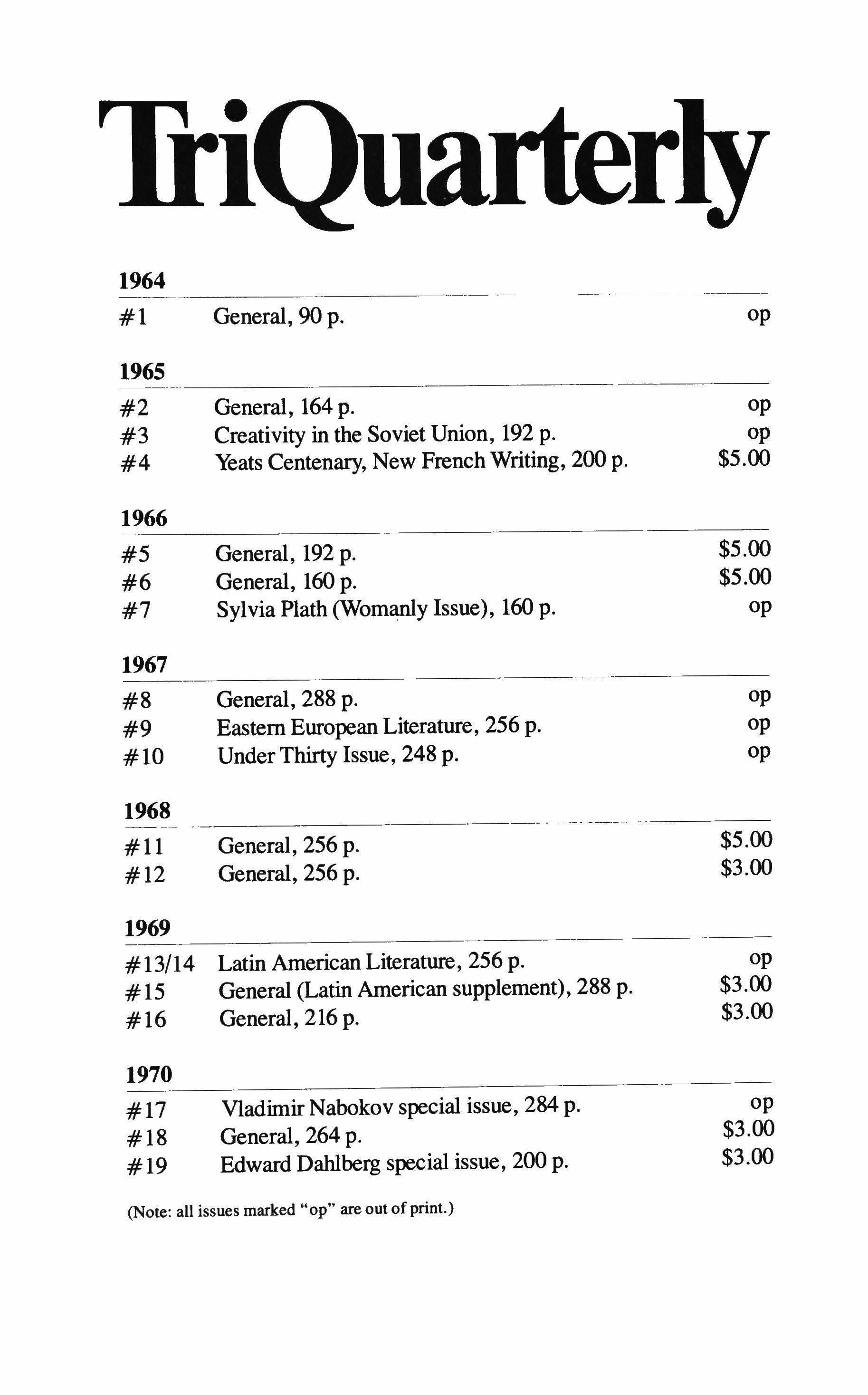


TriQuarterly 33 -William Biderbost, silk screened, 5 colors, signed and numbered. Edition of275.
TriQuarterly 36 -Lawrence Levy and William Biderbost, silk screened, 4 colors. Edition of 150.
TriQuarterly 37 -Michael VolIan, silk screen, 2 colors. Edition of 200.

